






Editor: Elliott Anderson
Guest Co-editor: Robert Coover
Executive Editor: Mary Kinzie
Art Director: Lawrence Levy
Managing Editor: Theresa Maylone
Associate Editors: Michael McDonnell, Allan Gray, Mary Elinore Smith
Advisory Editor: Charles Newman
Production: Cynthia Anderson
Fulfillment: Mary M. Zakrasek, Doris Grimes
Contributing Editors: Robert Alter, Joseph Epstein, Gerald Graff, John Hawkes, David Hayman, Lawrence Levy, Joseph McElroy, Peter Michelson, Robert Onopa, Tony Tanner, Nathaniel Tarn
TriQuarterly is an international journal of arts, letters, and opinion published in the fall, winter, and spring at Northwestern University, Evanston, Illinois 60201. Subscription rates: One year $10.00; two years $15.00; three years $20.00. Foreign subscriptions $1.00 per year additional. Single copies usually $3.50. Back issue prices on request. Contributions, correspondence, and subscriptions should be addressed to TriQuarterly, University Hall 101, Northwestern University, Evanston, Illinois 60201. The editors invite submissions, but queries are strongly suggested. No manuscripts will be returned unless accompanied by a stamped, self-addressed envelope. All manuscripts accepted for publication become the property of TriQuarterly, unless otherwise indicated. Copyright © 1976 by TriQuarterly. All rights reserved. The views expressed in this magazine are to be attributed to the writers, not the editors or sponsors. Printed in the United States of America. Claims for missing numbers will be honored only within the fourmonth period after month of issue.
NATIONAL DISTRIBUTOR TO RETAIL TRADE: B. DEBOER, 188 HIGH STREET, NUTLEY, NEW JERSEY 07110. DISTRIBUTOR FOR WEST COAST RETAIL TRADE: BOOK PEOPLE, 2940 7TH STREET, BERKELEY, CALIFORNIA 94710. DISTRIBUTOR FOR GREAT BRITAIN AND EUROPE: B. F. STEVENS & BROWN, LTD., ARDON HOUSE, MILL LANE, GODALMING, SURREY, ENGLAND.
REPRINTS OF BACK ISSUES OF TriQuarterly ARE NOW AVAILABLE IN FULL FORMAT FROM KRAUS REPRINT COMPANY, ROUTE 100, MILLWOOD, NEW YORK 10546, AND IN MICROFILM FROM UNIVERSITY MICROFILMS, A XEROX COMPANY, ANN ARBOR, MICHIGAN 48106.
W. S. Merwin: Vanity 5
W. S. Merwin: The good-bye shirts 6
John Hawkes: Design and debris (from Travesty) 7
Margarita Karapanou: The honey 9
Margarita Karapanou: That afternoon a bee had stung her 10
Steve Katz: On hidden blessings 12
Steve Katz: On the difference between the 60's and 70's 13
Terry Stokes: Directions to a new town 14
Istvan Orkeny: Snowy landscape with two onion domes 14
Ursule Molinaro: Burial rites 16
Frederic Tuten: from The Tomkins Square Park Tales 17
J. G. Ballard: Queen Elizabeth's rhinoplasty 18
Max Apple: Heart attack 20
John Bdtki: The footnote as medium 22
John Bdtki: The mysterious cell count 22
Francis Ponge: Rain 23
Francis Ponge: Orange 24
Steve Schutzman: The bank robbery 25
Ira Sadoff: The romance of the radish 26
Ira Sadoff: The romance of the restless 27
Eugene Wildman: My Gringo 28
Leonard Michaels: 3. The words for penis 30
Sotere Torregian: Chateaubriand 31
Sotere Torregian: The Supermart 32
Gail Godwin: His house 32
Ian MacMillan: Berlin, 1945/Fallen pinup girl 35
Ian MacMillan: Messinghausen, 1945/The unknown soldier passes 36
Eugene K. Garber: Mannikin 37
David Ohle: The boy scout 39
David Ohle: The rules 41
2
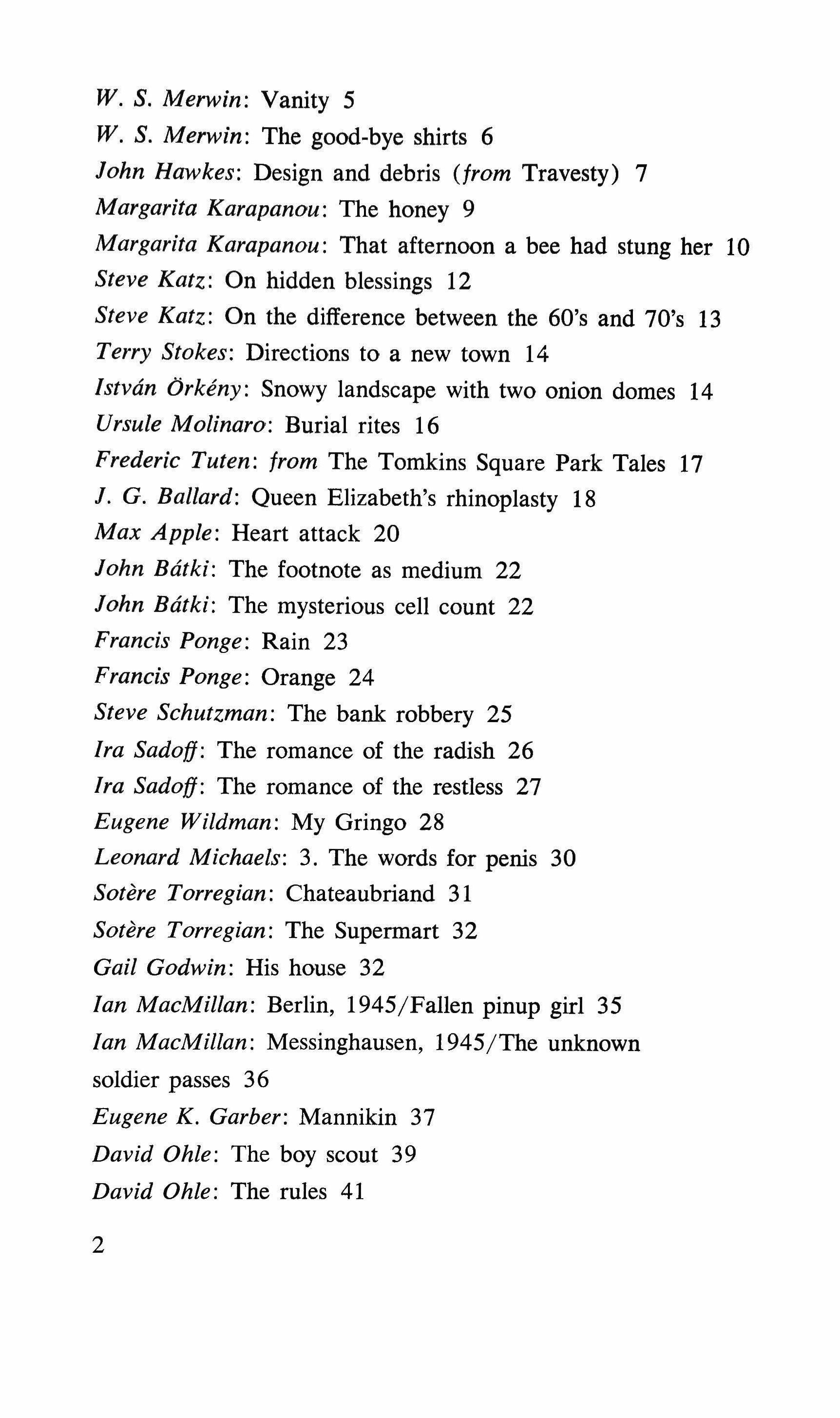
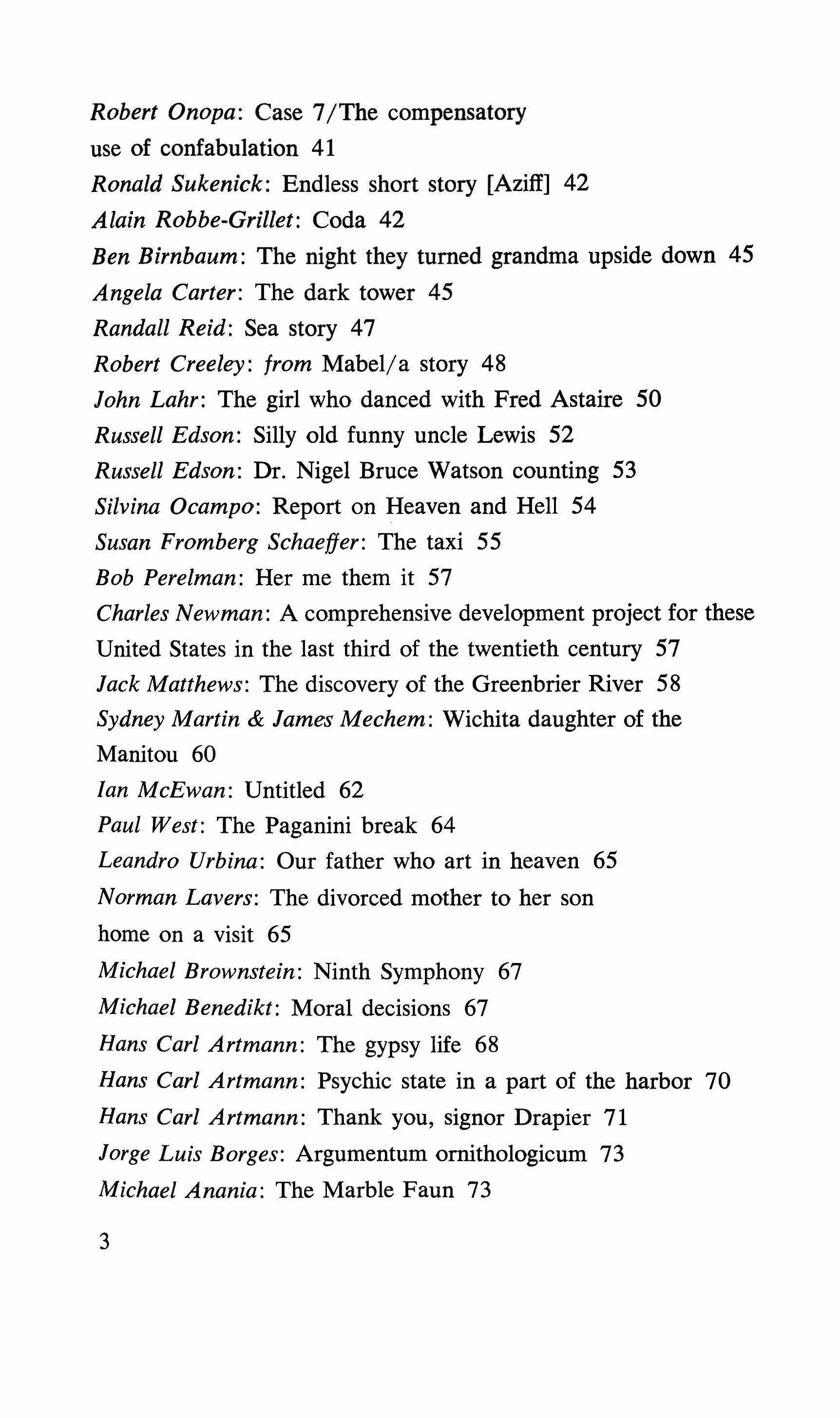
Robert Onopa: Case 7/The compensatory use of confabulation 41
Ronald Sukenick: Endless short story [Aziff] 42
Alain Robbe-Grillet: Coda 42
Ben Birnbaum: The night they turned grandma upside down 45
Angela Carter: The dark tower 45
Randall Reid: Sea story 47
Robert Creeley : from Mabel!a story 48
John Lahr: The girl who danced with Fred Astaire 50
Russell Edson: Silly old funny uncle Lewis 52
Russell Edson: Dr. Nigel Bruce Watson counting 53
Silvina Ocampo: Report on Heaven and Hell 54
Susan Fromberg Schaeffer: The taxi 55
Bob Perelman: Her me them it 57
Charles Newman: A comprehensive development project for these United States in the last third of the twentieth century 57
Jack Matthews: The discovery of the Greenbrier River 58
Sydney Martin & James Mechem: Wichita daughter of the Manitou 60
Ian McEwan: Untitled 62
Paul West: The Paganini break 64
Leandro Urbina: Our father who art in heaven 65
Norman Lavers: The divorced mother to her son home on a visit 65
Michael Brownstein: Ninth Symphony 67
Michael Benedikt: Moral decisions 67
Hans Carl Artmann: The gypsy life 68
Hans Carl Artmann: Psychic state in a part of the harbor 70
Hans Carl Artmann: Thank you, signor Drapier 71
Jorge Luis Borges: Argumentum ornithologicum 73
Michael Anania: The Marble Faun 73 3
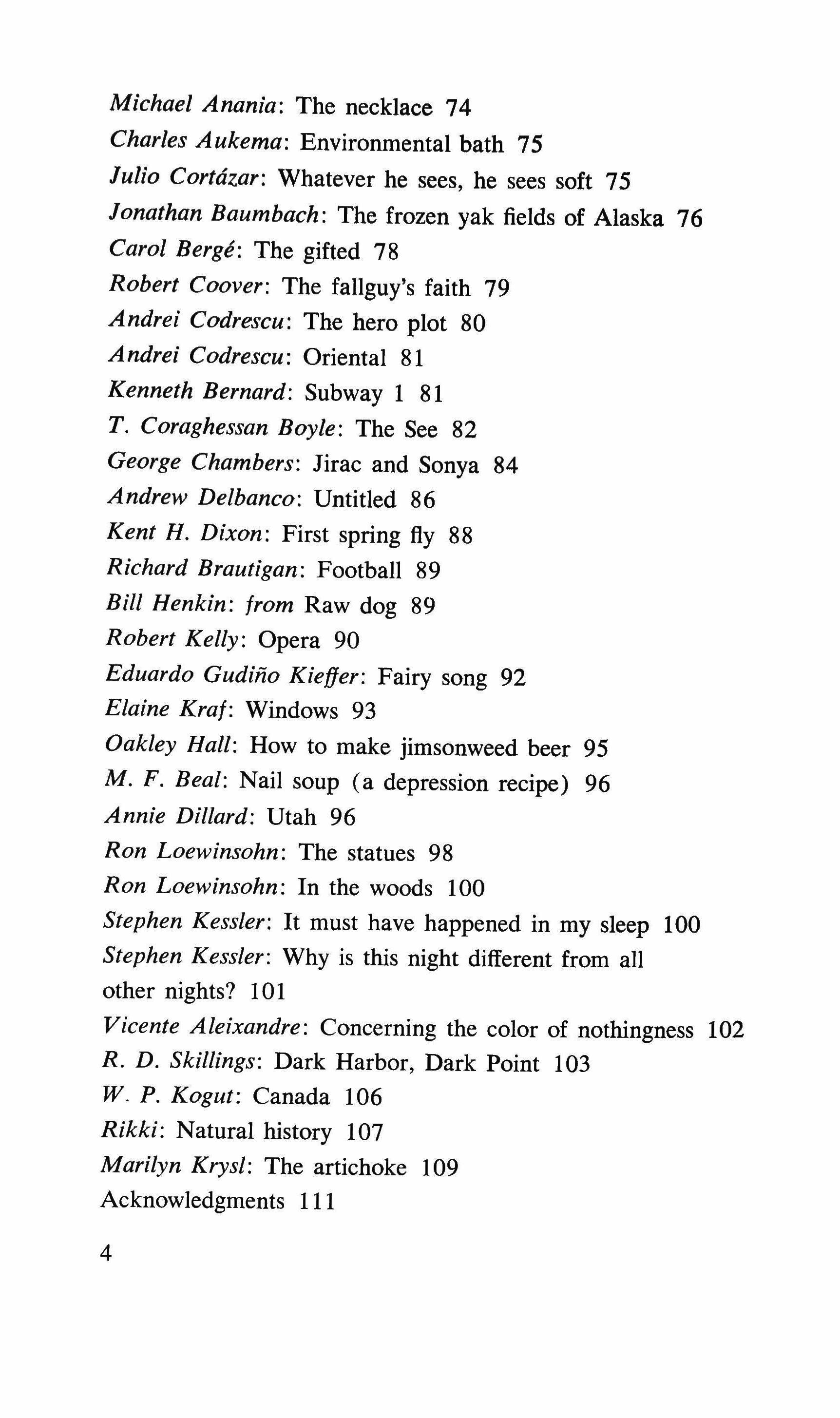
Michael Anania: The necklace 74
Charles Aukema: Environmental bath 75
Julio Cortdzar: Whatever he sees, he sees soft 75
Jonathan Baumbach: The frozen yak fields of Alaska 76
Carol Berge: The gifted 78
Robert Coover: The fallguy's faith 79
Andrei Codrescu: The hero plot 80
Andrei Codrescu: Oriental 81
Kenneth Bernard: Subway 1 81
T. Coraghessan Boyle: The See 82
George Chambers: Jirac and Sonya 84
Andrew Delbanco: Untitled 86
Kent H. Dixon: First spring fly 88
Richard Brautigan: Football 89
Bill Henkin: from Raw dog 89
Robert Kelly: Opera 90
Eduardo Gudino Kieffer: Fairy song 92
Elaine Kraj: Windows 93
Oakley Hall: How to make jimsonweed beer 95
M. F. Beal: Nail soup (a depression recipe) 96
Annie Dillard: Utah 96
Ron Loewinsohn: The statues 98
Ron Loewinsohn: In the woods 100
Stephen Kessler: It must have happened in my sleep 100
Stephen Kessler: Why is this night different from all other nights? 101
Vicente Aleixandre: Concerning the color of nothingness 102
R. D. Skillings: Dark Harbor, Dark Point 103
W. P. Kogut: Canada 106
Rikki: Natural history 107
Marilyn Krysl: The artichoke 109
Acknowledgments 111 4
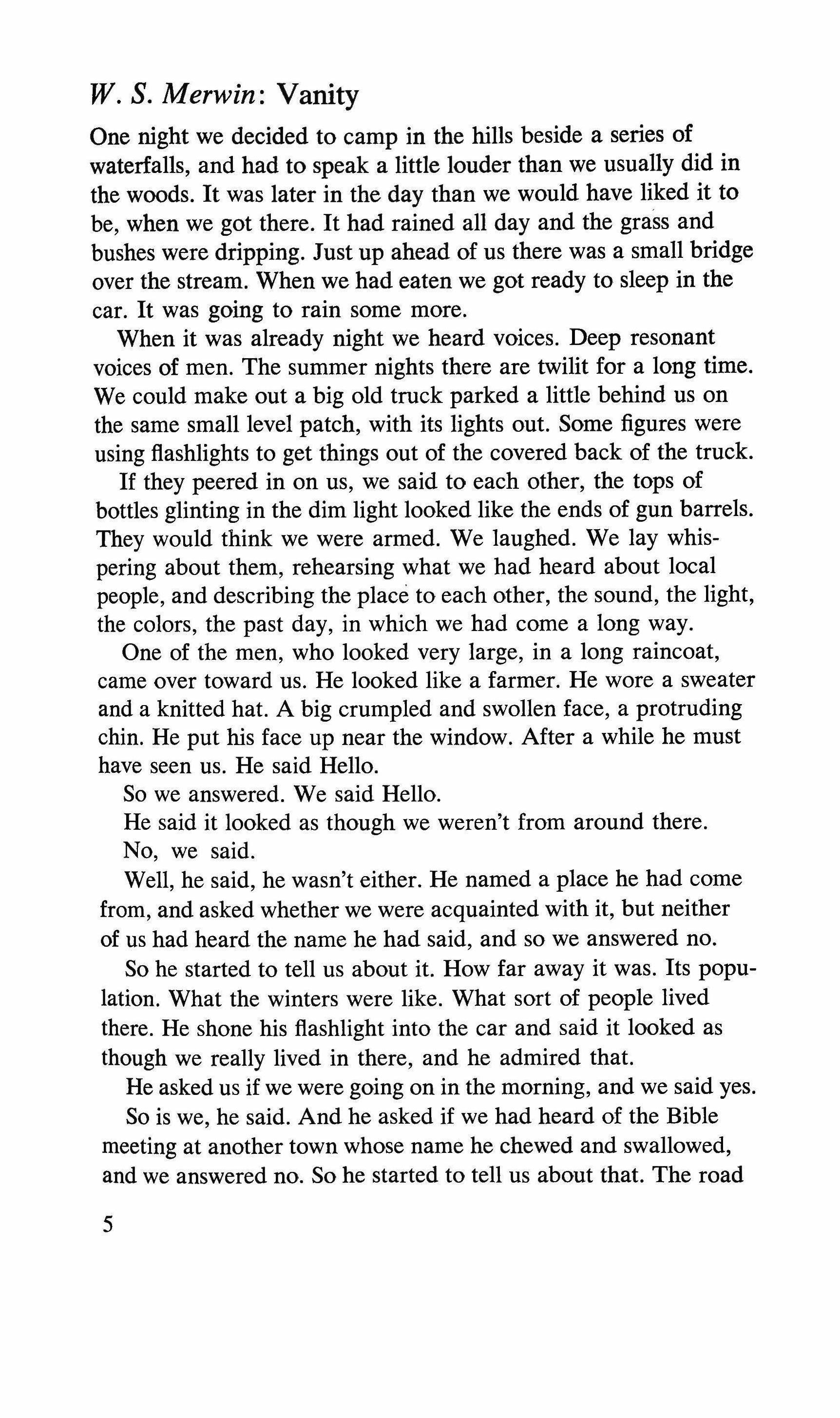
One night we decided to camp in the hills beside a series of waterfalls, and had to speak a little louder than we usually did in the woods. It was later in the day than we would have liked it to be, when we got there. It had rained all day and the grass and bushes were dripping. Just up ahead of us there was a small bridge over the stream. When we had eaten we got ready to sleep in the car. It was going to rain some more.
When it was already night we heard voices. Deep resonant voices of men. The summer nights there are twilit for a long time. We could make out a big old truck parked a little behind us on the same small level patch, with its lights out. Some figures were using flashlights to get things out of the covered back of the truck. If they peered in on us, we said to each other, the tops of bottles glinting in the dim light looked like the ends of gun barrels. They would think we were armed. We laughed. We lay whispering about them, rehearsing what we had heard about local people, and describing the place to each other, the sound, the light, the colors, the past day, in which we had come a long way.
One of the men, who looked very large, in a long raincoat, came over toward us. He looked like a farmer. He wore a sweater and a knitted hat. A big crumpled and swollen face, a protruding chin. He put his face up near the window. After a while he must have seen us. He said Hello.
So we answered. We said Hello.
He said it looked as though we weren't from around there.
No, we said.
Well, he said, he wasn't either. He named a place he had come from, and asked whether we were acquainted with it, but neither of us had heard the name he had said, and so we answered no.
So he started to tell us about it. How far away it was. Its population. What the winters were like. What sort of people lived there. He shone his flashlight into the car and said it looked as though we really lived in there, and he admired that.
He asked us if we were going on in the morning, and we said yes.
So is we, he said. And he asked if we had heard of the Bible meeting at another town whose name he chewed and swallowed, and we answered no. So he started to tell us about that. The road
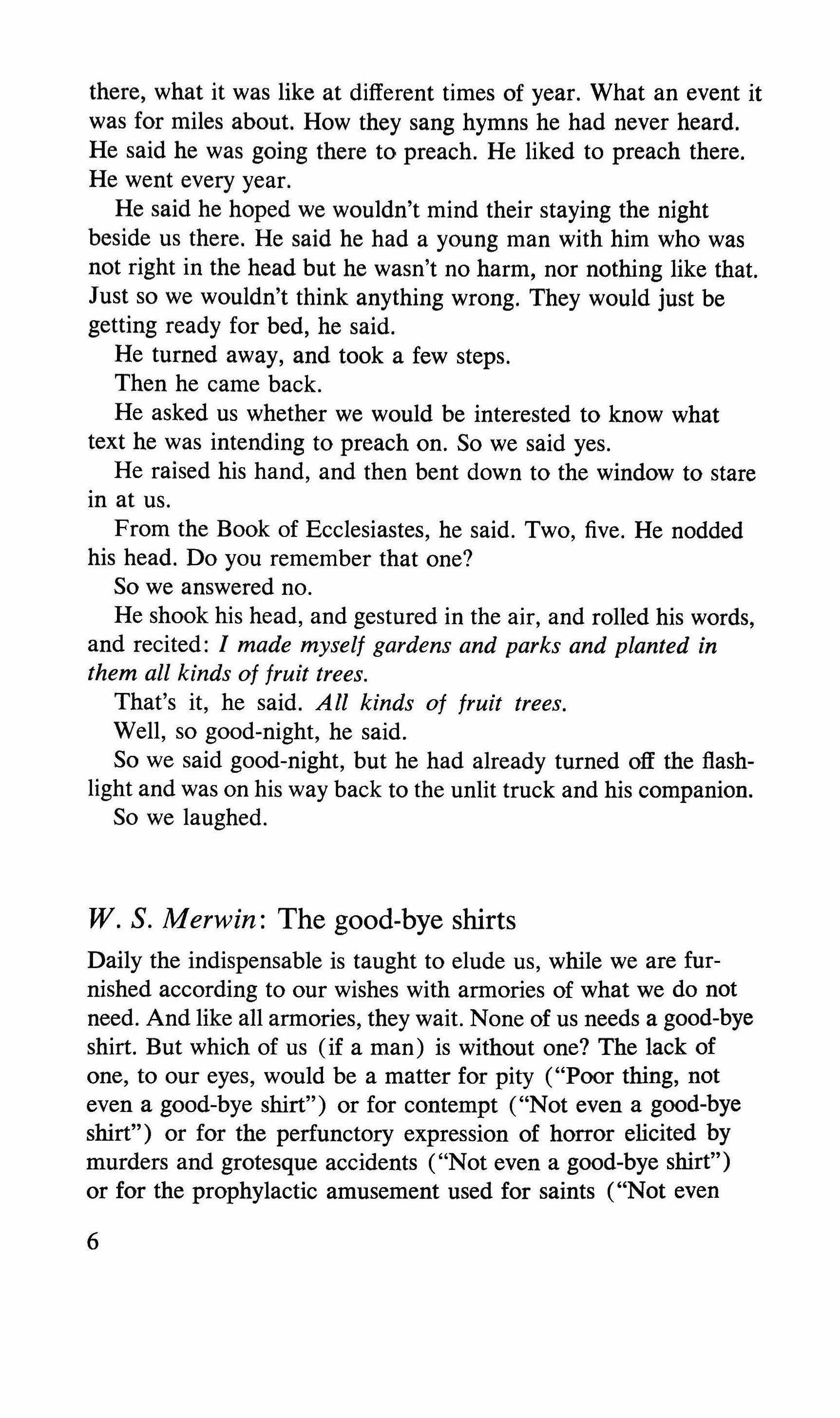
there, what it was like at different times of year. What an event it was for miles about. How they sang hymns he had never heard. He said he was going there to preach. He liked to preach there. He went every year.
He said he hoped we wouldn't mind their staying the night beside us there. He said he had a young man with him who was not right in the head but he wasn't no harm, nor nothing like that. Just so we wouldn't think anything wrong. They would just be getting ready for bed, he said.
He turned away, and took a few steps.
Then he came back.
He asked us whether we would be interested to know what text he was intending to preach on. So we said yes.
He raised his hand, and then bent down to the window to stare in at us.
From the Book of Ecclesiastes, he said. Two, five. He nodded his head. Do you remember that one?
So we answered no.
He shook his head, and gestured in the air, and rolled his words, and recited: I made myself gardens and parks and planted in them all kinds of fruit trees.
That's it, he said. All kinds of fruit trees.
Well, so good-night, he said.
So we said good-night, but he had already turned off the flashlight and was on his way back to the unlit truck and his companion.
So we laughed.
Daily the indispensable is taught to elude us, while we are furnished according to our wishes with armories of what we do not need. And like all armories, they wait. None of us needs a good-bye shirt. But which of us (if a man) is without one? The lack of one, to our eyes, would be a matter for pity ("Poor thing, not even a good-bye shirt") or for contempt ("Not even a good-bye shirt") or for the perfunctory expression of horror elicited by murders and grotesque accidents ("Not even a good-bye shirt") or for the prophylactic amusement used for saints ("Not even
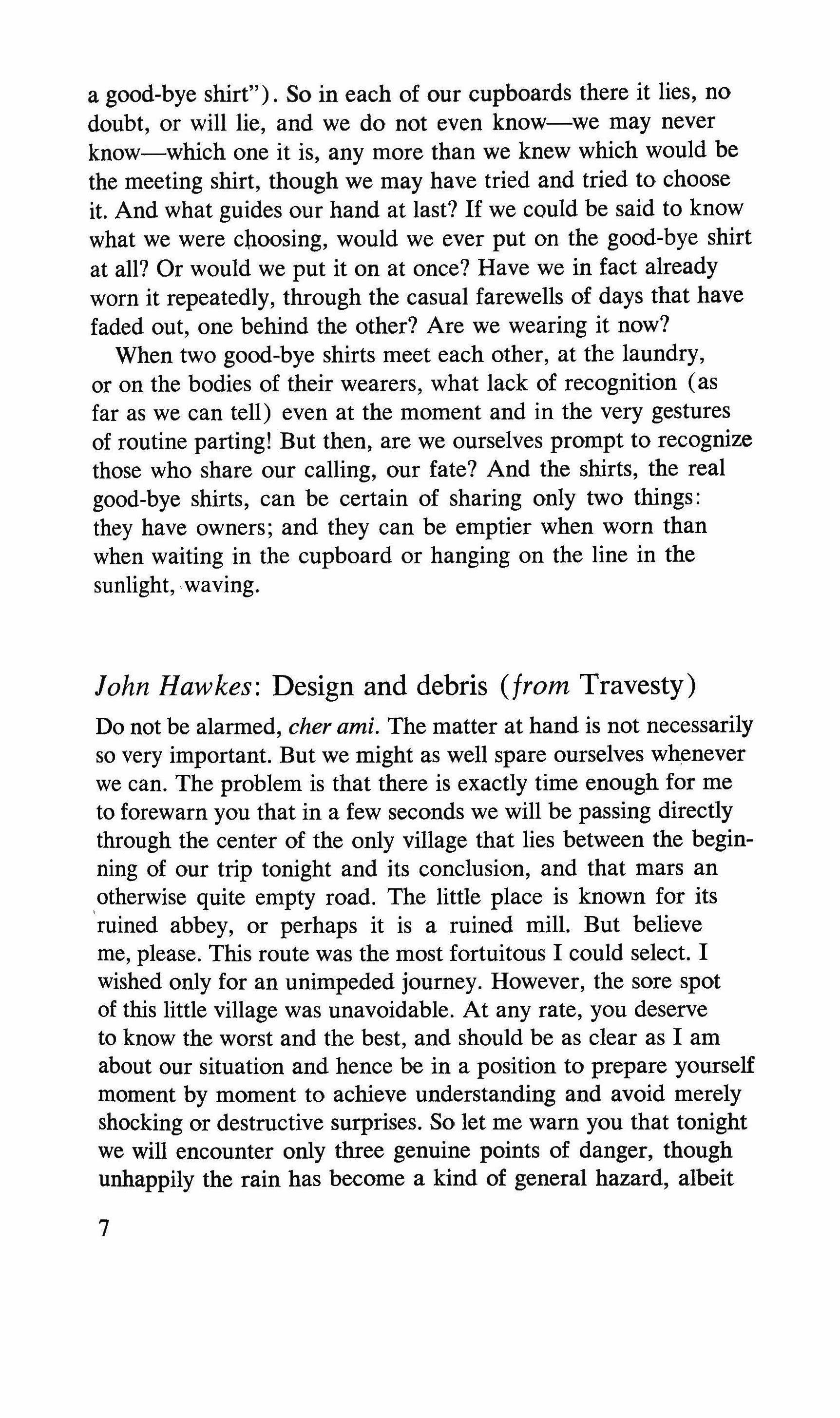
a good-bye shirt"). So in each of our cupboards there it lies, no doubt, or will lie, and we do not even know-we may never know-which one it is, any more than we knew which would be the meeting shirt, though we may have tried and tried to choose it. And what guides our hand at last? If we could be said to know what we were choosing, would we ever put on the good-bye shirt at all? Or would we put it on at once? Have we in fact already worn it repeatedly, through the casual farewells of days that have faded out, one behind the other? Are we wearing it now? When two good-bye shirts meet each other, at the laundry, or on the bodies of their wearers, what lack of recognition (as far as we can tell) even at the moment and in the very gestures of routine parting! But then, are we ourselves prompt to recognize those who share our calling, our fate? And the shirts, the real good-bye shirts, can be certain of sharing only two things: they have owners; and they can be emptier when worn than when waiting in the cupboard or hanging on the line in the sunlight, .waving,
Do not be alarmed, cher ami. The matter at hand is not necessarily so very important. But we might as well spare ourselves whenever we can. The problem is that there is exactly time enough for me to forewarn you that in a few seconds we will be passing directly through the center of the only village that lies between the beginning of our trip tonight and its conclusion, and that mars an otherwise quite empty road. The little place is known for its 'ruined abbey, or perhaps it is a ruined mill. But believe me, please. This route was the most fortuitous I could select. I wished only for an unimpeded journey. However, the sore spot of this little village was unavoidable. At any rate, you deserve to know the worst and the best, and should be as clear as I am about our situation and hence be in a position to prepare yourself moment by moment to achieve understanding and avoid merely shocking or destructive surprises. So let me warn you that tonight we will encounter only three genuine points of danger, though unhappily the rain has become a kind of general hazard, albeit 7
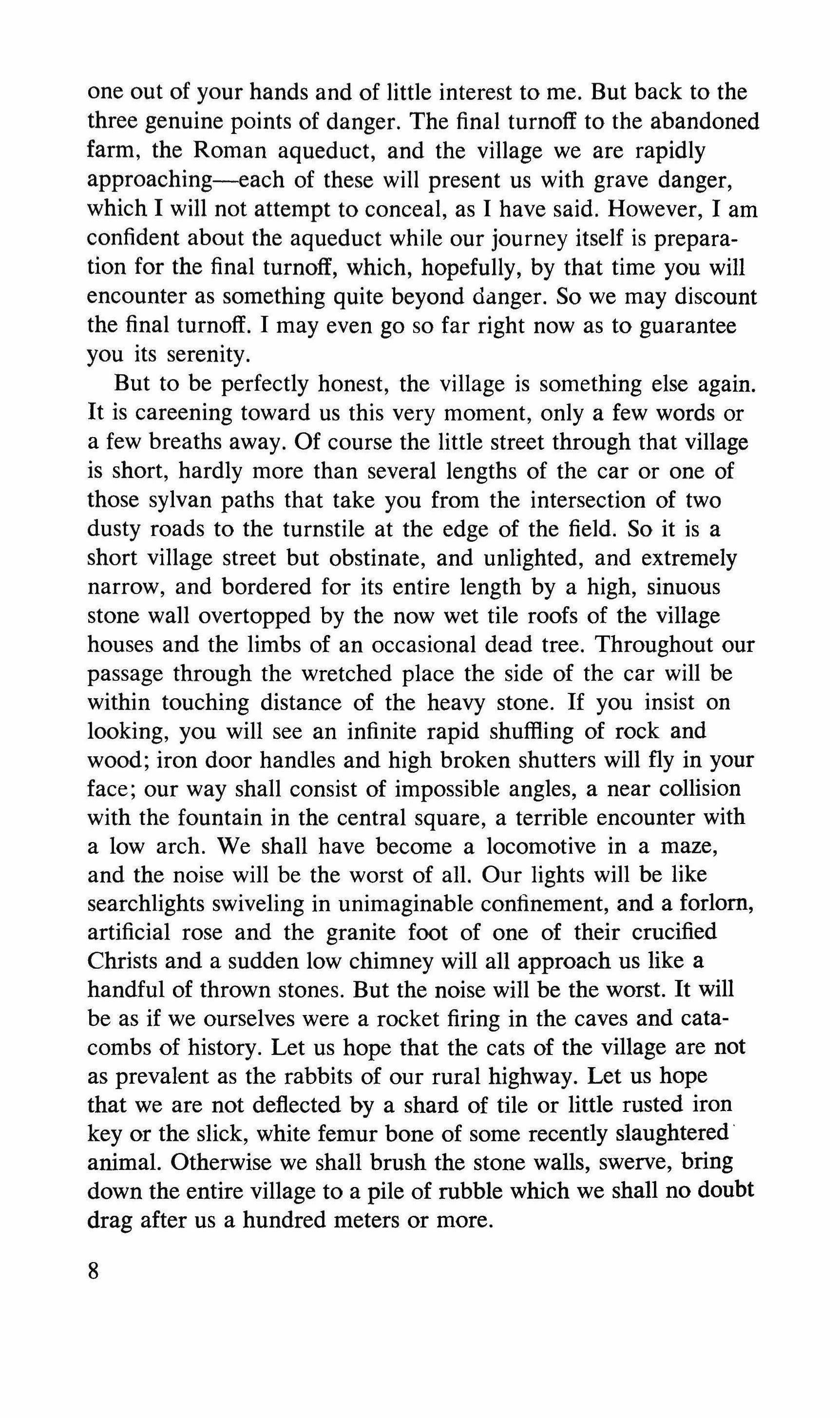
one out of your hands and of little interest to me. But back to the three genuine points of danger. The final turnoff to the abandoned farm, the Roman aqueduct, and the village we are rapidly approaching-each of these will present us with grave danger, which I will not attempt to conceal, as I have said. However, I am confident about the aqueduct while our journey itself is preparation for the final turnoff, which, hopefully, by that time you will encounter as something quite beyond danger. So we may discount the final turnoff. I may even go so far right now as to guarantee you its serenity.
But to be perfectly honest, the village is something else again. It is careening toward us this very moment, only a few words or a few breaths away. Of course the little street through that village is short, hardly more than several lengths of the car or one of those sylvan paths that take you from the intersection of two dusty roads to the turnstile at the edge of the field. So it is a short village street but obstinate, and unlighted, and extremely narrow, and bordered for its entire length by a high, sinuous stone wall overtopped by the now wet tile roofs of the village houses and the limbs of an occasional dead tree. Throughout our passage through the wretched place the side of the car will be within touching distance of the heavy stone. If you insist on looking, you will see an infinite rapid shuffling of rock and wood; iron door handles and high broken shutters will fly in your face; our way shall consist of impossible angles, a near collision with the fountain in the central square, a terrible encounter with a low arch. We shall have become a locomotive in a maze, and the noise will be the worst of all. Our lights will be like searchlights swiveling in unimaginable confinement, and a forlorn, artificial rose and the granite foot of one of their crucified Christs and a sudden low chimney will all approach us like a handful of thrown stones. But the noise will be the worst. It will be as if we ourselves were a rocket firing in the caves and catacombs of history. Let us hope that the cats of the village are not as prevalent as the rabbits of our rural highway. Let us hope that we are not deflected by a shard of tile or little rusted iron key or the slick, white femur bone of some recently slaughtered' animal. Otherwise we shall brush the stone walls, swerve, bring down the entire village to a pile of rubble which we shall no doubt drag after us a hundred meters or more.
There is nothing to be done about the sound. But you may well wish to close your eyes, or simply lean forward and bury your face in your hands. The entire deafening passage will last an eternity but also no time at all. Why see it? Why not leave the seeing as well as the driving to me? And you might amuse yourself by considering what the peasants will think when we shake their street and start them shuddering in their poor beds: that we are only an immoral man and his laughing mistress roaring through the rainy night on some devilish and frivolous escapade. Or consider what we shall leave in our wake: only an ominous trembling and a half-dozen falling tiles.
But do you see it ? Just there ? That huddled darkness f h bitati ? Th he rai ? H o a nation e stones m t e ram ere It IS.
Hold on

One night in summer, when Mother had kissed me on the left cheek and said goodnight, she turned the light off, and I was alone in the dark room. Singing to myself, I put my hand in my panties for a bit of company. But I went numb and furry; a sweetness wrapped right around me, and I wouldn't stop.
Faster and faster; I was going to burst. Kind of weights, like sugared almonds, came up from my soles to my belly, and I was filled with sugar. Thick honey trickled from everywhere, and I was drowning in sweetness.
Suddenly, when the sweetness had choked my throat, the house started to shake and rain began to fall from the sky. The earth opened up and swallowed up the houses all around, one by one. I pulled my hand out of my panties quickly.
"Little Jesus," I said, "forgive me. I'll never do it again. Don't cut my life off."
But the earth all around was still caving in. Little Jesus was really angry this time.
So I put my hand back in my panties, and the sweetness came back. I sang to myself too.
While the house was disappearing in the holed earth, the honey bathed me all over, and I died in sweetness. -translated by N. C. Germanacos

Margarita Karapanou: That afternoon a bee had stung her
"Does it hurt, Mother?"
That afternoon a bee had stung her under her nightgown, on her belly. Autumn had come. Elsewhere the leaves must have been falling from trees, the sun sad, the earth getting ready to sleep again. Here, on the bare island, only the sea had gone darker; it had become bad.
"Does it hurt, Mother?"
She took off her nightgown, went to the end of the garden, sat on a rock, naked, facing the sunset and stroking her swollen belly.
She gazed out to sea.
"Does it hurt, Mother?"
A lizard scurried into my bathing suit.
The sun poured over the sea like ink, the garden of our house was ablaze. Autumn had come, and we were alone on the island: Mother, Minos, and 1.
Minos was a father to me. He'd lift me up on his shoulders, and run deep into the sea, which was good to me, with me clinging to the back of his neck and laughing, because he was strong, and he was a man, with legs and arms. After that, we'd come home all covered with salt, Minos would close the wooden shutters and stretch himself out in the cool sheets, his eyes open, waiting for night to fall. Mother would stretch out beside him and tend him like a mermaid. I'd run off to chase lizards.
Autumn had come; only our house was still alive. Elsewhere children must have started school, with schoolbags and sharp pencils and angry and kind teachers.
The sun didn't burn any more; it went away early. I was afraid of the sea now. As soon as I touched it, it licked me, kissed me, ready to suck me in. I couldn't see the bottom any more; at noon the sky got cloudy. It was as if the sea was giving birth to autumn monsters in the depths, then hiding them down there. Its color grew darker and darker, its waves went dumb, huge. In the last few days it has become carnivorous too. Minos didn't lift me on his shoulders any more.
He took me by the hand instead, and we ran along the beach, stopping and looking at the water and shivering. When night fell, he caressed my hair and kissed me.
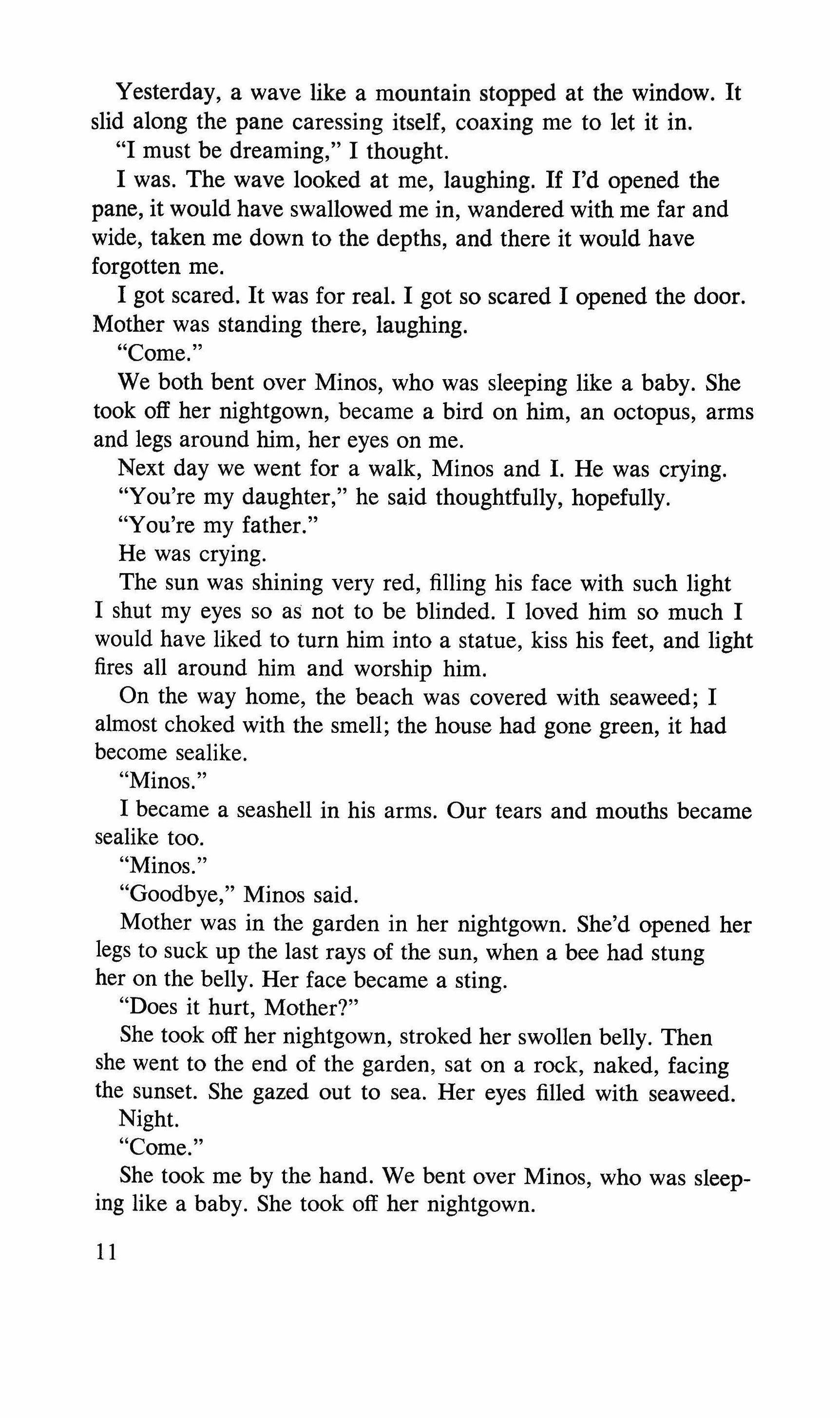
Yesterday, a wave like a mountain stopped at the window. It slid along the pane caressing itself, coaxing me to let it in.
"I must be dreaming," I thought.
I was. The wave looked at me, laughing. If I'd opened the pane, it would have swallowed me in, wandered with me far and wide, taken me down to the depths, and there it would have forgotten me.
I got scared. It was for real. I got so scared I opened the door. Mother was standing there, laughing.
"Come."
We both bent over Minos, who was sleeping like a baby. She took off her nightgown, became a bird on him, an octopus, arms and legs around him, her eyes on me.
Next day we went for a walk, Minos and I. He was crying.
"You're my daughter," he said thoughtfully, hopefully.
"You're my father."
He was crying.
The sun was shining very red, filling his face with such light I shut my eyes so as not to be blinded. I loved him so much I would have liked to turn him into a statue, kiss his feet, and light fires all around him and worship him.
On the way home, the beach was covered with seaweed; I almost choked with the smell; the house had gone green, it had become sealike.
"Minos."
I became a seashell in his arms. Our tears and mouths became sealike too.
"Minos."
"Goodbye," Minos said.
Mother was in the garden in her nightgown. She'd opened her legs to suck up the last rays of the sun, when a bee had stung her on the belly. Her face became a sting.
"Does it hurt, Mother?"
She took off her nightgown, stroked her swollen belly. Then she went to the end of the garden, sat on a rock, naked, facing the sunset. She gazed out to sea. Her eyes filled with seaweed.
Night.
"Come."
She took me by the hand. We bent over Minos, who was sleeping like a baby. She took off her nightgown.
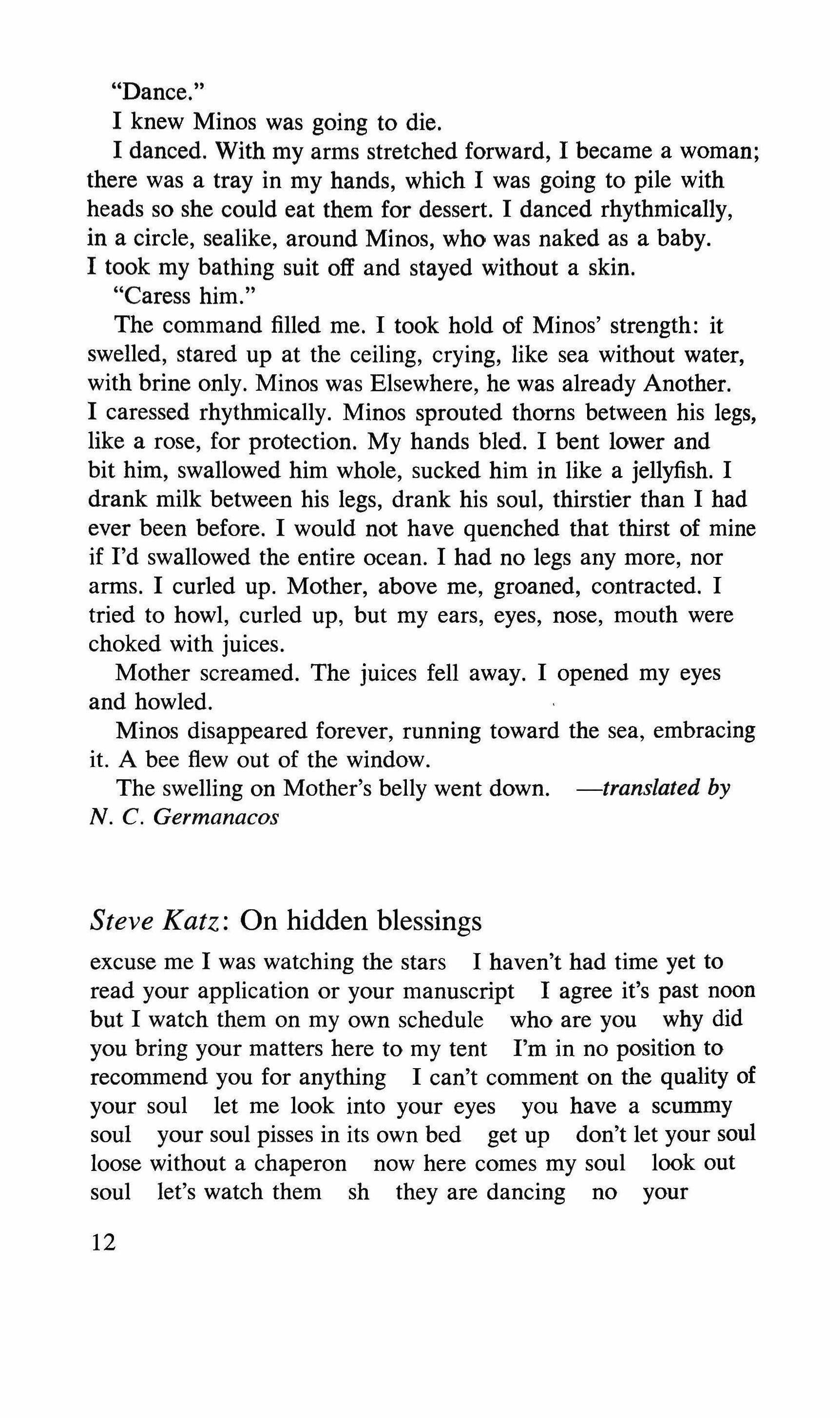
I knew Minos was going to die. I danced. With my arms stretched forward, I became a woman; there was a tray in my hands, which I was going to pile with heads so she could eat them for dessert. I danced rhythmically, in a circle, sealike, around Minos, who was naked as a baby. I took my bathing suit off and stayed without a skin. "Caress him."
The command filled me. I took hold of Minos' strength: it swelled, stared up at the ceiling, crying, like sea without water, with brine only. Minos was Elsewhere, he was already Another. I caressed rhythmically. Minos sprouted thorns between his legs, like a rose, for protection. My hands bled. I bent lower and bit him, swallowed him whole, sucked him in like a jellyfish. I drank milk between his legs, drank his soul, thirstier than I had ever been before. I would not have quenched that thirst of mine if I'd swallowed the entire ocean. I had no legs any more, nor arms. I curled up. Mother, above me, groaned, contracted. I tried to howl, curled up, but my ears, eyes, nose, mouth were choked with juices.
Mother screamed. The juices fell away. I opened my eyes and howled.
Minos disappeared forever, running toward the sea, embracing it. A bee flew out of the window.
The swelling on Mother's belly went down. -translated by N. C. Germanacos
excuse me I was watching the stars I haven't had time yet to read your application or your manuscript I agree it's past noon but I watch them on my own schedule who are you why did you bring your matters here to my tent I'm in no position to recommend you for anything I can't comment on the quality of your soul let me look into your eyes you have a scummy soul your soul pisses in its own bed get up don't let your soul loose without a chaperon now here comes my soul look out soul let's watch them sh they are dancing no your 12
soul is fucking my soul no my soul cooks dinner for your soul no our souls have heated up this tent and now we're in this hot-air balloon we are drifting over Miami the people of Miami Beach are waving at us from their wheelchairs there's Cape Kennedy stay away from it too late here comes one of those motherfucking F-111's our souls have left us here to die you steer the tent I'll hit that plane with this axe hold her steady oof got it now ease her down you're doing great come to think of it our souls did okay too we make a good team now I know you well enough to help you out here's my advice settle down somewhere in the midwest but don't get married sell farm machinery or work for the liquor commission raise a fatherless child write a couple of books based on your childhood in Buffalo New York call them Frozen Steel and Fiddler on the Root publish the first one with Alfred Knopf this is the beginning of your second book YOlJ can have it free I don't need it your career can have my career I have spoken now I'm going to close my eyes again don't mention anything I have said or anything that has happened here don't tell anyone else where I am
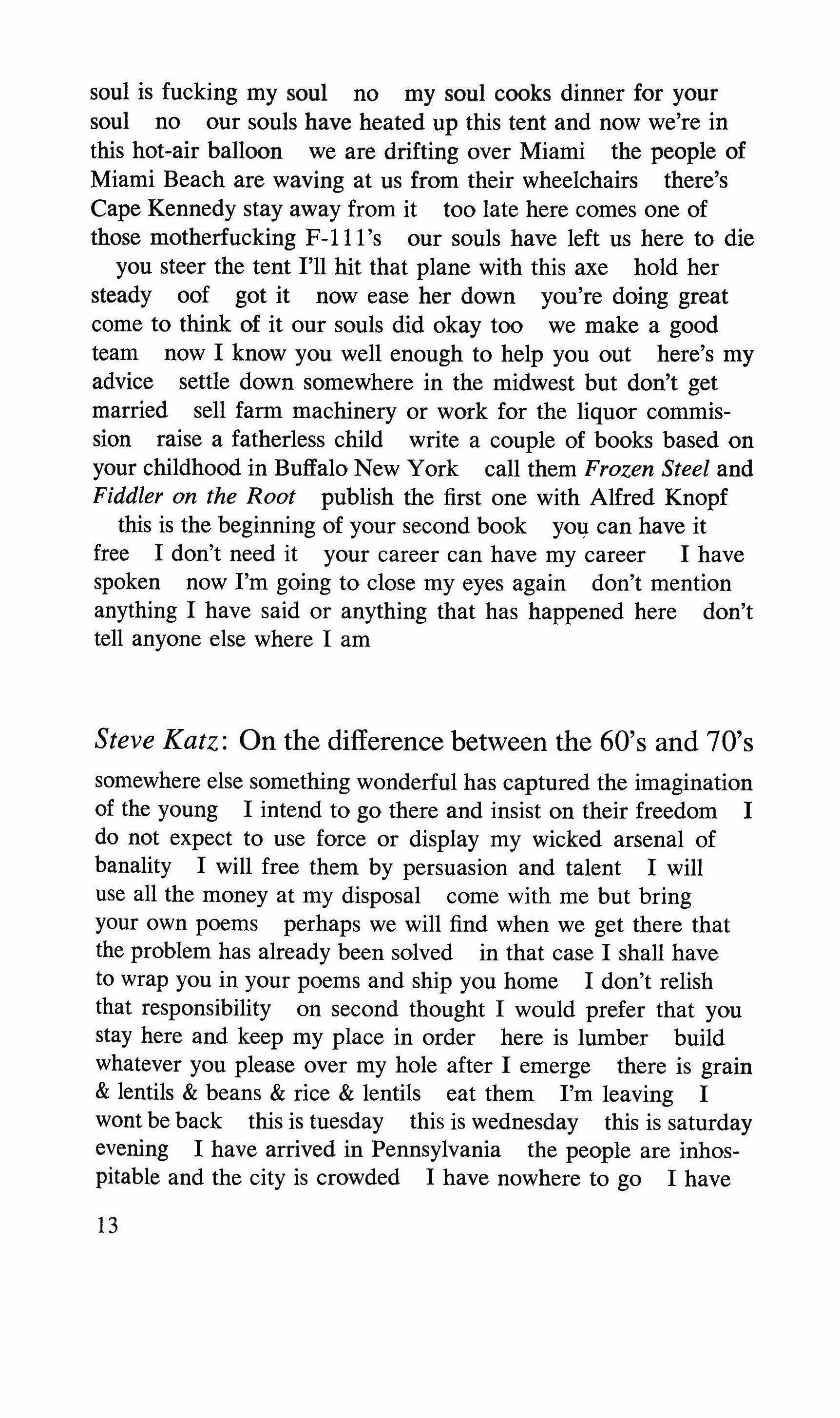
Steve Katz: On the difference between the 60's and 70's somewhere else something wonderful has captured the imagination of the young I intend to go there and insist on their freedom I do not expect to use force or display my wicked arsenal of banality I will free them by persuasion and talent I will use all the money at my disposal come with me but bring your own poems perhaps we will find when we get there that the problem has already been solved in that case I shall have to wrap you in your poems and ship you home I don't relish that responsibility on second thought I would prefer that you stay here and keep my place in order here is lumber build whatever you please over my hole after I emerge there is grain & lentils & beans & rice & lentils eat them I'm leaving I wont be back this is tuesday this is wednesday this is saturday evening I have arrived in Pennsylvania the people are inhospitable and the city is crowded I have nowhere to go I have 13
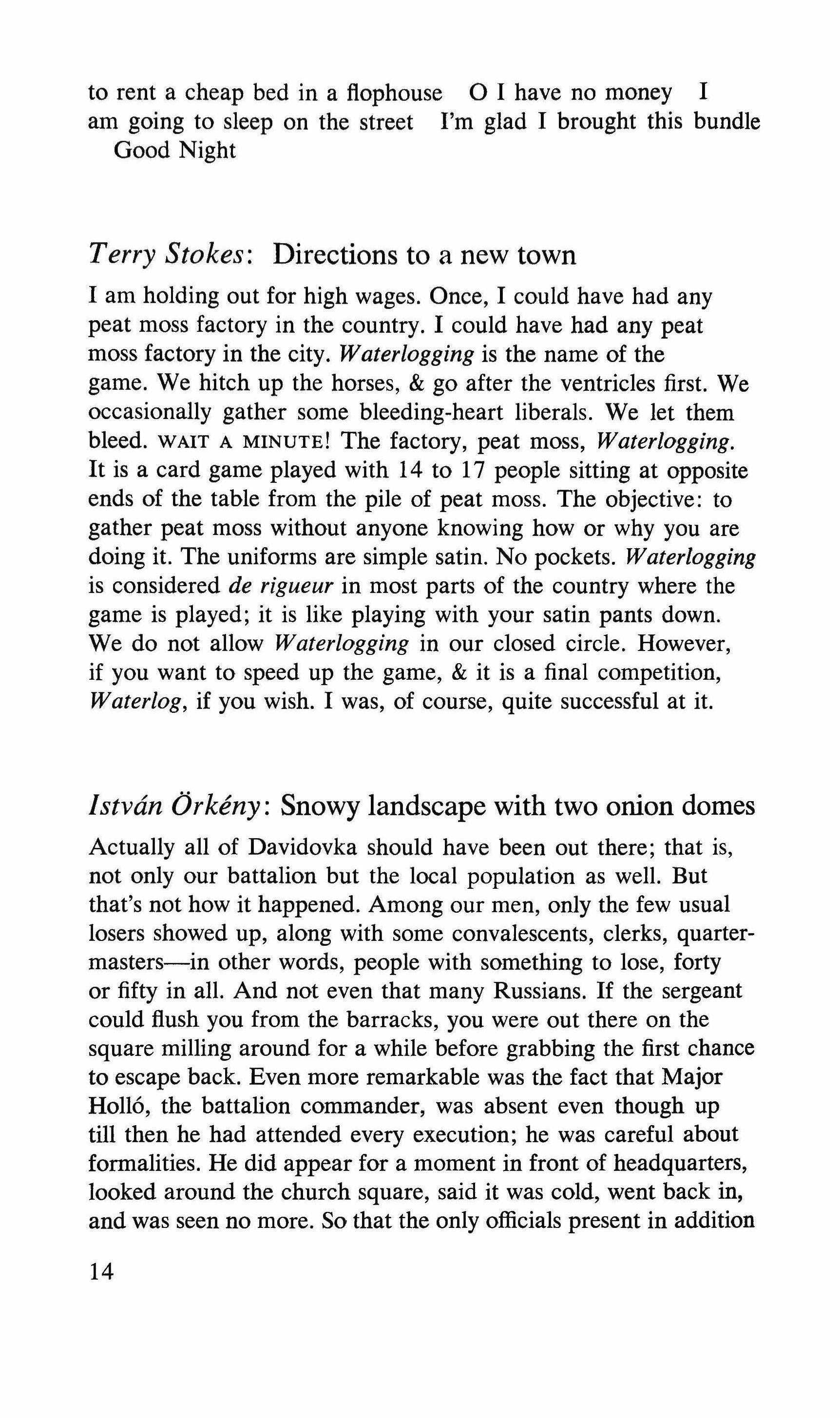
to rent a cheap bed in a flophouse 0 I have no money I am going to sleep on the street I'm glad I brought this bundle Good Night
I am holding out for high wages. Once, I could have had any peat moss factory in the country. I could have had any peat moss factory in the city. Waterlogging is the name of the game. We hitch up the horses, & go after the ventricles first. We occasionally gather some bleeding-heart liberals. We let them bleed. WAIT A MINUTE! The factory, peat moss, Waterlogging. It is a card game played with 14 to 17 people sitting at opposite ends of the table from the pile of peat moss. The objective: to gather peat moss without anyone knowing how or why you are doing it. The uniforms are simple satin. No pockets. Waterlogging is considered de rigueur in most parts of the country where the game is played; it is like playing with your satin pants down. We do not allow Waterlogging in our closed circle. However, if you want to speed up the game, & it is a final competition, Waterlog, if you wish. I was, of course, quite successful at it.
Actually all of Davidovka should have been out there; that is, not only our battalion but the local population as well. But that's not how it happened. Among our men, only the few usual losers showed up, along with some convalescents, clerks, quartermasters-in other words, people with something to lose, forty or fifty in all. And not even that many Russians. If the sergeant could flush you from the barracks, you were out there on the square milling around for a while before grabbing the first chance to escape back. Even more remarkable was the fact that Major Hollo, the battalion commander, was absent even though up till then he had attended every execution; he was careful about formalities. He did appear for a moment in front of headquarters, looked around the church square, said it was cold, went back in, and was seen no more. So that the only officials present in addition
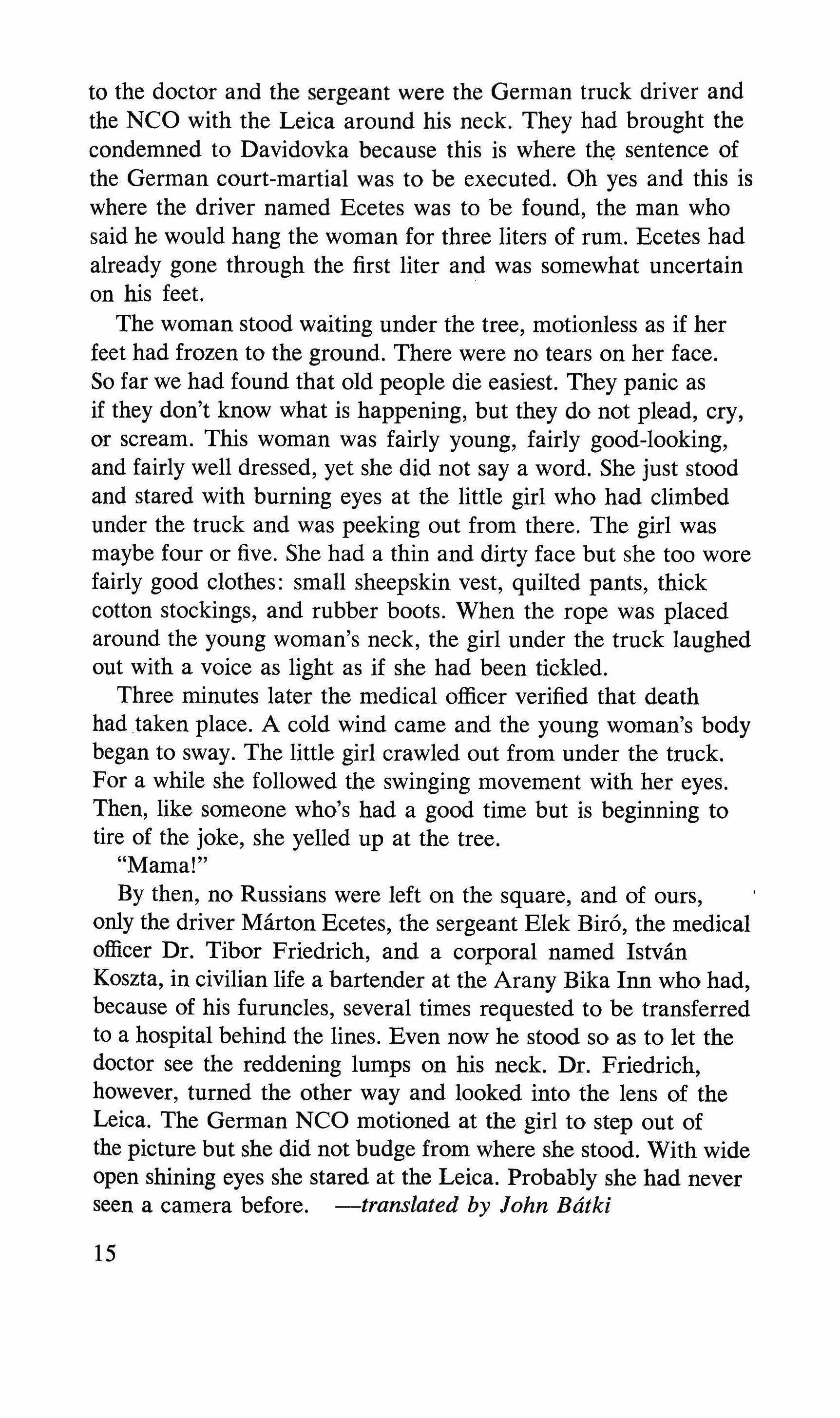
to the doctor and the sergeant were the German truck driver and the NCO with the Leica around his neck. They had brought the condemned to Davidovka because this is where the sentence of the German court-martial was to be executed. Oh yes and this is where the driver named Ecetes was to be found, the man who said he would hang the woman for three liters of rum. Ecetes had already gone through the first liter and was somewhat uncertain on his feet.
The woman stood waiting under the tree, motionless as if her feet had frozen to the ground. There were no tears on her face. So far we had found that old people die easiest. They panic as if they don't know what is happening, but they do not plead, cry, or scream. This woman was fairly young, fairly good-looking, and fairly well dressed, yet she did not say a word. She just stood and stared with burning eyes at the little girl who had climbed under the truck and was peeking out from there. The girl was maybe four or five. She had a thin and dirty face but she too wore fairly good clothes: small sheepskin vest, quilted pants, thick cotton stockings, and rubber boots. When the rope was placed around the young woman's neck, the girl under the truck laughed out with a voice as light as if she had been tickled.
Three minutes later the medical officer verified that death had .taken place. A cold wind came and the young woman's body began to sway. The little girl crawled out from under the truck. For a while she followed the swinging movement with her eyes. Then, like someone who's had a good time but is beginning to tire of the joke, she yelled up at the tree.
"Mama!"
By then, no Russians were left on the square, and of ours, only the driver Marton Ecetes, the sergeant Elek Bir6, the medical officer Dr. Tibor Friedrich, and a corporal named Istvan Koszta, in civilian life a bartender at the Arany Bika Inn who had, because of his furuncles, several times requested to be transferred to a hospital behind the lines. Even now he stood so as to let the doctor see the reddening lumps on his neck. Dr. Friedrich, however, turned the other way and looked into the lens of the Leica. The German NCO motioned at the girl to step out of the picture but she did not budge from where she stood. With wide open shining eyes she stared at the Leica. Probably she had never seen a camera before. -translated by John Bdtki
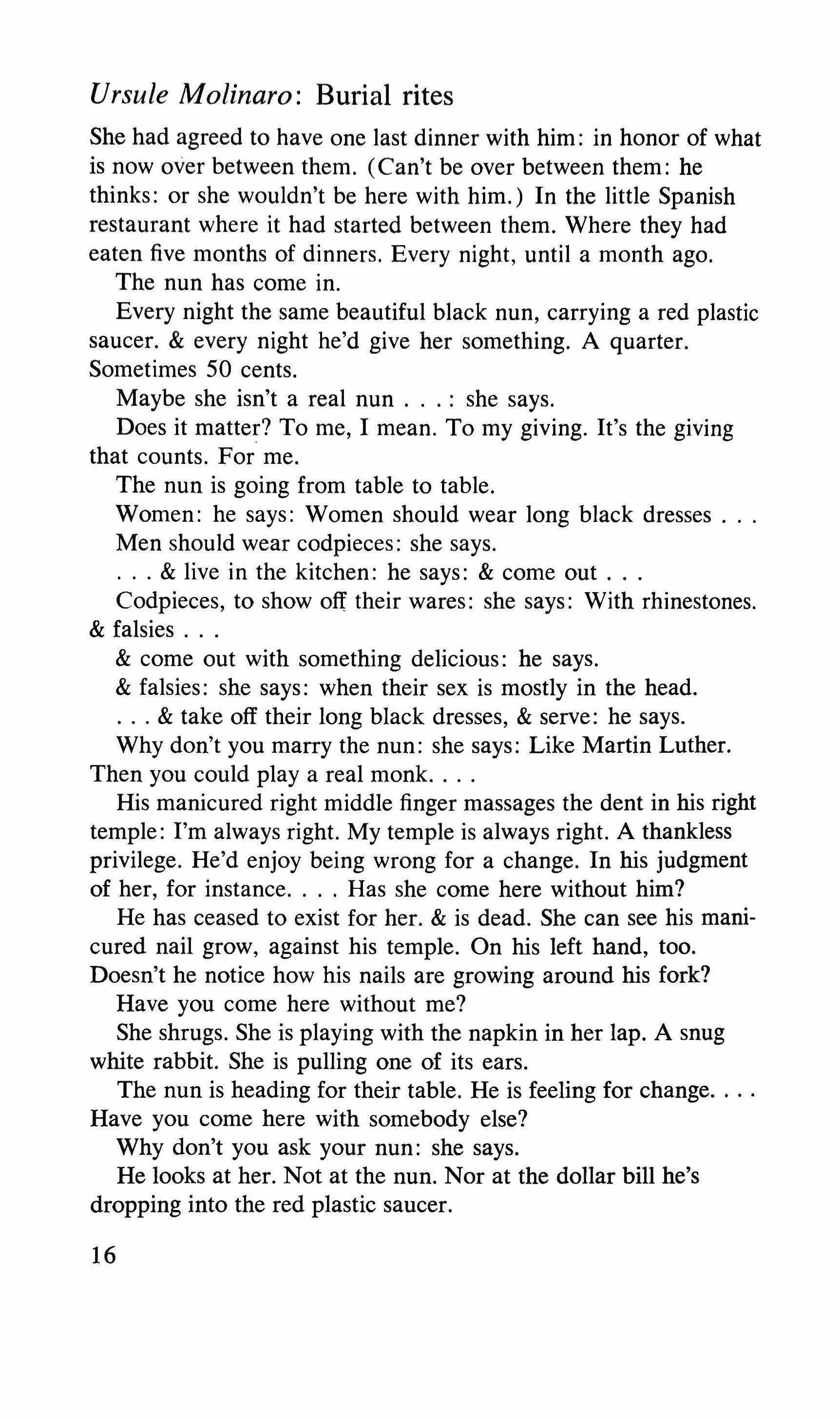 Ursule Molinaro: Burial rites
Ursule Molinaro: Burial rites
She had agreed to have one last dinner with him: in honor of what is now over between them. (Can't be over between them: he thinks: or she wouldn't be here with him.) In the little Spanish restaurant where it had started between them. Where they had eaten five months of dinners. Every night, until a month ago.
The nun has come in.
Every night the same beautiful black nun, carrying a red plastic saucer. & every night he'd give her something. A quarter. Sometimes 50 cents.
Maybe she isn't a real nun : she says. Does it matter? To me, I mean. To my giving. It's the giving that counts. For me.
The nun is going from table to table.
Women: he says: Women should wear long black dresses
Men should wear codpieces: she says & live in the kitchen: he says: & come out
Codpieces, to show off their wares: she says: With rhinestones. & falsies & come out with something delicious: he says. & falsies: she says: when their sex is mostly in the head & take off their long black dresses, & serve: he says.
Why don't you marry the nun: she says: Like Martin Luther. Then you could playa real monk
His manicured right middle finger massages the dent in his right temple: I'm always right. My temple is always right. A thankless privilege. He'd enjoy being wrong for a change. In his judgment of her, for instance Has she come here without him?
He has ceased to exist for her. & is dead. She can see his manicured nail grow, against his temple. On his left hand, too. Doesn't he notice how his nails are growing around his fork?
Have you come here without me?
She shrugs. She is playing with the napkin in her lap. A snug white rabbit. She is pulling one of its ears.
The nun is heading for their table. He is feeling for change
Have you come here with somebody else?
Why don't you ask your nun: she says.
He looks at her. Not at the nun. Nor at the dollar bill he's dropping into the red plastic saucer.
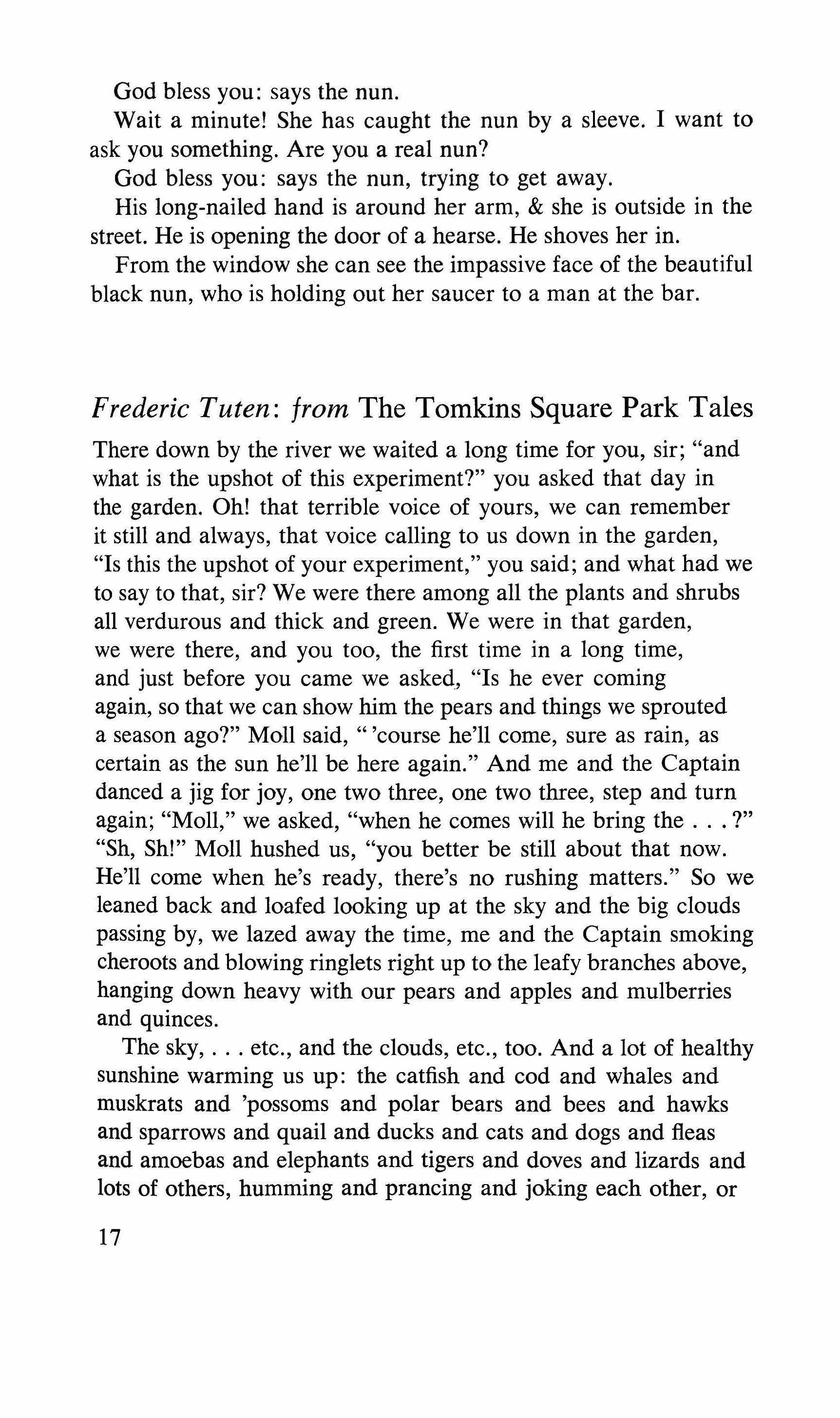
God bless you: says the nun.
Wait a minute! She has caught the nun by a sleeve. I want to ask you something. Are you a real nun?
God bless you: says the nun, trying to get away.
His long-nailed hand is around her arm, & she is outside in the street. He is opening the door of a hearse. He shoves her in.
From the window she can see the impassive face of the beautiful black nun, who is holding out her saucer to a man at the bar.
There down by the river we waited a long time for you, sir; "and what is the upshot of this experiment?" you asked that day in the garden. Oh! that terrible voice of yours, we can remember it still and always, that voice calling to us down in the garden, "Is this the upshot of your experiment," you said; and what had we to say to that, sir? We were there among all the plants and shrubs all verdurous and thick and green. We were in that garden, we were there, and you too, the first time in a long time, and just before you came we asked, "Is he ever coming again, so that we can show him the pears and things we sprouted a season ago?" Moll said, "'course he'll come, sure as rain, as certain as the sun he'll be here again." And me and the Captain danced a jig for joy, one two three, one two three, step and turn again; "Moll," we asked, "when he comes will he bring the ?" "Sh, Sh!" Moll hushed us, "you better be still about that now. He'll come when he's ready, there's no rushing matters." So we leaned back and loafed looking up at the sky and the big clouds passing by, we lazed away the time, me and the Captain smoking cheroots and blowing ringlets right up to the leafy branches above, hanging down heavy with our pears and apples and mulberries and quinces.
The sky, etc., and the clouds, etc., too. And a lot of healthy sunshine warming us up: the catfish and cod and whales and muskrats and 'possoms and polar bears and bees and hawks and sparrows and quail and ducks and cats and dogs and fleas and amoebas and elephants and tigers and doves and lizards and lots of others, humming and prancing and joking each other, or

letting each other be, each minding his own business and doing no harm to man or self. Just one of those mellow days, waiting for him but not waiting too hard or too mindfully.
Moll rolled over on her belly and showed her naked pretty golden ass, the grass tickling her other side so that she wiggled and twisted 'bout, inching 'round me and the Capt'n, 'til I could see he had a stand-on, and I had one too, no use saying the contrary, Moll's ass on the green was something to see, after all.
A big bolt from the blue!
"Is this the upshot of your experiment ? Is this the fruit of all you have learned?" That luminous voice blasted at us 'til we was peeing in the grass, getting our feet wet, so that the next day we took sick with shiver chills and cold soles. Oh! what a time. What a time.
Many views were expressed as to what would be the ideal shape of the Queen's nose, and how it could best be obtained. Some of her surgeons favored the profilometer (Straith, 1938), by which Her Majesty's nose would emerge after operation with a standard height, tip angle, and bridge line. Other surgeons modeled the patient, trying out various patterns of the future nose in the attempt to obtain Her Majesty's approval for a particular one. The principle here was rather like that of trying out a new hat.
Unfortunately, human tissues are prone to thicken and behave in a way that is unpredictable. It was felt unwise, therefore, to lay too much emphasis with Her Majesty on exact details. Generalities were discussed, such as whether a straight or a hollowed-out bridge line was to be aimed at, whether her nose was to be retrousse or not, and whether the tip was to be narrowed or left alone.
Preoperative preparation. The Queen's nostril vibrissae were cut short and her nose packed with cocaine and adrenalin as for a submucous resection of the septum. General anesthesia was preferred, the Queen's trachea being intubated and the pharynx carefully packed off around the tube.
The incisions. Bilateral vestibular incisions were made through
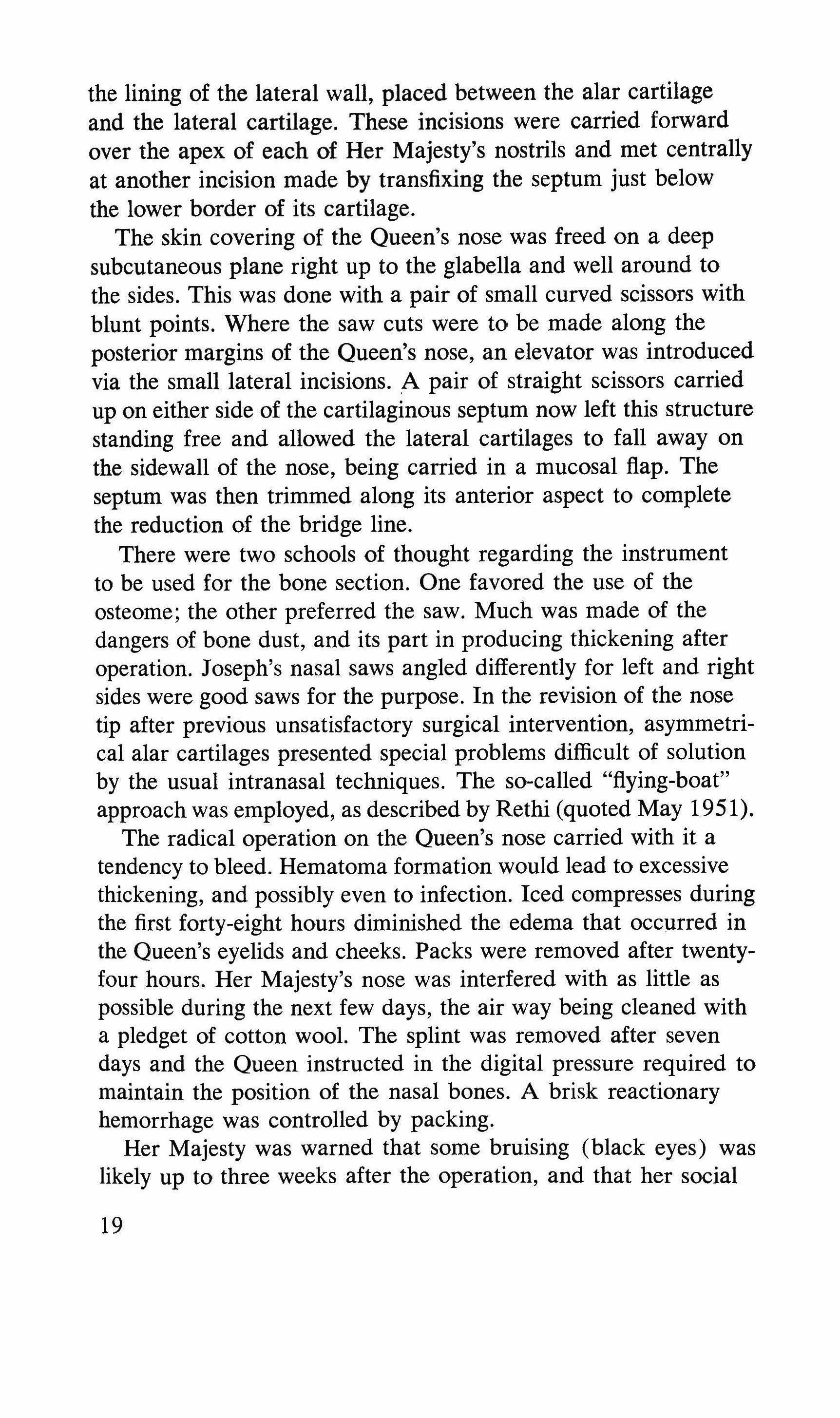
the lining of the lateral wall, placed between the alar cartilage and the lateral cartilage. These incisions were carried forward over the apex of each of Her Majesty's nostrils and met centrally at another incision made by transfixing the septum just below the lower border of its cartilage.
The skin covering of the Queen's nose was freed on a deep subcutaneous plane right up to the glabella and well around to the sides. This was done with a pair of small curved scissors with blunt points. Where the saw cuts were to be made along the posterior margins of the Queen's nose, an elevator was introduced via the small lateral incisions. A pair of straight scissors carried up on either side of the cartilaginous septum now left this structure standing free and allowed the lateral cartilages to fall away on the sidewall of the nose, being carried in a mucosal flap. The septum was then trimmed along its anterior aspect to complete the reduction of the bridge line.
There were two schools of thought regarding the instrument to be used for the bone section. One favored the use of the osteome; the other preferred the saw. Much was made of the dangers of bone dust, and its part in producing thickening after operation. Joseph's nasal saws angled differently for left and right sides were good saws for the purpose. In the revision of the nose tip after previous unsatisfactory surgical intervention, asymmetrical alar cartilages presented special problems difficult of solution by the usual intranasal techniques. The so-called "flying-boat" approach was employed, as described by Rethi (quoted May 1951).
The radical operation on the Queen's nose carried with it a tendency to bleed. Hematoma formation would lead to excessive thickening, and possibly even to infection. Iced compresses during the first forty-eight hours diminished the edema that occurred in the Queen's eyelids and cheeks. Packs were removed after twentyfour hours. Her Majesty's nose was interfered with as little as possible during the next few days, the air way being cleaned with a pledget of cotton wool. The splint was removed after seven days and the Queen instructed in the digital pressure required to maintain the position of the nasal bones. A brisk reactionary hemorrhage was controlled by packing.
Her Majesty was warned that some bruising (black eyes) was likely up to three weeks after the operation, and that her social

activities would have to be curtailed. The Queen was also informed that she should not attempt to blow her nose until the intranasal incisions were soundly healed (two weeks).
During after-care, Her Majesty found it difficult to understand that her nose was swollen, and that such edema would settle down slowly and irregularly. Her Majesty was warned that her nose should not be operated upon for a further time within six months of the previous operation.
My sickness bothers me, though I persist in denying it. It is indigestion I think and eat no onions; gout and I order no liver or goose. The possibility of nervous exhaustion keeps me abed for three days, breathing deeply. I do yoga for anxiety. But, finally, here I am amid magazines awaiting, naked to the waist, cough at the balls, needle in the vein. From my viral pneumonia days, I remember his Sheaffers desk set and the 14kt gold point. It writes prescriptions without a scratch. In the time of the bad sunburn my damaged eyes scanned the walls reading degrees and being jealous of the good-looking woman, the three boys, the weeping willow in the back yard.
I have a choice of Sports Illustrated, Time, Boy's World, others. As if by design, I choose the free pamphlet on the wall. Fleischmann's Margarine gives me some straight talk about cholesterol. I remember the ten thousand eggs of my youth, those miracles of protein that have perhaps made my interior an artgum eraser. Two over easy in the morning, a hard one every night, poached, sometimes eviscerated by mayonnaise. In many ways I have been an egg man. The pamphlet shows my heart, a small pump the size of my fist. I make a fist and stare at knuckles, white as the eggshells I wish I had eaten instead. Where did I learn that your penis is the size of your middle finger plus the distance that finger can reach down your arm. Mine cannot make it to the wrist. My heart too must be a pea in this flimsy, hairless chest. From a door marked PRIVATE a nurse, all in white, comes to me. She sits very close on the couch and looks down at my pamphlet. She takes my damp hand in hers and tickles my palm.
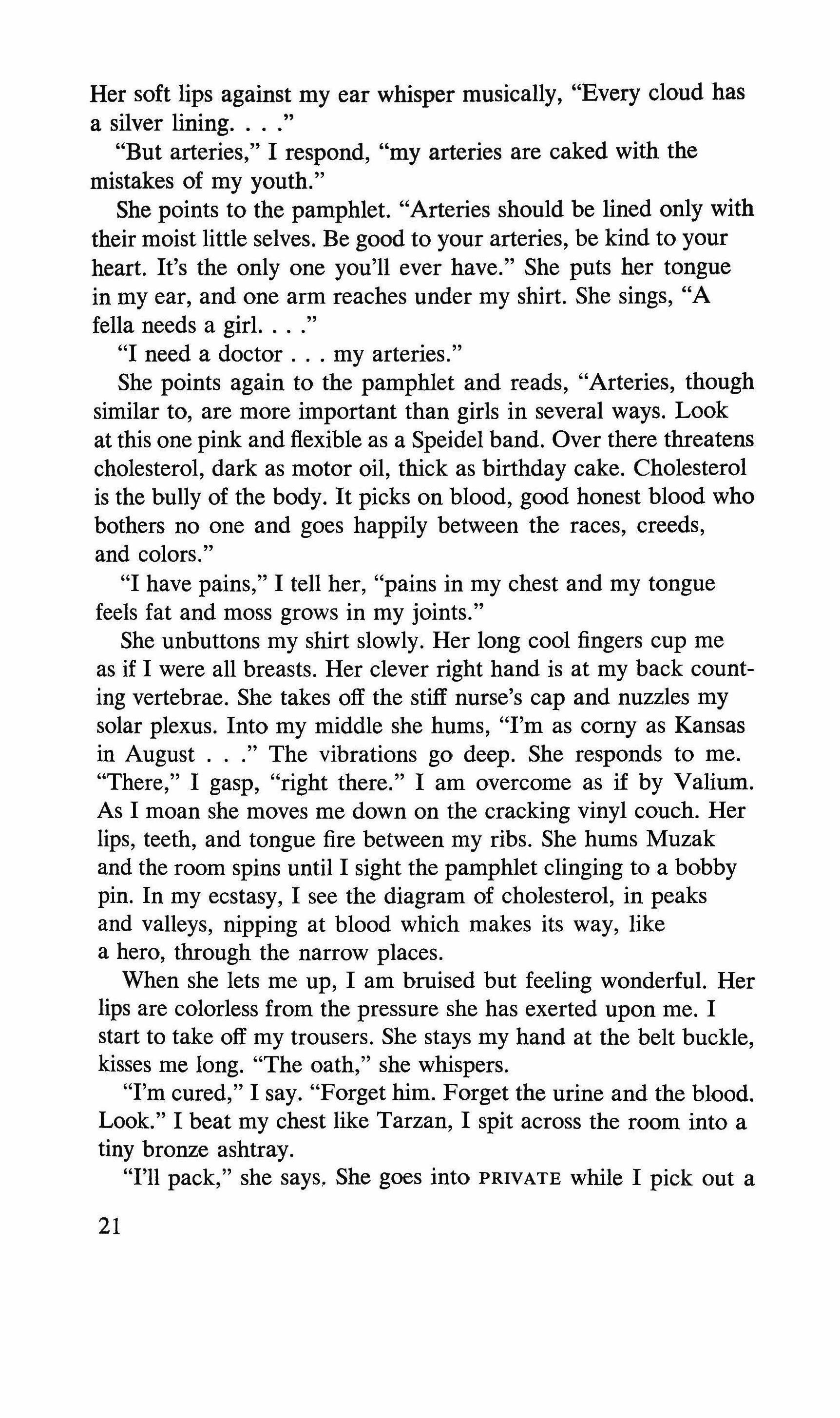
Her soft lips against my ear whisper musically, "Every cloud has a silver lining
"But arteries," I respond, "my arteries are caked with the mistakes of my youth."
She points to the pamphlet. "Arteries should be lined only with their moist little selves. Be good to your arteries, be kind to your heart. It's the only one you'll ever have." She puts her tongue in my ear, and one arm reaches under my shirt. She sings, "A fella needs a girl.
"I need a doctor my arteries."
She points again to the pamphlet and reads, "Arteries, though similar to, are more important than girls in several ways. Look at this one pink and flexible as a Speidel band. Over there threatens cholesterol, dark as motor oil, thick as birthday cake. Cholesterol is the bully of the body. It picks on blood, good honest blood who bothers no one and goes happily between the races, creeds, and colors."
"I have pains," I tell her, "pains in my chest and my tongue feels fat and moss grows in my joints."
She unbuttons my shirt slowly. Her long cool fingers cup me as if I were all breasts. Her clever right hand is at my back counting vertebrae. She takes off the stiff nurse's cap and nuzzles my solar plexus. Into my middle she hums, "I'm as corny as Kansas in August " The vibrations go deep. She responds to me. "There," I gasp, "right there." I am overcome as if by Valium. As I moan she moves me down on the cracking vinyl couch. Her lips, teeth, and tongue fire between my ribs. She hums Muzak and the room spins until I sight the pamphlet clinging to a bobby pin. In my ecstasy, I see the diagram of cholesterol, in peaks and valleys, nipping at blood which makes its way, like a hero, through the narrow places.
When she lets me up, I am bruised but feeling wonderful. Her lips are colorless from the pressure she has exerted upon me. I start to take off my trousers. She stays my hand at the belt buckle, kisses me long. "The oath," she whispers.
"I'm cured," I say. "Forget him. Forget the urine and the blood. Look." I beat my chest like Tarzan, I spit across the room into a tiny bronze ashtray.
"I'll pack," she says, She goes into PRIVATE while I pick out a
few Reader's Digests for the road, Today's Health for the bathroom. She returns carrying a centrifuge and a rack of test tubes. We embrace, then I bend to help with her things.
"Don't be cruel," she whispers, "to a heart that's true
On the way out we throw a kiss to the pharmacist and my blood slips through.
Bdtki:
In the jungle of language iridescent parrots and stern anchorites flash through the visual screen of the observer out to divine the scientific laws of the organic continuum that speaks in an infinity of frequencies ranging from a strident Squawk! to the smoothly radiating ripples in a pool. If we now abandon the nineteenth century with its Dr.-Livingstone-I-presume attitudes and exchange its scary ontological pith helmet for the strictly functional threelegged collapsible chair or blowpipe of the native, we at once become aware of certain necessary adjustments. Having shed the honkiness and paranoia of our "protective-preventive" massproduced equipment together with the critical!evaluative guise that inspired it, we must now meet the facts of nature one at a time, with the wariness of twice-burned toucans suspiciously eyeing a Brazil nut on the jungle floor. For the deceptively exciting object is fully seen only in the context of its simultaneous and informative footnote: the native at the end of the string controlling the trapdoor to the cage that encloses the cleverly disguised bait.
Bdtki:
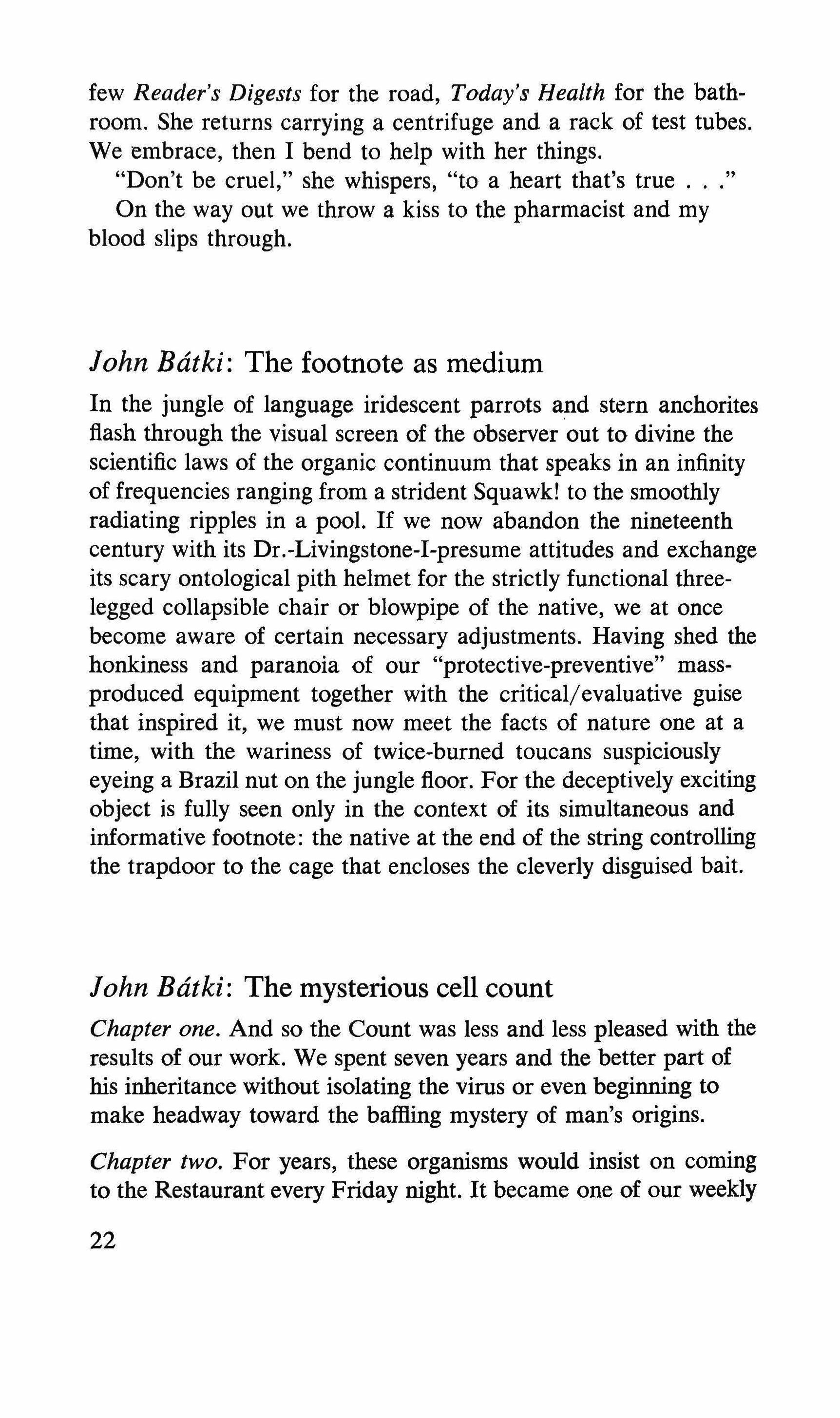
Chapter one. And so the Count was less and less pleased with the results of our work. We spent seven years and the better part of his inheritance without isolating the virus or even beginning to make headway toward the baffling mystery of man's origins.
Chapter two. For years, these organisms would insist on coming to the Restaurant every Friday night. It became one of our weekly 22
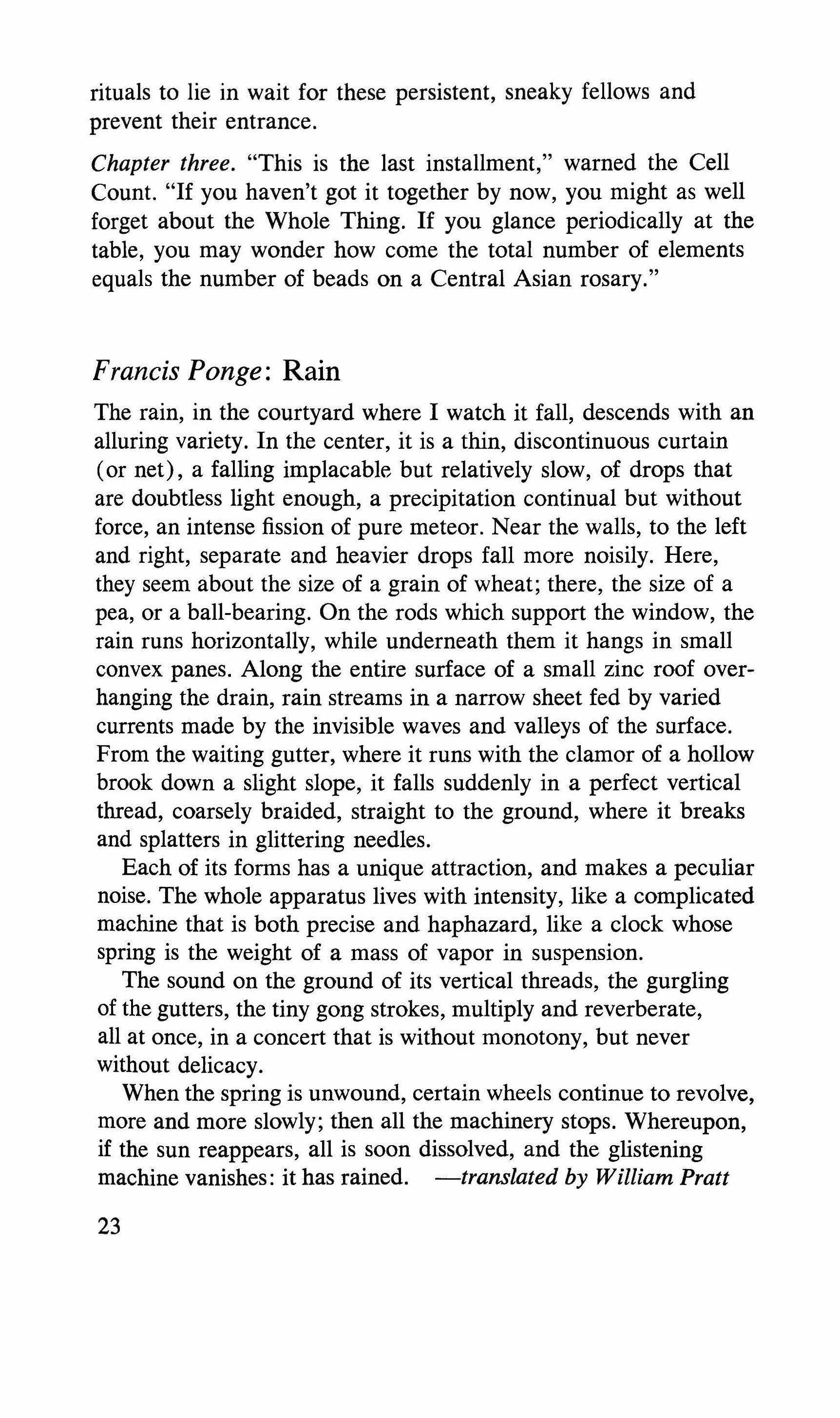
rituals to lie in wait for these persistent, sneaky fellows and prevent their entrance.
Chapter three. "This is the last installment," warned the Cell Count. "If you haven't got it together by now, you might as well forget about the Whole Thing. If you glance periodically at the table, you may wonder how come the total number of elements equals the number of beads on a Central Asian rosary."
The rain, in the courtyard where I watch it fall, descends with an alluring variety. In the center, it is a thin, discontinuous curtain (or net), a falling implacable but relatively slow, of drops that are doubtless light enough, a precipitation continual but without force, an intense fission of pure meteor. Near the walls, to the left and right, separate and heavier drops fall more noisily. Here, they seem about the size of a grain of wheat; there, the size of a pea, or a ball-bearing. On the rods which support the window, the rain runs horizontally, while underneath them it hangs in small convex panes. Along the entire surface of a small zinc roof overhanging the drain, rain streams in a narrow sheet fed by varied currents made by the invisible waves and valleys of the surface. From the waiting gutter, where it runs with the clamor of a hollow brook down a slight slope, it falls suddenly in a perfect vertical thread, coarsely braided, straight to the ground, where it breaks and splatters in glittering needles.
Each of its forms has a unique attraction, and makes a peculiar noise. The whole apparatus lives with intensity, like a complicated machine that is both precise and haphazard, like a clock whose spring is the weight of a mass of vapor in suspension.
The sound on the ground of its vertical threads, the gurgling of the gutters, the tiny gong strokes, multiply and reverberate, all at once, in a concert that is without monotony, but never without delicacy.
When the spring is unwound, certain wheels continue to revolve, more and more slowly; then all the machinery stops. Whereupon, if the sun reappears, all is soon dissolved, and the glistening machine vanishes: it has rained. -translated by William Pratt
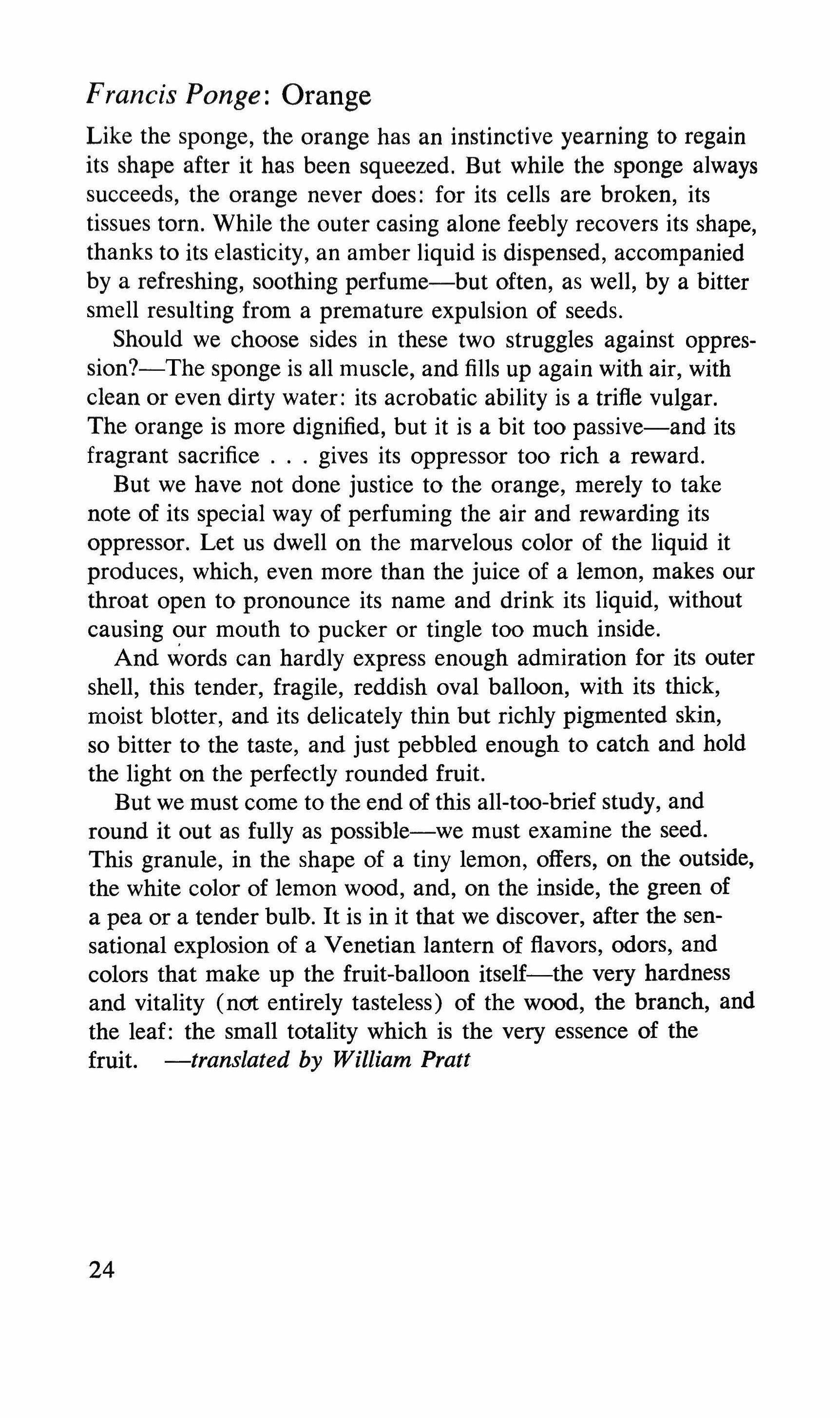
Like the sponge, the orange has an instinctive yearning to regain its shape after it has been squeezed. But while the sponge always succeeds, the orange never does: for its cells are broken, its tissues torn. While the outer casing alone feebly recovers its shape, thanks to its elasticity, an amber liquid is dispensed, accompanied by a refreshing, soothing perfume-but often, as well, by a bitter smell resulting from a premature expulsion of seeds.
Should we choose sides in these two struggles against oppression?-The sponge is all muscle, and fills up again with air, with clean or even dirty water: its acrobatic ability is a trifle vulgar. The orange is more dignified, but it is a bit too passive-and its fragrant sacrifice gives its oppressor too rich a reward.
But we have not done justice to the orange, merely to take note of its special way of perfuming the air and rewarding its oppressor. Let us dwell on the marvelous color of the liquid it produces, which, even more than the juice of a lemon, makes our throat open to pronounce its name and drink its liquid, without causing our mouth to pucker or tingle too much inside.
And words can hardly express enough admiration for its outer shell, this tender, fragile, reddish oval balloon, with its thick, moist blotter, and its delicately thin but richly pigmented skin, so bitter to the taste, and just pebbled enough to catch and hold the light on the perfectly rounded fruit.
But we must come to the end of this all-too-brief study, and round it out as fully as possible-we must examine the seed. This granule, in the shape of a tiny lemon, offers, on the outside, the white color of lemon wood, and, on the inside, the green of a pea or a tender bulb. It is in it that we discover, after the sensational explosion of a Venetian lantern of flavors, odors, and colors that make up the fruit-balloon itself-the very hardness and vitality (nat entirely tasteless) of the wood, the branch, and the leaf: the small totality which is the very essence of the fruit. -translated by William Pratt

The bank robber told his story in little notes to the bank teller. He held the pistol in one hand and gave her the notes with the other. The first note said:
This is a bank holdup because money is just like time and I need more to keep on going, so keep your hands where I can see them and don't go pressing any alarm buttons or I'll blow your head off.
The teller, a young woman of about twenty-five, felt the lights which lined her streets go on for the first time in years. She kept her hands where he could see them and didn't press any alarm buttons. Ah danger, she said to herself, you are just like love. After she read the note, she gave it back to the gunman and said: "This note is far too abstract. I really can't respond to it."
The robber, a young man of about twenty-five, felt the electricity of his thoughts in his hand as he wrote the next note. Ah money, he said to himself, you are just like love. His next note said:
This is a bank holdup because there is only one clear rule around here and that is WHEN YOU RUN OUT OF MONEY
YOU SUFFER, so keep your hands where I can see them and don't go pressing any alarm buttons or I'll blow your head off.
The young woman took the note, touching lightly the gunless hand that had written it. The touch of the gunman's hand went immediately to her memory, growing its own life there. It became a constant light toward which she could move when she was lost. She felt that she could see everything clearly as if an unknown veil had just been lifted.
"I think I understand better now," she said to the thief, looking first in his eyes and then at the gun. "But all this money will not get you what you really want." She looked at him deeply, hoping that she was becoming rich before his eyes. Ah danger, she said to herself, you are the gold that wants to spend my life.
The robber was becoming sleepy. In the gun was the weight of his dreams about this moment when it was yet to come. The gun was like the heavy eyelids of someone who wants to sleep but is not allowed.
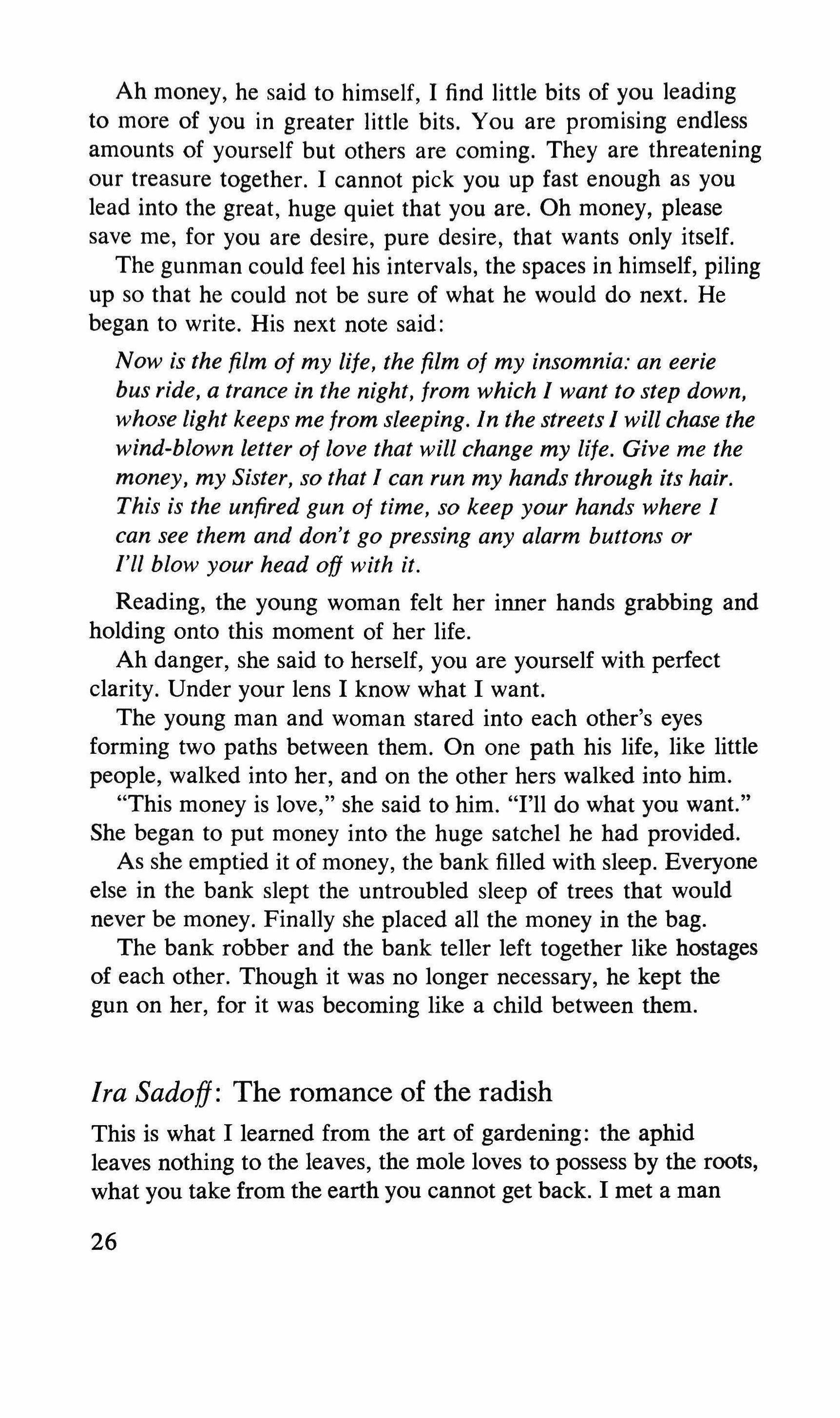
Ah money, he said to himself, I find little bits of you leading to more of you in greater little bits. You are promising endless amounts of yourself but others are coming. They are threatening our treasure together. I cannot pick you up fast enough as you lead into the great, huge quiet that you are. Oh money, please save me, for you are desire, pure desire, that wants only itself.
The gunman could feel his intervals, the spaces in himself, piling up so that he could not be sure of what he would do next. He began to write. His next note said:
Now is the film of my life, the film of my insomnia: an eerie bus ride, a trance in the night, from which I want to step down, whose light keeps me from sleeping. In the streets I will chase the wind-blown letter of love that will change my life. Give me the money, my Sister, so that I can run my hands through its hair.
This is the unfired gun of time, so keep your hands where I can see them and don't go pressing any alarm buttons or I'll blow your head off with it.
Reading, the young woman felt her inner hands grabbing and holding onto this moment of her life.
Ah danger, she said to herself, you are yourself with perfect clarity. Under your lens I know what I want.
The young man and woman stared into each other's eyes forming two paths between them. On one path his life, like little people, walked into her, and on the other hers walked into him. "This money is love," she said to him. "I'll do what you want." She began to put money into the huge satchel he had provided. As she emptied it of money, the bank filled with sleep. Everyone else in the bank slept the untroubled sleep of trees that would never be money. Finally she placed all the money in the bag.
The bank robber and the bank teller left together like hostages of each other. Though it was no longer necessary, he kept the gun on her, for it was becoming like a child between them.
This is what I learned from the art of gardening: the aphid leaves nothing to the leaves, the mole loves to possess by the roots, what you take from the earth you cannot get back. I met a man
in the garden once, he said he was without profession. Yet he was always giving advice: plant onions by the cabbage, don't sow the seeds too deep in the ground. In time he invited himself into my house, planted his feet next to mine, shoveled his tongue between my lips. At first I tried to ignore him, I asked him to leave. But something was growing between us: on days he did not come I became impatient with myself, I tore the marigolds up with the weeds. Insects were eating the tomatoes from the inside, I did not know how to save them. It turned out I needed his advice. It was months before he asked me for money, still later before he moved into my bed. Making love, he had the tongue of a chameleon, and afterward the voice of a cricket. He had an aversion to the personal: when I asked him how long he would stay, he said, "I will not leave you. I am a perennial, if I leave I'll come back-like the wild asparagus, I'll pop up where you least expect." I don't know how many times I threatened to leave him, but leaving him would mean leaving my own house, everything I owned.
He never thought me attractive: he loved to tell me how pale I looked, how I did not eat the proper foods. He'd laugh and say no one else would have me. In the winter, he would not see me at all. And in the spring, when the squash and spinach began to sprout, he wrote me letters from some place distant, told me to water every day and dust the tomatoes, make sure the men in my life would take care of me and get plenty of sun. But when the garden began to bear its full weight, I felt too weak to weed myself, I let the broccoli go to flower, I let everything else go to waste.
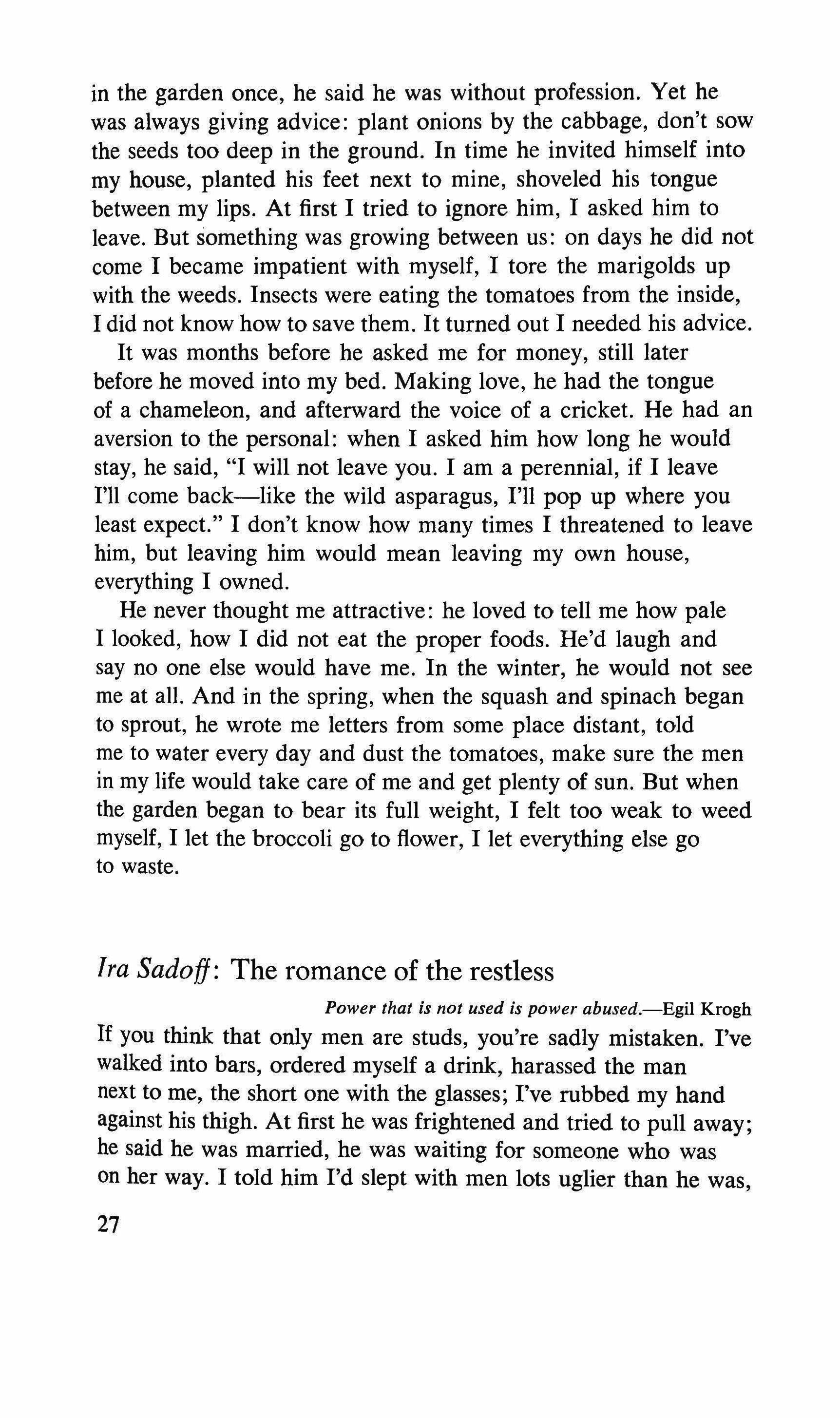
Ira Sadoff: The romance of the restless
Power that is not used is power abused.-Egil Krogh If you think that only men are studs, you're sadly mistaken. I've walked into bars, ordered myself a drink, harassed the man next to me, the short one with the glasses; I've rubbed my hand against his thigh. At first he was frightened and tried to pull away; he said he was married, he was waiting for someone who was on her way. I told him I'd slept with men lots uglier than he was, 27
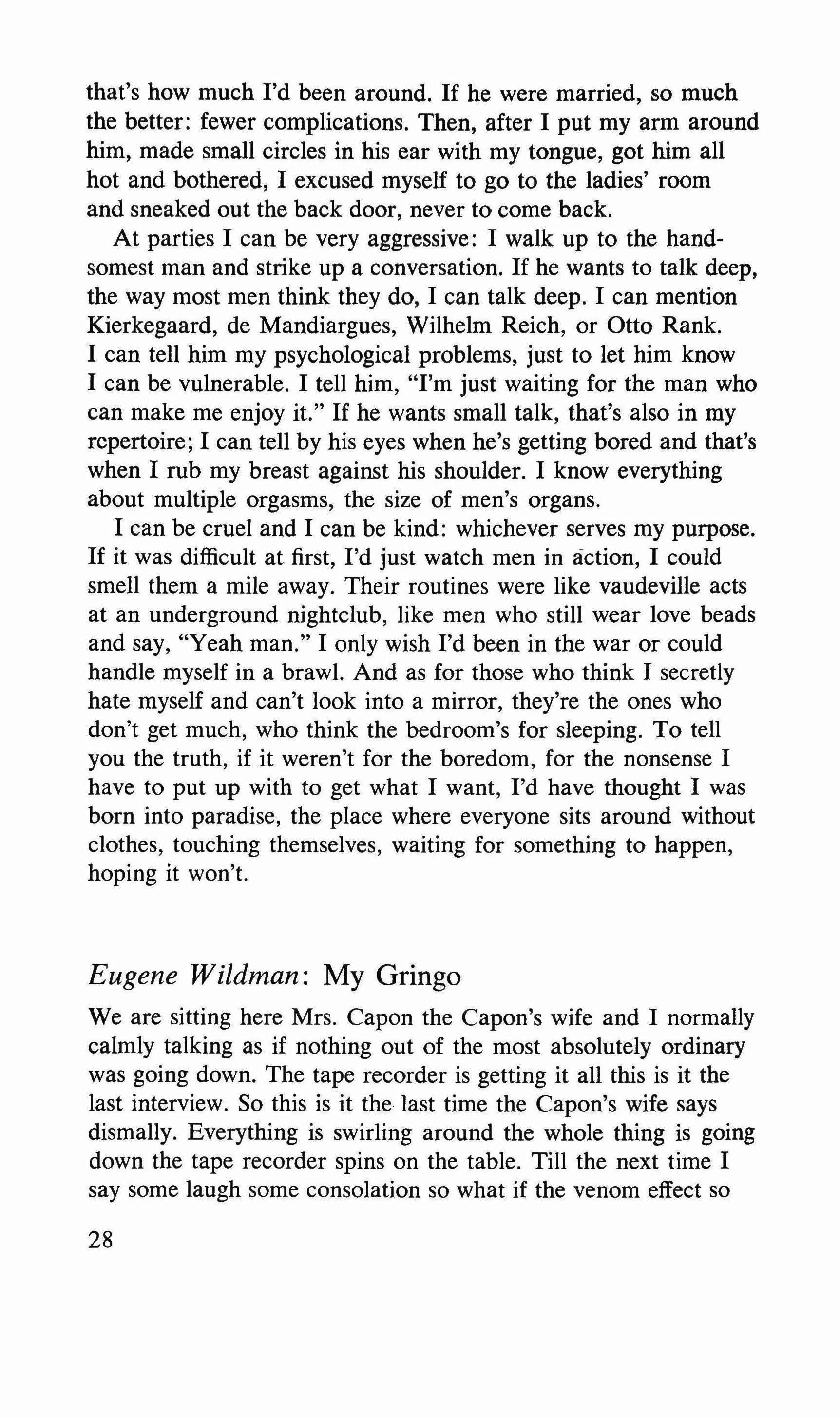
that's how much I'd been around. If he were married, so much the better: fewer complications. Then, after I put my arm around him, made small circles in his ear with my tongue, got him all hot and bothered, I excused myself to go to the ladies' room and sneaked out the back door, never to come back.
At parties I can be very aggressive: I walk up to the handsomest man and strike up a conversation. If he wants to talk deep, the way most men think they do, I can talk deep. I can mention Kierkegaard, de Mandiargues, Wilhelm Reich, or Otto Rank. I can tell him my psychological problems, just to let him know I can be vulnerable. I tell him, "I'm just waiting for the man who can make me enjoy it." If he wants small talk, that's also in my repertoire; I can tell by his eyes when he's getting bored and that's when I rub my breast against his shoulder. I know everything about multiple orgasms, the size of men's organs. I can be cruel and I can be kind: whichever serves my purpose. If it was difficult at first, I'd just watch men in action, I could smell them a mile away. Their routines were like vaudeville acts at an underground nightclub, like men who still wear love beads and say, "Yeah man." I only wish I'd been in the war or could handle myself in a brawl. And as for those who think I secretly hate myself and can't look into a mirror, they're the ones who don't get much, who think the bedroom's for sleeping. To tell you the truth, if it weren't for the boredom, for the nonsense I have to put up with to get what I want, I'd have thought I was born into paradise, the place where everyone sits around without clothes, touching themselves, waiting for something to happen, hoping it won't.
We are sitting here Mrs. Capon the Capon's wife and I normally calmly talking as if nothing out of the most absolutely ordinary was going down. The tape recorder is getting it all this is it the last interview. So this is it the last time the Capon's wife says dismally. Everything is swirling around the whole thing is going down the tape recorder spins on the table. Till the next time I say some laugh some consolation so what if the venom effect so
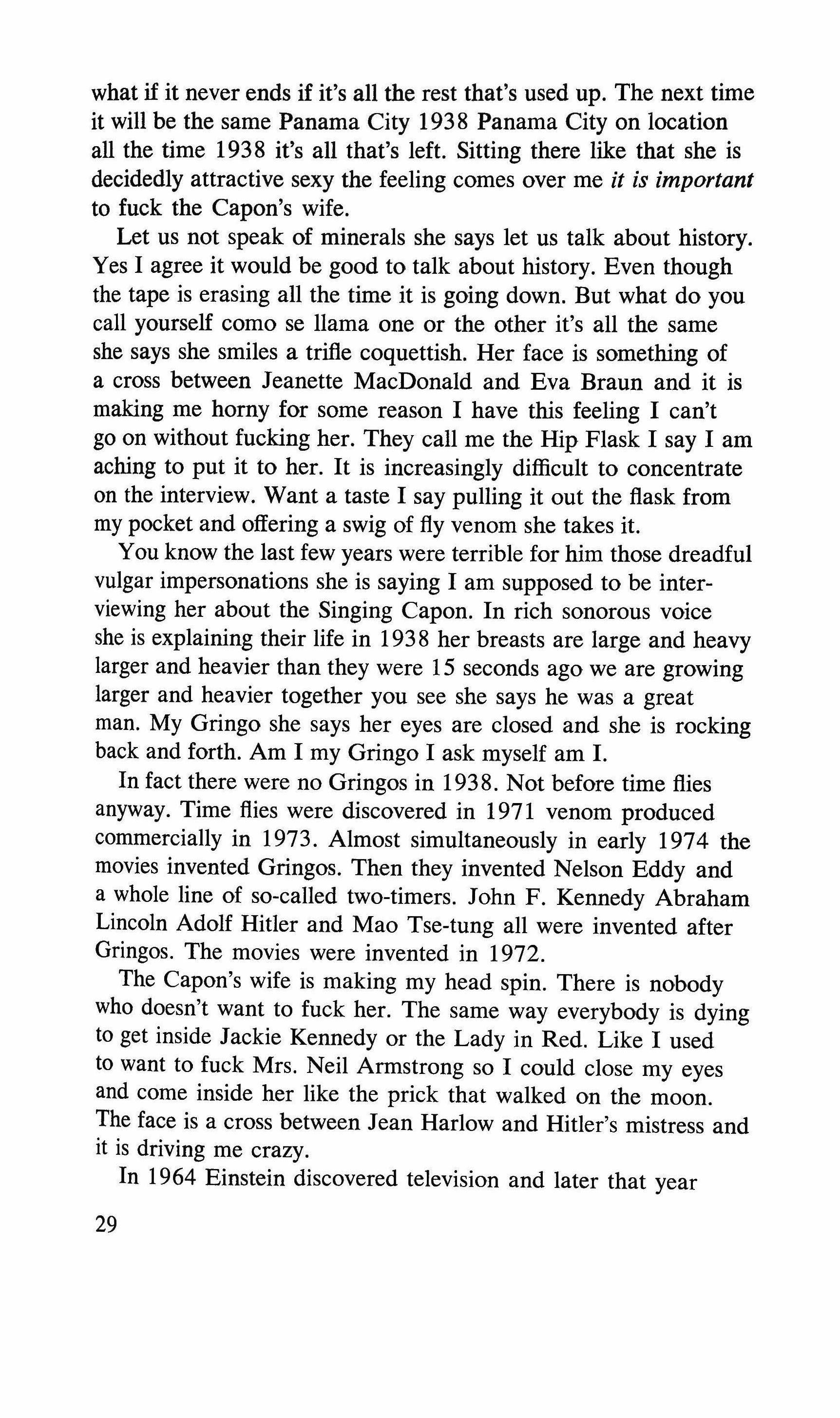
what if it never ends if it's all the rest that's used up. The next time it will be the same Panama City 1938 Panama City on location all the time 1938 it's all that's left. Sitting there like that she is decidedly attractive sexy the feeling comes over me it is important to fuck the Capon's wife.
Let us not speak of minerals she says let us talk about history. Yes I agree it would be good to talk about history. Even though the tape is erasing all the time it is going down. But what do you call yourself como se llama one or the other it's all the same she says she smiles a trifle coquettish. Her face is something of a cross between Jeanette MacDonald and Eva Braun and it is making me horny for some reason I have this feeling I can't go on without fucking her. They call me the Hip Flask I say I am aching to put it to her. It is increasingly difficult to concentrate on the interview. Want a taste I say pulling it out the flask from my pocket and offering a swig of fly venom she takes it.
You know the last few years were terrible for him those dreadful vulgar impersonations she is saying I am supposed to be interviewing her about the Singing Capon. In rich sonorous voice she is explaining their life in 1938 her breasts are large and heavy larger and heavier than they were 15 seconds ago we are growing larger and heavier together you see she says he was a great man. My Gringo she says her eyes are closed and she is rocking back and forth. Am I my Gringo I ask myself am I.
In fact there were no Gringos in 1938. Not before time flies anyway. Time flies were discovered in 1971 venom produced commercially in 1973. Almost simultaneously in early 1974 the movies invented Gringos. Then they invented Nelson Eddy and a whole line of so-called two-timers. John F. Kennedy Abraham Lincoln Adolf Hitler and Mao Tse-tung all were invented after Gringos. The movies were invented in 1972.
The Capon's wife is making my head spin. There is nobody who doesn't want to fuck her. The same way everybody is dying to get inside Jackie Kennedy or the Lady in Red. Like I used to want to fuck Mrs. Neil Armstrong so I could close my eyes and come inside her like the prick that walked on the moon. The face is a cross between Jean Harlow and Hitler's mistress and it is driving me crazy.
In 1964 Einstein discovered television and later that year 29
Edward R. Murrow invented history. The moon was invented in 1962. President Willkie outlawed television and the movies assassinated him in 1973. Margaret Mead became the first woman President and sponsored the development of artificial fly venom. Just once I keep thinking if I could just fuck you once.
I try to imagine them living together the Singing Capon and this woman but the image will not work my mind draws a blank. The fact is she is a biddy a crone she could be 100 more maybe so what is it I want from her. And suddenly I understand it everybody wants a piece of history the room is spinning all around us even to him she was the Capon's wife even to him. To make a long story short she pulls me to her you don't want to fuck me she says my Gringo my Gringo even to her she wants it too as we tumble onto the rug.
I am as much with the Capon as with her I think as I feel myself sliding into her yes she gasps yes yes. Whispering in my ear she is Madame Nhu and Hedy Lamar and Carole Lombard. It is remarkable the way the venom works the bloating effect of time has had a firming effect the breasts are hard just this once I stammer the room is spinning faster we are grinding it out up and down in time together. We are in time together in time. She and I the Capon Madame Nhu Hedy Lamar Carole Lombard Jean Harlow Jeanette MacDonald Eva Braun John F. Kennedy Abraham Lincoln Adolph Hitler Mao Tse-tung we are all fucking together.
We are almost simultaneous almost superimposed we are moving in and out of each other so quickly it is something like an implosion that works backward outward time it makes me hot she is insatiable again she keeps saying again. I come not once but 6789 times 6789 and she is still not satisfied she will not let up her sighing and moans but history has not been invented yet if only I could pull my prick out.
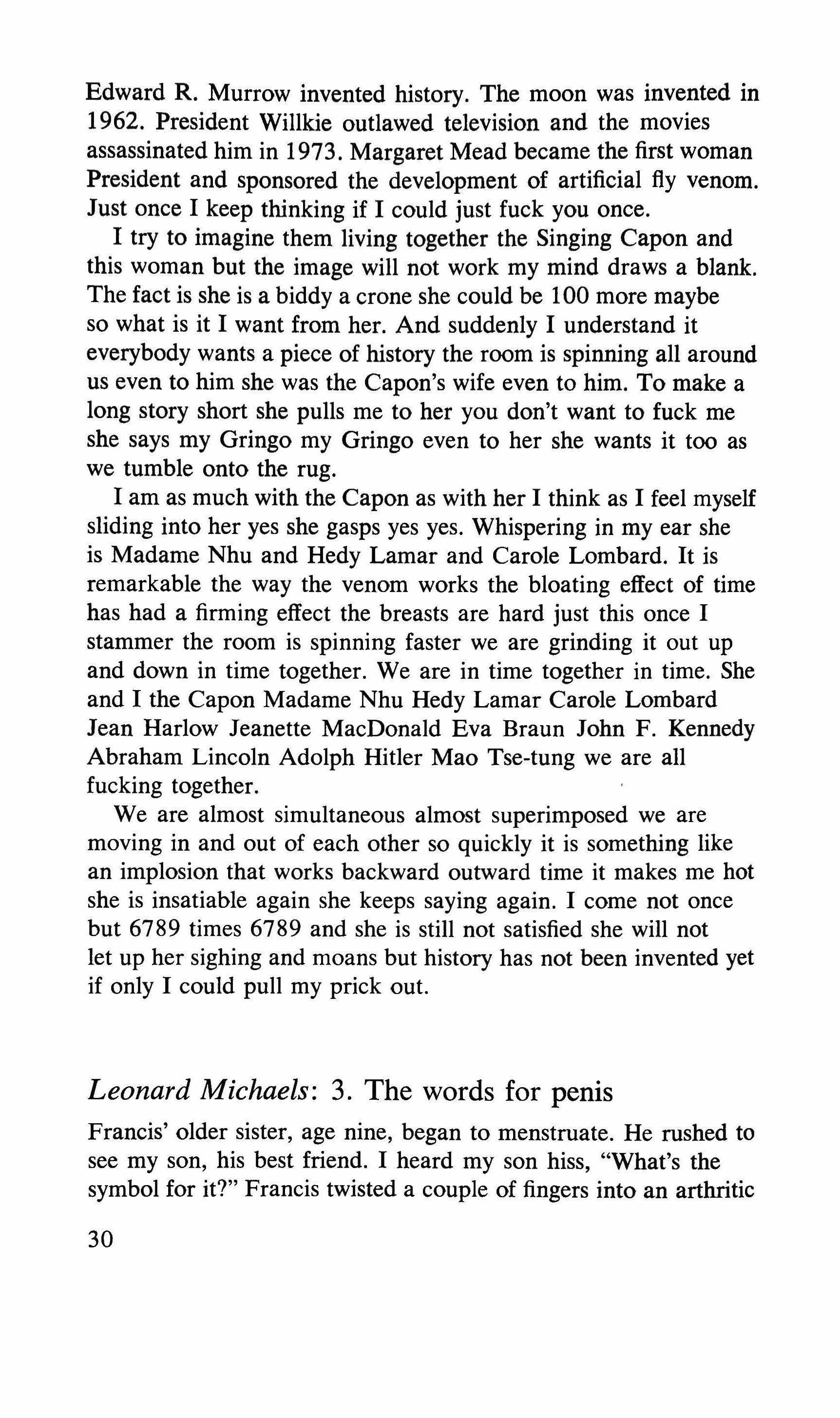
Leonard Michaels: 3. The words for penis
Francis' older sister, age nine, began to menstruate. He rushed to see my son, his best friend. I heard my son hiss, "What's the symbol for it?" Francis twisted a couple of fingers into an arthritic
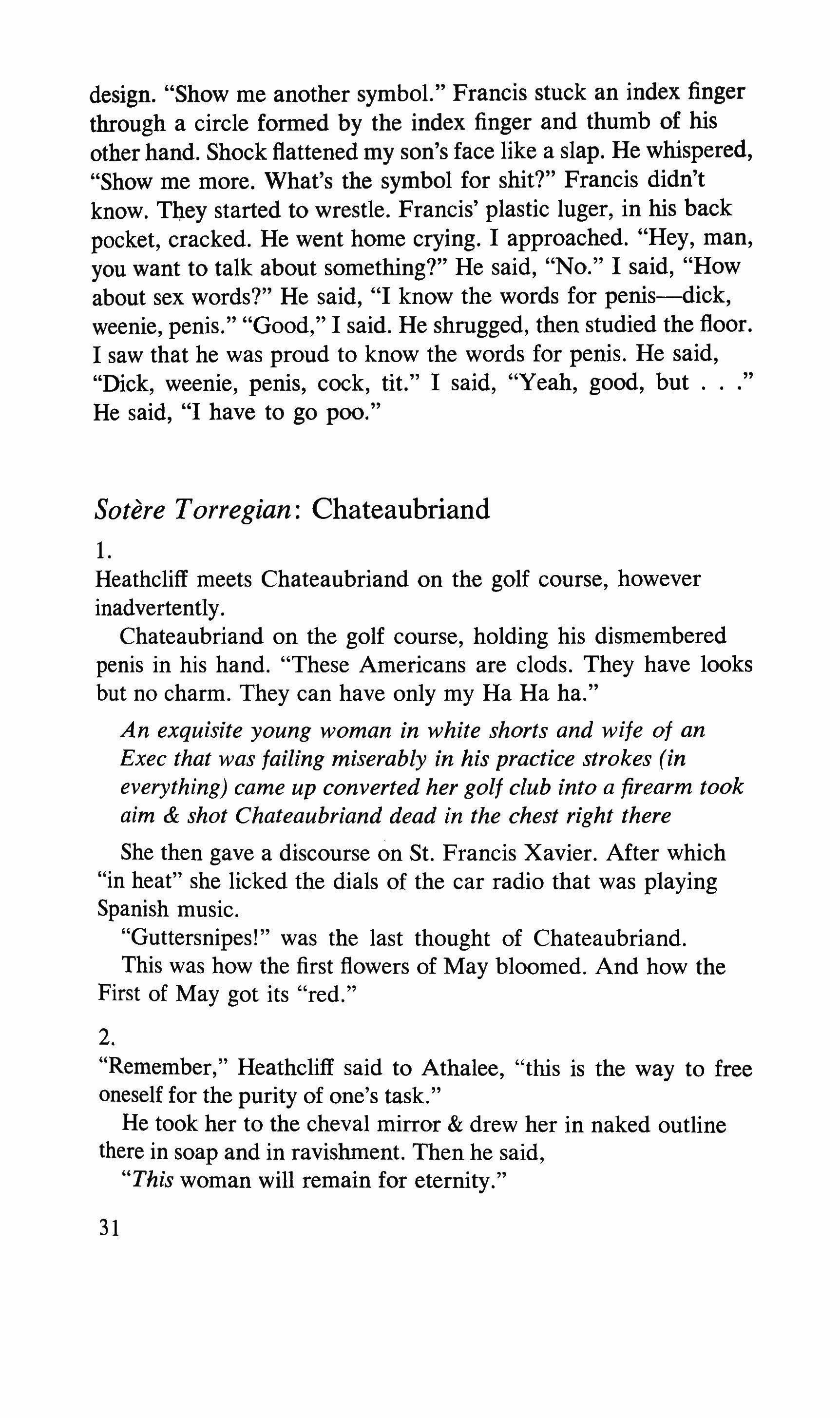
design. "Show me another symbol." Francis stuck an index finger through a circle formed by the index finger and thumb of his other hand. Shock flattened my son's face like a slap. He whispered, "Show me more. What's the symbol for shit?" Francis didn't know. They started to wrestle. Francis' plastic luger, in his back pocket, cracked. He went home crying. 1 approached. "Hey, man, you want to talk about something?" He said, "No." 1 said, "How about sex words?" He said, "I know the words for penis-dick, weenie, penis." "Good," 1 said. He shrugged, then studied the floor. I saw that he was proud to know the words for penis. He said, "Dick, weenie, penis, cock, tit." 1 said, "Yeah, good, but ." He said, "I have to go poo."
1. Heathcliff meets Chateaubriand on the golf course, however inadvertently.
Chateaubriand on the golf course, holding his dismembered penis in his hand. "These Americans are clods. They have looks but no charm. They can have only my Ha Ha ha."
An exquisite young woman in white shorts and wife of an Exec that was failing miserably in his practice strokes (in everything) came up converted her golf club into a firearm took aim & shot Chateaubriand dead in the chest right there
She then gave a discourse on St. Francis Xavier. After which "in heat" she licked the dials of the car radio that was playing Spanish music.
"Guttersnipes!" was the last thought of Chateaubriand. This was how the first flowers of May bloomed. And how the First of May got its "red."
2. "Remember," Heathcliff said to Athalee, "this is the way to free oneself for the purity of one's task."
He took her to the cheval mirror & drew her in naked outline there in soap and in ravishment. Then he said, "This woman will remain for eternity."
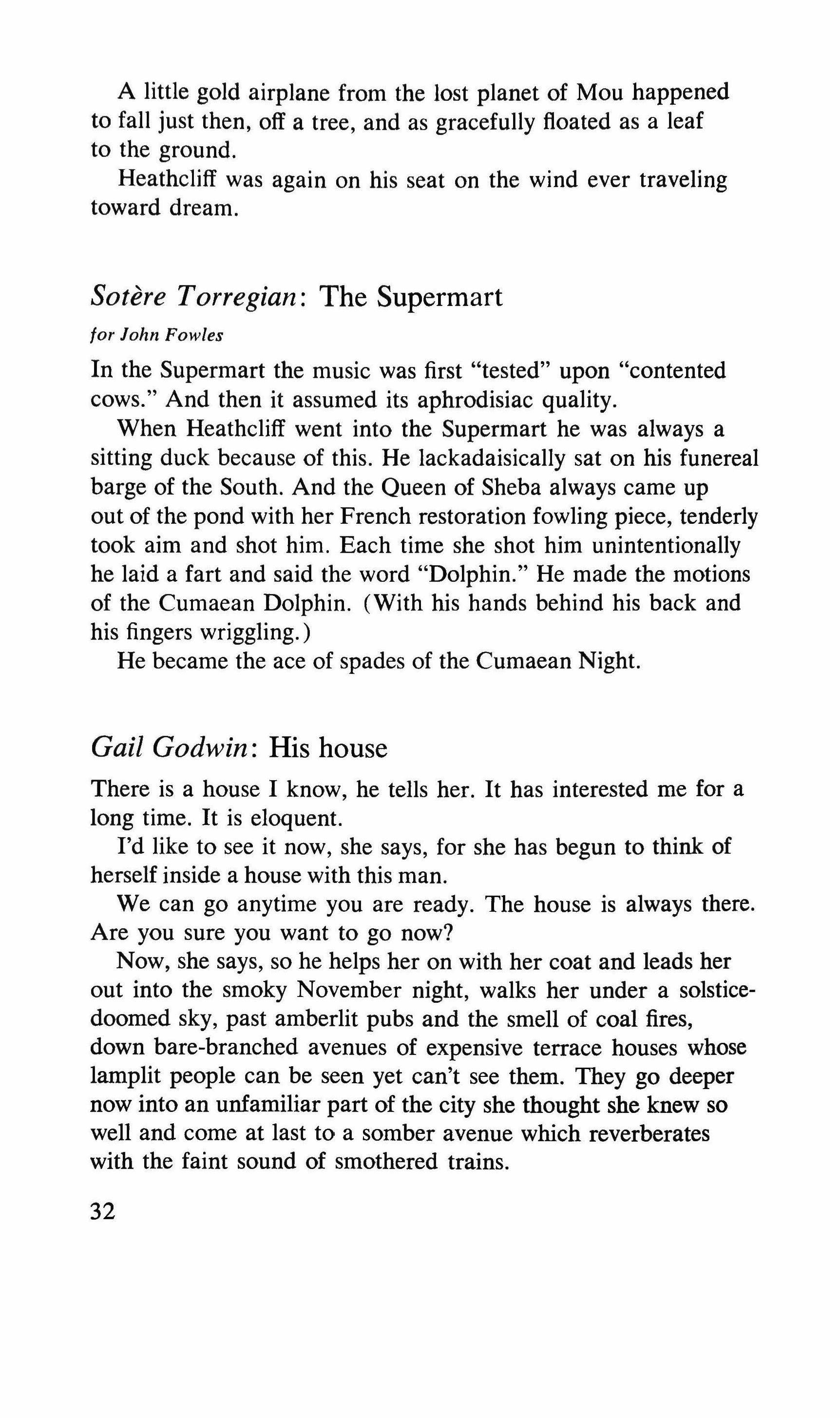
A little gold airplane from the lost planet of Mou happened to fall just then, off a tree, and as gracefully floated as a leaf to the ground.
Heathcliff was again on his seat on the wind ever traveling toward dream.
In the Supermart the music was first "tested" upon "contented cows." And then it assumed its aphrodisiac quality.
When Heathcliff went into the Supermart he was always a sitting duck because of this. He lackadaisically sat on his funereal barge of the South. And the Queen of Sheba always came up out of the pond with her French restoration fowling piece, tenderly took aim and shot him. Each time she shot him unintentionally he laid a fart and said the word "Dolphin." He made the motions of the Cumaean Dolphin. (With his hands behind his back and his fingers wriggling.)
He became the ace of spades of the Cumaean Night.
There is a house I know, he tells her. It has interested me for a long time. It is eloquent.
I'd like to see it now, she says, for she has begun to think of herself inside a house with this man.
We can go anytime you are ready. The house is always there. Are you sure you want to go now?
Now, she says, so he helps her on with her coat and leads her out into the smoky November night, walks her under a solsticedoomed sky, past amberlit pubs and the smell of coal fires, down bare-branched avenues of expensive terrace houses whose lamplit people can be seen yet can't see them. They go deeper now into an unfamiliar part of the city she thought she knew so well and come at last to a somber avenue which reverberates with the faint sound of smothered trains.
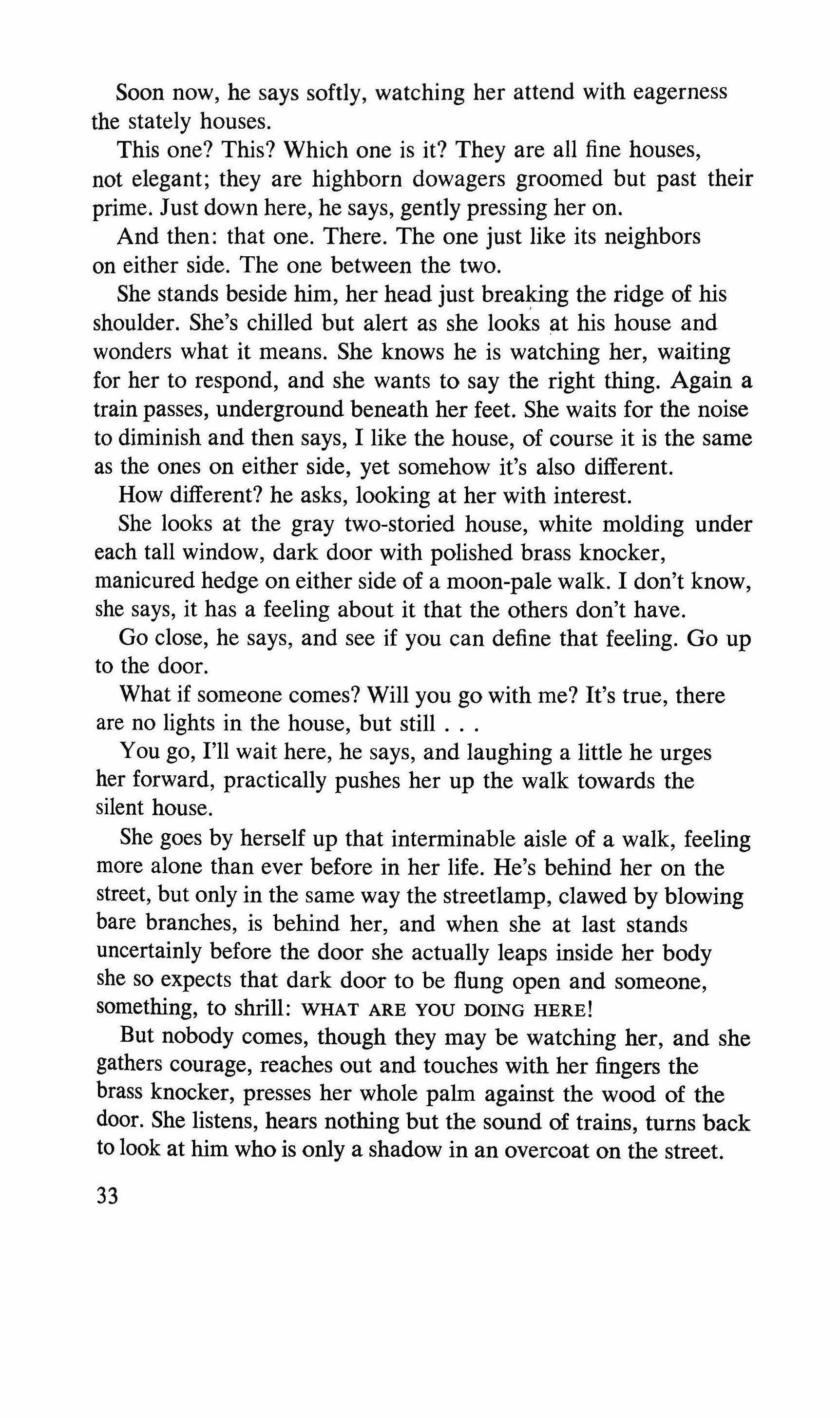
Soon now, he says softly, watching her attend with eagerness the stately houses.
This one? This? Which one is it? They are all fine houses, not elegant; they are highborn dowagers groomed but past their prime. Just down here, he says, gently pressing her on.
And then: that one. There. The one just like its neighbors on either side. The one between the two.
She stands beside him, her head just breaking the ridge of his shoulder. She's chilled but alert as she looks at his house and wonders what it means. She knows he is watching her, waiting for her to respond, and she wants to say the right thing. Again a train passes, underground beneath her feet. She waits for the noise to diminish and then says, I like the house, of course it is the same as the ones on either side, yet somehow it's also different.
How different? he asks, looking at her with interest.
She looks at the gray two-storied house, white molding under each tall window, dark door with polished brass knocker, manicured hedge on either side of a moon-pale walk. I don't know, she says, it has a feeling about it that the others don't have.
Go close, he says, and see if you can define that feeling. Go up to the door.
What if someone comes? Will you go with me? It's true, there are no lights in the house, but still
You go, I'll wait here, he says, and laughing a little he urges her forward, practically pushes her up the walk towards the silent house.
She goes by herself up that interminable aisle of a walk, feeling more alone than ever before in her life. He's behind her on the street, but only in the same way the streetlamp, clawed by blowing bare branches, is behind her, and when she at last stands uncertainly before the door she actually leaps inside her body she so expects that dark door to be flung open and someone, something, to shrill: WHAT ARE YOU DOING HERE!
But nobody comes, though they may be watching her, and she gathers courage, reaches out and touches with her fingers the brass knocker, presses her whole palm against the wood of the door. She listens, hears nothing but the sound of trains, turns back to look at him who is only a shadow in an overcoat on the street.
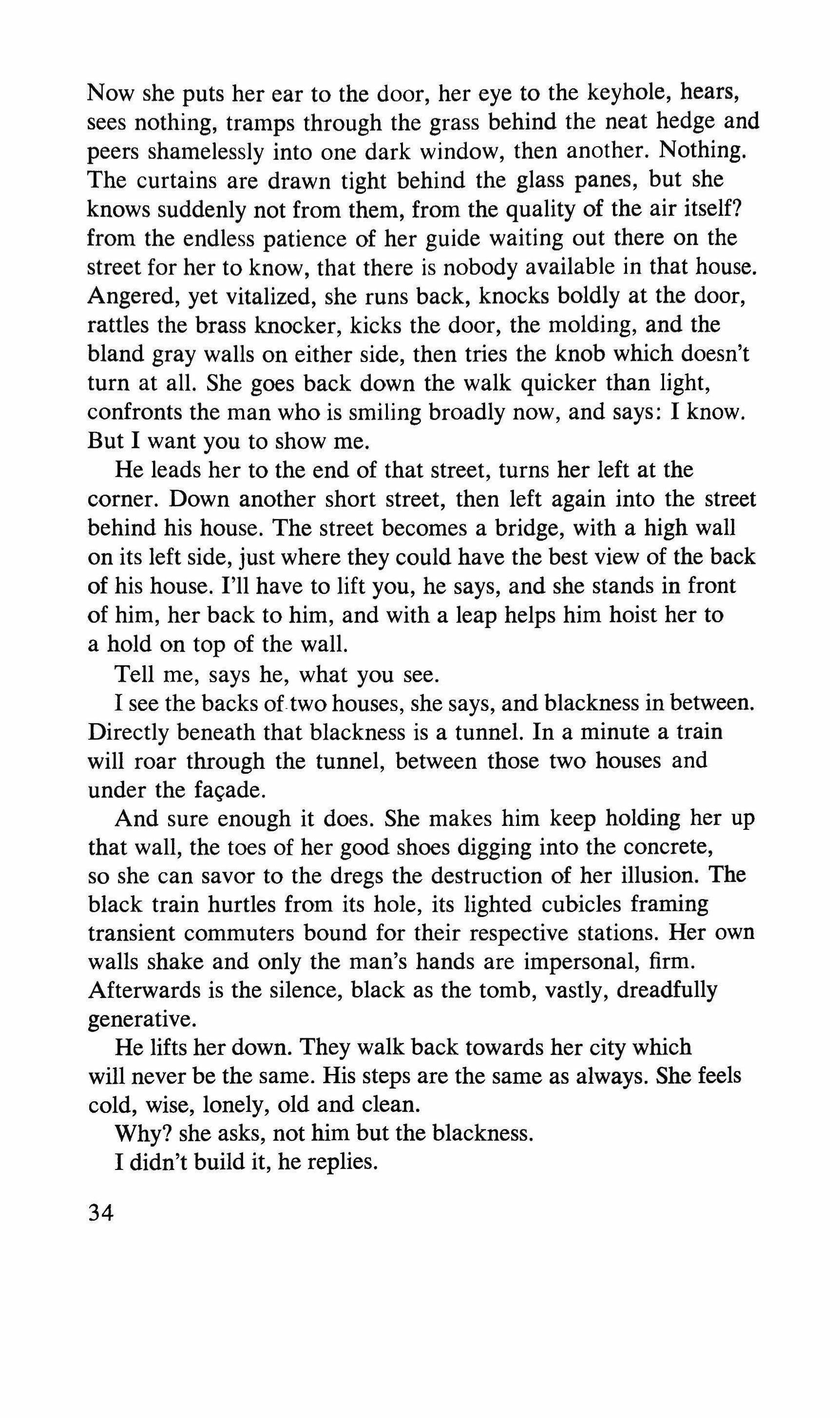
Now she puts her ear to the door, her eye to the keyhole, hears, sees nothing, tramps through the grass behind the neat hedge and peers shamelessly into one dark window, then another. Nothing. The curtains are drawn tight behind the glass panes, but she knows suddenly not from them, from the quality of the air itself? from the endless patience of her guide waiting out there on the street for her to know, that there is nobody available in that house. Angered, yet vitalized, she runs back, knocks boldly at the door, rattles the brass knocker, kicks the door, the molding, and the bland gray walls on either side, then tries the knob which doesn't turn at all. She goes back down the walk quicker than light, confronts the man who is smiling broadly now, and says: I know. But I want you to show me.
He leads her to the end of that street, turns her left at the corner. Down another short street, then left again into the street behind his house. The street becomes a bridge, with a high wall on its left side, just where they could have the best view of the back of his house. I'll have to lift you, he says, and she stands in front of him, her back to him, and with a leap helps him hoist her to a hold on top of the wall.
Tell me, says he, what you see.
I see the backs of-two houses, she says, and blackness in between. Directly beneath that blackness is a tunnel. In a minute a train will roar through the tunnel, between those two houses and under the facade.
And sure enough it does. She makes him keep holding her up that wall, the toes of her good shoes digging into the concrete, so she can savor to the dregs the destruction of her illusion. The black train hurtles from its hole, its lighted cubicles framing transient commuters bound for their respective stations. Her own walls shake and only the man's hands are impersonal, firm. Afterwards is the silence, black as the tomb, vastly, dreadfully generative.
He lifts her down. They walk back towards her city which will never be the same. His steps are the same as always. She feels cold, wise, lonely, old and clean. Why? she asks, not him but the blackness.
I didn't build it, he replies.
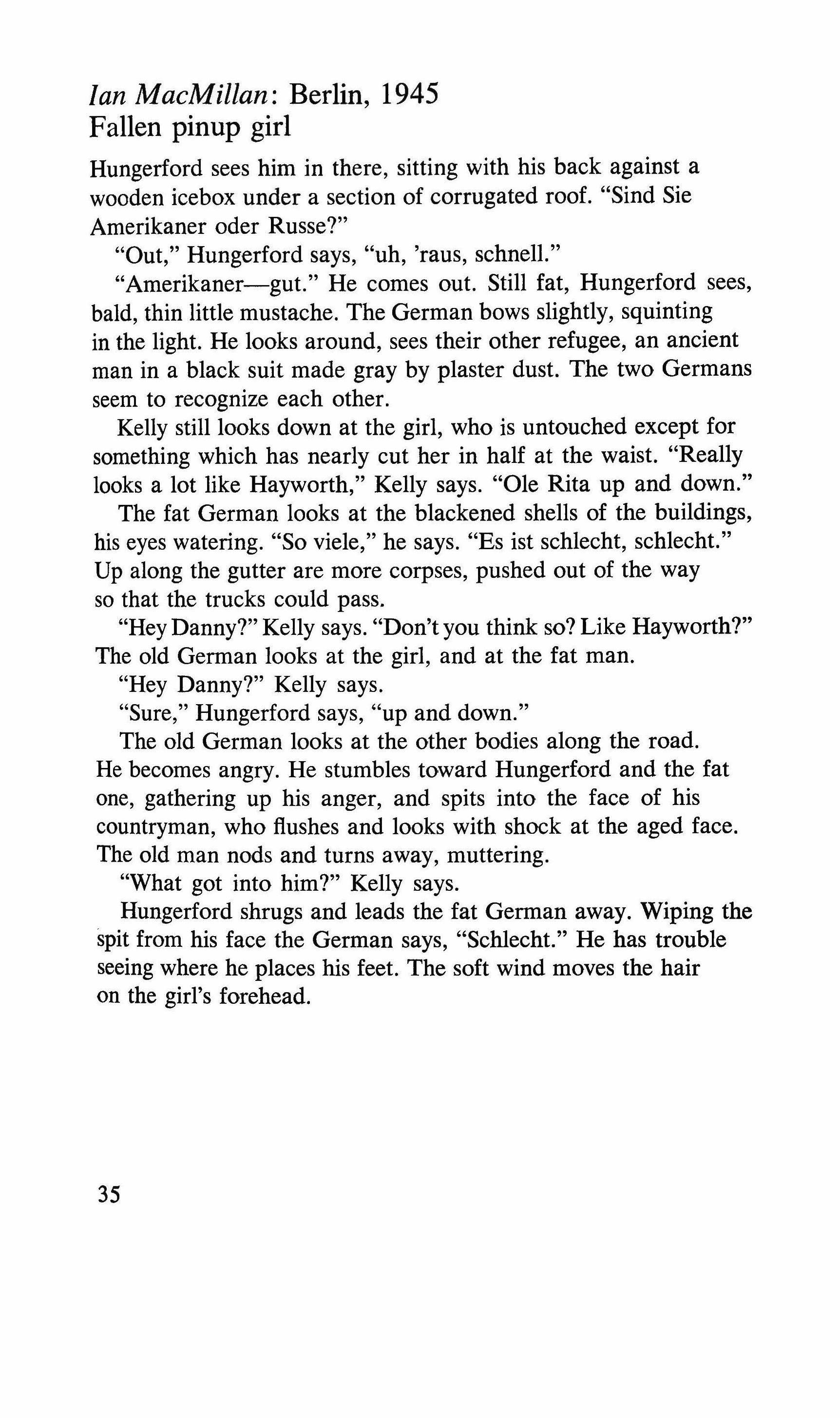
Ian MacMillan: Berlin, 1945
Hungerford sees him in there, sitting with his back against a wooden icebox under a section of corrugated roof. "Sind Sie Amerikaner oder Russe?'
"Out," Hungerford says, "uh, 'raus, schnell."
"Amerikaner-gut." He comes out. Still fat, Hungerford sees, bald, thin little mustache. The German bows slightly, squinting in the light. He looks around, sees their other refugee, an ancient man in a black suit made gray by plaster dust. The two Germans seem to recognize each other.
Kelly still looks down at the girl, who is untouched except for something which has nearly cut her in half at the waist. "Really looks a lot like Hayworth," Kelly says. "Ole Rita up and down."
The fat German looks at the blackened shells of the buildings, his eyes watering. "So viele," he says. "Es ist schlecht, schlecht." Up along the gutter are more corpses, pushed out of the way so that the trucks could pass.
"Hey Danny?" Kelly says. "Don't you think so? Like Hayworth?" The old German looks at the girl, and at the fat man.
"Hey Danny?" Kelly says.
"Sure," Hungerford says, "up and down."
The old German looks at the other bodies along the road. He becomes angry. He stumbles toward Hungerford and the fat one, gathering up his anger, and spits into the face of his countryman, who flushes and looks with shock at the aged face. The old man nods and turns away, muttering.
"What got into him?" Kelly says.
Hungerford shrugs and leads the fat German away. Wiping the spit from his face the German says, "Schlecht." He has trouble seeing where he places his feet. The soft wind moves the hair on the girl's forehead.

Irmhild Stauffer walks down the dusty Messinghausen street lugging in her right hand the heavy container of milk, seeing by her shadow that her body is offset by its weight, and it seems to her that she has passed the entire war listening to her own footfalls. Only once did she see troops passing. And to where? She could not remember the direction. Brilon, to the north, where nothing of any value could be contested? Niedermarsburg to the south, where nothing of any value existed either? So went the first war too. Her husband, children, all had gone off, the men to die in both, wars, and her daughter doubtless to a more sinful end in Duisburg. She walks against the direction of the current of the stream which runs along the rail tracks, through the gorge from Brilon. She sees the little crowd coming in her direction, pointing down at the water, the men talking, the women covering their faces and retreating to the other side of the road. Some object in the water draws them along, makes the crowd increase in size as it approaches her. Old Mueller, who forty years ago was almost her lover, maintains his stern gait in the effort of walking so fast, and gestures at the sky with his cane.
She puts the can down. The object, she sees now, is an arm, with a military sleeve tightly containing it, with a bloated hand traveling always palm up, whirling slowly in the gentle eddies like a small ship in a sea storm. She stands still and lets the crowd pass, streaming by her. Mueller's cane brushes against her skirt. They continue on, discussing the bloated arm as it goes on its southward journey. She picks up the can and continues toward her house. When she reaches it, aching from the effort, she stands on the porch and watches the crowd, which is nearly twice the size of the one which briefly engulfed her a minute ago. It follows the arm out the other end of town. She leaves the milk on the porch and goes into the house to look one by one, and with close attention, at the many photographs of her husband and sons.
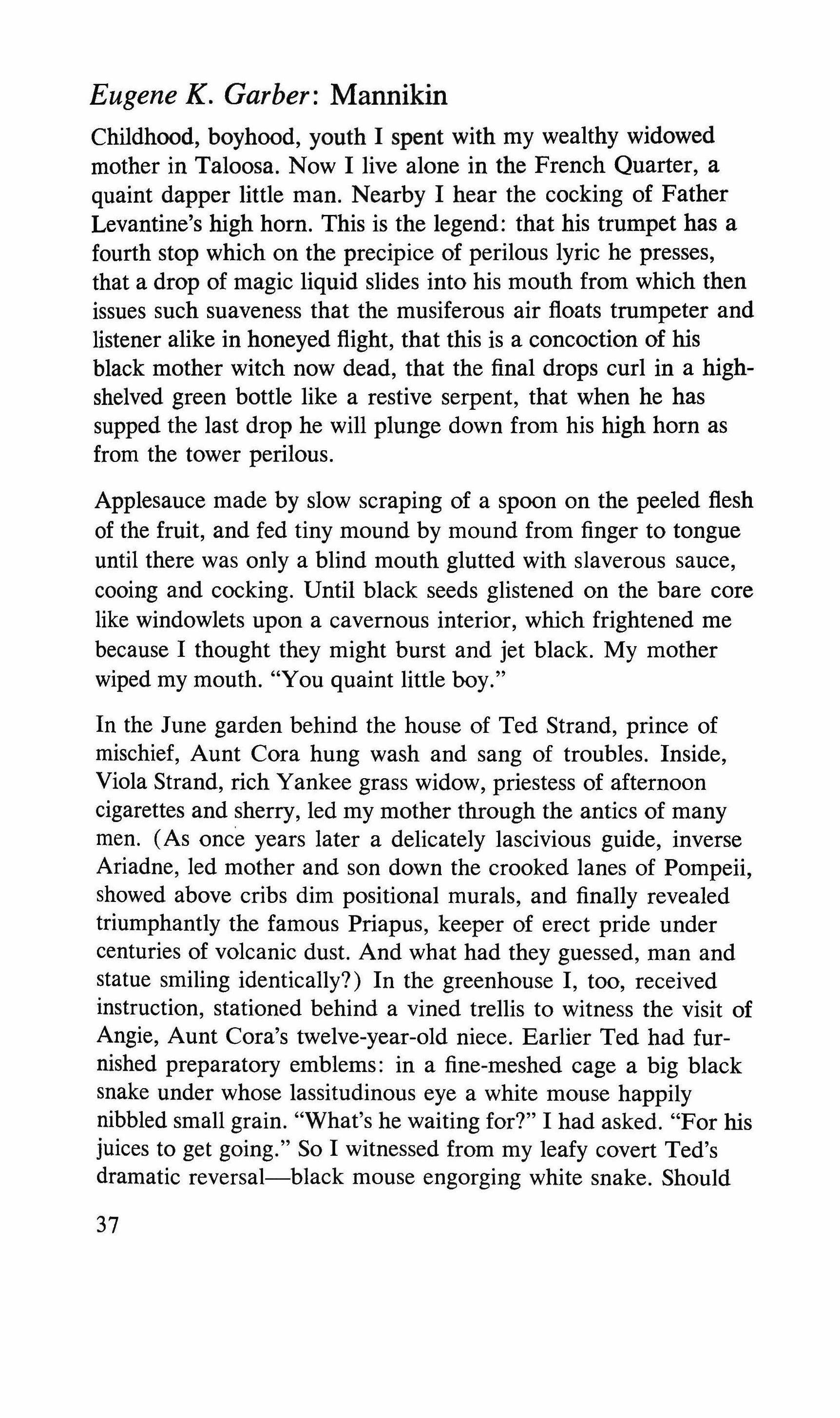 Eugene K. Garber: Mannikin
Eugene K. Garber: Mannikin
Childhood, boyhood, youth I spent with my wealthy widowed mother in Taloosa. Now I live alone in the French Quarter, a quaint dapper little man. Nearby I hear the cocking of Father Levantine's high hom. This is the legend: that his trumpet has a fourth stop which on the precipice of perilous lyric he presses, that a drop of magic liquid slides into his mouth from which then issues such suaveness that the musiferous air floats trumpeter and listener alike in honeyed flight, that this is a concoction of his black mother witch now dead, that the final drops curl in a highshelved green bottle like a restive serpent, that when he has supped the last drop he will plunge down from his high horn as from the tower perilous.
Applesauce made by slow scraping of a spoon on the peeled flesh of the fruit, and fed tiny mound by mound from finger to tongue until there was only a blind mouth glutted with slaverous sauce, cooing and cocking. Until black seeds glistened on the bare core like windowlets upon a cavernous interior, which frightened me because I thought they might burst and jet black. My mother wiped my mouth. "You quaint little boy."
In the June garden behind the house of Ted Strand, prince of mischief, Aunt Cora hung wash and sang of troubles. Inside, Viola Strand, rich Yankee grass widow, priestess of afternoon cigarettes and sherry, led my mother through the antics of many men. (As once years later a delicately lascivious guide, inverse Ariadne, led mother and son down the crooked lanes of Pompeii, showed above cribs dim positional murals, and finally revealed triumphantly the famous Priapus, keeper of erect pride under centuries of volcanic dust. And what had they guessed, man and statue smiling identically?) In the greenhouse I, too, received instruction, stationed behind a vined trellis to witness the visit of Angie, Aunt Cora's twelve-year-old niece. Earlier Ted had furnished preparatory emblems: in a fine-meshed cage a big black snake under whose lassitudinous eye a white mouse happily nibbled small grain. "What's he waiting for?" I had asked. "For his juices to get going." So I witnessed from my leafy covert Ted's dramatic reversal-black mouse engorging white snake. Should 37
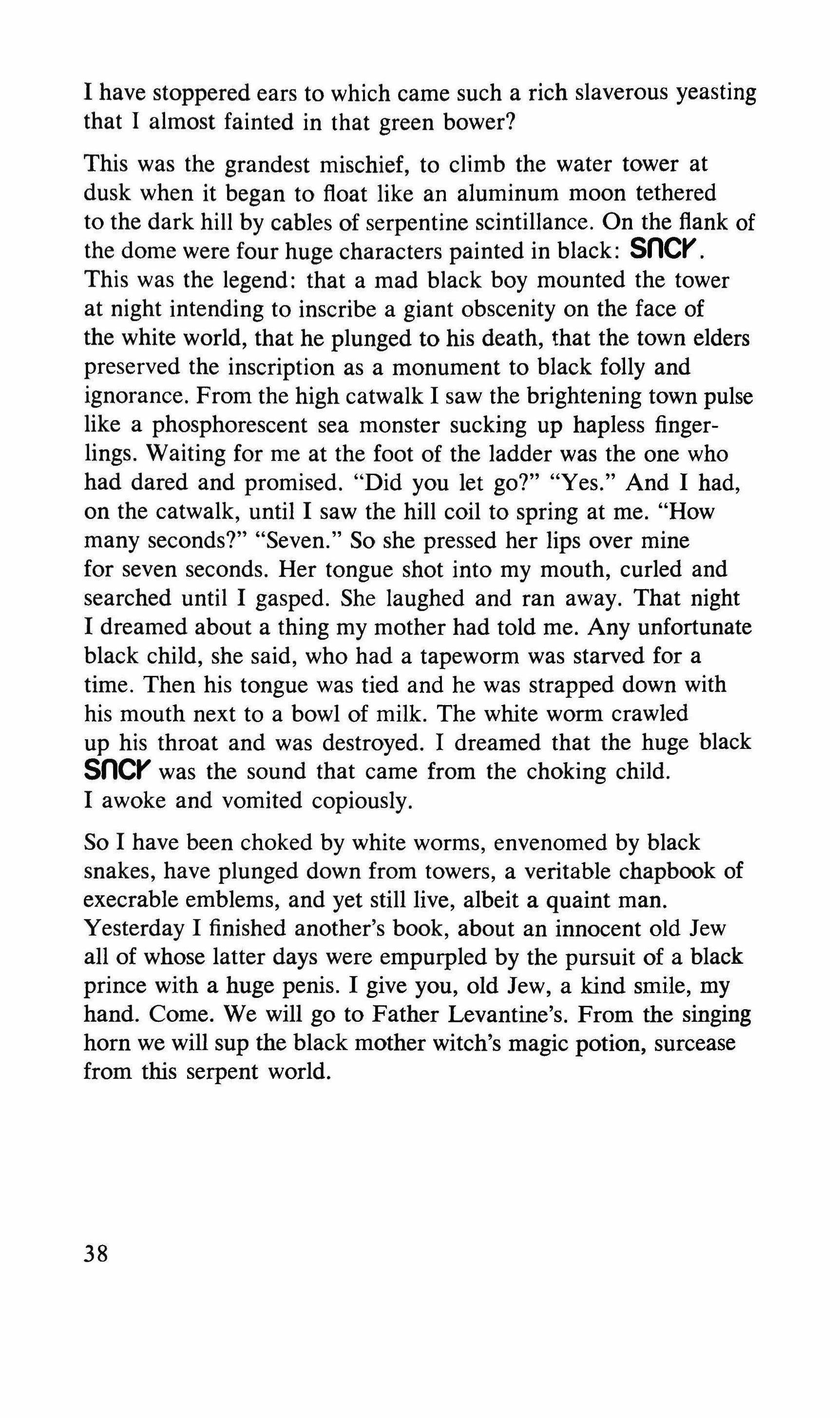
I have stoppered ears to which came such a rich slaverous yeasting that I almost fainted in that green bower?
This was the grandest mischief, to climb the water tower at dusk when it began to float like an aluminum moon tethered to the dark hill by cables of serpentine scintillance. On the flank of the dome were four huge characters painted in black: sncr. This was the legend: that a mad black boy mounted the tower at night intending to inscribe a giant obscenity on the face of the white world, that he plunged to his death, that the town elders preserved the inscription as a monument to black folly and ignorance. From the high catwalk I saw the brightening town pulse like a phosphorescent sea monster sucking up hapless fingerlings. Waiting for me at the foot of the ladder was the one who had dared and promised. "Did you let go?" "Yes." And I had, on the catwalk, until I saw the hill coil to spring at me. "How many seconds?" "Seven." So she pressed her lips over mine for seven seconds. Her tongue shot into my mouth, curled and searched until I gasped. She laughed and ran away. That night I dreamed about a thing my mother had told me. Any unfortunate black child, she said, who had a tapeworm was starved for a time. Then his tongue was tied and he was strapped down with his mouth next to a bowl of milk. The white worm crawled up his throat and was destroyed. I dreamed that the huge black sncr was the sound that came from the choking child. I awoke and vomited copiously.
So I have been choked by white worms, envenomed by black snakes, have plunged down from towers, a veritable chapbook of execrable emblems, and yet still live, albeit a quaint man. Yesterday I finished another's book, about an innocent old Jew all of whose latter days were empurpled by the pursuit of a black prince with a huge penis. I give you, old Jew, a kind smile, my hand. Come. We will go to Father Levantine's. From the singing horn we will sup the black mother witch's magic potion, surcease from this serpent world.
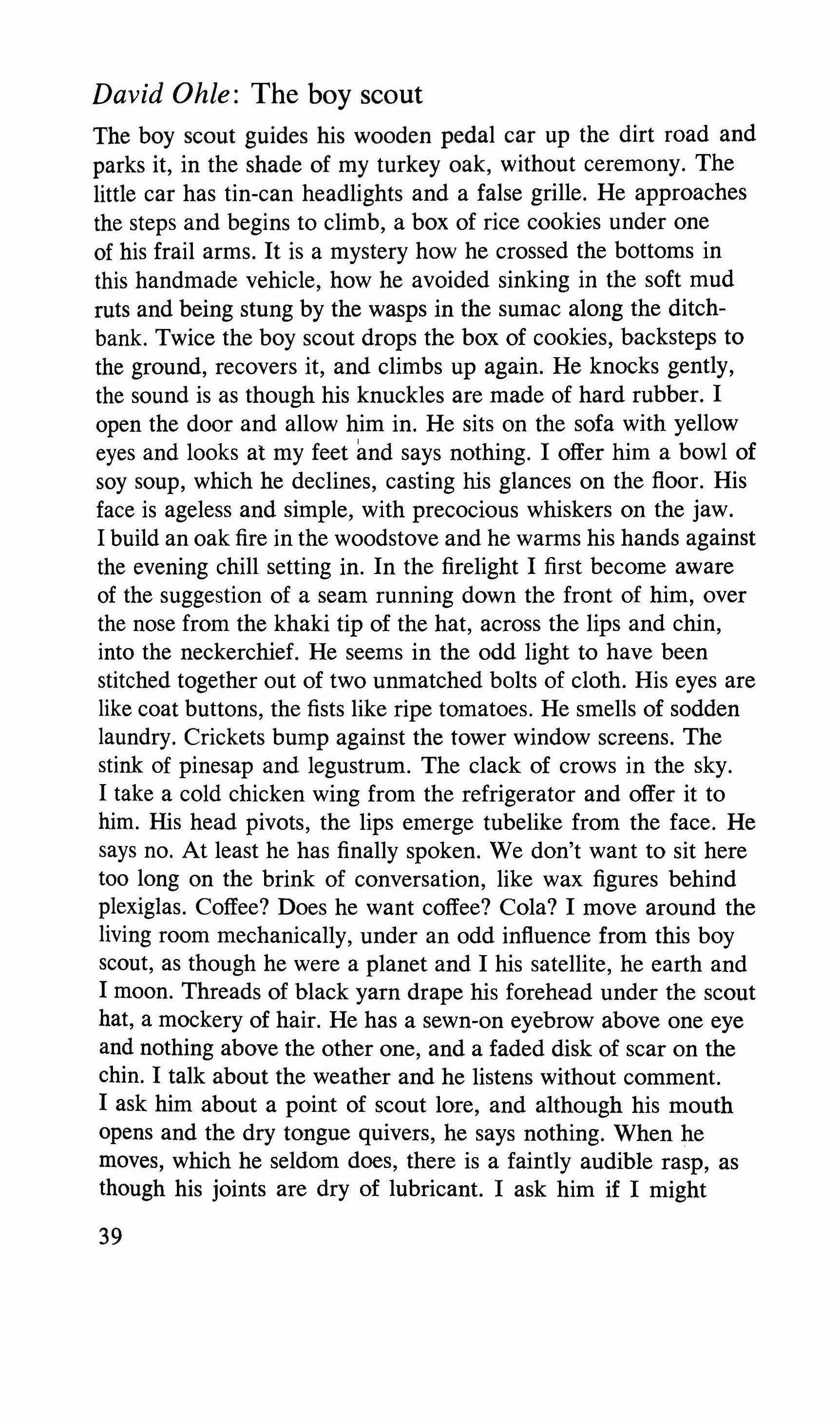 David Ohle: The boy scout
David Ohle: The boy scout
The boy scout guides his wooden pedal car up the dirt road and parks it, in the shade of my turkey oak, without ceremony. The little car has tin-can headlights and a false grille. He approaches the steps and begins to climb, a box of rice cookies under one of his frail arms. It is a mystery how he crossed the bottoms in this handmade vehicle, how he avoided sinking in the soft mud ruts and being stung by the wasps in the sumac along the ditchbank. Twice the boy scout drops the box of cookies, backsteps to the ground, recovers it, and climbs up again. He knocks gently, the sound is as though his knuckles are made of hard rubber. I open the door and allow him in. He sits on the sofa with yellow eyes and looks at my feet and says nothing. I offer him a bowl of soy soup, which he declines, casting his glances on the floor. His face is ageless and simple, with precocious whiskers on the jaw. I build an oak fire in the woodstove and he warms his hands against the evening chill setting in. In the firelight I first become aware of the suggestion of a seam running down the front of him, over the nose from the khaki tip of the hat, across the lips and chin, into the neckerchief. He seems in the odd light to have been stitched together out of two unmatched bolts of cloth. His eyes are like coat buttons, the fists like ripe tomatoes. He smells of sodden laundry. Crickets bump against the tower window screens. The stink of pinesap and legustrum. The clack of crows in the sky. I take a cold chicken wing from the refrigerator and offer it to him. His head pivots, the lips emerge tubelike from the face. He says no. At least he has finally spoken. We don't want to sit here too long on the brink of conversation, like wax figures behind plexiglas. Coffee? Does he want coffee? Cola? I move around the living room mechanically, under an odd influence from this boy scout, as though he were a planet and I his satellite, he earth and I moon. Threads of black yarn drape his forehead under the scout hat, a mockery of hair. He has a sewn-on eyebrow above one eye and nothing above the other one, and a faded disk of scar on the chin. I talk about the weather and he listens without comment. I ask him about a point of scout lore, and although his mouth opens and the dry tongue quivers, he says nothing. When he moves, which he seldom does, there is a faintly audible rasp, as though his joints are dry of lubricant. I ask him if I might
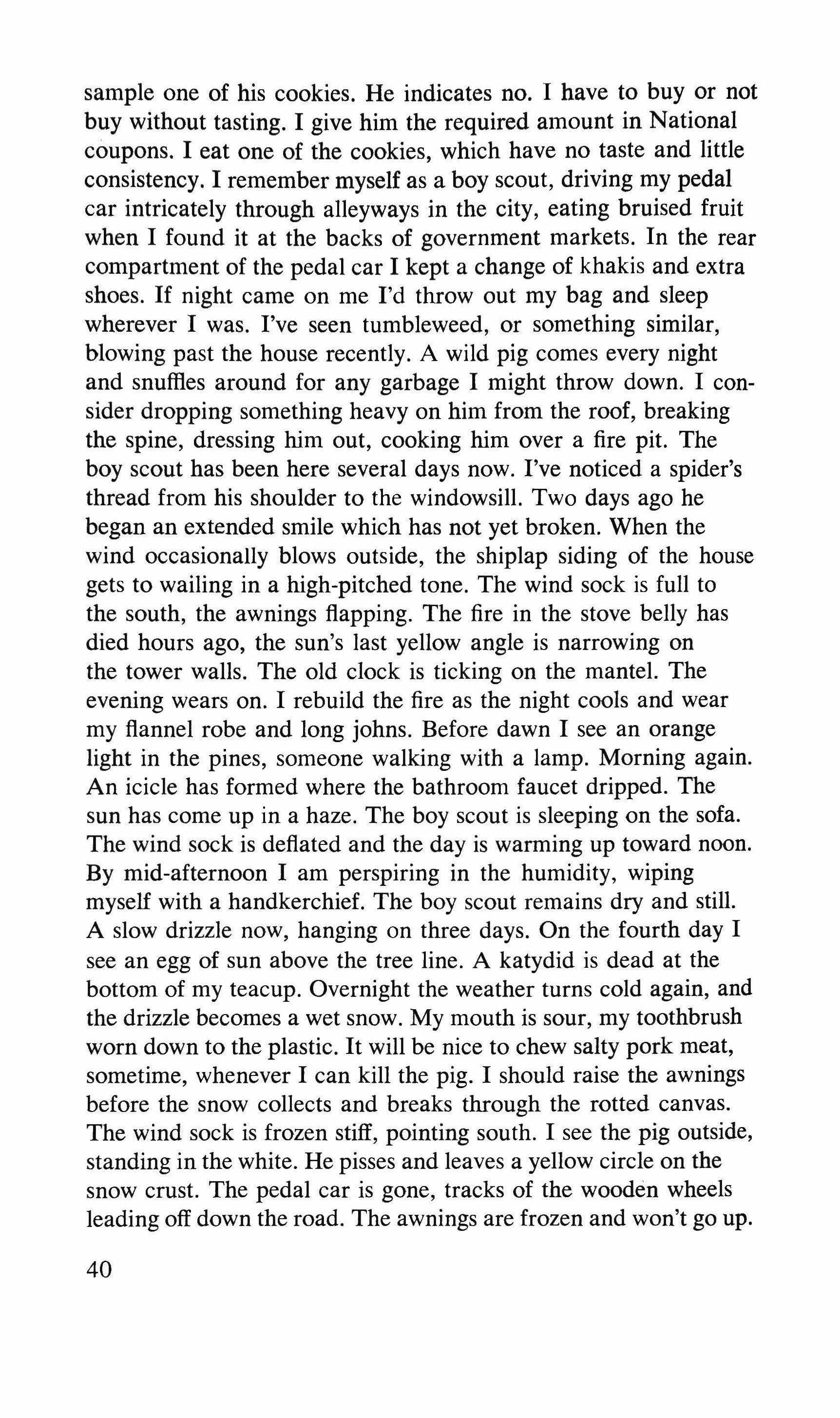
sample one of his cookies. He indicates no. I have to buy or not buy without tasting. I give him the required amount in National coupons. I eat one of the cookies, which have no taste and little consistency. I remember myself as a boy scout, driving my pedal car intricately through alleyways in the city, eating bruised fruit when I found it at the backs of government markets. In the rear compartment of the pedal car I kept a change of khakis and extra shoes. If night came on me I'd throw out my bag and sleep wherever I was. I've seen tumbleweed, or something similar, blowing past the house recently. A wild pig comes every night and snuffles around for any garbage I might throw down. I consider dropping something heavy on him from the roof, breaking the spine, dressing him out, cooking him over a fire pit. The boy scout has been here several days now. I've noticed a spider's thread from his shoulder to the windowsill. Two days ago he began an extended smile which has not yet broken. When the wind occasionally blows outside, the shiplap siding of the house gets to wailing in a high-pitched tone. The wind sock is full to the south, the awnings flapping. The fire in the stove belly has died hours ago, the sun's last yellow angle is narrowing on the tower walls. The old clock is ticking on the mantel. The evening wears on. I rebuild the fire as the night cools and wear my flannel robe and long johns. Before dawn I see an orange light in the pines, someone walking with a lamp. Morning again. An icicle has formed where the bathroom faucet dripped. The sun has come up in a haze. The boy scout is sleeping on the sofa. The wind sock is deflated and the day is warming up toward noon. By mid-afternoon I am perspiring in the humidity, wiping myself with a handkerchief. The boy scout remains dry and still. A slow drizzle now, hanging on three days. On the fourth day I see an egg of sun above the tree line. A katydid is dead at the bottom of my teacup. Overnight the weather turns cold again, and the drizzle becomes a wet snow. My mouth is sour, my toothbrush worn down to the plastic. It will be nice to chew salty pork meat, sometime, whenever I can kill the pig. I should raise the awnings before the snow collects and breaks through the rotted canvas. The wind sock is frozen stiff, pointing south. I see the pig outside, standing in the white. He pisses and leaves a yellow circle on the snow crust. The pedal car is gone, tracks of the wooden wheels leading off down the road. The awnings are frozen and won't go up.

This happened in New Orleans in 1956. I was waiting in the train station. I went to the men's room. I urinated in a trough which ran along the floor against one wall. The smell of human gas pressed around me. I stepped back when I was finished, to tuck my shirt in. I saw an old man sleeping on the commode in one of the stalls. Around his neck, tied with bailing twine, was a hand-lettered sign in crayon, which said:
THE RULES
1. You can piss in my beard-$1.00
2. In the mouth-$1.25
3. In eyes-$1.50
4. Up & down & on clothes-$1.75
5. Any combo--$2.00
WAKE ME UP
The compensatory use of confabulation
John M. was a 36-year-old married patient who had been admitted to a mental hospital some months before with a diagnosis of Korsakoff's psychosis. This had been the consequence of uncontrolled chronic alcoholism.
John suffered from all the typical symptoms of this condition. When asked what he had done on the preceding day, he gave a seemingly plausible and coherent account of a shopping trip to town, accompanied by a visit to the home of his sister.
His activities of a week before were likewise described in some detail. These accounts were sequential and related in a convincing manner. Actually, of course, John had not left the ward since his admission! He was compensating for his symptomatic memory defects through confabulation, defined as the filling-in of memory gaps by imaginary experiences, which he related as though they were factual.
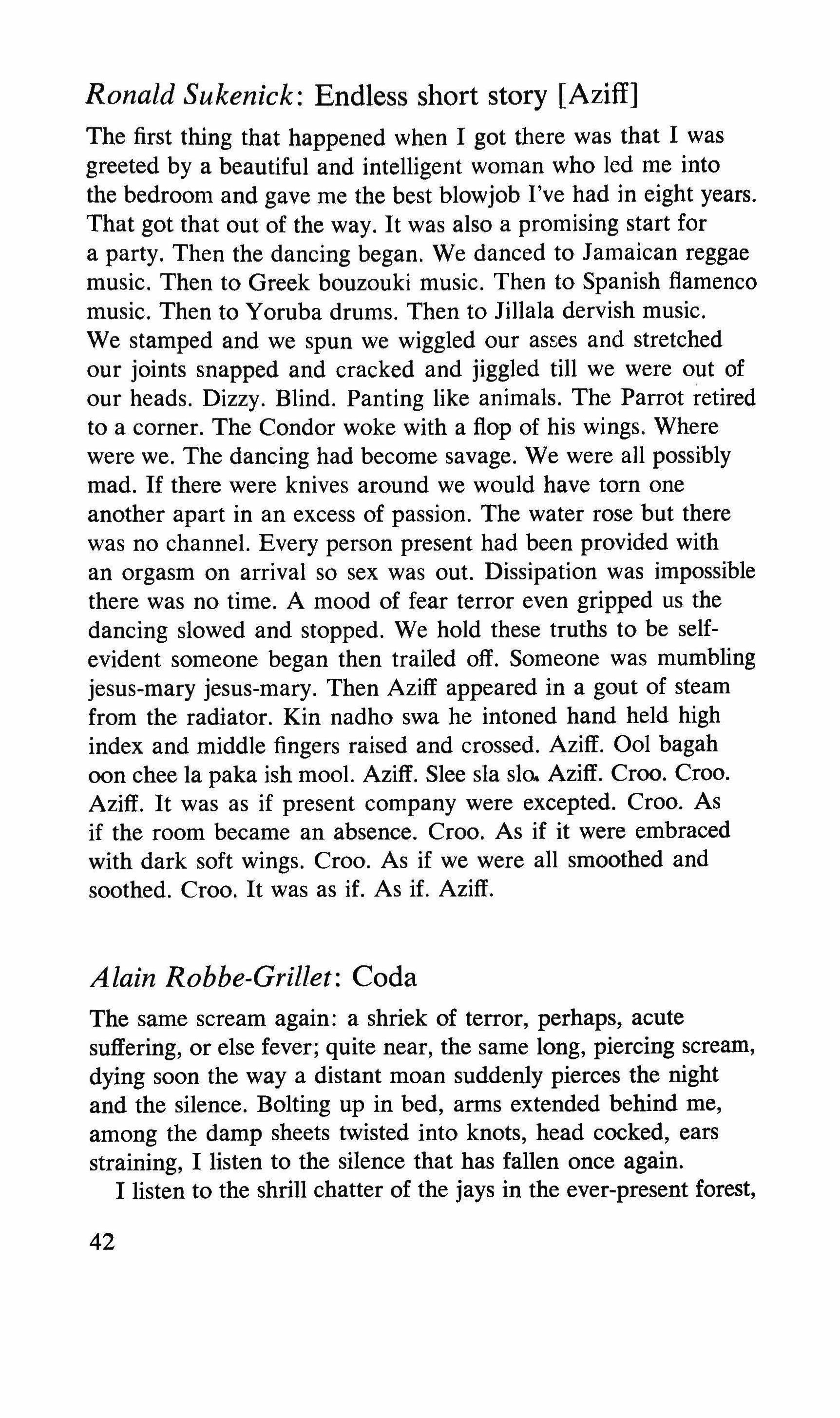
The first thing that happened when I got there was that I was greeted by a beautiful and intelligent woman who led me into the bedroom and gave me the best blowjob I've had in eight years. That got that out of the way. It was also a promising start for a party. Then the dancing began. We danced to Jamaican reggae music. Then to Greek bouzouki music. Then to Spanish flamenco music. Then to Yoruba drums. Then to Jillala dervish music. We stamped and we spun we wiggled our asses and stretched our joints snapped and cracked and jiggled till we were out of our heads. Dizzy. Blind. Panting like animals. The Parrot retired to a corner. The Condor woke with a flop of his wings. Where were we. The dancing had become savage. We were all possibly mad. If there were knives around we would have torn one another apart in an excess of passion. The water rose but there was no channel. Every person present had been provided with an orgasm on arrival so sex was out. Dissipation was impossible there was no time. A mood of fear terror even gripped us the dancing slowed and stopped. We hold these truths to be selfevident someone began then trailed off. Someone was mumbling jesus-mary jesus-mary. Then Aziff appeared in a gout of steam from the radiator. Kin nadho swa he intoned hand held high index and middle fingers raised and crossed. Aziff. 001 bagah oon chee la paka ish mooI. Aziff. Slee sla slo, Aziff. Croo. Croo. Aziff. It was as if present company were excepted. Croo. As if the room became an absence. Croo. As if it were embraced with dark soft wings. Croo. As if we were all smoothed and soothed. Croo. It was as if. As if. Aziff.
The same scream again: a shriek of terror, perhaps, acute suffering, or else fever; quite near, the same long, piercing scream, dying soon the way a distant moan suddenly pierces the night and the silence. Bolting up in bed, arms extended behind me, among the damp sheets twisted into knots, head cocked, ears straining, I listen to the silence that has fallen once again. I listen to the shrill chatter of the jays in the ever-present forest,
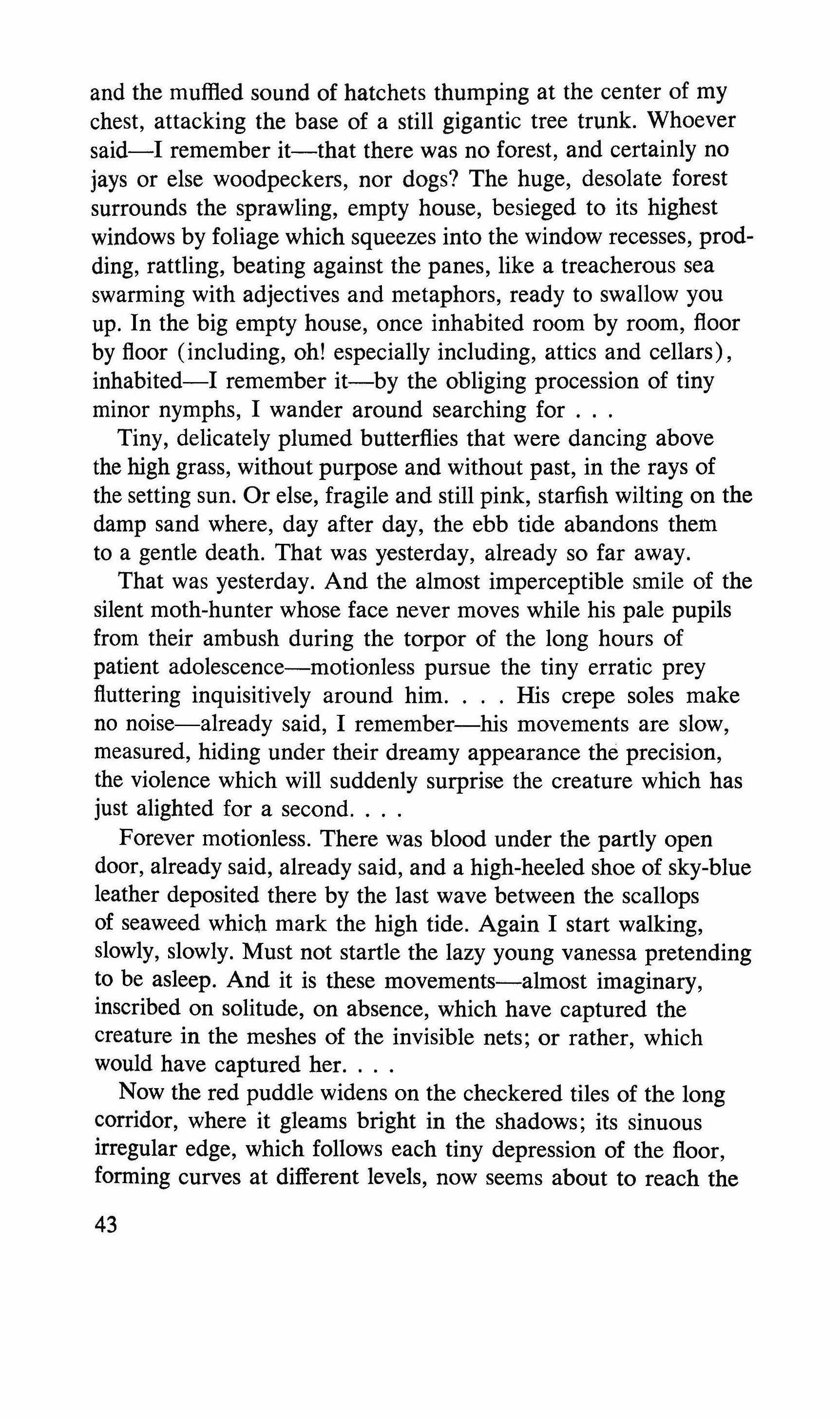
and the muffled sound of hatchets thumping at the center of my chest, attacking the base of a still gigantic tree trunk. Whoever said-I remember it-that there was no forest, and certainly no jays or else woodpeckers, nor dogs? The huge, desolate forest surrounds the sprawling, empty house, besieged to its highest windows by foliage which squeezes into the window recesses, prodding, rattling, beating against the panes, like a treacherous sea swarming with adjectives and metaphors, ready to swallow you up. In the big empty house, once inhabited room by room, floor by floor (including, oh! especially including, attics and cellars), inhabited-I remember it-by the obliging procession of tiny minor nymphs, I wander around searching for Tiny, delicately plumed butterflies that were dancing above the high grass, without purpose and without past, in the rays of the setting sun. Or else, fragile and still pink, starfish wilting on the damp sand where, day after day, the ebb tide abandons them to a gentle death. That was yesterday, already so far away.
That was yesterday. And the almost imperceptible smile of the silent moth-hunter whose face never moves while his pale pupils from their ambush during the torpor of the long hours of patient adolescence-motionless pursue the tiny erratic prey fluttering inquisitively around him. His crepe soles make no noise-already said, I remember-his movements are slow, measured, hiding under their dreamy appearance the precision, the violence which will suddenly surprise the creature which has just alighted for a second.
Forever motionless. There was blood under the partly open door, already said, already said, and a high-heeled shoe of sky-blue leather deposited there by the last wave between the scallops of seaweed which mark the high tide. Again I start walking, slowly, slowly. Must not startle the lazy young vanessa pretending to be asleep. And it is these movements-almost imaginary, inscribed on solitude, on absence, which have captured the creature in the meshes of the invisible nets; or rather, which would have captured her.
Now the red puddle widens on the checkered tiles of the long corridor, where it gleams bright in the shadows; its sinuous irregular edge, which follows each tiny depression of the floor, forming curves at different levels, now seems about to reach the
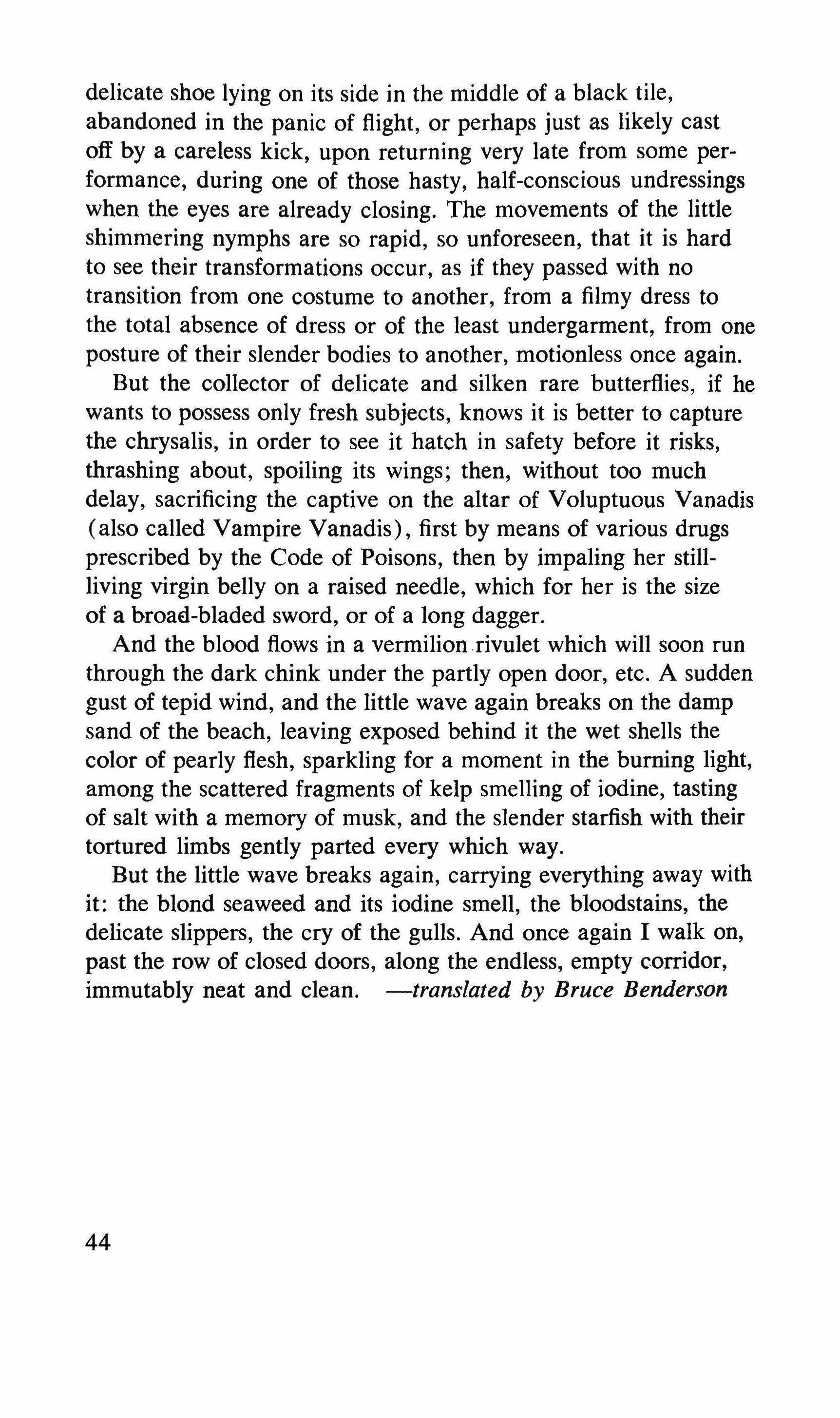
delicate shoe lying on its side in the middle of a black tile, abandoned in the panic of flight, or perhaps just as likely cast off by a careless kick, upon returning very late from some performance, during one of those hasty, half-conscious undressings when the eyes are already closing. The movements of the little shimmering nymphs are so rapid, so unforeseen, that it is hard to see their transformations occur, as if they passed with no transition from one costume to another, from a filmy dress to the total absence of dress or of the least undergarment, from one posture of their slender bodies to another, motionless once again.
But the collector of delicate and silken rare butterflies, if he wants to possess only fresh subjects, knows it is better to capture the chrysalis, in order to see it hatch in safety before it risks, thrashing about, spoiling its wings; then, without too much delay, sacrificing the captive on the altar of Voluptuous Vanadis (also called Vampire Vanadis), first by means of various drugs prescribed by the Code of Poisons, then by impaling her stillliving virgin belly on a raised needle, which for her is the size of a broad-bladed sword, or of a long dagger.
And the blood flows in a vermilion rivulet which will soon run through the dark chink under the partly open door, etc. A sudden gust of tepid wind, and the little wave again breaks on the damp sand of the beach, leaving exposed behind it the wet shells the color of pearly flesh, sparkling for a moment in the burning light, among the scattered fragments of kelp smelling of iodine, tasting of salt with a memory of musk, and the slender starfish with their tortured limbs gently parted every which way.
But the little wave breaks again, carrying everything away with it: the blond seaweed and its iodine smell, the bloodstains, the delicate slippers, the cry of the gulls. And once again I walk on, past the row of closed doors, along the endless, empty corridor, immutably neat and clean. -translated by Bruce Benderson
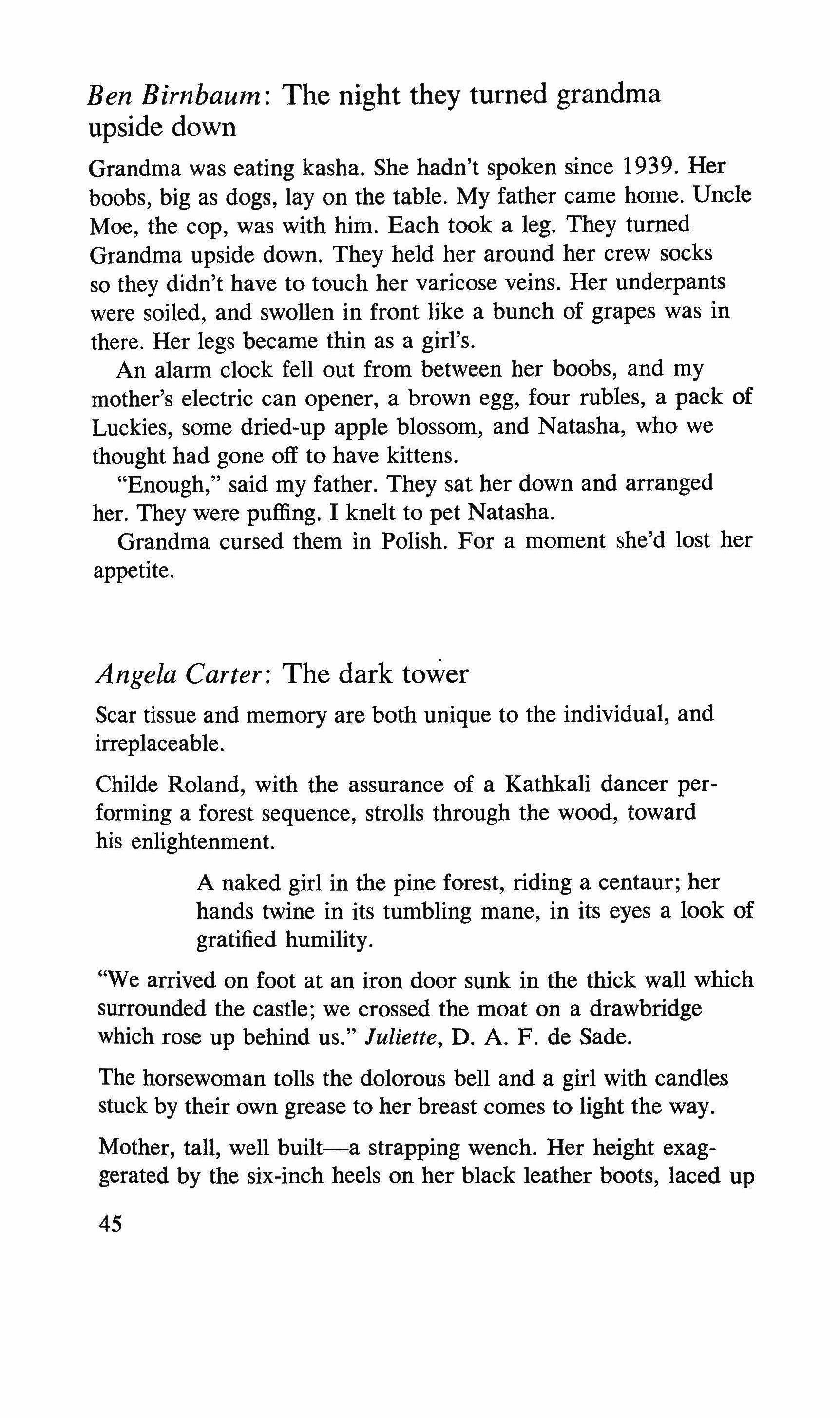
Ben Birnbaum: The night they turned grandma upside down
Grandma was eating kasha. She hadn't spoken since 1939. Her boobs, big as dogs, lay on the table. My father came home. Uncle Moe, the cop, was with him. Each took a leg. They turned Grandma upside down. They held her around her crew socks so they didn't have to touch her varicose veins. Her underpants were soiled, and swollen in front like a bunch of grapes was in there. Her legs became thin as a gir1's.
An alarm clock fell out from between her boobs, and my mother's electric can opener, a brown egg, four rubles, a pack of Luckies, some dried-up apple blossom, and Natasha, who we thought had gone off to have kittens.
"Enough," said my father. They sat her down and arranged her. They were puffing. I knelt to pet Natasha.
Grandma cursed them in Polish. For a moment she'd lost her appetite.
Scar tissue and memory are both unique to the individual, and irreplaceable.
Childe Roland, with the assurance of a Kathkali dancer performing a forest sequence, strolls through the wood, toward his enlightenment.
A naked girl in the pine forest, riding a centaur; her hands twine in its tumbling mane, in its eyes a look of gratified humility.
"We arrived on foot at an iron door sunk in the thick wall which surrounded the castle; we crossed the moat on a drawbridge which rose up behind us." Juliette, D. A. F. de Sade.
The horsewoman tolls the dolorous bell and a girl with candles stuck by their own grease to her breast comes to light the way.
Mother, tall, well built-a strapping wench. Her height exaggerated by the six-inch heels on her black leather boots, laced up 45
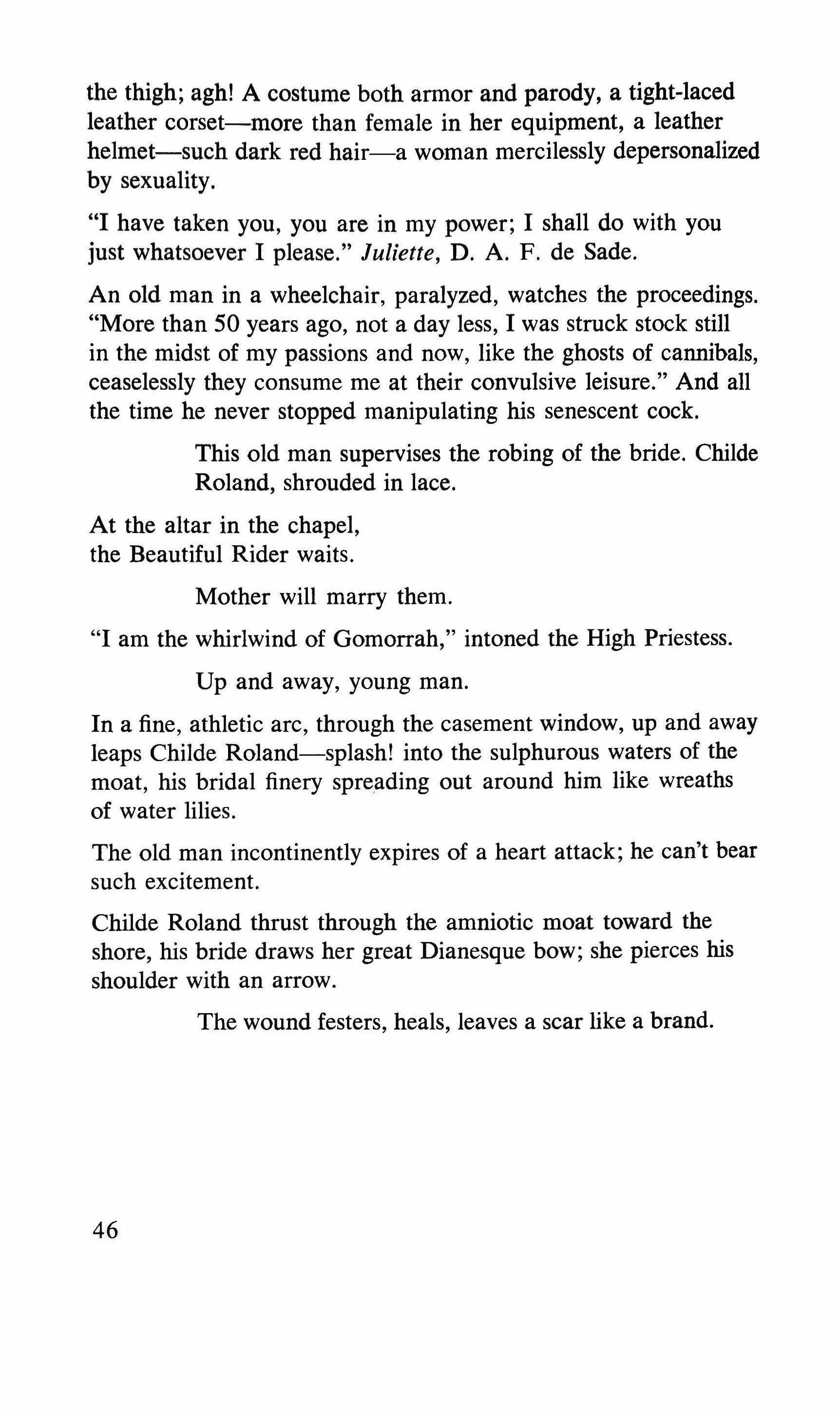
the thigh; agh! A costume both armor and parody, a tight-laced leather corset-more than female in her equipment, a leather helmet-such dark red hair-a woman mercilessly depersonalized by sexuality.
"I have taken you, you are in my power; I shall do with you just whatsoever I please." Juliette, D. A. F. de Sade.
An old man in a wheelchair, paralyzed, watches the proceedings. "More than 50 years ago, not a day less, I was struck stock still in the midst of my passions and now, like the ghosts of cannibals, ceaselessly they consume me at their convulsive leisure." And all the time he never stopped manipulating his senescent cock.
This old man supervises the robing of the bride. Childe Roland, shrouded in lace.
At the altar in the chapel, the Beautiful Rider waits.
Mother will marry them.
"I am the whirlwind of Gomorrah," intoned the High Priestess.
Up and away, young man.
In a fine, athletic arc, through the casement window, up and away leaps ChiIde Roland-splash! into the sulphurous waters of the moat, his bridal finery spreading out around him like wreaths of water lilies.
The old man incontinently expires of a heart attack; he can't bear such excitement.
Childe Roland thrust through the amniotic moat toward the shore, his bride draws her great Dianesque bow; she pierces his shoulder with an arrow.
The wound festers, heals, leaves a scar like a brand.
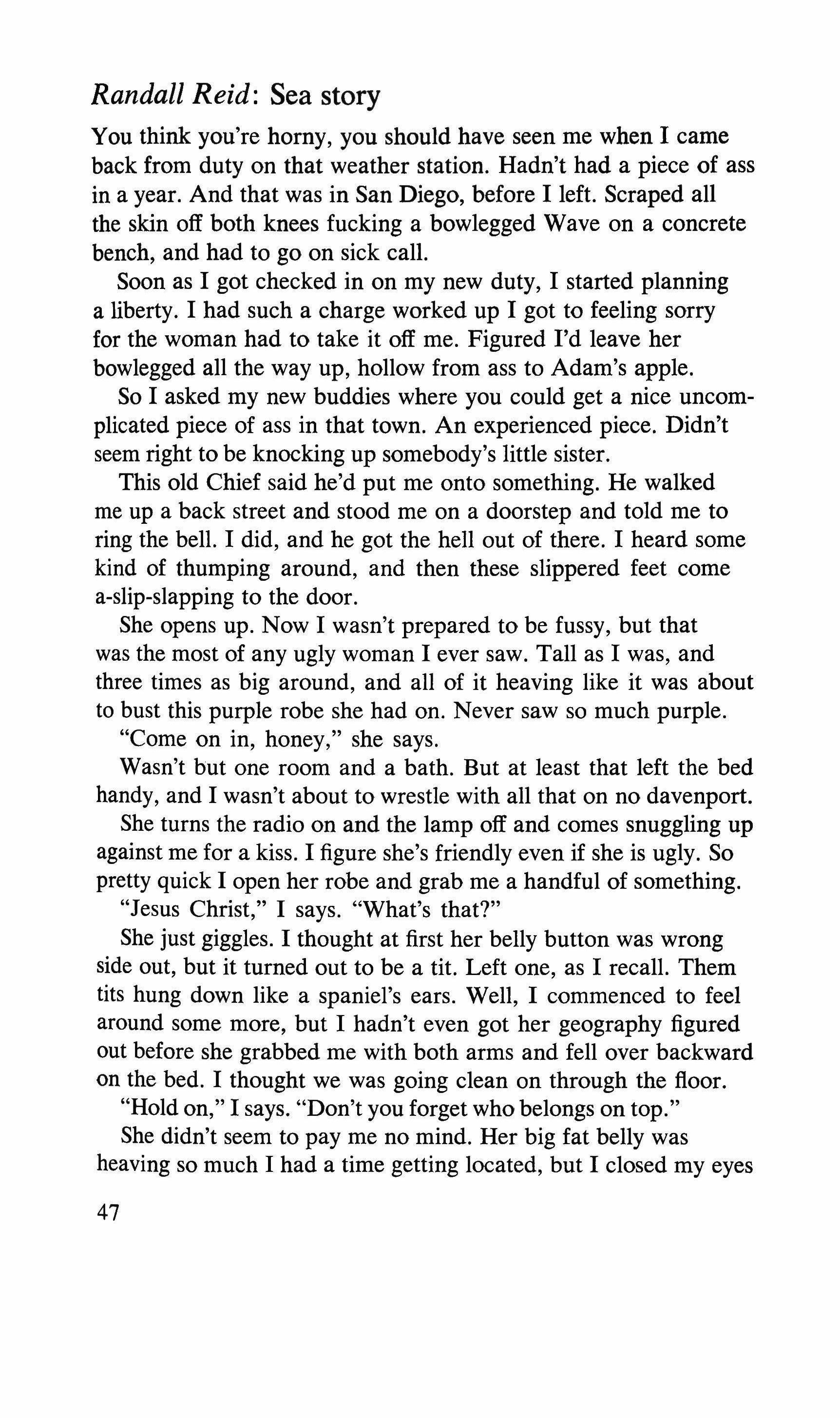 Randall Reid: Sea story
Randall Reid: Sea story
You think you're horny, you should have seen me when I came back from duty on that weather station. Hadn't had a piece of ass in a year. And that was in San Diego, before I left. Scraped all the skin off both knees fucking a bowlegged Wave on a concrete bench, and had to go on sick call.
Soon as I got checked in on my new duty, I started planning a liberty. I had such a charge worked up I got to feeling sorry for the woman had to take it off me. Figured I'd leave her bowlegged all the way up, hollow from ass to Adam's apple.
So I asked my new buddies where you could get a nice uncomplicated piece of ass in that town. An experienced piece. Didn't seem right to be knocking up somebody's little sister.
This old Chief said he'd put me onto something. He walked me up a back street and stood me on a doorstep and told me to ring the bell. I did, and he got the hell out of there. I heard some kind of thumping around, and then these slippered feet come a-slip-slapping to the door.
She opens up. Now I wasn't prepared to be fussy, but that was the most of any ugly woman I ever saw. Tall as I was, and three times as big around, and all of it heaving like it was about to bust this purple robe she had on. Never saw so much purple.
"Come on in, honey," she says.
Wasn't but one room and a bath. But at least that left the bed handy, and I wasn't about to wrestle with all that on no davenport.
She turns the radio on and the lamp off and comes snuggling up against me for a kiss. I figure she's friendly even if she is ugly. So pretty quick I open her robe and grab me a handful of something. "Jesus Christ," I says. "What's that?"
She just giggles. I thought at first her belly button was wrong side out, but it turned out to be a tit. Left one, as I recall. Them tits hung down like a spaniel's ears. Well, I commenced to feel around some more, but I hadn't even got her geography figured out before she grabbed me with both arms and fell over backward on the bed. I thought we was going clean on through the floor.
"Hold on," I says. "Don't you forget who belongs on top."
She didn't seem to pay me no mind. Her big fat belly was heaving so much I had a time getting located, but I closed my eyes
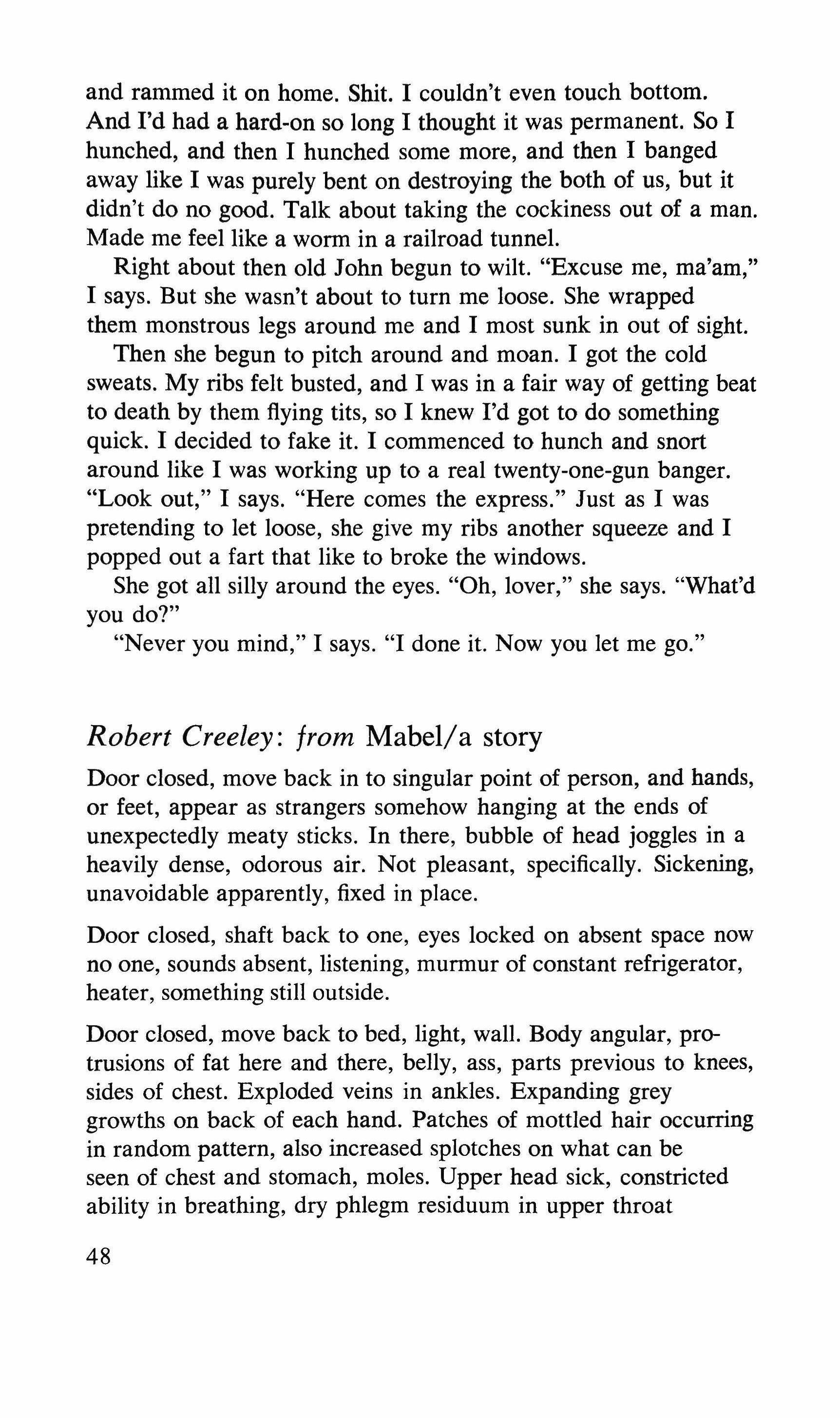
and rammed it on home. Shit. I couldn't even touch bottom. And I'd had a hard-on so long I thought it was permanent. So I hunched, and then I hunched some more, and then I banged away like I was purely bent on destroying the both of us, but it didn't do no good. Talk about taking the cockiness out of a man. Made me feel like a worm in a railroad tunnel.
Right about then old John begun to wilt. "Excuse me, ma'am," I says. But she wasn't about to turn me loose. She wrapped them monstrous legs around me and I most sunk in out of sight. Then she begun to pitch around and moan. I got the cold sweats. My ribs felt busted, and I was in a fair way of getting beat to death by them flying tits, so I knew I'd got to do something quick. I decided to fake it. I commenced to hunch and snort around like I was working up to a real twenty-one-gun banger. "Look out," I says. "Here comes the express." Just as I was pretending to let loose, she give my ribs another squeeze and I popped out a fart that like to broke the windows.
She got all silly around the eyes. "Oh, lover," she says. "What'd you do?"
"Never you mind," I says. "I done it. Now you let me go."
Door closed, move back in to singular point of person, and hands, or feet, appear as strangers somehow hanging at the ends of unexpectedly meaty sticks. In there, bubble of head joggles in a heavily dense, odorous air. Not pleasant, specifically. Sickening, unavoidable apparently, fixed in place.
Door closed, shaft back to one, eyes locked on absent space now no one, sounds absent, listening, murmur of constant refrigerator, heater, something still outside.
Door closed, move back to bed, light, wall. Body angular, protrusions of fat here and there, belly, ass, parts previous to knees, sides of chest. Exploded veins in ankles. Expanding grey growths on back of each hand. Patches of mottled hair occurring in random pattern, also increased splotches on what can be seen of chest and stomach, moles. Upper head sick, constricted ability in breathing, dry phlegm residuum in upper throat
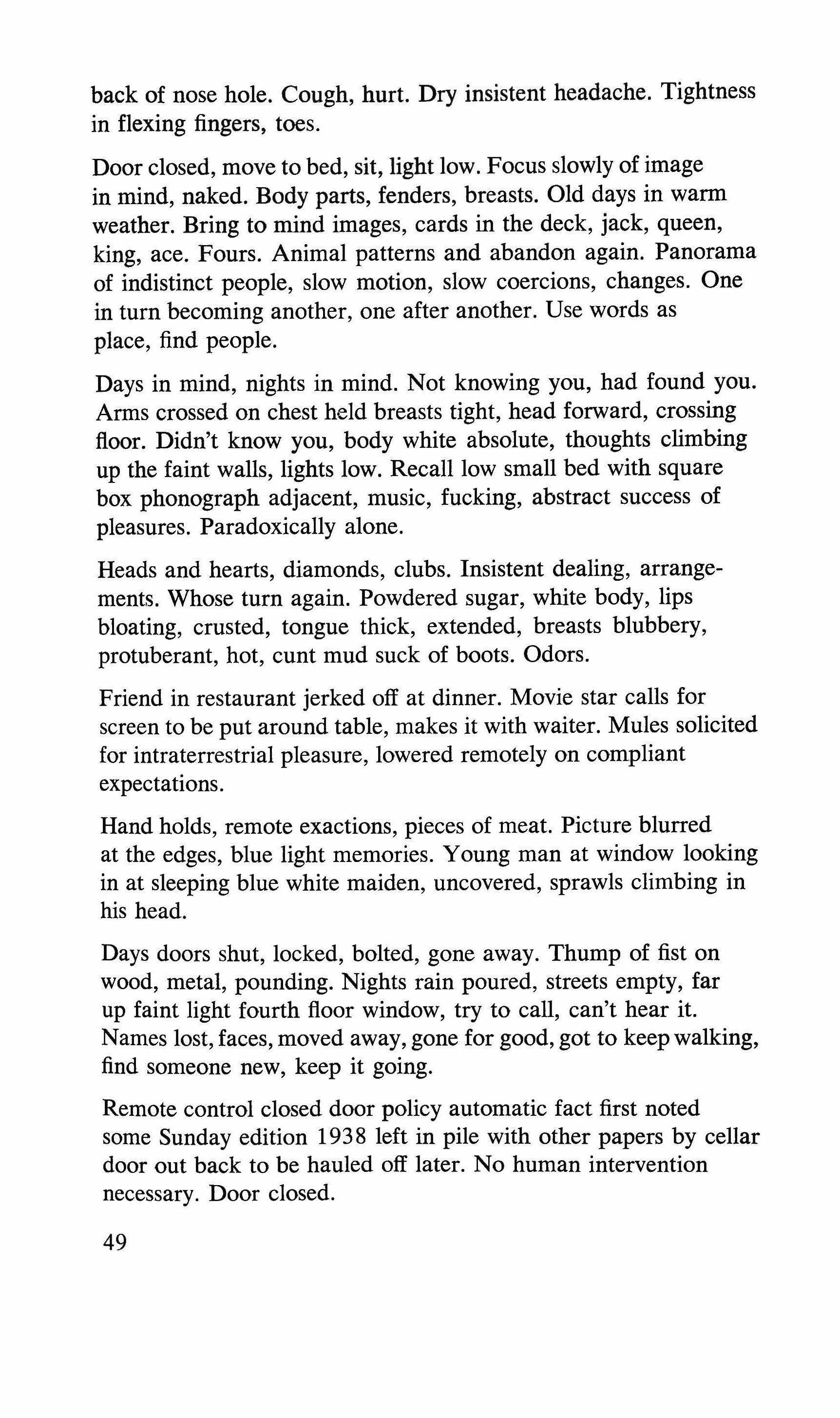
back of nose hole. Cough, hurt. Dry insistent headache. Tightness in flexing fingers, toes.
Door closed, move to bed, sit, light low. Focus slowly of image in mind, naked. Body parts, fenders, breasts. Old days in warm weather. Bring to mind images, cards in the deck, jack, queen, king, ace. Fours. Animal patterns and abandon again. Panorama of indistinct people, slow motion, slow coercions, changes. One in turn becoming another, one after another. Use words as place, find people.
Days in mind, nights in mind. Not knowing you, had found you. Arms crossed on chest held breasts tight, head forward, crossing floor. Didn't know you, body white absolute, thoughts climbing up the faint walls, lights low. Recall low small bed with square box phonograph adjacent, music, fucking, abstract success of pleasures. Paradoxically alone.
Heads and hearts, diamonds, clubs. Insistent dealing, arrangements. Whose turn again. Powdered sugar, white body, lips bloating, crusted, tongue thick, extended, breasts blubbery, protuberant, hot, cunt mud suck of boots. Odors.
Friend in restaurant jerked off at dinner. Movie star calls for screen to be put around table, makes it with waiter. Mules solicited for intraterrestrial pleasure, lowered remotely on compliant expectations.
Hand holds, remote exactions, pieces of meat. Picture blurred at the edges, blue light memories. Young man at window looking in at sleeping blue white maiden, uncovered, sprawls climbing in his head.
Days doors shut, locked, bolted, gone away. Thump of fist on wood, metal, pounding. Nights rain poured, streets empty, far up faint light fourth floor window, try to call, can't hear it. Names lost, faces, moved away, gone for good, got to keepwalking, find someone new, keep it going.
Remote control closed door policy automatic fact first noted some Sunday edition 1938 left in pile with other papers by cellar door out back to be hauled off later. No human intervention necessary. Door closed.
49
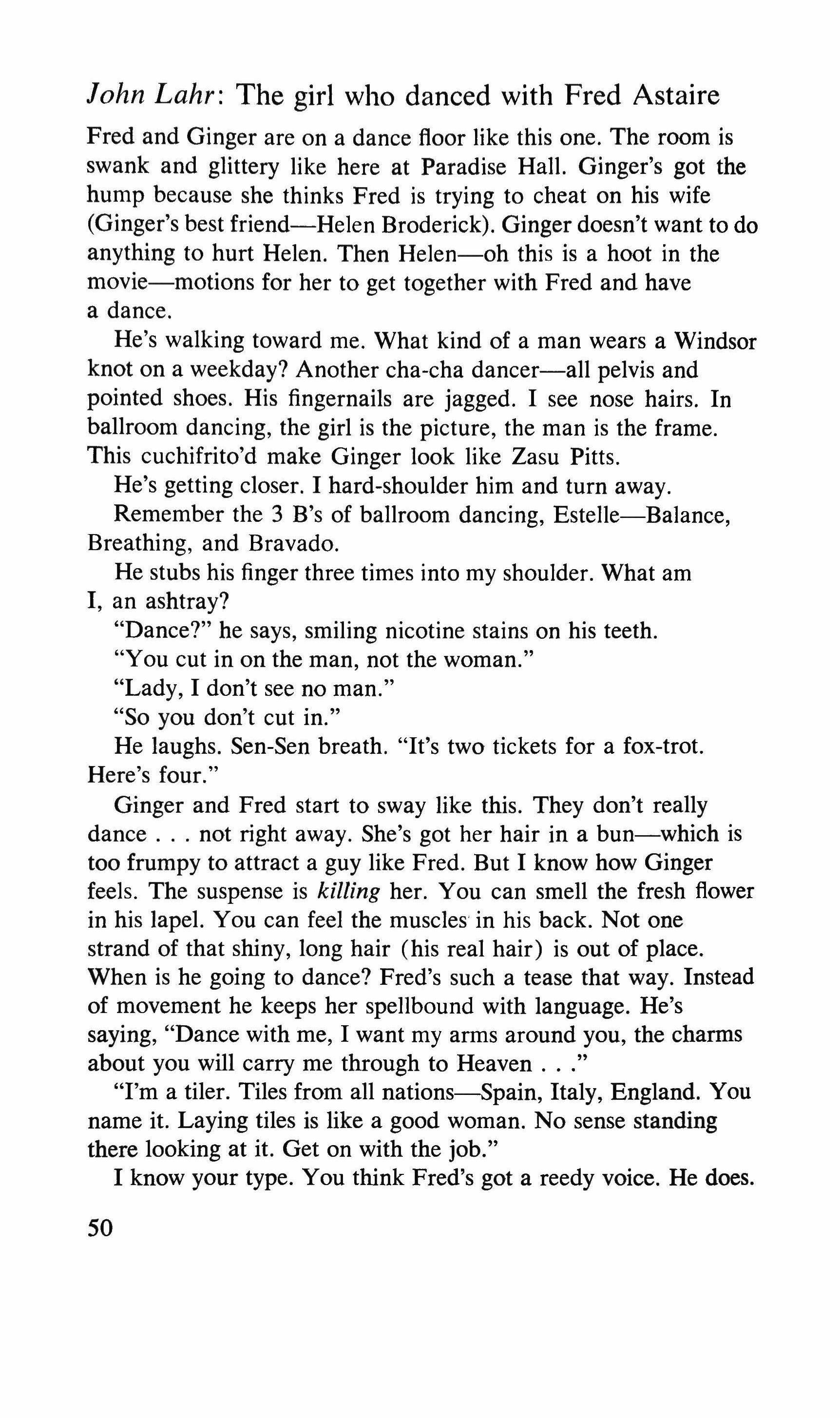
John Lahr: The girl who danced with Fred Astaire
Fred and Ginger are on a dance floor like this one. The room is swank and glittery like here at Paradise Hall. Ginger's got the hump because she thinks Fred is trying to cheat on his wife (Ginger's best friend-Helen Broderick). Ginger doesn't want to do anything to hurt Helen. Then Helen-oh this is a hoot in the movie-motions for her to get together with Fred and have a dance.
He's walking toward me. What kind of a man wears a Windsor knot on a weekday? Another cha-cha dancer-all pelvis and pointed shoes. His fingernails are jagged. I see nose hairs. In ballroom dancing, the girl is the picture, the man is the frame. This cuchifrito'd make Ginger look like Zasu Pitts.
He's getting closer. I hard-shoulder him and turn away.
Remember the 3 B's of ballroom dancing, Estelle-Balance, Breathing, and Bravado.
He stubs his finger three times into my shoulder. What am I, an ashtray?
"Dance?" he says, smiling nicotine stains on his teeth.
"You cut in on the man, not the woman."
"Lady, I don't see no man."
"So you don't cut in."
He laughs. Sen-Sen breath. "It's two tickets for a fox-trot. Here's four."
Ginger and Fred start to sway like this. They don't really dance not right away. She's got her hair in a bun-which is too frumpy to attract a guy like Fred. But I know how Ginger feels. The suspense is killing her. You can smell the fresh flower in his lapel. You can feel the muscles in his back. Not one strand of that shiny, long hair (his real hair) is out of place. When is he going to dance? Fred's such a tease that way. Instead of movement he keeps her spellbound with language. He's saying, "Dance with me, I want my arms around you, the charms about you will carry me through to Heaven ."
"I'm a tiler. Tiles from all nations-Spain, Italy, England. You name it. Laying tiles is like a good woman. No sense standing there looking at it. Get on with the job."
I know your type. You think Fred's got a reedy voice. He does.
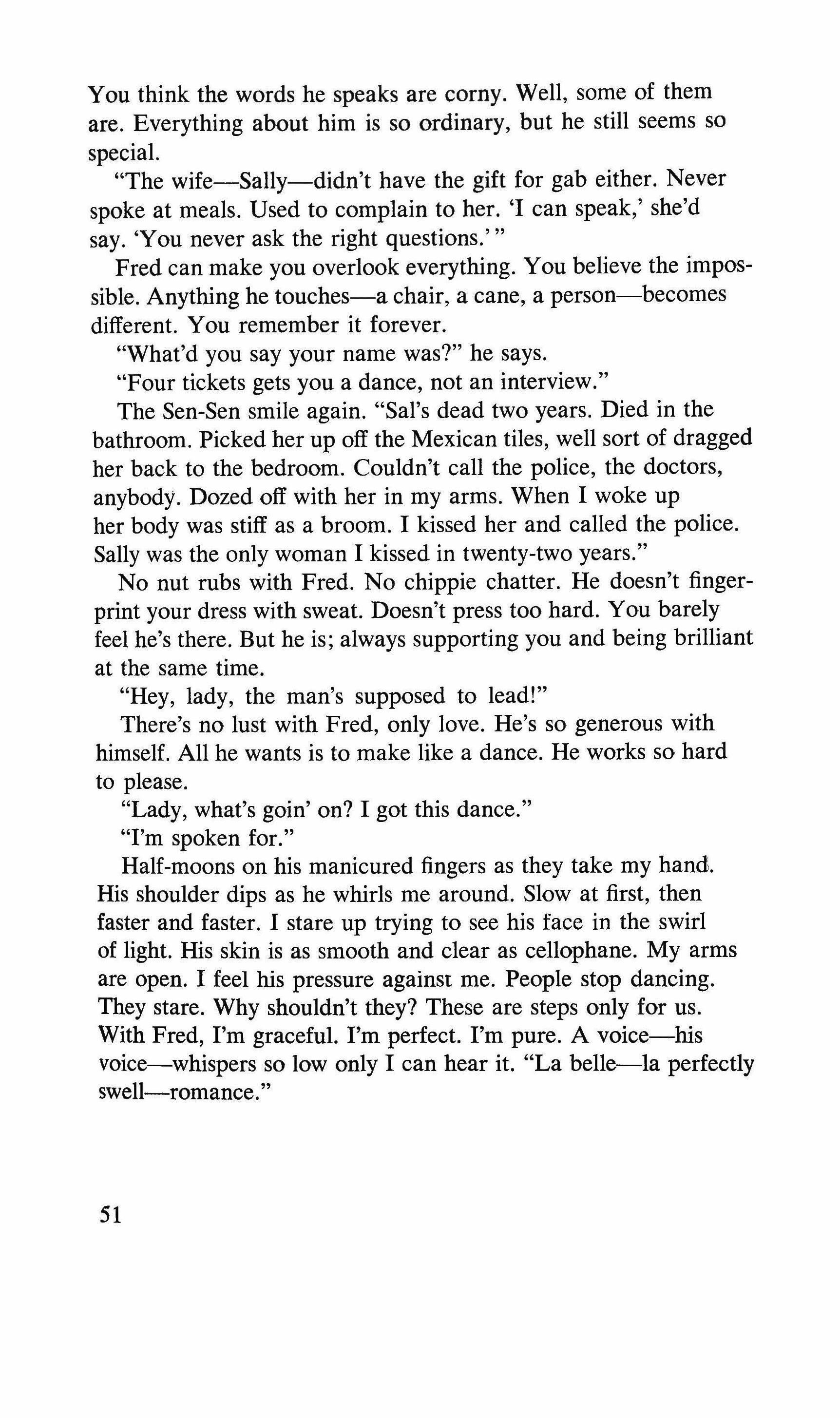
You think the words he speaks are corny. Well, some of them are. Everything about him is so ordinary, but he still seems so special.
"The wife-Sally-didn't have the gift for gab either. Never spoke at meals. Used to complain to her. 'I can speak,' she'd say. 'You never ask the right questions.'
Fred can make you overlook everything. You believe the impossible. Anything he touches-a chair, a cane, a person-becomes different. You remember it forever.
"What'd you say your name was?" he says. "Four tickets gets you a dance, not an interview."
The Sen-Sen smile again. "Sal's dead two years. Died in the bathroom. Picked her up off the Mexican tiles, well sort of dragged her back to the bedroom. Couldn't call the police, the doctors, anybody. Dozed off with her in my arms. When 1 woke up her body was stiff as a broom. 1 kissed her and called the police. Sally was the only woman 1 kissed in twenty-two years."
No nut rubs with Fred. No chippie chatter. He doesn't fingerprint your dress with sweat. Doesn't press too hard. You barely feel he's there. But he is; always supporting you and being brilliant at the same time.
"Hey, lady, the man's supposed to lead!"
There's no lust with Fred, only love. He's so generous with himself. All he wants is to make like a dance. He works so hard to please.
"Lady, what's goin' on? 1 got this dance."
"I'm spoken for."
Half-moons on his manicured fingers as they take my hand. His shoulder dips as he whirls me around. Slow at first, then faster and faster. I stare up trying to see his face in the swirl of light. His skin is as smooth and clear as cellophane. My arms are open. 1 feel his pressure against me. People stop dancing. They stare. Why shouldn't they? These are steps only for us. With Fred, I'm graceful. I'm perfect. I'm pure. A voice-his voice-whispers so low only 1 can hear it. "La belle-Ia perfectly swell-romance."
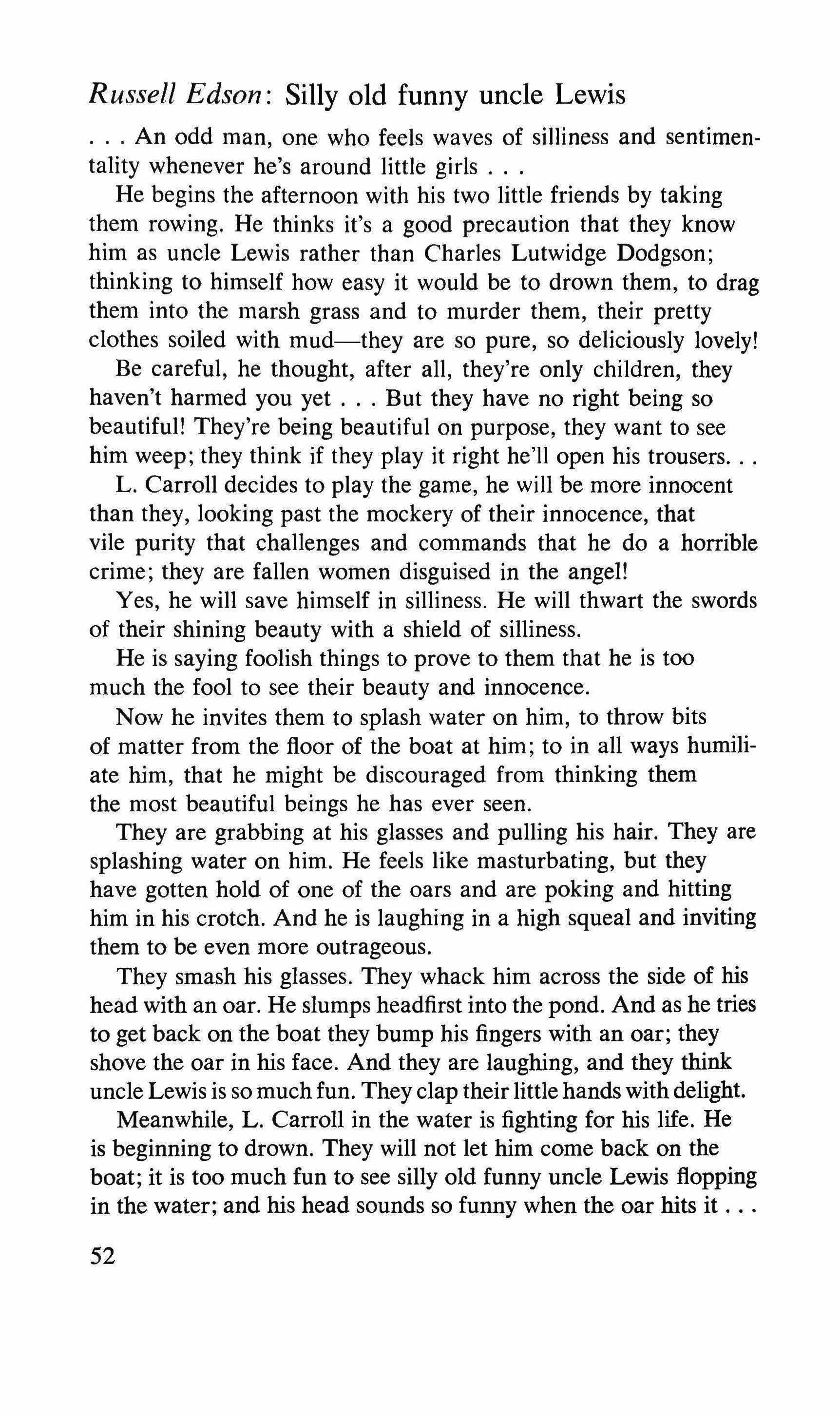 Russell Edson: Silly old funny
Russell Edson: Silly old funny
An odd man, one who feels waves of silliness and sentimentality whenever he's around little girls
He begins the afternoon with his two little friends by taking them rowing. He thinks it's a good precaution that they know him as uncle Lewis rather than Charles Lutwidge Dodgson; thinking to himself how easy it would be to drown them, to drag them into the marsh grass and to murder them, their pretty clothes soiled with mud-they are so pure, so deliciously lovely!
Be careful, he thought, after all, they're only children, they haven't harmed you yet But they have no right being so beautiful! They're being beautiful on purpose, they want to see him weep; they think if they play it right he'll open his trousers
L. Carroll decides to play the game, he will be more innocent than they, looking past the mockery of their innocence, that vile purity that challenges and commands that he do a horrible crime; they are fallen women disguised in the angel!
Yes, he will save himself in silliness. He will thwart the swords of their shining beauty with a shield of silliness.
He is saying foolish things to prove to them that he is too much the fool to see their beauty and innocence.
Now he invites them to splash water on him, to throw bits of matter from the floor of the boat at him; to in all ways humiliate him, that he might be discouraged from thinking them the most beautiful beings he has ever seen.
They are grabbing at his glasses and pulling his hair. They are splashing water on him. He feels like masturbating, but they have gotten hold of one of the oars and are poking and hitting him in his crotch. And he is laughing in a high squeal and inviting them to be even more outrageous.
They smash his glasses. They whack him across the side of his head with an oar. He slumps headfirst into the pond. And as he tries to get back on the boat they bump his fingers with an oar; they shove the oar in his face. And they are laughing, and they think uncle Lewis is so much fun. Theyclap their little hands with delight.
Meanwhile, L. Carroll in the water is fighting for his life. He is beginning to drown. They will not let him come back on the boat; it is too much fun to see silly old funny uncle Lewis flopping in the water; and his head sounds so funny when the oar hits it
Meanwhile, L. Carroll is swallowing too much water; he is beginning to lose consciousness from the oar that keeps hitting his head.
The last thing L. Carroll sees is his two beautiful little friends laughing and applauding with delight at their silly old funny uncle Lewis drowning
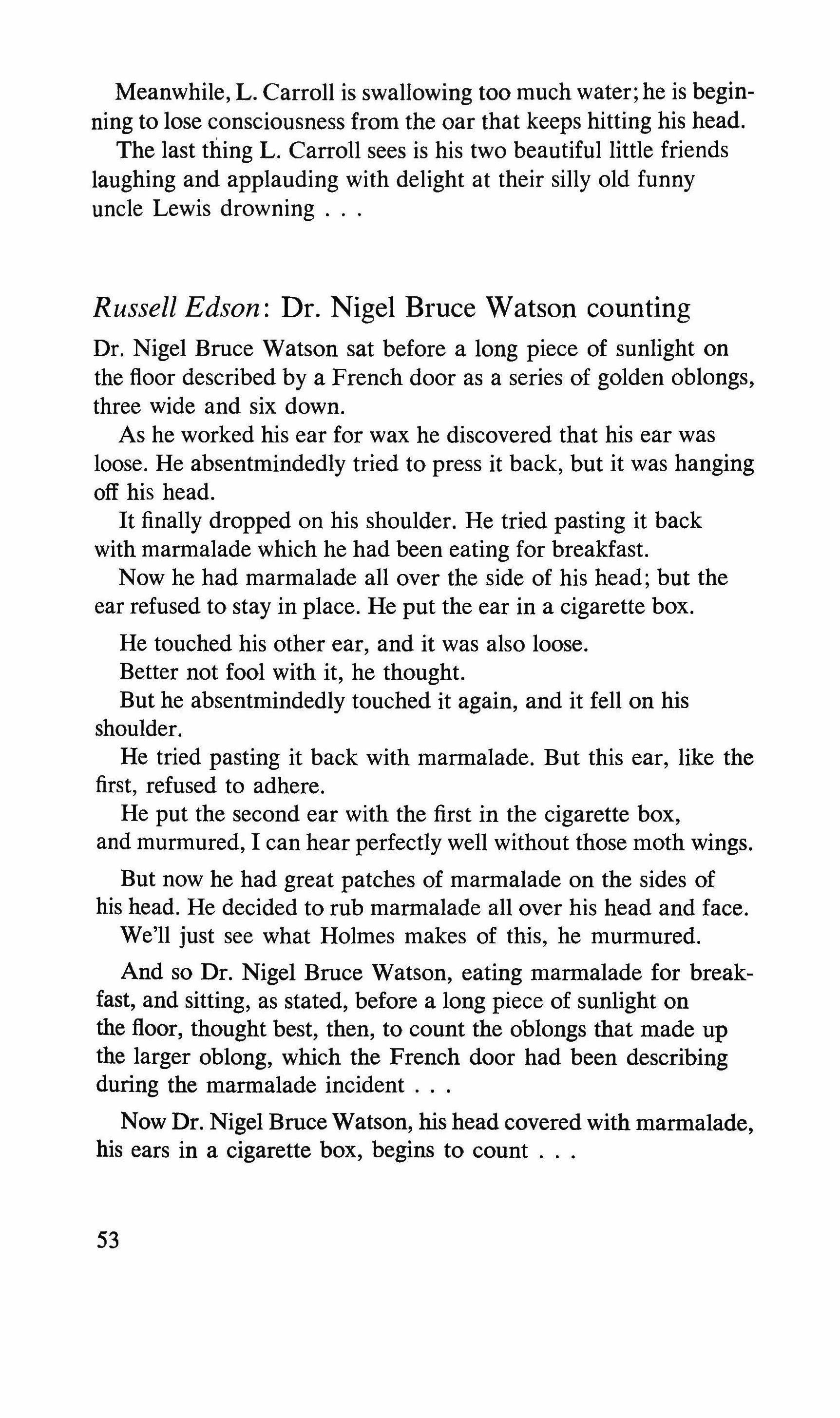
Russell Edson: Dr. Nigel Bruce Watson counting Dr. Nigel Bruce Watson sat before a long piece of sunlight on the floor described by a French door as a series of golden oblongs, three wide and six down.
As he worked his ear for wax he discovered that his ear was loose. He absentmindedly tried to press it back, but it was hanging off his head.
It finally dropped on his shoulder. He tried pasting it back with marmalade which he had been eating for breakfast.
Now he had marmalade all over the side of his head; but the ear refused to stay in place. He put the ear in a cigarette box.
He touched his other ear, and it was also loose.
Better not fool with it, he thought.
But he absentmindedly touched it again, and it fell on his shoulder.
He tried pasting it back with marmalade. But this ear, like the first, refused to adhere.
He put the second ear with the first in the cigarette box, and murmured, I can hear perfectly well without those moth wings.
But now he had great patches of marmalade on the sides of his head. He decided to rub marmalade all over his head and face.
We'll just see what Holmes makes of this, he murmured.
And so Dr. Nigel Bruce Watson, eating marmalade for breakfast, and sitting, as stated, before a long piece of sunlight on the floor, thought best, then, to count the oblongs that made up the larger oblong, which the French door had been describing during the marmalade incident
Now Dr. Nigel Bruce Watson, his head covered with marmalade, his ears in a cigarette box, begins to count
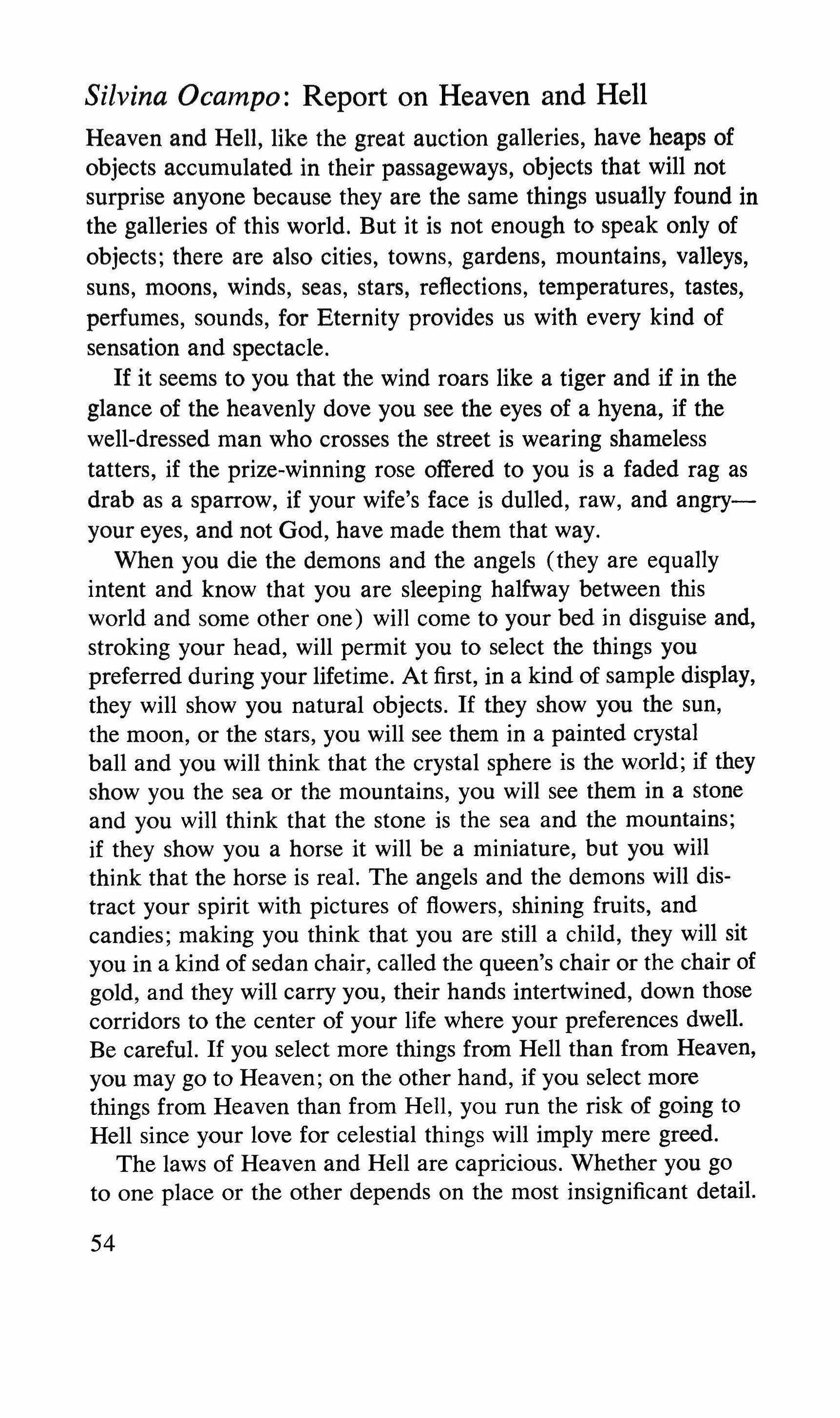
Heaven and Hell, like the great auction galleries, have heaps of objects accumulated in their passageways, objects that will not surprise anyone because they are the same things usually found in the galleries of this world. But it is not enough to speak only of objects; there are also cities, towns, gardens, mountains, valleys, suns, moons, winds, seas, stars, reflections, temperatures, tastes, perfumes, sounds, for Eternity provides us with every kind of sensation and spectacle.
If it seems to you that the wind roars like a tiger and if in the glance of the heavenly dove you see the eyes of a hyena, if the well-dressed man who crosses the street is wearing shameless tatters, if the prize-winning rose offered to you is a faded rag as drab as a sparrow, if your wife's face is dulled, raw, and angryyour eyes, and not God, have made them that way.
When you die the demons and the angels (they are equally intent and know that you are sleeping halfway between this world and some other one) will come to your bed in disguise and, stroking your head, will permit you to select the things you preferred during your lifetime. At first, in a kind of sample display, they will show you natural objects. If they show you the sun, the moon, or the stars, you will see them in a painted crystal ball and you will think that the crystal sphere is the world; if they show you the sea or the mountains, you will see them in a stone and you will think that the stone is the sea and the mountains; if they show you a horse it will be a miniature, but you will think that the horse is real. The angels and the demons will distract your spirit with pictures of flowers, shining fruits, and candies; making you think that you are still a child, they will sit you in a kind of sedan chair, called the queen's chair or the chair of gold, and they will carry you, their hands intertwined, down those corridors to the center of your life where your preferences dwell. Be careful. If you select more things from Hell than from Heaven, you may go to Heaven; on the other hand, if you select more things from Heaven than from Hell, you run the risk of going to Hell since your love for celestial things will imply mere greed. The laws of Heaven and Hell are capricious. Whether you go to one place or the other depends on the most insignificant detail.
I know of people who have gone to Hell because of a broken key or a wicker cage and of others who have gone to Heaven because of a sheet of newspaper or a cup of milk. -translated by Edith
Grossman
There was a taxi driver who had one story he liked to tell over again, and over again: "One day in December, it was unusually warm and unusually beautiful; there were no clouds in the sky, and patches of blue sky were fallen to the curbs in small puddles left from the old melted snow. Everyone was walking and the cabs were empty as coffins. It wasn't until two o'clock in the morning that it began to rain, and even then it was a light rain, so there would be no fares for that day. I am a night owl and a late riser and so is my wife, so I went out to get some cigarettes. Most of the stores were closed; I got into my cab and began driving around.
"I had not gone more than two blocks when a man flagged me. Even from a distance, I could see he was elegantly dressed. The street lights glinted from his brown leather coat and his attache case, and when he got in, I could see his coat had a heavy beaver collar. He had on some very thin leather gloves made of an even lighter shade, and the stitches in them were lighter still. The man wanted to go into Manhattan; we drove to One Hundred and Sixty-fifth Street, and I waited; then he wanted to go to the Island, and I waited; he went into a house that was huge, half the size of our block and with a porch supported by great white columns. He came back; he got in; he smiled. Then he gave me his address in the city; he said he had to pick up his suitcase; he was going to the airport. When we got to Eightysixth and Central Park West, I was to wait again. By this time the meter read almost sixty dollars, and I thought, what makes me think he will ever come back? But when I opened the door to look out, the doorman came over and told me not to worry about him, he was always good for his money.
"We drove out to the airport. He had nothing to say; he stared ahead, his perfect marble face diminished in the mirror, seem-
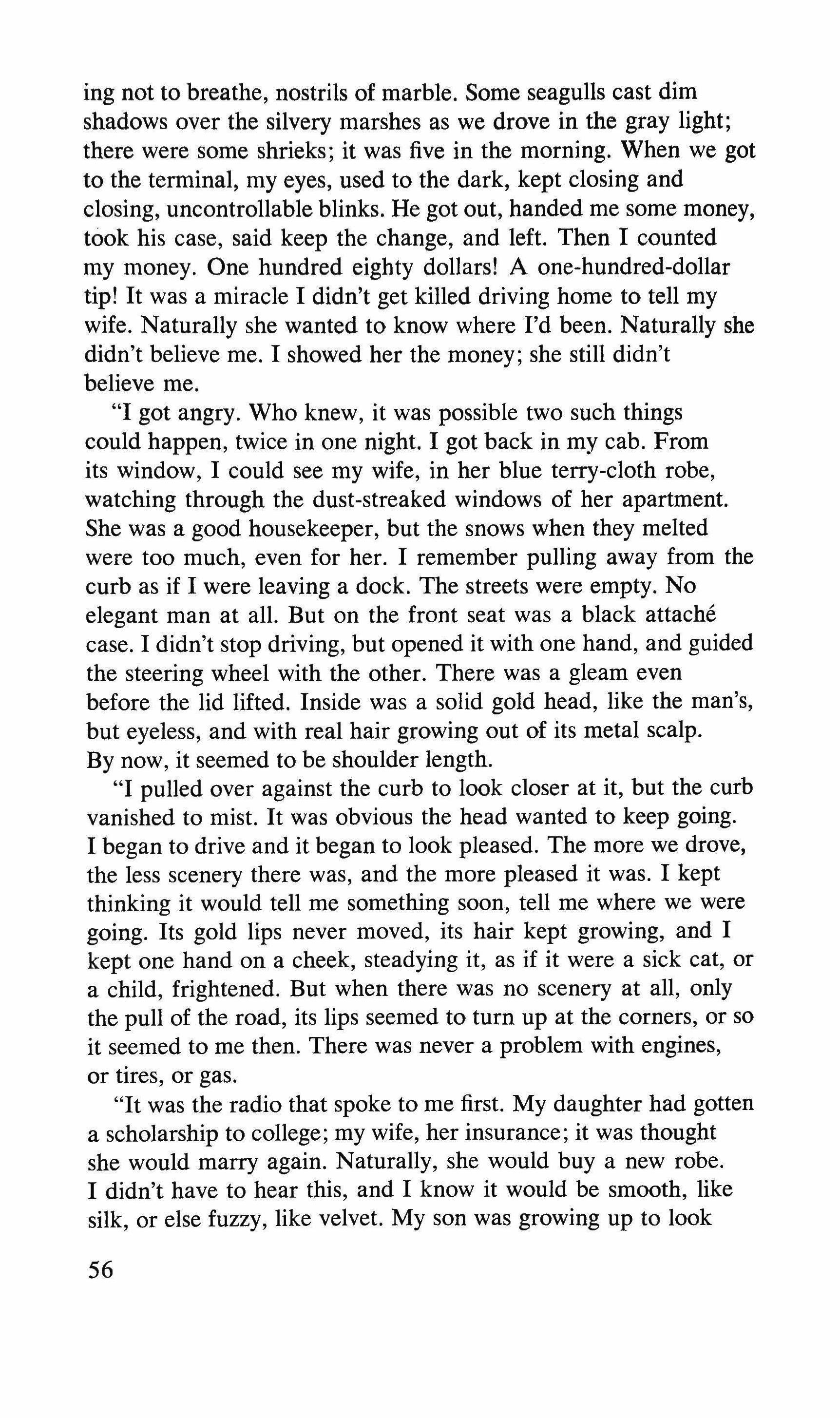
ing not to breathe, nostrils of marble. Some seagulls cast dim shadows over the silvery marshes as we drove in the gray light; there were some shrieks; it was five in the morning. When we got to the terminal, my eyes, used to the dark, kept closing and closing, uncontrollable blinks. He got out, handed me some money, took his case, said keep the change, and left. Then I counted my money. One hundred eighty dollars! A one-hundred-dollar tip! It was a miracle I didn't get killed driving home to tell my wife. Naturally she wanted to know where I'd been. Naturally she didn't believe me. I showed her the money; she still didn't believe me.
"I got angry. Who knew, it was possible two such things could happen, twice in one night. I got back in my cab. From its window, I could see my wife, in her blue terry-cloth robe, watching through the dust-streaked windows of her apartment. She was a good housekeeper, but the snows when they melted were too much, even for her. I remember pulling away from the curb as if I were leaving a dock. The streets were empty. No elegant man at all. But on the front seat was a black attache case. I didn't stop driving, but opened it with one hand, and guided the steering wheel with the other. There was a gleam even before the lid lifted. Inside was a solid gold head, like the man's, but eyeless, and with real hair growing out of its metal scalp. By now, it seemed to be shoulder length.
"I pulled over against the curb to look closer at it, but the curb vanished to mist. It was obvious the head wanted to keep going. I began to drive and it began to look pleased. The more we drove, the less scenery there was, and the more pleased it was. I kept thinking it would tell me something soon, tell me where we were going. Its gold lips never moved, its hair kept growing, and I kept one hand on a cheek, steadying it, as if it were a sick cat, or a child, frightened. But when there was no scenery at all, only the pull of the road, its lips seemed to turn up at the corners, or so it seemed to me then. There was never a problem with engines, or tires, or gas.
"It was the radio that spoke to me first. My daughter had gotten a scholarship to college; my wife, her insurance; it was thought she would marry again. Naturally, she would buy a new robe. I didn't have to hear this, and I know it would be smooth, like silk, or else fuzzy, like velvet. My son was growing up to look
more and more like his father, and fighting in the playgrounds. The gold hair spilled over the seat and onto the floor near the accelerator pedal. The meter has long ago lost its ability to register the fare for the miles that we cover, but still it keeps on, like an electrified heart. It clicks. It clicks. I keep waiting for the gold head to speak to me, for the gold lips to part, but so far it has said nothing, although it seems that now, when I drive, I have to place my hand on the cheek differently, which may mean it has changed its position and is now staring at me."
Bob Perelman: Her me them itHugging that dark eyed thing this morning, sky eyed blue girlfriend with circles under those eyes. Yum yum, same old girlfriend. Then the nephews came in, the affair remained unconsummated. Get dressed, it's pouring rain, damp cloth on knees, chest. Poor things, damp. Cows, raspberries, high beaded grass down a steep ravine, all under rain: those things are called memory. Not here. Just passing through.
The nephews are in bad moods, completely out of their hammocks. It's dark down in the kitchen, rain, a fresh paper, tea, eggs, toast, butter, ahgg, eat, damp, itchy, lovely people, awful. Nobody gets anything. Take them to the aquarium.
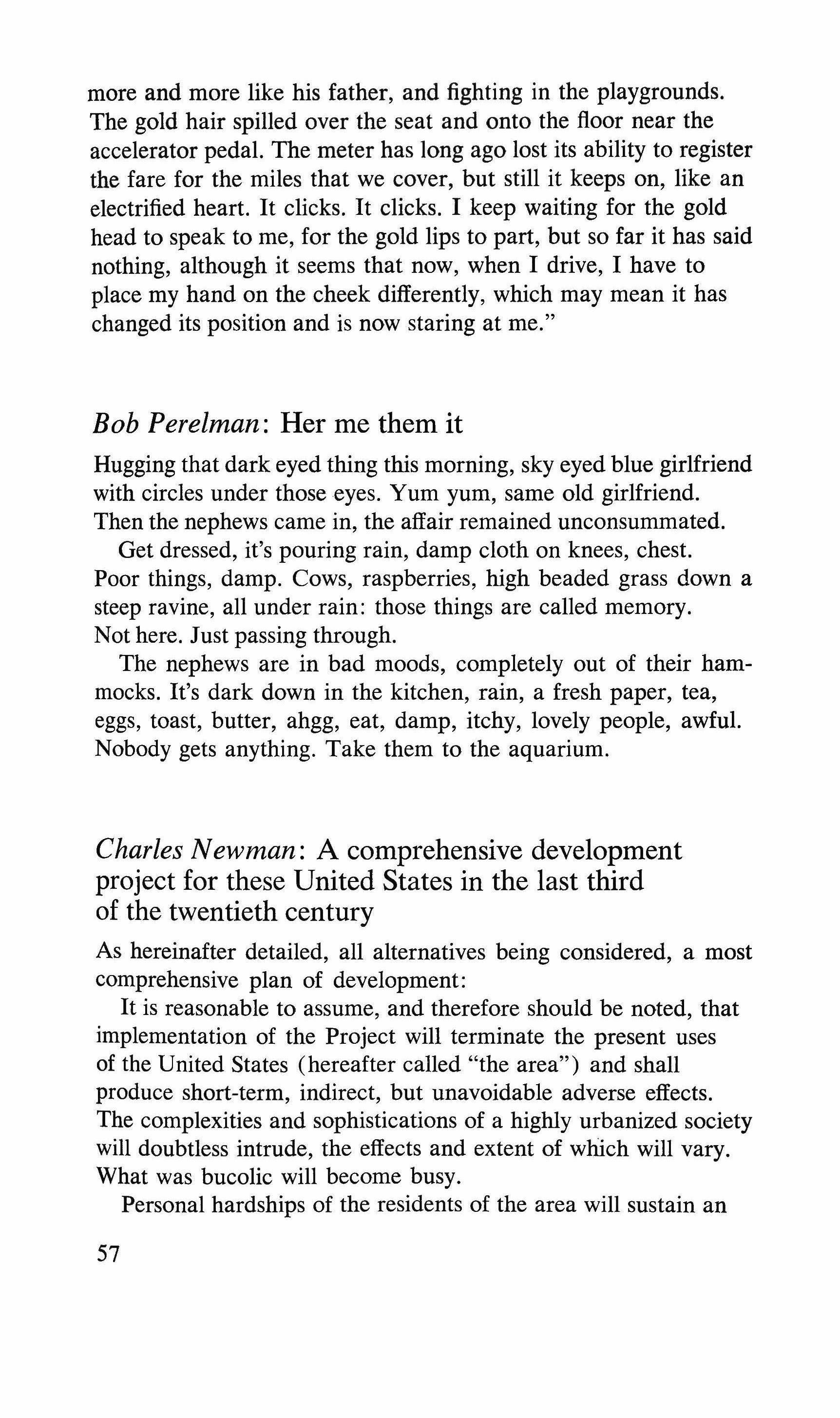
Charles Newman: A comprehensive development project for these United States in the last third of the twentieth century
As hereinafter detailed, all alternatives being considered, a most comprehensive plan of development: It is reasonable to assume, and therefore should be noted, that implementation of the Project will terminate the present uses of the United States (hereafter called "the area") and shall produce short-term, indirect, but unavoidable adverse effects. The complexities and sophistications of a highly urbanized society will doubtless intrude, the effects and extent of which will vary. What was bucolic will become busy.
Personal hardships of the residents of the area will sustain an
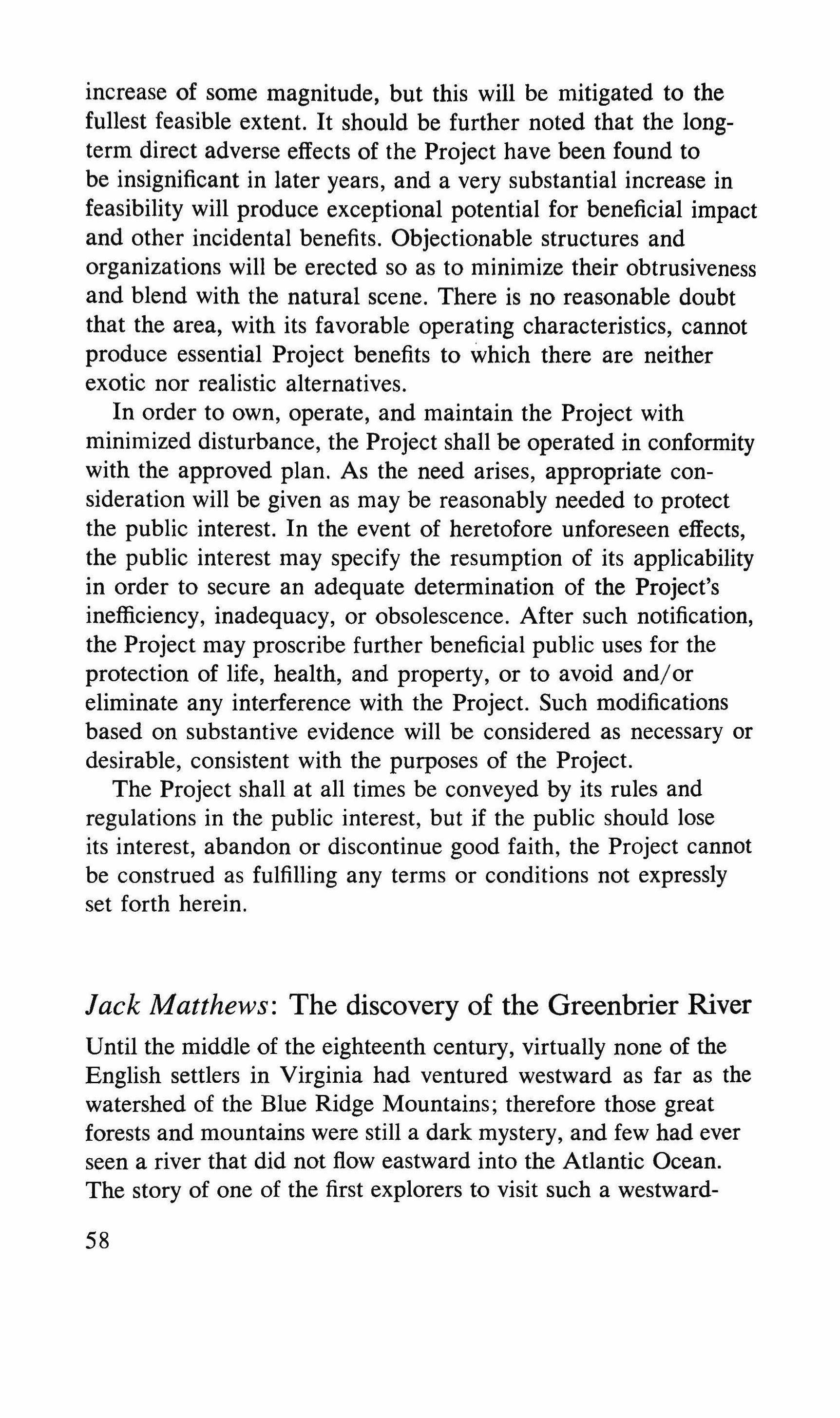
increase of some magnitude, but this will be mitigated to the fullest feasible extent. It should be further noted that the longterm direct adverse effects of the Project have been found to be insignificant in later years, and a very substantial increase in feasibility will produce exceptional potential for beneficial impact and other incidental benefits. Objectionable structures and organizations will be erected so as to minimize their obtrusiveness and blend with the natural scene. There is no reasonable doubt that the area, with its favorable operating characteristics, cannot produce essential Project benefits to which there are neither exotic nor realistic alternatives.
In order to own, operate, and maintain the Project with minimized disturbance, the Project shall be operated in conformity with the approved plan. As the need arises, appropriate consideration will be given as may be reasonably needed to protect the public interest. In the event of heretofore unforeseen effects, the public interest may specify the resumption of its applicability in order to secure an adequate determination of the Project's inefficiency, inadequacy, or obsolescence. After such notification, the Project may proscribe further beneficial public uses for the protection of life, health, and property, or to avoid and/or eliminate any interference with the Project. Such modifications based on substantive evidence will be considered as necessary or desirable, consistent with the purposes of the Project.
The Project shall at all times be conveyed by its rules and regulations in the public interest, but if the public should lose its interest, abandon or discontinue good faith, the Project cannot be construed as fulfilling any terms or conditions not expressly set forth herein.
Until the middle of the eighteenth century, virtually none of the English settlers in Virginia had ventured westward as far as the watershed of the Blue Ridge Mountains; therefore those great forests and mountains were still a dark mystery, and few had ever seen a river that did not flow eastward into the Atlantic Ocean. The story of one of the first explorers to visit such a westward-
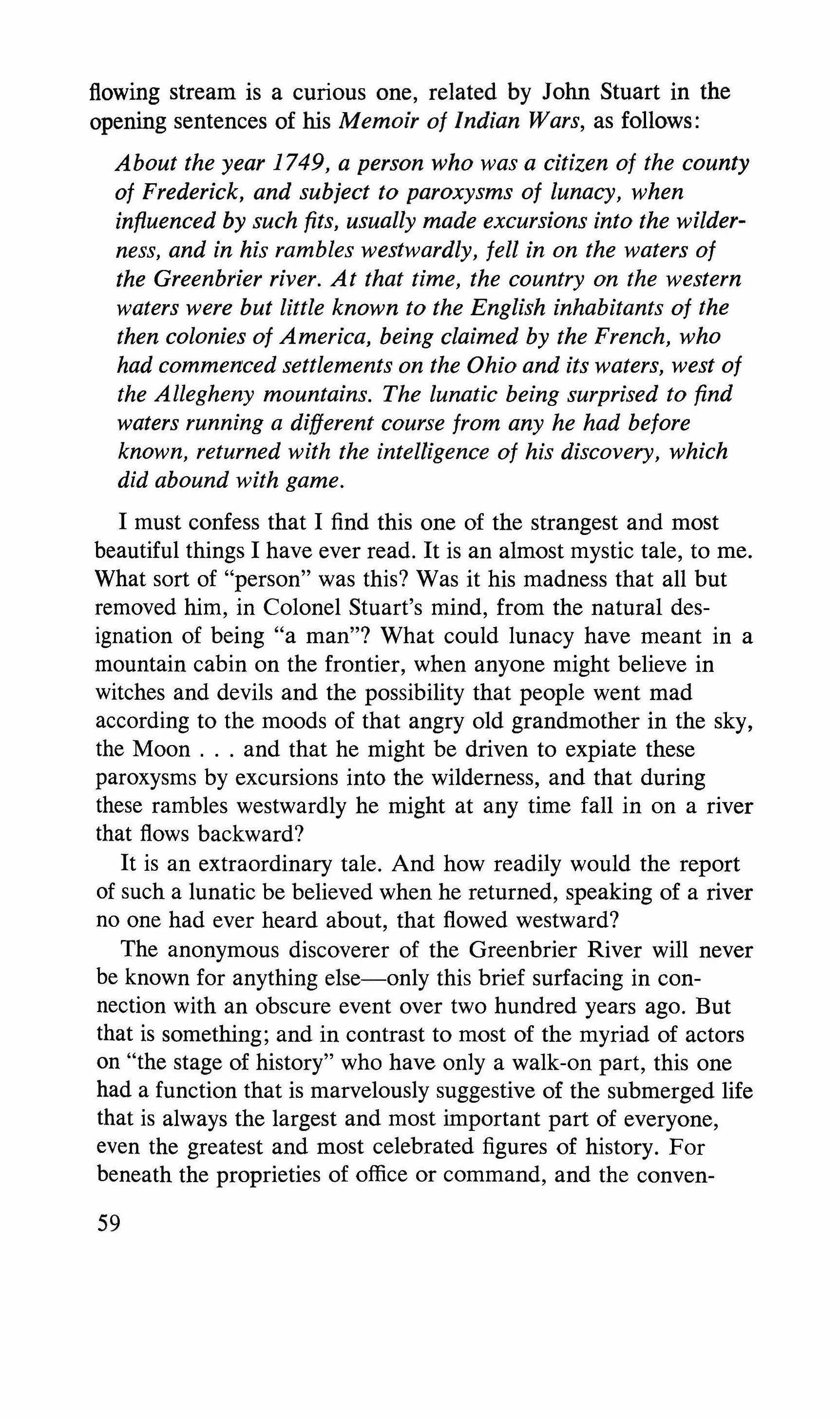
flowing stream is a curious one, related by John Stuart in the opening sentences of his Memoir of Indian Wars, as follows:
About the year 1749, a person who was a citizen of the county of Frederick, and subject to paroxysms of lunacy, when influenced by such fits, usually made excursions into the wilderness, and in his rambles westwardly, fell in on the waters of the Greenbrier river. At that time, the country on the western waters were but little known to the English inhabitants of the then colonies of America, being claimed by the French, who had commenced settlements on the Ohio and its waters, west of the Allegheny mountains. The lunatic being surprised to find waters running a different course from any he had before known, returned with the intelligence of his discovery, which did abound with game.
I must confess that I find this one of the strangest and most beautiful things I have ever read. It is an almost mystic tale, to me. What sort of "person" was this? Was it his madness that all but removed him, in Colonel Stuart's mind, from the natural designation of being "a man"? What could lunacy have meant in a mountain cabin on the frontier, when anyone might believe in witches and devils and the possibility that people went mad according to the moods of that angry old grandmother in the sky, the Moon and that he might be driven to expiate these paroxysms by excursions into the wilderness, and that during these rambles westwardly he might at any time fall in on a river that flows backward?
It is an extraordinary tale. And how readily would the report of such a lunatic be believed when he returned, speaking of a river no one had ever heard about, that flowed westward?
The anonymous discoverer of the Greenbrier River will never be known for anything else-only this brief surfacing in connection with an obscure event over two hundred years ago. But that is something; and in contrast to most of the myriad of actors on "the stage of history" who have only a walk-on part, this one had a function that is marvelously suggestive of the submerged life that is always the largest and most important part of everyone, even the greatest and most celebrated figures of history. For beneath the proprieties of office or command, and the conven-
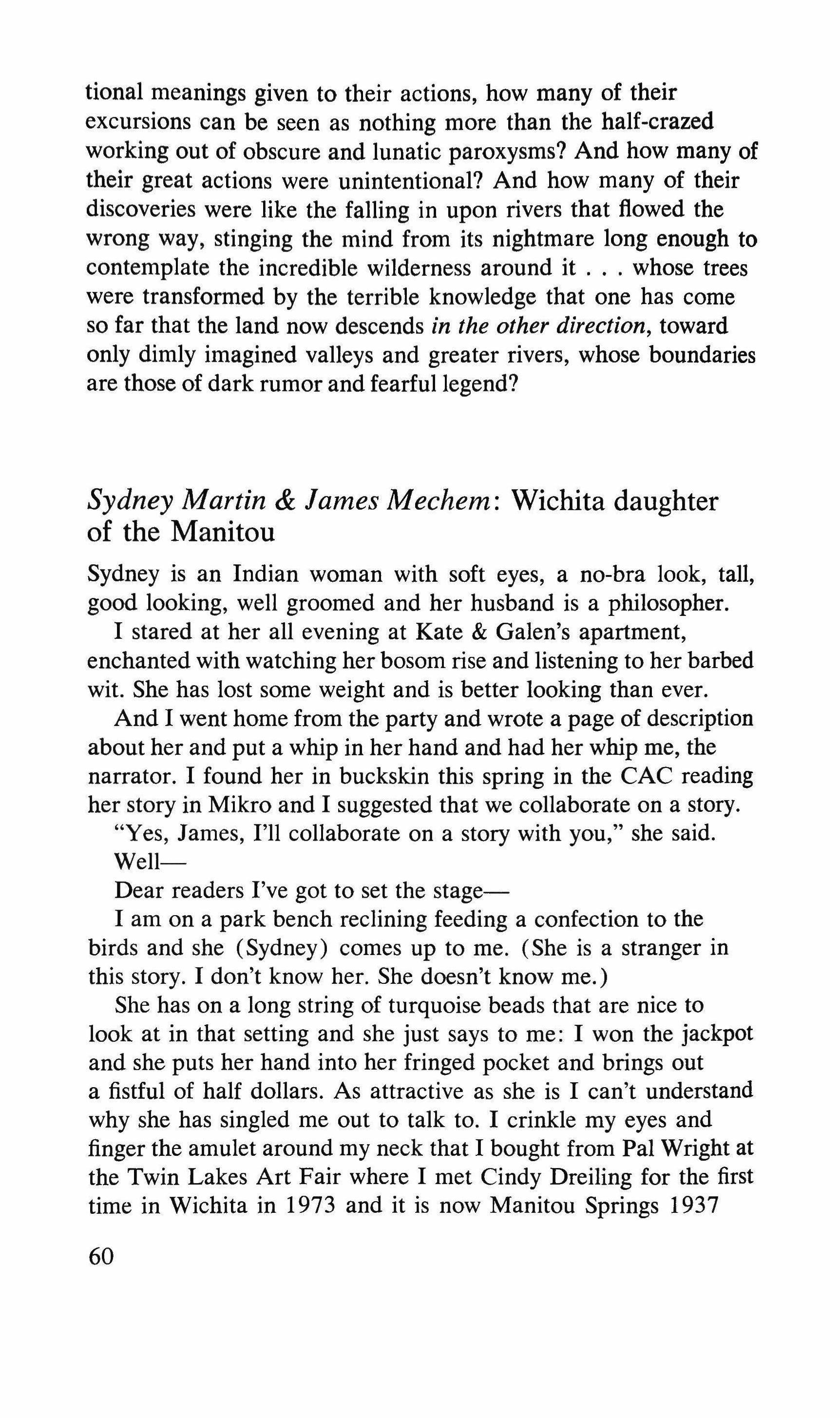
tional meanings given to their actions, how many of their excursions can be seen as nothing more than the half-crazed working out of obscure and lunatic paroxysms? And how many of their great actions were unintentional? And how many of their discoveries were like the falling in upon rivers that flowed the wrong way, stinging the mind from its nightmare long enough to contemplate the incredible wilderness around it whose trees were transformed by the terrible knowledge that one has come so far that the land now descends in the other direction, toward only dimly imagined valleys and greater rivers, whose boundaries are those of dark rumor and fearful legend?
Sydney is an Indian woman with soft eyes, a no-bra look, tall, good looking, well groomed and her husband is a philosopher. I stared at her all evening at Kate & Galen's apartment, enchanted with watching her bosom rise and listening to her barbed wit. She has lost some weight and is better looking than ever. And I went home from the party and wrote a page of description about her and put a whip in her hand and had her whip me, the narrator. I found her in buckskin this spring in the CAC reading her story in Mikro and I suggested that we collaborate on a story.
"Yes, James, I'll collaborate on a story with you," she said.
Well-
Dear readers I've got to set the stage-
I am on a park bench reclining feeding a confection to the birds and she (Sydney) comes up to me. (She is a stranger in this story. I don't know her. She doesn't know me.)
She has on a long string of turquoise beads that are nice to look at in that setting and she just says to me: I won the jackpot and she puts her hand into her fringed pocket and brings out a fistful of half dollars. As attractive as she is I can't understand why she has singled me out to talk to. I crinkle my eyes and finger the amulet around my neck that I bought from Pal Wright at the Twin Lakes Art Fair where I met Cindy Dreiling for the first time in Wichita in 1973 and it is now Manitou Springs 1937
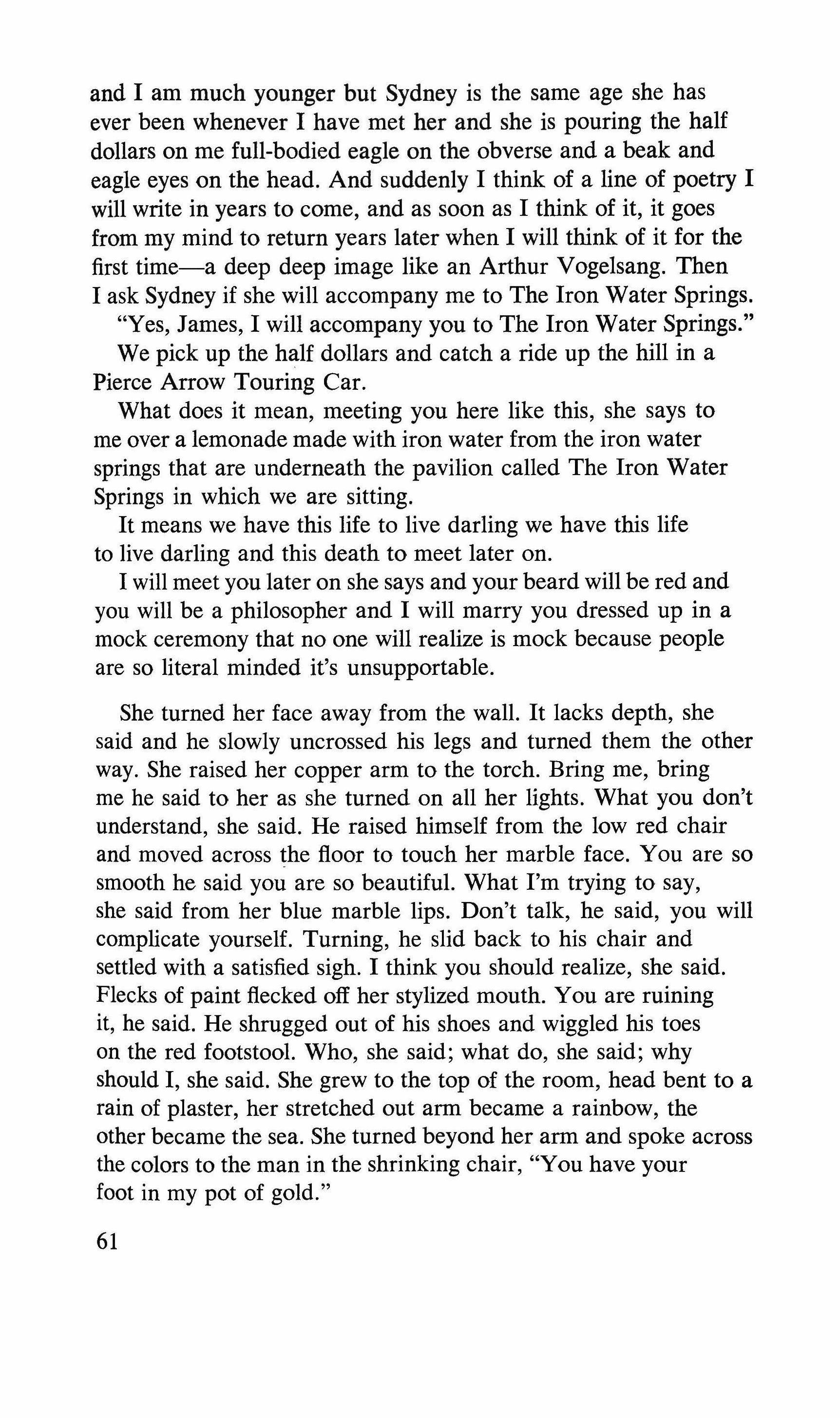
and I am much younger but Sydney is the same age she has ever been whenever I have met her and she is pouring the half dollars on me full-bodied eagle on the obverse and a beak and eagle eyes on the head. And suddenly I think of a line of poetry I will write in years to come, and as soon as I think of it, it goes from my mind to return years later when I will think of it for the first time-a deep deep image like an Arthur Vogelsang. Then I ask Sydney if she will accompany me to The Iron Water Springs. "Yes, James, I will accompany you to The Iron Water Springs." We pick up the half dollars and catch a ride up the hill in a Pierce Arrow Touring Car.
What does it mean, meeting you here like this, she says to me over a lemonade made with iron water from the iron water springs that are underneath the pavilion called The Iron Water Springs in which we are sitting.
It means we have this life to live darling we have this life to live darling and this death to meet later on.
I will meet you later on she says and your beard will be red and you will be a philosopher and I will marry you dressed up in a mock ceremony that no one will realize is mock because people are so literal minded it's unsupportable.
She turned her face away from the wall. It lacks depth, she said and he slowly uncrossed his legs and turned them the other way. She raised her copper arm to the torch. Bring me, bring me he said to her as she turned on all her lights. What you don't understand, she said. He raised himself from the low red chair and moved across the floor to touch her marble face. You are so smooth he said you are so beautifuL What I'm trying to say, she said from her blue marble lips. Don't talk, he said, you will complicate yourself. Turning, he slid back to his chair and settled with a satisfied sigh. I think you should realize, she said. Flecks of paint flecked off her stylized mouth. You are ruining it, he said. He shrugged out of his shoes and wiggled his toes on the red footstooL Who, she said; what do, she said; why should I, she said. She grew to the top of the room, head bent to a rain of plaster, her stretched out arm became a rainbow, the other became the sea. She turned beyond her arm and spoke across the colors to the man in the shrinking chair, "You have your foot in my pot of gold."
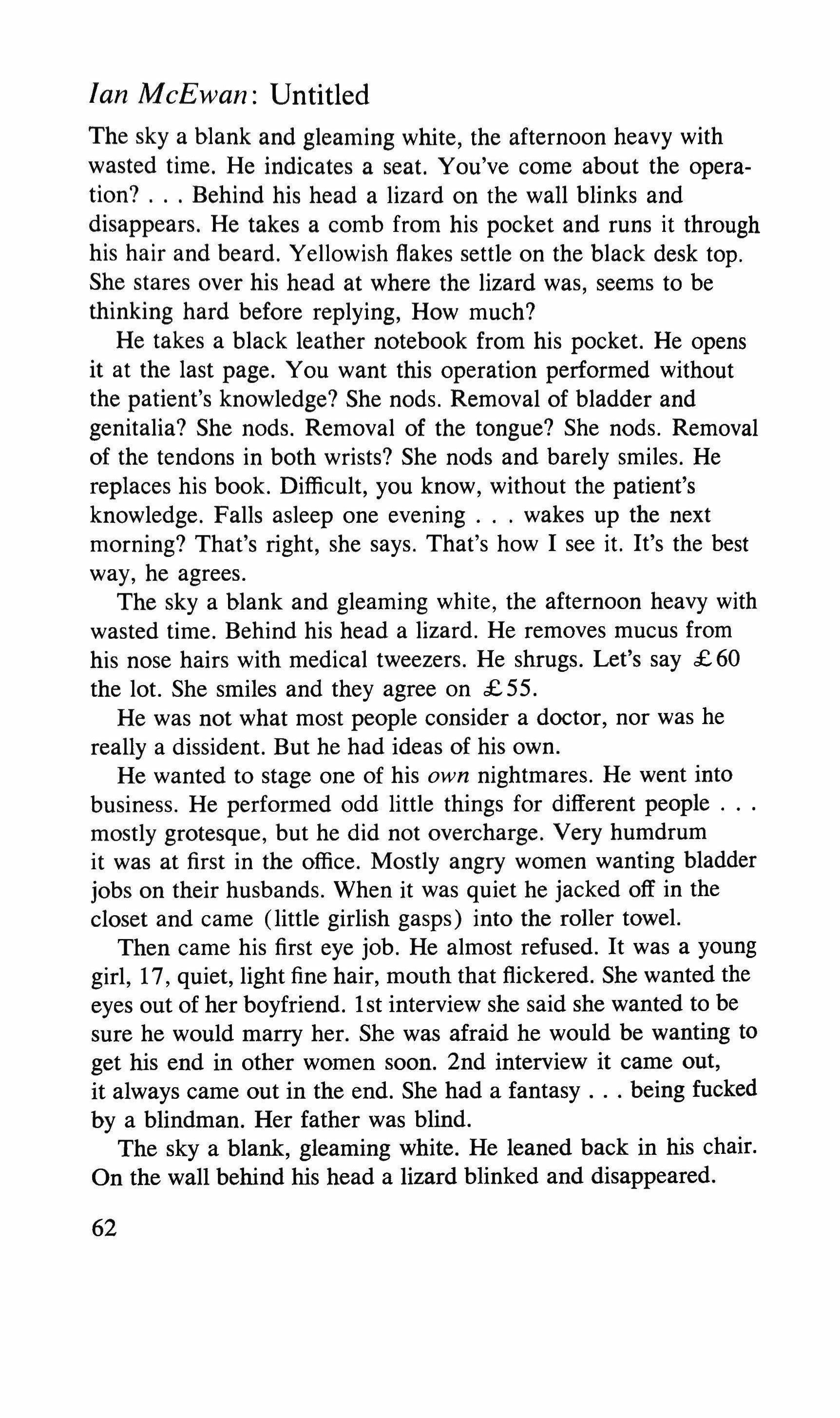 Ian McEwan: Untitled
Ian McEwan: Untitled
The sky a blank and gleaming white, the afternoon heavy with wasted time. He indicates a seat. You've come about the operation? Behind his head a lizard on the wall blinks and disappears. He takes a comb from his pocket and runs it through his hair and beard. Yellowish flakes settle on the black desk top. She stares over his head at where the lizard was, seems to be thinking hard before replying, How much?
He takes a black leather notebook from his pocket. He opens it at the last page. You want this operation performed without the patient's knowledge? She nods. Removal of bladder and genitalia? She nods. Removal of the tongue? She nods. Removal of the tendons in both wrists? She nods and barely smiles. He replaces his book. Difficult, you know, without the patient's knowledge. Falls asleep one evening wakes up the next morning? That's right, she says. That's how I see it. It's the best way, he agrees.
The sky a blank and gleaming white, the afternoon heavy with wasted time. Behind his head a lizard. He removes mucus from his nose hairs with medical tweezers. He shrugs. Let's say £ 60 the lot. She smiles and they agree on £ 55.
He was not what most people consider a doctor, nor was he really a dissident. But he had ideas of his own.
He wanted to stage one of his own nightmares. He went into business. He performed odd little things for different people mostly grotesque, but he did not overcharge. Very humdrum it was at first in the office. Mostly angry women wanting bladder jobs on their husbands. When it was quiet he jacked off in the closet and came (little girlish gasps) into the roller towel.
Then came his first eye job. He almost refused. It was a young girl, 17, quiet, light fine hair, mouth that flickered. She wanted the eyes out of her boyfriend. 1 st interview she said she wanted to be sure he would marry her. She was afraid he would be wanting to get his end in other women soon. 2nd interview it came out, it always came out in the end. She had a fantasy being fucked by a blindman. Her father was blind.
The sky a blank, gleaming white. He leaned back in his chair. On the wall behind his head a lizard blinked and disappeared.
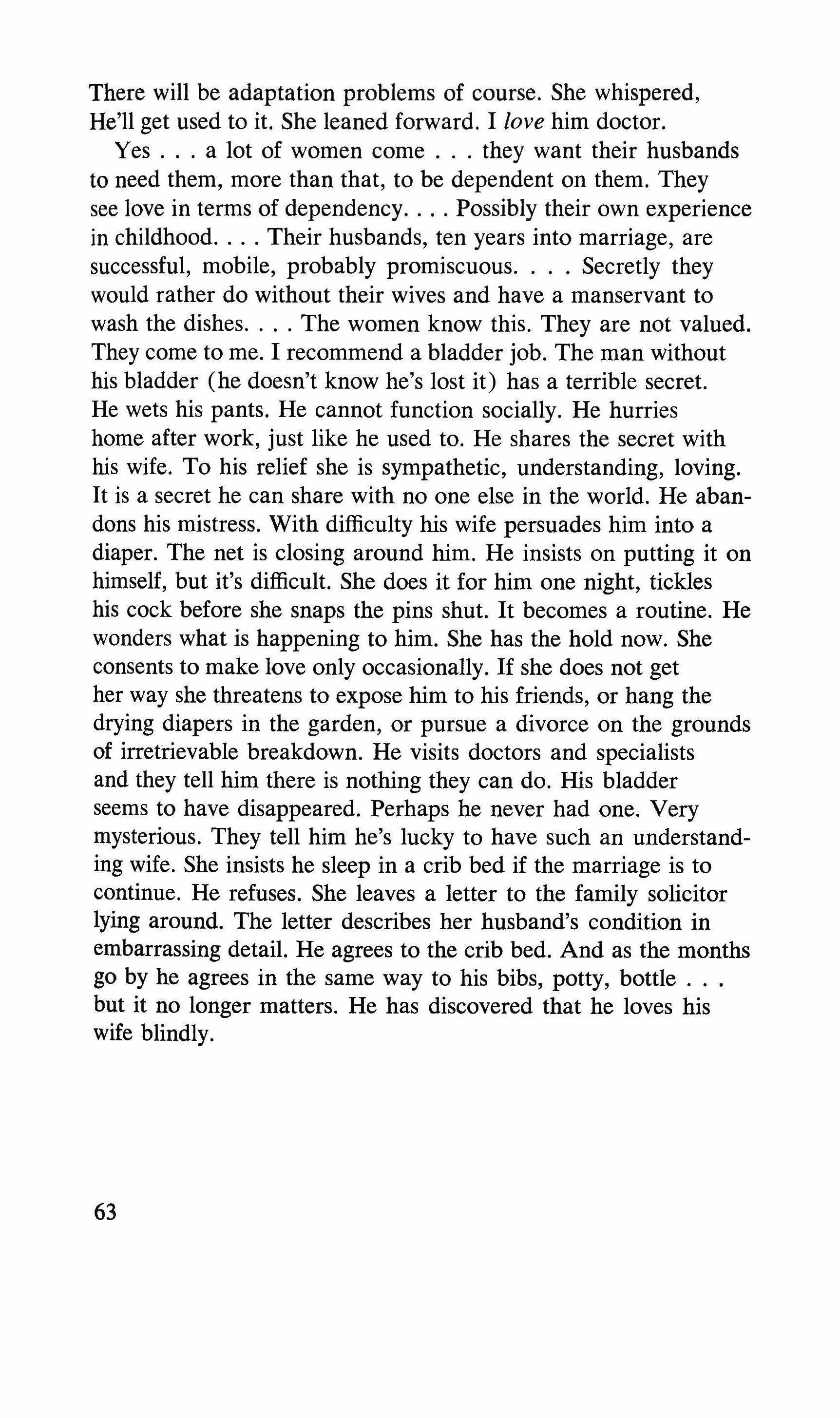
There will be adaptation problems of course. She whispered, He'll get used to it. She leaned forward. I love him doctor. Yes a lot of women come they want their husbands to need them, more than that, to be dependent on them. They see love in terms of dependency Possibly their own experience in childhood Their husbands, ten years into marriage, are successful, mobile, probably promiscuous. Secretly they would rather do without their wives and have a manservant to wash the dishes The women know this. They are not valued. They come to me. I recommend a bladder job. The man without his bladder (he doesn't know he's lost it) has a terrible secret. He wets his pants. He cannot function socially. He hurries home after work, just like he used to. He shares the secret with his wife. To his relief she is sympathetic, understanding, loving. It is a secret he can share with no one else in the world. He abandons his mistress. With difficulty his wife persuades him into a diaper. The net is closing around him. He insists on putting it on himself, but it's difficult. She does it for him one night, tickles his cock before she snaps the pins shut. It becomes a routine. He wonders what is happening to him. She has the hold now. She consents to make love only occasionally. If she does not get her way she threatens to expose him to his friends, or hang the drying diapers in the garden, or pursue a divorce on the grounds of irretrievable breakdown. He visits doctors and specialists and they tell him there is nothing they can do. His bladder seems to have disappeared. Perhaps he never had one. Very mysterious. They tell him he's lucky to have such an understanding wife. She insists he sleep in a crib bed if the marriage is to continue. He refuses. She leaves a letter to the family solicitor lying around. The letter describes her husband's condition in embarrassing detail. He agrees to the crib bed. And as the months go by he agrees in the same way to his bibs, potty, bottle but it no longer matters. He has discovered that he loves his wife blindly.
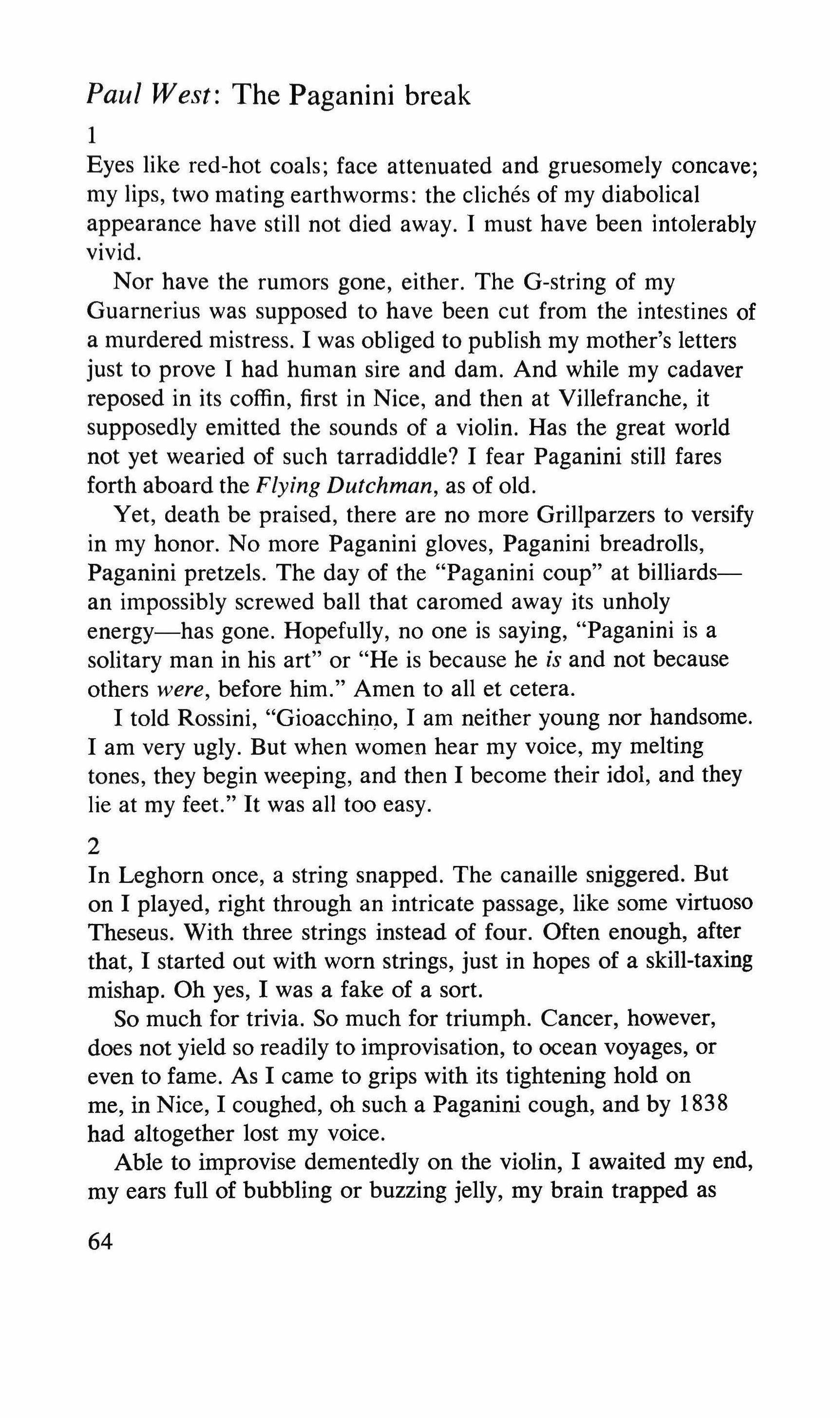
Eyes like red-hot coals; face attenuated and gruesomely concave; my lips, two mating earthworms: the cliches of my diabolical appearance have still not died away. I must have been intolerably vivid.
Nor have the rumors gone, either. The G-string of my Guarnerius was supposed to have been cut from the intestines of a murdered mistress. I was obliged to publish my mother's letters just to prove I had human sire and dam. And while my cadaver reposed in its coffin, first in Nice, and then at Villefranche, it supposedly emitted the sounds of a violin. Has the great world not yet wearied of such tarradiddle? I fear Paganini still fares forth aboard the Flying Dutchman, as of old.
Yet, death be praised, there are no more Grillparzers to versify in my honor. No more Paganini gloves, Paganini breadrolls, Paganini pretzels. The day of the "Paganini coup" at billiardsan impossibly screwed ball that caromed away its unholy energy-has gone. Hopefully, no one is saying, "Paganini is a solitary man in his art" or "He is because he is and not because others were, before him." Amen to all et cetera.
I told Rossini, "Gioacchino, I am neither young nor handsome. I am very ugly. But when women hear my voice, my melting tones, they begin weeping, and then I become their idol, and they lie at my feet." It was all too easy.
2
In Leghorn once, a string snapped. The canaille sniggered. But on I played, right through an intricate passage, like some virtuoso Theseus. With three strings instead of four. Often enough, after that, I started out with worn strings, just in hopes of a skill-taxing mishap. Oh yes, I was a fake of a sort.
So much for trivia. So much for triumph. Cancer, however, does not yield so readily to improvisation, to ocean voyages, or even to fame. As I came to grips with its tightening hold on me, in Nice, I coughed, oh such a Paganini cough, and by 1838 had altogether lost my voice.
Able to improvise dementedly on the violin, I awaited my end, my ears full of bubbling or buzzing jelly, my brain trapped as
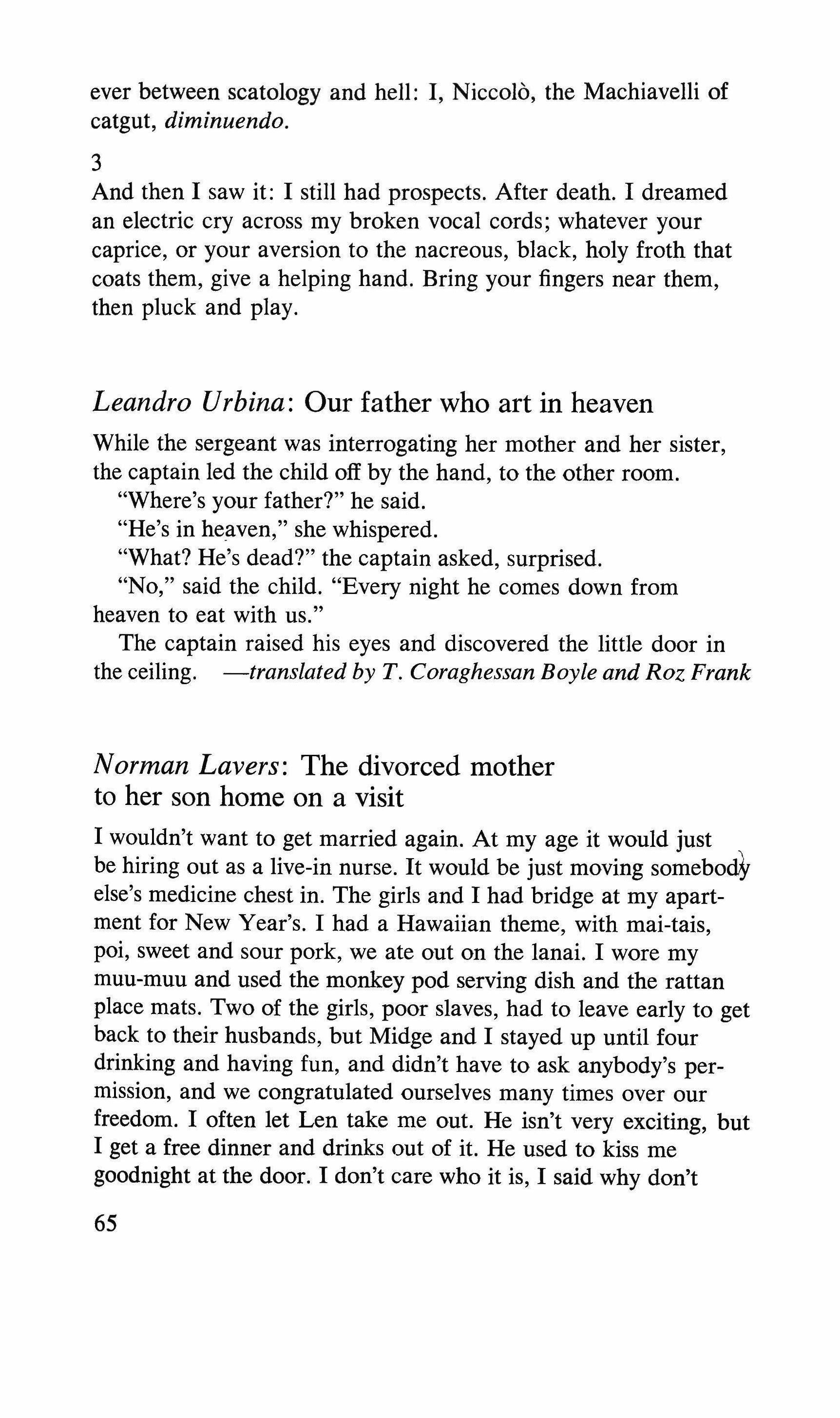
ever between scatology and hell: I, Niccolo, the Machiavelli of catgut, diminuendo.
3
And then I saw it: I still had prospects. After death. I dreamed an electric cry across my broken vocal cords; whatever your caprice, or your aversion to the nacreous, black, holy froth that coats them, give a helping hand. Bring your fingers near them, then pluck and play.
Urbina: Our father who art in heaven
While the sergeant was interrogating her mother and her sister, the captain led the child off by the hand, to the other room.
"Where's your father?" he said.
"He's in heaven," she whispered. "What? He's dead?" the captain asked, surprised. "No," said the child. "Every night he comes down from heaven to eat with us."
The captain raised his eyes and discovered the little door in the ceiling. -translated by T. Coraghessan Boyle and Ro: Frank
Norman Lavers: The divorced mother to her son home on a visit
I wouldn't want to get married again. At my age it would just be hiring out as a live-in nurse. It would be just moving somebody else's medicine chest in. The girls and I had bridge at my apartment for New Year's. I had a Hawaiian theme, with mai-tais, poi, sweet and sour pork, we ate out on the lanai. I wore my muu-muu and used the monkey pod serving dish and the rattan place mats. Two of the girls, poor slaves, had to leave early to get back to their husbands, but Midge and I stayed up until four drinking and having fun, and didn't have to ask anybody's permission, and we congratulated ourselves many times over our freedom. I often let Len take me out. He isn't very exciting, but I get a free dinner and drinks out of it. He used to kiss me goodnight at the door. I don't care who it is, I said why don't 65
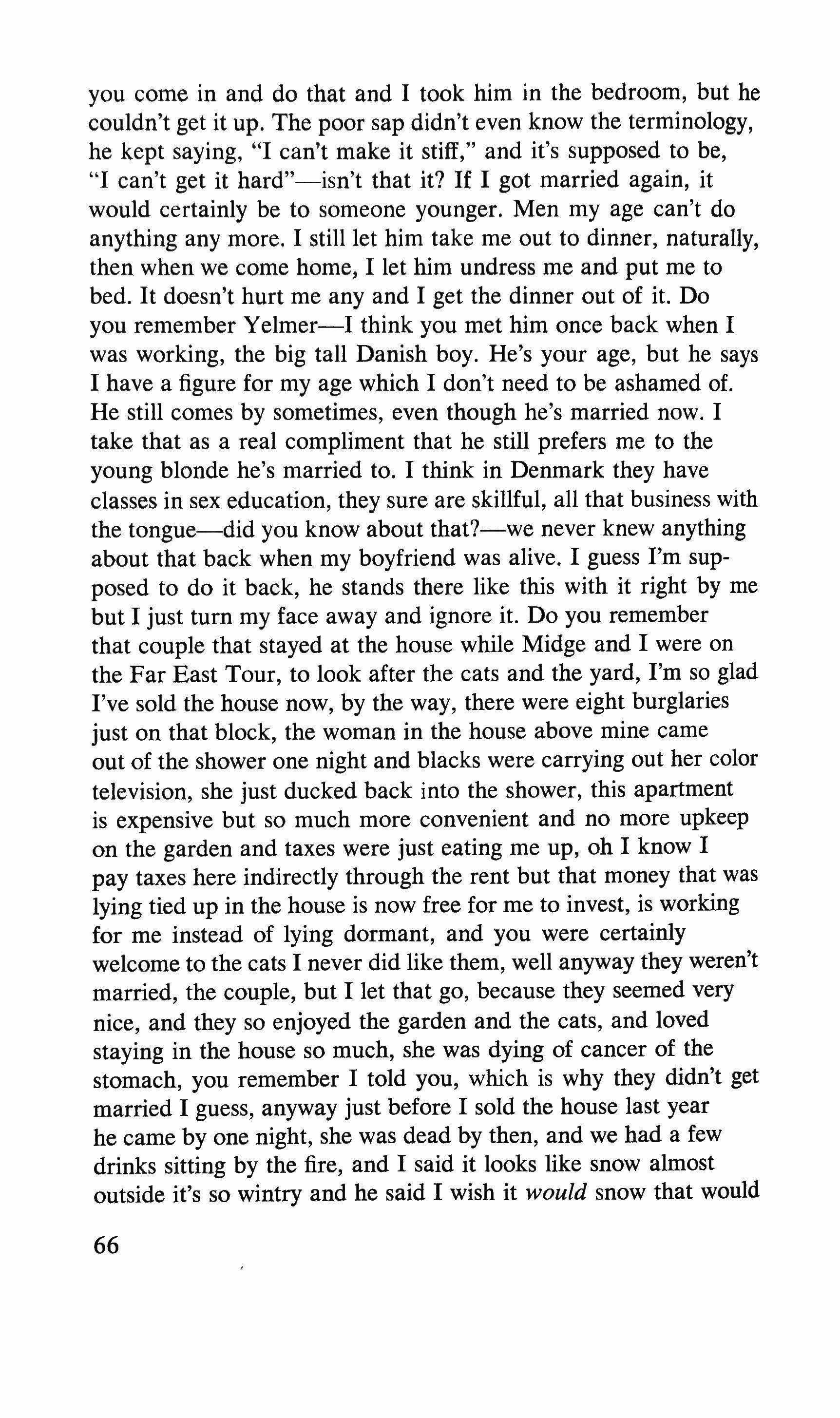
you come in and do that and I took him in the bedroom, but he couldn't get it up. The poor sap didn't even know the terminology, he kept saying, "I can't make it stiff," and it's supposed to be, "I can't get it hard"-isn't that it? If I got married again, it would certainly be to someone younger. Men my age can't do anything any more. I still let him take me out to dinner, naturally, then when we come home, I let him undress me and put me to bed. It doesn't hurt me any and I get the dinner out of it. Do you remember Yelmer-I think you met him once back when I was working, the big tall Danish boy. He's your age, but he says I have a figure for my age which I don't need to be ashamed of. He still comes by sometimes, even though he's married now. I take that as a real compliment that he still prefers me to the young blonde he's married to. I think in Denmark they have classes in sex education, they sure are skillful, all that business with the tongue-did you know about that?-we never knew anything about that back when my boyfriend was alive. I guess I'm supposed to do it back, he stands there like this with it right by me but I just turn my face away and ignore it. Do you remember that couple that stayed at the house while Midge and I were on the Far East Tour, to look after the cats and the yard, I'm so glad I've sold the house now, by the way, there were eight burglaries just on that block, the woman in the house above mine came out of the shower one night and blacks were carrying out her color television, she just ducked back into the shower, this apartment is expensive but so much more convenient and no more upkeep on the garden and taxes were just eating me up, oh I know I pay taxes here indirectly through the rent but that money that was lying tied up in the house is now free for me to invest, is working for me instead of lying dormant, and you were certainly welcome to the cats I never did like them, well anyway they weren't married, the couple, but I let that go, because they seemed very nice, and they so enjoyed the garden and the cats, and loved staying in the house so much, she was dying of cancer of the stomach, you remember I told you, which is why they didn't get married I guess, anyway just before I sold the house last year he came by one night, she was dead by then, and we had a few drinks sitting by the fire, and I said it looks like snow almost outside it's so wintry and he said I wish it would snow that would
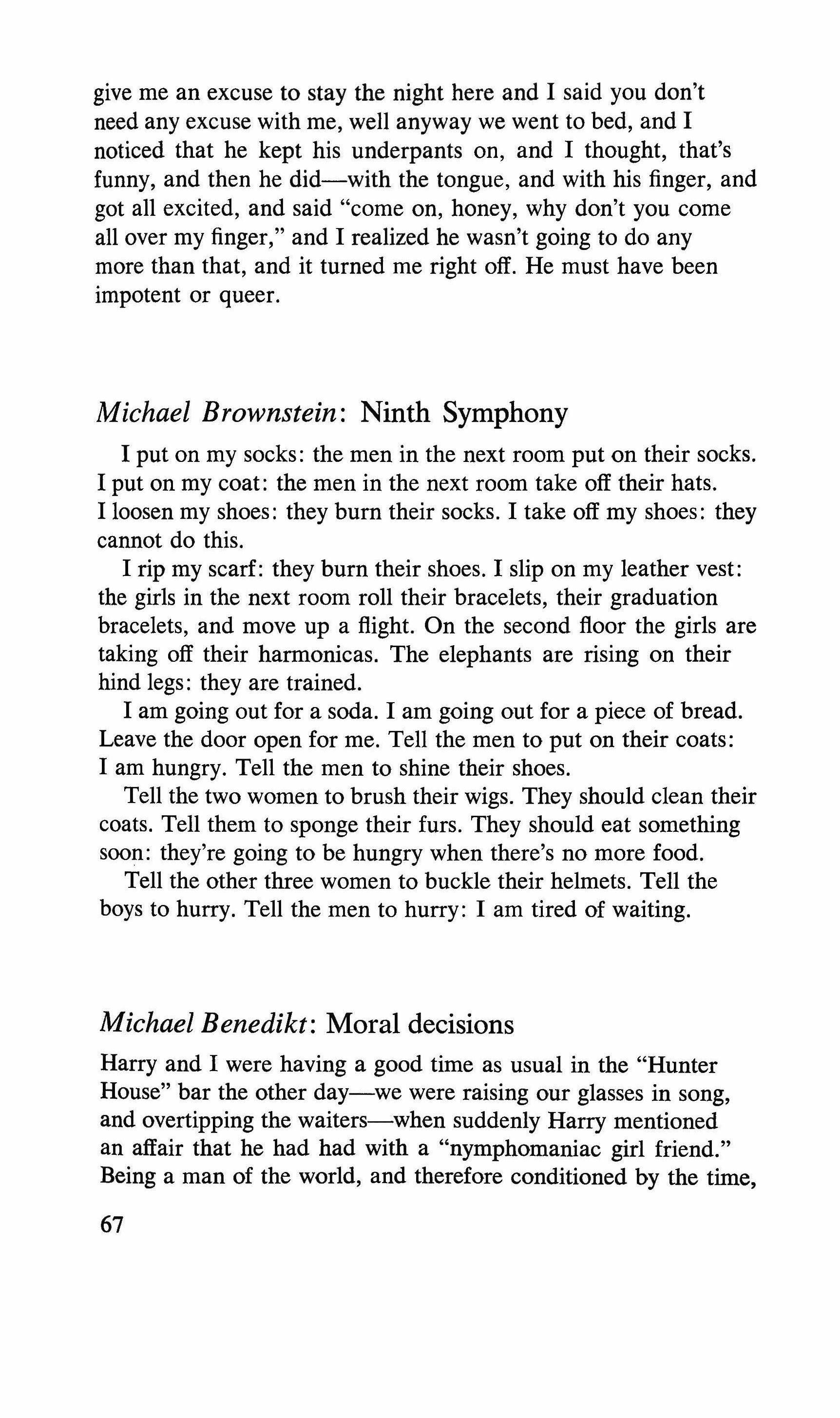
give me an excuse to stay the night here and I said you don't need any excuse with me, well anyway we went to bed, and I noticed that he kept his underpants on, and I thought, that's funny, and then he did-with the tongue, and with his finger, and got all excited, and said "come on, honey, why don't you come all over my finger," and I realized he wasn't going to do any more than that, and it turned me right off. He must have been impotent or queer.
I put on my socks: the men in the next room put on their socks. I put on my coat: the men in the next room take off their hats. I loosen my shoes: they bum their socks. I take off my shoes: they cannot do this.
I rip my scarf: they burn their shoes. I slip on my leather vest: the girls in the next room roll their bracelets, their graduation bracelets, and move up a flight. On the second floor the girls are taking off their harmonicas. The elephants are rising on their hind legs: they are trained.
I am going out for a soda. I am going out for a piece of bread. Leave the door open for me. Tell the men to put on their coats: I am hungry. Tell the men to shine their shoes.
Tell the two women to brush their wigs. They should clean their coats. Tell them to sponge their furs. They should eat something soon: they're going to be hungry when there's no more food.
Tell the other three women to buckle their helmets. Tell the boys to hurry. Tell the men to hurry: I am tired of waiting.
Harry and I were having a good time as usual in the "Hunter House" bar the other day-we were raising our glasses in song, and overtipping the waiters-when suddenly Harry mentioned an affair that he had had with a "nymphomaniac girl friend." Being a man of the world, and therefore conditioned by the time, 67
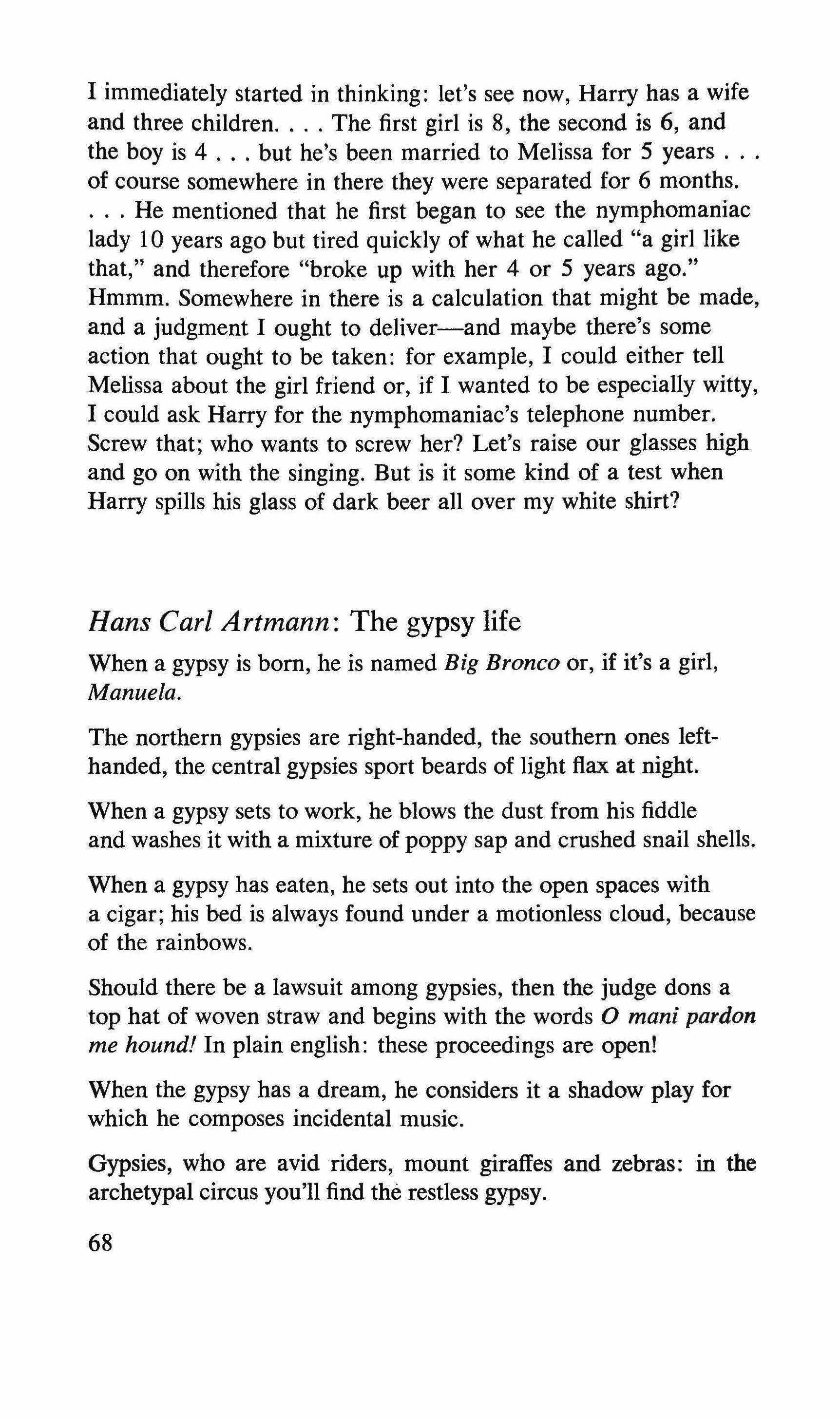
I immediately started in thinking: let's see now, Harry has a wife and three children The first girl is 8, the second is 6, and the boy is 4 but he's been married to Melissa for 5 years of course somewhere in there they were separated for 6 months
He mentioned that he first began to see the nymphomaniac lady 10 years ago but tired quickly of what he called "a girl like that," and therefore "broke up with her 4 or 5 years ago." Hmmm. Somewhere in there is a calculation that might be made, and a judgment I ought to deliver-and maybe there's some action that ought to be taken: for example, I could either tell Melissa about the girl friend or, if I wanted to be especially witty, I could ask Harry for the nymphomaniac's telephone number. Screw that; who wants to screw her? Let's raise our glasses high and go on with the singing. But is it some kind of a test when Harry spills his glass of dark beer all over my white shirt?
When a gypsy is born, he is named Big Bronco or, if it's a girl, Manuela.
The northern gypsies are right-handed, the southern ones lefthanded, the central gypsies sport beards of light flax at night.
When a gypsy sets to work, he blows the dust from his fiddle and washes it with a mixture of poppy sap and crushed snail shells.
When a gypsy has eaten, he sets out into the open spaces with a cigar; his bed is always found under a motionless cloud, because of the rainbows.
Should there be a lawsuit among gypsies, then the judge dons a top hat of woven straw and begins with the words 0 mani pardon me hound! In plain english: these proceedings are open!
When the gypsy has a dream, he considers it a shadow play for which he composes incidental music.
Gypsies, who are avid riders, mount giraffes and zebras: in the archetypal circus you'll find the restless gypsy.
68
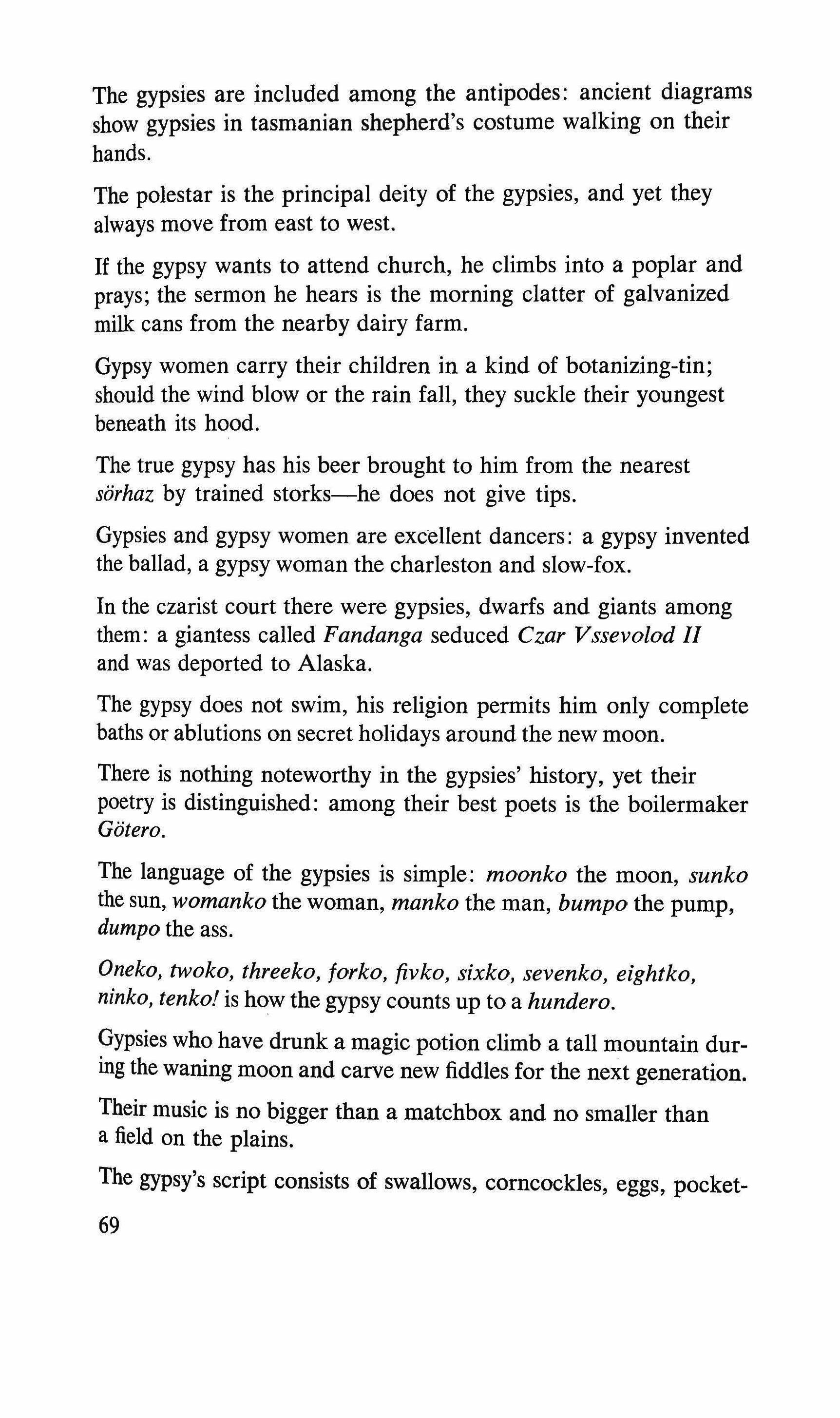
The gypsies are included among the antipodes: ancient diagrams show gypsies in tasmanian shepherd's costume walking on their hands.
The polestar is the principal deity of the gypsies, and yet they always move from east to west.
If the gypsy wants to attend church, he climbs into a poplar and prays; the sermon he hears is the morning clatter of galvanized milk cans from the nearby dairy farm.
Gypsy women carry their children in a kind of botanizing-tin; should the wind blow or the rain fall, they suckle their youngest beneath its hood.
The true gypsy has his beer brought to him from the nearest sorhaz by trained storks-he does not give tips.
Gypsies and gypsy women are excellent dancers: a gypsy invented the ballad, a gypsy woman the charleston and slow-fox.
In the czarist court there were gypsies, dwarfs and giants among them: a giantess called Fandanga seduced Czar Vssevolod II and was deported to Alaska.
The gypsy does not swim, his religion permits him only complete baths or ablutions on secret holidays around the new moon.
There is nothing noteworthy in the gypsies' history, yet their poetry is distinguished: among their best poets is the boilermaker Gotero.
The language of the gypsies is simple: moonko the moon, sunko the sun, womanko the woman, manko the man, bumpo the pump, dumpo the ass.
Oneko, twoko, threeko, forko, fivko, sixko, sevenko, eightko, ninko, tenko! is how the gypsy counts up to a hundero.
Gypsies who have drunk a magic potion climb a tall mountain during the waning moon and carve new fiddles for the next generation.
Their music is no bigger than a matchbox and no smaller than a field on the plains.
The gypsy's script consists of swallows, corncockles, eggs, pocket69
knives, punched holes, and horse apples, with which they fill their manuscripts and diaries.
When the gypsy gets sick, he hangs a queen of spades in front of his house; should he die, he is buried and does not go to heavenhis world beyond is called heavno, and his whole life long he sets all his gypsy hopes on this. -translated by Derk Wynand
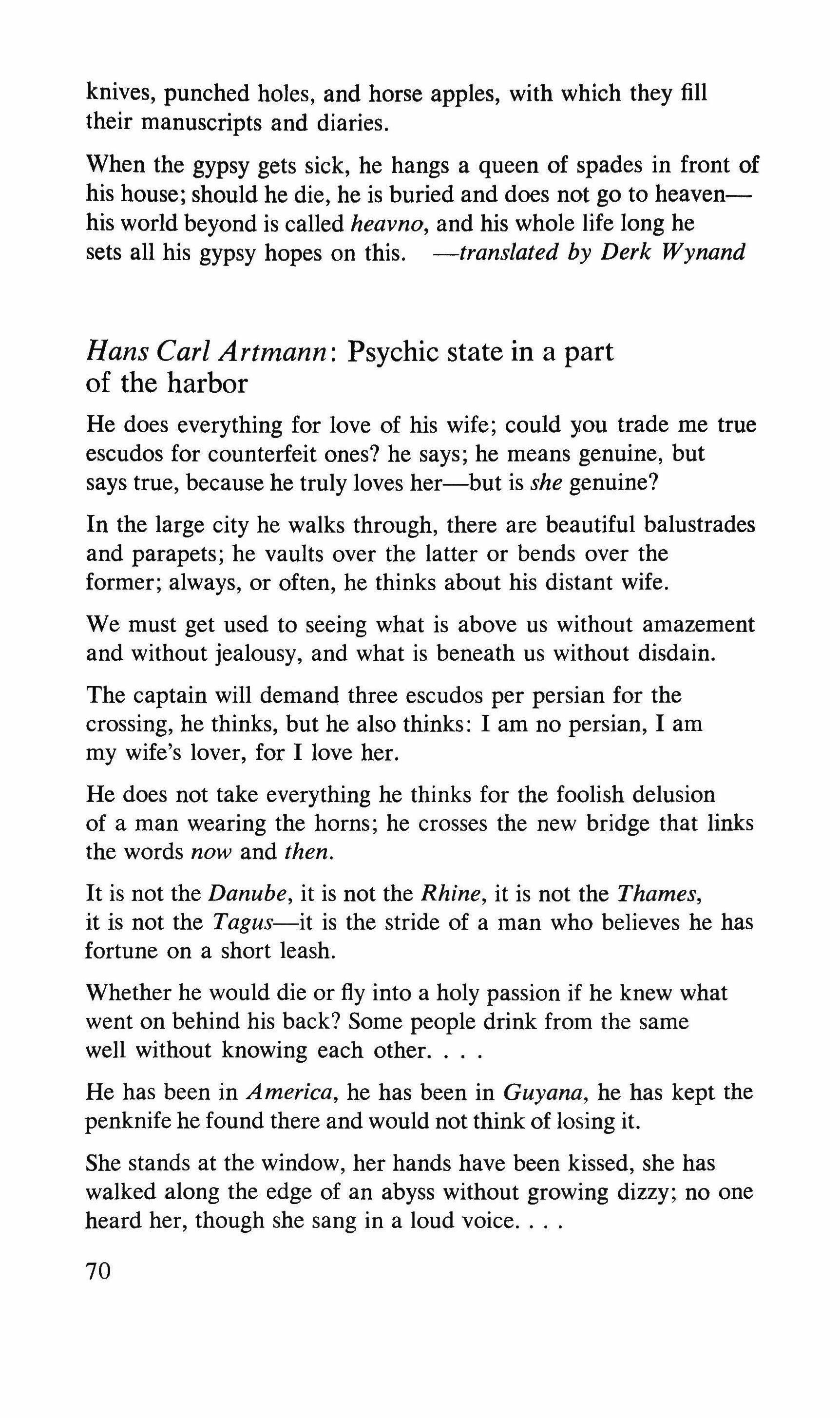
Hans Carl Artmann: Psychic state in a part of the harbor
He does everything for love of his wife; could you trade me true escudos for counterfeit ones? he says; he means genuine, but says true, because he truly loves her-but is she genuine?
In the large city he walks through, there are beautiful balustrades and parapets; he vaults over the latter or bends over the former; always, or often, he thinks about his distant wife.
We must get used to seeing what is above us without amazement and without jealousy, and what is beneath us without disdain.
The captain will demand three escudos per persian for the crossing, he thinks, but he also thinks: I am no persian, I am my wife's lover, for I love her.
He does not take everything he thinks for the foolish delusion of a man wearing the horns; he crosses the new bridge that links the words now and then.
It is not the Danube, it is not the Rhine, it is not the Thames, it is not the Tagus-it is the stride of a man who believes he has fortune on a short leash.
Whether he would die or fly into a holy passion if he knew what went on behind his back? Some people drink from the same well without knowing each other.
He has been in America, he has been in Guyana, he has kept the penknife he found there and would not think of losing it.
She stands at the window, her hands have been kissed, she has walked along the edge of an abyss without growing dizzy; no one heard her, though she sang in a loud voice
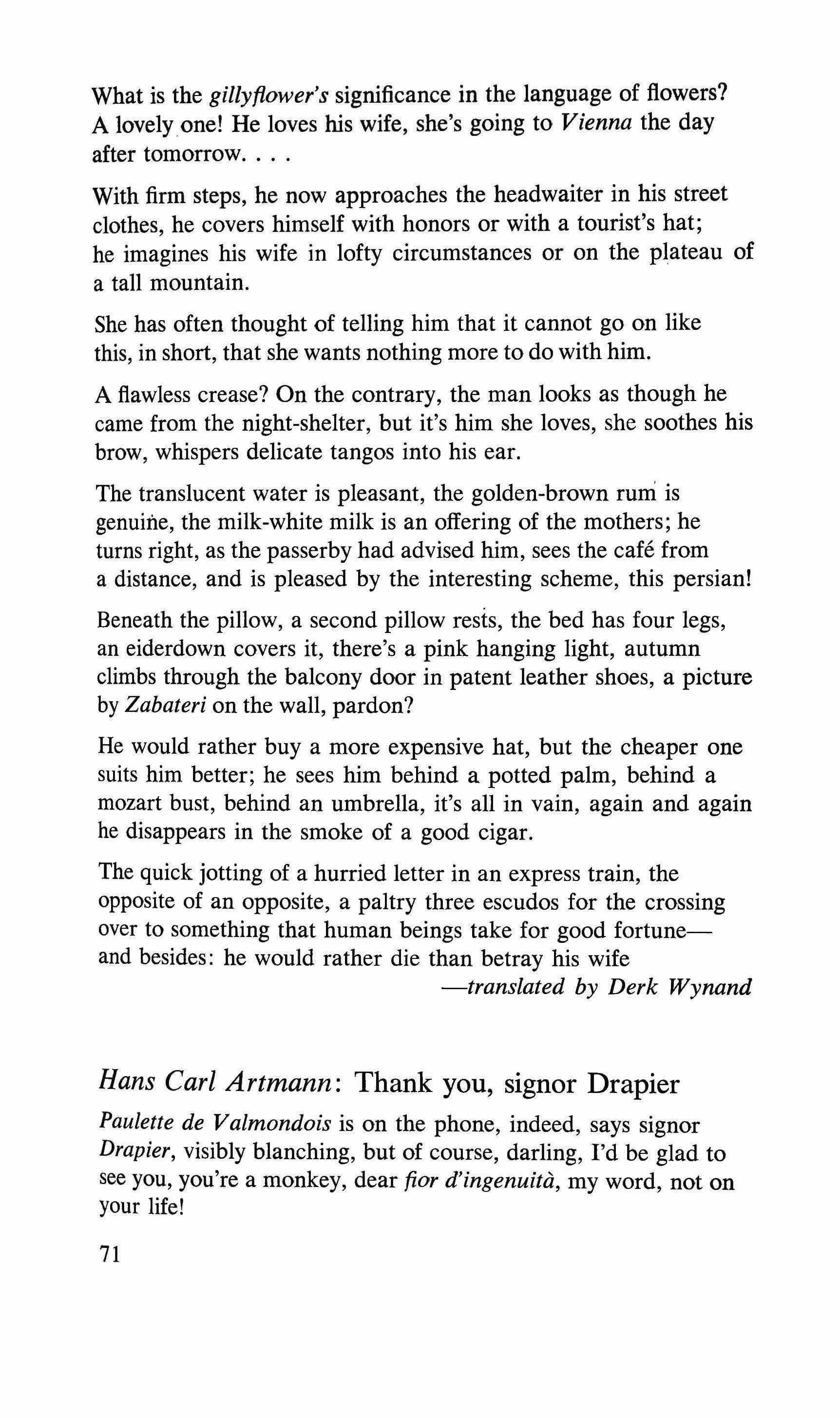
What is the gillyflower's significance in the language of flowers?
A lovelyone! He loves his wife, she's going to Vienna the day after tomorrow
With firm steps, he now approaches the headwaiter in his street clothes, he covers himself with honors or with a tourist's hat; he imagines his wife in lofty circumstances or on the plateau of a tall mountain.
She has often thought of telling him that it cannot go on like this, in short, that she wants nothing more to do with him.
A flawless crease? On the contrary, the man looks as though he came from the night-shelter, but it's him she loves, she soothes his brow, whispers delicate tangos into his ear.
The translucent water is pleasant, the golden-brown rum is genuine, the milk-white milk is an offering of the mothers; he turns right, as the passerby had advised him, sees the cafe from a distance, and is pleased by the interesting scheme, this persian!
Beneath the pillow, a second pillow rests, the bed has four legs, an eiderdown covers it, there's a pink hanging light, autumn climbs through the balcony door in patent leather shoes, a picture by Zabateri on the wall, pardon?
He would rather buy a more expensive hat, but the cheaper one suits him better; he sees him behind a potted palm, behind a mozart bust, behind an umbrella, it's all in vain, again and again he disappears in the smoke of a good cigar.
The quick jotting of a hurried letter in an express train, the opposite of an opposite, a paltry three escudos for the crossing over to something that human beings take for good fortuneand besides: he would rather die than betray his wife -translated by Derk Wynand
Paulette de Valmondois is on the phone, indeed, says signor Drapier, visibly blanching, but of course, darling, I'd be glad to see you, you're a monkey, dear fior d'ingenuita, my word, not on your life!
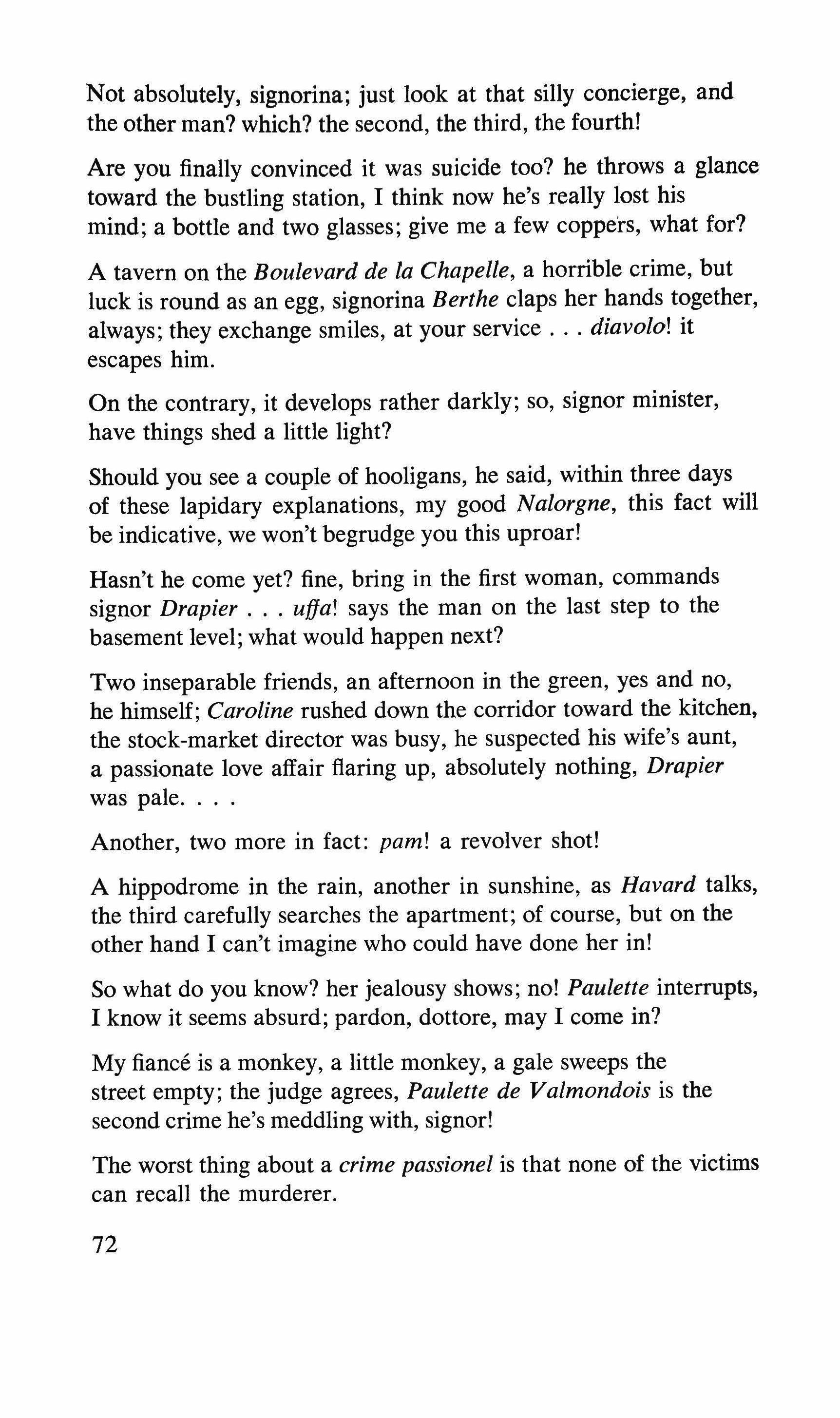
Not absolutely, signorina; just look at that silly concierge, and the other man? which? the second, the third, the fourth!
Are you finally convinced it was suicide too? he throws a glance toward the bustling station, I think now he's really lost his mind; a bottle and two glasses; give me a few coppers, what for?
A tavern on the Boulevard de fa Chapelle, a horrible crime, but luck is round as an egg, signorina Berthe claps her hands together, always; they exchange smiles, at your service diavolo! it escapes him.
On the contrary, it develops rather darkly; so, signor minister, have things shed a little light?
Should you see a couple of hooligans, he said, within three days of these lapidary explanations, my good Nalorgne, this fact will be indicative, we won't begrudge you this uproar!
Hasn't he come yet? fine, bring in the first woman, commands signor Drapier ufJa! says the man on the last step to the basement level; what would happen next?
Two inseparable friends, an afternoon in the green, yes and no, he himself; Caroline rushed down the corridor toward the kitchen, the stock-market director was busy, he suspected his wife's aunt, a passionate love affair flaring up, absolutely nothing, Drapier was pale
Another, two more in fact: pam! a revolver shot!
A hippodrome in the rain, another in sunshine, as Havard talks, the third carefully searches the apartment; of course, but on the other hand I can't imagine who could have done her in!
So what do you know? her jealousy shows; no! Paulette interrupts, I know it seems absurd; pardon, dottore, may I come in?
My fiance is a monkey, a little monkey, a gale sweeps the street empty; the judge agrees, Paulette de Valmondois is the second crime he's meddling with, signor!
The worst thing about a crime passionel is that none of the victims can recall the murderer. 72
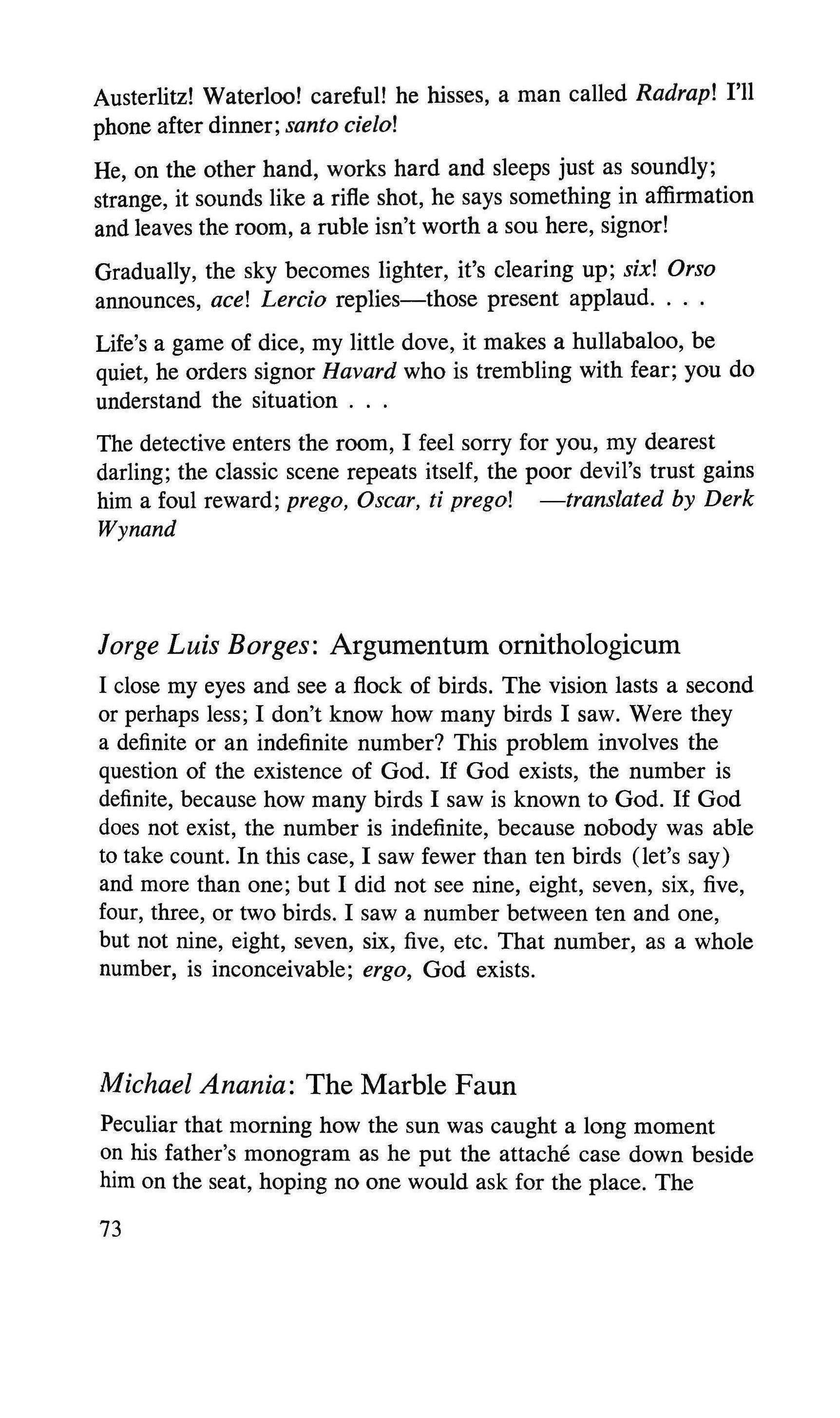
Austerlitz! Waterloo! careful! he hisses, a man called Radrap! I'll phone after dinner; santo cielo!
He, on the other hand, works hard and sleeps just as soundly; strange, it sounds like a rifle shot, he says something in affirmation and leaves the room, a ruble isn't worth a sou here, signor!
Gradually, the sky becomes lighter, it's clearing up; six! Orso announces, ace! Lercio replies-those present applaud
Life's a game of dice, my little dove, it makes a hullabaloo, be quiet, he orders signor Havard who is trembling with fear; you do understand the situation
The detective enters the room, I feel sorry for you, my dearest darling; the classic scene repeats itself, the poor devil's trust gains him a foul reward; prego, Oscar, ti prego! -translated by Derk Wynand
I close my eyes and see a flock of birds. The vision lasts a second or perhaps less; I don't know how many birds I saw. Were they a definite or an indefinite number? This problem involves the question of the existence of God. If God exists, the number is definite, because how many birds I saw is known to God. If God does not exist, the number is indefinite, because nobody was able to take count. In this case, I saw fewer than ten birds (let's say) and more than one; but I did not see nine, eight, seven, six, five, four, three, or two birds. I saw a number between ten and one, but not nine, eight, seven, six, five, etc. That number, as a whole number, is inconceivable; ergo, God exists.
Peculiar that morning how the sun was caught a long moment on his father's monogram as he put the attache case down beside him on the seat, hoping no one would ask for the place. The 73
train so familiar. Ethel, too, he thought, with all her implausible endurance, and Diane. Yes, certainly. His shitty job, face reflected in the window, the wear of it all. Oh my! It occurred to him that in addition to being alienated for years from the objects of his labor, commodity futures, he was, as well, alienated from the objects of his affection, Diane for example, not to mention implausible old Ethel, of the great endurance. Patience is a virtue; endurance, for its own sake, is a vice. He remembered that from a play he had once seen, or a Thin Man movie. American film lost its fondness for verbal interplay with World War II. That from somewhere else, perhaps himself.
He had tried for two days to remember The Marble Faun, but he could only think of Tennessee Williams' Summer and Smoke, or was it Summer in Smoke, the movie with Laurence Harvey as the reckless young doctor. It might have been, this confusion, caused by that image of Miss Alma sitting among the falling leaves (so it is and Smoke!) in a park with a statue, a couple, he thought, not a faun.
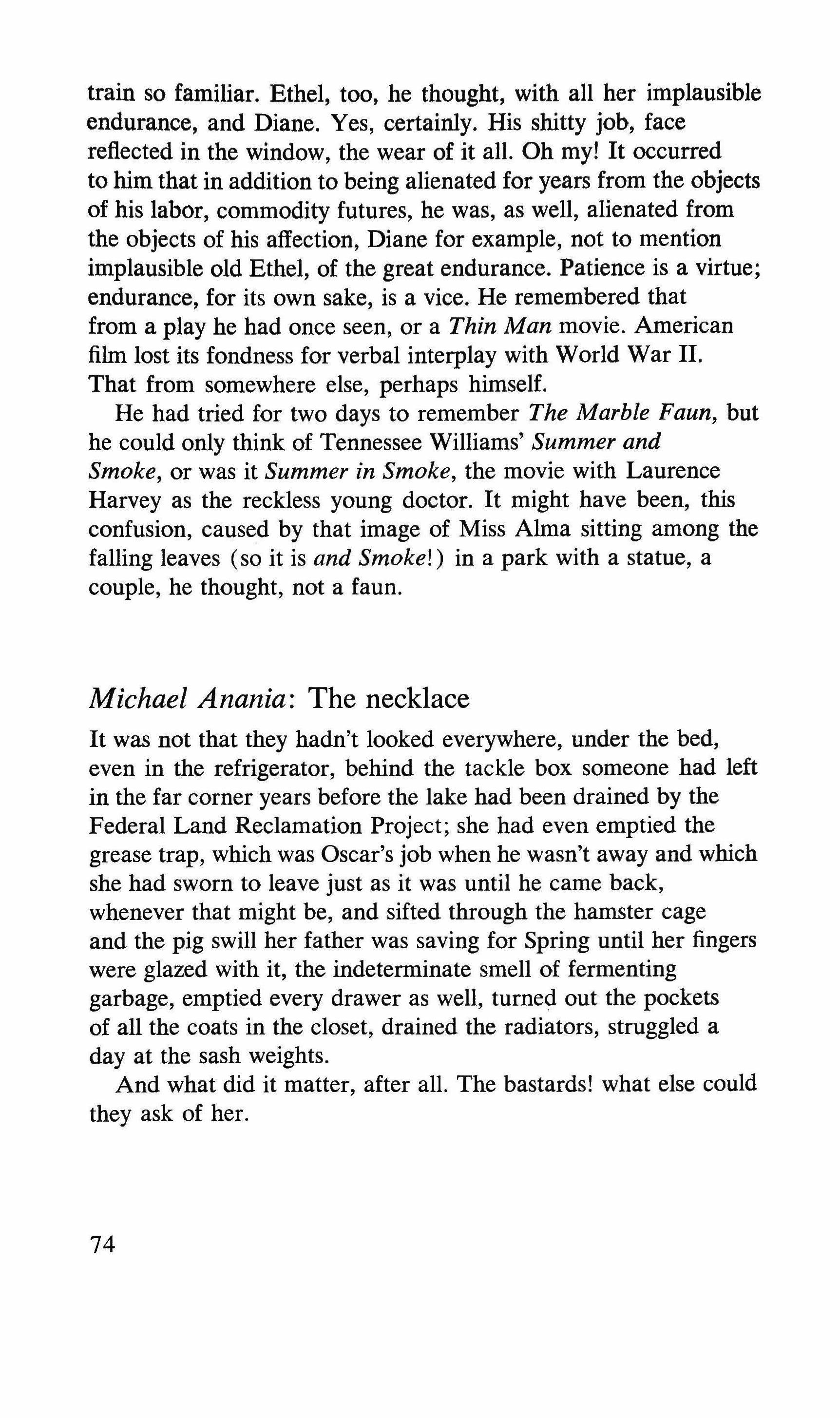
Michael Anania: The necklace
It was not that they hadn't looked everywhere, under the bed, even in the refrigerator, behind the tackle box someone had left in the far corner years before the lake had been drained by the Federal Land Reclamation Project; she had even emptied the grease trap, which was Oscar's job when he wasn't away and which she had sworn to leave just as it was until he came back, whenever that might be, and sifted through the hamster cage and the pig swill her father was saving for Spring until her fingers were glazed with it, the indeterminate smell of fermenting garbage, emptied every drawer as well, turned out the pockets of all the coats in the closet, drained the radiators, struggled a day at the sash weights.
And what did it matter, after all. The bastards! what else could they ask of her.
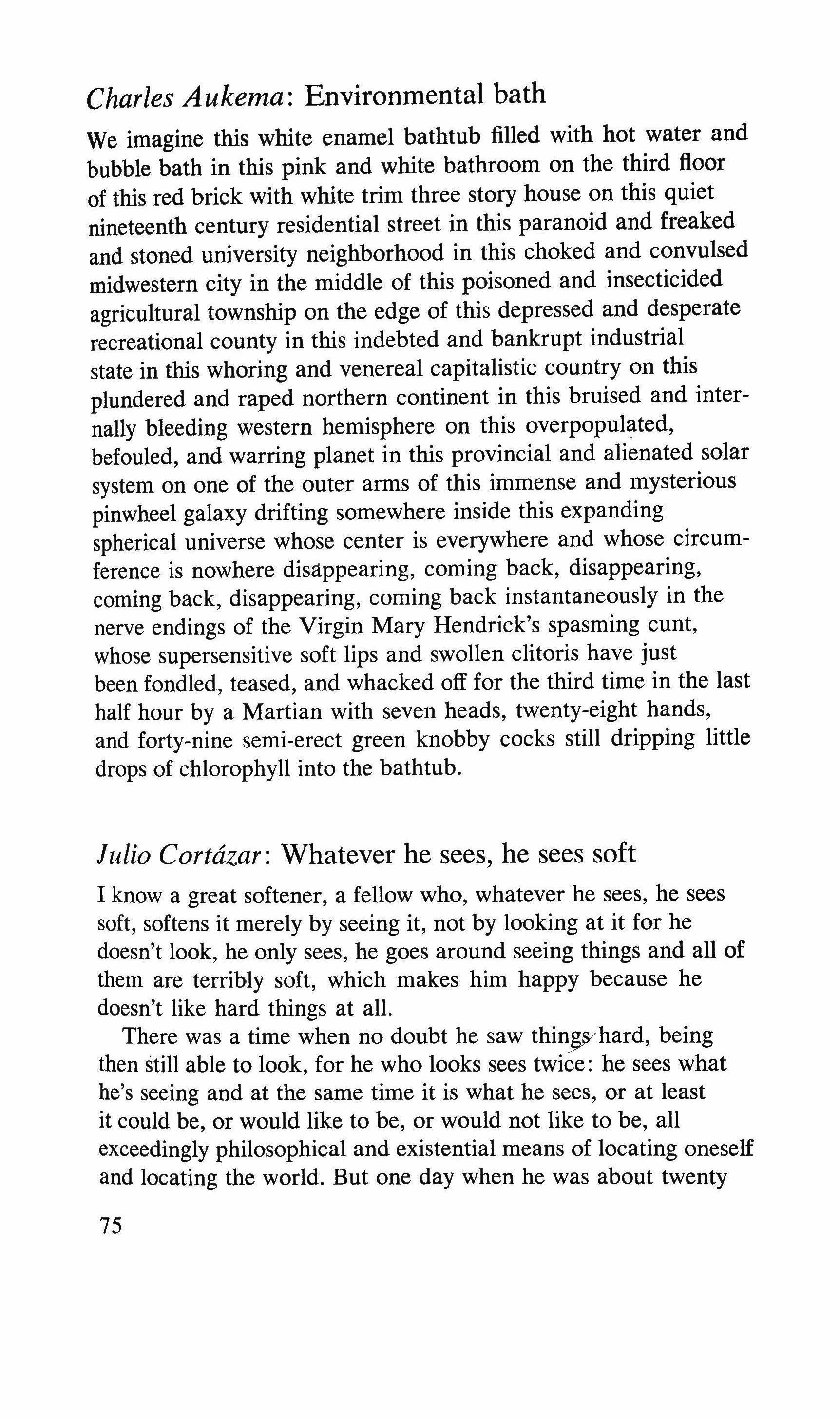
We imagine this white enamel bathtub filled with hot water and bubble bath in this pink and white bathroom on the third floor of this red brick with white trim three story house on this quiet nineteenth century residential street in this paranoid and freaked and stoned university neighborhood in this choked and convulsed midwestern city in the middle of this poisoned and insecticided agricultural township on the edge of this depressed and desperate recreational county in this indebted and bankrupt industrial state in this whoring and venereal capitalistic country on this plundered and raped northern continent in this bruised and internally bleeding western hemisphere on this overpopulated, befouled, and warring planet in this provincial and alienated solar system on one of the outer arms of this immense and mysterious pinwheel galaxy drifting somewhere inside this expanding spherical universe whose center is everywhere and whose circumference is nowhere disappearing, coming back, disappearing, coming back, disappearing, coming back instantaneously in the nerve endings of the Virgin Mary Hendrick's spasming cunt, whose supersensitive soft lips and swollen clitoris have just been fondled, teased, and whacked off for the third time in the last half hour by a Martian with seven heads, twenty-eight hands, and forty-nine semi-erect green knobby cocks still dripping little drops of chlorophyll into the bathtub.
Julio Cortdzar : Whatever he sees, he sees soft
I know a great softener, a fellow who, whatever he sees, he sees soft, softens it merely by seeing it, not by looking at it for he doesn't look, he only sees, he goes around seeing things and all of them are terribly soft, which makes him happy because he doesn't like hard things at all. There was a time when no doubt he saw thin�hard, being then still able to look, for he who looks sees twice: he sees what he's seeing and at the same time it is what he sees, or at least it could be, or would like to be, or would not like to be, all exceedingly philosophical and existential means of locating oneself and locating the world. But one day when he was about twenty 75
years old, he began to stop looking, this fellow, because in point of fact he had very soft skin, and the last few times he'd wanted to look straight out at the world, the sight had torn his skin in two or three places, and naturally my friend said, Hey baby, this won't do! Whereupon one morning he'd started just seeing instead, very carefully, only that, nothing but seeing-and from then on, of course, whatever he saw, he saw soft, softened it simply by seeing it, and he was happy because he couldn't abide hard things at all.
"Trivializing vision" is what a professor from Bahia Blanca called it, a surprisingly felicitous expression coming as it did from Bahia Blanca, but my friend paid it no heed, and not only that, but when he saw the professor, he naturally saw him as remarkably soft, and so invited him home for cocktails, introduced him to his sister and aunt, the whole event transpiring in an atmosphere of great softness.
It bothers me a little, I must say, because whenever my friend sees me, I feel like I'm going completely soft, and even though I know it's got nothing to do with me, but rather with the image of me my friend has, as the professor from Bahia Blanca would say, just the same it bothers me, because nobody likes to be seen as some kind of semolina pudding, and so get invited to the movies to watch cowboys or get talked to for hours about how lovely the carpets are in the Embassy of Madagascar. What's to be done with my friend? Nothing, of course. At all events, see him but never look at him: how, I ask, could we look at him without, horribly, risking utter dissolution? He who sees only must be seen only: a wise and melancholy moral which goes, I am afraid, beyond the laws of optics. -translated by Robert and Pilar Coover
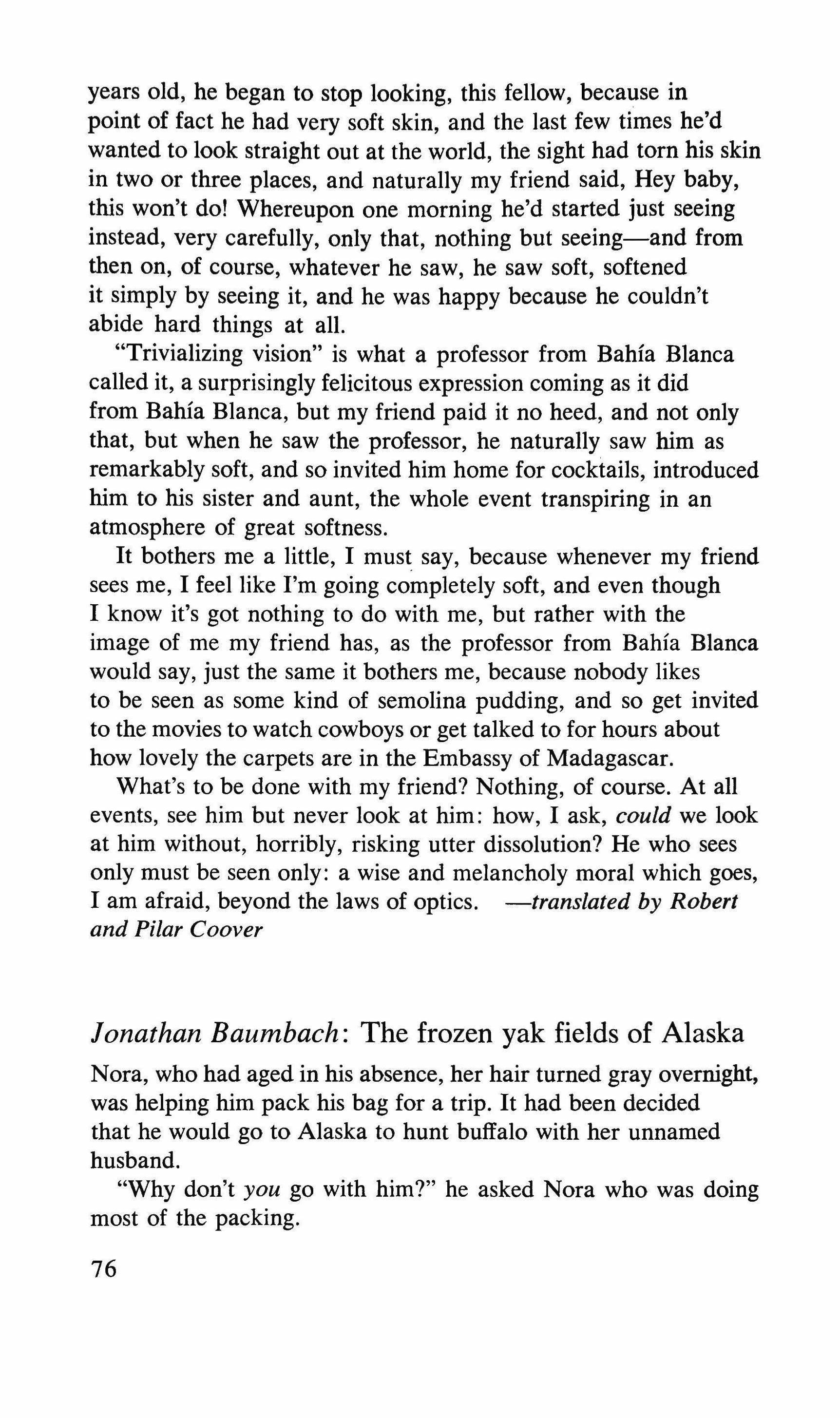
Jonathan Baumbach: The frozen yak fields of Alaska
Nora, who had aged in his absence, her hair turned gray overnight, was helping him pack his bag for a trip. It had been decided that he would go to Alaska to hunt buffalo with her unnamed husband.
"Why don't you go with him?" he asked Nora who was doing most of the packing.
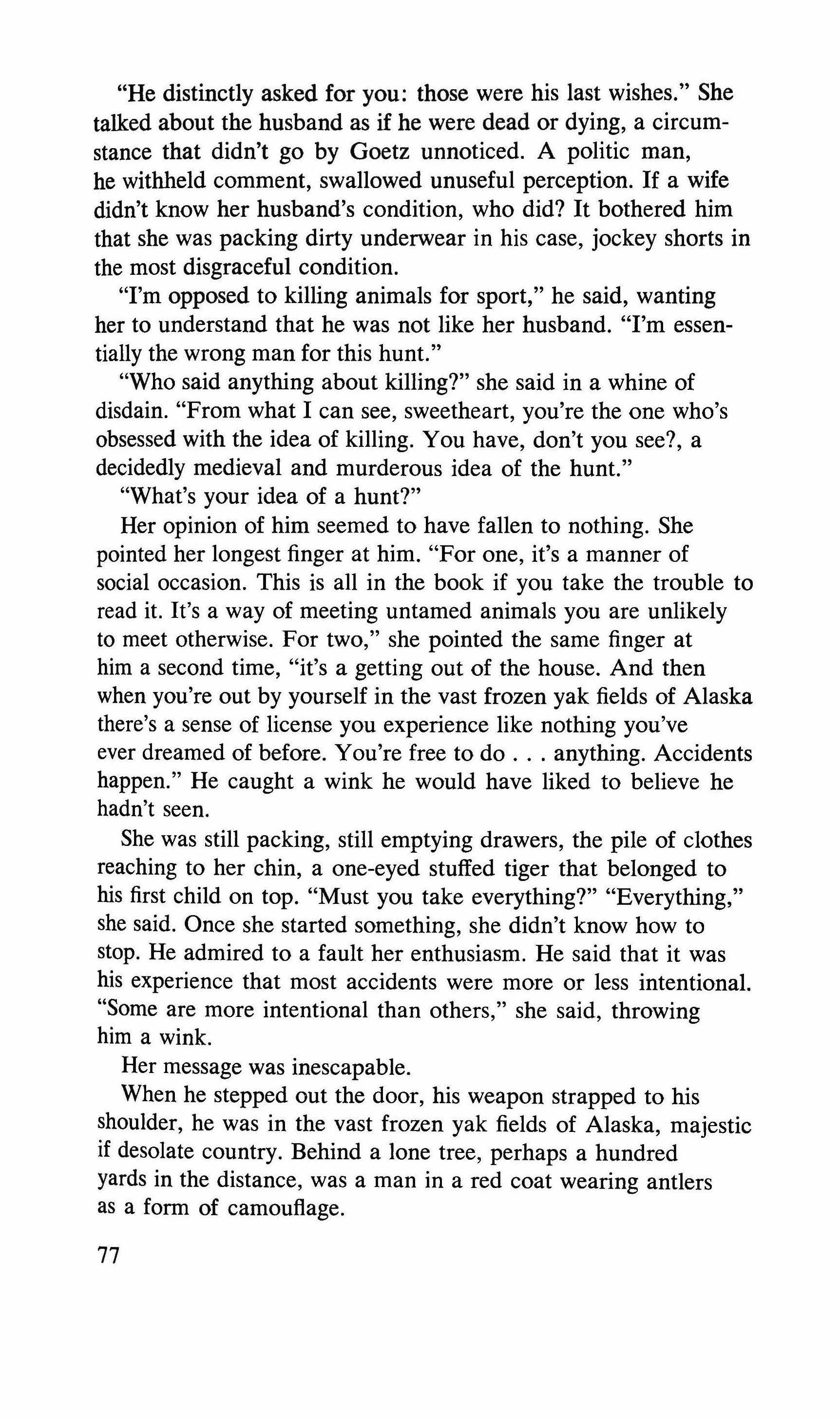
"He distinctly asked for you: those were his last wishes." She talked about the husband as if he were dead or dying, a circumstance that didn't go by Goetz unnoticed. A politic man, he withheld comment, swallowed unuseful perception. If a wife didn't know her husband's condition, who did? It bothered him that she was packing dirty underwear in his case, jockey shorts in the most disgraceful condition.
"I'm opposed to killing animals for sport," he said, wanting her to understand that he was not like her husband. "I'm essentially the wrong man for this hunt."
"Who said anything about killing?" she said in a whine of disdain. "From what I can see, sweetheart, you're the one who's obsessed with the idea of killing. You have, don't you see?, a decidedly medieval and murderous idea of the hunt."
"What's your idea of a hunt?"
Her opinion of him seemed to have fallen to nothing. She pointed her longest finger at him. "For one, it's a manner of social occasion. This is all in the book if you take the trouble to read it. It's a way of meeting untamed animals you are unlikely to meet otherwise. For two," she pointed the same finger at him a second time, "it's a getting out of the house. And then when you're out by yourself in the vast frozen yak fields of Alaska there's a sense of license you experience like nothing you've ever dreamed of before. You're free to do anything. Accidents happen." He caught a wink he would have liked to believe he hadn't seen.
She was still packing, still emptying drawers, the pile of clothes reaching to her chin, a one-eyed stuffed tiger that belonged to his first child on top. "Must you take everything?" "Everything," she said. Once she started something, she didn't know how to stop. He admired to a fault her enthusiasm. He said that it was his experience that most accidents were more or less intentional. "Some are more intentional than others," she said, throwing him a wink.
Her message was inescapable.
When he stepped out the door, his weapon strapped to his shoulder, he was in the vast frozen yak fields of Alaska, majestic if desolate country. Behind a lone tree, perhaps a hundred yards in the distance, was a man in a red coat wearing antlers as a form of camouflage.
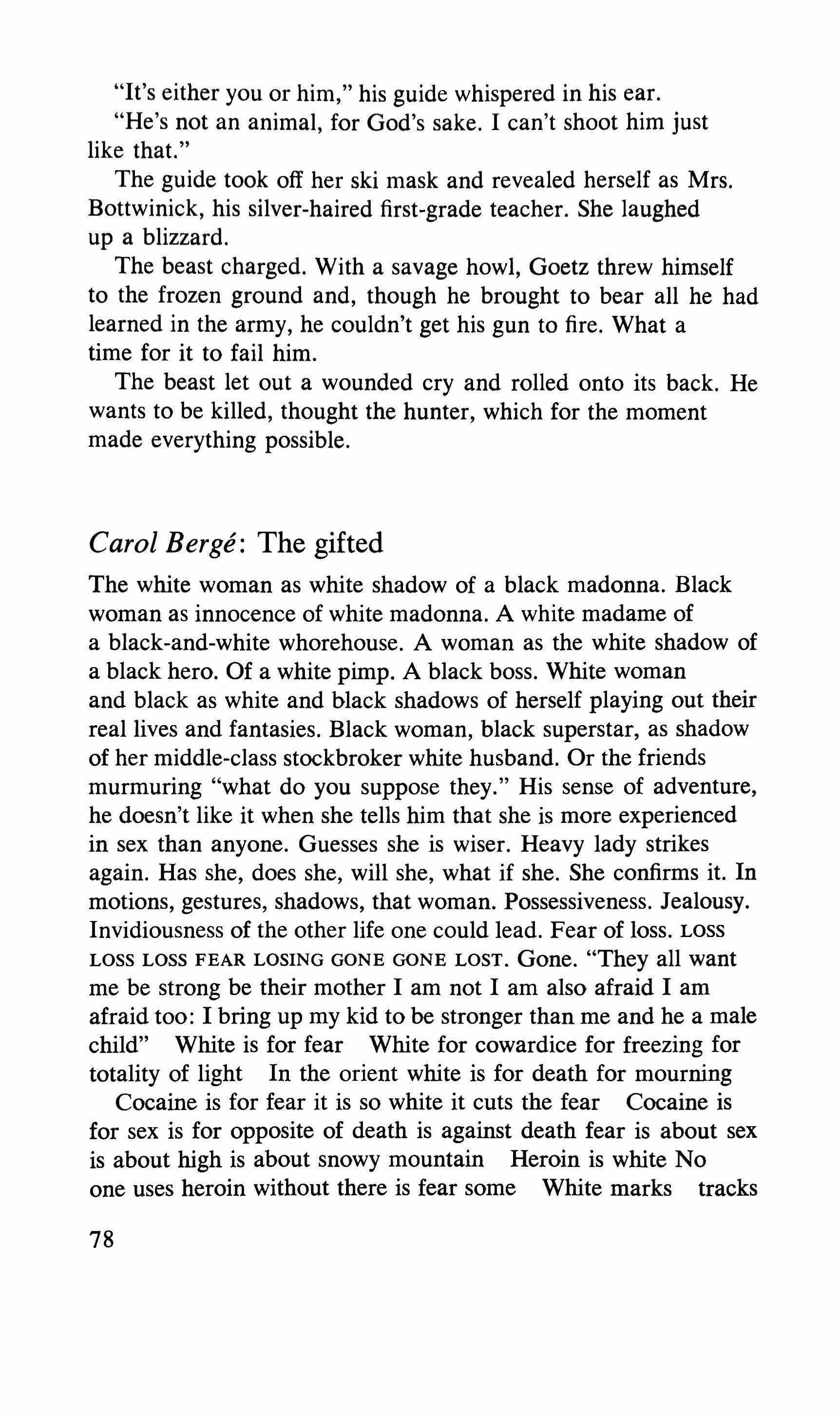
"It's either you or him," his guide whispered in his ear.
"He's not an animal, for God's sake. I can't shoot him just like that."
The guide took off her ski mask and revealed herself as Mrs. Bottwinick, his silver-haired first-grade teacher. She laughed up a blizzard.
The beast charged. With a savage howl, Goetz threw himself to the frozen ground and, though he brought to bear all he had learned in the army, he couldn't get his gun to fire. What a time for it to fail him.
The beast let out a wounded cry and rolled onto its back. He wants to be killed, thought the hunter, which for the moment made everything possible.
The white woman as white shadow of a black madonna. Black woman as innocence of white madonna. A white madame of a black-and-white whorehouse. A woman as the white shadow of a black hero. Of a white pimp. A black boss. White woman and black as white and black shadows of herself playing out their real lives and fantasies. Black woman, black superstar, as shadow of her middle-class stockbroker white husband. Or the friends murmuring "what do you suppose they." His sense of adventure, he doesn't like it when she tells him that she is more experienced in sex than anyone. Guesses she is wiser. Heavy lady strikes again. Has she, does she, will she, what if she. She confirms it. In motions, gestures, shadows, that woman. Possessiveness. Jealousy. Invidiousness of the other life one could lead. Fear of loss. LOSS LOSS LOSS FEAR LOSING GONE GONE LOST. Gone. "They all want me be strong be their mother I am not I am also afraid I am afraid too: I bring up my kid to be stronger than me and he a male child" White is for fear White for cowardice for freezing for totality of light
In the orient white is for death for mourning
Cocaine is for fear it is so white it cuts the fear Cocaine is for sex is for opposite of death is against death fear is about sex is about high is about snowy mountain Heroin is white No one uses heroin without there is fear some White marks tracks
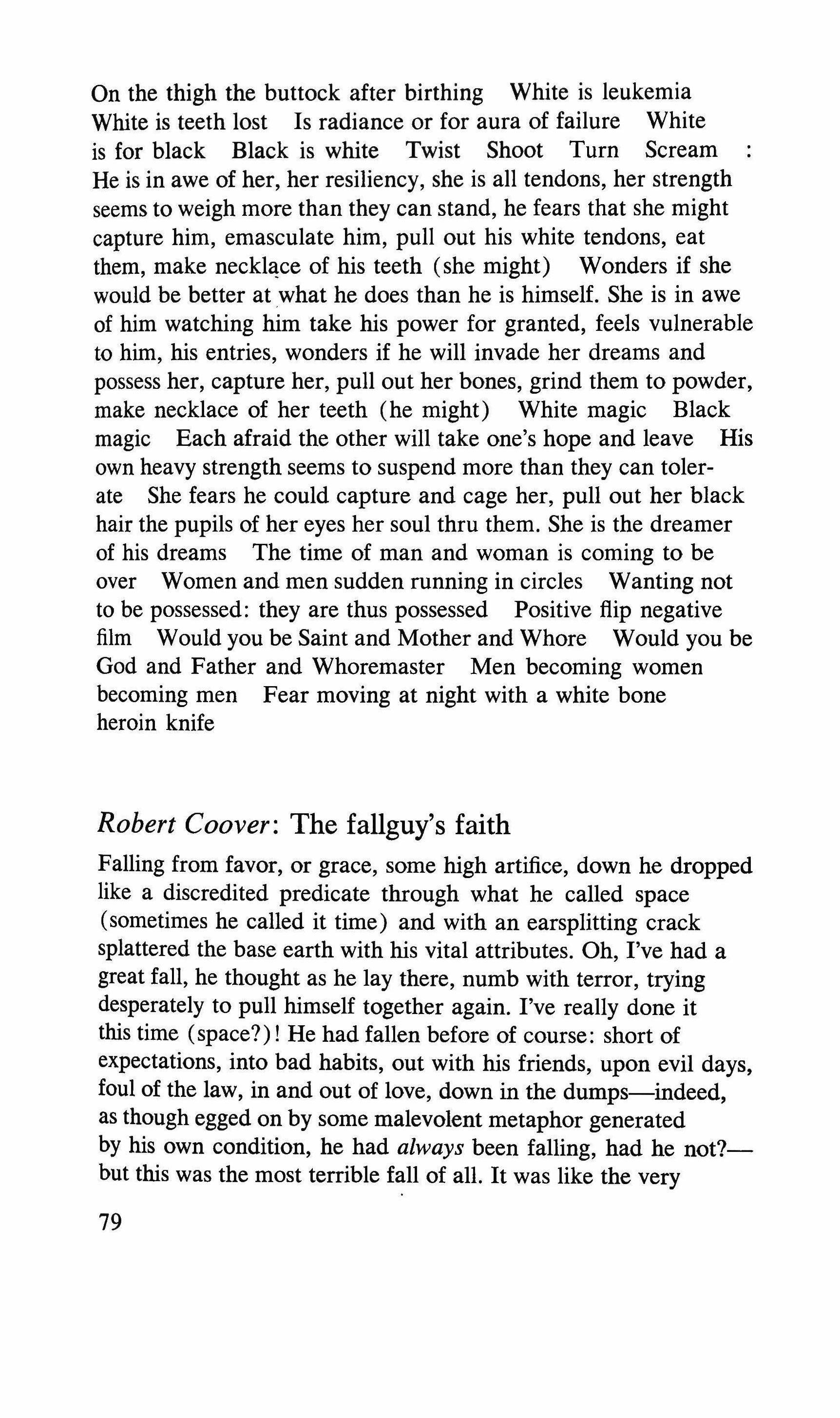
On the thigh the buttock after birthing White is leukemia White is teeth lost Is radiance or for aura of failure White is for black Black is white Twist Shoot Turn Scream He is in awe of her, her resiliency, she is all tendons, her strength seems to weigh more than they can stand, he fears that she might capture him, emasculate him, pull out his white tendons, eat them, make necklace of his teeth (she might) Wonders if she would be better at what he does than he is himself. She is in awe of him watching him take his power for granted, feels vulnerable to him, his entries, wonders if he will invade her dreams and possess her, capture her, pull out her bones, grind them to powder, make necklace of her teeth (he might) White magic Black magic Each afraid the other will take one's hope and leave His own heavy strength seems to suspend more than they can tolerate She fears he could capture and cage her, pull out her black hair the pupils of her eyes her soul thru them. She is the dreamer of his dreams The time of man and woman is coming to be over Women and men sudden running in circles Wanting not to be possessed: they are thus possessed Positive flip negative film Would you be Saint and Mother and Whore Would you be God and Father and Whoremaster Men becoming women becoming men Fear moving at night with a white bone heroin knife
Falling from favor, or grace, some high artifice, down he dropped like a discredited predicate through what he called space (sometimes he called it time) and with an earsplitting crack splattered the base earth with his vital attributes. Oh, I've had a great fall, he thought as he lay there, numb with terror, trying desperately to pull himself together again. I've really done it this time (space?)! He had fallen before of course: short of expectations, into bad habits, out with his friends, upon evil days, foul of the law, in and out of love, down in the dumps-indeed, as though egged on by some malevolent metaphor generated by his own condition, he had always been falling, had he not?but this was the most terrible fall of all. It was like the very
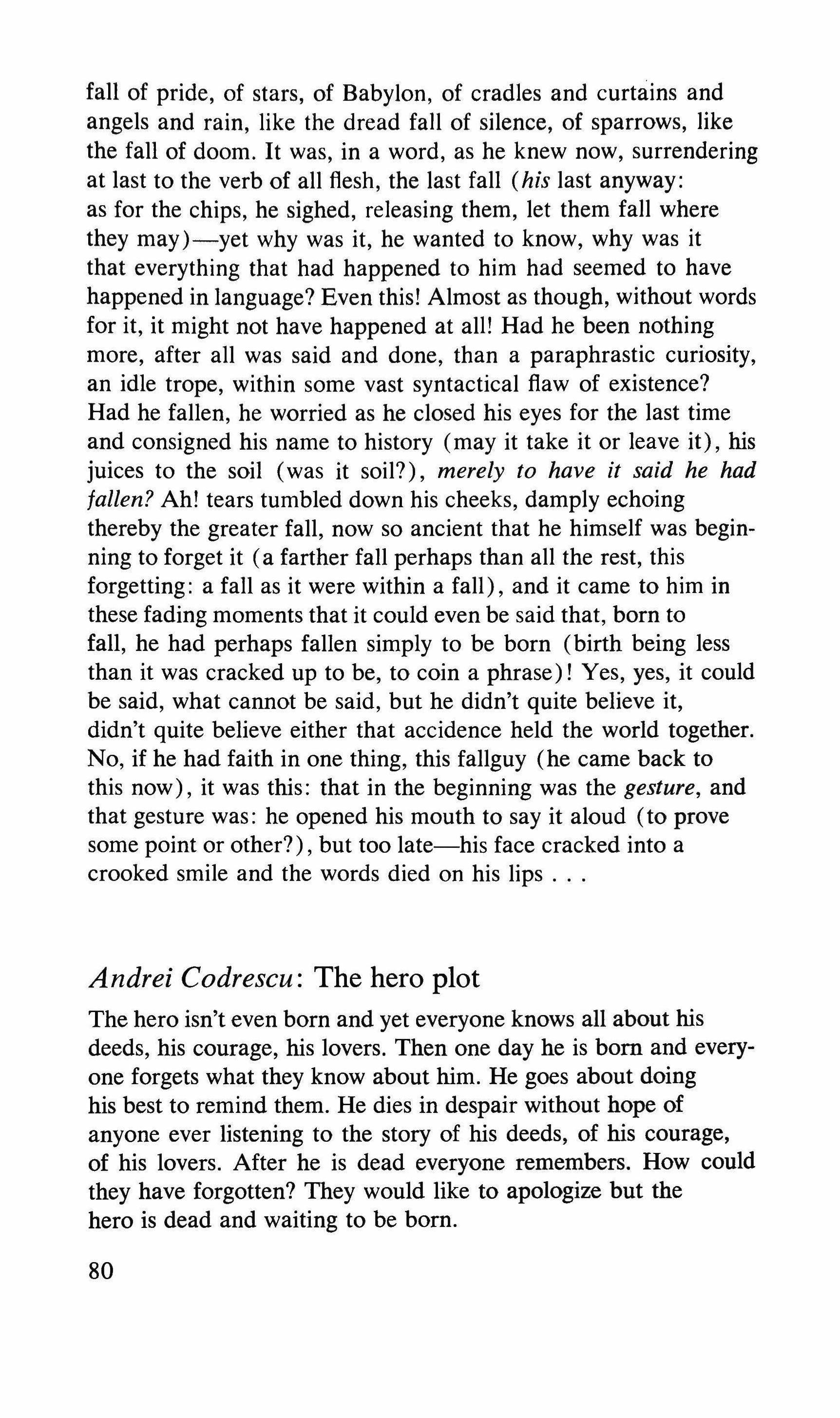
fall of pride, of stars, of Babylon, of cradles and curtains and angels and rain, like the dread fall of silence, of sparrows, like the fall of doom. It was, in a word, as he knew now, surrendering at last to the verb of all flesh, the last fall (his last anyway: as for the chips, he sighed, releasing them, let them fall where they may)-yet why was it, he wanted to know, why was it that everything that had happened to him had seemed to have happened in language? Even this! Almost as though, without words for it, it might not have happened at all! Had he been nothing more, after all was said and done, than a paraphrastic curiosity, an idle trope, within some vast syntactical flaw of existence? Had he fallen, he worried as he closed his eyes for the last time and consigned his name to history (may it take it or leave it), his juices to the soil (was it soil?), merely to have it said he had fallen? Ah! tears tumbled down his cheeks, damply echoing thereby the greater fall, now so ancient that he himself was beginning to forget it (a farther fall perhaps than all the rest, this forgetting: a fall as it were within a fall), and it came to him in these fading moments that it could even be said that, born to fall, he had perhaps fallen simply to be born (birth being less than it was cracked up to be, to coin a phrase)! Yes, yes, it could be said, what cannot be said, but he didn't quite believe it, didn't quite believe either that accidence held the world together. No, if he had faith in one thing, this fallguy (he came back to this now), it was this: that in the beginning was the gesture, and that gesture was: he opened his mouth to say it aloud (to prove some point or other?), but too late-his face cracked into a crooked smile and the words died on his lips
The hero isn't even born and yet everyone knows all about his deeds, his courage, his lovers. Then one day he is born and everyone forgets what they know about him. He goes about doing his best to remind them. He dies in despair without hope of anyone ever listening to the story of his deeds, of his courage, of his lovers. After he is dead everyone remembers. How could they have forgotten? They would like to apologize but the hero is dead and waiting to be born.
On each table (at the mysterious Chinese restaurant) there is a peeled onion sculptured in the shape of the person sitting at it. One floor above (in the small arms factory) tiny Chinese machineguns lie atop crates of mandarin oranges. Across the street (in the French bordello) Detective Chen buttons his suspenders while a filmy geisha holds to his eyes the binoculars through which he is staring at an open copy of the I Ching in the hippie commune across the street. No, this is not my day, murmurs Andrei Codrescu, picking his brains for the last piece of the puzzle, no, no, this is the day of the strange comma in the sky of the bored afternoon through which filters the melancholy tune of an ivory Buddha beating his meat in the autumn leaves of Sang Chi province.
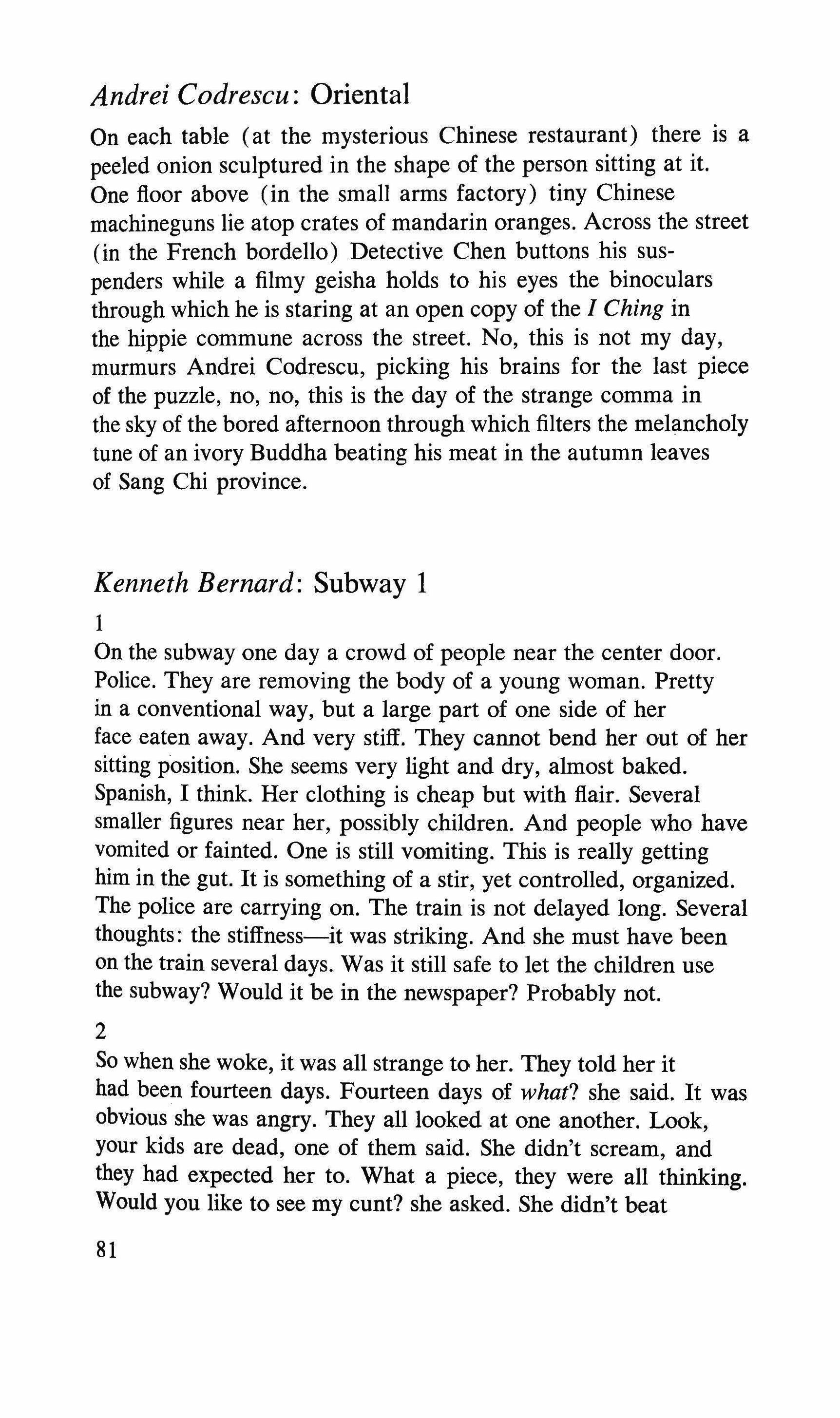
Kenneth Bernard: Subway 1
1
On the subway one day a crowd of people near the center door. Police. They are removing the body of a young woman. Pretty in a conventional way, but a large part of one side of her face eaten away. And very stiff. They cannot bend her out of her sitting position. She seems very light and dry, almost baked. Spanish, I think. Her clothing is cheap but with flair. Several smaller figures near her, possibly children. And people who have vomited or fainted. One is still vomiting. This is really getting him in the gut. It is something of astir, yet controlled, organized. The police are carrying on. The train is not delayed long. Several thoughts: the stiffness-it was striking. And she must have been on the train several days. Was it still safe to let the children use the subway? Would it be in the newspaper? Probably not.
2
So when she woke, it was all strange to her. They told her it had been fourteen days. Fourteen days of what? she said. It was obvious she was angry. They all looked at one another. Look, your kids are dead, one of them said. She didn't scream, and they had expected her to. What a piece, they were all thinking. Would you like to see my cunt? she asked. She didn't beat
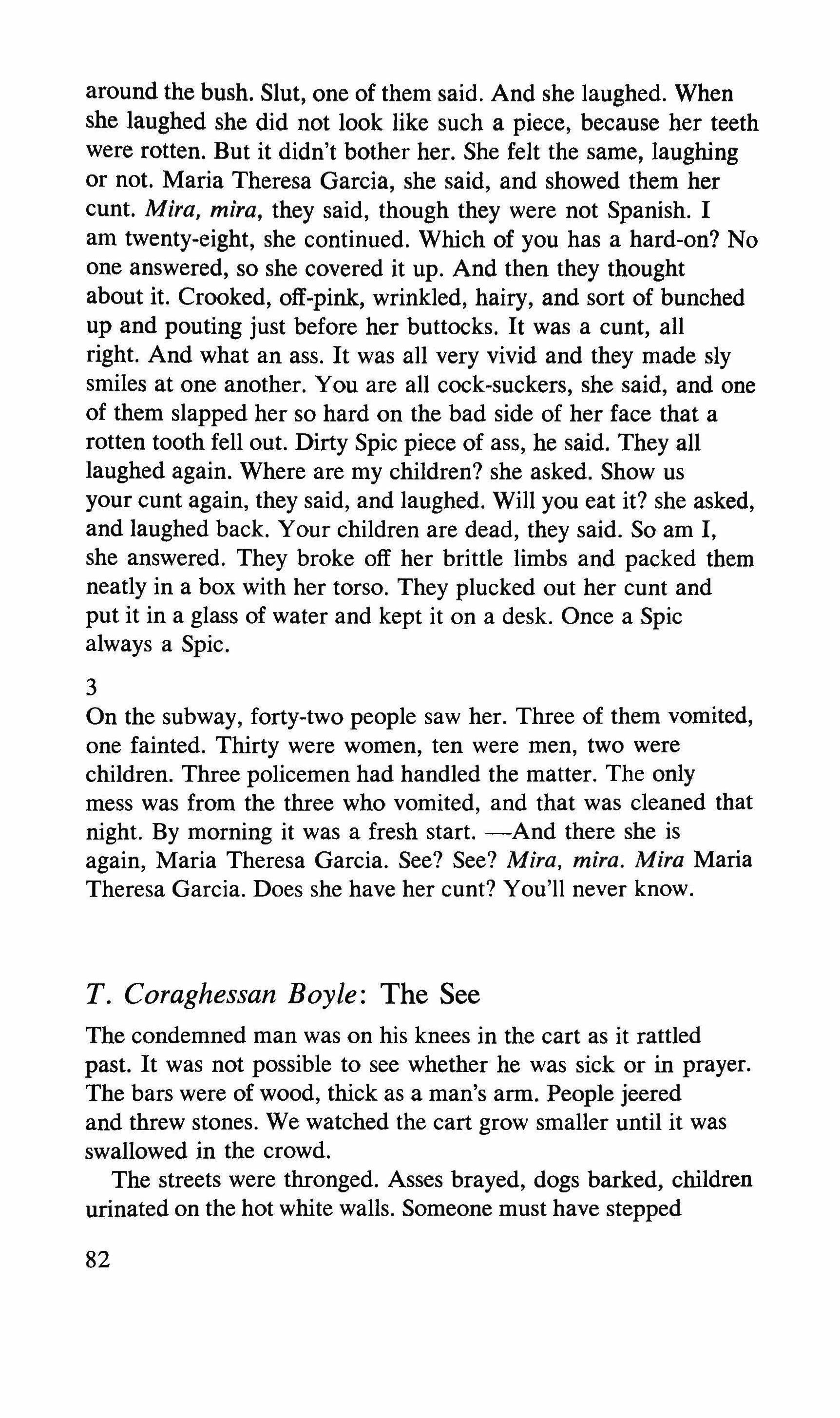
around the bush. Slut, one of them said. And she laughed. When she laughed she did not look like such a piece, because her teeth were rotten. But it didn't bother her. She felt the same, laughing or not. Maria Theresa Garcia, she said, and showed them her cunt. Mira, mira, they said, though they were not Spanish. I am twenty-eight, she continued. Which of you has a hard-on? No one answered, so she covered it up. And then they thought about it. Crooked, off-pink, wrinkled, hairy, and sort of bunched up and pouting just before her buttocks. It was a cunt, all right. And what an ass. It was all very vivid and they made sly smiles at one another. You are all cock-suckers, she said, and one of them slapped her so hard on the bad side of her face that a rotten tooth fell out. Dirty Spic piece of ass, he said. They all laughed again. Where are my children? she asked. Show us your cunt again, they said, and laughed. Will you eat it? she asked, and laughed back. Your children are dead, they said. So am I, she answered. They broke off her brittle limbs and packed them neatly in a box with her torso. They plucked out her cunt and put it in a glass of water and kept it on a desk. Once aSpic always aSpic.
On the subway, forty-two people saw her. Three of them vomited, one fainted. Thirty were women, ten were men, two were children. Three policemen had handled the matter. The only mess was from the three who vomited, and that was cleaned that night. By morning it was a fresh start. -And there she is again, Maria Theresa Garcia. See? See? Mira, mira. Mira Maria Theresa Garcia. Does she have her cunt? You'll never know.
The condemned man was on his knees in the cart as it rattled past. It was not possible to see whether he was sick or in prayer. The bars were of wood, thick as a man's arm. People jeered and threw stones. We watched the cart grow smaller until it was swallowed in the crowd.
The streets were thronged. Asses brayed, dogs barked, children urinated on the hot white walls. Someone must have stepped 82
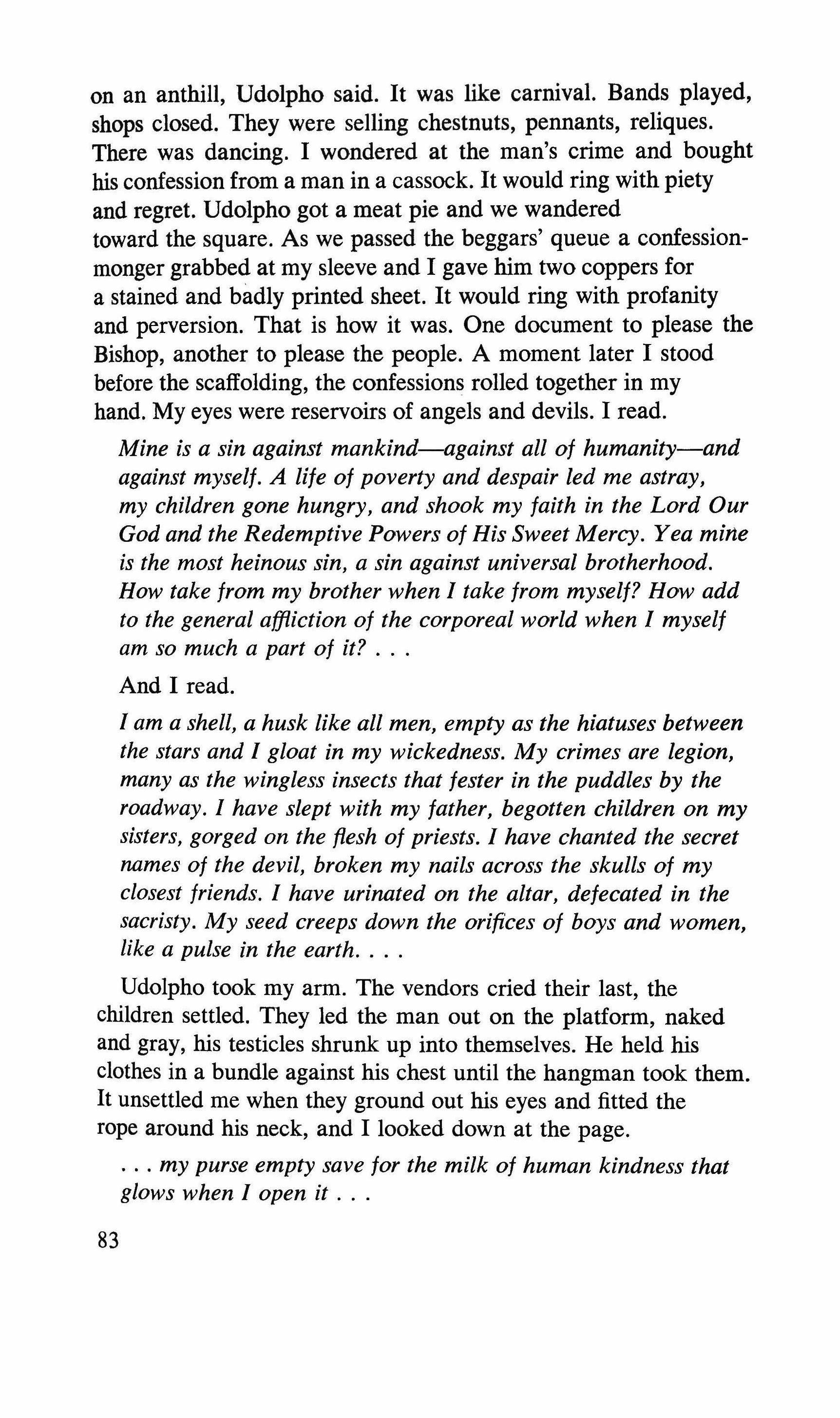
on an anthill, Udolpho said. It was like carnival. Bands played, shops closed. They were selling chestnuts, pennants, reliques. There was dancing. I wondered at the man's crime and bought his confession from a man in a cassock. It would ring with piety and regret. Udolpho got a meat pie and we wandered toward the square. As we passed the beggars' queue a confessionmonger grabbed at my sleeve and I gave him two coppers for a stained and badly printed sheet. It would ring with profanity and perversion. That is how it was. One document to please the Bishop, another to please the people. A moment later I stood before the scaffolding, the confessions rolled together in my hand. My eyes were reservoirs of angels and devils. I read.
Mine is a sin against mankind-against all of humanity-and against myself. A life of poverty and despair led me astray, my children gone hungry, and shook my faith in the Lord Our God and the Redemptive Powers of His Sweet Mercy. Yea mine is the most heinous sin, a sin against universal brotherhood. How take from my brother when I take from myself? How add to the general affliction of the corporeal world when I myself am so much a part of it?
And I read.
I am a shell, a husk like all men, empty as the hiatuses between the stars and I gloat in my wickedness. My crimes are legion, many as the wingless insects that fester in the puddles by the roadway. I have slept with my father, begotten children on my sisters, gorged on the flesh of priests. I have chanted the secret names of the devil, broken my nails across the skulls of my closest friends. I have urinated on the altar, defecated in the sacristy. My seed creeps down the orifices of boys and women, like a pulse in the earth
Udolpho took my arm. The vendors cried their last, the children settled. They led the man out on the platform, naked and gray, his testicles shrunk up into themselves. He held his clothes in a bundle against his chest until the hangman took them. It unsettled me when they ground out his eyes and fitted the rope around his neck, and I looked down at the page my purse empty save for the milk of human kindness that glows when I open it
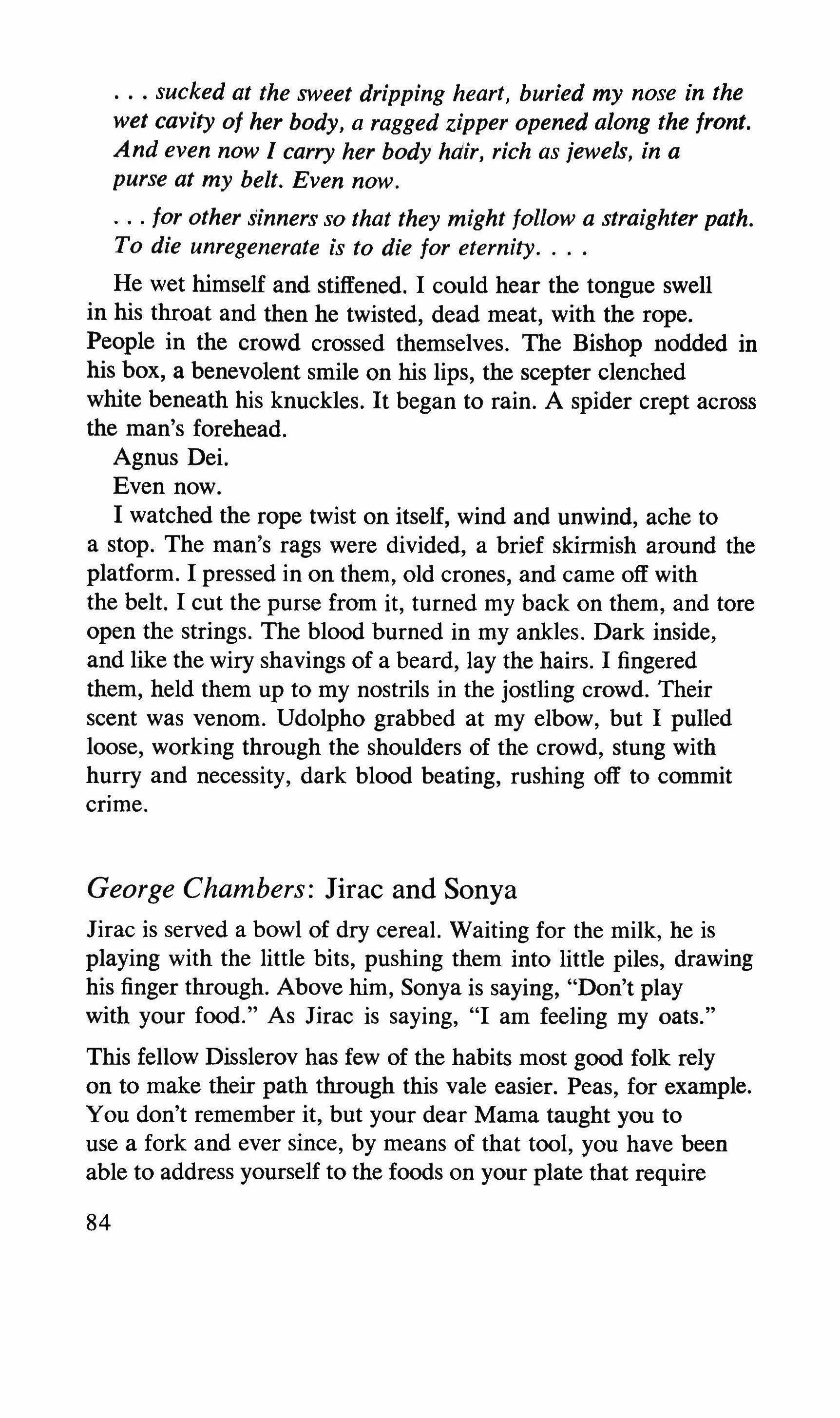
sucked at the sweet dripping heart, buried my nose in the wet cavity of her body, a ragged zipper opened along the front. And even now I carry her body hdir, rich as jewels, in a purse at my belt. Even now
for other sinners so that they might follow a straighter path. To die unregenerate is to die for eternity
He wet himself and stiffened. I could hear the tongue swell in his throat and then he twisted, dead meat, with the rope. People in the crowd crossed themselves. The Bishop nodded in his box, a benevolent smile on his lips, the scepter clenched white beneath his knuckles. It began to rain. A spider crept across the man's forehead.
Agnus Dei. Even now.
I watched the rope twist on itself, wind and unwind, ache to a stop. The man's rags were divided, a brief skirmish around the platform. I pressed in on them, old crones, and came off with the belt. I cut the purse from it, turned my back on them, and tore open the strings. The blood burned in my ankles. Dark inside, and like the wiry shavings of a beard, lay the hairs. I fingered them, held them up to my nostrils in the jostling crowd. Their scent was venom. Udolpho grabbed at my elbow, but I pulled loose, working through the shoulders of the crowd, stung with hurry and necessity, dark blood beating, rushing off to commit crime.
Jirac is served a bowl of dry cereal. Waiting for the milk, he is playing with the little bits, pushing them into little piles, drawing his finger through. Above him, Sonya is saying, "Don't play with your food." As Jirac is saying, "I am feeling my oats."
This fellow Disslerov has few of the habits most good folk rely on to make their path through this vale easier. Peas, for example. You don't remember it, but your dear Mama taught you to use a fork and ever since, by means of that tool, you have been able to address yourself to the foods on your plate that require
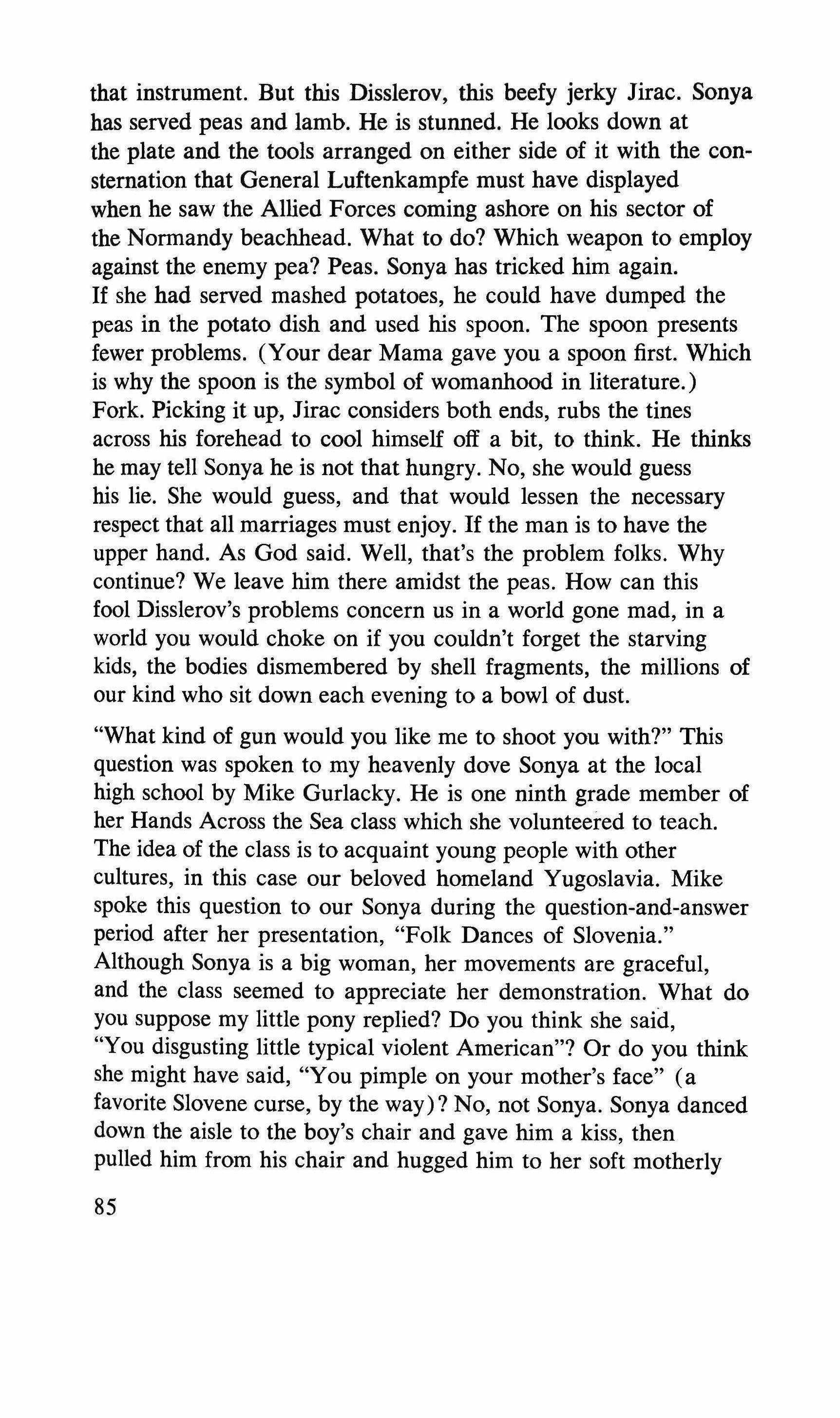
that instrument. But this Disslerov, this beefy jerky Jirac. Sonya has served peas and lamb. He is stunned. He looks down at the plate and the tools arranged on either side of it with the consternation that General Luftenkampfe must have displayed when he saw the Allied Forces coming ashore on his sector of the Normandy beachhead. What to do? Which weapon to employ against the enemy pea? Peas. Sonya has tricked him again. If she had served mashed potatoes, he could have dumped the peas in the potato dish and used his spoon. The spoon presents fewer problems. (Your dear Mama gave you a spoon first. Which is why the spoon is the symbol of womanhood in literature.) Fork. Picking it up, Jirac considers both ends, rubs the tines across his forehead to cool himself off a bit, to think. He thinks he may tell Sonya he is not that hungry. No, she would guess his lie. She would guess, and that would lessen the necessary respect that all marriages must enjoy. If the man is to have the upper hand. As God said. Well, that's the problem folks. Why continue? We leave him there amidst the peas. How can this fool Disslerov's problems concern us in a world gone mad, in a world you would choke on if you couldn't forget the starving kids, the bodies dismembered by shell fragments, the millions of our kind who sit down each evening to a bowl of dust.
"What kind of gun would you like me to shoot you with?" This question was spoken to my heavenly dove Sonya at the local high school by Mike Gurlacky. He is one ninth grade member of her Hands Across the Sea class which she volunteered to teach. The idea of the class is to acquaint young people with other cultures, in this case our beloved homeland Yugoslavia. Mike spoke this question to our Sonya during the question-and-answer period after her presentation, "Folk Dances of Slovenia." Although Sonya is a big woman, her movements are graceful, and the class seemed to appreciate her demonstration. What do you suppose my little pony replied? Do you think she said, "You disgusting little typical violent American"? Or do you think she might have said, "You pimple on your mother's face" (a favorite Slovene curse, by the way)? No, not Sonya. Sonya danced down the aisle to the boy's chair and gave him a kiss, then pulled him from his chair and hugged him to her soft motherly
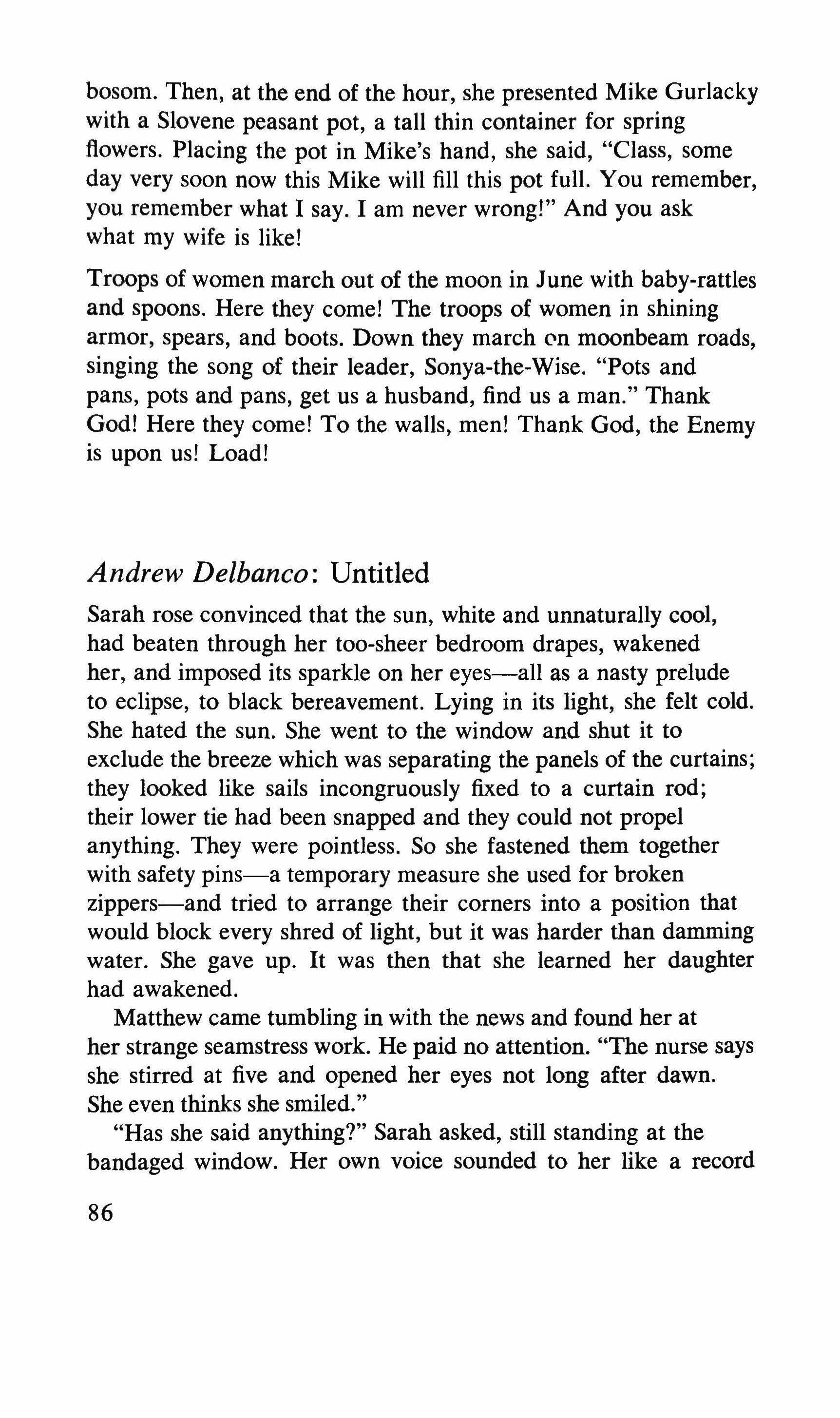
bosom. Then, at the end of the hour, she presented Mike Gurlacky with a Slovene peasant pot, a tall thin container for spring flowers. Placing the pot in Mike's hand, she said, "Class, some day very soon now this Mike will fill this pot full. You remember, you remember what I say. I am never wrong!" And you ask what my wife is like!
Troops of women march out of the moon in June with baby-rattles and spoons. Here they come! The troops of women in shining armor, spears, and boots. Down they march (In moonbeam roads, singing the song of their leader, Sonya-the-Wise. "Pots and pans, pots and pans, get us a husband, find us a man." Thank God! Here they come! To the walls, men! Thank God, the Enemy is upon us! Load!
Sarah rose convinced that the sun, white and unnaturally cool, had beaten through her too-sheer bedroom drapes, wakened her, and imposed its sparkle on her eyes-all as a nasty prelude to eclipse, to black bereavement. Lying in its light, she felt cold. She hated the sun. She went to the window and shut it to exclude the breeze which was separating the panels of the curtains; they looked like sails incongruously fixed to a curtain rod; their lower tie had been snapped and they could not propel anything. They were pointless. So she fastened them together with safety pins-a temporary measure she used for broken zippers-and tried to arrange their corners into a position that would block every shred of light, but it was harder than damming water. She gave up. It was then that she learned her daughter had awakened.
Matthew came tumbling in with the news and found her at her strange seamstress work. He paid no attention. "The nurse says she stirred at five and opened her eyes not long after dawn. She even thinks she smiled."
"Has she said anything?" Sarah asked, still standing at the bandaged window. Her own voice sounded to her like a record
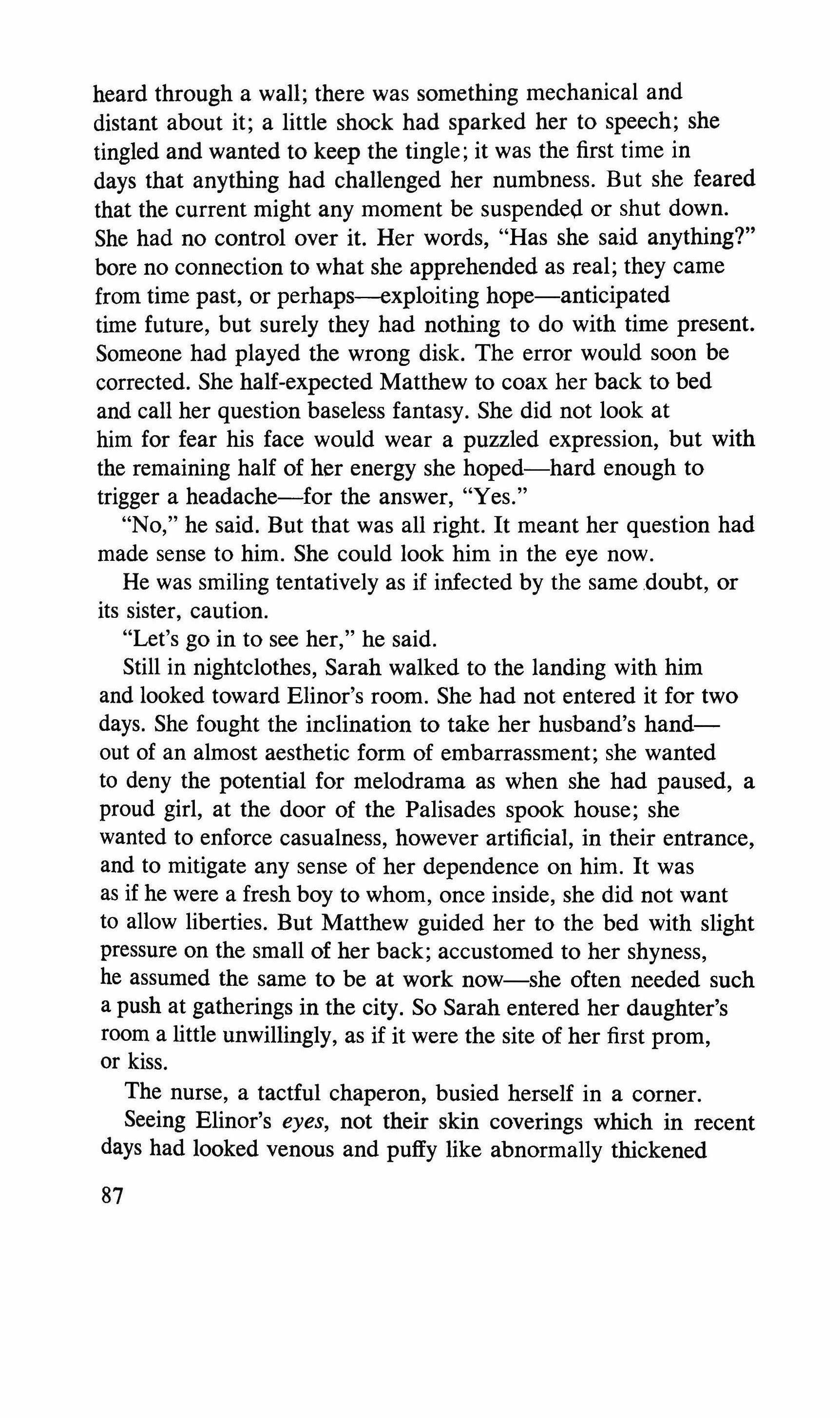
heard through a wall; there was something mechanical and distant about it; a little shock had sparked her to speech; she tingled and wanted to keep the tingle; it was the first time in days that anything had challenged her numbness. But she feared that the current might any moment be suspended or shut down. She had no control over it. Her words, "Has she said anything?" bore no connection to what she apprehended as real; they came from time past, or perhaps--exploiting hope-anticipated time future, but surely they had nothing to do with time present. Someone had played the wrong disk. The error would soon be corrected. She half-expected Matthew to coax her back to bed and call her question baseless fantasy. She did not look at him for fear his face would wear a puzzled expression, but with the remaining half of her energy she hoped-hard enough to trigger a headache-for the answer, "Yes."
"No," he said. But that was all right. It meant her question had made sense to him. She could look him in the eye now.
He was smiling tentatively as if infected by the same doubt, or its sister, caution.
"Let's go in to see her," he said.
Still in nightclothes, Sarah walked to the landing with him and looked toward Elinor's room. She had not entered it for two days. She fought the inclination to take her husband's handout of an almost aesthetic form of embarrassment; she wanted to deny the potential for melodrama as when she had paused, a proud girl, at the door of the Palisades spook house; she wanted to enforce casualness, however artificial, in their entrance, and to mitigate any sense of her dependence on him. It was as if he were a fresh boy to whom, once inside, she did not want to allow liberties. But Matthew guided her to the bed with slight pressure on the small of her back; accustomed to her shyness, he assumed the same to be at work now-she often needed such a push at gatherings in the city. So Sarah entered her daughter's room a little unwillingly, as if it were the site of her first prom, or kiss.
The nurse, a tactful chaperon, busied herself in a corner.
Seeing Elinor's eyes, not their skin coverings which in recent days had looked venous and puffy like abnormally thickened
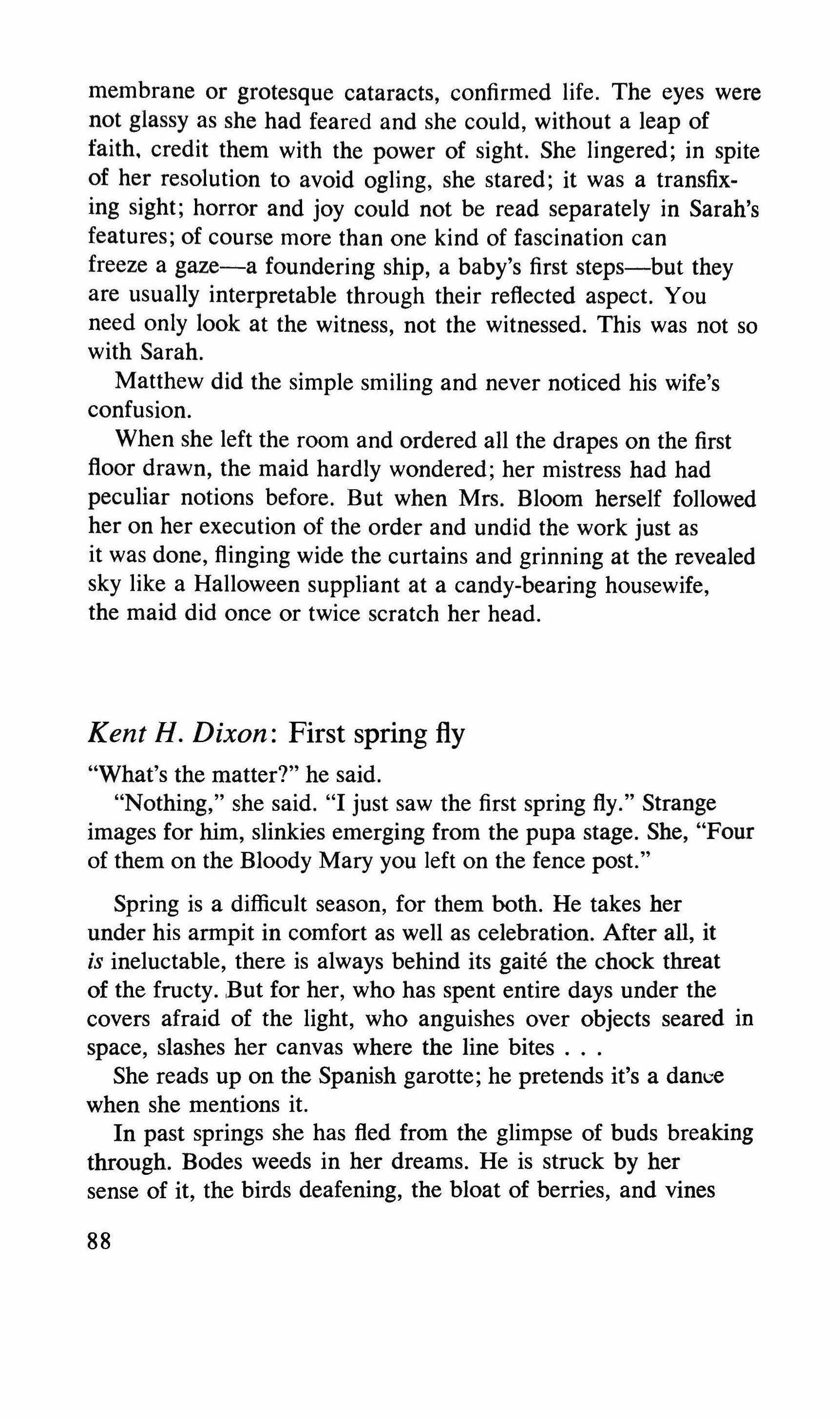
membrane or grotesque cataracts, confirmed life. The eyes were not glassy as she had feared and she could, without a leap of faith. credit them with the power of sight. She lingered; in spite of her resolution to avoid ogling, she stared; it was a transfixing sight; horror and joy could not be read separately in Sarah's features; of course more than one kind of fascination can freeze a gaze-a foundering ship, a baby's first steps-but they are usually interpretable through their reflected aspect. You need only look at the witness, not the witnessed. This was not so with Sarah.
Matthew did the simple smiling and never noticed his wife's confusion.
When she left the room and ordered all the drapes on the first floor drawn, the maid hardly wondered; her mistress had had peculiar notions before. But when Mrs. Bloom herself followed her on her execution of the order and undid the work just as it was done, flinging wide the curtains and grinning at the revealed sky like a Halloween suppliant at a candy-bearing housewife, the maid did once or twice scratch her head.
"What's the matter?" he said.
"Nothing," she said. "I just saw the first spring fly." Strange images for him, slinkies emerging from the pupa stage. She, "Four of them on the Bloody Mary you left on the fence post."
Spring is a difficult season, for them both. He takes her under his armpit in comfort as well as celebration. After all, it is ineluctable, there is always behind its gaite the chock threat of the fructy. But for her, who has spent entire days under the covers afraid of the light, who anguishes over objects seared in space, slashes her canvas where the line bites
She reads up on the Spanish garotte; he pretends it's a dance when she mentions it.
In past springs she has fled from the glimpse of buds breaking through. Bodes weeds in her dreams. He is struck by her sense of it, the birds deafening, the bloat of berries, and vines
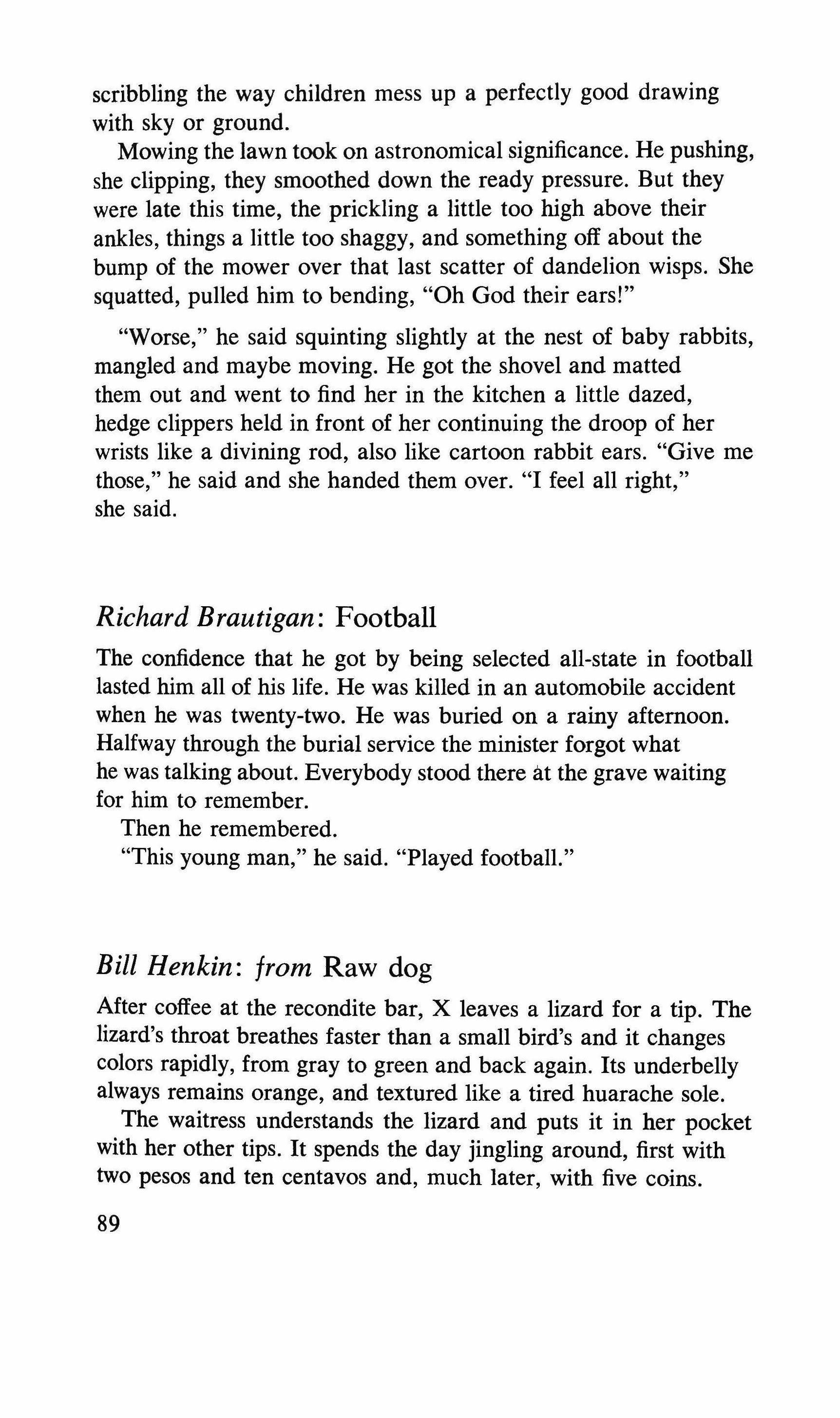
scribbling the way children mess up a perfectly good drawing with sky or ground.
Mowing the lawn took on astronomical significance. He pushing, she clipping, they smoothed down the ready pressure. But they were late this time, the prickling a little too high above their ankles, things a little too shaggy, and something off about the bump of the mower over that last scatter of dandelion wisps. She squatted, pulled him to bending, "Oh God their ears!"
"Worse," he said squinting slightly at the nest of baby rabbits, mangled and maybe moving. He got the shovel and matted them out and went to find her in the kitchen a little dazed, hedge clippers held in front of her continuing the droop of her wrists like a divining rod, also like cartoon rabbit ears. "Give me those," he said and she handed them over. "I feel all right," she said.
The confidence that he got by being selected all-state in football lasted him all of his life. He was killed in an automobile accident when he was twenty-two. He was buried on a rainy afternoon. Halfway through the burial service the minister forgot what he was talking about. Everybody stood there at the grave waiting for him to remember.
Then he remembered.
"This young man," he said. "Played football."
After coffee at the recondite bar, X leaves a lizard for a tip. The lizard's throat breathes faster than a small bird's and it changes colors rapidly, from gray to green and back again. Its underbelly always remains orange, and textured like a tired huarache sole. The waitress understands the lizard and puts it in her pocket with her other tips. It spends the day jingling around, first with two pesos and ten centavos and, much later, with five coins.

By the time she takes her tips out of her pocket at night to spend them it has turned into a dead lizard. She tosses it out the window and it lands in some potted crabgrass which swings just below the ledge from a tattered banana leaf. There, over a period of time, it turns into the skeleton and hide of a lizard and finally into scattered lizard bones.
In the meantime some passing young gaucho with business in the room spits watermelon seeds through that window, some of which land in that same potted crabgrass. Some of these seeds sprout. A few grow stronger than the crabgrass. One survives through an eyehole in the lizard's skull and late in the season produces a melon of prodigious size whose rich thick sweet red smell is renowned in the village.
One day when X is visiting in the courtyard below, the famous melon's weight becomes too much for its vine to support and it falls smashing to the ground and sending a shower of intense watermelon smells almost across the island. Everyone comes to the courtyard within a few minutes to get a taste of the legendary odoriferous hanging melon-even the late arrivals who can't believe what the first ones tell them and are no less amazed when they push their hands full of juicy red melon meat into their watering mouths and discover that it does taste like lizard. X, in the awesome silence that follows, selectively weeds out a couple of seeds from the half-bitten dribbling pulp in his hands and puts them in his pocket. He comes back to the courtyard in the middle of the night with a hoe, but the moonlight already depicts an orchard of swaying lizard vines.
This is my opera. Everybody sings as loud as he can. This is an opera where people go into showers & sing as loud as they can. The water falling & running is the music. The opera sits on the music like a fat hen. The voice comes up through the water. The first opera I saw was Faust, when Gretchen sat down at the spinning wheel the wheel came off & rolled across the stage. Then her spinning stool broke & she sang sitting on the floor. While I write this a piano is on the radio & it plays the waltzes
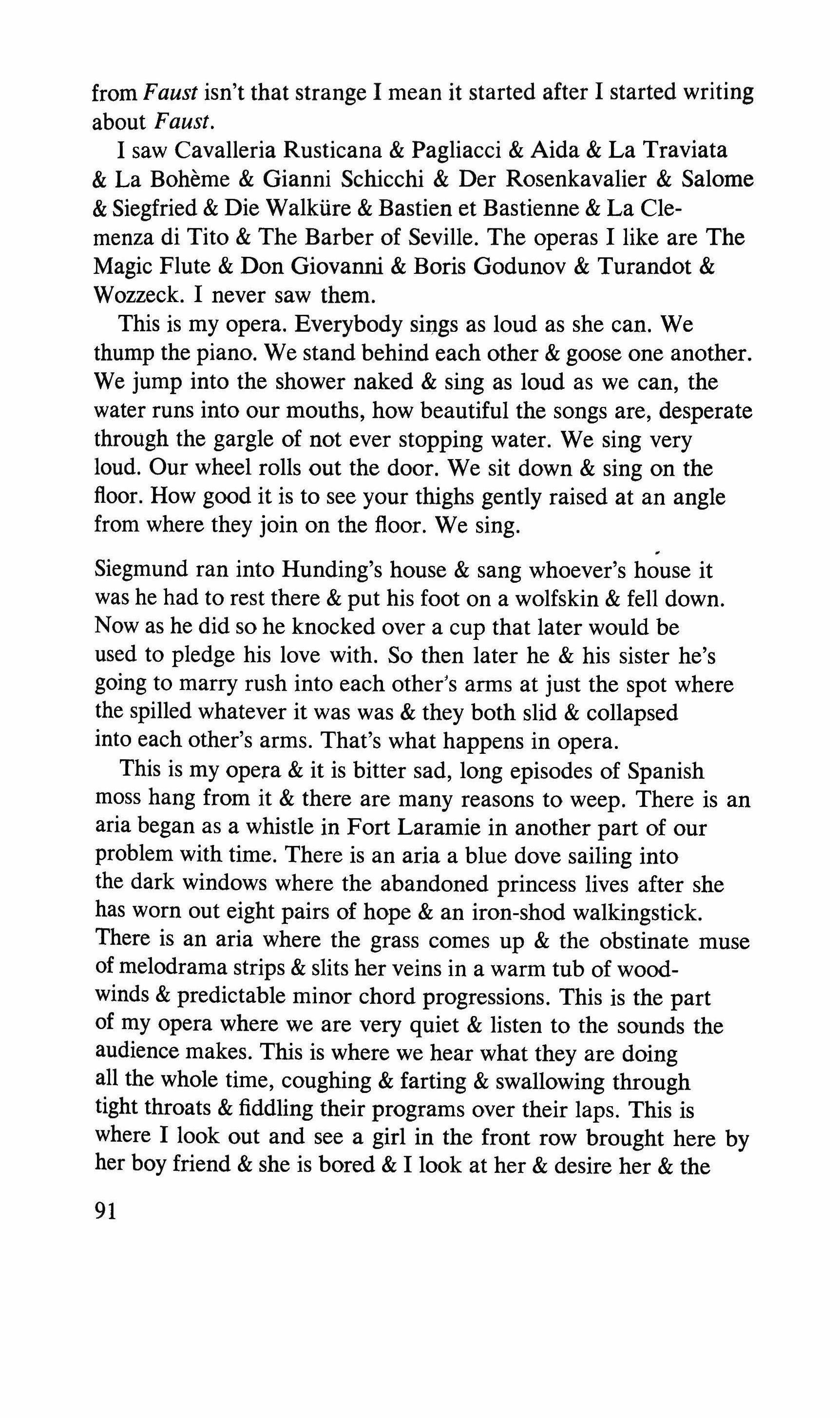
from Faust isn't that strange I mean it started after I started writing about Faust.
I saw Cavalleria Rusticana & Pagliacci & Aida & La Traviata & La Boheme & Gianni Schicchi & Der Rosenkavalier & Salome & Siegfried & Die Walktire & Bastien et Bastienne & La Clemenza di Tito & The Barber of Seville. The operas I like are The Magic Flute & Don Giovanni & Boris Godunov & Turandot & Wozzeck. I never saw them.
This is my opera. Everybody sings as loud as she can. We thump the piano. We stand behind each other & goose one another. We jump into the shower naked & sing as loud as we can, the water runs into our mouths, how beautiful the songs are, desperate through the gargle of not ever stopping water. We sing very loud. Our wheel rolls out the door. We sit down & sing on the floor. How good it is to see your thighs gently raised at an angle from where they join on the floor. We sing.
Siegmund ran into Hunding's house & sang whoever's house it was he had to rest there & put his foot on a wolfskin & fell down. Now as he did so he knocked over a cup that later would be used to pledge his love with. So then later he & his sister he's going to marry rush into each other's arms at just the spot where the spilled whatever it was was & they both slid & collapsed into each other's arms. That's what happens in opera.
This is my opera & it is bitter sad, long episodes of Spanish moss hang from it & there are many reasons to weep. There is an aria began as a whistle in Fort Laramie in another part of our problem with time. There is an aria a blue dove sailing into the dark windows where the abandoned princess lives after she has worn out eight pairs of hope & an iron-shod walkingstick. There is an aria where the grass comes up & the obstinate muse of melodrama strips & slits her veins in a warm tub of woodwinds & predictable minor chord progressions. This is the part of my opera where we are very quiet & listen to the sounds the audience makes. This is where we hear what they are doing all the whole time, coughing & farting & swallowing through tight throats & fiddling their programs over their laps. This is where I look out and see a girl in the front row brought here by her boy friend & she is bored & I look at her & desire her & the

opera stops, taken up into something else, an older & purer & quieter & more dangerous form. This is the part of the opera where doing something at a desk or table we look up & see sunlight on a distant building.
When Faust & Mephisto came along slyly to spy on Marguerite they stumbled against the backdrop & the garden wall trembled, like any wall when the sun falls on it & there are clouds droning away overhead. I wonder if I saw Carmen, I think I did, the fake knife piercing her bare breast & Joseph her foiled lover making inadequate sounds of his confused but willful grief while the crowd sings something else in response to an utterly different triumph.
A triumph of another order. That's what I want. This is my opera, it leads through the streets, it is written in American, it began somewhere & goes somewhere, what more could any rational man ask. We sing as loud as we can. We translate everything. Carmen means poem & flesh & magic spell cast on you with my music. I call you on the telephone, come sing in my opera, come hear me sing. I sing as loud as I can.
They were the ones who helped the spiders weave their webs, the ones who fastened dewdrops in the ears of cowslips, the ones who sang the legend of Tintagel, accompanied by orchestras of crickets. They were the ones who burnished magic swords, the inventors of philters and spells, the ones who conferred gifts, the ones who used to laugh, recalling how they helped smuggle blondes and brandy, the ones who cried, thinking about the escape from the pier at Dymchurch, deserting old England which was becoming crueler and crueler, with its abominable Canterbury bells, its Bulwerhithe bonfires, its Winchelsea flood, and that great rheumatic queen, bejeweled and wrapped in stiff brocades and laces, and, to top it off, a virgin, just imagine. They were the most prankish ones, the ones who made tiny, flickering green lights dance on the arches of churches and in the graveyards at night, who frightened horses, spilled beer on maids' aprons, and curdled milk.
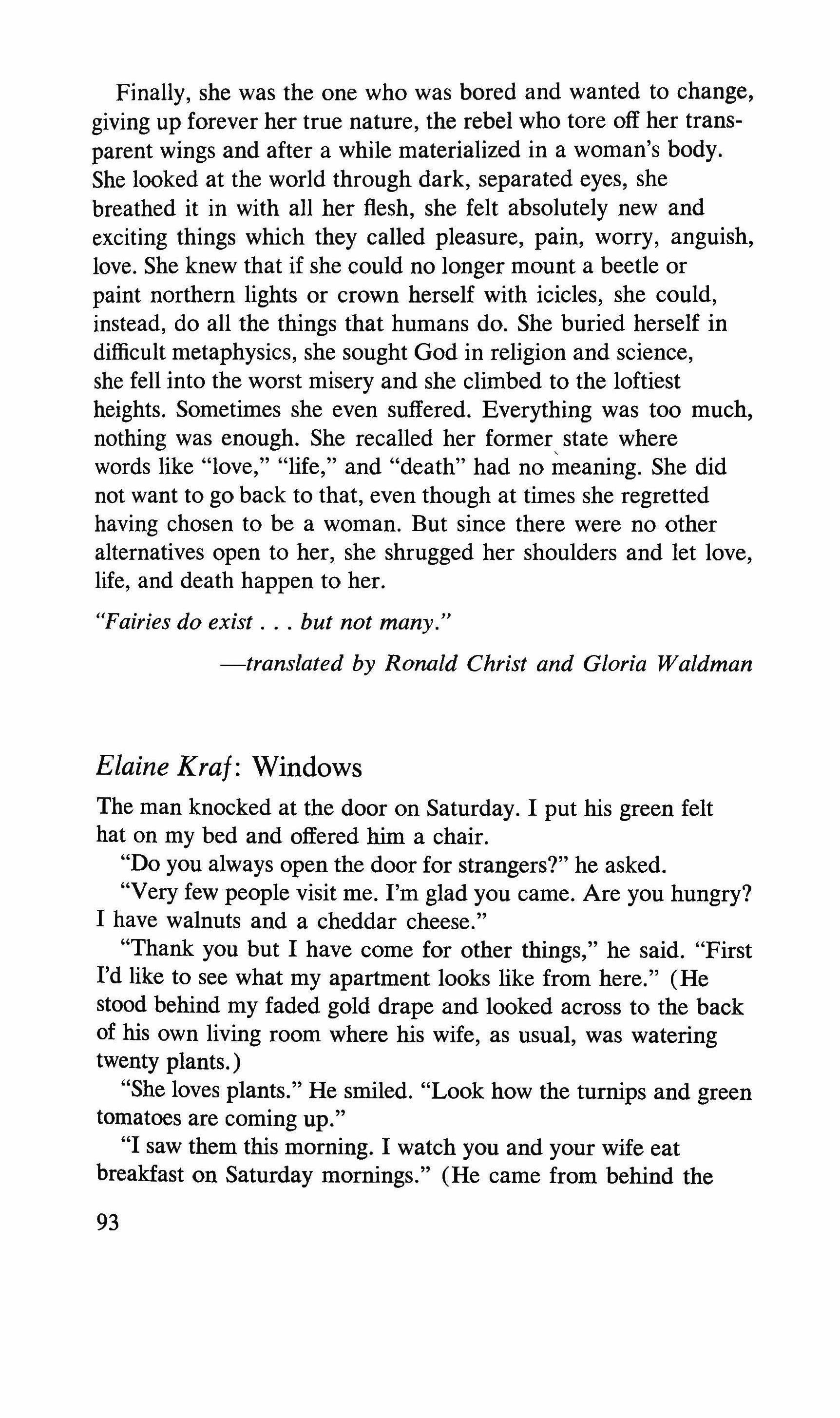
Finally, she was the one who was bored and wanted to change, giving up forever her true nature, the rebel who tore off her transparent wings and after a while materialized in a woman's body. She looked at the world through dark, separated eyes, she breathed it in with all her flesh, she felt absolutely new and exciting things which they called pleasure, pain, worry, anguish, love. She knew that if she could no longer mount a beetle or paint northern lights or crown herself with icicles, she could, instead, do all the things that humans do. She buried herself in difficult metaphysics, she sought God in religion and science, she fell into the worst misery and she climbed to the loftiest heights. Sometimes she even suffered. Everything was too much, nothing was enough. She recalled her former state where words like "love," "life," and "death" had no meaning. She did not want to go back to that, even though at times she regretted having chosen to be a woman. But since there were no other alternatives open to her, she shrugged her shoulders and let love, life, and death happen to her.
"Fairies do exist but not many."
-translated by Ronald Christ and Gloria Waldman
The man knocked at the door on Saturday. 1 put his green felt hat on my bed and offered him a chair.
"Do you always open the door for strangers?" he asked.
"Very few people visit me. I'm glad you came. Are you hungry? 1 have walnuts and a cheddar cheese."
"Thank you but 1 have come for other things," he said. "First I'd like to see what my apartment looks like from here." (He stood behind my faded gold drape and looked across to the back of his own living room where his wife, as usual, was watering twenty plants.)
"She loves plants." He smiled. "Look how the turnips and green tomatoes are coming up."
"I saw them this morning. 1 watch you and your wife eat breakfast on Saturday mornings." (He came from behind the 93
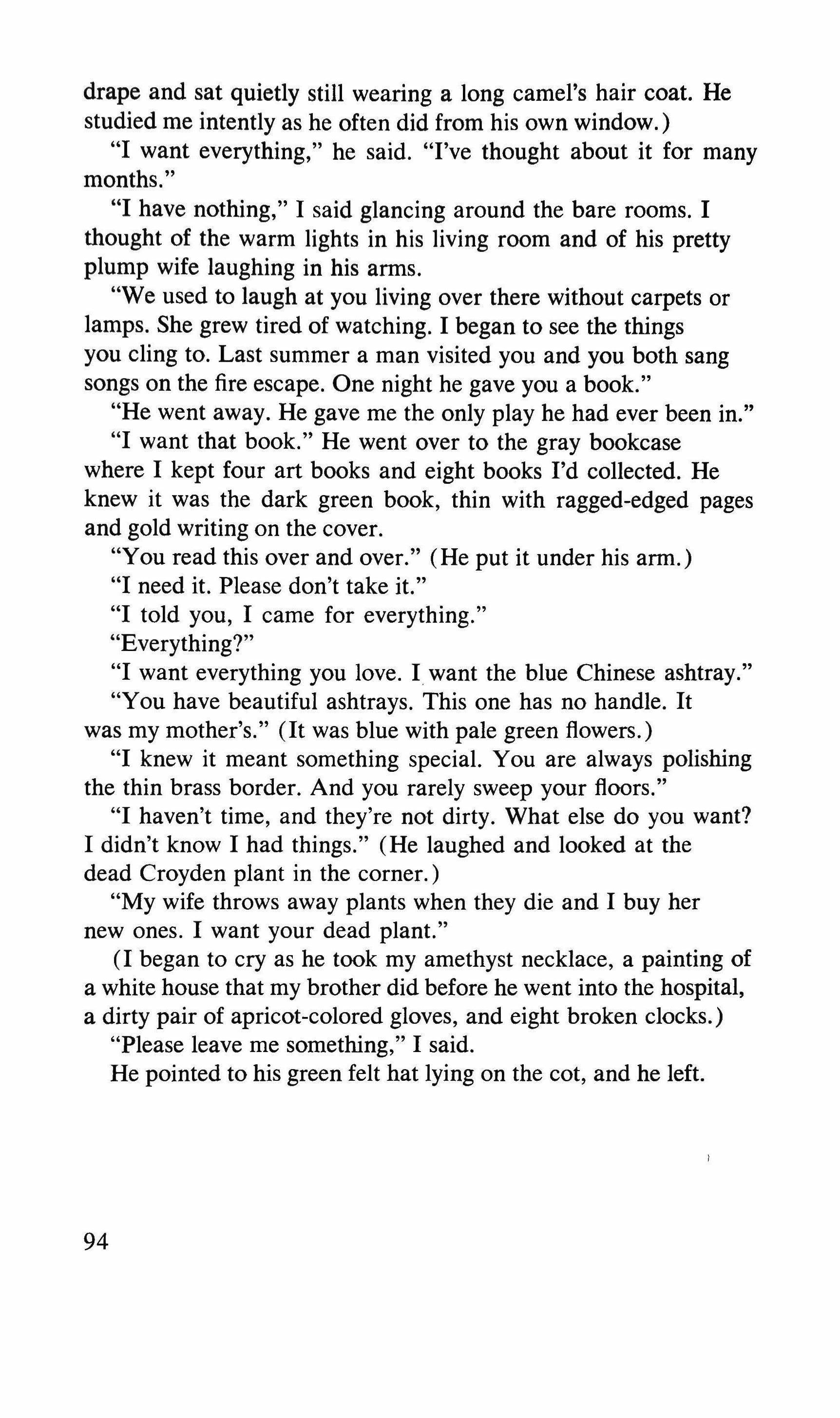
drape and sat quietly still wearing a long camel's hair coat. He studied me intently as he often did from his own window.)
"I want everything," he said. "I've thought about it for many months."
"I have nothing," I said glancing around the bare rooms. I thought of the warm lights in his living room and of his pretty plump wife laughing in his arms.
"We used to laugh at you living over there without carpets or lamps. She grew tired of watching. I began to see the things you cling to. Last summer a man visited you and you both sang songs on the fire escape. One night he gave you a book."
"He went away. He gave me the only play he had ever been in."
"I want that book." He went over to the gray bookcase where I kept four art books and eight books I'd collected. He knew it was the dark green book, thin with ragged-edged pages and gold writing on the cover.
"You read this over and over." (He put it under his arm.)
"I need it. Please don't take it."
"I told you, I came for everything."
"Everything?"
"I want everything you love. I want the blue Chinese ashtray."
"You have beautiful ashtrays. This one has no handle. It was my mother's." (It was blue with pale green flowers.)
"I knew it meant something special. You are always polishing the thin brass border. And you rarely sweep your floors."
"I haven't time, and they're not dirty. What else do you want? I didn't know I had things." (He laughed and looked at the dead Croyden plant in the corner.)
"My wife throws away plants when they die and I buy her new ones. I want your dead plant."
(I began to cry as he took my amethyst necklace, a painting of a white house that my brother did before he went into the hospital, a dirty pair of apricot-colored gloves, and eight broken clocks.)
"Please leave me something," I said.
He pointed to his green felt hat lying on the cot, and he left.
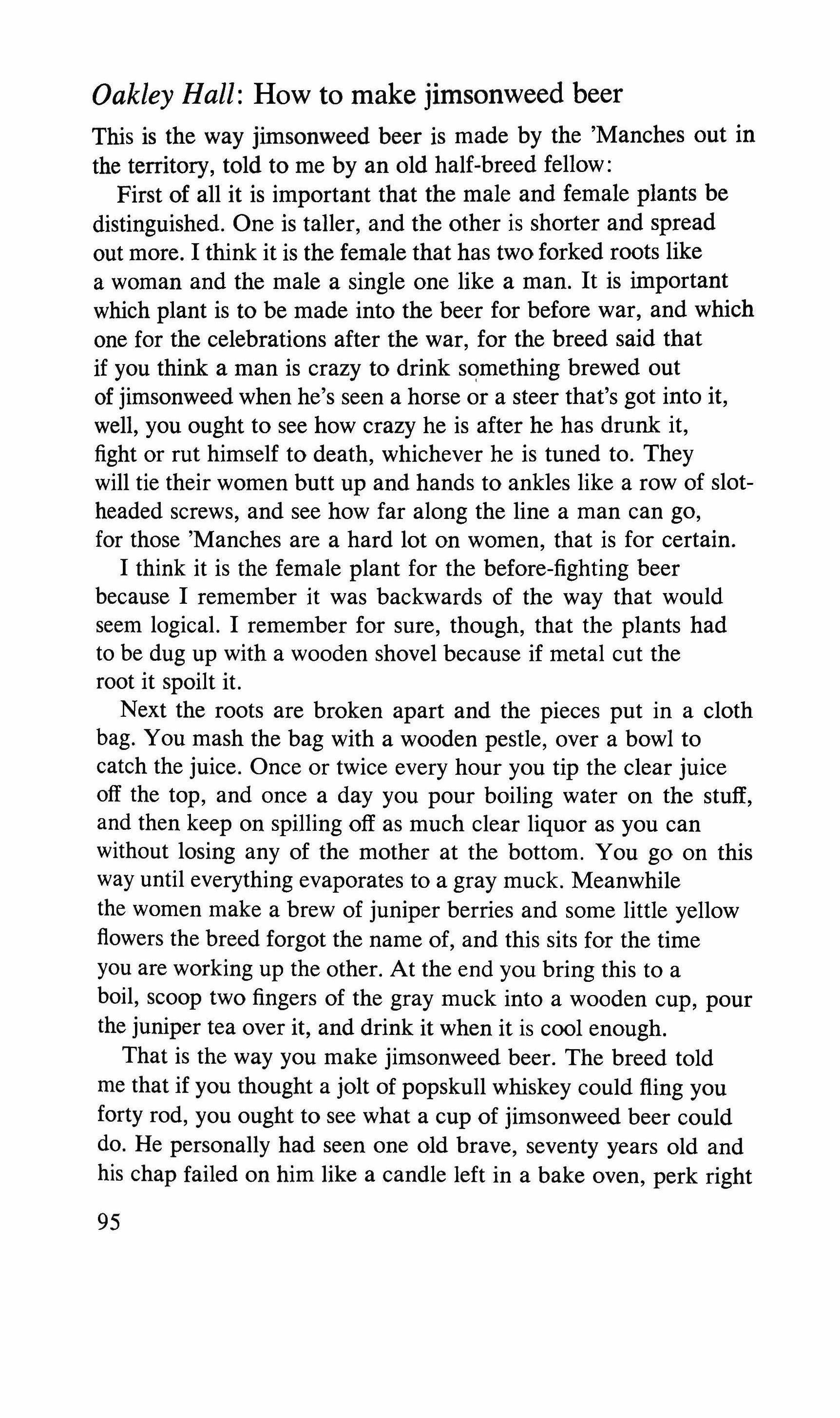
This is the way jimsonweed beer is made by the 'Manches out in the territory, told to me by an old half-breed fellow:
First of all it is important that the male and female plants be distinguished. One is taller, and the other is shorter and spread out more. I think it is the female that has two forked roots like a woman and the male a single one like a man. It is important which plant is to be made into the beer for before war, and which one for the celebrations after the war, for the breed said that if you think a man is crazy to drink something brewed out of jimsonweed when he's seen a horse or a steer that's got into it, well, you ought to see how crazy he is after he has drunk it, fight or rut himself to death, whichever he is tuned to. They will tie their women butt up and hands to ankles like a row of slotheaded screws, and see how far along the line a man can go, for those 'Manches are a hard lot on women, that is for certain.
I think it is the female plant for the before-fighting beer because I remember it was backwards of the way that would seem logical. I remember for sure, though, that the plants had to be dug up with a wooden shovel because if metal cut the root it spoilt it.
Next the roots are broken apart and the pieces put in a cloth bag. You mash the bag with a wooden pestle, over a bowl to catch the juice. Once or twice every hour you tip the clear juice off the top, and once a day you pour boiling water on the stuff, and then keep on spilling off as much clear liquor as you can without losing any of the mother at the bottom. You go on this way until everything evaporates to a gray muck. Meanwhile the women make a brew of juniper berries and some little yellow flowers the breed forgot the name of, and this sits for the time you are working up the other. At the end you bring this to a boil, scoop two fingers of the gray muck into a wooden cup, pour the juniper tea over it, and drink it when it is cool enough.
That is the way you make jimsonweed beer. The breed told me that if you thought a jolt of popskull whiskey could fling you forty rod, you ought to see what a cup of jimsonweed beer could do. He personally had seen one old brave, seventy years old and his chap failed on him like a candle left in a bake oven, perk right 95
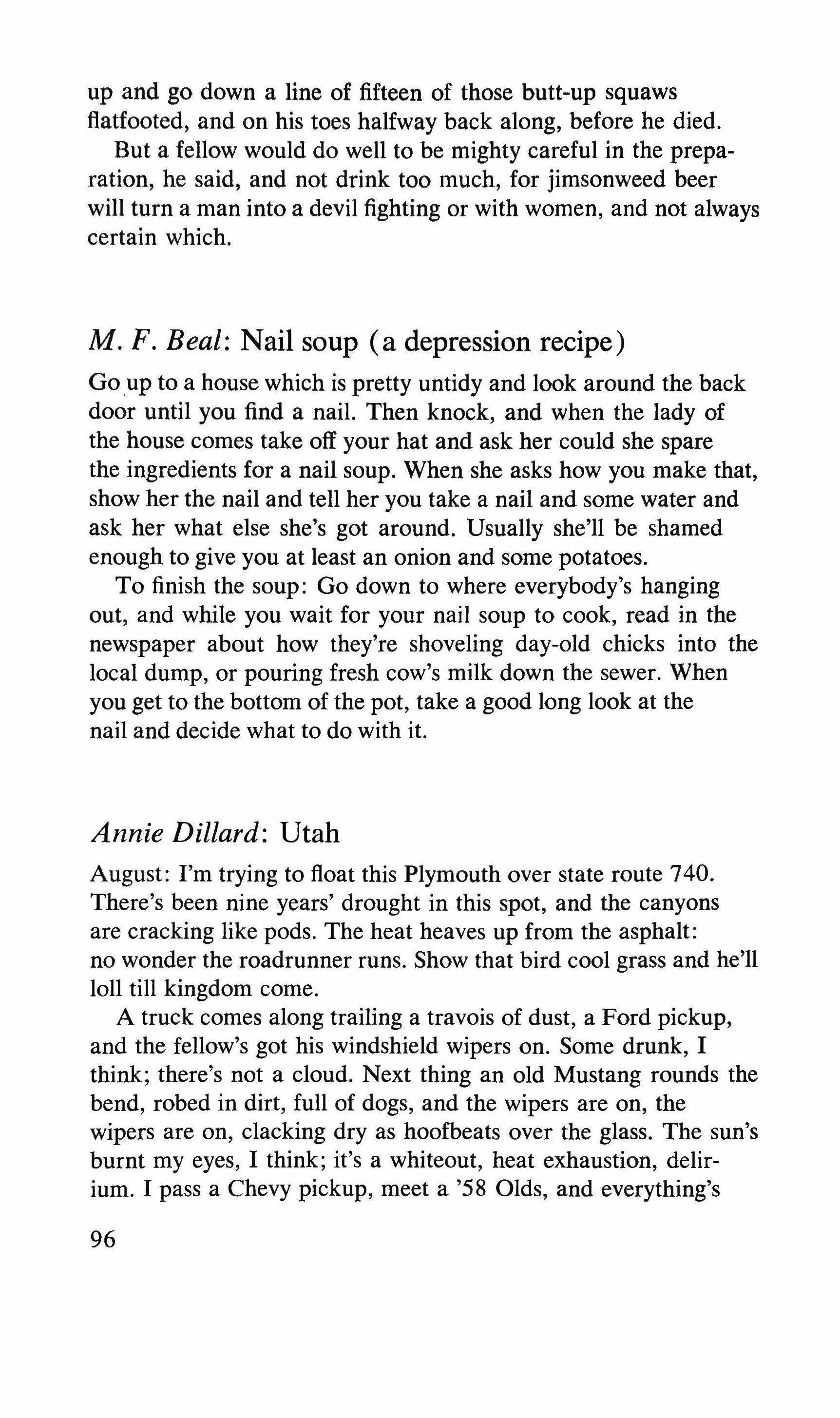
up and go down a line of fifteen of those butt-up squaws flatfooted, and on his toes halfway back along, before he died. But a fellow would do well to be mighty careful in the preparation, he said, and not drink too much, for jimsonweed beer will turn a man into a devil fighting or with women, and not always certain which.
Go up to a house which is pretty untidy and look around the back door until you find a nail. Then knock, and when the lady of the house comes take off your hat and ask her could she spare the ingredients for a nail soup. When she asks how you make that, show her the nail and tell her you take a nail and some water and ask her what else she's got around. Usually she'll be shamed enough to give you at least an onion and some potatoes.
To finish the soup: Go down to where everybody's hanging out, and while you wait for your nail soup to cook, read in the newspaper about how they're shoveling day-old chicks into the local dump, or pouring fresh cow's milk down the sewer. When you get to the bottom of the pot, take a good long look at the nail and decide what to do with it.
August: I'm trying to float this Plymouth over state route 740. There's been nine years' drought in this spot, and the canyons are cracking like pods. The heat heaves up from the asphalt: no wonder the roadrunner runs. Show that bird cool grass and he'll loll till kingdom come.
A truck comes along trailing a travois of dust, a Ford pickup, and the fellow's got his windshield wipers on. Some drunk, I think; there's not a cloud. Next thing an old Mustang rounds the bend, robed in dirt, full of dogs, and the wipers are on, the wipers are on, clacking dryas hoofbeats over the glass. The sun's burnt my eyes, I think; it's a whiteout, heat exhaustion, delirium. I pass a Chevy pickup, meet a '58 Olds, and everything's
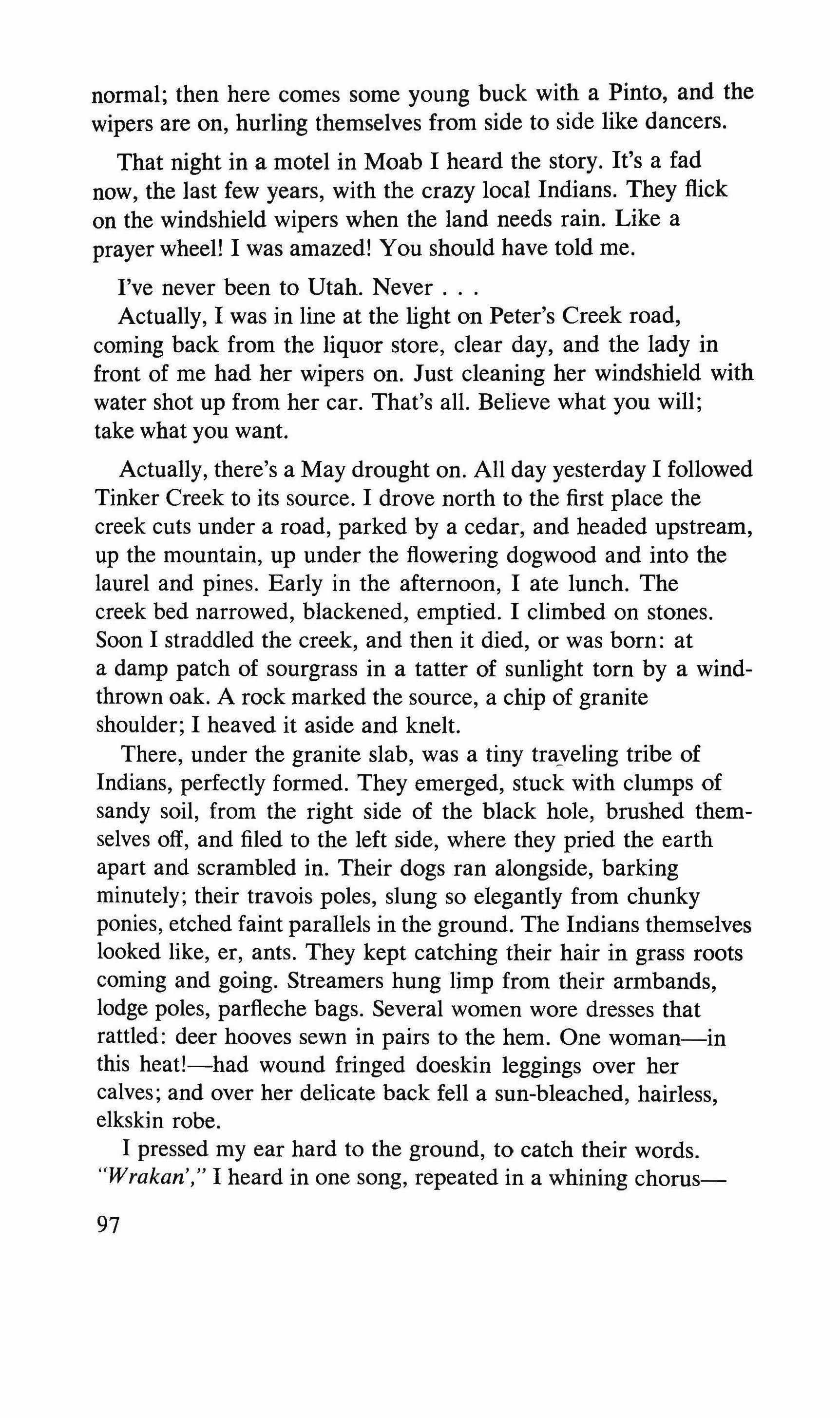
normal; then here comes some young buck with a Pinto, and the wipers are on, hurling themselves from side to side like dancers.
That night in a motel in Moab I heard the story. It's a fad now, the last few years, with the crazy local Indians. They flick on the windshield wipers when the land needs rain. Like a prayer wheel! I was amazed! You should have told me.
I've never been to Utah. Never
Actually, I was in line at the light on Peter's Creek road, coming back from the liquor store, clear day, and the lady in front of me had her wipers on. Just cleaning her windshield with water shot up from her car. That's all. Believe what you will; take what you want.
Actually, there's a May drought on. All day yesterday I followed Tinker Creek to its source. I drove north to the first place the creek cuts under a road, parked by a cedar, and headed upstream, up the mountain, up under the flowering dogwood and into the laurel and pines. Early in the afternoon, I ate lunch. The creek bed narrowed, blackened, emptied. I climbed on stones. Soon I straddled the creek, and then it died, or was born: at a damp patch of sourgrass in a tatter of sunlight torn by a windthrown oak. A rock marked the source, a chip of granite shoulder; I heaved it aside and knelt.
There, under the granite slab, was a tiny traveling tribe of Indians, perfectly formed. They emerged, stuck with clumps of sandy soil, from the right side of the black hole, brushed themselves off, and filed to the left side, where they pried the earth apart and scrambled in. Their dogs ran alongside, barking minutely; their travois poles, slung so elegantly from chunky ponies, etched faint parallels in the ground. The Indians themselves looked like, er, ants. They kept catching their hair in grass roots coming and going. Streamers hung limp from their armbands, lodge poles, parfleche bags. Several women wore dresses that rattled: deer hooves sewn in pairs to the hem. One woman-in this heat!-had wound fringed doeskin leggings over her calves; and over her delicate back fell a sun-bleached, hairless, elkskin robe.
I pressed my ear hard to the ground, to catch their words. "Wrakan'," I heard in one song, repeated in a whining chorus97
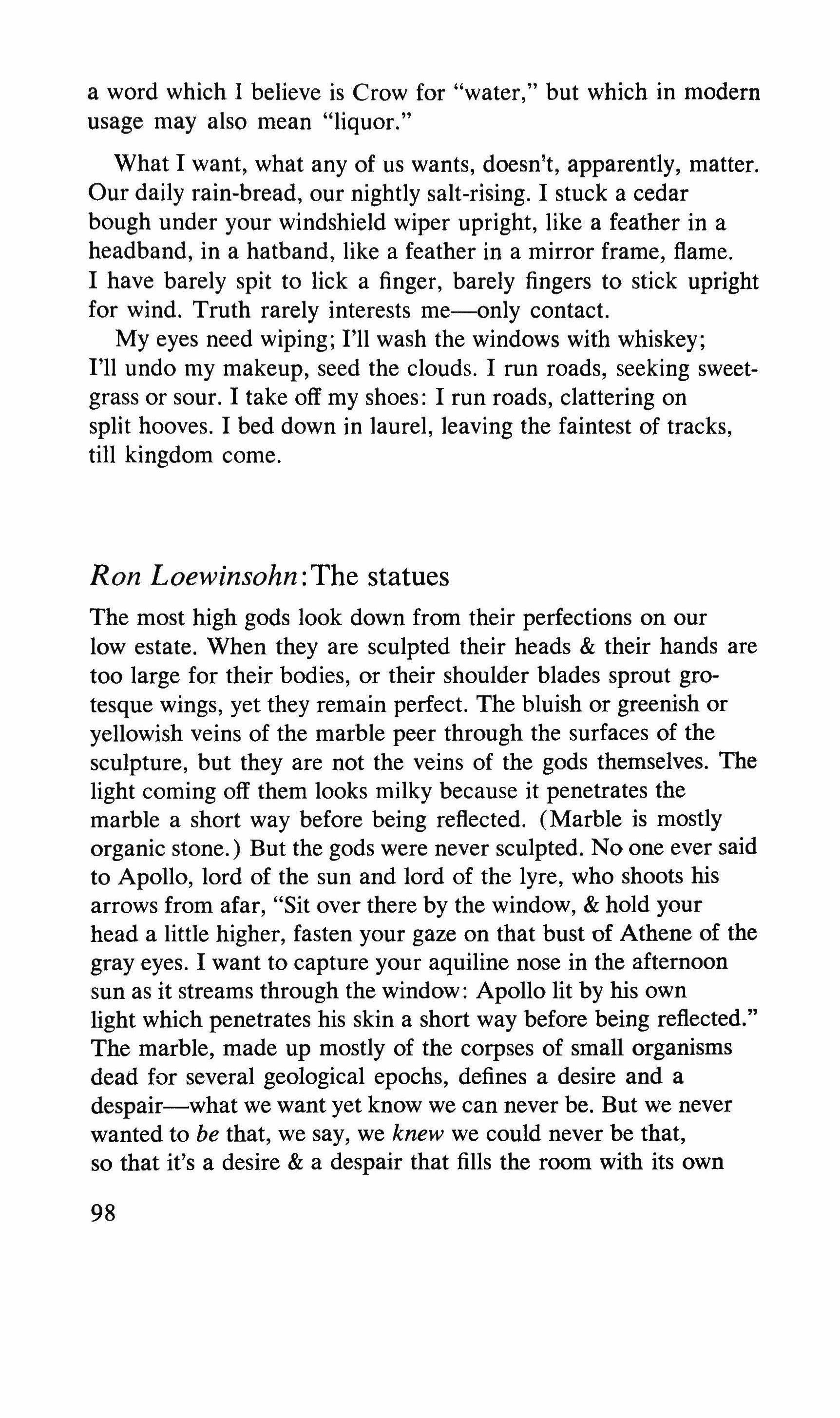
a word which I believe is Crow for "water," but which in modern usage may also mean "liquor."
What I want, what any of us wants, doesn't, apparently, matter. Our daily rain-bread, our nightly salt-rising. I stuck a cedar bough under your windshield wiper upright, like a feather in a headband, in a hatband, like a feather in a mirror frame, flame. I have barely spit to lick a finger, barely fingers to stick upright for wind. Truth rarely interests me-only contact.
My eyes need wiping; I'll wash the windows with whiskey; I'll undo my makeup, seed the clouds. I run roads, seeking sweetgrass or sour. I take off my shoes: I run roads, clattering on split hooves. I bed down in laurel, leaving the faintest of tracks, till kingdom come.
The most high gods look down from their perfections on our low estate. When they are sculpted their heads & their hands are too large for their bodies, or their shoulder blades sprout grotesque wings, yet they remain perfect. The bluish or greenish or yellowish veins of the marble peer through the surfaces of the sculpture, but they are not the veins of the gods themselves. The light coming off them looks milky because it penetrates the marble a short way before being reflected. (Marble is mostly organic stone.) But the gods were never sculpted. No one ever said to Apollo, lord of the sun and lord of the lyre, who shoots his arrows from afar, "Sit over there by the window, & hold your head a little higher, fasten your gaze on that bust of Athene of the gray eyes. I want to capture your aquiline nose in the afternoon sun as it streams through the window: Apollo lit by his own light which penetrates his skin a short way before being reflected." The marble, made up mostly of the corpses of small organisms dead for several geological epochs, defines a desire and a despair-what we want yet know we can never be. But we never wanted to be that, we say, we knew we could never be that, so that it's a desire & a despair that fills the room with its own
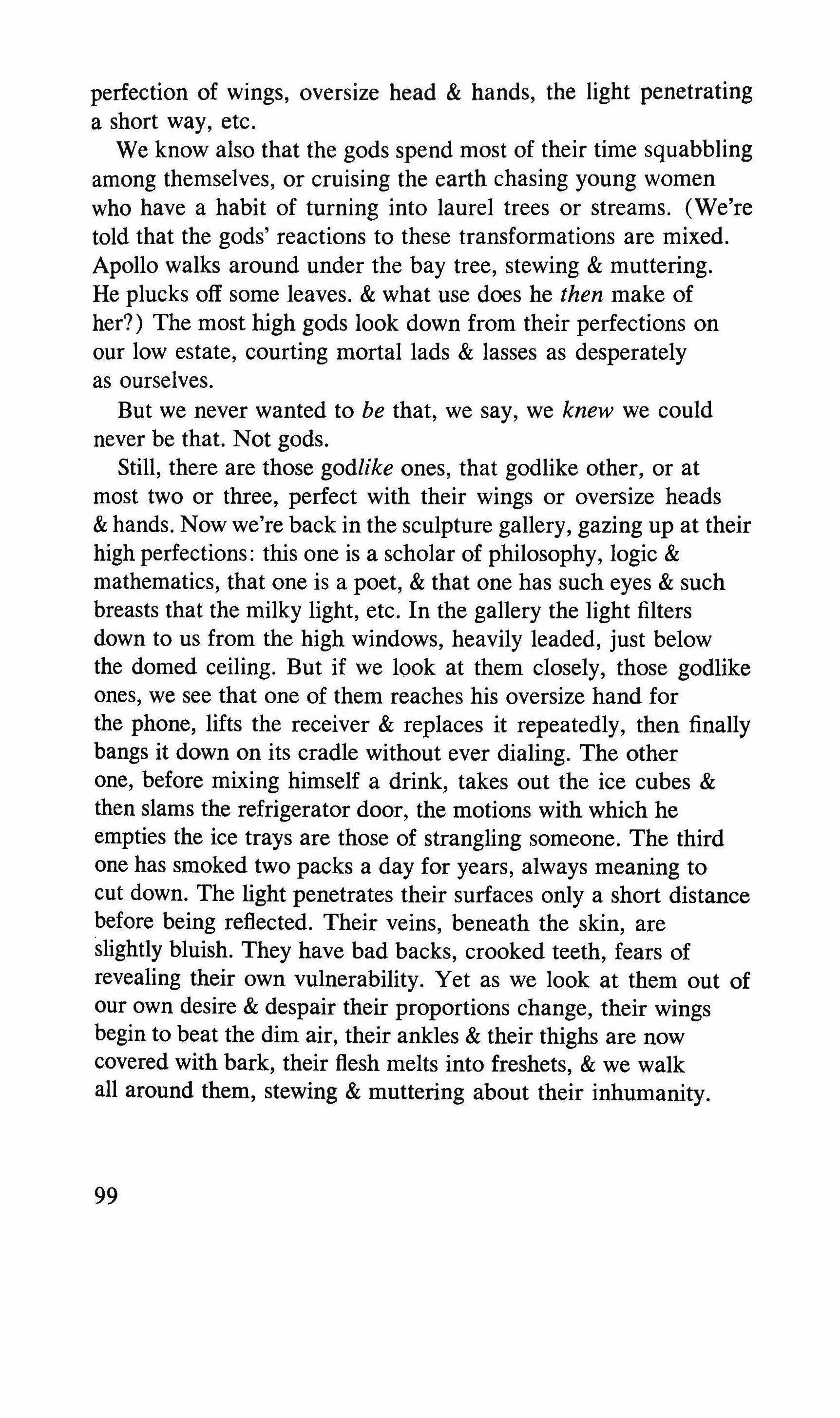
perfection of wings, oversize head & hands, the light penetrating a short way, etc.
We know also that the gods spend most of their time squabbling among themselves, or cruising the earth chasing young women who have a habit of turning into laurel trees or streams. (We're told that the gods' reactions to these transformations are mixed. Apollo walks around under the bay tree, stewing & muttering. He plucks off some leaves. & what use does he then make of her?) The most high gods look down from their perfections on our low estate, courting mortal lads & lasses as desperately as ourselves.
But we never wanted to be that, we say, we knew we could never be that. Not gods.
Still, there are those godlike ones, that godlike other, or at most two or three, perfect with their wings or oversize heads & hands. Now we're back in the sculpture gallery, gazing up at their high perfections: this one is a scholar of philosophy, logic & mathematics, that one is a poet, & that one has such eyes & such breasts that the milky light, etc. In the gallery the light filters down to us from the high windows, heavily leaded, just below the domed ceiling. But if we look at them closely, those godlike ones, we see that one of them reaches his oversize hand for the phone, lifts the receiver & replaces it repeatedly, then finally bangs it down on its cradle without ever dialing. The other one, before mixing himself a drink, takes out the ice cubes & then slams the refrigerator door, the motions with which he empties the ice trays are those of strangling someone. The third one has smoked two packs a day for years, always meaning to cut down. The light penetrates their surfaces only a short distance before being reflected. Their veins, beneath the skin, are slightly bluish. They have bad backs, crooked teeth, fears of revealing their own vulnerability. Yet as we look at them out of our own desire & despair their proportions change, their wings begin to beat the dim air, their ankles & their thighs are now covered with bark, their flesh melts into freshets, & we walk all around them, stewing & muttering about their inhumanity.
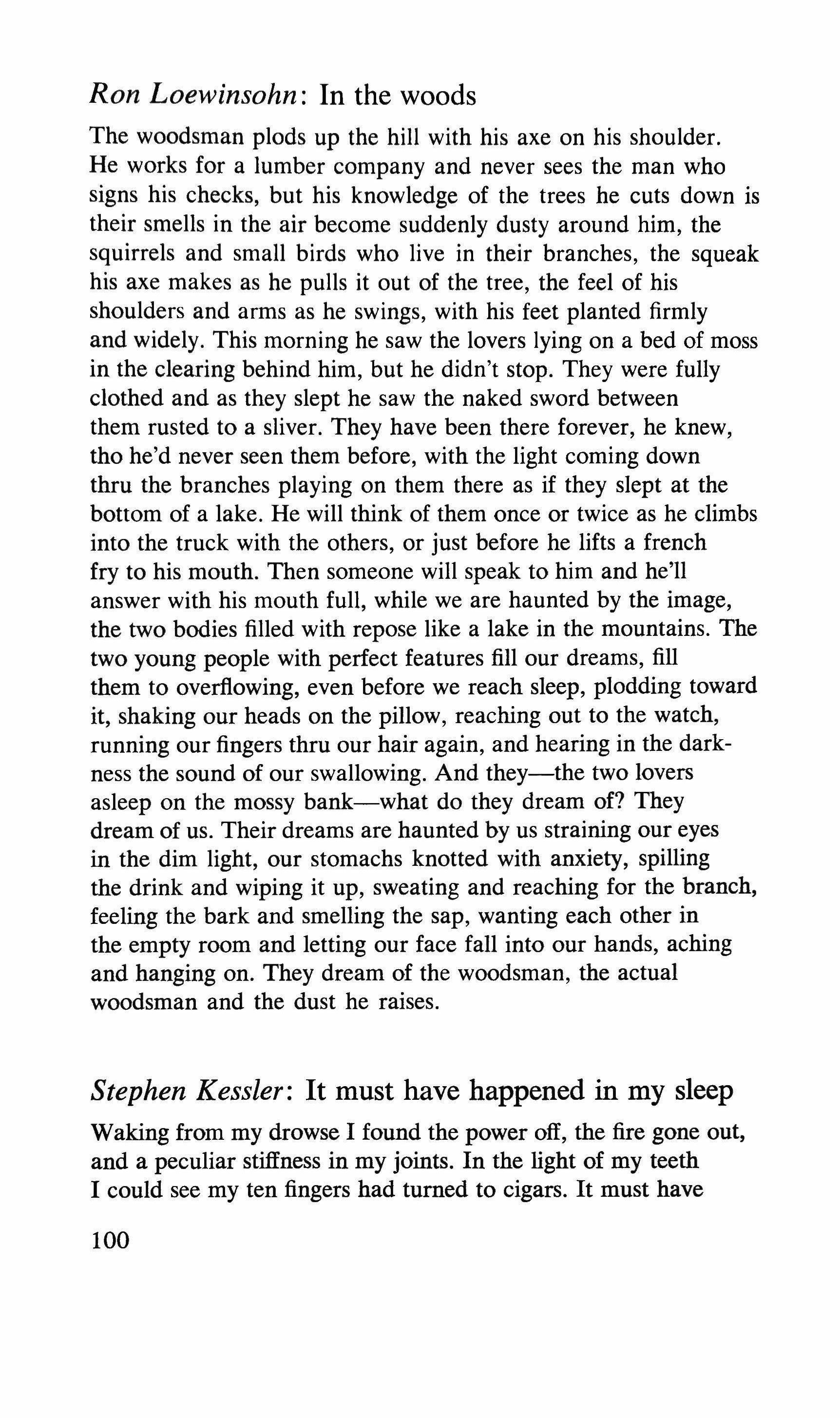
The woodsman plods up the hill with his axe on his shoulder. He works for a lumber company and never sees the man who signs his checks, but his knowledge of the trees he cuts down is their smells in the air become suddenly dusty around him, the squirrels and small birds who live in their branches, the squeak his axe makes as he pulls it out of the tree, the feel of his shoulders and arms as he swings, with his feet planted firmly and widely. This morning he saw the lovers lying on a bed of moss in the clearing behind him, but he didn't stop. They were fully clothed and as they slept he saw the naked sword between them rusted to a sliver. They have been there forever, he knew, tho he'd never seen them before, with the light coming down thru the branches playing on them there as if they slept at the bottom of a lake. He will think of them once or twice as he climbs into the truck with the others, or just before he lifts a french fry to his mouth. Then someone will speak to him and he'll answer with his mouth full, while we are haunted by the image, the two bodies filled with repose like a lake in the mountains. The two young people with perfect features fill our dreams, fill them to overflowing, even before we reach sleep, plodding toward it, shaking our heads on the pillow, reaching out to the watch, running our fingers thru our hair again, and hearing in the darkness the sound of our swallowing. And they-the two lovers asleep on the mossy bank-what do they dream of? They dream of us. Their dreams are haunted by us straining our eyes in the dim light, our stomachs knotted with anxiety, spilling the drink and wiping it up, sweating and reaching for the branch, feeling the bark and smelling the sap, wanting each other in the empty room and letting our face fall into our hands, aching and hanging on. They dream of the woodsman, the actual woodsman and the dust he raises.
Waking from my drowse I found the power off, the fire gone out, and a peculiar stiffness in my joints. In the light of my teeth I could see my ten fingers had turned to cigars. It must have 100
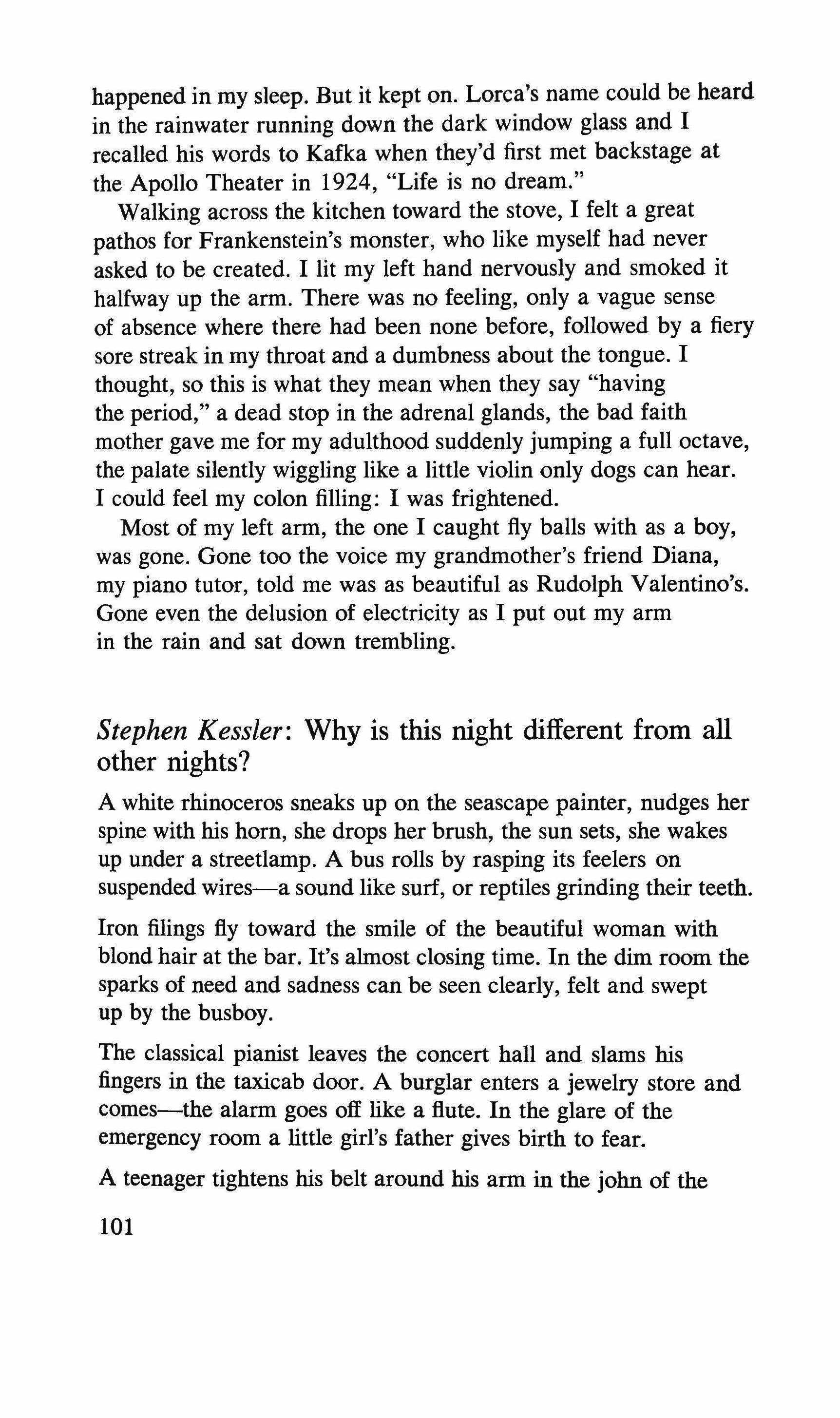
happened in my sleep. But it kept on. Lorca's name could be heard in the rainwater running down the dark window glass and I recalled his words to Kafka when they'd first met backstage at the Apollo Theater in 1924, "Life is no dream."
Walking across the kitchen toward the stove, I felt a great pathos for Frankenstein's monster, who like myself had never asked to be created. I lit my left hand nervously and smoked it halfway up the arm. There was no feeling, only a vague sense of absence where there had been none before, followed by a fiery sore streak in my throat and a dumbness about the tongue. I thought, so this is what they mean when they say "having the period," a dead stop in the adrenal glands, the bad faith mother gave me for my adulthood suddenly jumping a full octave, the palate silently wiggling like a little violin only dogs can hear. I could feel my colon filling: I was frightened. Most of my left arm, the one I caught fly balls with as a boy, was gone. Gone too the voice my grandmother's friend Diana, my piano tutor, told me was as beautiful as Rudolph Valentino's. Gone even the delusion of electricity as I put out my arm in the rain and sat down trembling.
Stephen Kessler: Why is this night different from all other nights?
A white rhinoceros sneaks up on the seascape painter, nudges her spine with his horn, she drops her brush, the sun sets, she wakes up under a streetlamp. A bus rolls by rasping its feelers on suspended wires-a sound like surf, or reptiles grinding their teeth.
Iron filings fly toward the smile of the beautiful woman with blond hair at the bar. It's almost closing time. In the dim room the sparks of need and sadness can be seen clearly, felt and swept up by the busboy.
The classical pianist leaves the concert hall and slams his fingers in the taxicab door. A burglar enters a jewelry store and comes-the alarm goes off like a flute. In the glare of the emergency room a little girl's father gives birth to fear.
A teenager tightens his belt around his arm in the john of the 101
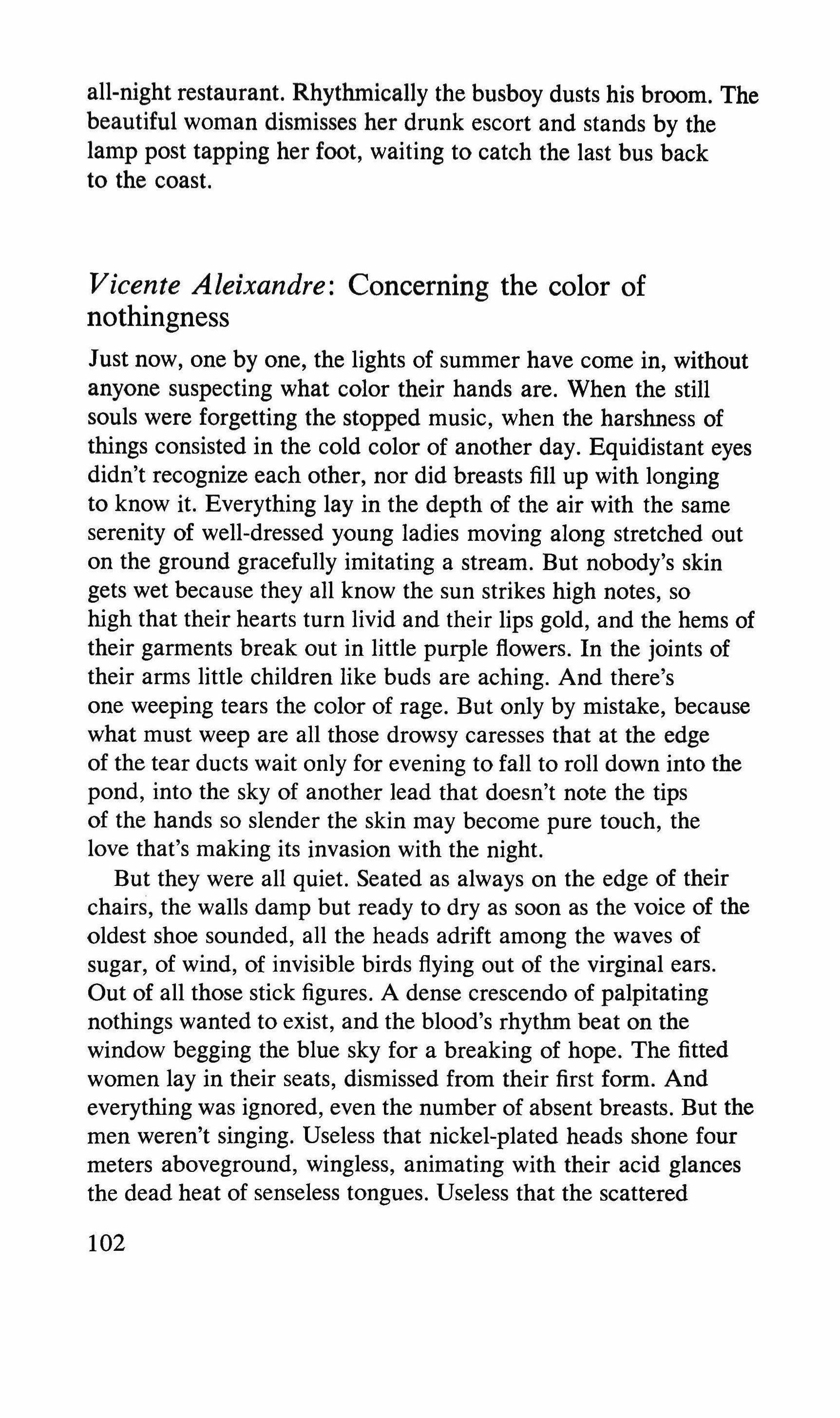
all-night restaurant. Rhythmically the busboy dusts his broom. The beautiful woman dismisses her drunk escort and stands by the lamp post tapping her foot, waiting to catch the last bus back to the coast.
Just now, one by one, the lights of summer have come in, without anyone suspecting what color their hands are. When the still souls were forgetting the stopped music, when the harshness of things consisted in the cold color of another day. Equidistant eyes didn't recognize each other, nor did breasts fill up with longing to know it. Everything lay in the depth of the air with the same serenity of well-dressed young ladies moving along stretched out on the ground gracefully imitating a stream. But nobody's skin gets wet because they all know the sun strikes high notes, so high that their hearts turn livid and their lips gold, and the hems of their garments break out in little purple flowers. In the joints of their arms little children like buds are aching. And there's one weeping tears the color of rage. But only by mistake, because what must weep are all those drowsy caresses that at the edge of the tear ducts wait only for evening to fall to roll down into the pond, into the sky of another lead that doesn't note the tips of the hands so slender the skin may become pure touch, the love that's making its invasion with the night.
But they were all quiet. Seated as always on the edge of their chairs, the walls damp but ready to dryas soon as the voice of the oldest shoe sounded, all the heads adrift among the waves of sugar, of wind, of invisible birds flying out of the virginal ears. Out of all those stick figures. A dense crescendo of palpitating nothings wanted to exist, and the blood's rhythm beat on the window begging the blue sky for a breaking of hope. The fitted women lay in their seats, dismissed from their first form. And everything was ignored, even the number of absent breasts. But the men weren't singing. Useless that nickel-plated heads shone four meters aboveground, wingless, animating with their acid glances the dead heat of senseless tongues. Useless that the scattered
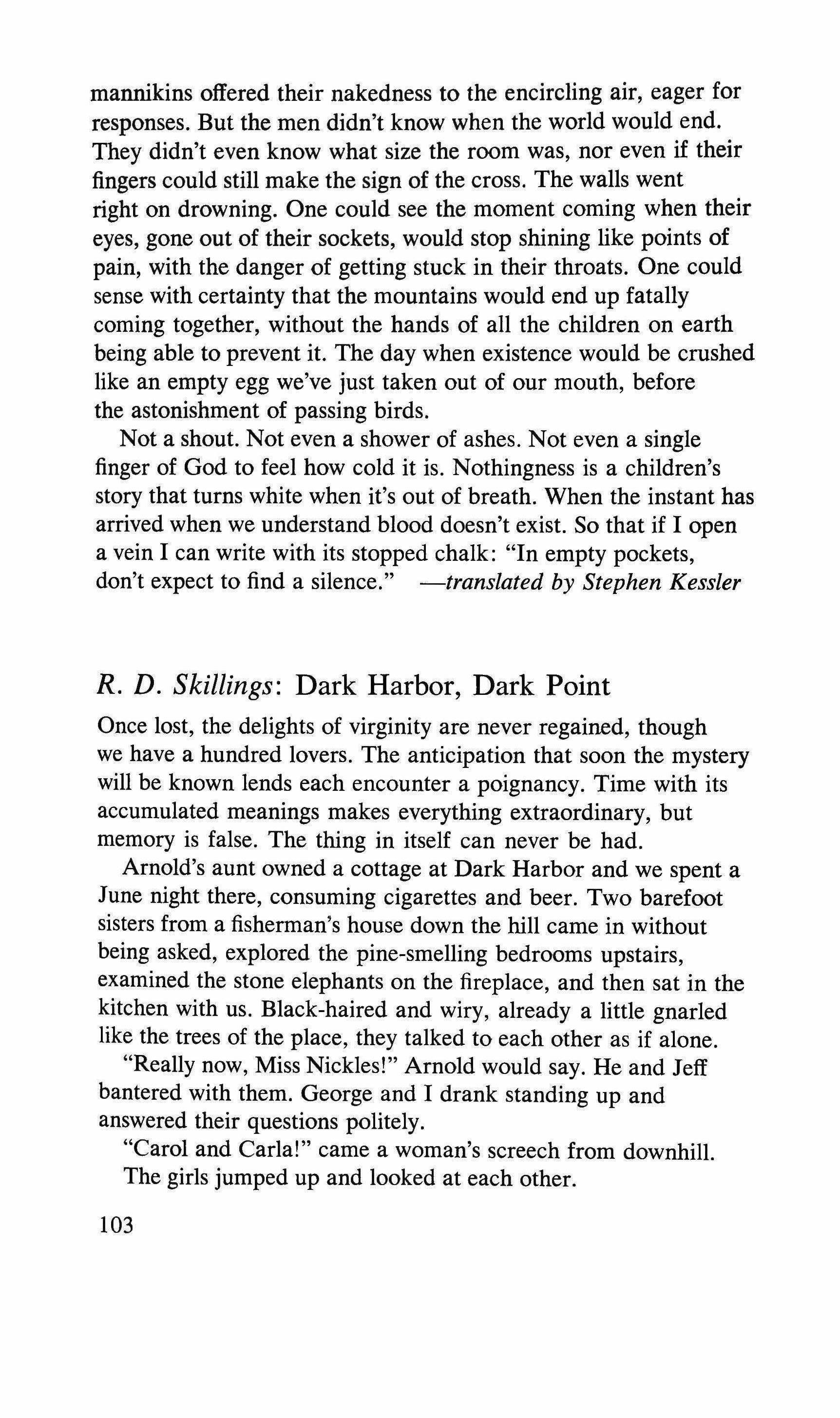
mannikins offered their nakedness to the encircling air, eager for responses. But the men didn't know when the world would end. They didn't even know what size the room was, nor even if their fingers could still make the sign of the cross. The walls went right on drowning. One could see the moment coming when their eyes, gone out of their sockets, would stop shining like points of pain, with the danger of getting stuck in their throats. One could sense with certainty that the mountains would end up fatally coming together, without the hands of all the children on earth being able to prevent it. The day when existence would be crushed like an empty egg we've just taken out of our mouth, before the astonishment of passing birds.
Not a shout. Not even a shower of ashes. Not even a single finger of God to feel how cold it is. Nothingness is a children's story that turns white when it's out of breath. When the instant has arrived when we understand blood doesn't exist. So that if I open a vein I can write with its stopped chalk: "In empty pockets, don't expect to find a silence." -translated by Stephen Kessler
Once lost, the delights of virginity are never regained, though we have a hundred lovers. The anticipation that soon the mystery will be known lends each encounter a poignancy. Time with its accumulated meanings makes everything extraordinary, but memory is false. The thing in itself can never be had.
Arnold's aunt owned a cottage at Dark Harbor and we spent a June night there, consuming cigarettes and beer. Two barefoot sisters from a fisherman's house down the hill came in without being asked, explored the pine-smelling bedrooms upstairs, examined the stone elephants on the fireplace, and then sat in the kitchen with us. Black-haired and wiry, already a little gnarled like the trees of the place, they talked to each other as if alone.
"Really now, Miss Nickles!" Arnold would say. He and Jeff bantered with them. George and I drank standing up and answered their questions politely.
"Carol and Carla!" came a woman's screech from downhill. The girls jumped up and looked at each other.
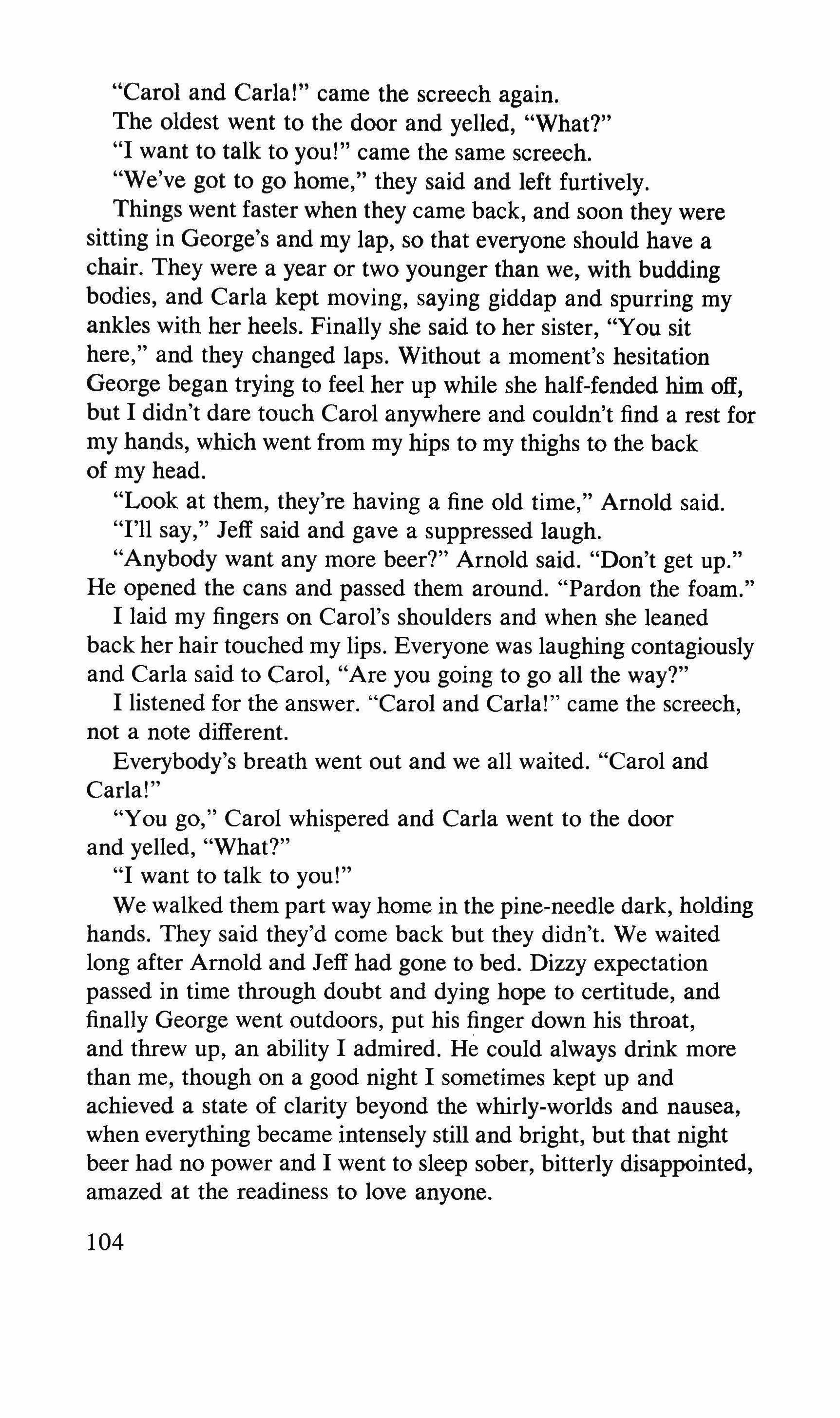
"Carol and Carla!" came the screech again.
The oldest went to the door and yelled, "What?"
"I want to talk to you!" came the same screech.
"We've got to go home," they said and left furtively. Things went faster when they came back, and soon they were sitting in George's and my lap, so that everyone should have a chair. They were a year or two younger than we, with budding bodies, and Carla kept moving, saying giddap and spurring my ankles with her heels. Finally she said to her sister, "You sit here," and they changed laps. Without a moment's hesitation George began trying to feel her up while she half-fended him off, but I didn't dare touch Carol anywhere and couldn't find a rest for my hands, which went from my hips to my thighs to the back of my head.
"Look at them, they're having a fine old time," Arnold said.
"I'll say," Jeff said and gave a suppressed laugh.
"Anybody want any more beer?" Arnold said. "Don't get up." He opened the cans and passed them around. "Pardon the foam."
I laid my fingers on Carol's shoulders and when she leaned back her hair touched my lips. Everyone was laughing contagiously and Carla said to Carol, "Are you going to go all the way?"
I listened for the answer. "Carol and Carla!" came the screech, not a note different.
Everybody's breath went out and we all waited. "Carol and Carla!"
"You go," Carol whispered and Carla went to the door and yelled, "What?"
"I want to talk to you!"
We walked them part way home in the pine-needle dark, holding hands. They said they'd come back but they didn't. We waited long after Arnold and Jeff had gone to bed. Dizzy expectation passed in time through doubt and dying hope to certitude, and finally George went outdoors, put his finger down his throat, and threw up, an ability 1 admired. He could always drink more than me, though on a good night 1 sometimes kept up and achieved a state of clarity beyond the whirly-worlds and nausea, when everything became intensely still and bright, but that night beer had no power and I went to sleep sober, bitterly disappointed, amazed at the readiness to love anyone.
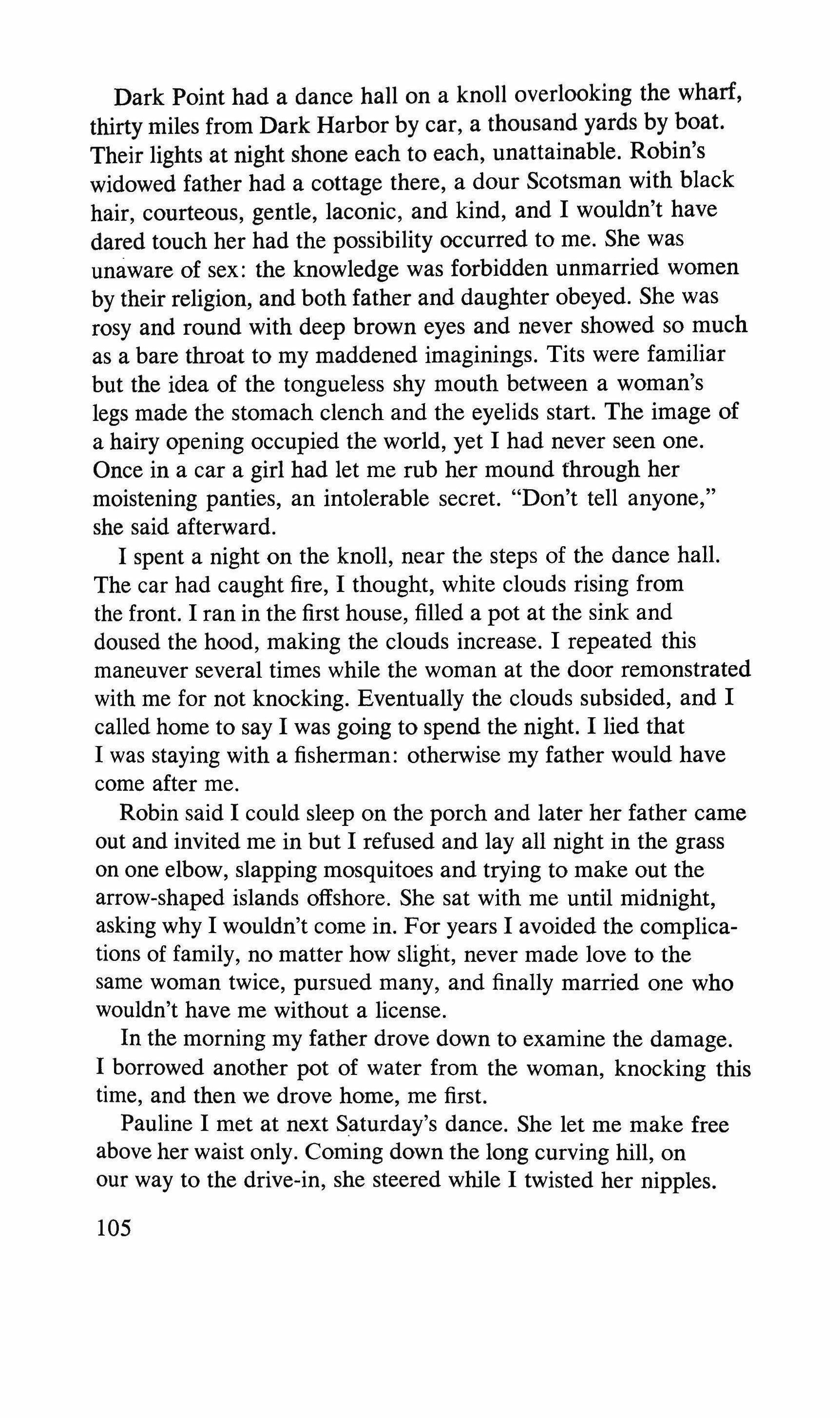
Dark Point had a dance hall on a knoll overlooking the wharf, thirty miles from Dark Harbor by car, a thousand yards by boat. Their lights at night shone each to each, unattainable. Robin's widowed father had a cottage there, a dour Scotsman with black hair, courteous, gentle, laconic, and kind, and I wouldn't have dared touch her had the possibility occurred to me. She was unaware of sex: the knowledge was forbidden unmarried women by their religion, and both father and daughter obeyed. She was rosy and round with deep brown eyes and never showed so much as a bare throat to my maddened imaginings. Tits were familiar but the idea of the tongueless shy mouth between a woman's legs made the stomach clench and the eyelids start. The image of a hairy opening occupied the world, yet I had never seen one. Once in a car a girl had let me rub her mound through her moistening panties, an intolerable secret. "Don't tell anyone," she said afterward.
I spent a night on the knoll, near the steps of the dance hall. The car had caught fire, I thought, white clouds rising from the front. I ran in the first house, filled a pot at the sink and doused the hood, making the clouds increase. I repeated this maneuver several times while the woman at the door remonstrated with me for not knocking. Eventually the clouds subsided, and I called home to say I was going to spend the night. I lied that I was staying with a fisherman: otherwise my father would have come after me.
Robin said I could sleep on the porch and later her father came out and invited me in but I refused and lay all night in the grass on one elbow, slapping mosquitoes and trying to make out the arrow-shaped islands offshore. She sat with me until midnight, asking why I wouldn't come in. For years I avoided the complications of family, no matter how slight, never made love to the same woman twice, pursued many, and finally married one who wouldn't have me without a license.
In the morning my father drove down to examine the damage. I borrowed another pot of water from the woman, knocking this time, and then we drove home, me first.
Pauline I met at next Saturday's dance. She let me make free above her waist only. Coming down the long curving hill, on our way to the drive-in, she steered while I twisted her nipples.
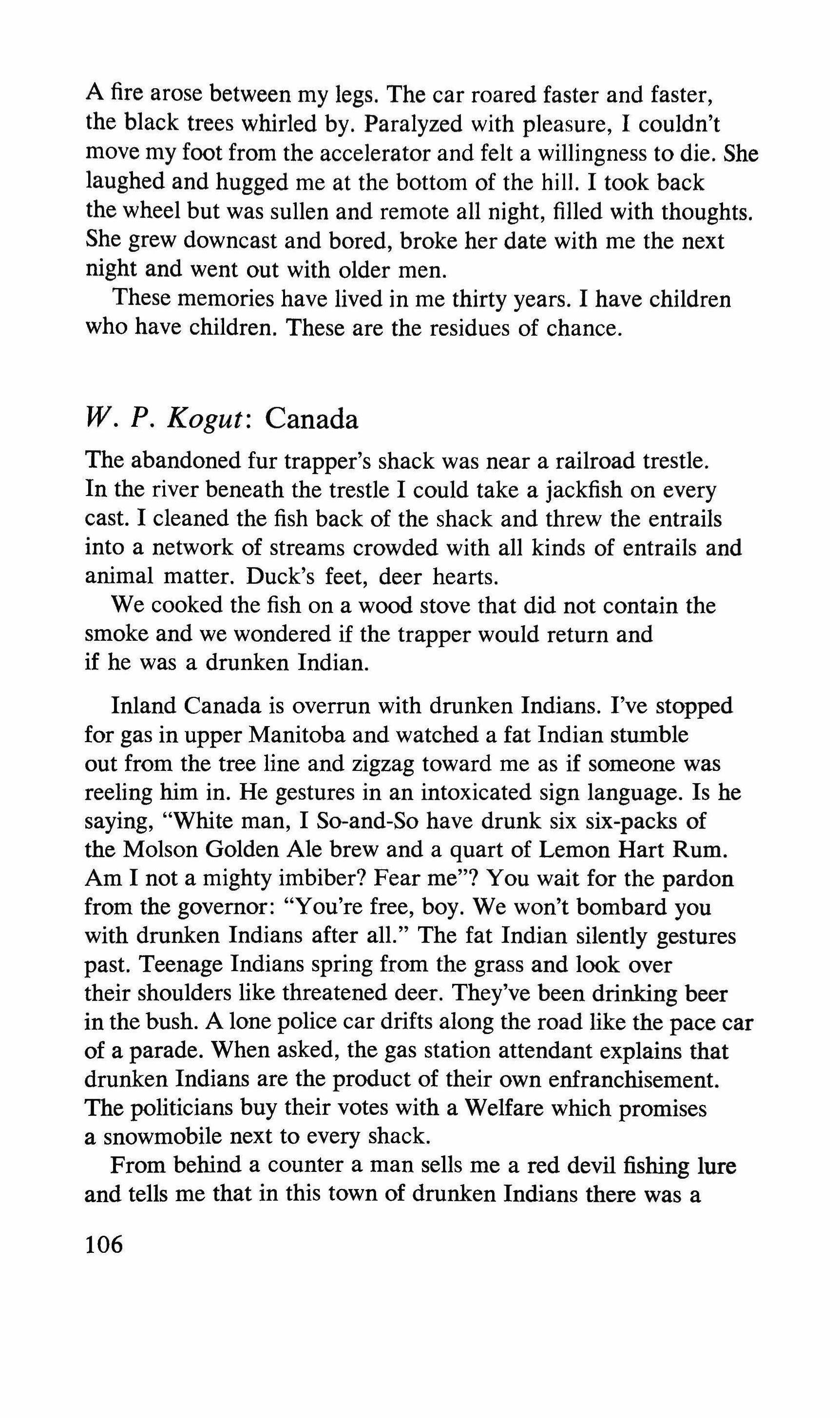
A fire arose between my legs. The car roared faster and faster, the black trees whirled by. Paralyzed with pleasure, I couldn't move my foot from the accelerator and felt a willingness to die. She laughed and hugged me at the bottom of the hill. I took back the wheel but was sullen and remote all night, filled with thoughts. She grew downcast and bored, broke her date with me the next night and went out with older men.
These memories have lived in me thirty years. I have children who have children. These are the residues of chance.
The abandoned fur trapper's shack was near a railroad trestle. In the river beneath the trestle I could take a jackfish on every cast. I cleaned the fish back of the shack and threw the entrails into a network of streams crowded with all kinds of entrails and animal matter. Duck's feet, deer hearts.
We cooked the fish on a wood stove that did not contain the smoke and we wondered if the trapper would return and if he was a drunken Indian.
Inland Canada is overrun with drunken Indians. I've stopped for gas in upper Manitoba and watched a fat Indian stumble out from the tree line and zigzag toward me as if someone was reeling him in. He gestures in an intoxicated sign language. Is he saying, "White man, I So-and-So have drunk six six-packs of the Molson Golden Ale brew and a quart of Lemon Hart Rum. Am I not a mighty imbiber? Fear me"? You wait for the pardon from the governor: "You're free, boy. We won't bombard you with drunken Indians after all." The fat Indian silently gestures past. Teenage Indians spring from the grass and look over their shoulders like threatened deer. They've been drinking beer in the bush. A lone police car drifts along the road like the pace car of a parade. When asked, the gas station attendant explains that drunken Indians are the product of their own enfranchisement. The politicians buy their votes with a Welfare which promises a snowmobile next to every shack.
From behind a counter a man sells me a red devil fishing lure and tells me that in this town of drunken Indians there was a
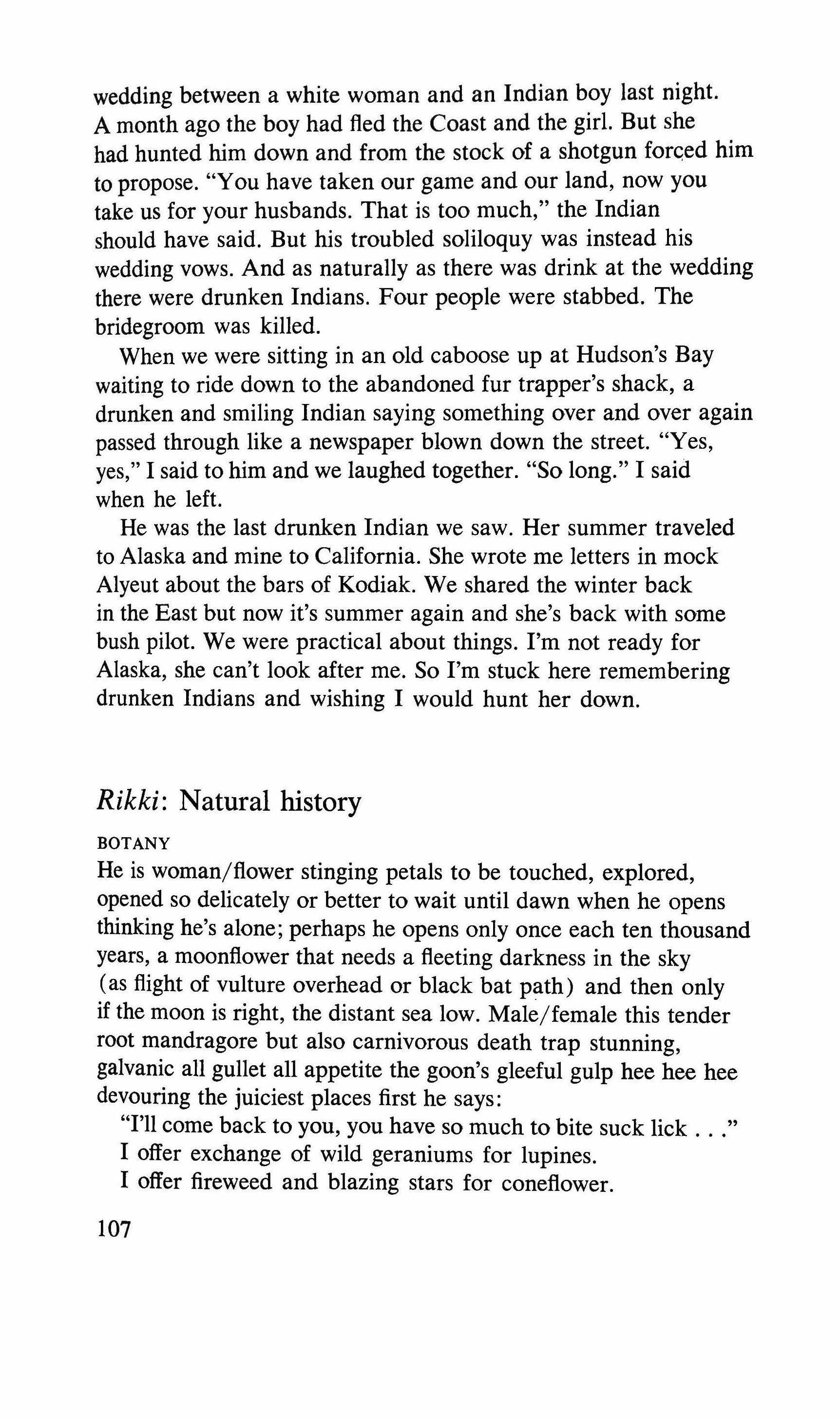
wedding between a white woman and an Indian boy last night. A month ago the boy had fled the Coast and the girl. But she had hunted him down and from the stock of a shotgun forced him to propose. "You have taken our game and our land, now you take us for your husbands. That is too much," the Indian should have said. But his troubled soliloquy was instead his wedding vows. And as naturally as there was drink at the wedding there were drunken Indians. Four people were stabbed. The bridegroom was killed.
When we were sitting in an old caboose up at Hudson's Bay waiting to ride down to the abandoned fur trapper's shack, a drunken and smiling Indian saying something over and over again passed through like a newspaper blown down the street. "Yes, yes," I said to him and we laughed together. "So long." I said when he left.
He was the last drunken Indian we saw. Her summer traveled to Alaska and mine to California. She wrote me letters in mock Alyeut about the bars of Kodiak. We shared the winter back in the East but now it's summer again and she's back with some bush pilot. We were practical about things. I'm not ready for Alaska, she can't look after me. So I'm stuck here remembering drunken Indians and wishing I would hunt her down.
BOTANY
He is woman/flower stinging petals to be touched, explored, opened so delicately or better to wait until dawn when he opens thinking he's alone; perhaps he opens only once each ten thousand years, a moonflower that needs a fleeting darkness in the sky (as flight of vulture overhead or black bat path) and then only if the moon is right, the distant sea low. Male/female this tender root mandragore but also carnivorous death trap stunning, galvanic all gullet all appetite the goon's gleeful gulp hee hee hee devouring the juiciest places first he says: "I'll come back to you, you have so much to bite suck lick I offer exchange of wild geraniums for lupines. I offer fireweed and blazing stars for coneflower.
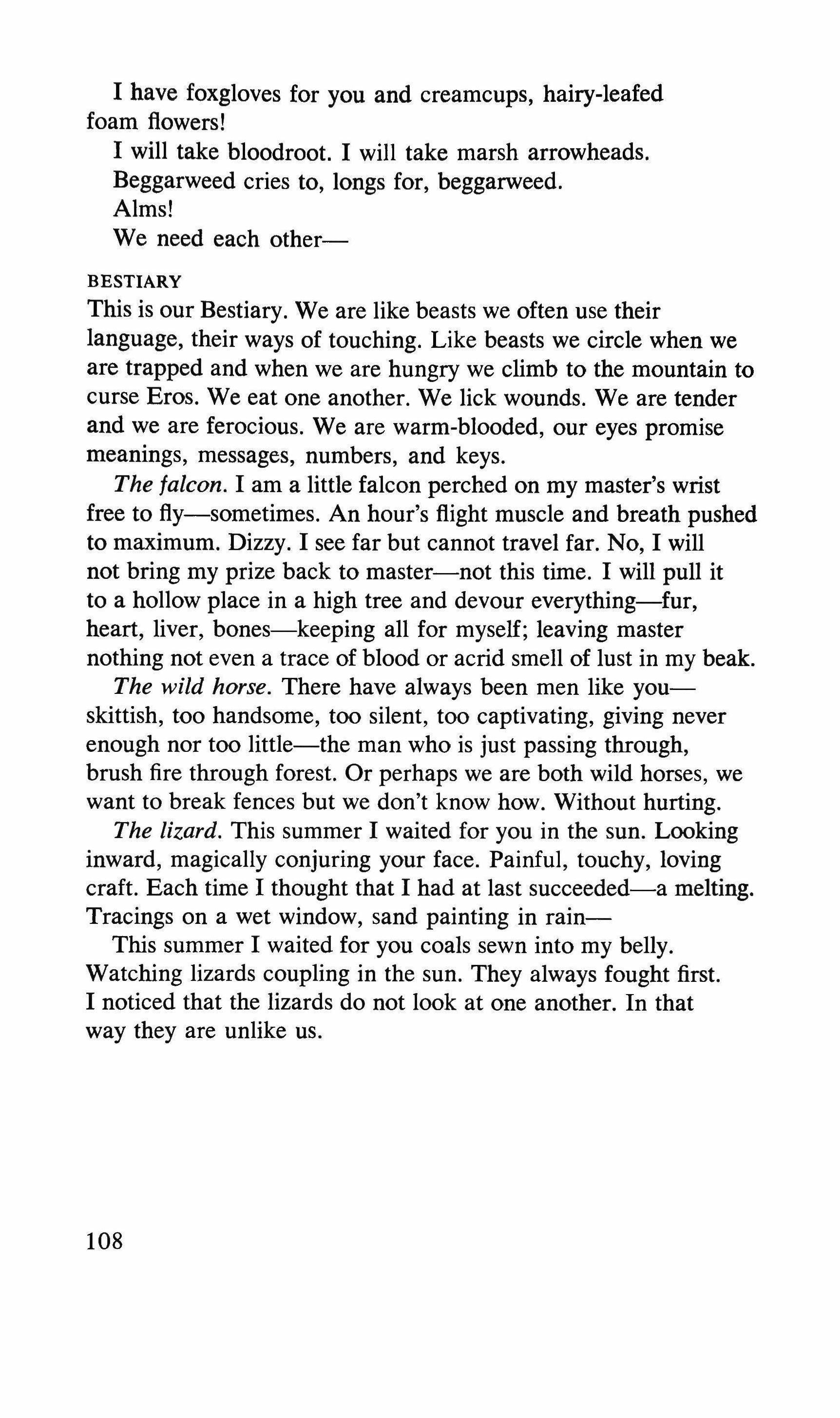
I have foxgloves for you and creamcups, hairy-leafed foam flowers!
I will take bloodroot. I will take marsh arrowheads. Beggarweed cries to, longs for, beggarweed. Alms!
We need each other-
This is our Bestiary. We are like beasts we often use their language, their ways of touching. Like beasts we circle when we are trapped and when we are hungry we climb to the mountain to curse Eros. We eat one another. We lick wounds. We are tender and we are ferocious. We are warm-blooded, our eyes promise meanings, messages, numbers, and keys.
The falcon. I am a little falcon perched on my master's wrist free to fly-sometimes. An hour's flight muscle and breath pushed to maximum. Dizzy. I see far but cannot travel far. No, I will not bring my prize back to master-not this time. I will pull it to a hollow place in a high tree and devour everything-fur, heart, liver, bones-keeping all for myself; leaving master nothing not even a trace of blood or acrid smell of lust in my beak.
The wild horse. There have always been men like youskittish, too handsome, too silent, too captivating, giving never enough nor too little-the man who is just passing through, brush fire through forest. Or perhaps we are both wild horses, we want to break fences but we don't know how. Without hurting.
The lizard. This summer I waited for you in the sun. Looking inward, magically conjuring your face. Painful, touchy, loving craft. Each time I thought that I had at last succeeded-a melting. Tracings on a wet window, sand painting in rain-
This summer I waited for you coals sewn into my belly. Watching lizards coupling in the sun. They always fought first. I noticed that the lizards do not look at one another. In that way they are unlike us.
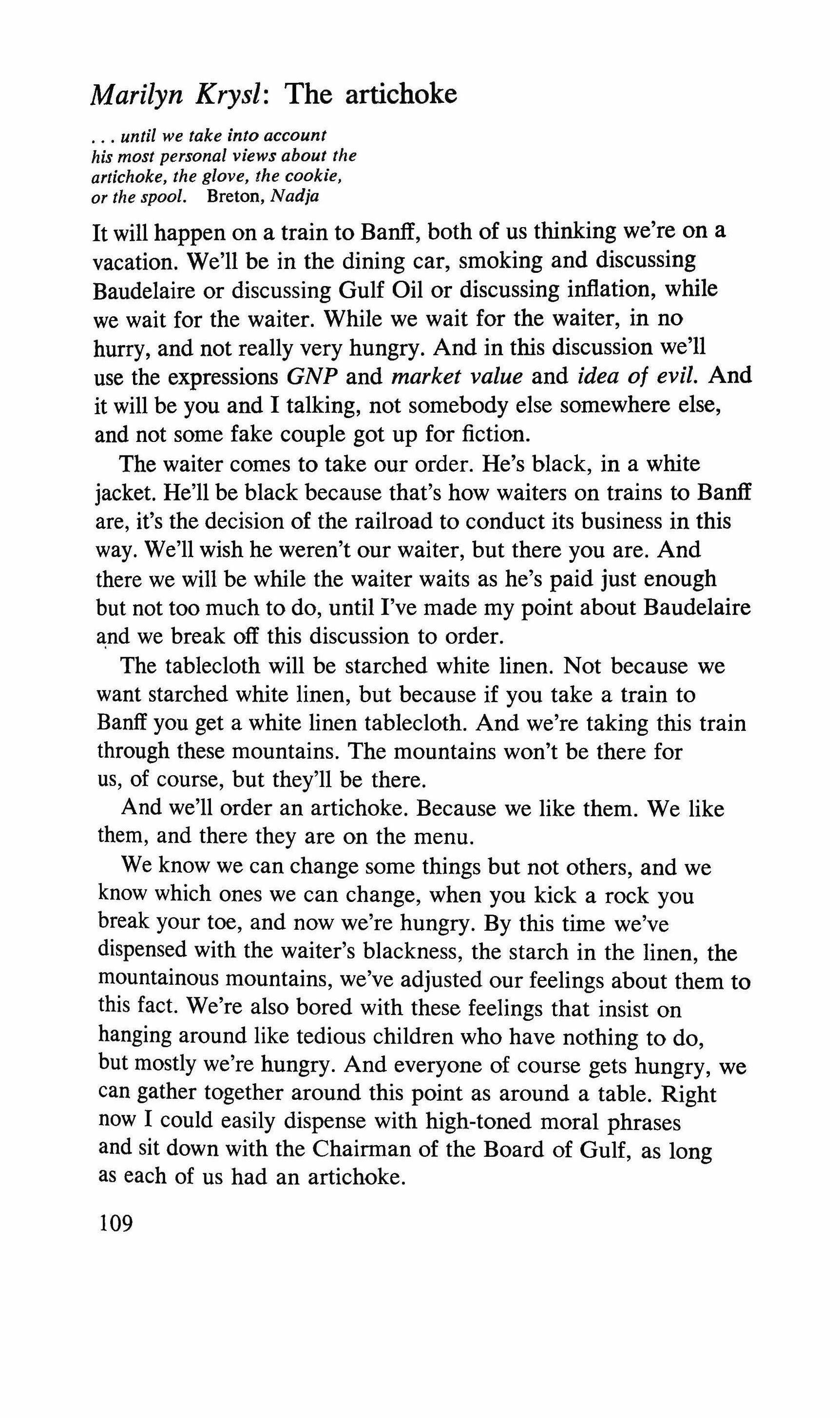
until we take into account his most personal views about the artichoke, the glove, the cookie, or the spool. Breton, Nadja
It will happen on a train to Banff, both of us thinking we're on a vacation. We'll be in the dining car, smoking and discussing Baudelaire or discussing Gulf Oil or discussing inflation, while we wait for the waiter. While we wait for the waiter, in no hurry, and not really very hungry. And in this discussion we'll use the expressions GNP and market value and idea of evil. And it will be you and I talking, not somebody else somewhere else, and not some fake couple got up for fiction.
The waiter comes to take our order. He's black, in a white jacket. He'll be black because that's how waiters on trains to Banff are, it's the decision of the railroad to conduct its business in this way. We'll wish he weren't our waiter, but there you are. And there we will be while the waiter waits as he's paid just enough but not too much to do, until I've made my point about Baudelaire and we break off this discussion to order.
The tablecloth will be starched white linen. Not because we want starched white linen, but because if you take a train to Banff you get a white linen tablecloth. And we're taking this train through these mountains. The mountains won't be there for us, of course, but they'll be there.
And we'll order an artichoke. Because we like them. We like them, and there they are on the menu.
We know we can change some things but not others, and we know which ones we can change, when you kick a rock you break your toe, and now we're hungry. By this time we've dispensed with the waiter's blackness, the starch in the linen, the mountainous mountains, we've adjusted our feelings about them to this fact. We're also bored with these feelings that insist on hanging around like tedious children who have nothing to do, but mostly we're hungry. And everyone of course gets hungry, we can gather together around this point as around a table. Right now I could easily dispense with high-toned moral phrases and sit down with the Chairman of the Board of Gulf, as long as each of us had an artichoke.

Here comes the waiter with a white platter. I see the artichoke's rows of spiked leaves, leaves shaped like feathers, and closer now rounded to a point like feathers, much closer, and are those feathers coming closer those are really feathers-and now my hunger backs all the way up from my belly into my mouth, a heart that wants to fly out and away-it's feathers, it's a feathered headdress, it's a head-and the waiter sets before me the purple head of Quetzalcoatl on a tray.
I want to say No, you've mixed up my order with someone else's, I'm not the one who asked for this, take it away. But Madame, he says, you ordered it. And I want to say "Don't call me Madame!" But there is Quetzalcoatl's head on my tray. What we ordered isn't what we want, you'd think any fool could see that. We've always assumed our gentle intentions excuse our imperial way of life. But we still haven't got used to a waiter bringing Quetzalcoatl's head on a platter, whose head we'd forgotten we were supposed to ask for, having gone on this vacation through mountains forested rugged amazing though no longer virgin, leaving the kids in school studying how to manage the Corporation, whose managers we'd comfortably managed to forget we are.
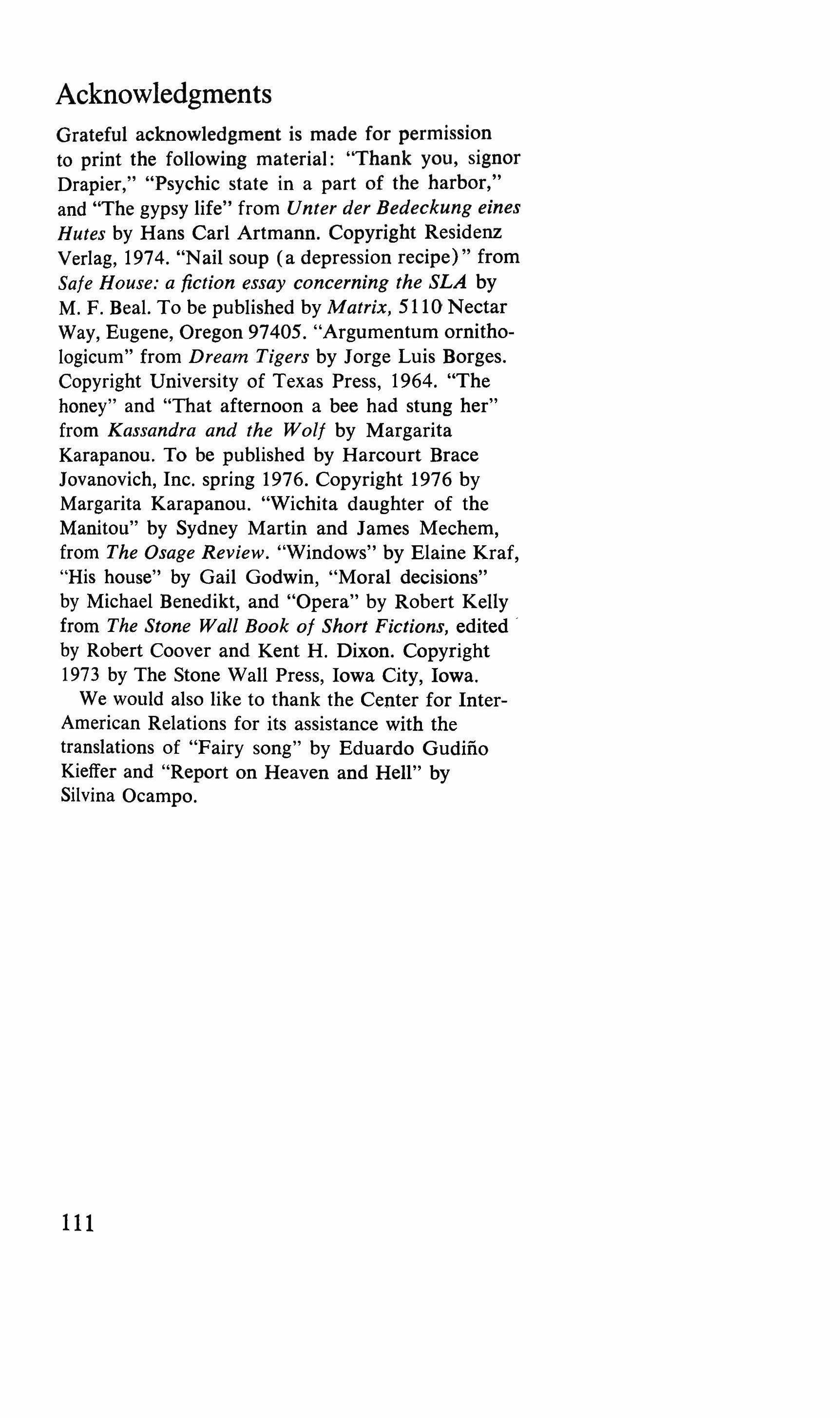
Grateful acknowledgment is made for permission to print the following material: "Thank you, signor Drapier," "Psychic state in a part of the harbor," and "The gypsy life" from Unter der Bedeckung eines Hutes by Hans Carl Artmann. Copyright Residenz Verlag, 1974. "Nail soup (a depression recipe)" from Safe House: a fiction essay concerning the SLA by M. F. Beal. To be published by Matrix, 5110 Nectar Way, Eugene, Oregon 97405. "Argumentum ornithologicum" from Dream Tigers by Jorge Luis Borges. Copyright University of Texas Press, 1964. "The honey" and "That afternoon a bee had stung her" from Kassandra and the Wolf by Margarita Karapanou. To be published by Harcourt Brace Jovanovich, Inc. spring 1976. Copyright 1976 by Margarita Karapanou. "Wichita daughter of the Manitou" by Sydney Martin and James Mechem, from The Osage Review. "Windows" by Elaine Kraf, "His house" by Gail Godwin, "Moral decisions" by Michael Benedikt, and "Opera" by Robert Kelly from The Stone Wall Book of Short Fictions, edited· by Robert Coover and Kent H. Dixon. Copyright 1973 by The Stone Wall Press, Iowa City, Iowa. We would also like to thank the Center for InterAmerican Relations for its assistance with the translations of "Fairy song" by Eduardo Gudifio Kieffer and "Report on Heaven and Hell" by Silvina Ocampo.
TriQuarterly is pleased to announce the first in a series of limited edition posters signed and numbered by contemporary artists. Number 1 in the series is by William Biderbost whose collage/illustrations are featured in TriQuarterly 33. The Poster was silk screened under the supervision of the artist in five colors on Strathmore in an edition of 275.
To order send check or money order to TriQuarterly 101 University Hall Northwestern University Evanston, Illinois 60201 As this is a limited edition orders will be honored in order of receipt.
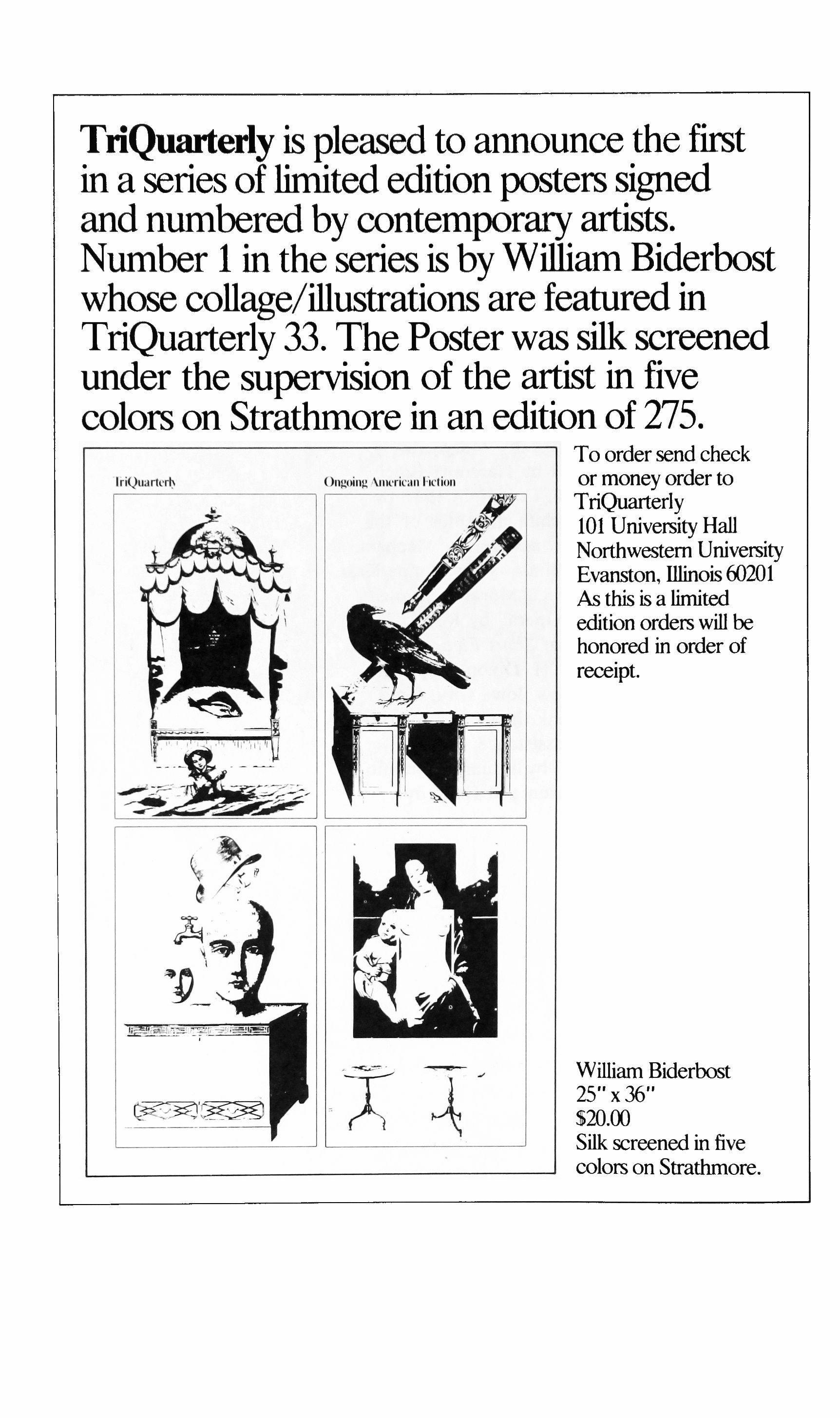
William Biderbost 25" X
$20.00 Silk screened in five colors on Strathmore.

Minute stories by W. S. Merwin • John Hawkes
Margarita Karapanou • Steve Katz • Terry Stokes
Istvan Orkeny Ursule Molinaro • Frederic Tuten
J. G. Ballard Max Apple John Batki • Francis
Ponge • Steve Schutzman Ira Sadoff • Eugene
Wildman • Leonard Michaels Sotere Torregian
Gail Godwin • Ian MacMillan Eugene K. Garber ";
David Ohle • Robert Onopa Ronald Sukenick
Alain Robbe-Grillet • Ben Birnbaum Angela
Carter Randall Reid • Robert Creeley John
Lahr Russell Edson • Silvina Ocampo • Susan
Fromberg Schaeffer • Bob Perleman Charles
Newman • Jack Matthews • Sydney Martin • James
Mechem • Ian McEwan Paul West Leandro
Urbina • Norman Lavers Michael Brownstein
Michael Benedikt • Hans Carl Artmann • Jorge
Luis Borges • Michael Anania Charles Aukema
Julio Cortazar • Jonathan Baumbach • Carol Berge
Robert Coover • Andrei Codrescu Kenneth
Bernard T. Coraghessan Boyle • George
Chambers • Andrew Delbanco • Kent H. Dixon
Richard Brautigan Bill Henkin • Robert Kelly
Eduardo Gudifio Kieffer • Elaine Kraf Oakley
Hall • M. F. Beal • Annie Dillard • Ron Loewinsohn I �
Stephen Kessler • Vicente Aleixandre • R. D.
Skillings • W. P. Kogut • Rikki Marilyn Krysl
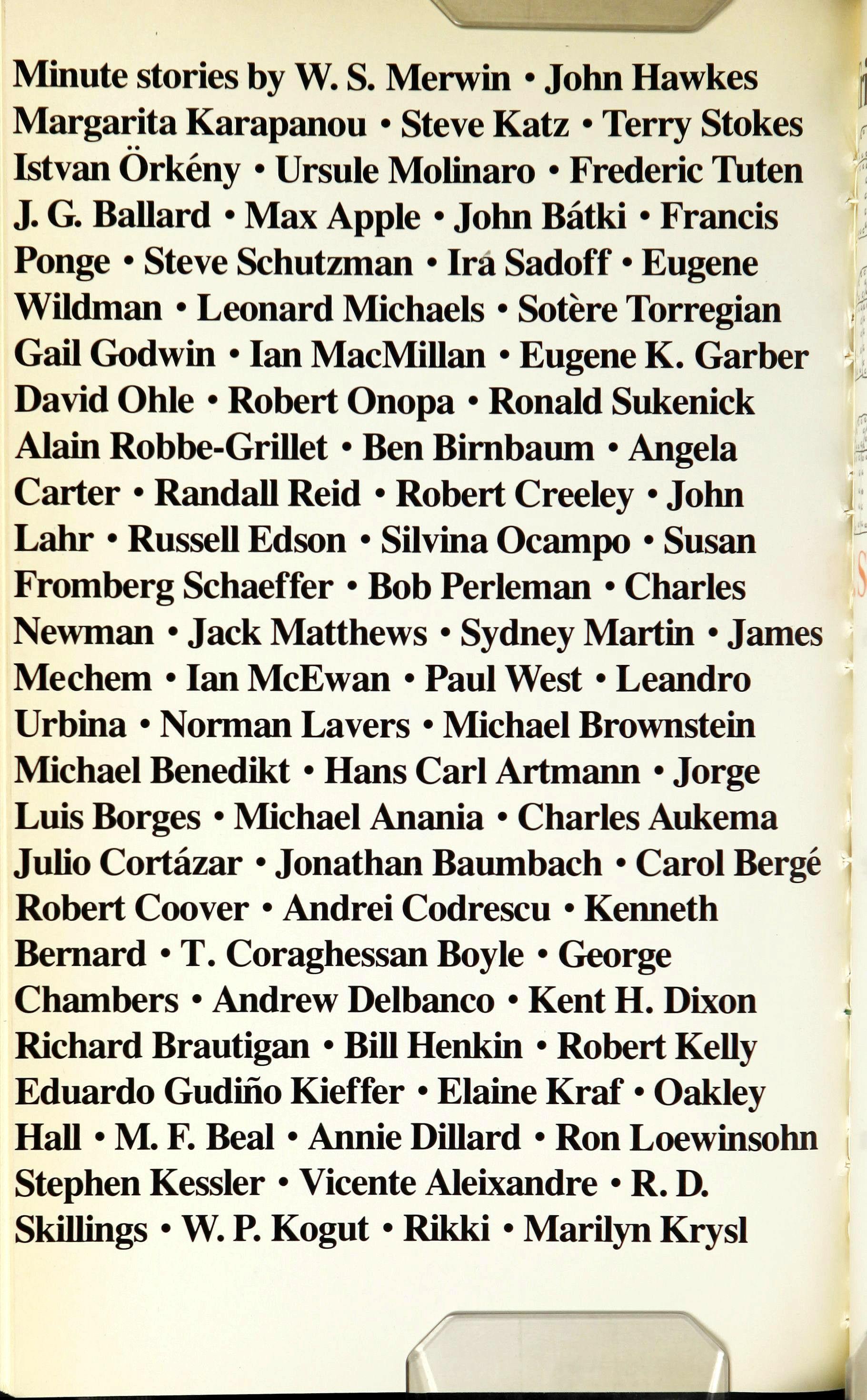
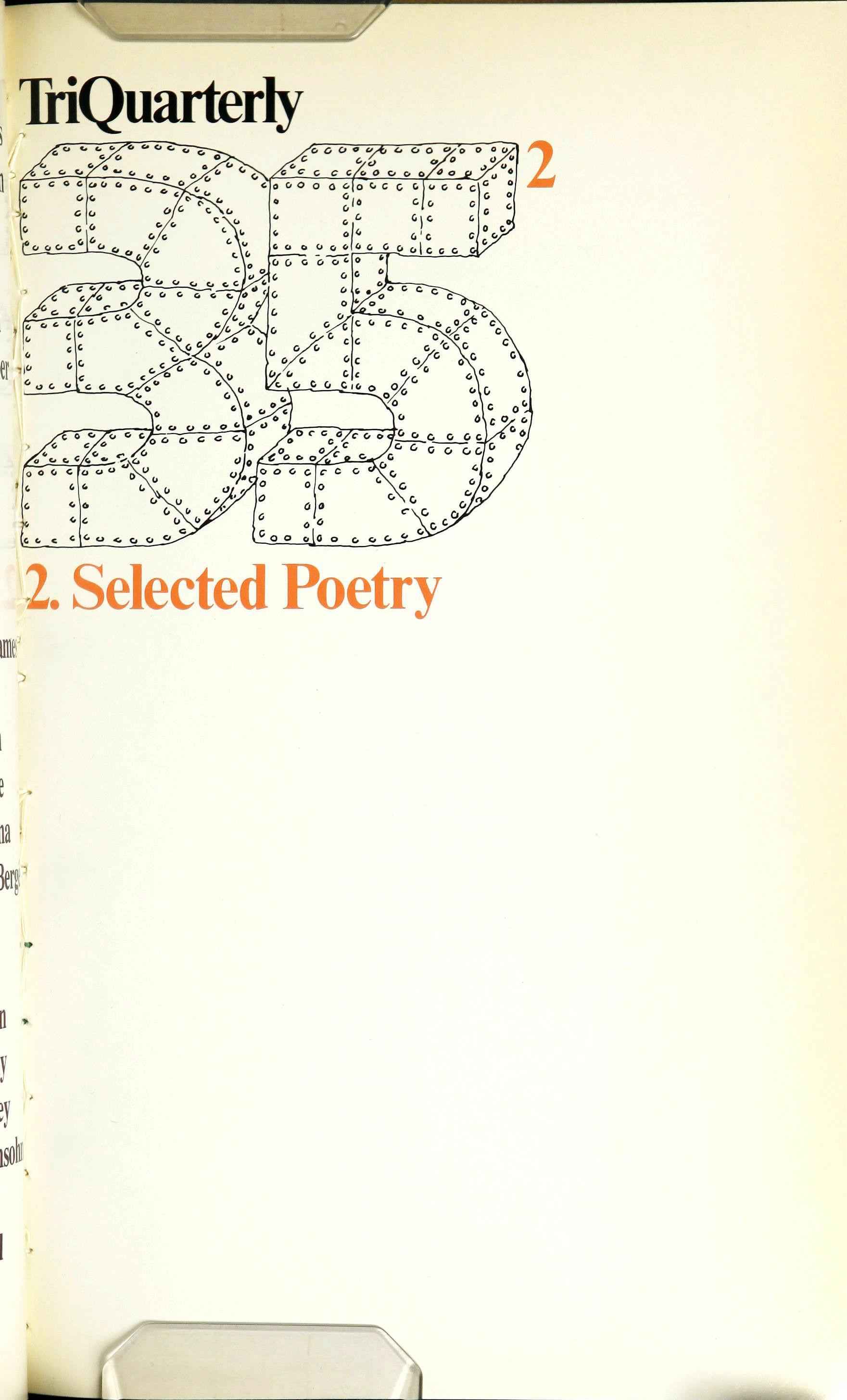

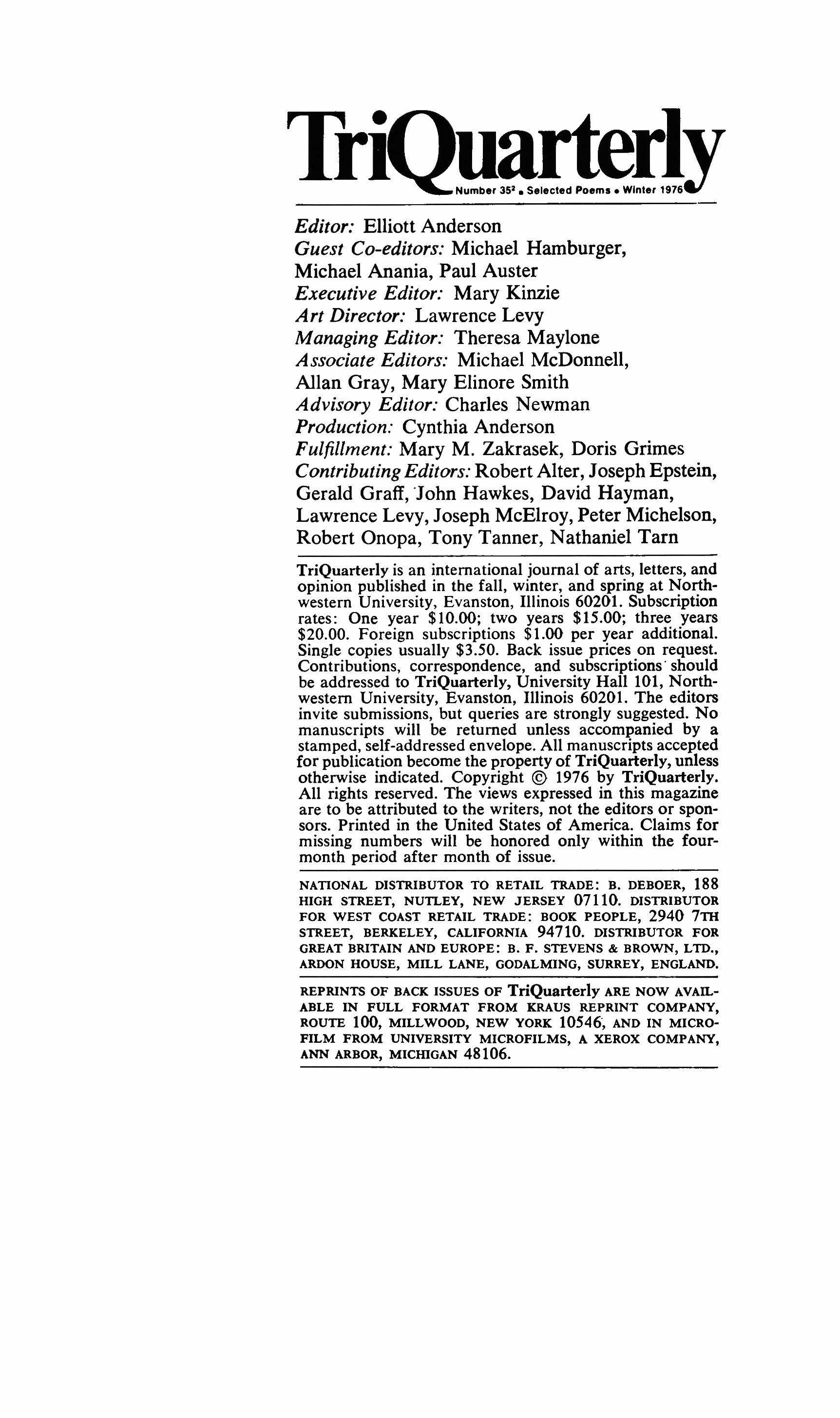
Editor: Elliott Anderson
Guest Co-editors: Michael Hamburger, Michael Anania, Paul Auster
Executive Editor: Mary Kinzie
Art Director: Lawrence Levy
Managing Editor: Theresa Maylone
Associate Editors: Michael McDonnell, Allan Gray, Mary Elinore Smith
Advisory Editor: Charles Newman
Production: Cynthia Anderson
Fulfillment: Mary M. Zakrasek, Doris Grimes
Contributing Editors: Robert Alter, Joseph Epstein, Gerald Graff, John Hawkes, David Hayman, Lawrence Levy, Joseph McElroy, Peter Michelson, Robert Onopa, Tony Tanner, Nathaniel Tarn
TriQuarterly is an international journal of arts, letters, and opinion published in the fall, winter, and spring at Northwestern University, Evanston, Illinois 60201. Subscription rates: One year $10.00; two years $15.00; three years $20.00. Foreign subscriptions $1.00 per year additional. Single copies usually $3.50. Back issue prices on request. Contributions, correspondence, and subscriptions' should be addressed to TriQuarterly, University Hall 101, Northwestern University, Evanston, Illinois 60201. The editors invite submissions, but queries are strongly suggested. No manuscripts will be returned unless accompanied by a stamped, self-addressed envelope. All manuscripts accepted for publication become the property of TriQuarterly, unless otherwise indicated. Copyright © 1976 by TriQuarterly. All rights reserved. The views expressed in this magazine are to be attributed to the writers, not the editors or sponsors. Printed in the United States of America. Claims for missing numbers will be honored only within the fourmonth period after month of issue.
NATIONAL DISTRIBUTOR TO RETAIL TRADE: B. DEBOER, 188 HIGH STREET, NUTLEY, NEW JERSEY 07110. DISTRIBUTOR FOR WEST COAST RETAIL TRADE: BOOK PEOPLE, 2940 7TH STREET, BERKELEY, CALIFORNIA 94710. DISTRIBUTOR FOR GREAT BRITAIN AND EUROPE: B. F. STEVENS & BROWN, LTD., ARDON HOUSE, MILL LANE, GODALMING, SURREY, ENGLAND.
REPRINTS OF BACK ISSUES OF TriQuarterly ARE NOW AVAILABLE IN FULL FORMAT FROM KRAUS REPRINT COMPANY, ROUTE 100, MILLWOOD, NEW YORK 10546", AND IN MICROFILM FROM UNIVERSITY MICROFILMS, A XEROX COMPANY, ANN ARBOR, MICIDGAN 48106.
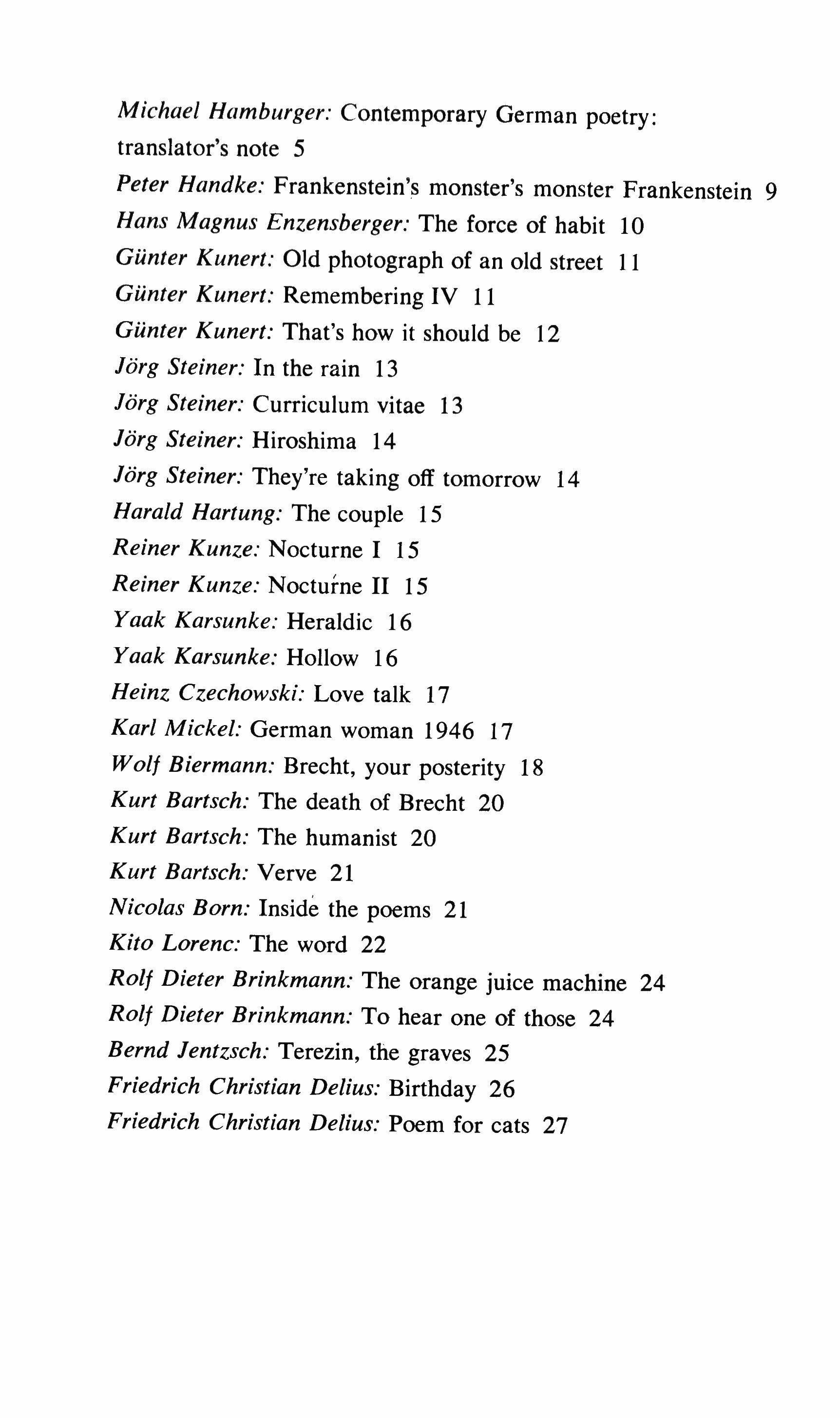
Michael Hamburger: Contemporary German poetry: translator's note 5
Peter Handke: Frankenstein's monster's monster Frankenstein 9
Hans Magnus Enzensberger: The force of habit 10
Gunter Kunert: Old photograph of an old street 11
Gunter Kunert: Remembering IV 11
Gunter Kunert: That's how it should be 12
Jorg Steiner: In the rain 13
Iorg Steiner: Curriculum vitae 13
Iorg Steiner: Hiroshima 14
Iorg Steiner: They're taking off tomorrow 14
Harald Hartung: The couple 15
Reiner Kunze: Nocturne I 15
Reiner Kunze: Nocturne II 15
Yaak Karsunke: Heraldic 16
Yaak Karsunke: Hollow 16
Heinz Czechowski: Love talk 17
Karl Mickel: German woman 1946 17
Wolf Biermann: Brecht, your posterity 18
Kurt Bartsch: The death of Brecht 20
Kurt Bartsch: The humanist 20
Kurt Bartsch: Verve 21
Nicolas Born: Inside the poems 21
Kito Lorenc: The word 22
Rolf Dieter Brinkmann: The orange juice machine 24
Rolf Dieter Brinkmann: To hear one of those 24
Bernd Ientzsch: Terezin, the graves 25
Friedrich Christian Delius: Birthday 26
Friedrich Christian Delius: Poem for cats 27
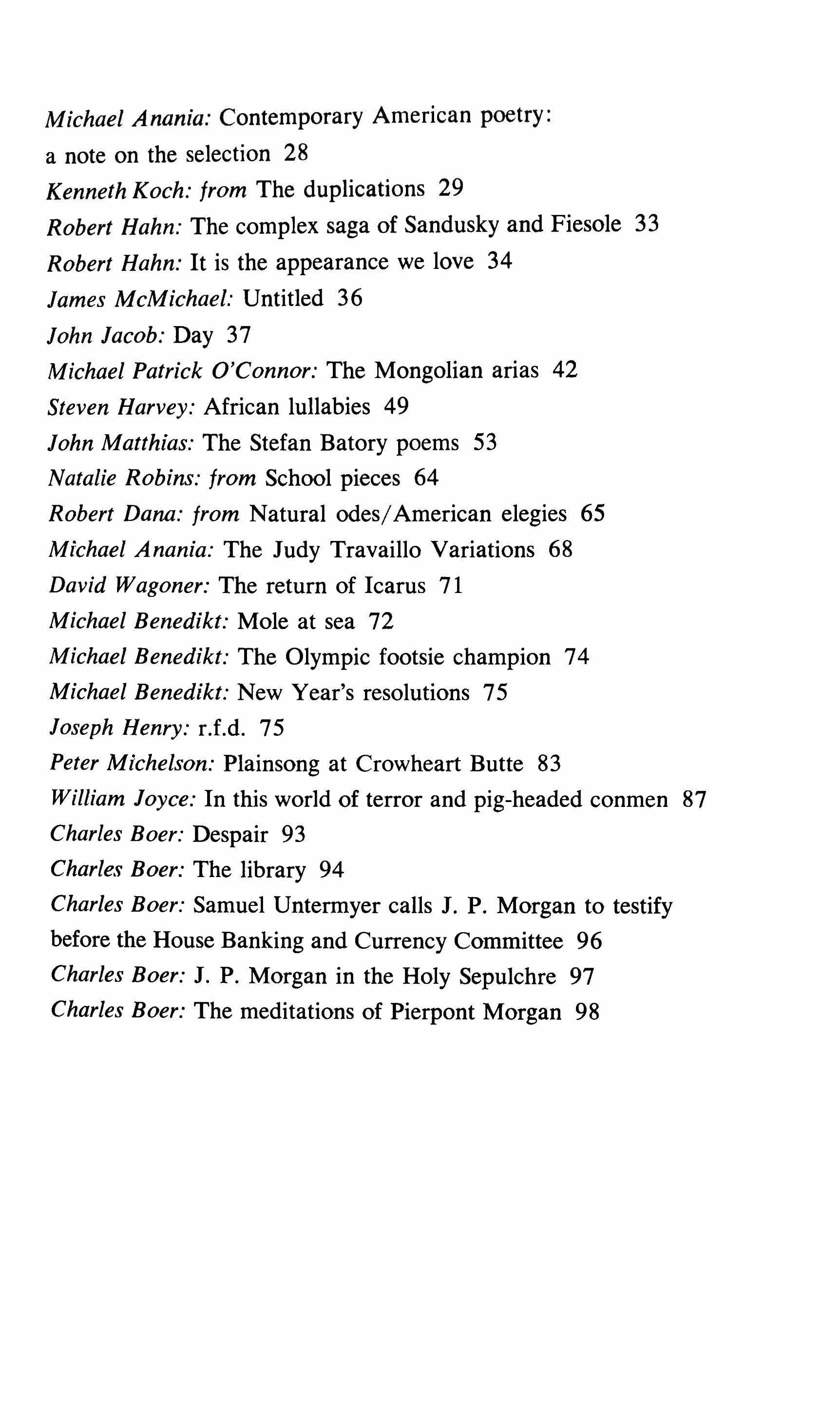
Michael Anania: Contemporary American poetry: a note on the selection 28
Kenneth Koch: from The duplications 29
Robert Hahn: The complex saga of Sandusky and Fiesole 33
Robert Hahn: It is the appearance we love 34
James McMichael: Untitled 36
John Jacob: Day 37
Michael Patrick O'Connor: The Mongolian arias 42
Steven Harvey: African lullabies 49
John Matthias: The Stefan Batory poems 53
Natalie Robins: from School pieces 64
Robert Dana: from Natural odes/American elegies 65
Michael Anania: The Judy Travaillo Variations 68
David Wagoner: The return of Icarus 71
Michael Benedikt: Mole at sea 72
Michael Benedikt: The Olympic footsie champion 74
Michael Benedikt: New Year's resolutions 75
Joseph Henry: r.f.d. 75
Peter Michelson: Plainsong at Crowheart Butte 83
William Joyce: In this world of terror and pig-headed conmen 87
Charles Boer: Despair 93
Charles Boer: The library 94
Charles Boer: Samuel Untermyer calls J. P. Morgan to testify before the House Banking and Currency Committee 96
Charles Boer: J. P. Morgan in the Holy Sepulchre 97
Charles Boer: The meditations of Pierpont Morgan 98
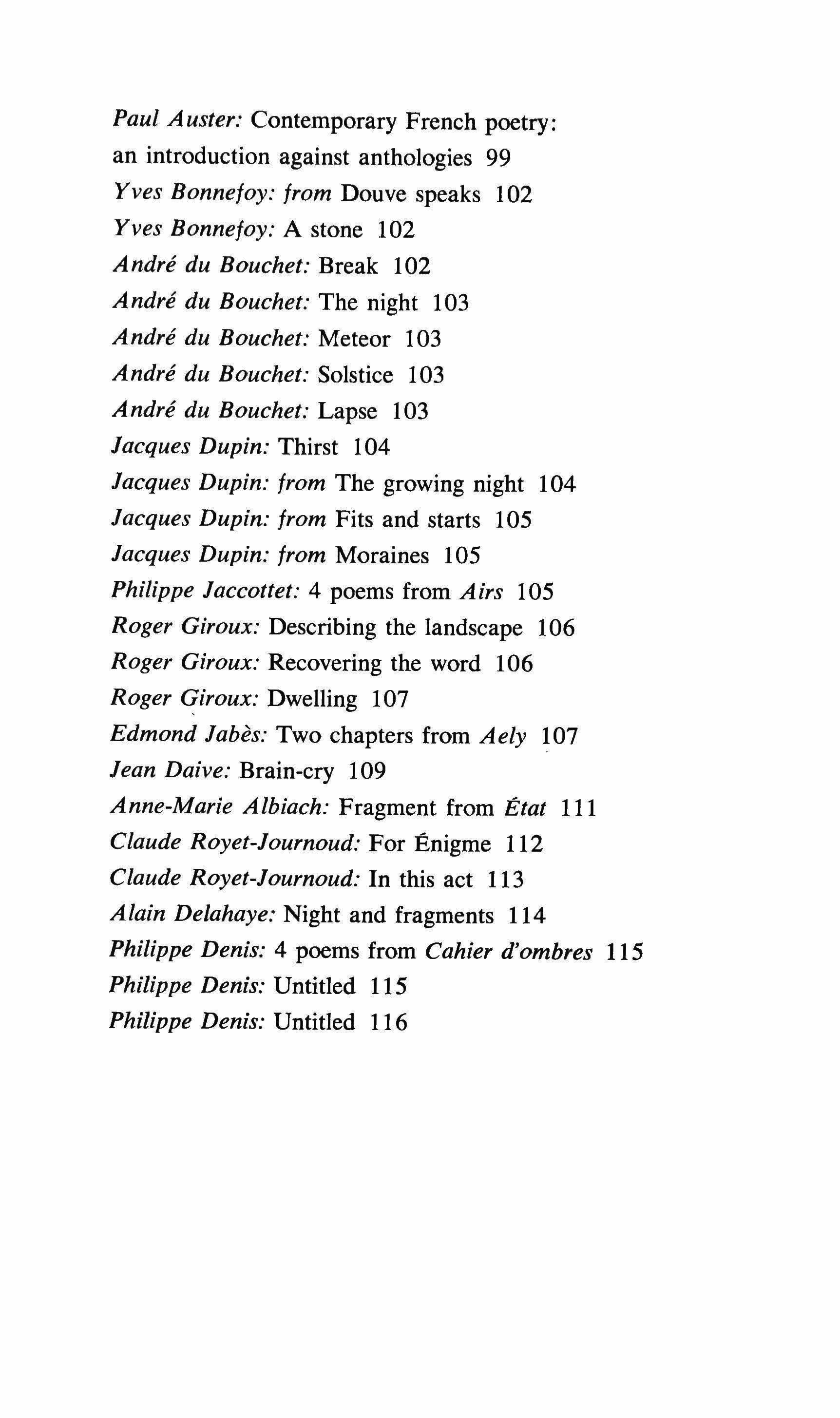
Paul A uster: Contemporary French poetry: an introduction against anthologies 99
Yves Bonnefoy: from Douve speaks 102
Yves Bonnefoy: A stone 102
Andre du Bouchet: Break 102
Andre du Bouchet: The night 103
Andre du Bouchet: Meteor 103
Andre du Bouchet: Solstice 103
Andre du Bouchet: Lapse 103
Jacques Dupin: Thirst 104
Jacques Dupin: from The growing night 104
Jacques Dupin: from Fits and starts 105
Jacques Dupin: from Moraines 105
Philippe Jaccottet: 4 poems from Airs 105
Roger Giroux: Describing the landscape 106
Roger Giroux: Recovering the word 106
Roger Giroux: Dwelling 107
Edmond Iabes: Two chapters from Aely 107
Jean Daive: Brain-cry 109
Anne-Marie Albiach: Fragment from Etat 111
Claude Royet-Journoud: For Enigme 112
Claude Royet-Journoud: In this act 113
Alain Delahaye: Night and fragments 114
Philippe Denis: 4 poems from Cahier d'ombres 115
Philippe Denis: Untitled 115
Philippe Denis: Untitled 116

These translations are a selection-by Elliott Anderson-from work selected by me from the translations I have done for a forthcoming anthology of German poetry 1910-1975-a replacement for the anthology Modern German Poetry 1910-1960 (co-edited by Christopher Middleton, and out of print). The anthology, in turn, is a selection from poems written by German-language poets over a period of 65 years. That selection, inevitably, was restricted by the limits of my taste in poetry, as well as by the factor of translatability. I would not claim, therefore, that the anthology is representative-or that any anthology can be representative, for that matter, since to speak of poetry as a collective is as meaningless as to speak of "the people." There is no such thing as German poetry 1910-1975 if that is taken to mean a corporative entity that can be represented by such selections as any anthologist has to make. There are poems-thousands of them, even if one excludes work by people not regarded as professional or established poets-written in the German language by persons of German nationality, West or East German; in the later period, Austrians, Swiss; and, since 1933 especially,

even by persons not resident in any German-speaking country. Every poem is a separate event, a separate organism with its own pre-history, background, and setting. Some good poets can be adequately represented by three or four poems; others cannot, because their field of tension was greater, their development more complex or sporadic or adventurous. It is enough if an anthologist, and especially an anthologist-translator, stretches his own sympathies as far as they will go; and if he refrains from including any poem because it is representative of this or that, rather than something he recognizes to be a poem true to itself.
The present selection, nevertheless, may permit a few generalizations, if only because it consists of poems written over the last decade, by poets ,born between 1929 (Enzensberger) and 1943 (Delius). True, of the poets included, Enzensberger, Born, Hartung, Karsunke, and Brinkmann are West Germans; Kunert, Mickel, Kunze, Jentzsch, Biermann, Czechowski, Lorenc, and Bartsch are East Germans; Handke is Austrian; Steiner is Swiss; but it is one of the characteristics of the decade in question that those national differences became less important and less conspicuous than they had been. One reason is the predominance of political and social interests in West Germany, a predominance that owes much to the influence of Enzensberger. Another is the common debt to Brecht, the originator of a minimal poem of social or political comment that served as a model to poets throughout the German-speaking world, when the assumption was that individual self-expression ought to be subordinated to a didactic function. As soon as that has been said, modifications must be made. Though Jorg Steiner, better known as a prose writer, is represented by poems that look like minimal poems with a didactic or epigrammatic point, there is also something about their tone that is specifically Swiss-a quality hard to define to be found in the work of other Swiss writers, such as Robert Walser or Peter Bichsel. It is a quality that can be vaguely indicated by such words as childlike, ingenuous, naive, though it may be the product of extreme sophistication and artistry. Nor can the minimal poems of East German poets such as Reiner Kunze be understood without some knowledge of the society and political institutions to which they are a response. Such East German poets may share the political or ideological
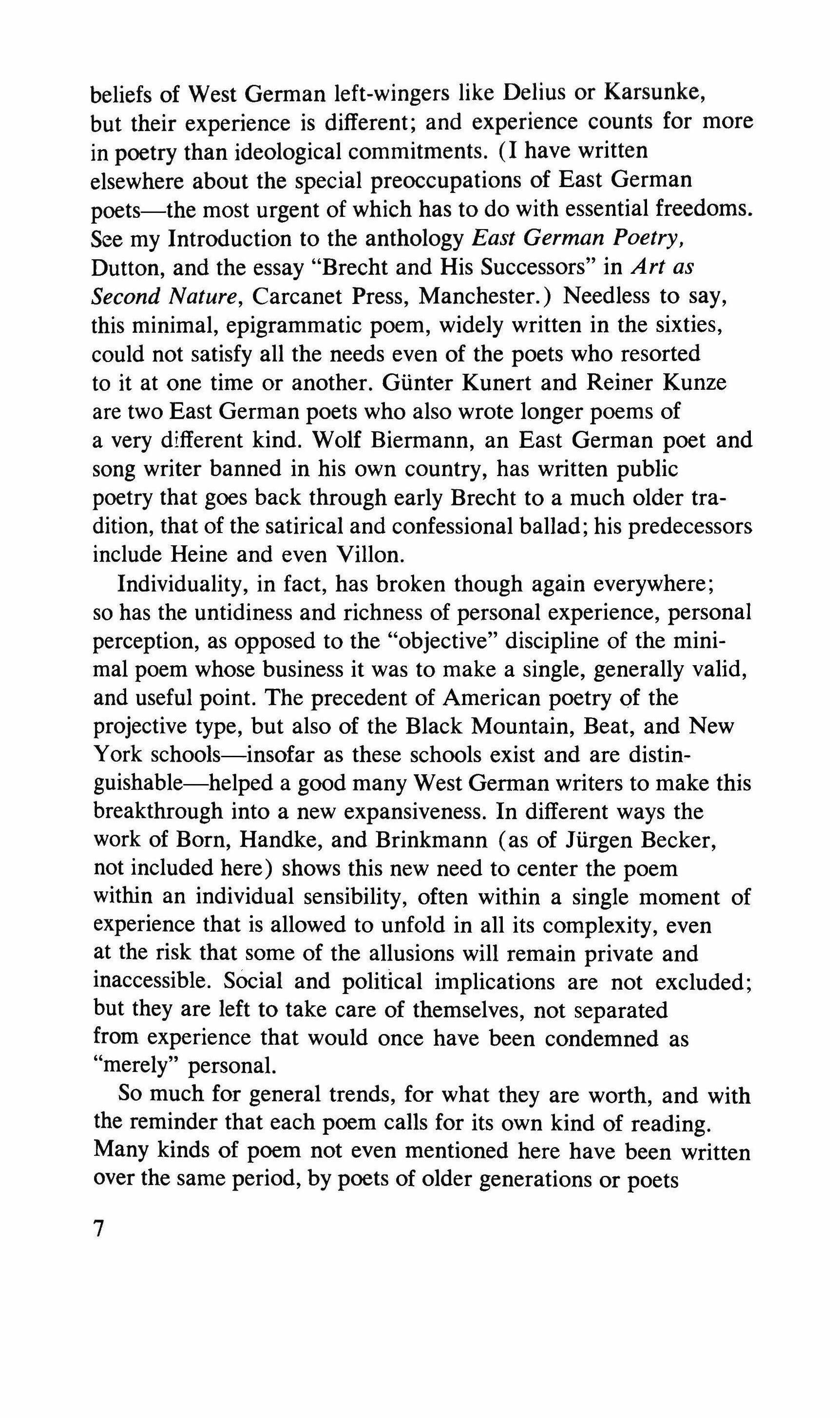
beliefs of West German left-wingers like Delius or Karsunke, but their experience is different; and experience counts for more in poetry than ideological commitments. (I have written elsewhere about the special preoccupations of East German poets-the most urgent of which has to do with essential freedoms. See my Introduction to the anthology East German Poetry, Dutton, and the essay "Brecht and His Successors" in Art as Second Nature, Carcanet Press, Manchester.) Needless to say, this minimal, epigrammatic poem, widely written in the sixties, could not satisfy all the needs even of the poets who resorted to it at one time or another. GUnter Kunert and Reiner Kunze are two East German poets who also wrote longer poems of a very different kind. Wolf Biermann, an East German poet and song writer banned in his own country, has written public poetry that goes back through early Brecht to a much older tradition, that of the satirical and confessional ballad; his predecessors include Heine and even Villon.
Individuality, in fact, has broken though again everywhere; so has the untidiness and richness of personal experience, personal perception, as opposed to the "objective" discipline of the minimal poem whose business it was to make a single, generally valid, and useful point. The precedent of American poetry of the projective type, but also of the Black Mountain, Beat, and New York schools-insofar as these schools exist and are distinguishable-helped a good many West German writers to make this breakthrough into a new expansiveness. In different ways the work of Born, Handke, and Brinkmann (as of Jurgen Becker, not included here) shows this new need to center the poem within an individual sensibility, often within a single moment of experience that is allowed to unfold in all its complexity, even at the risk that some of the allusions will remain private and inaccessible. Social and political implications are not excluded; but they are left to take care of themselves, not separated from experience that would once have been condemned as "merely" personal.
So much for general trends, for what they are worth, and with the reminder that each poem calls for its own kind of reading. Many kinds of poem not even mentioned here have been written over the same period, by poets of older generations or poets
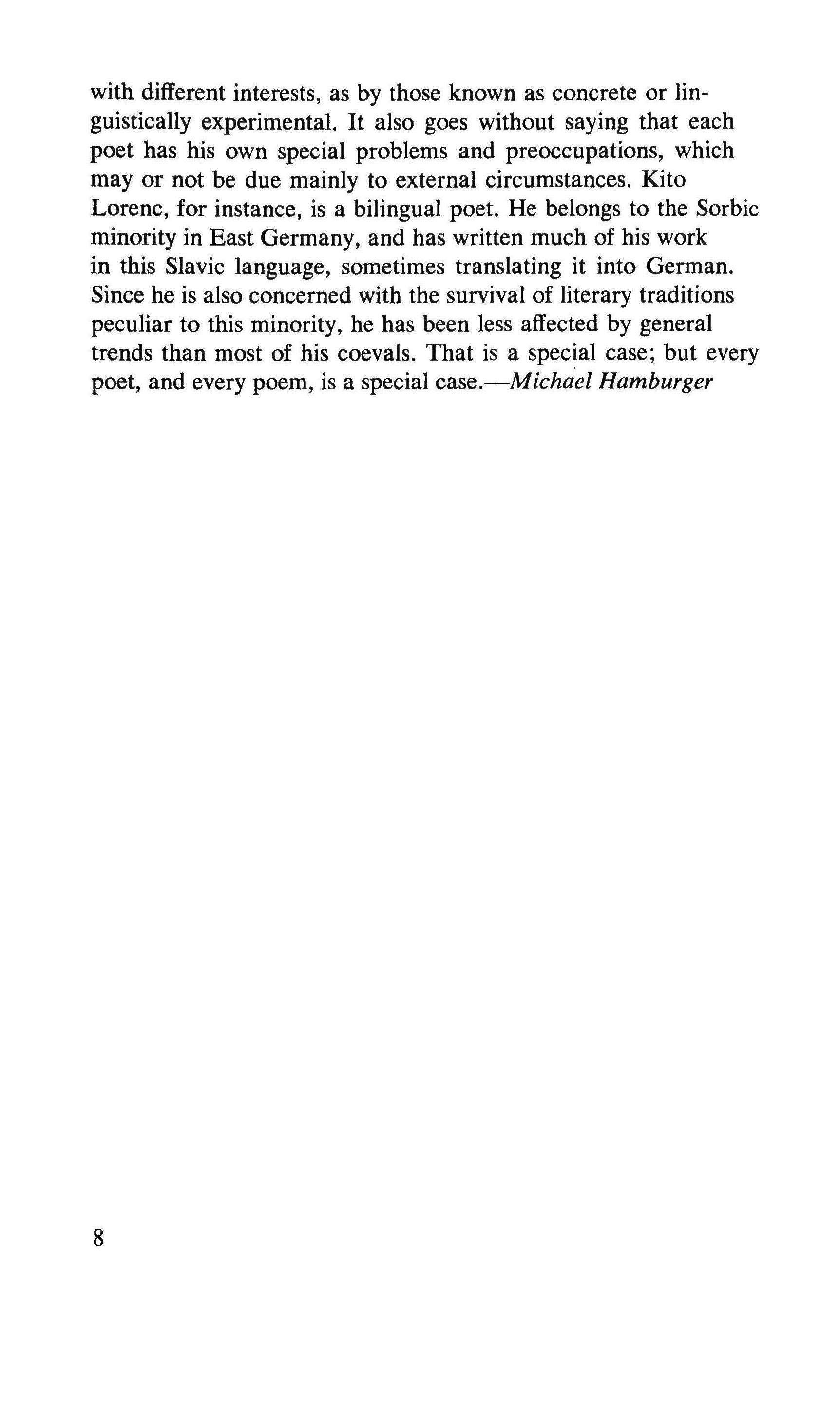
with different interests, as by those known as concrete or linguistically experimental. It also goes without saying that each poet has his own special problems and preoccupations, which mayor not be due mainly to external circumstances. Kito Lorenc, for instance, is a bilingual poet. He belongs to the Sorbic minority in East Germany, and has written much of his work in this Slavic language, sometimes translating it into German. Since he is also concerned with the survival of literary traditions peculiar to this minority, he has been less affected by general trends than most of his coevals. That is a special case; but every poet, and every poem, is a special case.-Michael Hamburger
Ah!
Under the straw in the stable lies Frankenstein's monster.
In Charleswelllives a doctor called Stein.
Frankenstein's daughter travels by coach to take the water at Bath.
The village boys are called Fred, Charles, William, and John.
In the stable above the straw hangs a rather black wooden hoop. The porter is the monster's first victim, the second is called Gerda.
In the stable under the straw lies Frankenstein, Frankenstein's monster.
In the mansion a quartet plays a genuinely English composer, but the lady of the house has them switch to Handel.
At the inn the tablecloths are so white and blue checked that they make one feel homesick.
In the cellar the doctor snatches the glove from his startled assistant's hand.
There is a town called Frankenstein.
In the wood Frankenstein's monster sleeps weeping under the bracken.
Frankenstein's daughter'S lover is called John. Frankenstein's monster stands on the balcony of the mansion. Doctor Stein visits a patient.
The lovers are called Gerda and Frank, they sit under the shrubs in the middle of the night, counting ants.
The groom hangs in the stable from a rather black wooden hoop. Frankenstein's monster used to be called John.
The scream of the lady of the house puts out the candle for the string quartet's music.
Frankenstein's monster has hidden under the bracken.
Frankenstein's daughter wore a crinoline from Bath.
John and Frankenstein's daughter often used to sit together in the grass, eating from the picnic basket that stood between them in the grass.
The lady of the house holds a fan between fingers and thumb.
Frankenstein's monster, in his despair, wears his shirt collar open.
"You are so good to me!" said John.
9
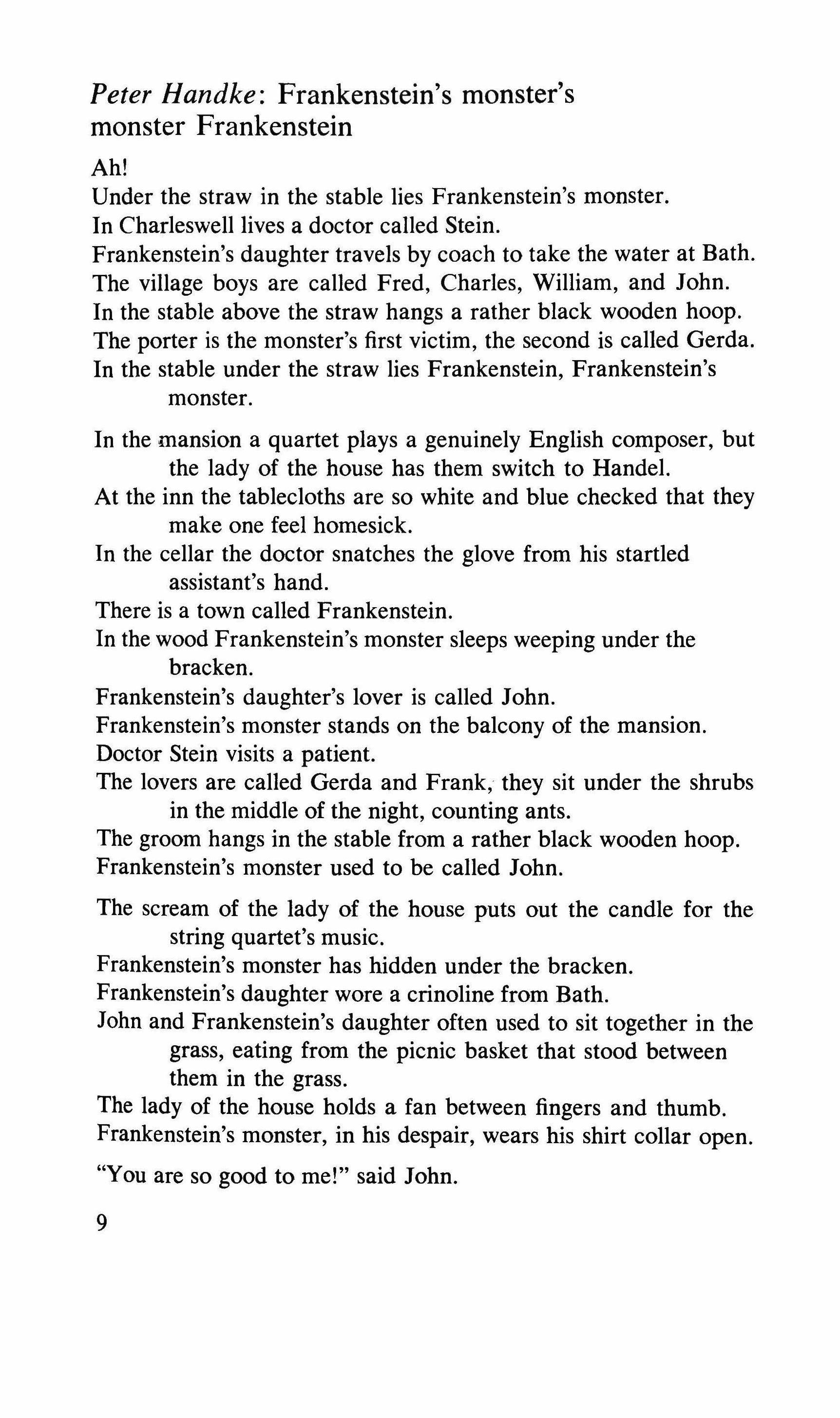
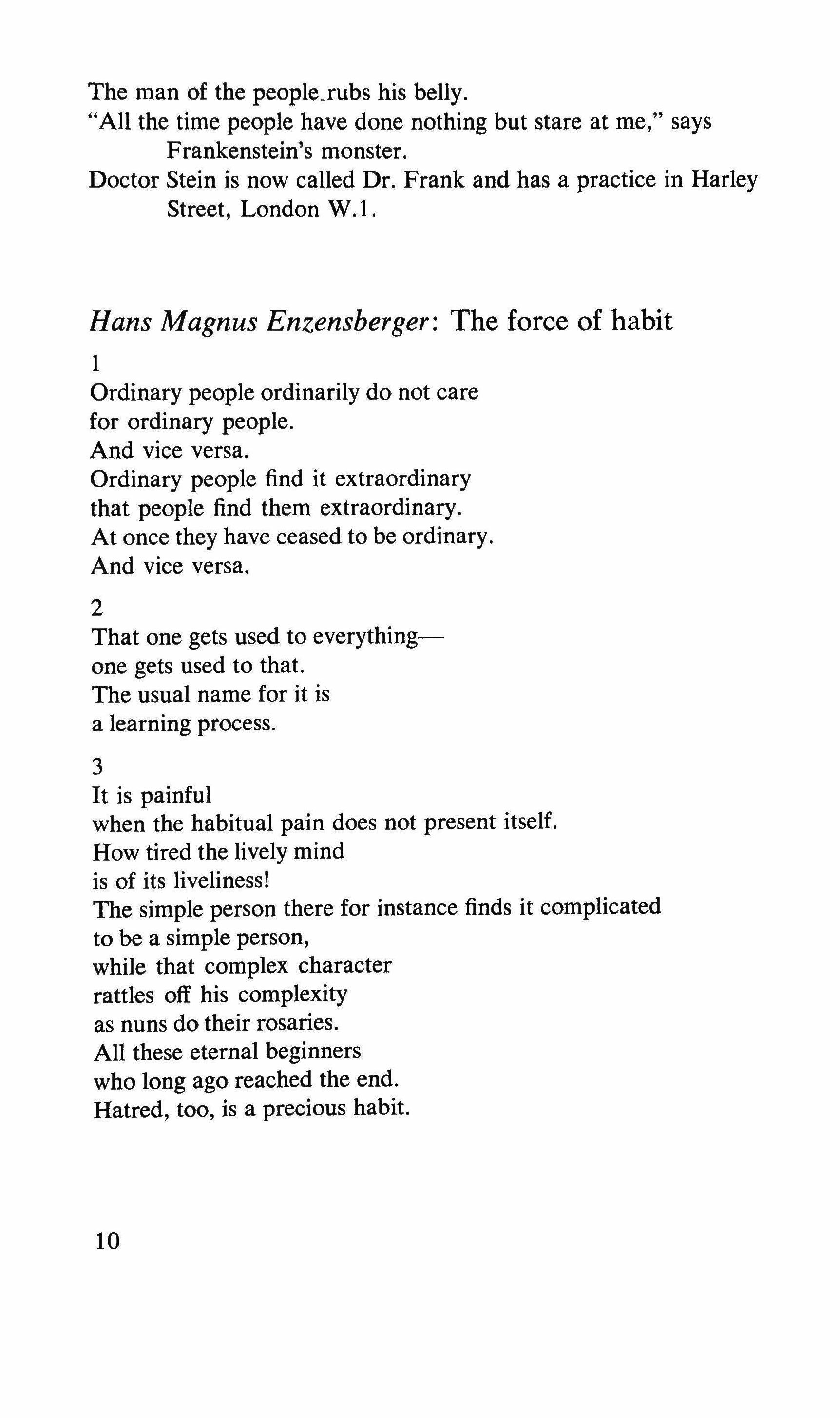
The man of the people.rubs his belly. "All the time people have done nothing but stare at me," says Frankenstein's monster.
Doctor Stein is now called Dr. Frank and has a practice in Harley Street, London W.1.
1
Ordinary people ordinarily do not care for ordinary people. And vice versa.
Ordinary people find it extraordinary that people find them extraordinary. At once they have ceased to be ordinary. And vice versa.
2
That one gets used to everythingone gets used to that. The usual name for it is a learning process.
3
It is painful when the habitual pain does not present itself. How tired the lively mind is of its liveliness!
The simple person there for instance finds it complicated to be a simple person, while that complex character rattles off his complexity as nuns do their rosaries. All these eternal beginners who long ago reached the end. Hatred, too, is a precious habit.
The utterly unprecedentedwe are used to that.
The utterly unprecedented is our habitual right. A creature of habit at the usual corner meets an habitual criminal. An unheard-of occurrence. The usual shit.
Our "classics" were in the habit of turning it into stories.
5
Untroubled the habit of force reposes on the force of habit.
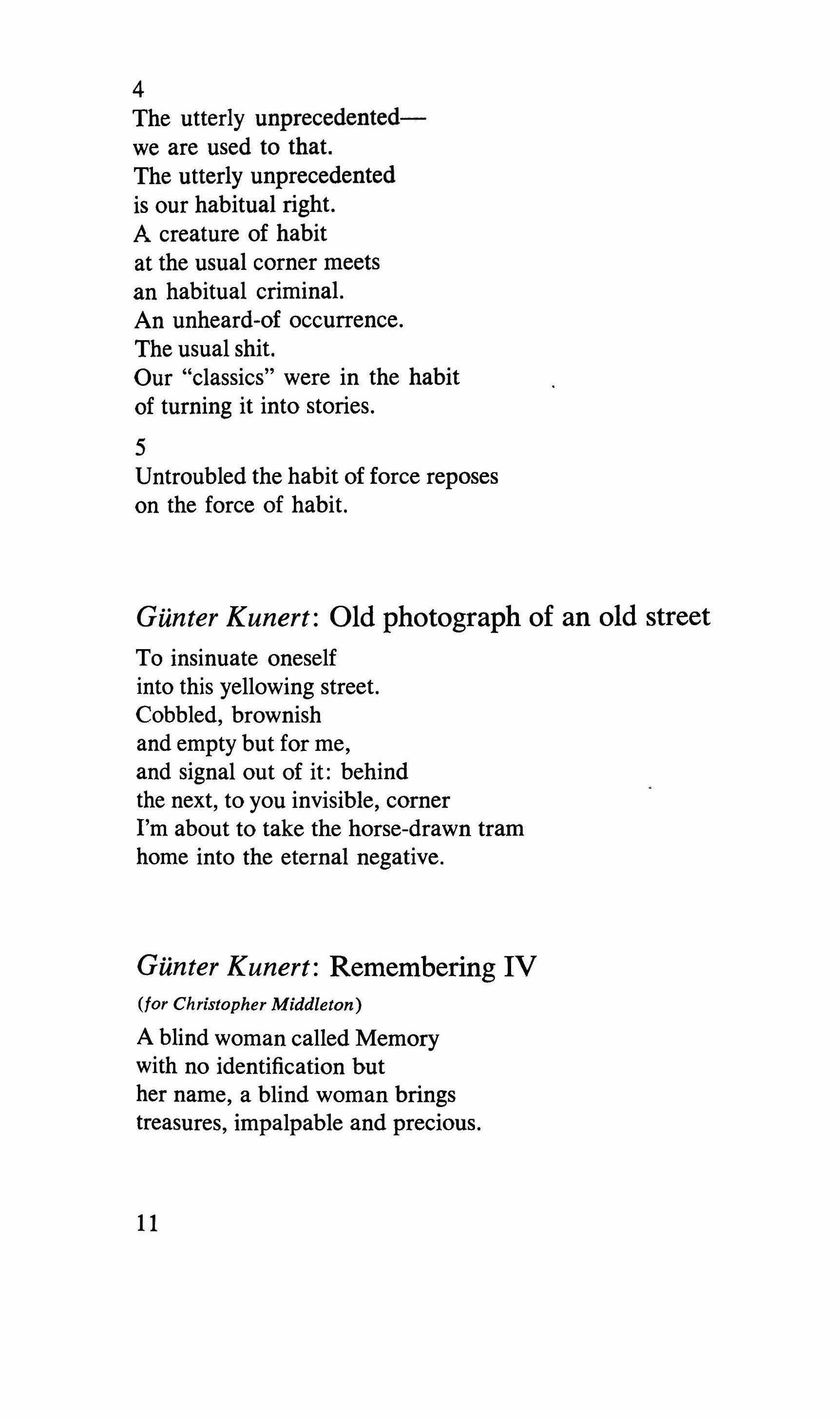
Gunter Kunert: Old photograph of an old street
To insinuate oneself into this yellowing street. Cobbled, brownish and empty but for me, and signal out of it: behind the next, to you invisible, corner I'm about to take the horse-drawn tram home into the eternal negative.
Gunter Kunert: Remembering IV
(for Christopher Middleton)
A blind woman called Memory with no identification but her name, a blind woman brings treasures, impalpable and precious.
Lead has turned into gold, to the alchemists' amazement: they achieved no more than the transmutation of people into inhabitants, of peoples into words, of houses into boxes, of cities into deserts where inhabitants in boxes occur and leave at the command of words, without knowing where from, where to, what for.
A blind woman called Memory opens a chink in one eyelid. As she looks at you without seeing you you see your birth in the ocean of coal seams.
And that long ago you lost your secret: For you have grown visible. Which means usable.
That your future, with its images of the future, passes and has always passed. That at best you are an idiot. If not indeed a rotation split off from matter for the production of matter. Something like a godhead, then, who for lack of believers worships himself. Who hires gangs of killers. Who cannot bear the blind gaze which has seen all.
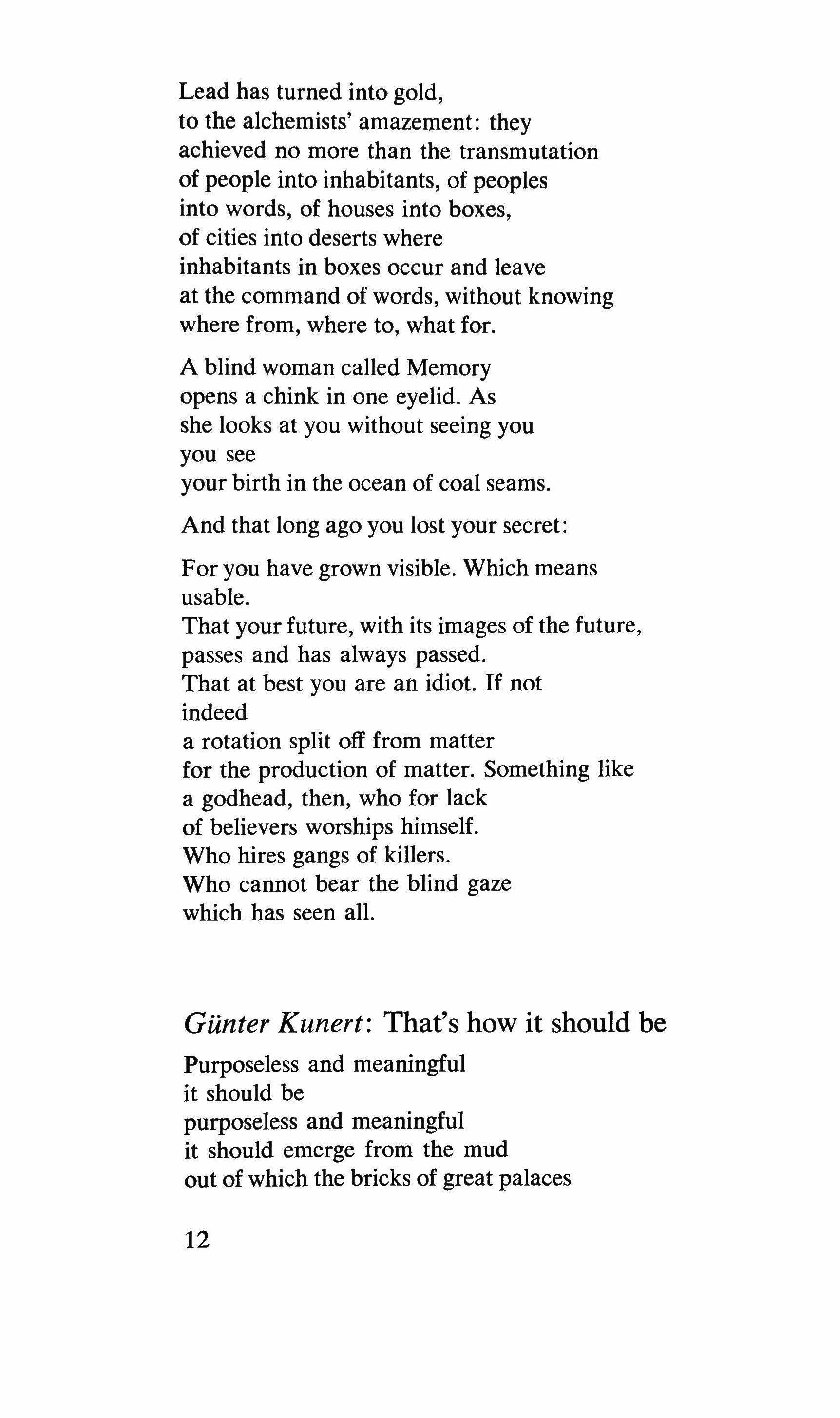
Gunter Kunert: That's how it should be Purposeless and meaningful it should be purposeless and meaningful it should emerge from the mud out of which the bricks of great palaces
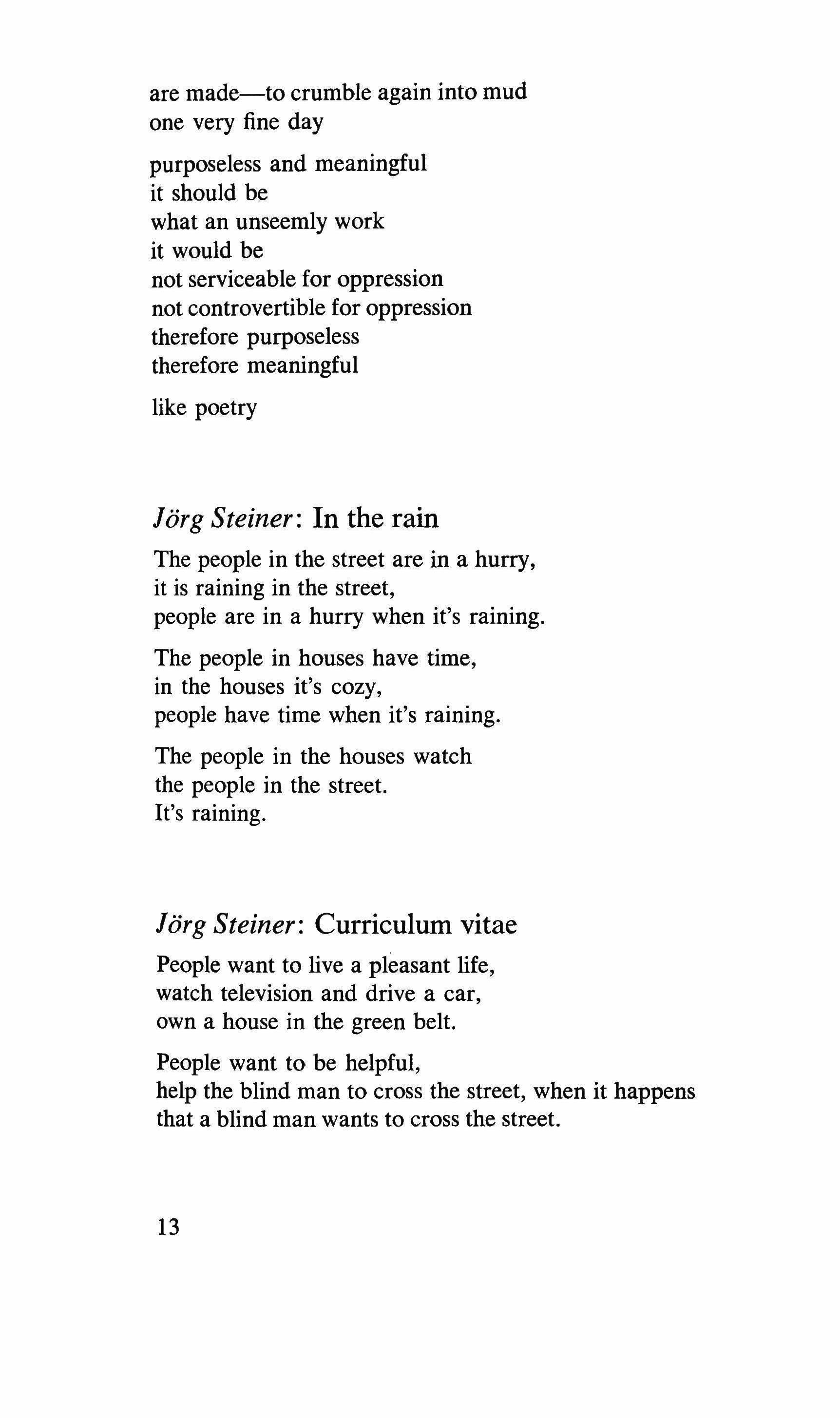
are made-to crumble again into mud one very fine day purposeless and meaningful it should be what an unseemly work it would be not serviceable for oppression not controvertible for oppression therefore purposeless therefore meaningful like poetry
The people in the street are in a hurry, it is raining in the street, people are in a hurry when it's raining. The people in houses have time, in the houses it's cozy, people have time when it's raining.
The people in the houses watch the people in the street. It's raining.
People want to live a pleasant life, watch television and drive a car, own a house in the green belt.
People want to be helpful, help the blind man to cross the street, when it happens that a blind man wants to cross the street.
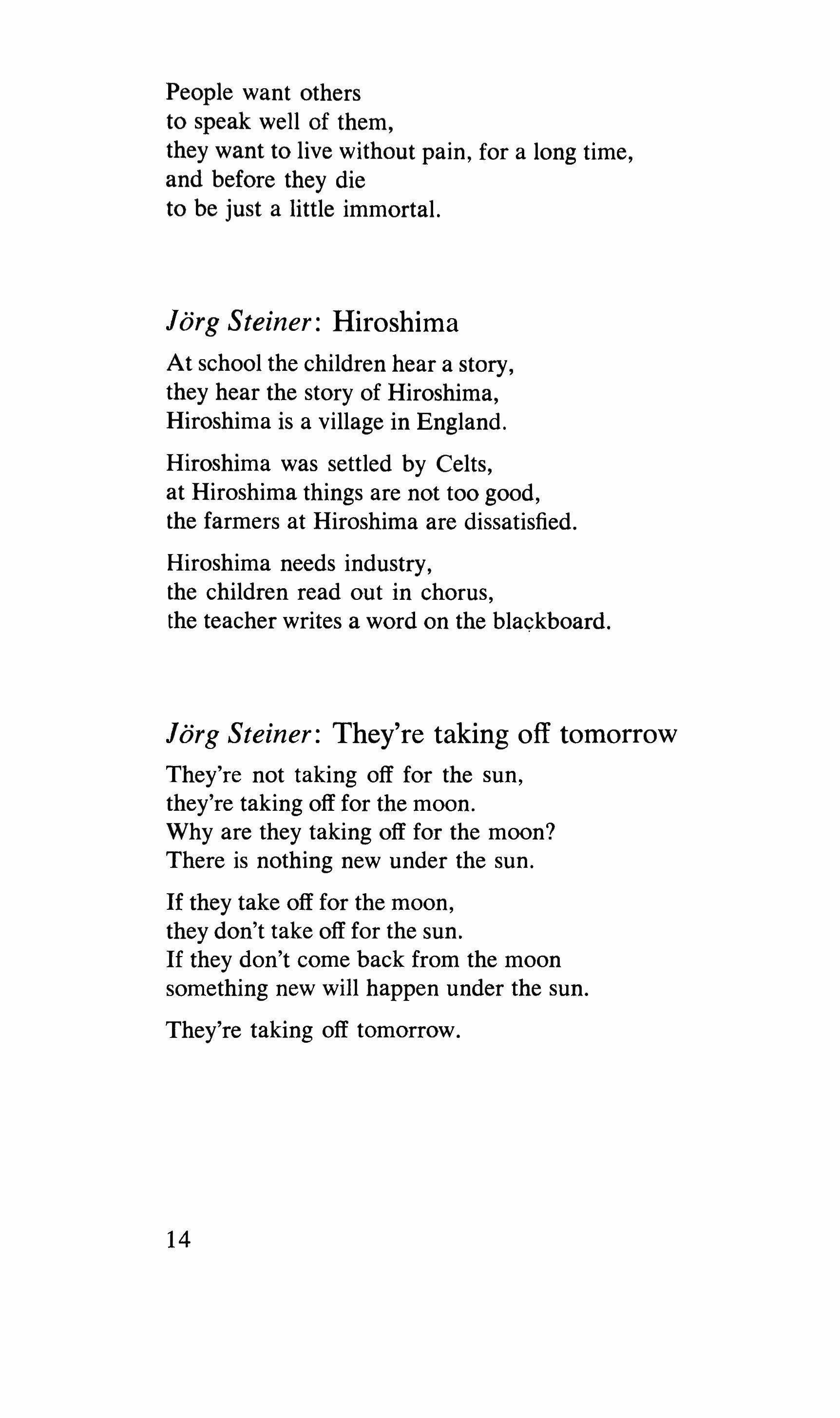
People want others to speak well of them, they want to live without pain, for a long time, and before they die to be just a little immortal.
At school the children hear a story, they hear the story of Hiroshima, Hiroshima is a village in England. Hiroshima was settled by Celts, at Hiroshima things are not too good, the farmers at Hiroshima are dissatisfied. Hiroshima needs industry, the children read out in chorus, the teacher writes a word on the blackboard.
They're not taking off for the sun, they're taking off for the moon. Why are they taking off for the moon? There is nothing new under the sun. If they take off for the moon, they don't take off for the sun. If they don't come back from the moon something new will happen under the sun. They're taking off tomorrow.
Hartung: The couple who hand in hand hop across the meadow and can't keep quiet because they are lighting cigarettes on the springy green trampoline are happy as long as there's music to be heard. Outside in the parkland green is black. In the quietness one can smell death. It is the music one can no longer hear.
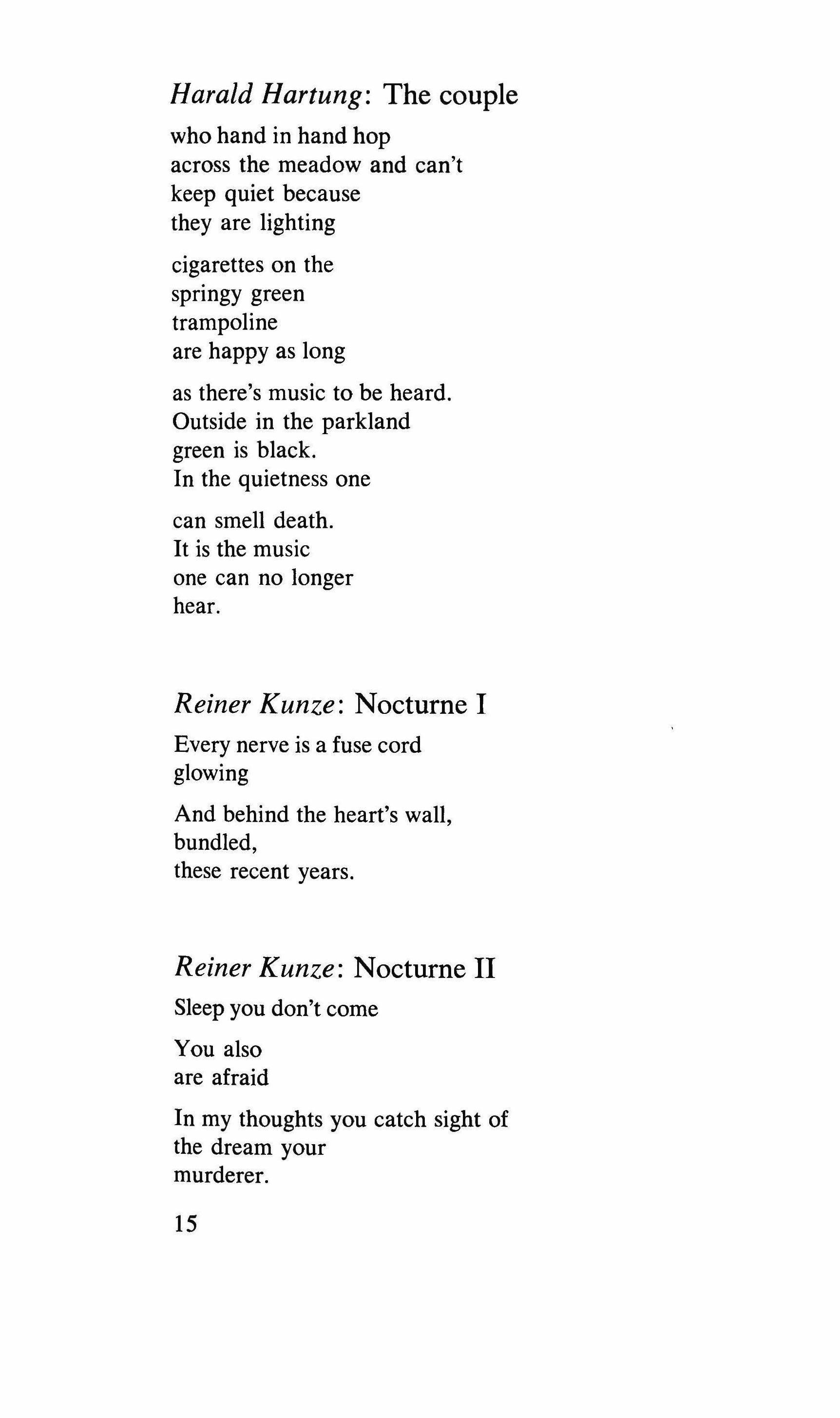
Reiner Kunze: Nocturne I
Every nerve is a fuse cord glowing
And behind the heart's wall, bundled, these recent years.
Reiner Kunze: Nocturne II
Sleep you don't come You also are afraid
In my thoughts you catch sight of the dream your murderer.
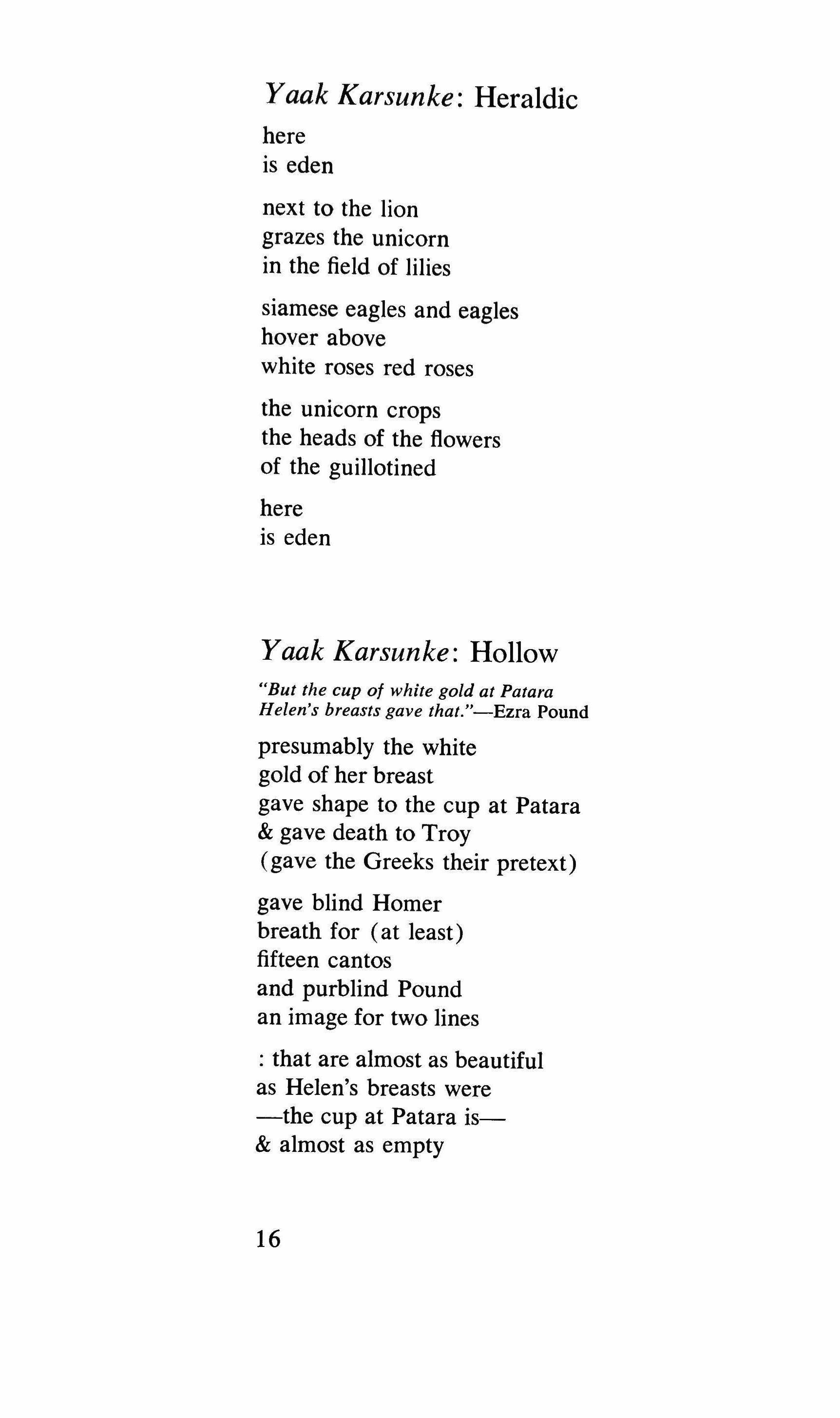
here is eden next to the lion grazes the unicorn in the field of lilies
siamese eagles and eagles hover above white roses red roses the unicorn crops the heads of the flowers of the guillotined here is eden
"But the cup of white gold at Patara Helen's breasts gave that."-Ezra Pound
presumably the white gold of her breast gave shape to the cup at Patara & gave death to Troy (gave the Greeks their pretext) gave blind Homer breath for (at least) fifteen cantos and purblind Pound an image for two lines : that are almost as beautiful as Helen's breasts were -the cup at Patara is& almost as empty
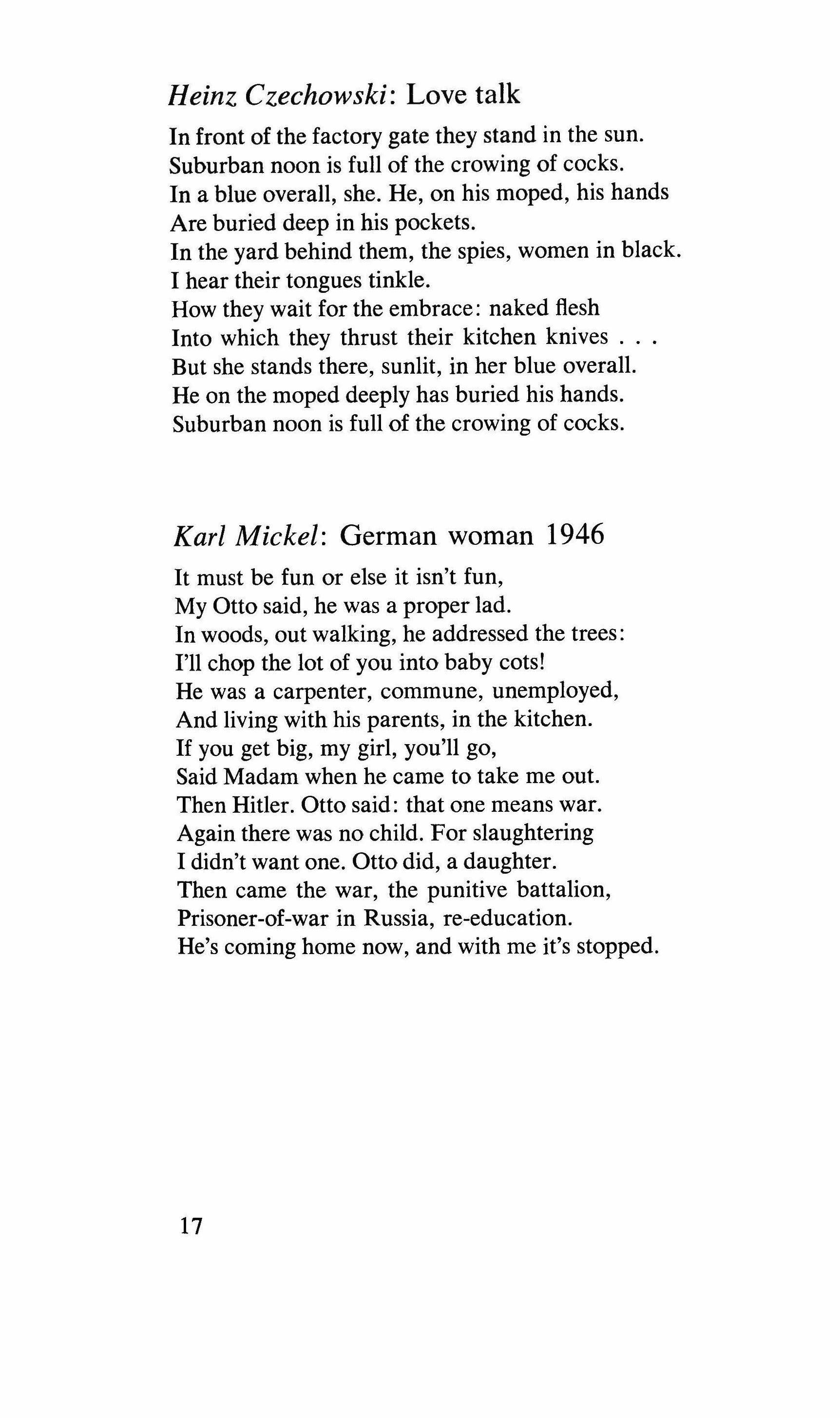
In front of the factory gate they stand in the sun.
Suburban noon is full of the crowing of cocks. In a blue overall, she. He, on his moped, his hands Are buried deep in his pockets. In the yard behind them, the spies, women in black. I hear their tongues tinkle. How they wait for the embrace: naked flesh Into which they thrust their kitchen knives But she stands there, sunlit, in her blue overall. He on the moped deeply has buried his hands.
Suburban noon is full of the crowing of cocks.
It must be fun or else it isn't fun, My Otto said, he was a proper lad. In woods, out walking, he addressed the trees: I'll chop the lot of you into baby cots! He was a carpenter, commune, unemployed, And living with his parents, in the kitchen. If you get big, my girl, you'll go, Said Madam when he came to take me out. Then Hitler. Otto said: that one means war. Again there was no child. For slaughtering I didn't want one. Otto did, a daughter. Then came the war, the punitive battalion, Prisoner-of-war in Russia, re-education. He's coming home now, and with me it's stopped.
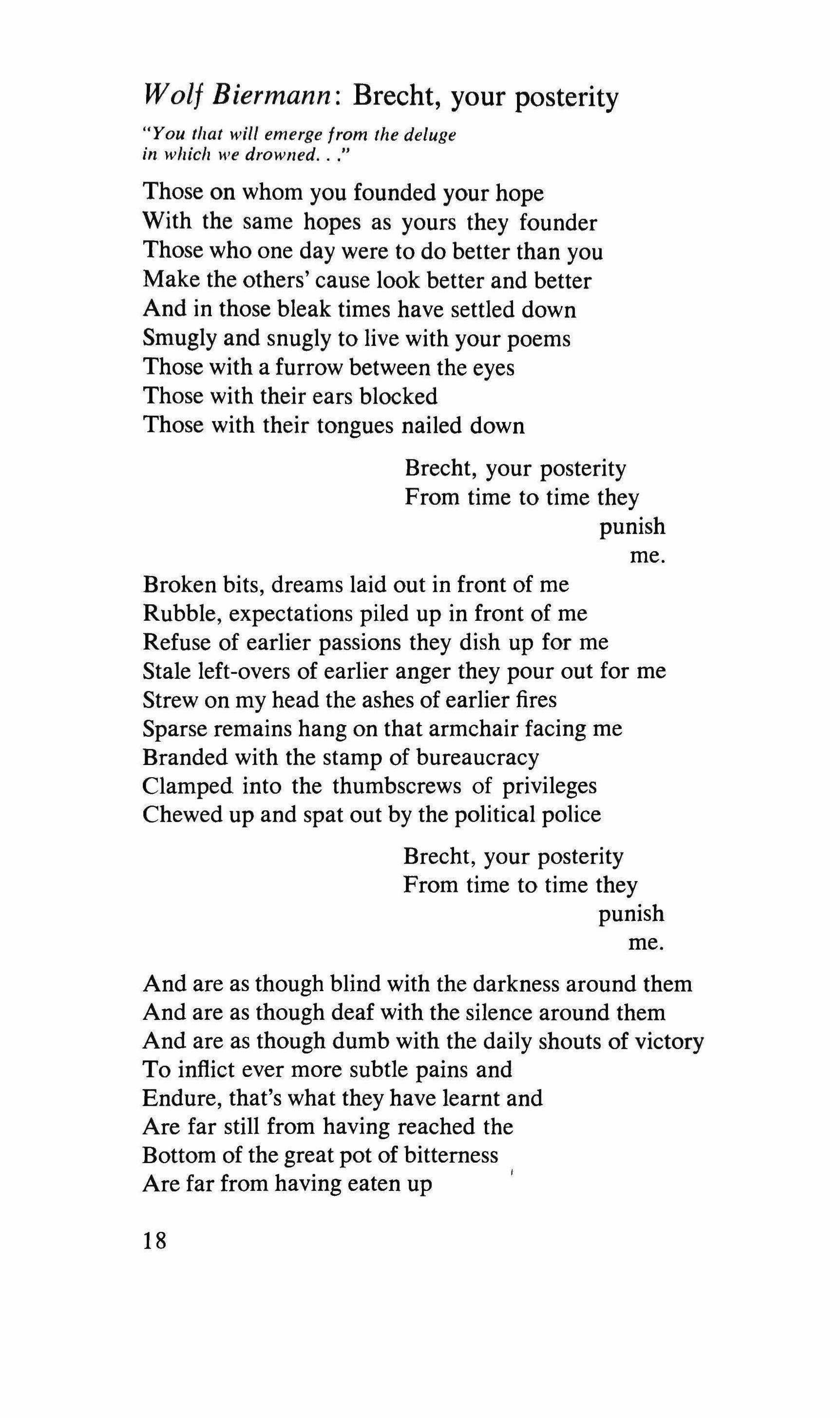
"You that will emerge from the deluge in which we drowned
Those on whom you founded your hope
With the same hopes as yours they founder
Those who one day were to do better than you
Make the others' cause look better and better
And in those bleak times have settled down
Smugly and snugly to live with your poems
Those with a furrow between the eyes
Those with their ears blocked
Those with their tongues nailed down
Brecht, your posterity
From time to time they punish me.
Broken bits, dreams laid out in front of me
Rubble, expectations piled up in front of me
Refuse of earlier passions they dish up for me
Stale left-overs of earlier anger they pour out for me
Strew on my head the ashes of earlier fires
Sparse remains hang on that armchair facing me
Branded with the stamp of bureaucracy
Clamped into the thumbscrews of privileges
Chewed up and spat out by the political police
Brecht, your posterity
From time to time they punish me.
And are as though blind with the darkness around them
And are as though deaf with the silence around them
And are as though dumb with the daily shouts of victory
To inflict ever more subtle pains and Endure, that's what they have learnt and Are far still from having reached the Bottom of the great pot of bitterness
Are far from having eaten up
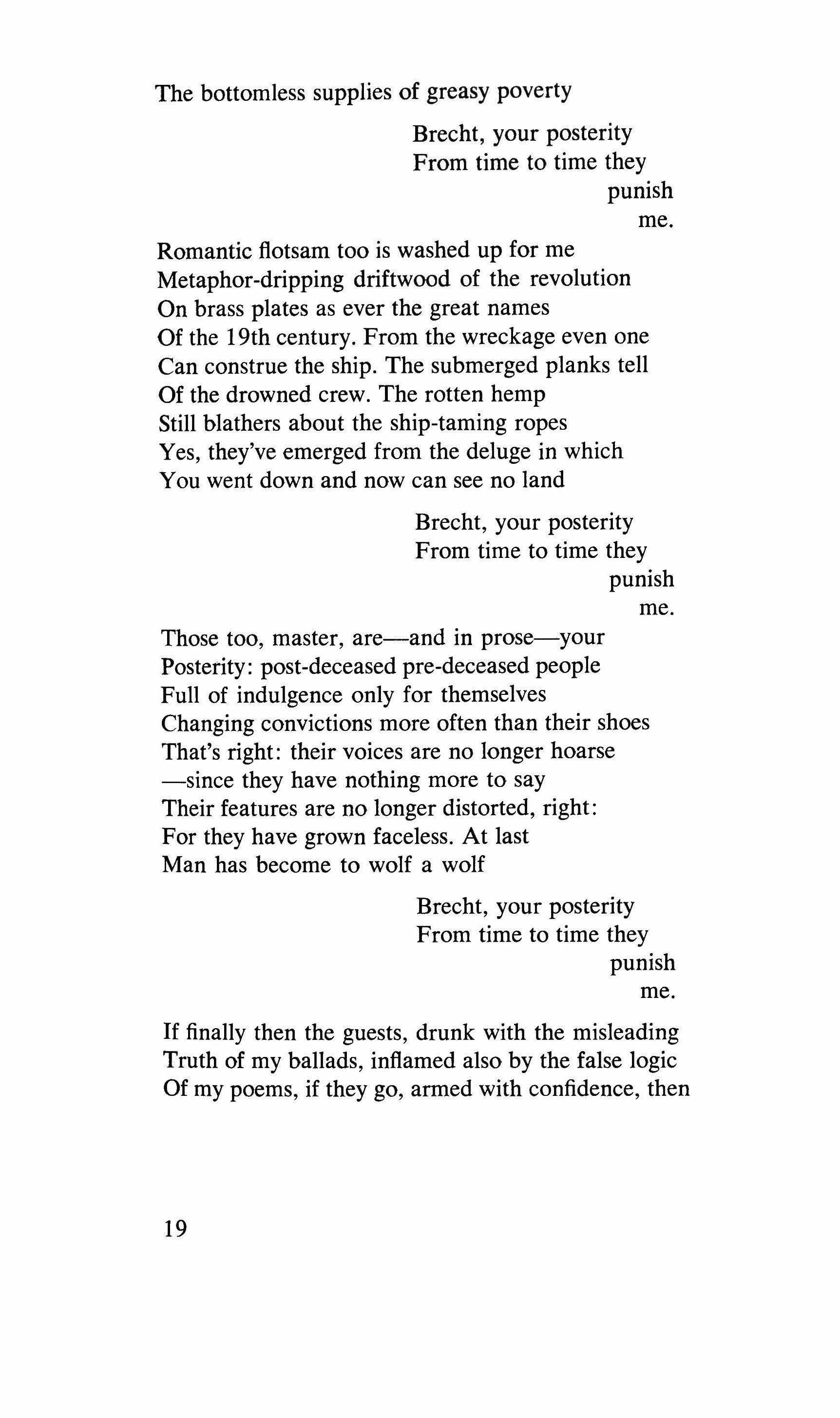
The bottomless supplies of greasy poverty
Brecht, your posterity
From time to time they punish me.
Romantic flotsam too is washed up for me
Metaphor-dripping driftwood of the revolution
On brass plates as ever the great names Of the 19th century. From the wreckage even one Can construe the ship. The submerged planks tell Of the drowned crew. The rotten hemp
Still blathers about the ship-taming ropes
Yes, they've emerged from the deluge in which You went down and now can see no land
Brecht, your posterity
From time to time they punish me.
Those too, master, are-and in prose-your
Posterity: post-deceased pre-deceased people
Full of indulgence only for themselves
Changing convictions more often than their shoes
That's right: their voices are no longer hoarse -since they have nothing more to say Their features are no longer distorted, right: For they have grown faceless. At last Man has become to wolf a wolf
Brecht, your posterity
From time to time they punish me.
If finally then the guests, drunk with the misleading Truth of my ballads, inflamed also by the false logic Of my poems, if they go, armed with confidence, then
I stay behind: ash of my fires. Then I stand there: a raided arsenal. And Knocked out I hang in the strings of my guitar. And I have no voice any more and no face And am as though deaf with speaking and blind with looking And am afraid of my fear and am
Brecht, your posterity From time to time they punish me.
Kurt Bartsch: The death of Brecht
the old grey jacket, roofs, and the cigar, the smoke falls onto snow, and breaks, a dot of blackness, bare, a flagpole stands, nothing but snow blows, a blackbird in the air, wind pounces on the smoke, and on the roofs, blots out the blackbird, delicate tracery, tears from between two fingers the cigar: in snow the smoke flag blows at halfmast.
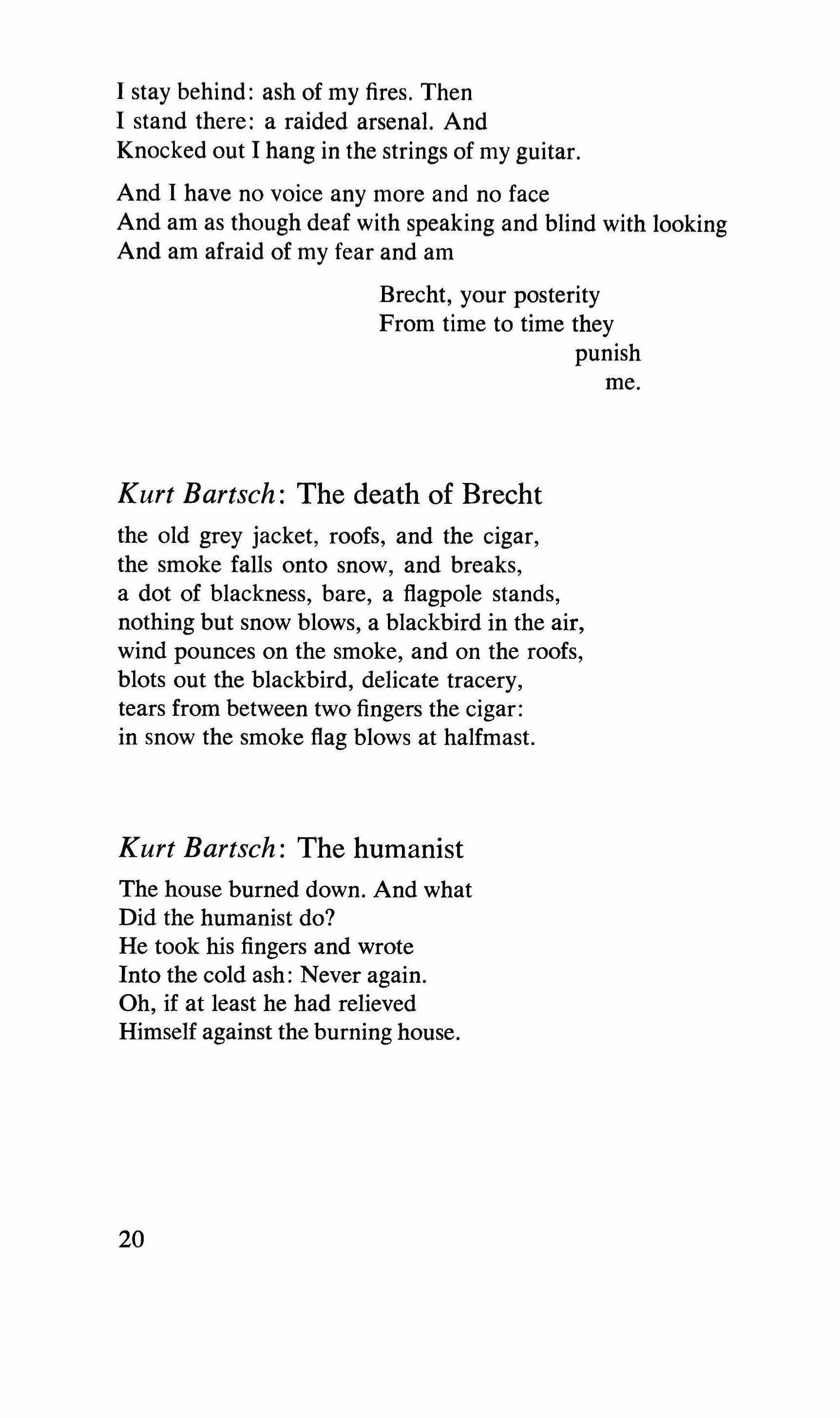
Kurt Bartsch: The humanist
The house burned down. And what Did the humanist do? He took his fingers and wrote Into the cold ash: Never again. Oh, if at least he had relieved Himself against the burning house.
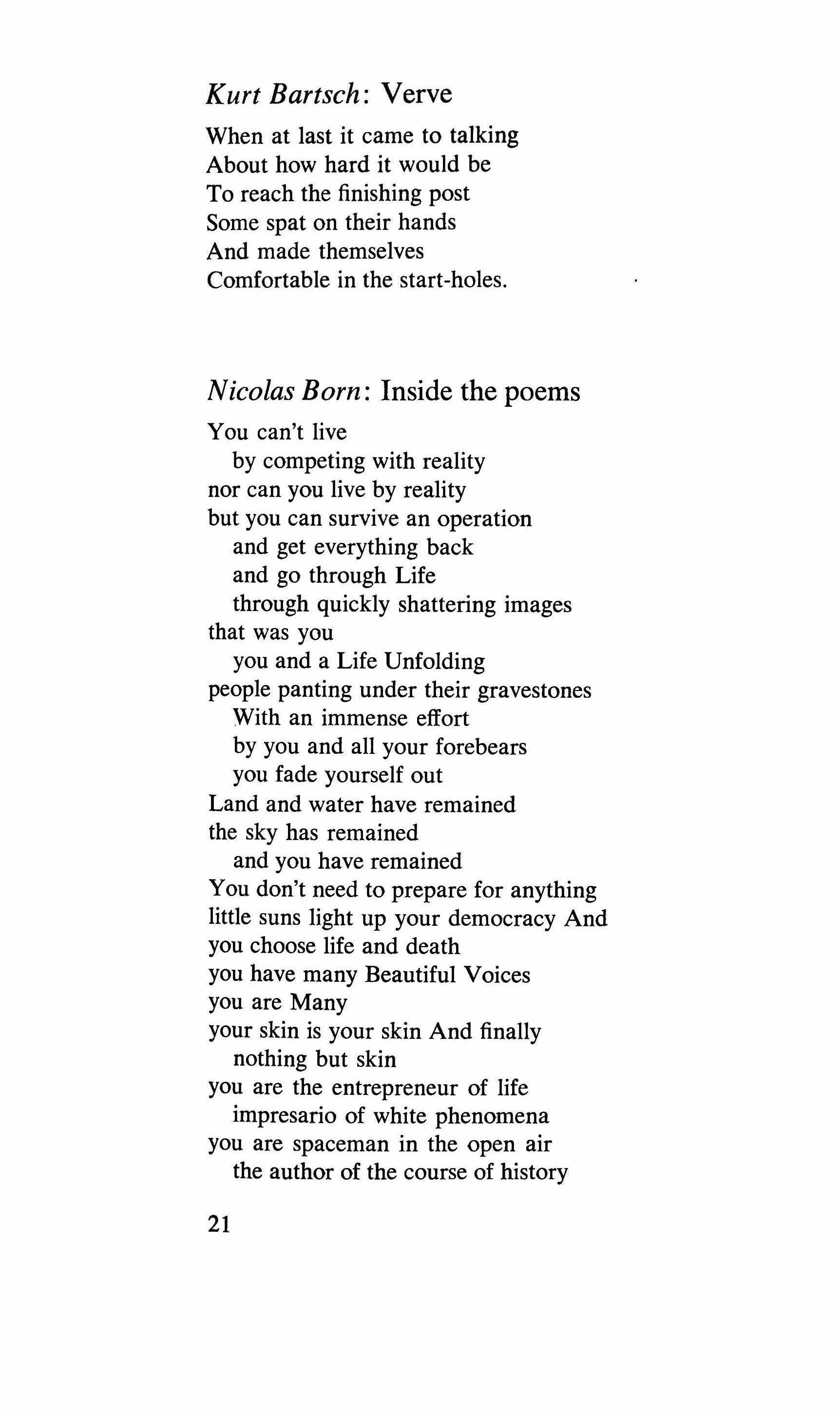
When at last it came to talking About how hard it would be To reach the finishing post Some spat on their hands And made themselves Comfortable in the start-holes.
You can't live by competing with reality nor can you live by reality but you can survive an operation and get everything back and go through Life through quickly shattering images that was you you and a Life Unfolding people panting under their gravestones With an immense effort by you and all your forebears you fade yourself out Land and water have remained the sky has remained and you have remained You don't need to prepare for anything little suns light up your democracy And you choose life and death you have many Beautiful Voices you are Many your skin is your skin And finally nothing but skin you are the entrepreneur of life impresario of white phenomena you are spaceman in the open air the author of the course of history
21
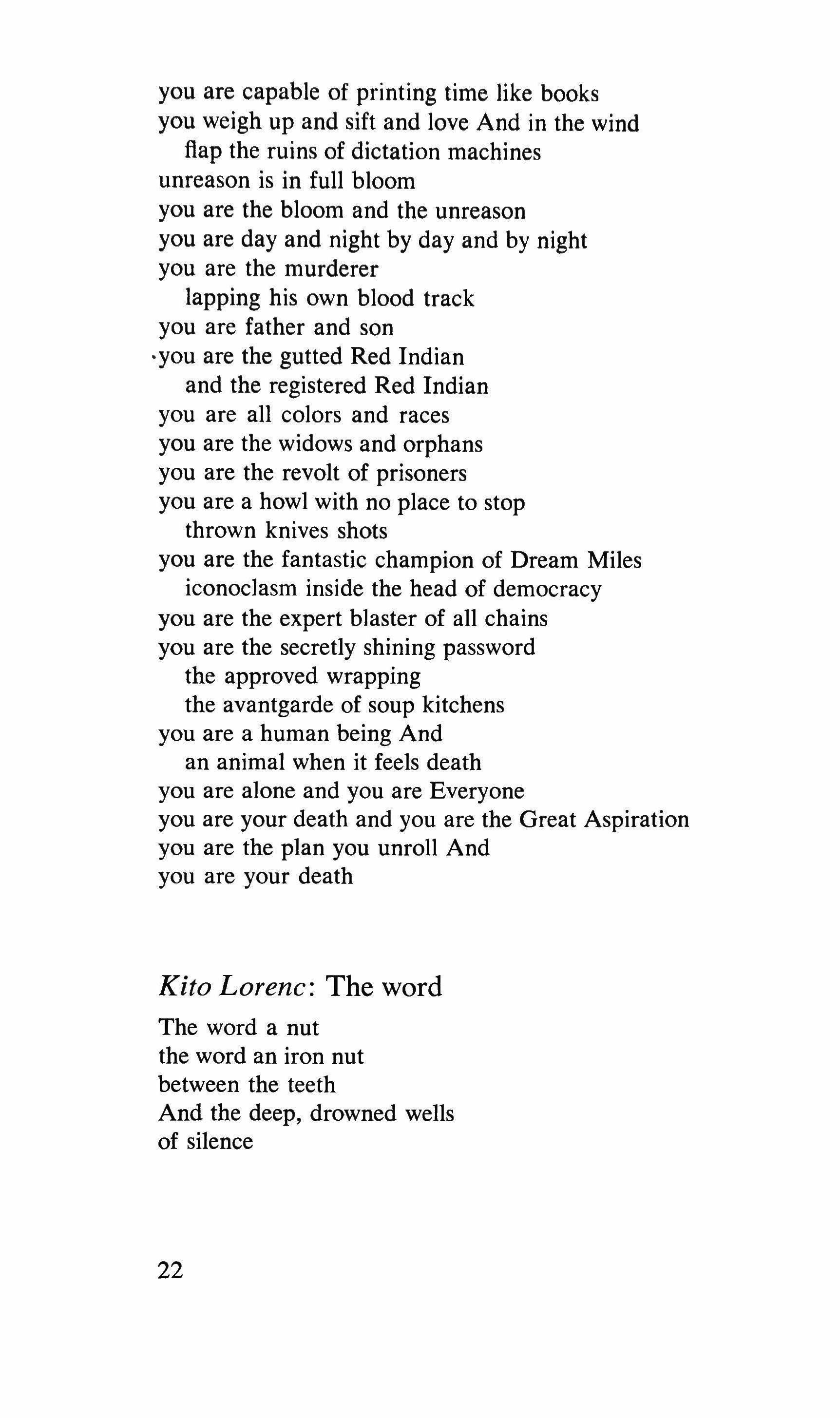
you are capable of printing time like books you weigh up and sift and love And in the wind flap the ruins of dictation machines
unreason is in full bloom
you are the bloom and the unreason
you are day and night by day and by night
you are the murderer
lapping his own blood track
you are father and son
you are the gutted Red Indian and the registered Red Indian
you are all colors and races
you are the widows and orphans
you are the revolt of prisoners
you are a howl with no place to stop thrown knives shots
you are the fantastic champion of Dream Miles iconoclasm inside the head of democracy
you are the expert blaster of all chains you are the secretly shining password the approved wrapping the avantgarde of soup kitchens
you are a human being And an animal when it feels death
you are alone and you are Everyone
you are your death and you are the Great Aspiration you are the plan you unroll And you are your death
The word a nut the word an iron nut between the teeth
And the deep, drowned wells of silence
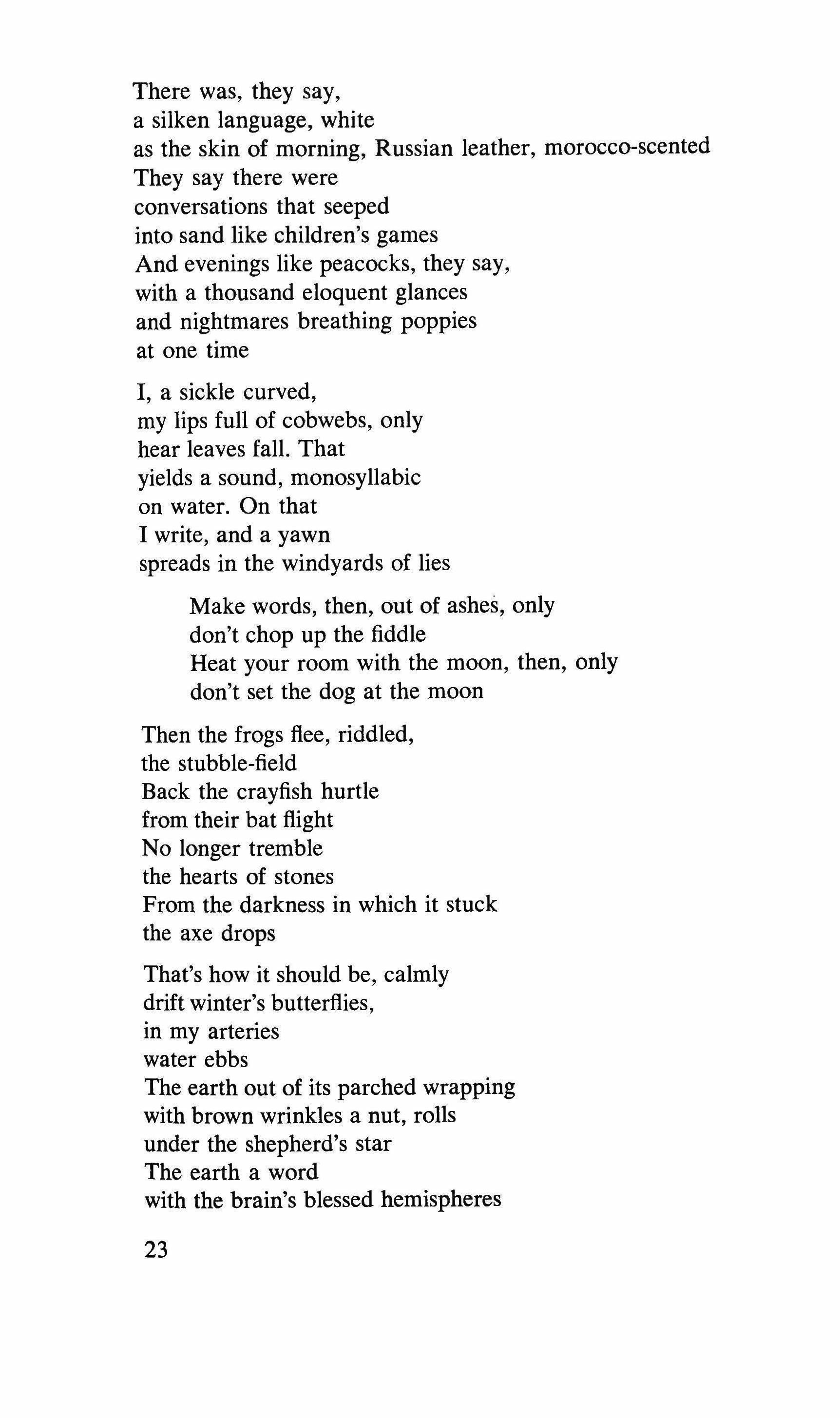
There was, they say, a silken language, white as the skin of morning, Russian leather, morocco-scented
They say there were conversations that seeped into sand like children's games
And evenings like peacocks, they say, with a thousand eloquent glances and nightmares breathing poppies at one time
I, a sickle curved, my lips full of cobwebs, only hear leaves fall. That yields a sound, monosyllabic on water. On that I write, and a yawn spreads in the windyards of lies
Make words, then, out of ashes, only don't chop up the fiddle
Heat your room with the moon, then, only don't set the dog at the moon
Then the frogs flee, riddled, the stubble-field
Back the crayfish hurtle from their bat flight
No longer tremble the hearts of stones
From the darkness in which it stuck the axe drops
That's how it should be, calmly drift winter's butterflies, in my arteries water ebbs
The earth out of its parched wrapping with brown wrinkles a nut, rolls under the shepherd's star
The earth a word with the brain's blessed hemispheres
in its shell, rough and this delicious taste of nuts that now becomes unforgettable
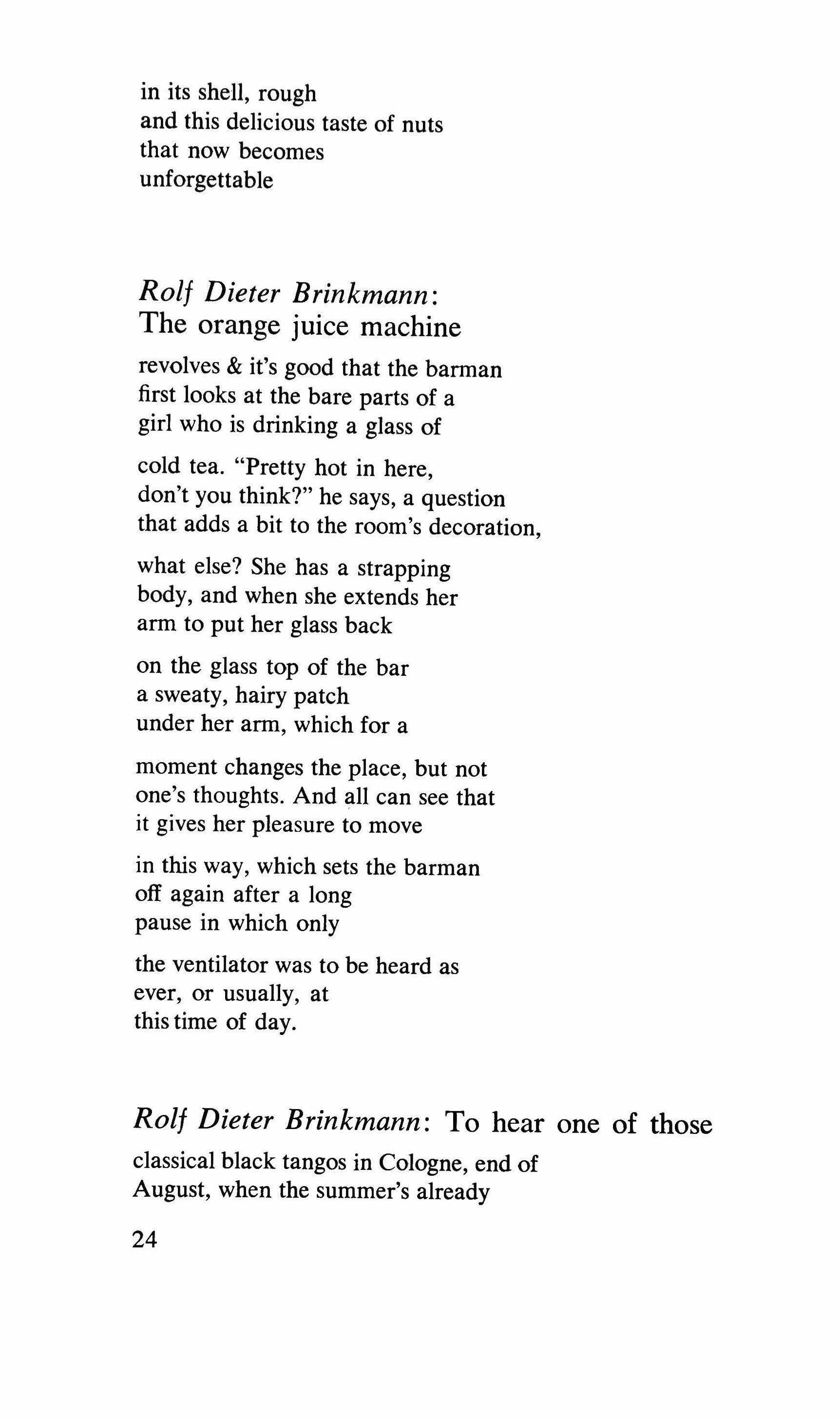
Rolf Dieter Brinkmann:
The orange juice machine revolves & it's good that the barman first looks at the bare parts of a girl who is drinking a glass of cold tea. "Pretty hot in here, don't you think?" he says, a question that adds a bit to the room's decoration, what else? She has a strapping body, and when she extends her arm to put her glass back on the glass top of the bar a sweaty, hairy patch under her arm, which for a moment changes the place, but not one's thoughts. And all can see that it gives her pleasure to move in this way, which sets the barman off again after a long pause in which only the ventilator was to be heard as ever, or usually, at this time of day.
Rolf Dieter Brinkmann: To hear one of those classical black tangos in Cologne, end of August, when the summer's already 24
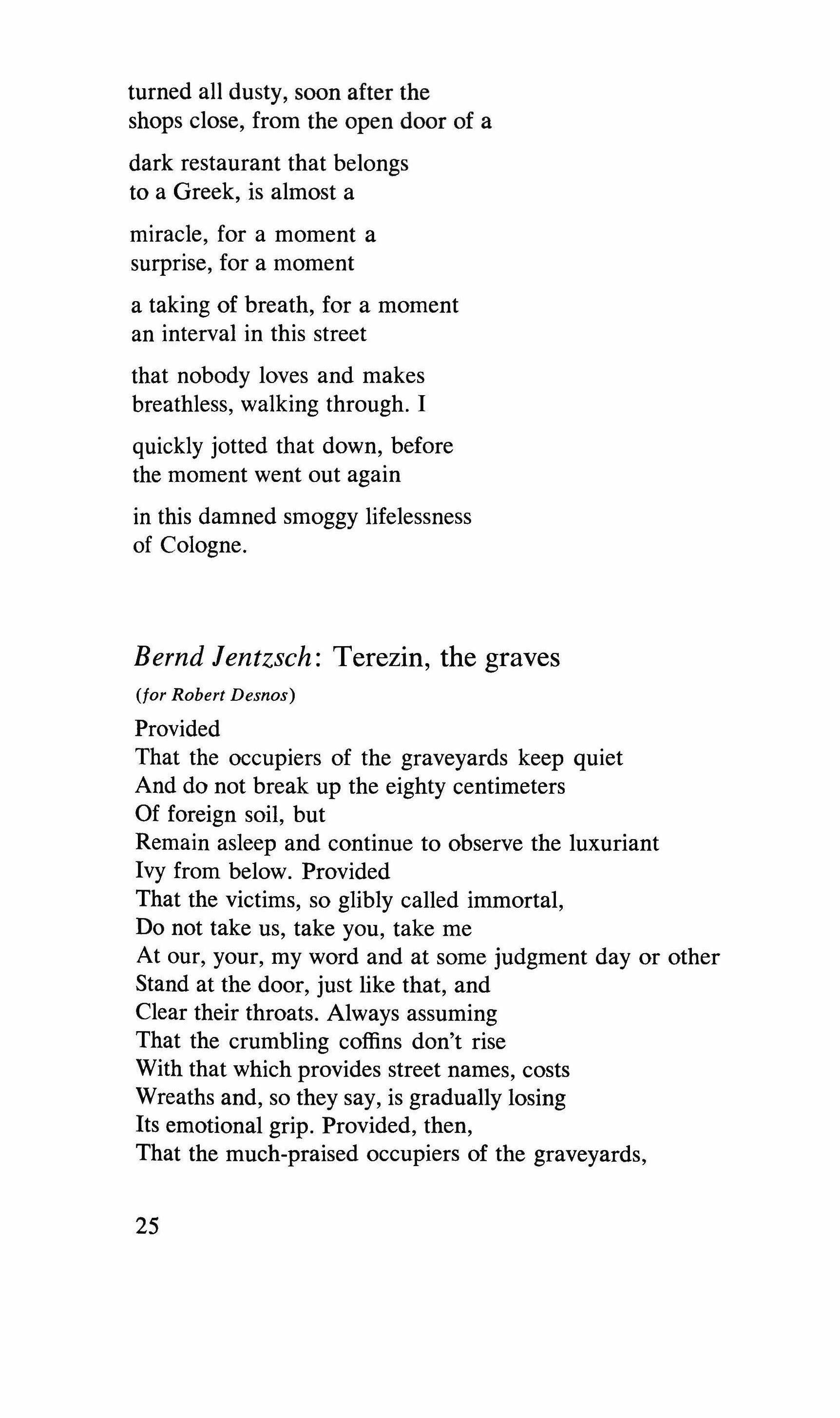
turned all dusty, soon after the shops close, from the open door of a dark restaurant that belongs to a Greek, is almost a miracle, for a moment a surprise, for a moment a taking of breath, for a moment an interval in this street that nobody loves and makes breathless, walking through. I quickly jotted that down, before the moment went out again in this damned smoggy lifelessness of Cologne.
(for Robert Desnos)
Provided That the occupiers of the graveyards keep quiet And do not break up the eighty centimeters Of foreign soil, but Remain asleep and continue to observe the luxuriant Ivy from below. Provided That the victims, so glibly called immortal, Do not take us, take you, take me At our, your, my word and at some judgment day or other Stand at the door, just like that, and Clear their throats. Always assuming That the crumbling coffins don't rise With that which provides street names, costs Wreaths and, so they say, is gradually losing Its emotional grip. Provided, then, That the much-praised occupiers of the graveyards,
In view of the flawless coaches, Keep really quiet, I cry: That one, By his hands and feet Seize him. One, And that is too many, one Stands here and is not Moved, on the whole, Decidedly has forgotten It all.
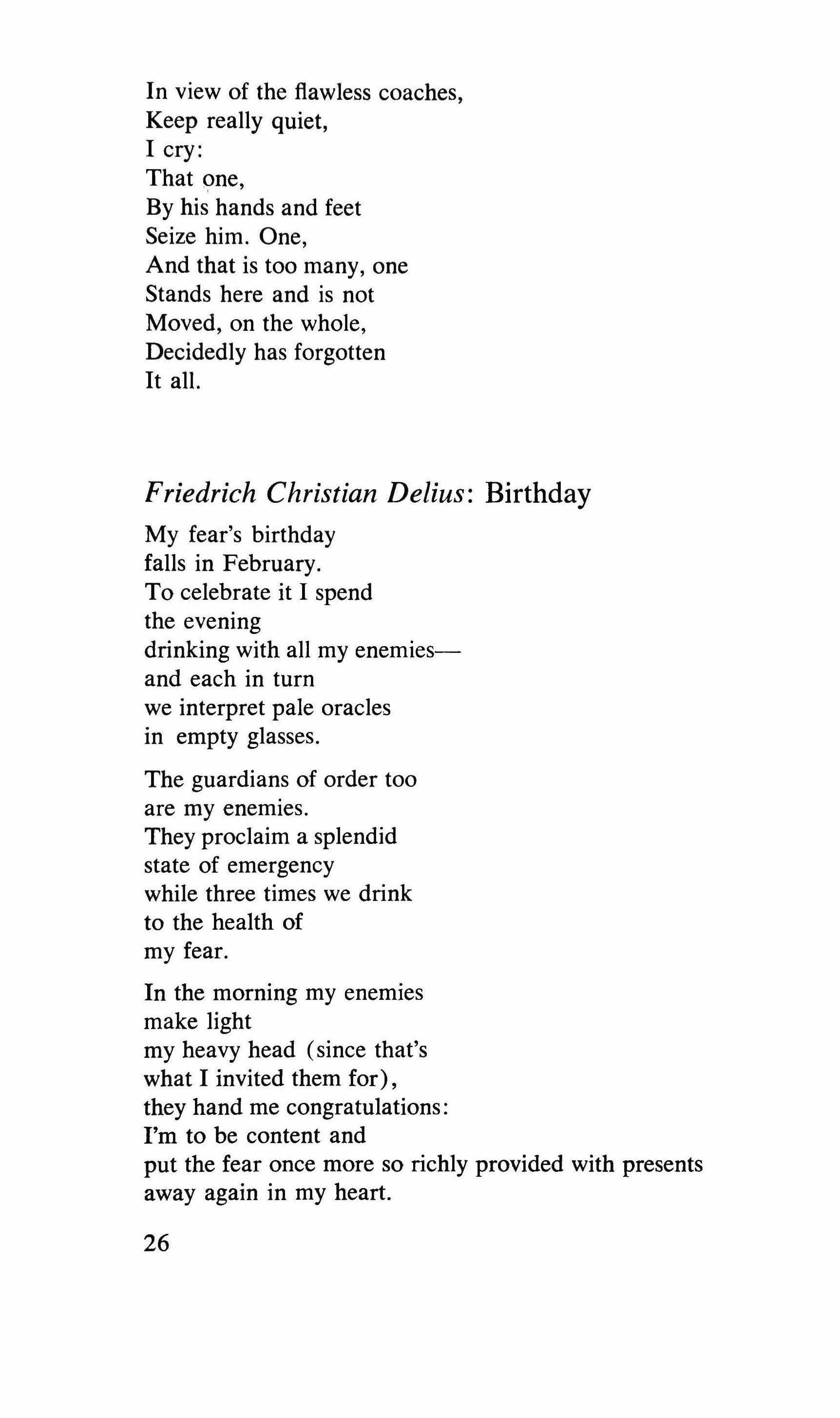 Friedrich Christian Delius: Birthday
Friedrich Christian Delius: Birthday
My fear's birthday falls in February. To celebrate it I spend the evening drinking with all my enemiesand each in turn we interpret pale oracles in empty glasses.
The guardians of order too are my enemies. They proclaim a splendid state of emergency while three times we drink to the health of my fear.
In the morning my enemies make light my heavy head (since that's what I invited them for), they hand me congratulations: I'm to be content and put the fear once more so richly provided with presents away again in my heart. 26
Friedrich Christian Delius: Poem for catsDusk is the hour of cats: they exhale the day, slink blackly across the road, play railway trains with their eyes.
Cats carry the moon away. They speak in images, laugh at mischief on roofs, make fun of the aging wind.
Their bird hunt has been postponed, cats know what's right. They assault my house of cards, gulp down my letters unread.
I write: we ought to praise cats at the hour of dusk.
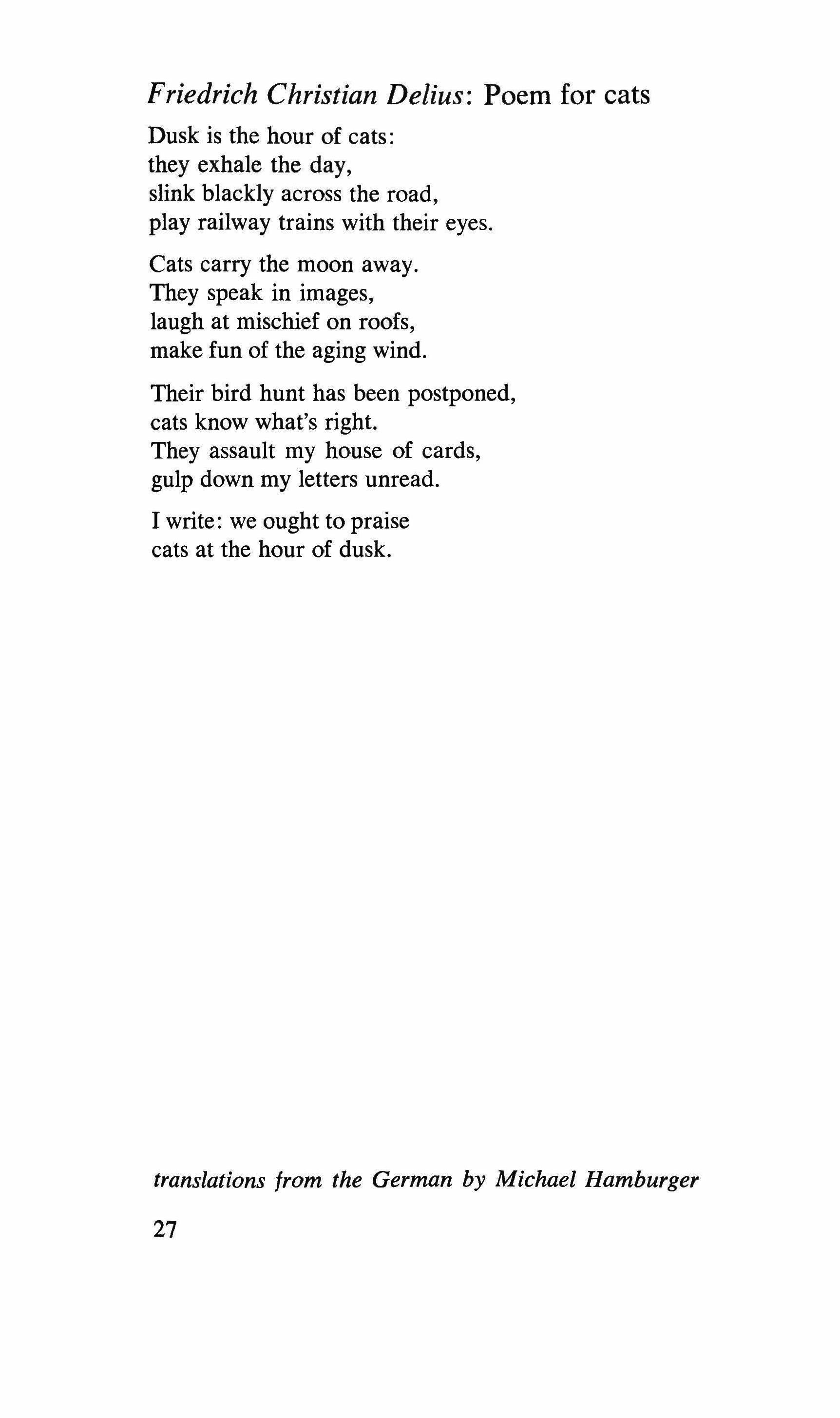
translations from the German by Michael Hamburger 27
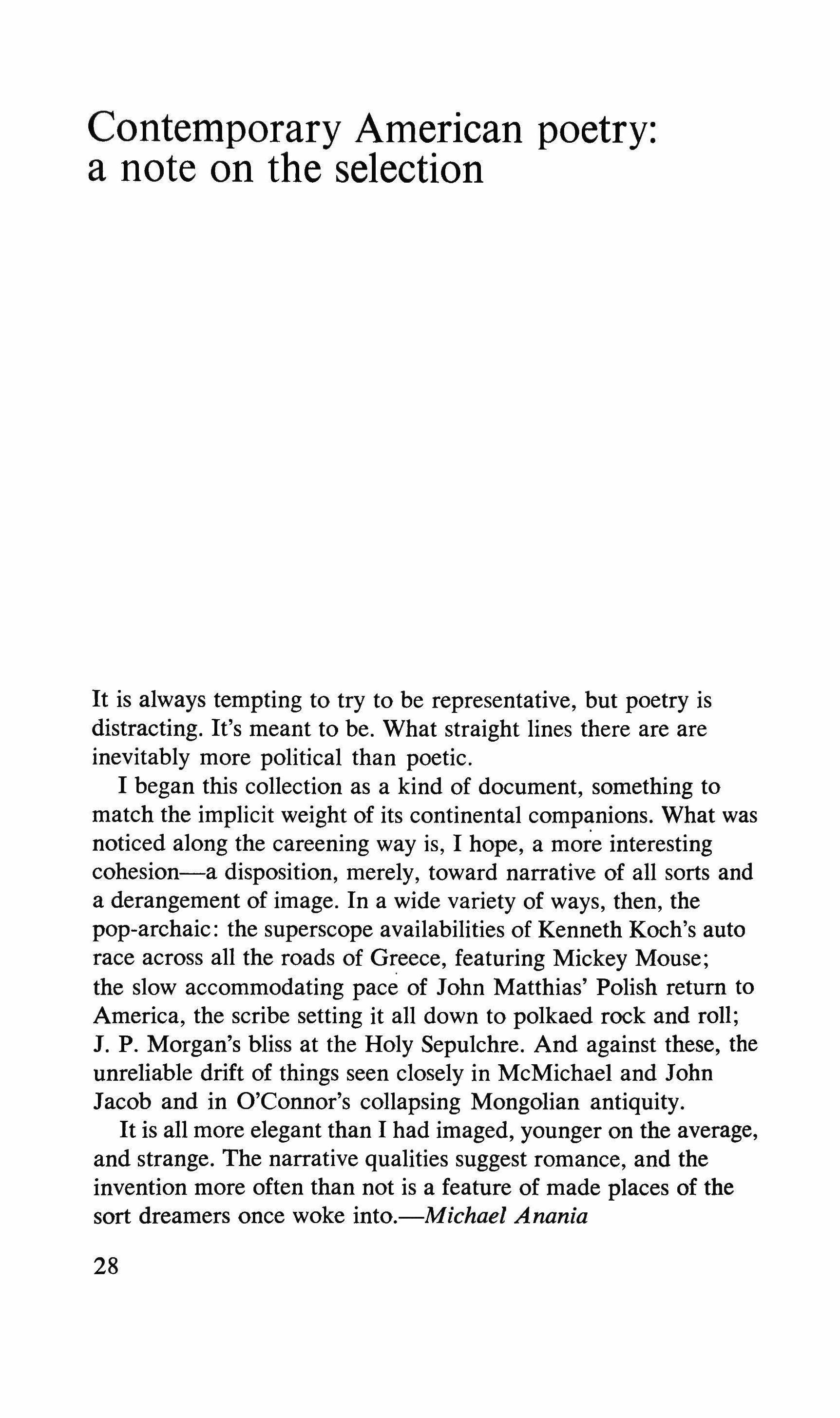
It is always tempting to try to be representative, but poetry is distracting. It's meant to be. What straight lines there are are inevitably more political than poetic.
I began this collection as a kind of document, something to match the implicit weight of its continental companions. What was noticed along the careening way is, I hope, a more interesting cohesion-a disposition, merely, toward narrative of all sorts and a derangement of image. In a wide variety of ways, then, the pop-archaic: the superscope availabilities of Kenneth Koch's auto race across all the roads of Greece, featuring Mickey Mouse; the slow accommodating pace of John Matthias' Polish return to America, the scribe setting it all down to polkaed rock and roll; J. P. Morgan's bliss at the Holy Sepulchre. And against these, the unreliable drift of things seen closely in McMichael and John Jacob and in O'Connor's collapsing Mongolian antiquity.
It is all more elegant than I had imaged, younger on the average, and strange. The narrative qualities suggest romance, and the invention more often than not is a feature of made places of the sort dreamers once woke into.-Michael Anania
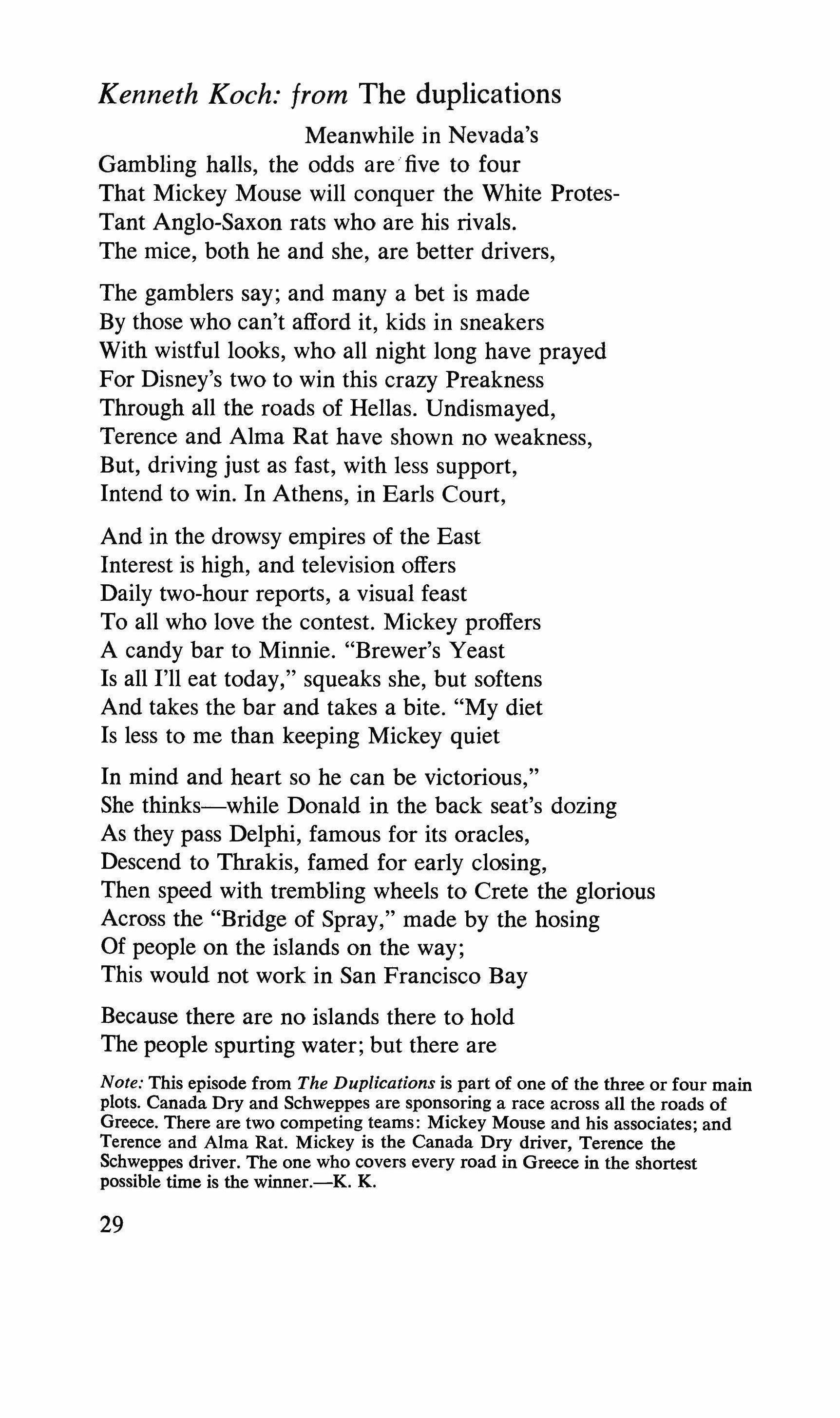
Meanwhile in Nevada's Gambling halls, the odds are five to four That Mickey Mouse will conquer the White ProtesTant Anglo-Saxon rats who are his rivals. The mice, both he and she, are better drivers,
The gamblers say; and many a bet is made By those who can't afford it, kids in sneakers With wistful looks, who all night long have prayed For Disney's two to win this crazy Preakness
Through all the roads of Hellas. Undismayed, Terence and Alma Rat have shown no weakness, But, driving just as fast, with less support, Intend to win. In Athens, in Earls Court,
And in the drowsy empires of the East Interest is high, and television offers Daily two-hour reports, a visual feast
To all who love the contest. Mickey proffers A candy bar to Minnie. "Brewer's Yeast Is all I'll eat today," squeaks she, but softens And takes the bar and takes a bite. "My diet Is less to me than keeping Mickey quiet
In mind and heart so he can be victorious," She thinks-while Donald in the back seat's dozing
As they pass Delphi, famous for its oracles, Descend to Thrakis, famed for early closing, Then speed with trembling wheels to Crete the glorious Across the "Bridge of Spray," made by the hosing Of people on the islands on the way; This would not work in San Francisco Bay
Because there are no islands there to hold The people spurting water; but there are
Note: This episode from The Duplications is part of one of the three or four main plots. Canada Dry and Schweppes are sponsoring a race across all the roads of Greece. There are two competing teams: Mickey Mouse and his associates; and Terence and Alma Rat. Mickey is the Canada Dry driver, Terence the Schweppes driver. The one who covers every road in Greece in the shortest possible time is the winner.-K. K.
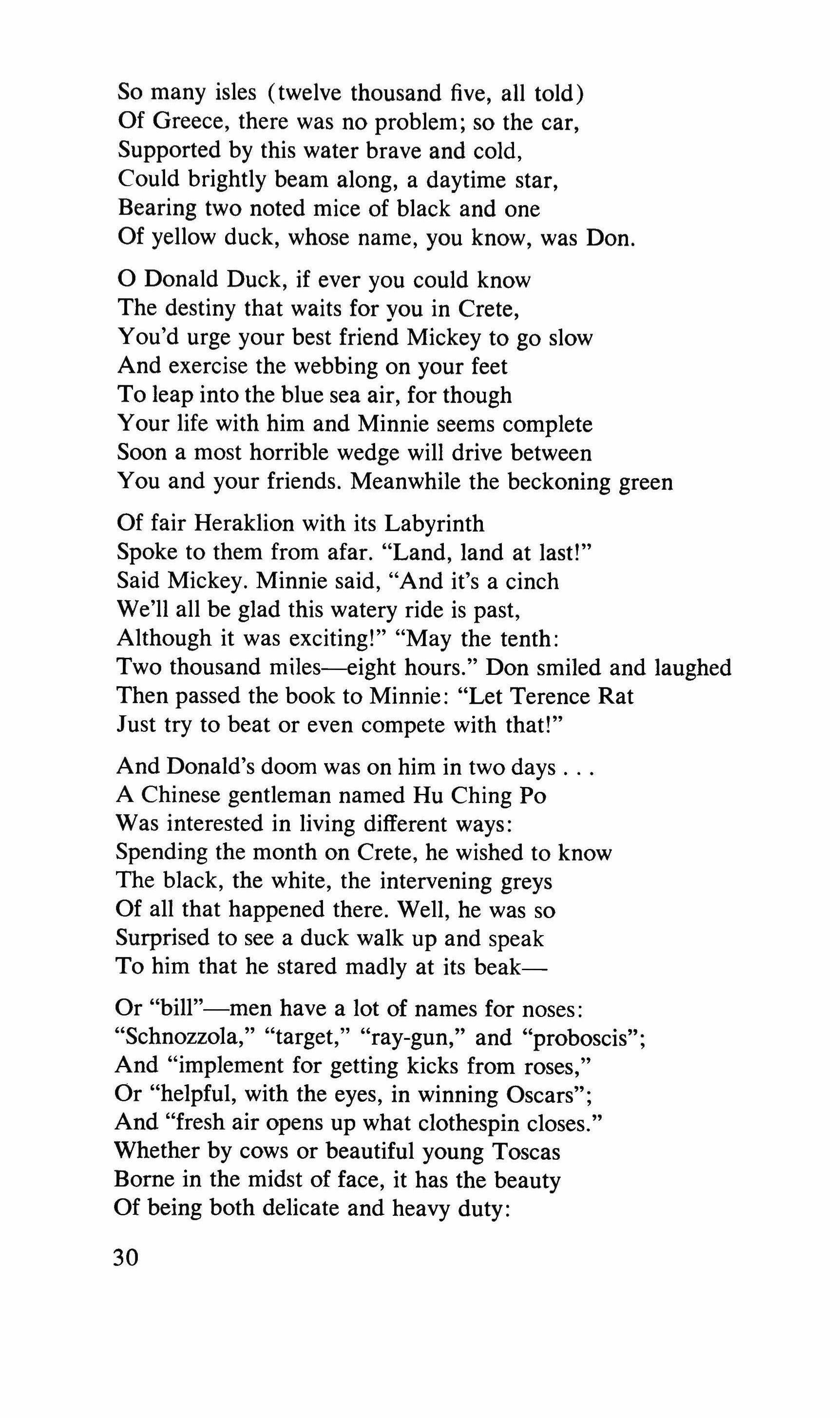
So many isles (twelve thousand five, all told)
Of Greece, there was no problem; so the car, Supported by this water brave and cold, Could brightly beam along, a daytime star, Bearing two noted mice of black and one Of yellow duck, whose name, you know, was Don.
o Donald Duck, if ever you could know The destiny that waits for you in Crete, You'd urge your best friend Mickey to go slow And exercise the webbing on your feet
To leap into the blue sea air, for though Your life with him and Minnie seems complete Soon a most horrible wedge will drive between You and your friends. Meanwhile the beckoning green
Of fair Heraklion with its Labyrinth Spoke to them from afar. "Land, land at last!"
Said Mickey. Minnie said, "And it's a cinch We'll all be glad this watery ride is past, Although it was exciting!" "May the tenth: Two thousand miles-eight hours." Don smiled and laughed Then passed the book to Minnie: "Let Terence Rat Just try to beat or even compete with that!"
And Donald's doom was on him in two days
A Chinese gentleman named Hu Ching Po Was interested in living different ways: Spending the month on Crete, he wished to know
The black, the white, the intervening greys
Of all that happened there. Well, he was so Surprised to see a duck walk up and speak To him that he stared madly at its beak-
Or "bill"-men have a lot of names for noses: "Schnozzola," "target," "ray-gun," and "proboscis"; And "implement for getting kicks from roses," Or "helpful, with the eyes, in winning Oscars"; And "fresh air opens up what clothespin closes."
Whether by cows or beautiful young Toscas Borne in the midst of face, it has the beauty Of being both delicate and heavy duty:
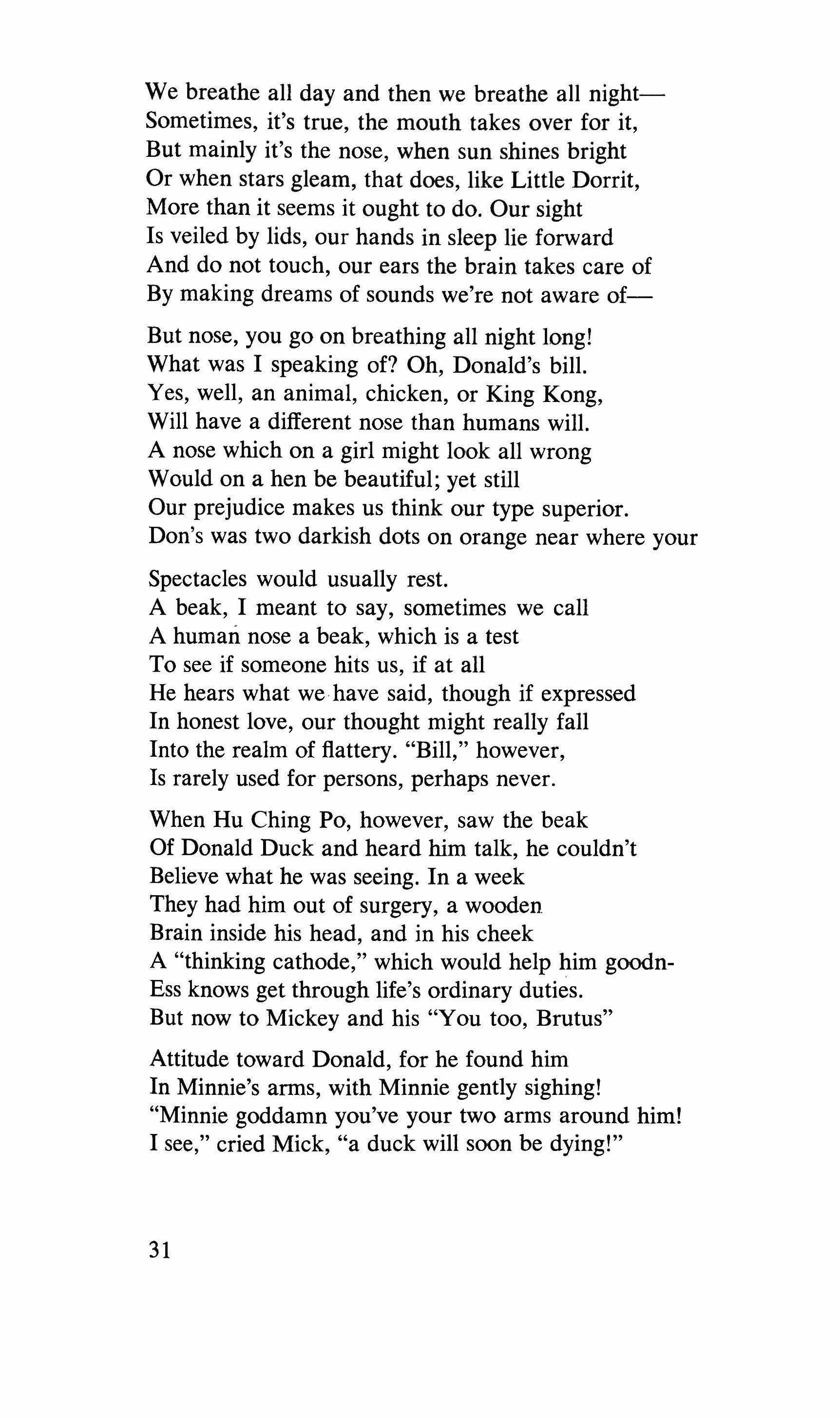
We breathe all day and then we breathe all night
Sometimes, it's true, the mouth takes over for it, But mainly it's the nose, when sun shines bright Or when stars gleam, that does, like Little Dorrit, More than it seems it ought to do. Our sight Is veiled by lids, our hands in sleep lie forward And do not touch, our ears the brain takes care of By making dreams of sounds we're not aware of-
But nose, you go on breathing all night long! What was I speaking of? Oh, Donald's bill. Yes, well, an animal, chicken, or King Kong, Will have a different nose than humans will.
A nose which on a girl might look all wrong Would on a hen be beautiful; yet still Our prejudice makes us think our type superior. Don's was two darkish dots on orange near where your Spectacles would usually rest.
A beak, I meant to say, sometimes we call A human nose a beak, which is a test To see if someone hits us, if at all He hears what we have said, though if expressed In honest love, our thought might really fall Into the realm of flattery. "Bill," however, Is rarely used for persons, perhaps never.
When Hu Ching Po, however, saw the beak Of Donald Duck and heard him talk, he couldn't Believe what he was seeing. In a week They had him out of surgery, a wooden Brain inside his head, and in his cheek
A "thinking cathode," which would help him goodnEss knows get through life's ordinary duties. But now to Mickey and his "You too, Brutus"
Attitude toward Donald, for he found him In Minnie's arms, with Minnie gently sighing! "Minnie goddamn you've your two arms around him! I see," cried Mick, "a duck will soon be dying!"
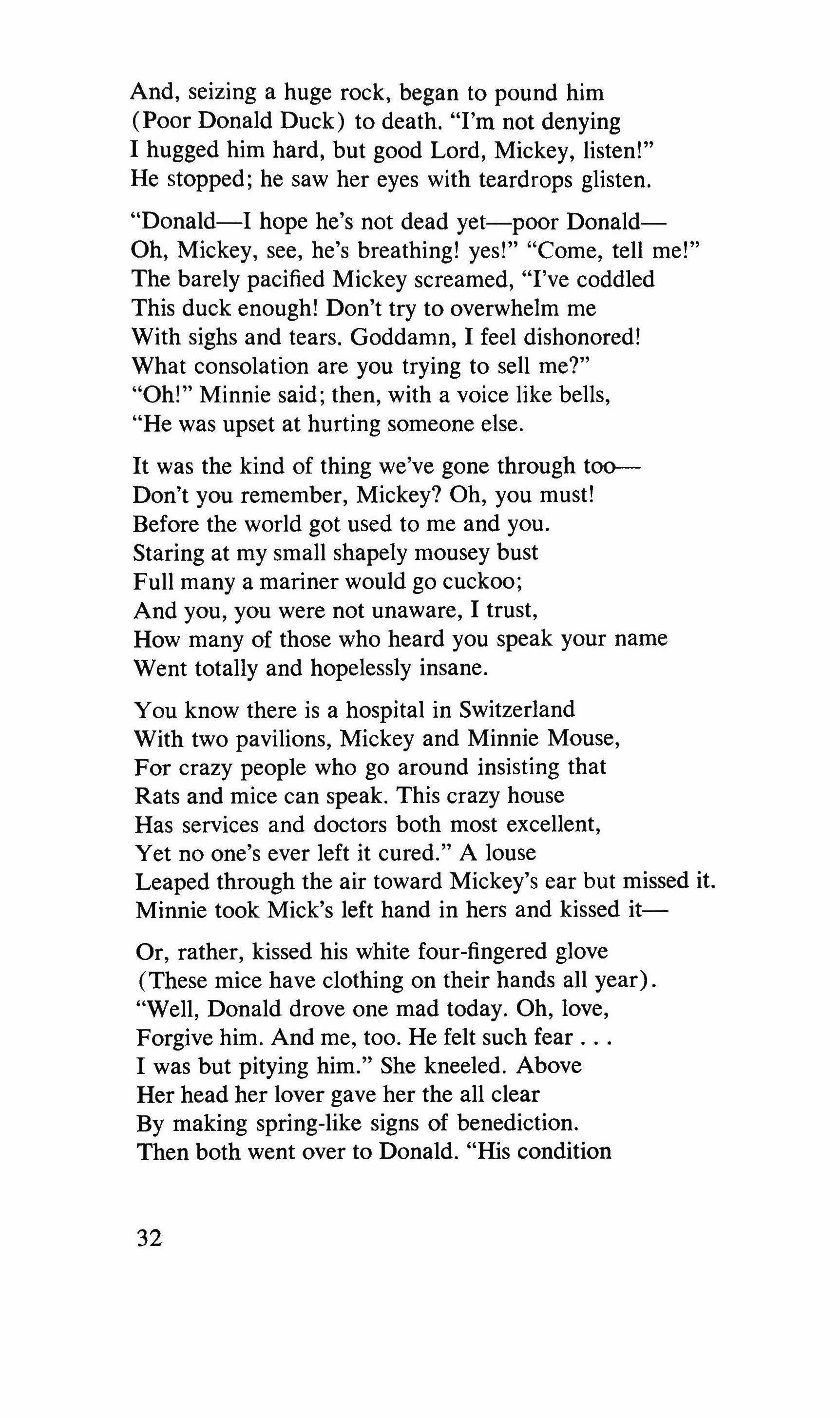
And, seizing a huge rock, began to pound him (Poor Donald Duck) to death. "I'm not denying I hugged him hard, but good Lord, Mickey, listen!" He stopped; he saw her eyes with teardrops glisten.
"Donald-I hope he's not dead yet-poor DonaldOh, Mickey, see, he's breathing! yes!" "Come, tell me!" The barely pacified Mickey screamed, "I've coddled This duck enough! Don't try to overwhelm me With sighs and tears. Goddamn, I feel dishonored! What consolation are you trying to sell me?"
"Oh!" Minnie said; then, with a voice like bells, "He was upset at hurting someone else.
It was the kind of thing we've gone through tooDon't you remember, Mickey? Oh, you must! Before the world got used to me and you. Staring at my small shapely mousey bust Full many a mariner would go cuckoo; And you, you were not unaware, I trust, How many of those who heard you speak your name Went totally and hopelessly insane.
You know there is a hospital in Switzerland With two pavilions, Mickey and Minnie Mouse, For crazy people who go around insisting that Rats and mice can speak. This crazy house Has services and doctors both most excellent, Yet no one's ever left it cured." A louse
Leaped through the air toward Mickey's ear but missed it. Minnie took Mick's left hand in hers and kissed it-
Or, rather, kissed his white four-fingered glove (These mice have clothing on their hands all year).
"Well, Donald drove one mad today. Oh, love, Forgive him. And me, too. He felt such fear I was but pitying him." She kneeled. Above Her head her lover gave her the all clear By making spring-like signs of benediction. Then both went over to Donald. "His condition
Is grave," said Mickey. "He may really die. We've got to find a topflight veterinarian, And soon!"
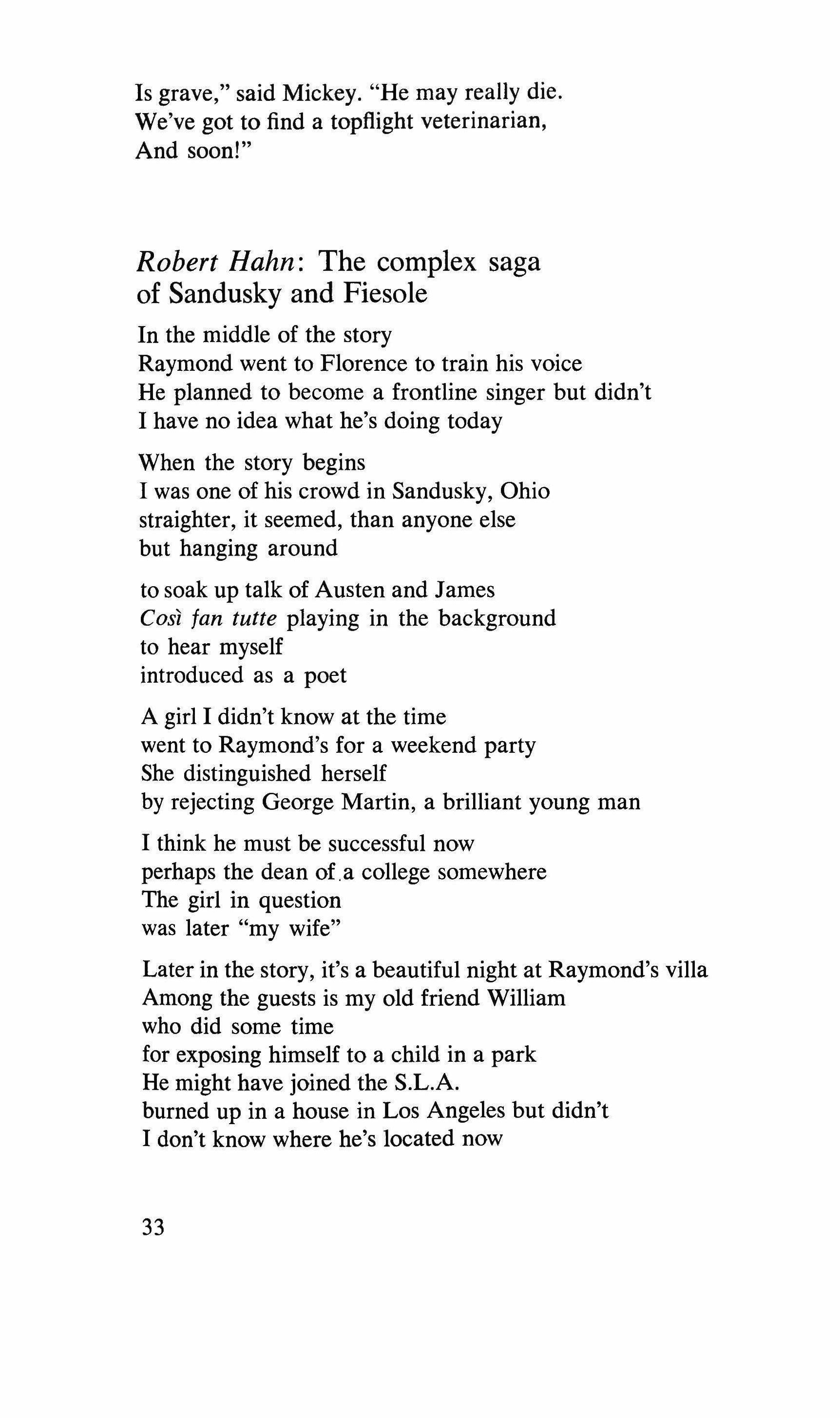
Robert Hahn: The complex saga of Sandusky and Fiesole
In the middle of the story
Raymond went to Florence to train his voice He planned to become a frontline singer but didn't I have no idea what he's doing today
When the story begins
I was one of his crowd in Sandusky, Ohio straighter, it seemed, than anyone else but hanging around
to soak up talk of Austen and James COSl fan tutte playing in the background to hear myself introduced as a poet
A girl I didn't know at the time went to Raymond's for a weekend party She distinguished herself by rejecting George Martin, a brilliant young man
I think he must be successful now perhaps the dean of.a college somewhere The girl in question was later "my wife"
Later in the story, it's a beautiful night at Raymond's villa
Among the guests is myoId friend William who did some time for exposing himself to a child in a park He might have joined the S.L.A. burned up in a house in Los Angeles but didn't I don't know where he's located now
When I figure out that Raymond and William have fucked each other it shocks only me
In the course of the evening
I hear my wife and her friend Elaine speaking of James and Austen: years later my wife will say you let her fall in love with you
I may have done that It's sure that Elaine, who should have written a novel somewhere, didn't answer our letters
I'm trying to put these matters in perspective as in those days we could see from Raymond's veranda in Fiesole olive groves in the middle distance green and silver through a fine blue haze
But in this landscape there are too many figures I am the one you can just make out over the barely suggested fence

Robert Hahn: It is the appearance we love
1
Is there a ghost in the machine? We love the machine's ghostliness when the moon glints on its surfaces The mysterious beauty of its construction
2 Plato is wrong Ephemeral earth forms are paradigms; ideal abstractions the copies
A woman in a white dress is dancing, her breasts, loosened, moving to one beat, her feet to another, her hips

like nothing else in the world
There are many representations of the woman but in them she degenerates, to a proof of her perfection's idea
3
Old graveyards are elegant, their thin grey stones their mottoes, Traveler, free to stop all afternoon and read these mysteries, and kiss, beloved, behold how beautiful we appear
4
An old man crosses, too painfully slow to be a ghost, when the sign says WALK/what will I know when I arrive where he is having drowned in the appearance of light on water, sundown, moonrise, the same loved path leading nowhere
5 The error of the Apostle Paul: love not the things that are of this world I say love the flesh of the people of Corinth gathered in the square these late afternoons to hear his sermons love the tapered columns and the marble lanes Races to honor the dead were run here the horses, black and roan, streaming by in the light, riders bent to their task
6
"It's the anarchy of poverty/delights me" But all this beauty of rotting barns, the charming sculpture of junked farm machinery, is just the debris of individual collapse
So I conclude, driving south in the spring while the sun makes a joyful noise of color in heaps of wrecked cars
35
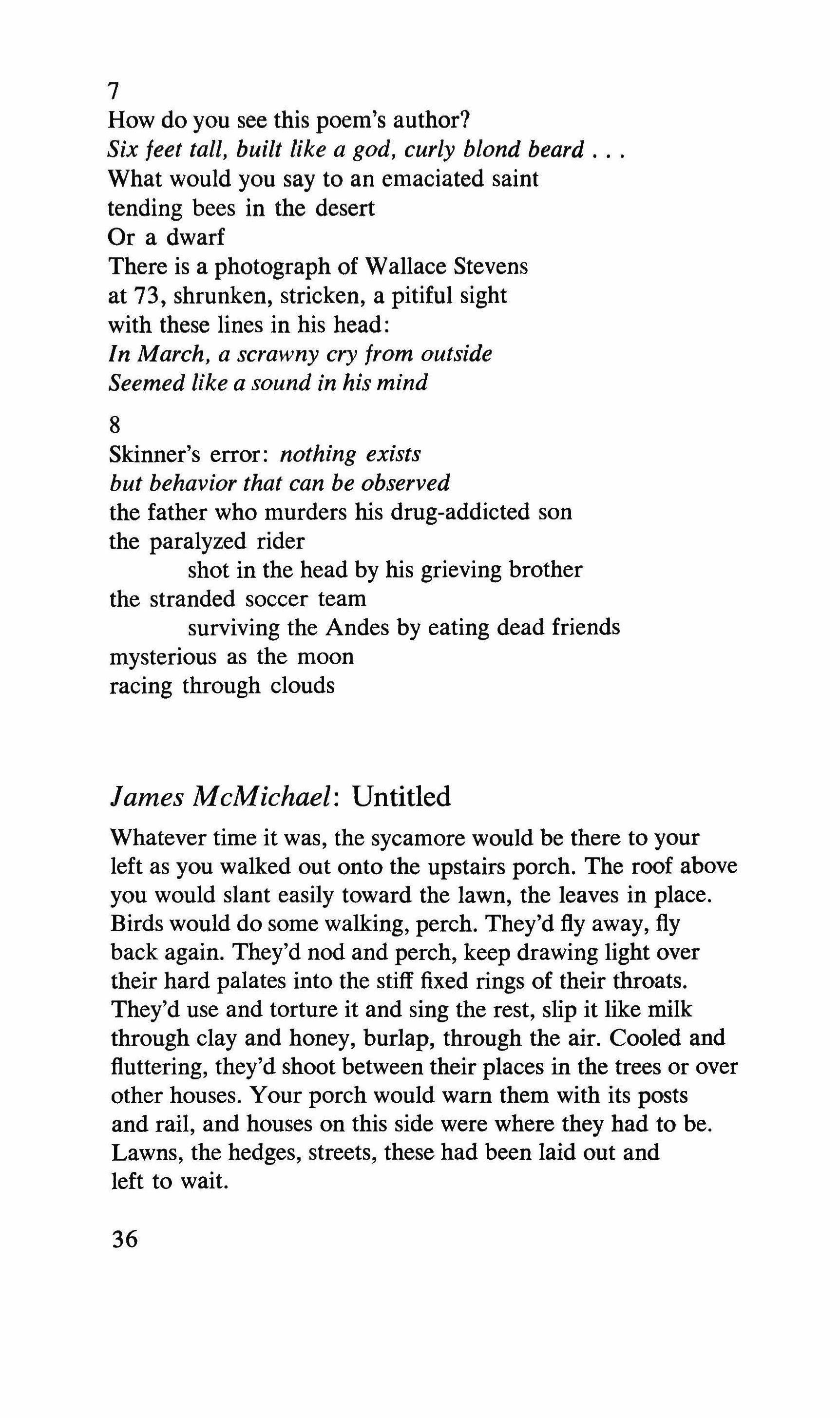
How do you see this poem's author?
Six feet tall, built like a god, curly blond beard
What would you say to an emaciated saint tending bees in the desert Or a dwarf
There is a photograph of Wallace Stevens at 73, shrunken, stricken, a pitiful sight with these lines in his head: In March, a scrawny cry from outside Seemed like a sound in his mind
8 Skinner's error: nothing exists but behavior that can be observed the father who murders his drug-addicted son the paralyzed rider shot in the head by his grieving brother the stranded soccer team surviving the Andes by eating dead friends mysterious as the moon racing through clouds
Whatever time it was, the sycamore would be there to your left as you walked out onto the upstairs porch. The roof above you would slant easily toward the lawn, the leaves in place. Birds would do some walking, perch. They'd flyaway, fly back again. They'd nod and perch, keep drawing light over their hard palates into the stiff fixed rings of their throats. They'd use and torture it and sing the rest, slip it like milk through clay and honey, burlap, through the air. Cooled and fluttering, they'd shoot between their places in the trees or over other houses. Your porch would warn them with its posts and rail, and houses on this side were where they had to be. Lawns, the hedges, streets, these had been laid out and left to wait.
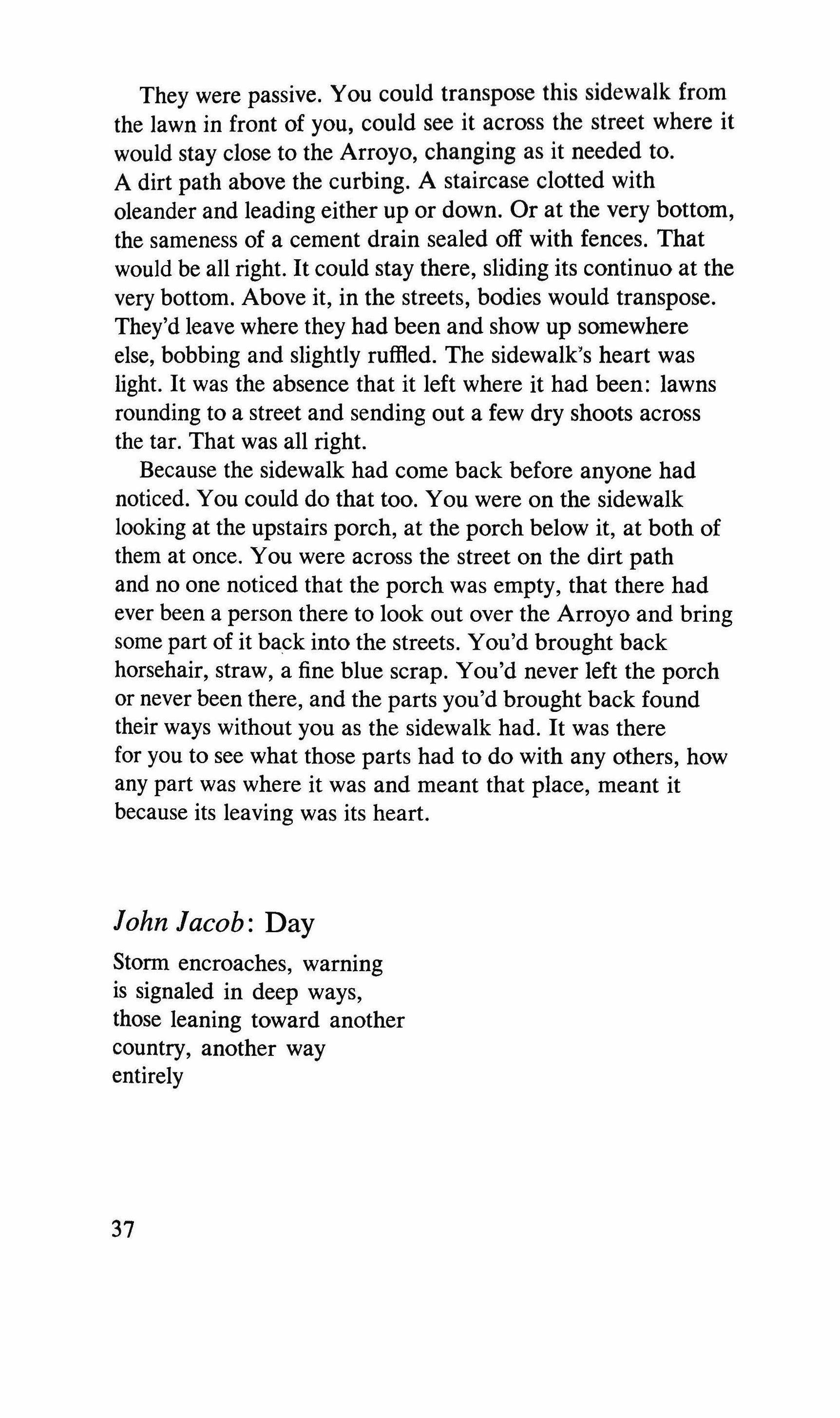
They were passive. You could transpose this sidewalk from the lawn in front of you, could see it across the street where it would stay close to the Arroyo, changing as it needed to. A dirt path above the curbing. A staircase clotted with oleander and leading either up or down. Or at the very bottom, the sameness of a cement drain sealed off with fences. That would be all right. It could stay there, sliding its continuo at the very bottom. Above it, in the streets, bodies would transpose. They'd leave where they had been and show up somewhere else, bobbing and slightly ruffled. The sidewalk's heart was light. It was the absence that it left where it had been: lawns rounding to a street and sending out a few dry shoots across the tar. That was all right.
Because the sidewalk had come back before anyone had noticed. You could do that too. You were on the sidewalk looking at the upstairs porch, at the porch below it, at both of them at once. You were across the street on the dirt path and no one noticed that the porch was empty, that there had ever been a person there to look out over the Arroyo and bring some part of it back into the streets. You'd brought back horsehair, straw, a fine blue scrap. You'd never left the porch or never been there, and the parts you'd brought back found their ways without you as the sidewalk had. It was there for you to see what those parts had to do with any others, how any part was where it was and meant that place, meant it because its leaving was its heart.
Storm encroaches, warning is signaled in deep ways, those leaning toward another country, another way entirely
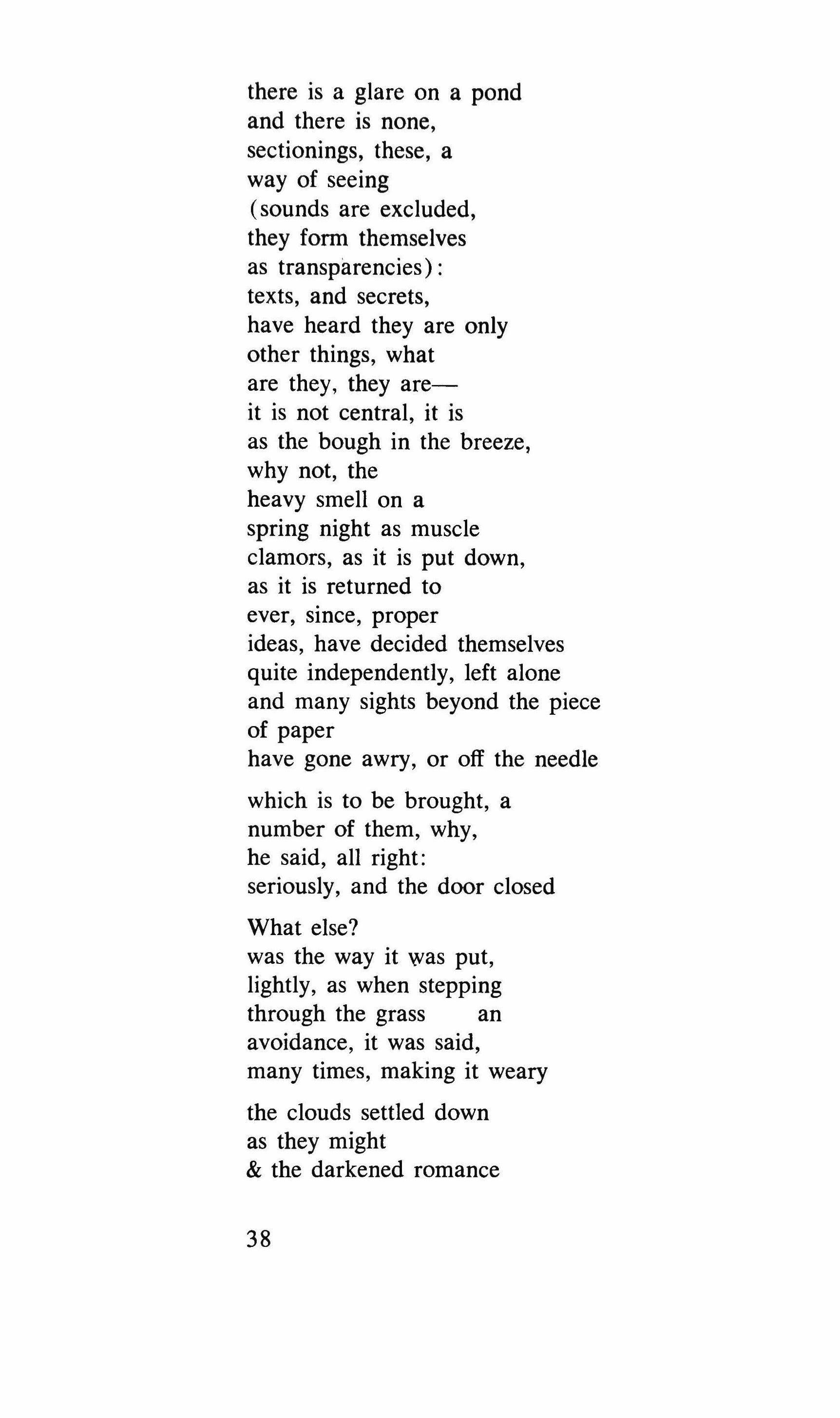
there is a glare on a pond and there is none, sectionings, these, a way of seeing (sounds are excluded, they form themselves as transparencies): texts, and secrets, have heard they are only other things, what are they, they areit is not central, it is as the bough in the breeze, why not, the heavy smell on a spring night as muscle clamors, as it is put down, as it is returned to ever, since, proper ideas, have decided themselves quite independently, left alone and many sights beyond the piece of paper have gone awry, or off the needle which is to be brought, a number of them, why, he said, all right: seriously, and the door closed
What else?
was the way it was put, lightly, as when stepping through the grass an avoidance, it was said, many times, making it weary the clouds settled down as they might & the darkened romance
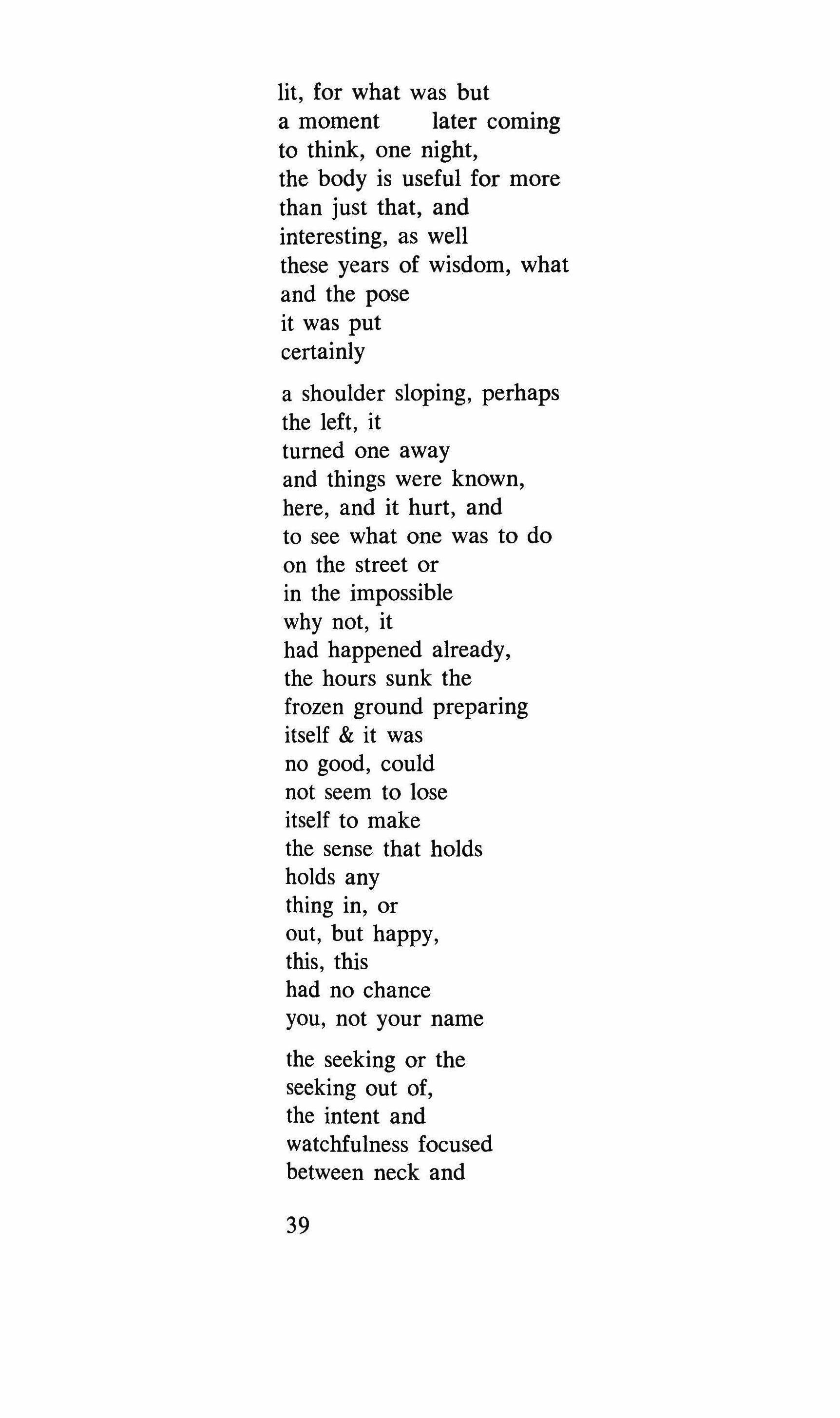
lit, for what was but a moment later coming to think, one night, the body is useful for more than just that, and interesting, as well these years of wisdom, what and the pose it was put certainly a shoulder sloping, perhaps the left, it turned one away and things were known, here, and it hurt, and to see what one was to do on the street or in the impossible why not, it had happened already, the hours sunk the frozen ground preparing itself & it was no good, could not seem to lose itself to make the sense that holds holds any thing in, or out, but happy, this, this had no chance you, not your name the seeking or the seeking out of, the intent and watchfulness focused between neck and
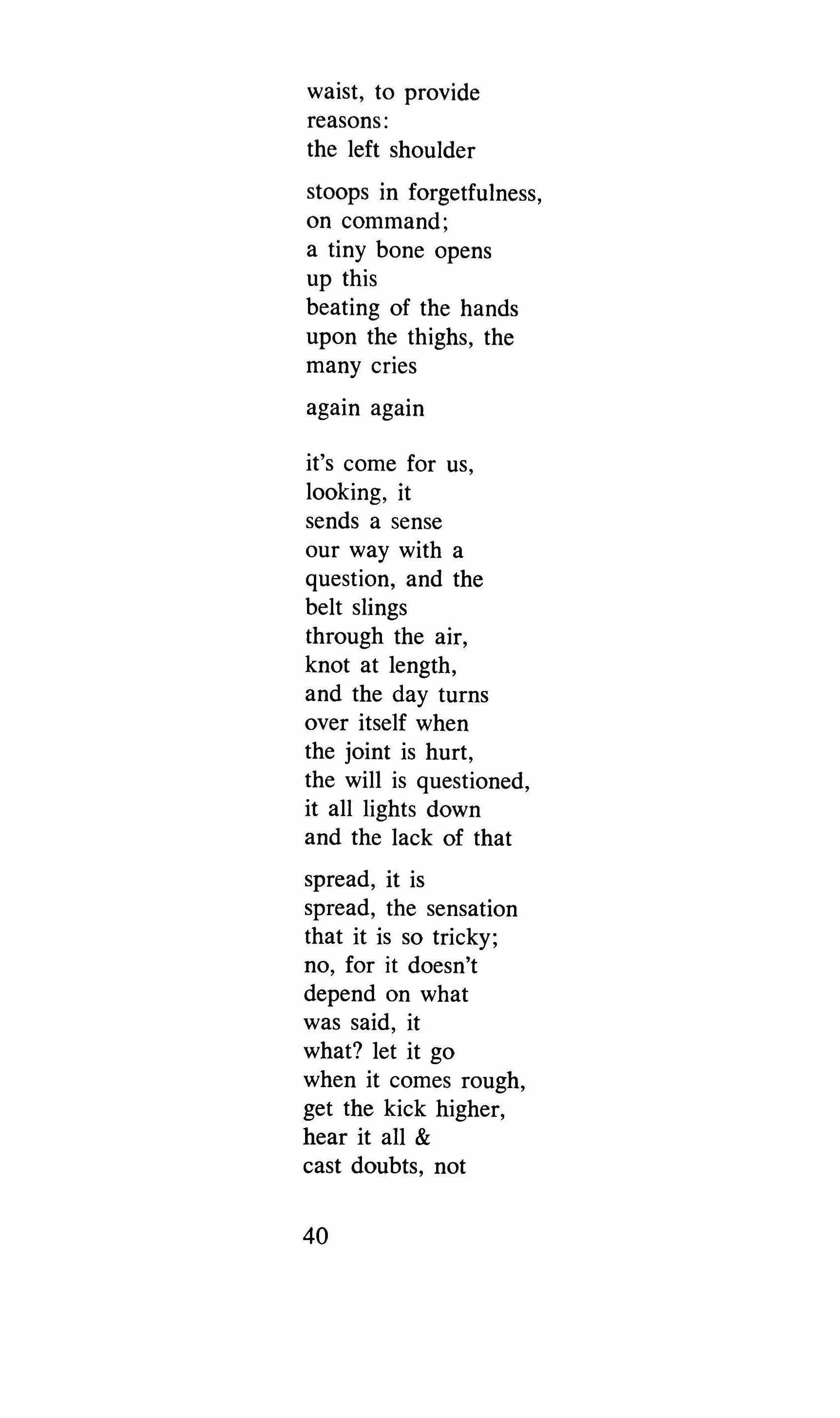
waist, to provide reasons: the left shoulder
stoops in forgetfulness, on command; a tiny bone opens up this beating of the hands upon the thighs, the many cries again again it's come for us, looking, it sends a sense our way with a question, and the belt slings through the air, knot at length, and the day turns over itself when the joint is hurt, the will is questioned, it all lights down and the lack of that spread, it is spread, the sensation that it is so tricky; no, for it doesn't depend on what was said, it what? let it go when it comes rough, get the kick higher, hear it all & cast doubts, not
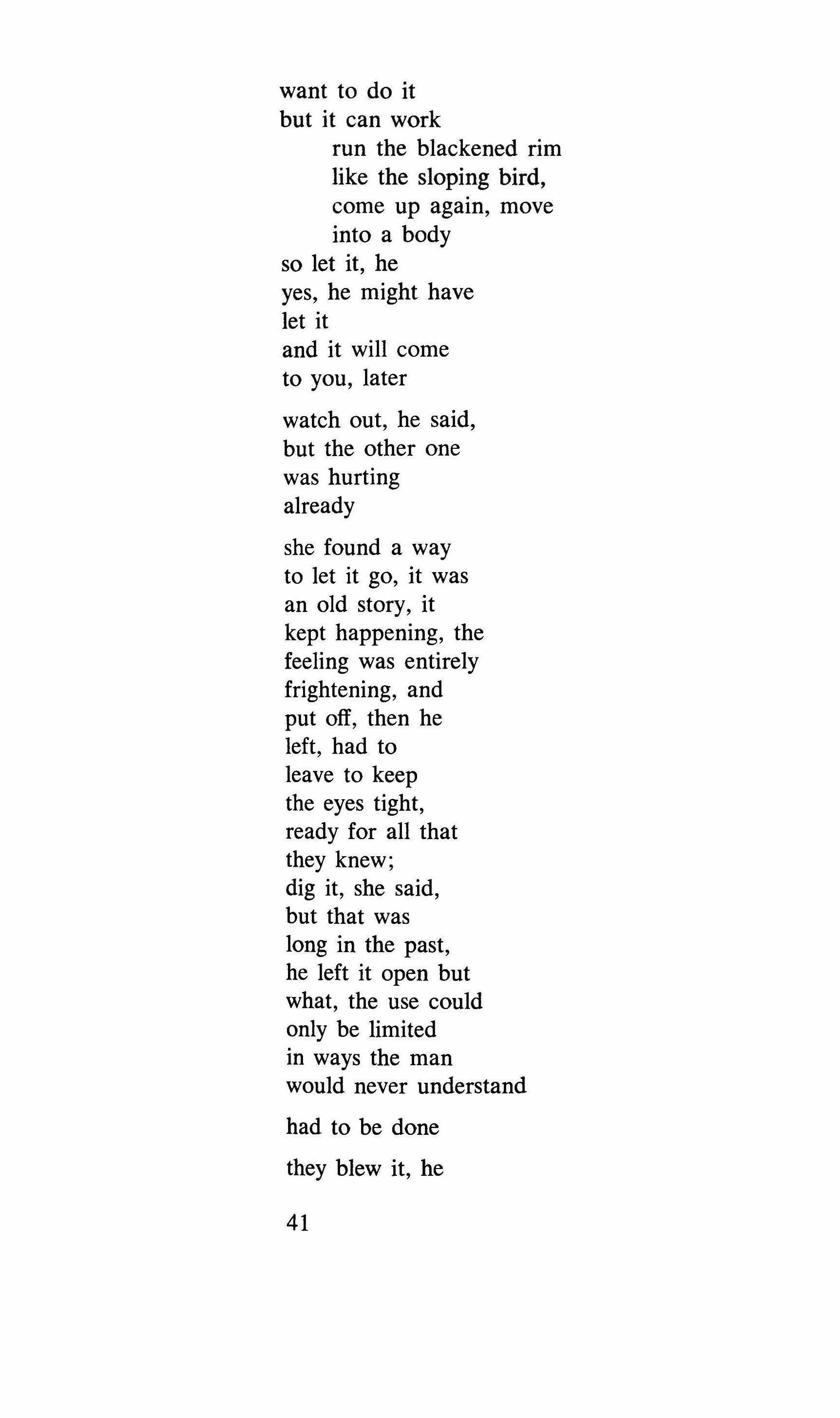
want to do it but it can work run the blackened rim like the sloping bird, come up again, move into a body so let it, he yes, he might have let it and it will come to you, later watch out, he said, but the other one was hurting already she found a way to let it go, it was an old story, it kept happening, the feeling was entirely frightening, and put off, then he left, had to leave to keep the eyes tight, ready for all that they knew; dig it, she said, but that was long in the past, he left it open but what, the use could only be limited in ways the man would never understand had to be done they blew it, he
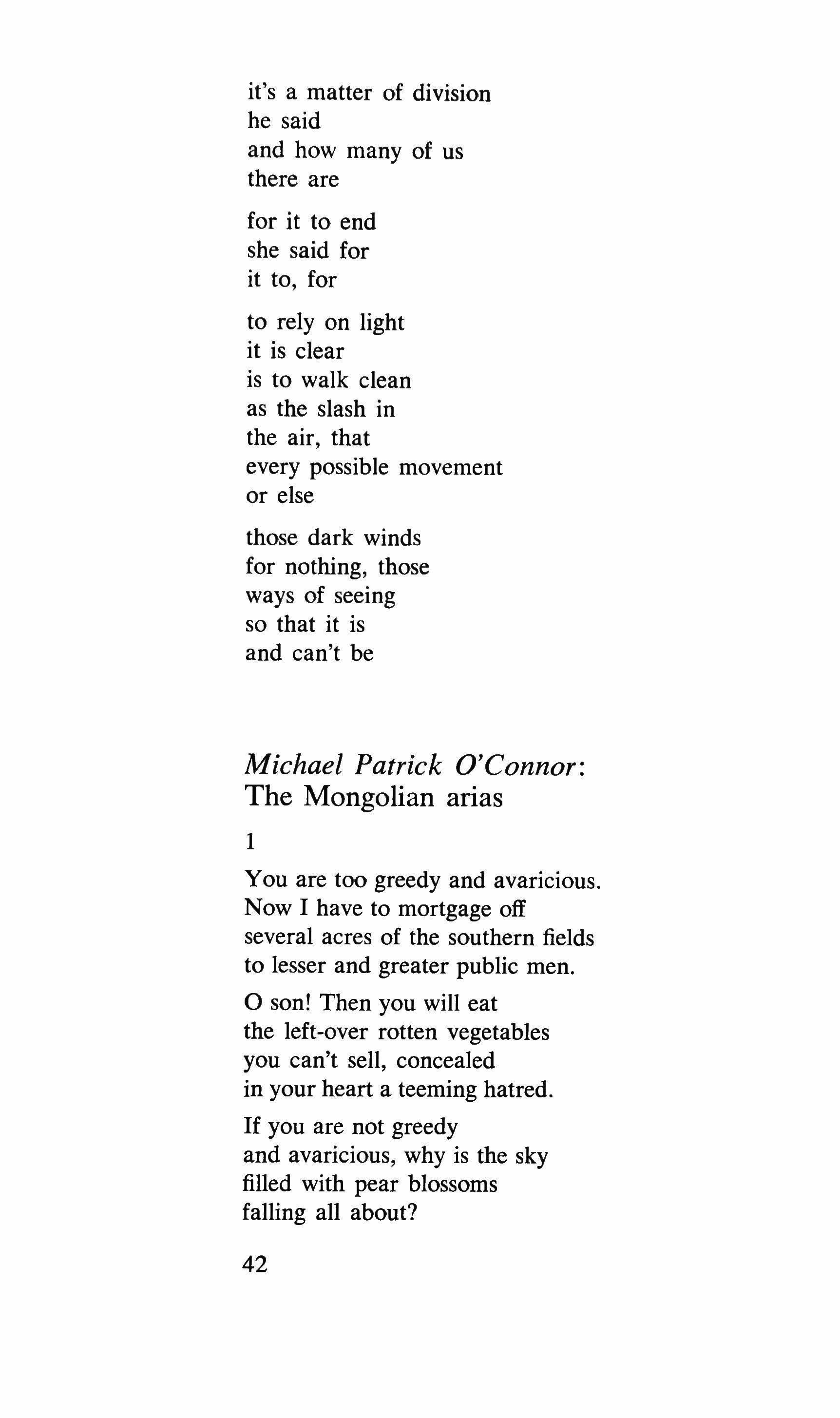
it's a matter of division he said and how many of us there are for it to end she said for it to, for to rely on light it is clear is to walk clean as the slash in the air, that every possible movement or else those dark winds for nothing, those ways of seeing so that it is and can't be
1
You are too greedy and avaricious. Now I have to mortgage off several acres of the southern fields to lesser and greater public men. o son! Then you will eat the left-over rotten vegetables you can't sell, concealed in your heart a teeming hatred.
If you are not greedy and avaricious, why is the sky filled with pear blossoms falling all about?
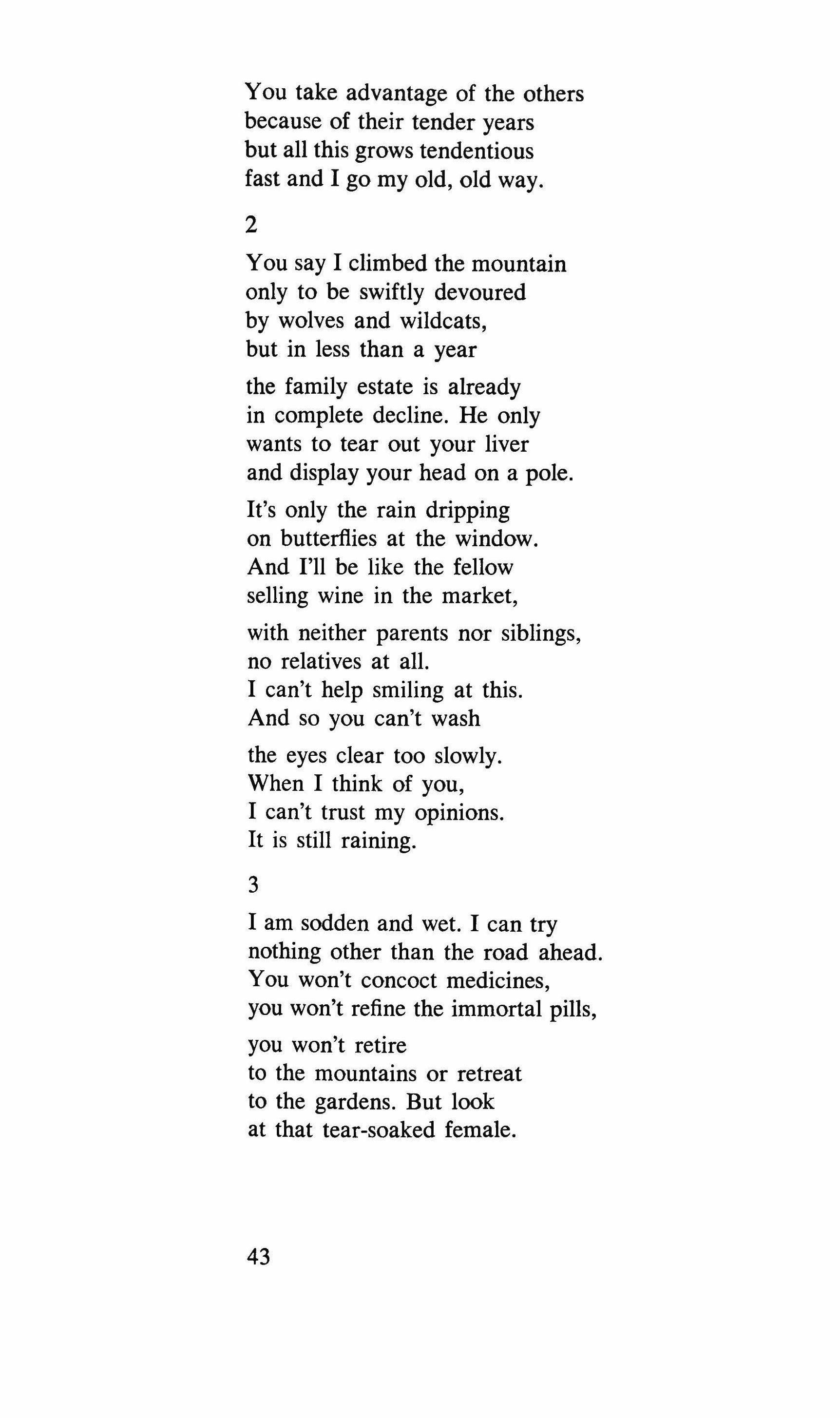
You take advantage of the others because of their tender years but all this grows tendentious fast and I go myoId, old way.
2
You say I climbed the mountain only to be swiftly devoured by wolves and wildcats, but in less than a year the family estate is already in complete decline. He only wants to tear out your liver and display your head on a pole. It's only the rain dripping on butterflies at the window. And I'll be like the fellow selling wine in the market, with neither parents nor siblings, no relatives at all. I can't help smiling at this. And so you can't wash the eyes clear too slowly. When I think of you, I can't trust my opinions. It is still raining.
3
I am sodden and wet. I can try nothing other than the road ahead. You won't concoct medicines, you won't refine the immortal pills, you won't retire to the mountains or retreat to the gardens. But look at that tear-soaked female.
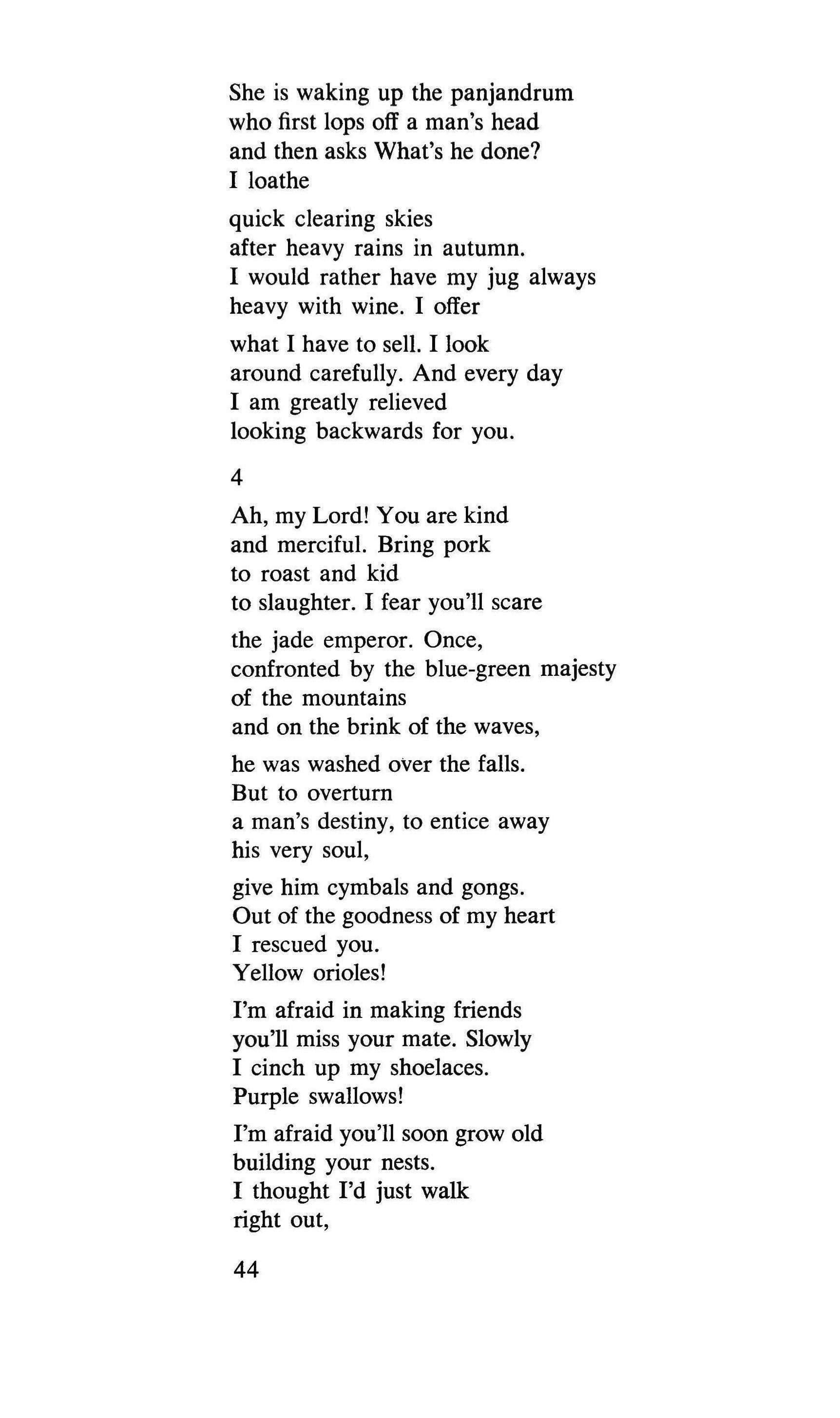
She is waking up the panjandrum who first lops off a man's head and then asks What's he done? I loathe
quick clearing skies after heavy rains in autumn. I would rather have my jug always heavy with wine. I offer what I have to sell. I look around carefully. And every day I am greatly relieved looking backwards for you.
4
Ah, my Lord! You are kind and merciful. Bring pork to roast and kid to slaughter. I fear you'll scare the jade emperor. Once, confronted by the blue-green majesty of the mountains and on the brink of the waves, he was washed over the falls. But to overturn a man's destiny, to entice away his very soul, give him cymbals and gongs. Out of the goodness of my heart I rescued you. Yellow orioles!
I'm afraid in making friends you'll miss your mate. Slowly I cinch up my shoelaces. Purple swallows!
I'm afraid you'll soon grow old building your nests. I thought I'd just walk right out, 44
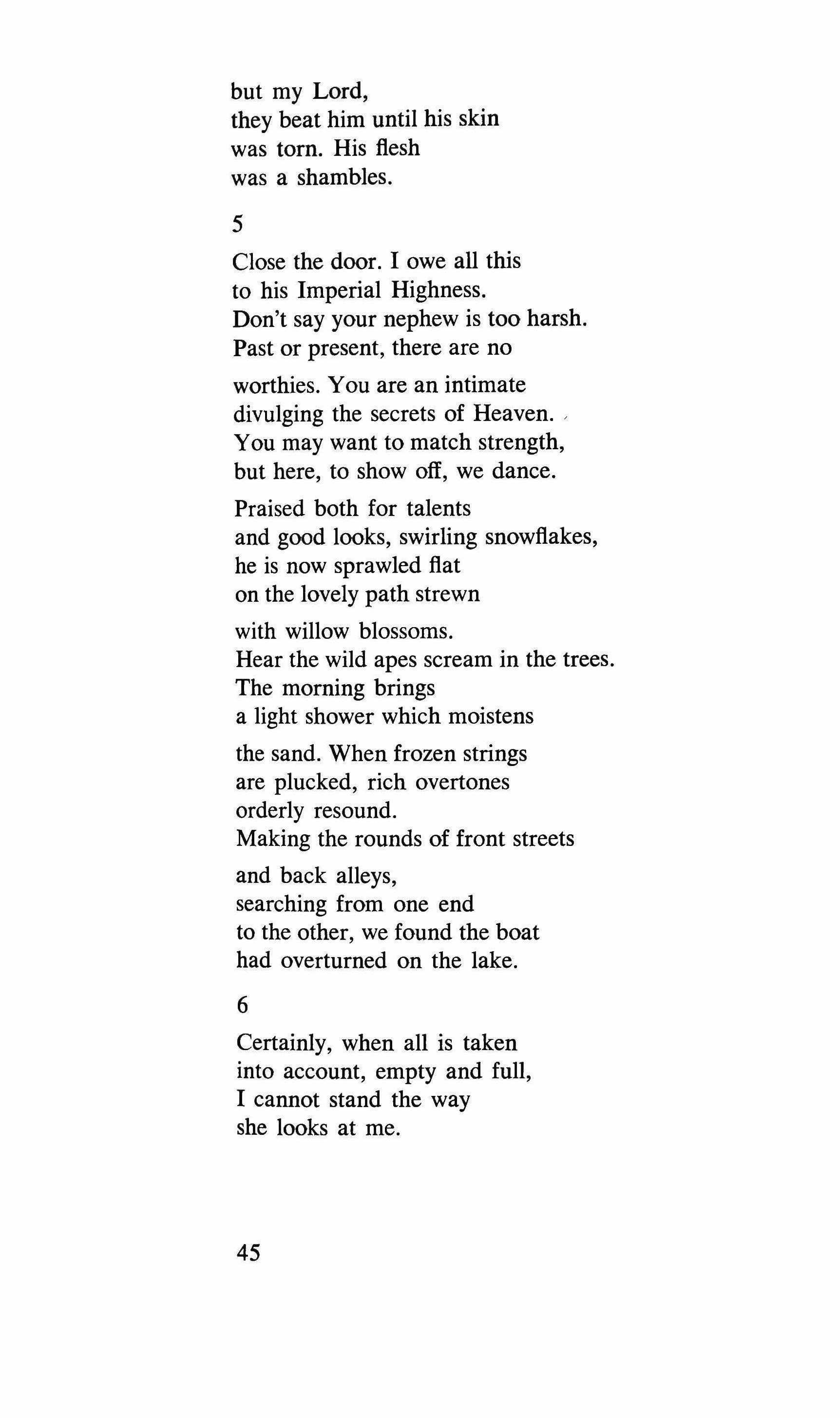
but my Lord, they beat him until his skin was torn. His flesh was a shambles.
5
Close the door. lowe all this to his Imperial Highness. Don't say your nephew is too harsh. Past or present, there are no worthies. You are an intimate divulging the secrets of Heaven. You may want to match strength, but here, to show off, we dance. Praised both for talents and good looks, swirling snowflakes, he is now sprawled flat on the lovely path strewn with willow blossoms. Hear the wild apes scream in the trees. The morning brings a light shower which moistens the sand. When frozen strings are plucked, rich overtones orderly resound. Making the rounds of front streets and back alleys, searching from one end to the other, we found the boat had overturned on the lake.
6 Certainly, when all is taken into account, empty and full, I cannot stand the way she looks at me.
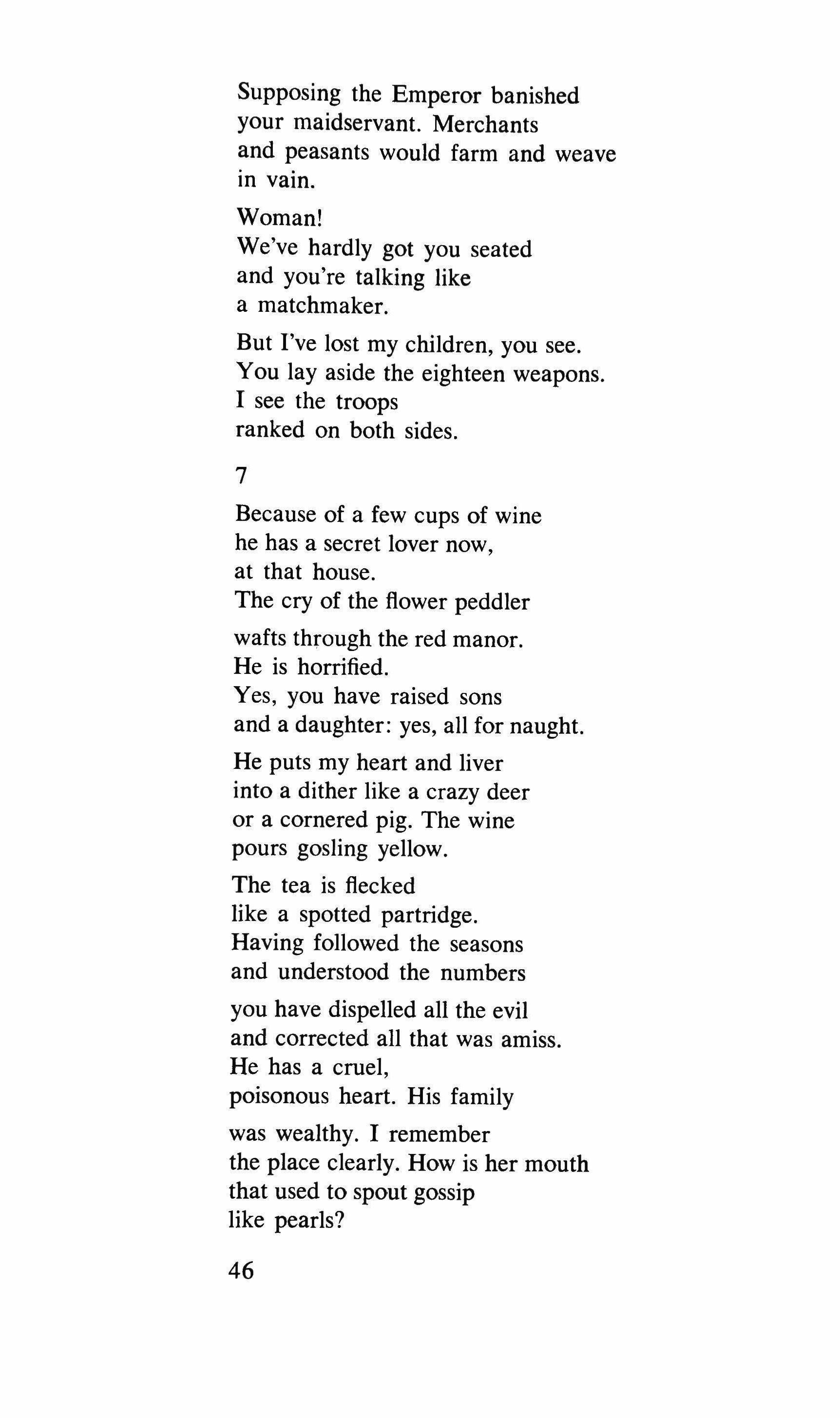
Supposing the Emperor banished your maidservant. Merchants and peasants would farm and weave in vain.
Woman!
We've hardly got you seated and you're talking like a matchmaker.
But I've lost my children, you see. You lay aside the eighteen weapons. I see the troops ranked on both sides.
7
Because of a few cups of wine he has a secret lover now, at that house. The cry of the flower peddler wafts through the red manor. He is horrified.
Yes, you have raised sons and a daughter: yes, all for naught. He puts my heart and liver into a dither like a crazy deer or a cornered pig. The wine pours gosling yellow.
The tea is flecked like a spotted partridge. Having followed the seasons and understood the numbers you have dispelled all the evil and corrected all that was amiss. He has a cruel, poisonous heart. His family was wealthy. I remember the place clearly. How is her mouth that used to spout gossip like pearls?
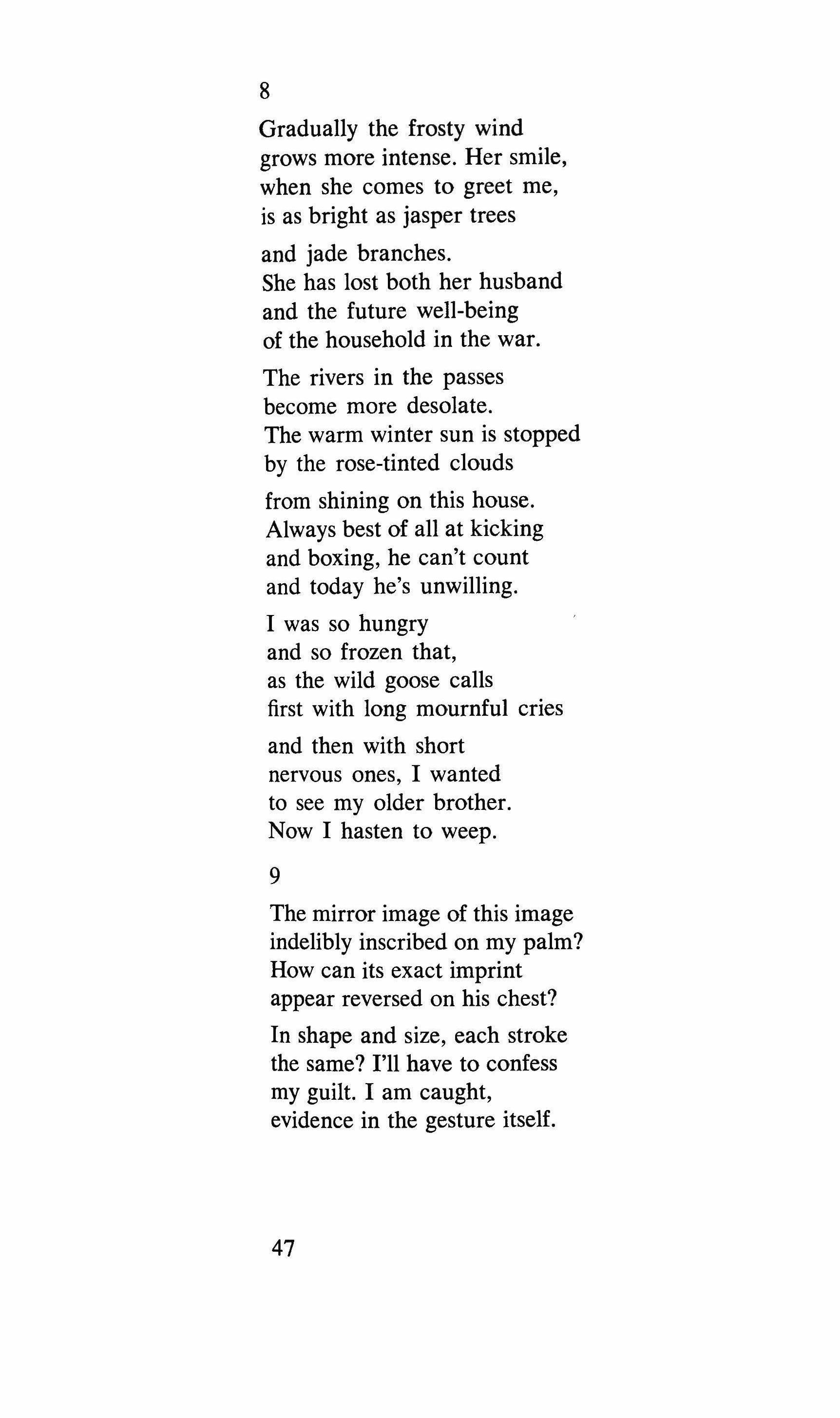
Gradually the frosty wind grows more intense. Her smile, when she comes to greet me, is as bright as jasper trees and jade branches. She has lost both her husband and the future well-being of the household in the war. The rivers in the passes become more desolate. The warm winter sun is stopped by the rose-tinted clouds from shining on this house. Always best of all at kicking and boxing, he can't count and today he's unwilling.
I was so hungry and so frozen that, as the wild goose calls first with long mournful cries and then with short nervous ones, I wanted to see my older brother. Now I hasten to weep.
9
The mirror image of this image indelibly inscribed on my palm? How can its exact imprint appear reversed on his chest? In shape and size, each stroke the same? I'll have to confess my guilt. I am caught, evidence in the gesture itself.
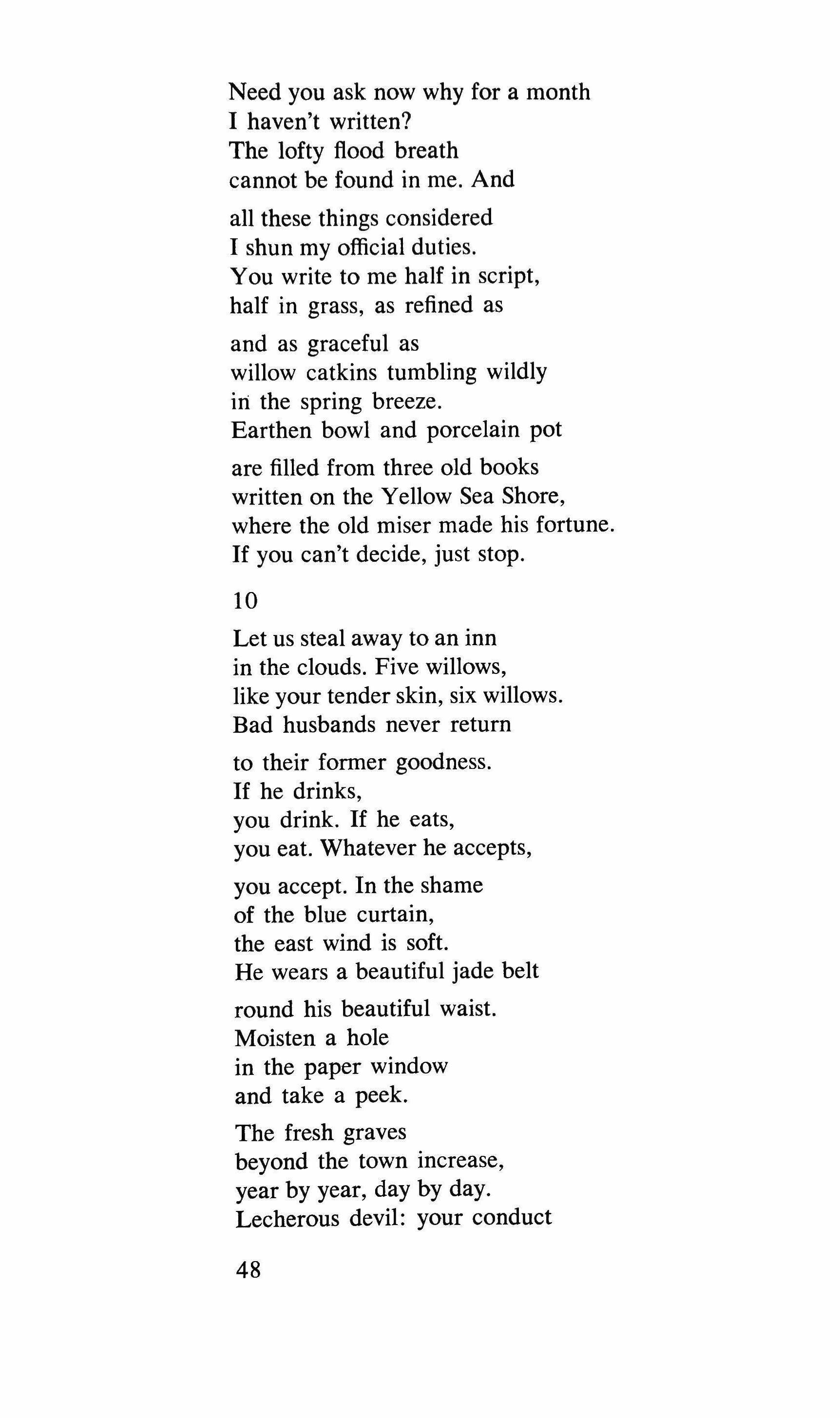
Need you ask now why for a month I haven't written? The lofty flood breath cannot be found in me. And all these things considered I shun my official duties. You write to me half in script, half in grass, as refined as and as graceful as willow catkins tumbling wildly in the spring breeze. Earthen bowl and porcelain pot are filled from three old books written on the Yellow Sea Shore, where the old miser made his fortune. If you can't decide, just stop.
10
Let us steal away to an inn in the clouds. Five willows, like your tender skin, six willows. Bad husbands never return to their former goodness. If he drinks, you drink. If he eats, you eat. Whatever he accepts, you accept. In the shame of the blue curtain, the east wind is soft. He wears a beautiful jade belt round his beautiful waist. Moisten a hole in the paper window and take a peek. The fresh graves beyond the town increase, year by year, day by day. Lecherous devil: your conduct
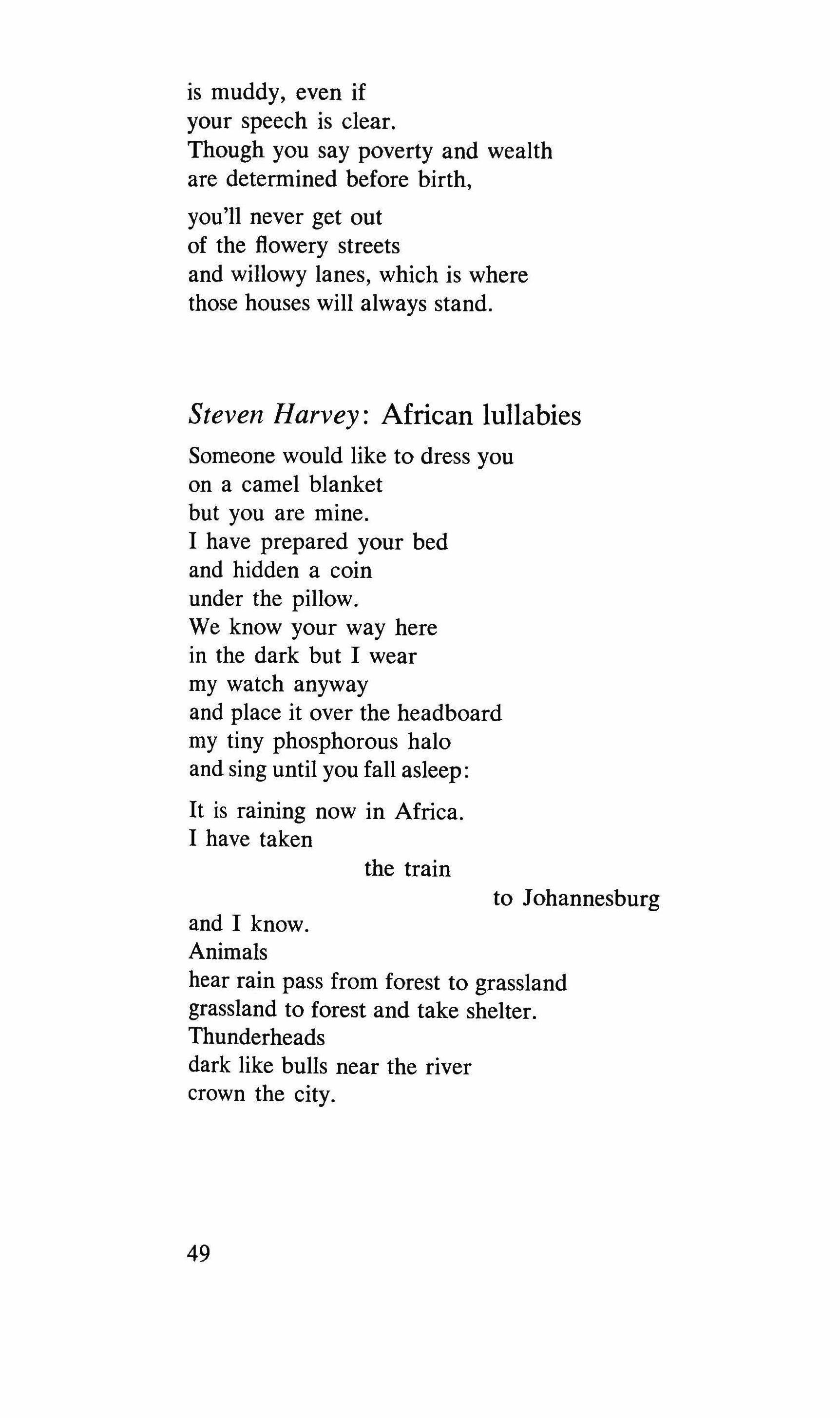
is muddy, even if your speech is clear. Though you say poverty and wealth are determined before birth, you'll never get out of the flowery streets and willowy lanes, which is where those houses will always stand.
Someone would like to dress you on a camel blanket but you are mine. I have prepared your bed and hidden a coin under the pillow. We know your way here in the dark but I wear my watch anyway and place it over the headboard my tiny phosphorous halo and sing until you fall asleep: It is raining now in Africa. I have taken the train
to Johannesburg and I know.
Animals hear rain pass from forest to grassland grassland to forest and take shelter. Thunderheads dark like bulls near the river crown the city.
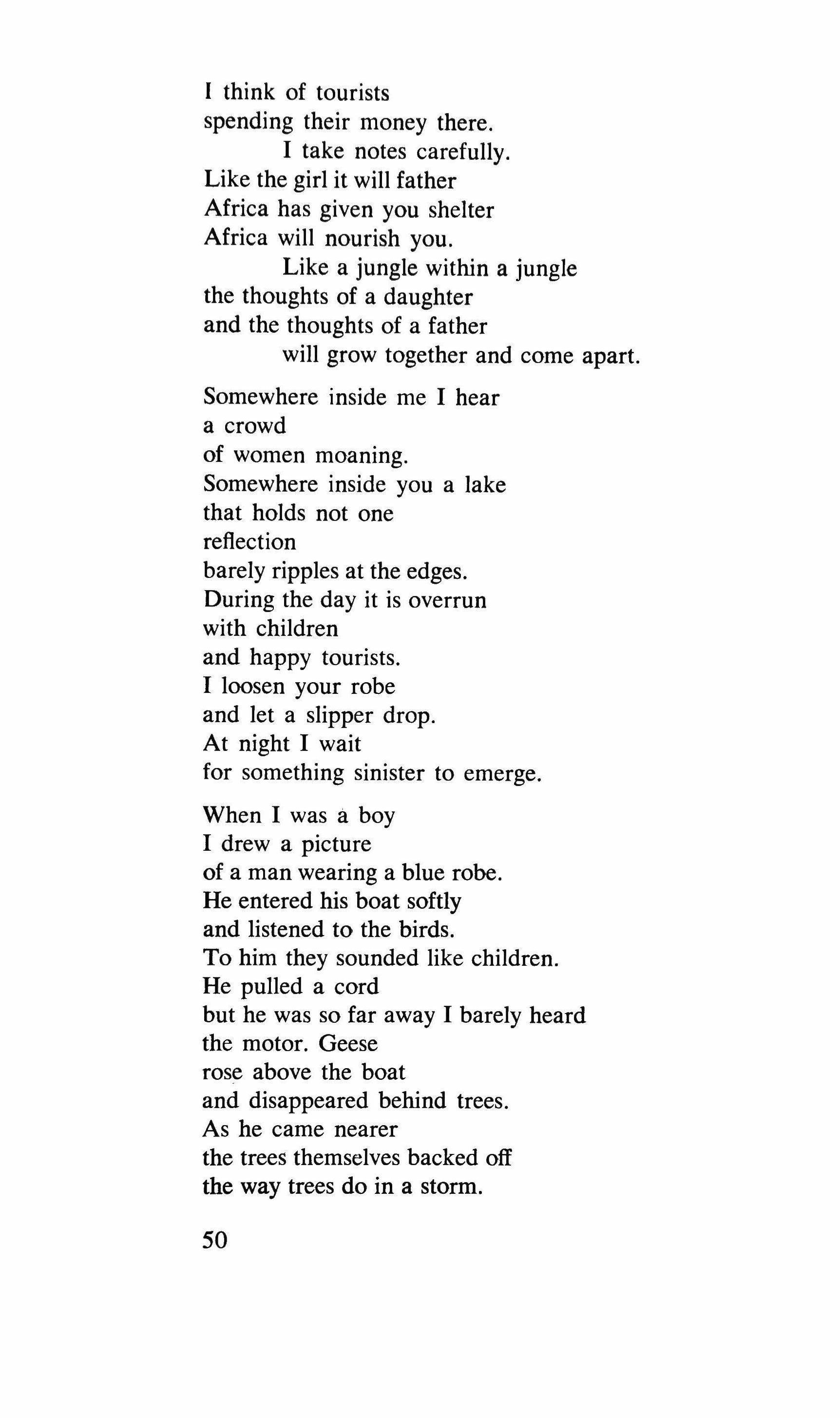
I think of tourists spending their money there. I take notes carefully. Like the girl it will father Africa has given you shelter Africa will nourish you.
Like a jungle within a jungle the thoughts of a daughter and the thoughts of a father will grow together and come apart. Somewhere inside me I hear a crowd of women moaning. Somewhere inside you a lake that holds not one reflection barely ripples at the edges. During the day it is overrun with children and happy tourists. I loosen your robe and let a slipper drop. At night I wait for something sinister to emerge.
When I was it boy
I drew a picture of a man wearing a blue robe. He entered his boat softly and listened to the birds. To him they sounded like children. He pulled a cord but he was so far away I barely heard the motor. Geese rose above the boat and disappeared behind trees. As he came nearer the trees themselves backed off the way trees do in a storm.
50

He thought he was alone and as he approached it is true I retreated like some shy artist into the darker bushes. I burrowed underground or drifted to the bottom of the canal and hid beneath shells. He was gone for years before I returned. The woods are thick and weedy now. Dead fish float on the canal and serve as my reflection. Trees
bent forever the way trees bend in a storm provide a sweet-smelling green cover.
Sometimes our god travels on the back of a turtle. When we are awake it protects us. When we sleep it frightens us. It has seashells over its eyes.
You say that you like colors. I will bring you all the colors you will ever want. Hold a leaf to my cheek. I give you that mixture and the iridescent blue of starlings. Sometimes my voice is light blue and sometimes it is crimson: rojo, the papa's laugh rod, the fear of rats rosso, words between lovers; luhlatta Africa luhlatta the purple of America.
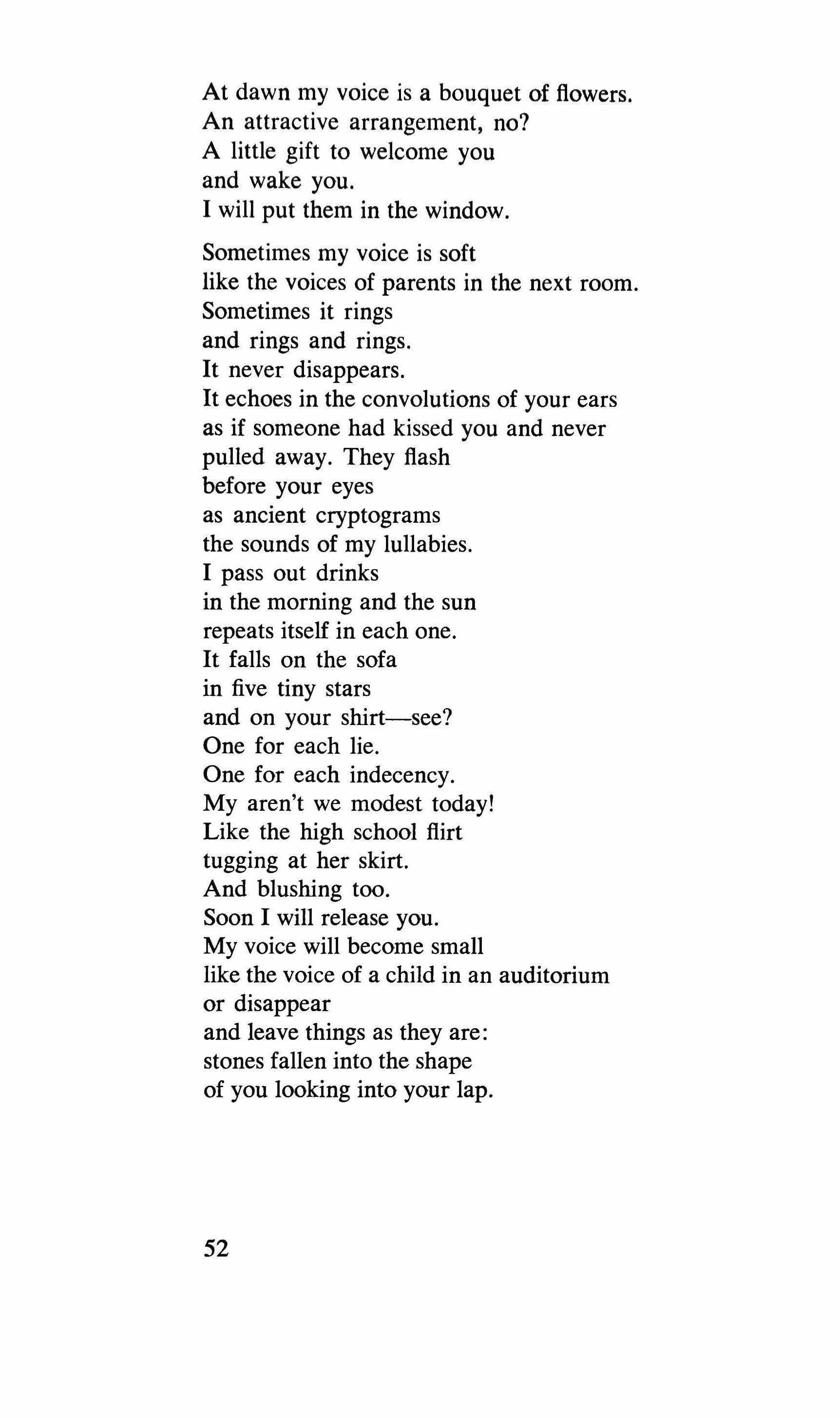
At dawn my voice is a bouquet of flowers. An attractive arrangement, no? A little gift to welcome you and wake you. I will put them in the window.
Sometimes my voice is soft like the voices of parents in the next room. Sometimes it rings and rings and rings. It never disappears. It echoes in the convolutions of your ears as if someone had kissed you and never pulled away. They flash before your eyes as ancient cryptograms the sounds of my lullabies. I pass out drinks in the morning and the sun repeats itself in each one. It falls on the sofa in five tiny stars and on your shirt-see? One for each lie. One for each indecency. My aren't we modest today! Like the high school flirt tugging at her skirt. And blushing too. Soon I will release you. My voice will become small like the voice of a child in an auditorium or disappear and leave things as they are: stones fallen into the shape of you looking into your lap.
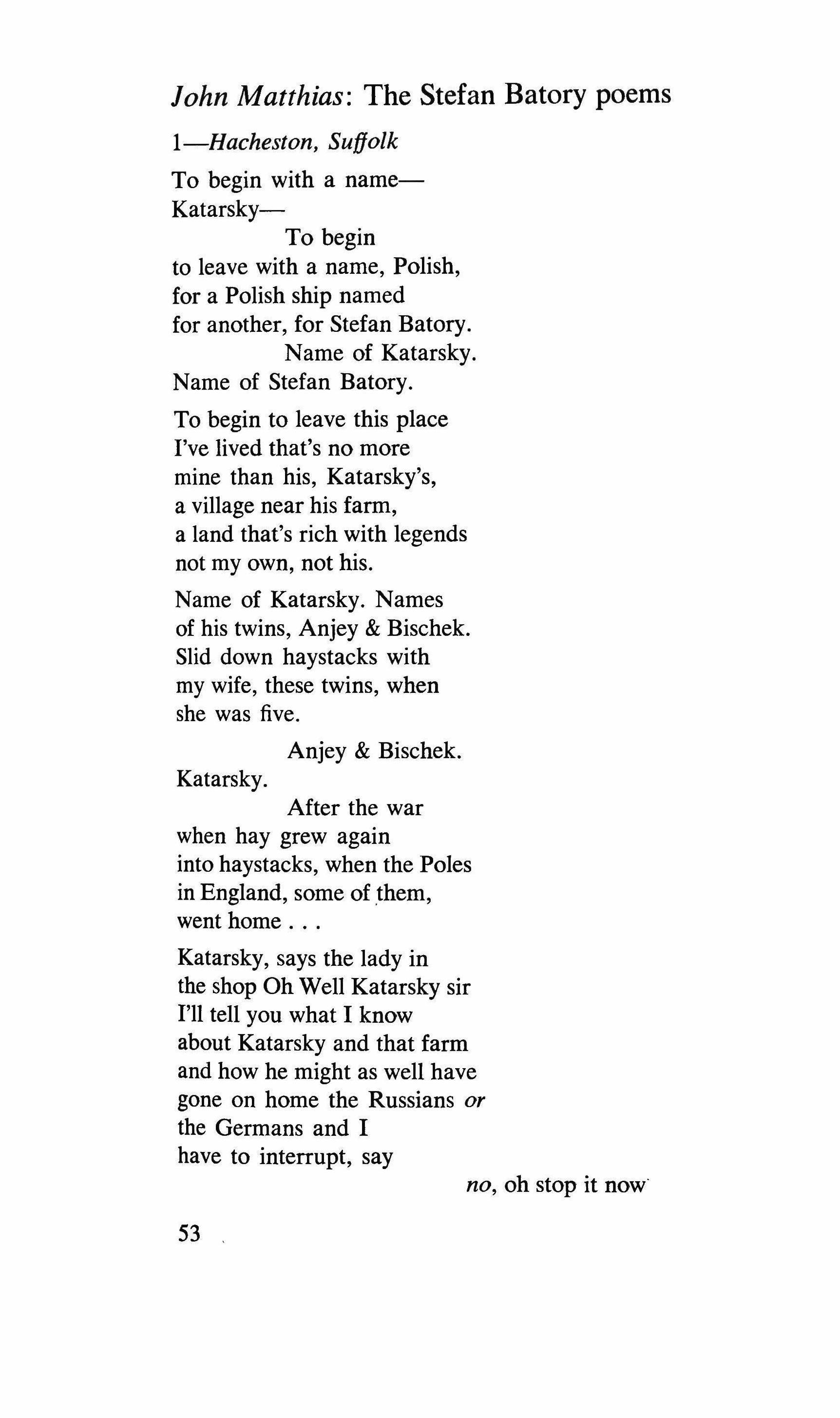
John Matthias: The Stefan Batory poems
I-Hacheston, Suffolk
To begin with a nameKatarsky-
To begin
to leave with a name, Polish, for a Polish ship named for another, for Stefan Batory. Name of Katarsky. Name of Stefan Batory. To begin to leave this place I've lived that's no more mine than his, Katarsky's, a village near his farm, a land that's rich with legends not my own, not his.
Name of Katarsky. Names of his twins, Anjey & Bischek. Slid down haystacks with my wife, these twins, when she was five.
Anjey & Bischek. Katarsky.
After the war when hay grew again into haystacks, when the Poles in England, some of them, went home
Katarsky, says the lady in the shop Oh Well Katarsky sir I'll tell you what I know about Katarsky and that farm and how he might as well have gone on home the Russians or the Germans and I have to interrupt, say no, oh stop it now'
I only wanted a Polish name for a poem: only wanted a way to say goodbye.
2
I wake up having dreamed of whales
To find my family sleeping in Their berths. The breakfast menu Is under the door: delicious Smells in the passageway
I can have Soki, Zupy Sniadaniowe, Jajka, Omlety, Ryby, something from the Zimny Bufet, Przetwory Owocowe on my bread, Sery, a hot cup of Kawa bez kofeiny (coffeinevrije: decaffeinated). Or mint tea and compote. The day's program includes Holy Mass in the Cinema, a matinee concert of chamber music (Vivaldi, Handel, and Telemann), afternoon tea, an American film with dubbed-in Polish, cocktails, bingo and dancing. Wife nor daughters stir. I open Mickiewicz.
"Ye comrades of the Grand Dukes of Lithuania, trees of Bialowieza, Switez, Ponary, and Kuszelewo! whose shade once fell upon the crowned heads of the dread Witenes and the great Mindowe, and of Giedymin, when on the height of Ponary, by the huntsmen's fire, he lay on a bear skin, listening to the song of the wise Lizdejko; and, lulled by the sight of the Wilia and the murmur of the Wilejko, he dreamed of the iron wolf " What an invocation! Comrades and trees! The trees are important.
Last night as we passed Land's End I spoke for hours with a couple from Newcastle leaving England to immigrate to Canada. They stared hard, saying goodbye, looking into the darkness for a last flickering English light. They're sorry to leave but can't, so they told me, save a sixpence in a year. I wished them luck in Canada. And comrades. And trees.
I decide to go on deck.
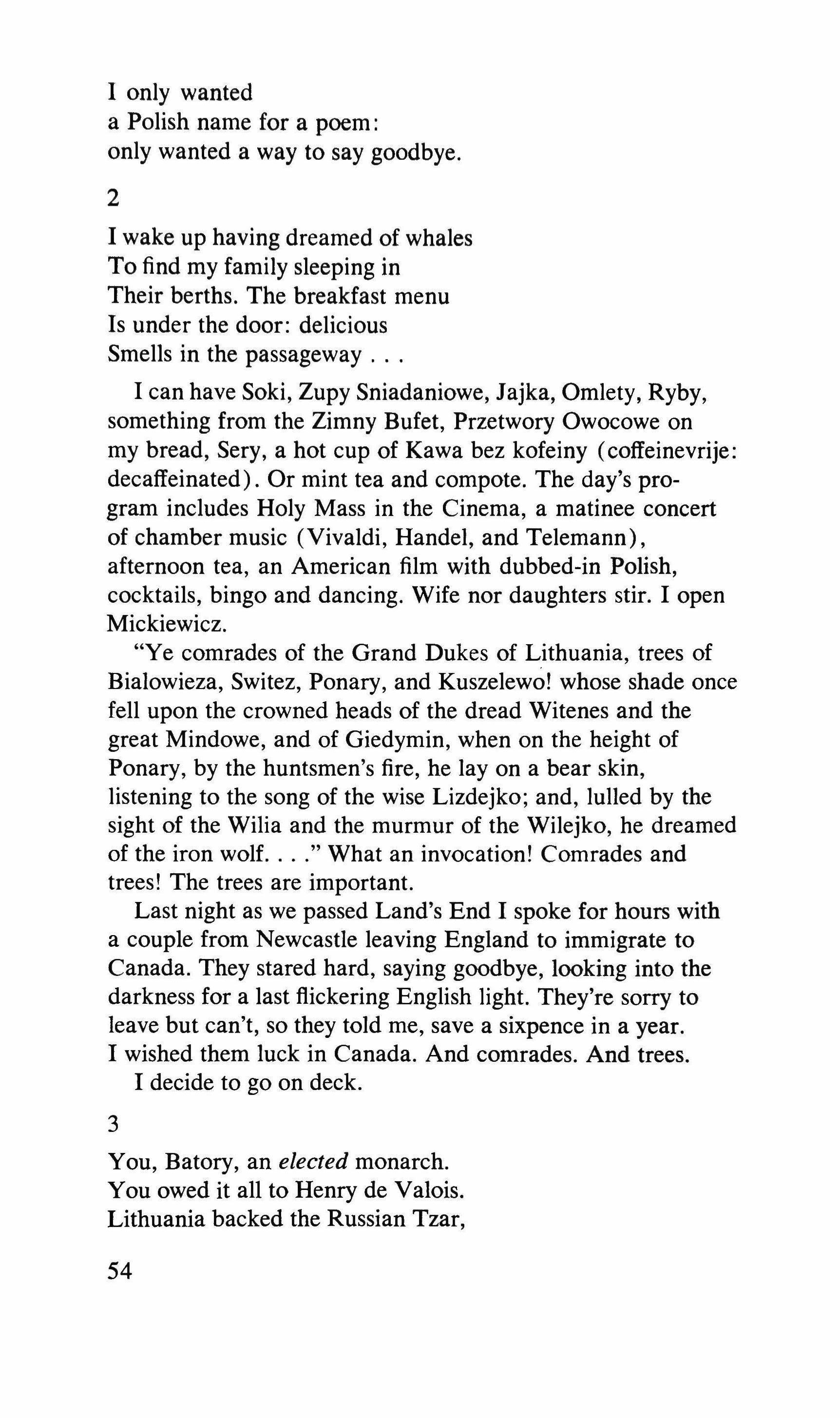
3
You, Batory, an elected monarch. You owed it all to Henry de Valois. Lithuania backed the Russian Tzar, 54
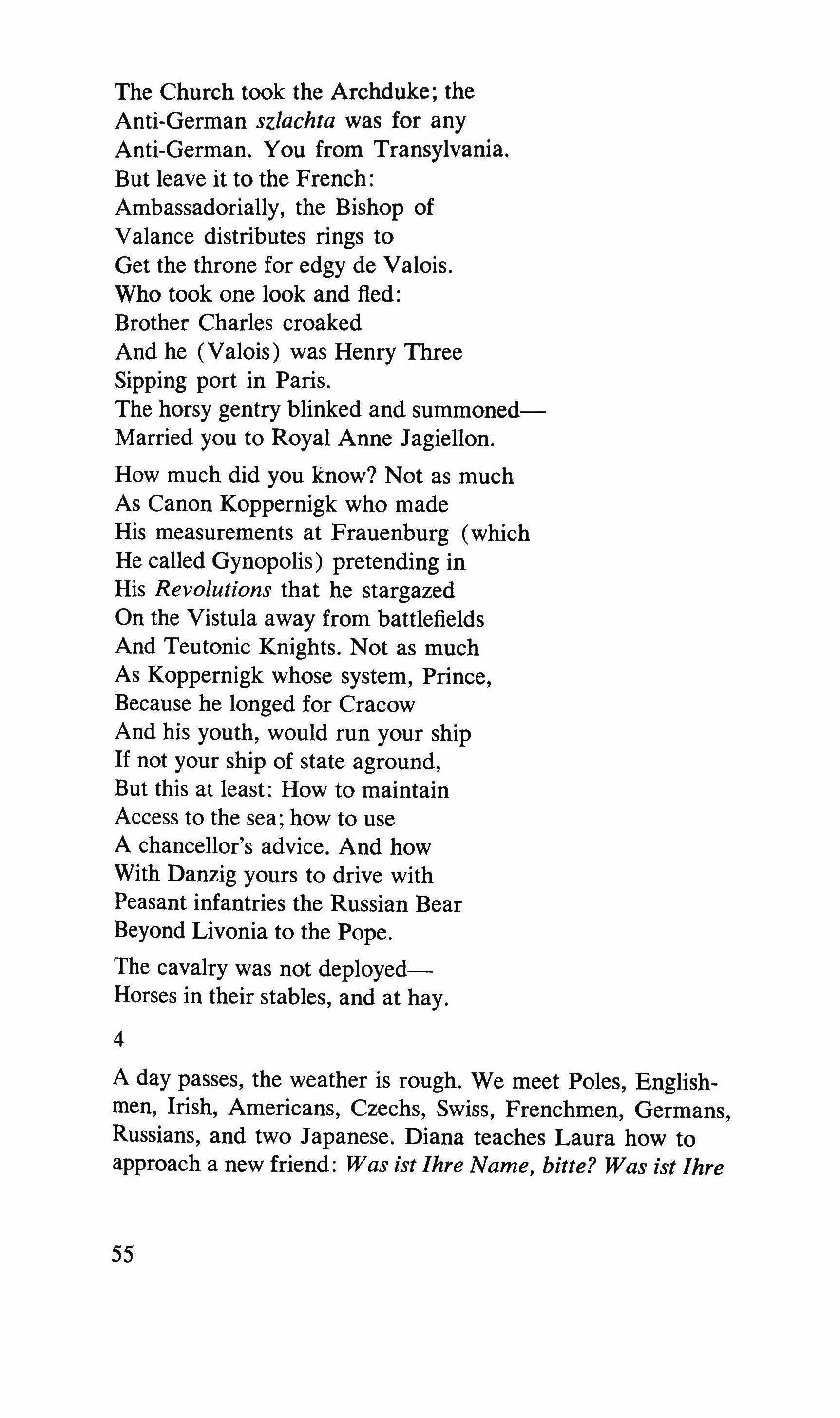
The Church took the Archduke; the Anti-German szlachta was for any Anti-German. You from Transylvania. But leave it to the French: Ambassadorially, the Bishop of Valance distributes rings to Get the throne for edgy de Valois. Who took one look and fled: Brother Charles croaked And he (Valois) was Henry Three Sipping port in Paris.
The horsy gentry blinked and summonedMarried you to Royal Anne Jagiellon.
How much did you know? Not as much As Canon Koppernigk who made His measurements at Frauenburg (which He called Gynopolis) pretending in His Revolutions that he stargazed On the Vistula away from battlefields And Teutonic Knights. Not as much As Koppernigk whose system, Prince, Because he longed for Cracow And his youth, would run your ship If not your ship of state aground, But this at least: How to maintain Access to the sea; how to use A chancellor's advice. And how With Danzig yours to drive with Peasant infantries the Russian Bear Beyond Livonia to the Pope.
The cavalry was not deployedHorses in their stables, and at hay.
4
A day passes, the weather is rough. We meet Poles, Englishmen, Irish, Americans, Czechs, Swiss, Frenchmen, Germans, Russians, and two Japanese. Diana teaches Laura how to approach a new friend: Was ist Ihre Name, bitte? Was ist Ihre
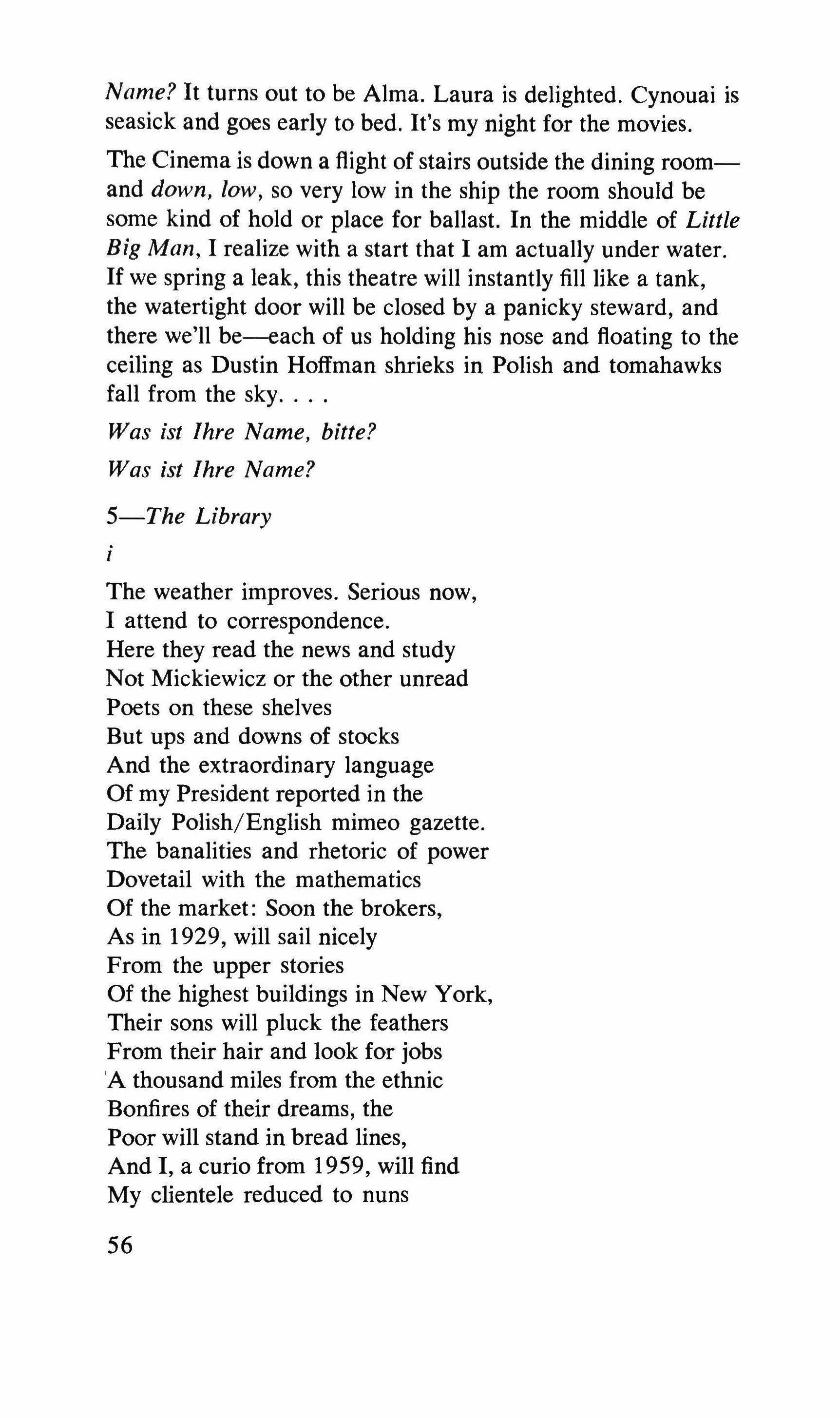
Name? It turns out to be Alma. Laura is delighted. Cynouai is seasick and goes early to bed. It's my night for the movies.
The Cinema is down a flight of stairs outside the dining roomand down, low, so very low in the ship the room should be some kind of hold or place for ballast. In the middle of Little Big Man, I realize with a start that I am actually under water. If we spring a leak, this theatre will instantly fill like a tank, the watertight door will be closed by a panicky steward, and there we'll be--each of us holding his nose and floating to the ceiling as Dustin Hoffman shrieks in Polish and tomahawks fall from the sky.
Was ist lhre Name, bitte?
Was ist lhre Name?
5-The Library
i The weather improves. Serious now, I attend to correspondence. Here they read the news and study
Not Mickiewicz or the other unread Poets on these shelves
But ups and downs of stocks
And the extraordinary language
Of my President reported in the Daily Polish/English mimeo gazette. The banalities and rhetoric of power
Dovetail with the mathematics
Of the market: Soon the brokers,
As in 1929, will sail nicely
From the upper stories
Of the highest buildings in New York, Their sons will pluck the feathers
From their hair and look for jobs
'A thousand miles from the ethnic Bonfires of their dreams, the Poor will stand in bread lines,
And I, a curio from 1959, will find
My clientele reduced to nuns
56
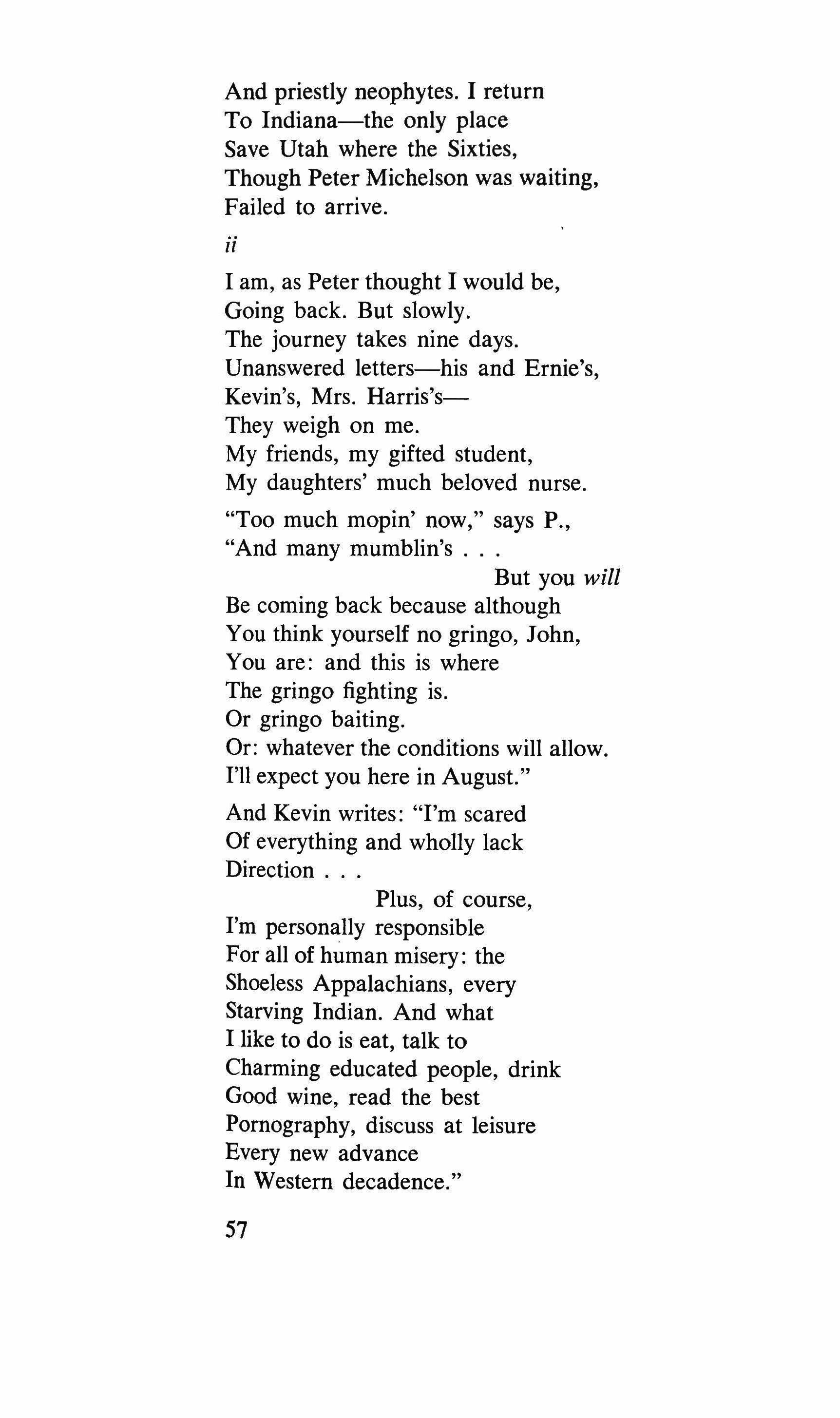
And priestly neophytes. I return To Indiana-the only place Save Utah where the Sixties, Though Peter Michelson was waiting, Failed to arrive.
ii
I am, as Peter thought I would be, Going back. But slowly. The journey takes nine days. Unanswered letters-his and Ernie's, Kevin's, Mrs. Harris'sThey weigh on me. My friends, my gifted student, My daughters' much beloved nurse.
"Too much mopin' now," says P., "And many mumblin's
But you will Be coming back because although You think yourself no gringo, John, You are: and this is where The gringo fighting is. Or gringo baiting. Or: whatever the conditions will allow. I'll expect you here in August." And Kevin writes: "I'm scared Of everything and wholly lack Direction
Plus, of course, I'm personally responsible For all of human misery: the Shoeless Appalachians, every Starving Indian. And what I like to do is eat, talk to Charming educated people, drink Good wine, read the best Pornography, discuss at leisure Every new advance In Western decadence."

E. has written to me once a year for eight years straight. This year it's about my poems. And his. His muse grows younger (he is over sixty-five) as mine begins to age. My attraction to quotation, commentary, pastiche: exhaustion? or the very method of abstention that he recommends? Many days I'd be a scribe, a monk-and I, like monk and scribe, am permitted to append the meanings that my authors may have missed. "He abandoned himself to the absolute sincerity of pastiche": on Ekelof, Printz-Pahlson, Otherwise? Poets know too much. We bring things on us. There is always an extra place at the table: the poem, as Ernie says, arranges it.
With total serenity
He abandoned pastiche for patchouli For patchouli and panache
He abandoned his panto-panjandrum
With utter contempt for panache
He abandoned patchouli
He abandoned himself with unspeakable simplicity To pastrami.
Inventions organized to dance A variation of our lives? Or simply evidence? Or letters to and from our friends? Here, the doctor said, is your scarab. Prospero whispers in one ear And Lenin in the other.
6
Familiar, the dull rattle and buzz of screws abates; we glide A hundred yards away, Gothic dips and spires-St. Brendan's "floating crystal castle." Cleaving from some ancient ice sheet, pinnacles around a central mass like sails, it makes good time: radar brought back only sea return, echoes from the waves. A spotlight caught it in the fog. Late, late
Are we in Brendan's time? We suffer sea return.
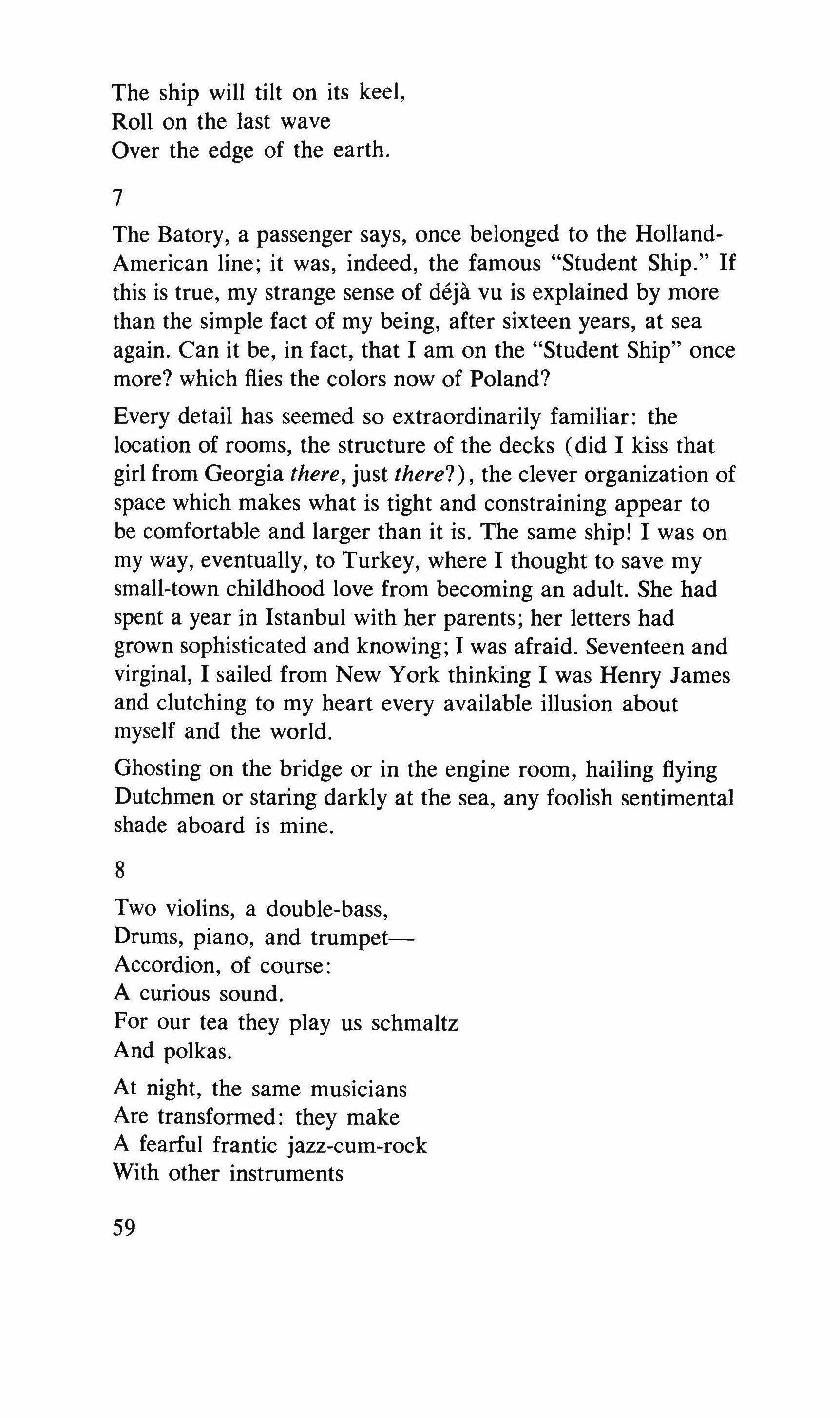
The ship will tilt on its keel, Roll on the last wave
Over the edge of the earth.
7
The Batory, a passenger says, once belonged to the HollandAmerican line; it was, indeed, the famous "Student Ship." If this is true, my strange sense of deja vu is explained by more than the simple fact of my being, after sixteen years, at sea again. Can it be, in fact, that I am on the "Student Ship" once more? which flies the colors now of Poland?
Every detail has seemed so extraordinarily familiar: the location of rooms, the structure of the decks (did I kiss that girl from Georgia there, just there?), the clever organization of space which makes what is tight and constraining appear to be comfortable and larger than it is. The same ship! I was on my way, eventually, to Turkey, where I thought to save my small-town childhood love from becoming an adult. She had spent a year in Istanbul with her parents; her letters had grown sophisticated and knowing; I was afraid. Seventeen and virginal, I sailed from New York thinking I was Henry James and clutching to my heart every available illusion about myself and the world.
Ghosting on the bridge or in the engine room, hailing flying Dutchmen or staring darkly at the sea, any foolish sentimental shade aboard is mine.
8
Two violins, a double-bass, Drums, piano, and trumpet
Accordion, of course: A curious sound.
For our tea they play us schmaltz And polkas.
At night, the same musicians Are transformed: they make A fearful frantic jazz-cum-rock With other instruments
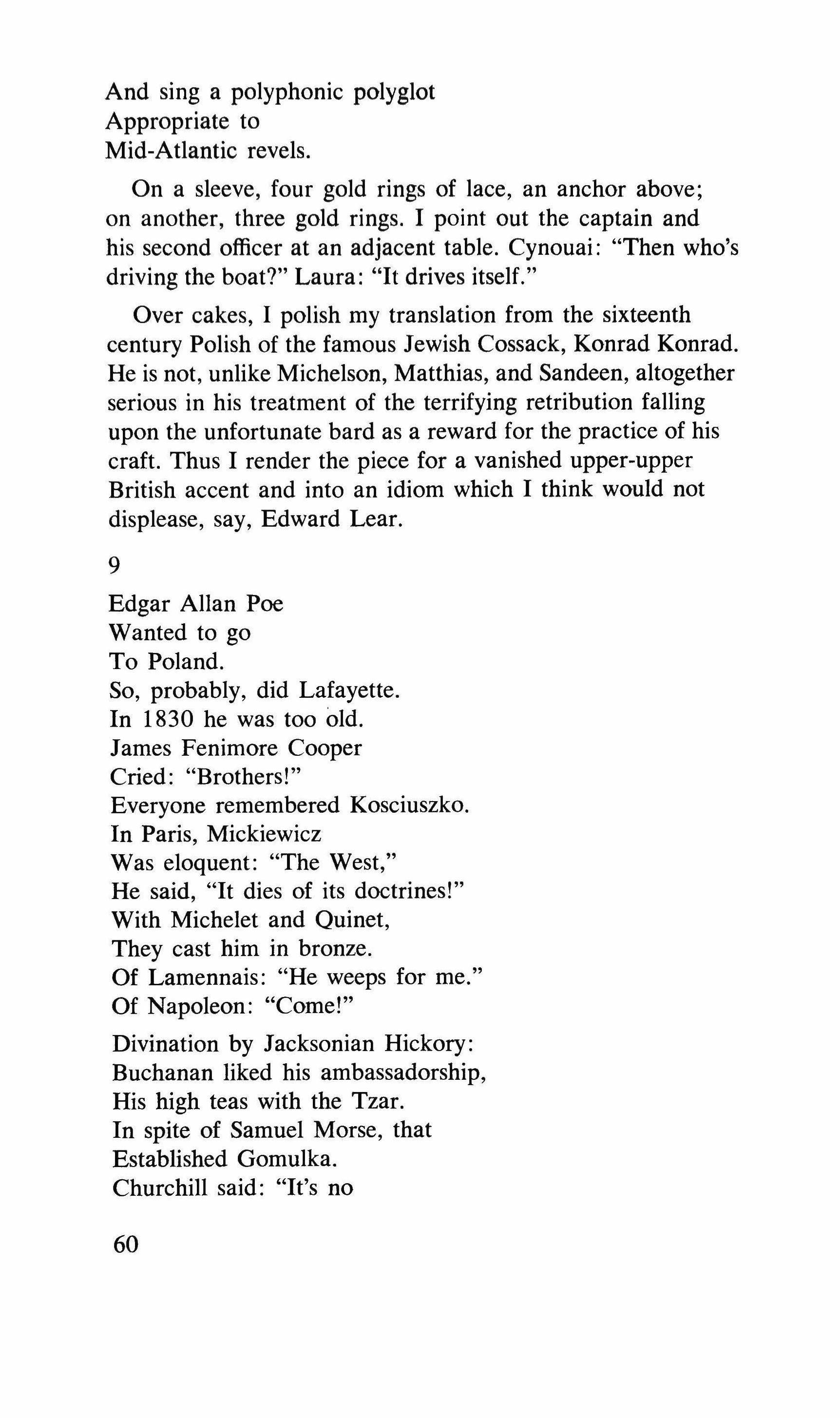
And sing a polyphonic polyglot Appropriate to Mid-Atlantic revels.
On a sleeve, four gold rings of lace, an anchor above; on another, three gold rings. I point out the captain and his second officer at an adjacent table. Cynouai: "Then who's driving the boat?" Laura: "It drives itself."
Over cakes, I polish my translation from the sixteenth century Polish of the famous Jewish Cossack, Konrad Konrad. He is not, unlike Michelson, Matthias, and Sandeen, altogether serious in his treatment of the terrifying retribution falling upon the unfortunate bard as a reward for the practice of his craft. Thus I render the piece for a vanished upper-upper British accent and into an idiom which I think would not displease, say, Edward Lear.
9 Edgar Allan Poe Wanted to go To Poland.
So, probably, did Lafayette. In 1830 he was too old.
James Fenimore Cooper Cried: "Brothers!" Everyone remembered Kosciuszko. In Paris, Mickiewicz Was eloquent: "The West," He said, "It dies of its doctrines!" With Michelet and Quinet, They cast him in bronze.
Of Lamennais: "He weeps for me."
Of Napoleon: "Come!"
Divination by Jacksonian Hickory: Buchanan liked his ambassadorship, His high teas with the Tzar.
In spite of Samuel Morse, that Established Gomulka.
Churchill said: "It's no 60

Time for quarrels. Sikorski crashed in his plane. "Hel falls," said Hemar. "Assassins steal our Westerplatte."
Batory, they've thrown your best Philosopher out of Warsaw.
The one who stenographically took The Devil's report.
I don't think Rosa Luxemburg Would be pleased. She, Like you, was a fighter & proud.
I like to think of Rilke's Angels And his loving explanations to von Hulewicz.
I don't think about Esterhazy Or Chopin. I think of Hass's poem For his Polish friends in Buffalo. Hass-who reads Mickiewicz For his mushrooms.
I think of Jean Rousseau: "At least Do not allow them to digest you!"
I think of Kazimierz Stanislaw GzowskiKnighted by Victoria, founder Of the city of Toronto.
I think of Materski in the forests Of my native Ohio: "Send no Exiles inland." Ohio-s-unaware Of 1830, of 1848.
Calling for my gambling debts, The learned Purser Quotes for me a famous Unacknowledged source in Yiddish: "Oh, frayg nit: 'Vus iz it?' Los mir gehn zu machen Visit."
We approach the Gulf of St. Lawrence.
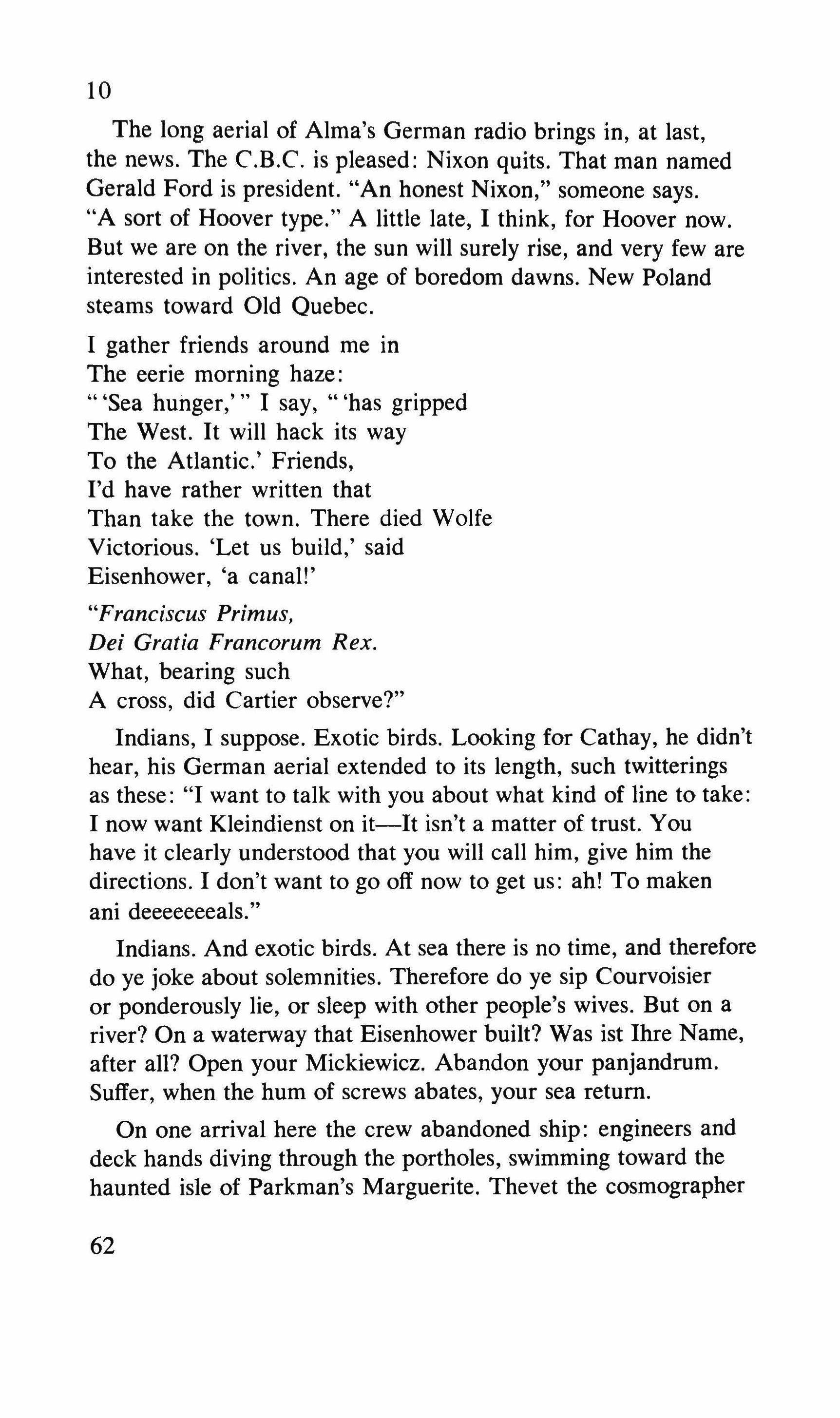
The long aerial of Alma's German radio brings in, at last, the news. The C.B.C. is pleased: Nixon quits. That man named Gerald Ford is president. "An honest Nixon," someone says. "A sort of Hoover type." A little late, I think, for Hoover now. But we are on the river, the sun will surely rise, and very few are interested in politics. An age of boredom dawns. New Poland steams toward Old Quebec.
I gather friends around me in The eerie morning haze: "'Sea huhger,'" I say, "'has gripped The West. It will hack its way To the Atlantic.' Friends, I'd have rather written that Than take the town. There died Wolfe Victorious. 'Let us build,' said Eisenhower, 'a canal!'
"Franciscus Primus, Dei Gratia Francorum Rex. What, bearing such A cross, did Cartier observe?"
Indians, I suppose. Exotic birds. Looking for Cathay, he didn't hear, his German aerial extended to its length, such twitterings as these: "I want to talk with you about what kind of line to take: I now want Kleindienst on it-It isn't a matter of trust. You have it clearly understood that you will call him, give him the directions. I don't want to go off now to get us: ah! To maken ani deeeeeeeals."
Indians. And exotic birds. At sea there is no time, and therefore do ye joke about solemnities. Therefore do ye sip Courvoisier or ponderously lie, or sleep with other people's wives. But on a river? On a waterway that Eisenhower built? Was ist Ihre Name, after all? Open your Mickiewicz. Abandon your panjandrum. Suffer, when the hum of screws abates, your sea return.
On one arrival here the crew abandoned ship: engineers and deck hands diving through the portholes, swimming toward the haunted isle of Parkman's Marguerite. Thevet the cosmographer
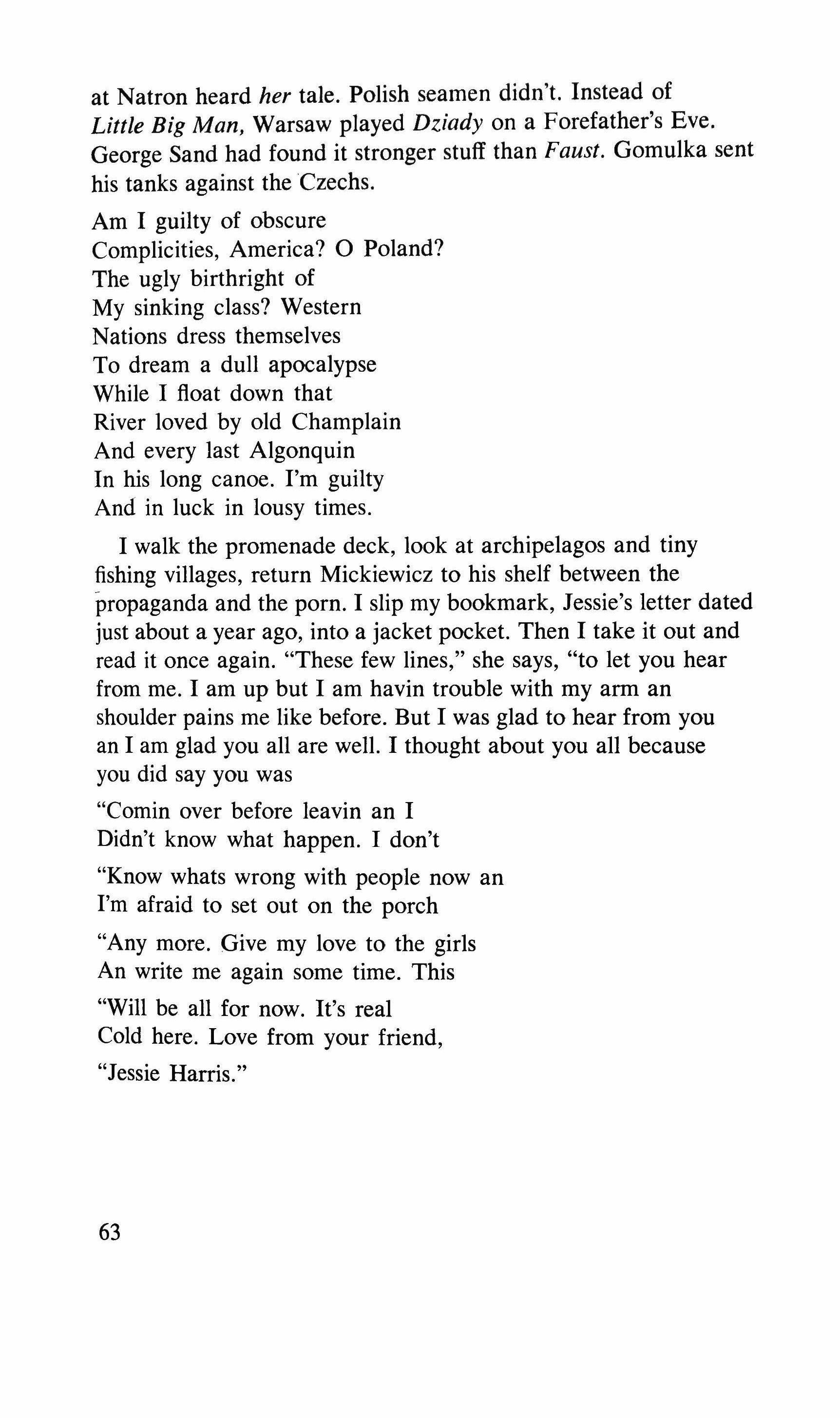
at Natron heard her tale. Polish seamen didn't. Instead of Little Big Man, Warsaw played Driady on a Forefather's Eve. George Sand had found it stronger stuff than Faust. Gomulka sent his tanks against the Czechs.
Am I guilty of obscure Complicities, America? 0 Poland? The ugly birthright of My sinking class? Western Nations dress themselves
To dream a dull apocalypse While I float down that River loved by old Champlain And every last Algonquin In his long canoe. I'm guilty And in luck in lousy times.
I walk the promenade deck, look at archipelagos and tiny fishing villages, return Mickiewicz to his shelf between the propaganda and the porn. I slip my bookmark, Jessie's letter dated just about a year ago, into a jacket pocket. Then I take it out and read it once again. "These few lines," she says, "to let you hear from me. I am up but I am havin trouble with my arm an shoulder pains me like before. But I was glad to hear from you an I am glad you all are well. I thought about you all because you did say you was "Comin over before leavin an I Didn't know what happen. I don't
"Know whats wrong with people now an I'm afraid to set out on the porch
"Any more. Give my love to the girls An write me again some time. This "Will be all for now. It's real Cold here. Love from your friend, "Jessie Harris."
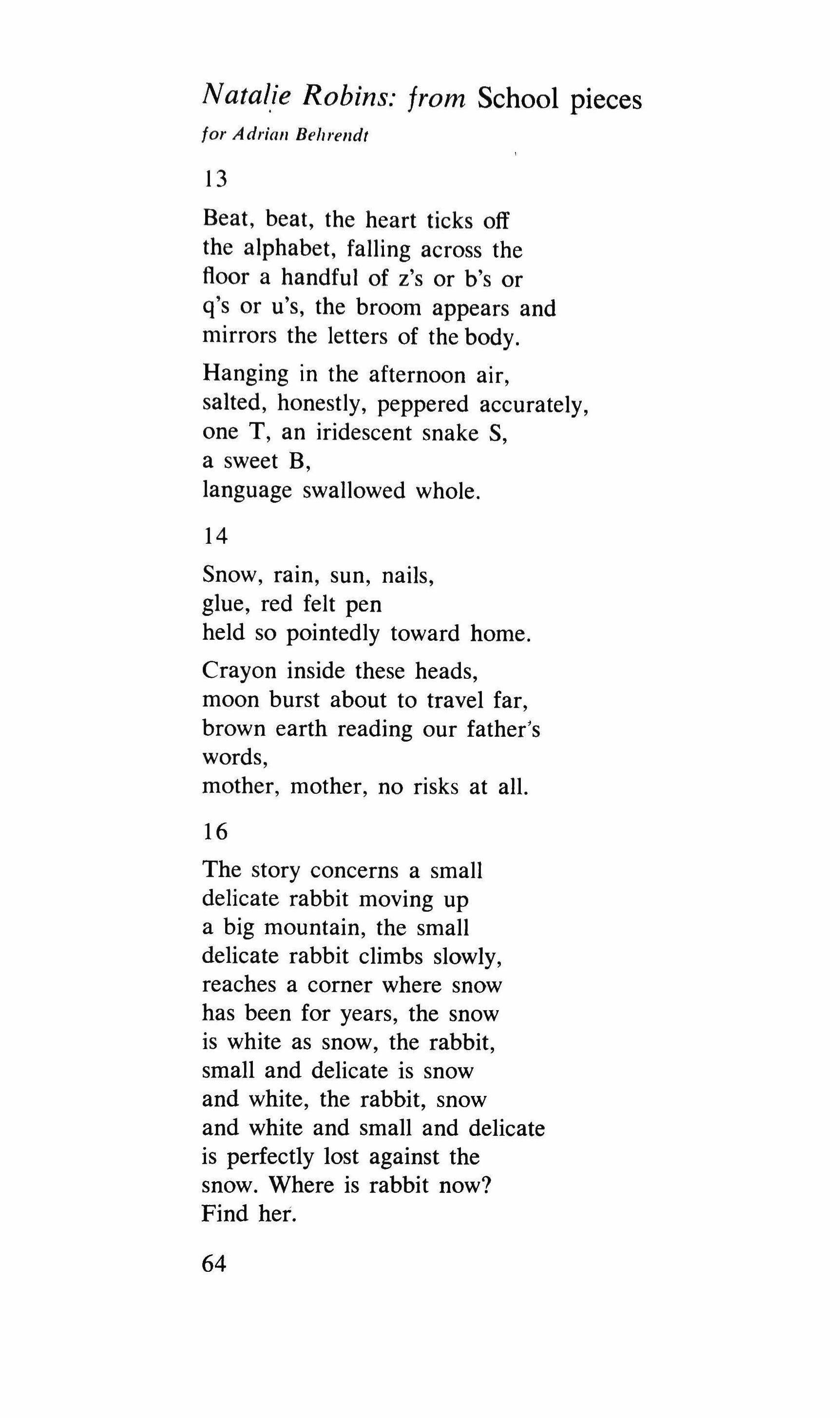
13
Beat, beat, the heart ticks off the alphabet, falling across the floor a handful of z's or b's or q's or u's, the broom appears and mirrors the letters of the body.
Hanging in the afternoon air, salted, honestly, peppered accurately, one T, an iridescent snake S, a sweet B, language swallowed whole.
14
Snow, rain, sun, nails, glue, red felt pen held so pointedly toward home.
Crayon inside these heads, moon burst about to travel far, brown earth reading our father's words, mother, mother, no risks at all.
16
The story concerns a small delicate rabbit moving up a big mountain, the small delicate rabbit climbs slowly, reaches a corner where snow has been for years, the snow is white as snow, the rabbit, small and delicate is snow and white, the rabbit, snow and white and small and delicate is perfectly lost against the snow. Where is rabbit now? Find her.

Rivers, rivers, a truck crossing into finger rivers, a bridge of lines, good x's too, that understand tunnels as well.
22
Mother is holding on to her name. The same, thirty years ago, thirty years ago! It's like tomorrow. There's talk of leaving behind. What? Nothing stays in place.
:28
Darkness swarms on the water and on this hunch of rock where we have eaten the wind speaks to us from the mouths of bottles
I see the mountains roll up beneath themselves
In the cool and perfect sunlight the clear anniversaries of distance
I'm aware that you're not here not wholly Aware of half the silence in your words
The late afternoon takes us up into a kingdom of swallows They veer and plunge Commanding our breath
A man may come a long way to hear bad news
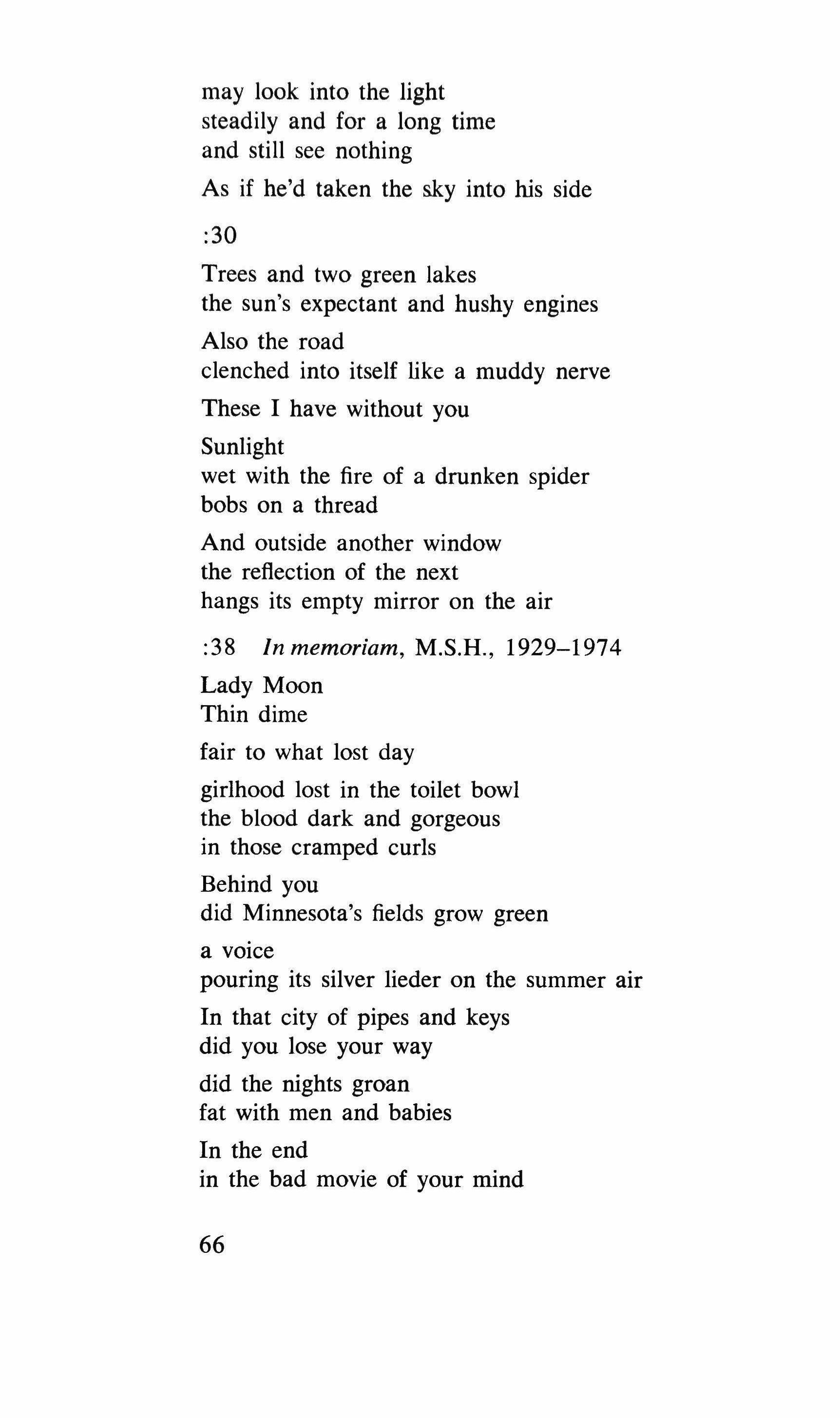
may look into the light steadily and for a long time and still see nothing
As if he'd taken the sky into his side :30
Trees and two green lakes the sun's expectant and hushy engines
Also the road clenched into itself like a muddy nerve
These I have without you
Sunlight wet with the fire of a drunken spider bobs on a thread
And outside another window the reflection of the next hangs its empty mirror on the air
:38 In memoriam, M.S.H., 1929-1974
Lady Moon
Thin dime
fair to what lost day
girlhood lost in the toilet bowl the blood dark and gorgeous in those cramped curls
Behind you did Minnesota's fields grow green a voice
pouring its silver lieder on the summer air
In that city of pipes and keys did you lose your way did the nights groan fat with men and babies
In the end in the bad movie of your mind
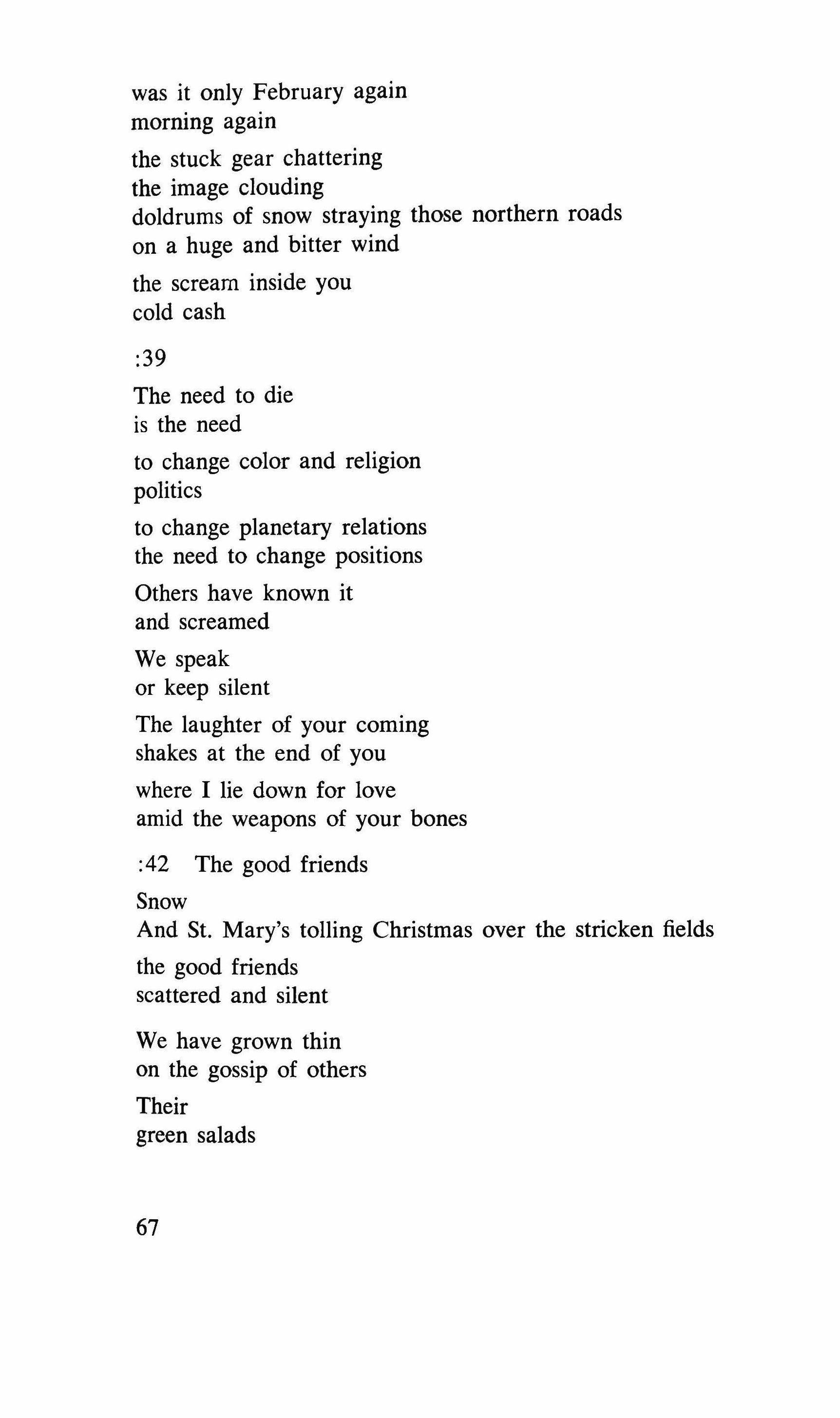
was it only February again morning again the stuck gear chattering the image clouding doldrums of snow straying those northern roads on a huge and bitter wind the scream inside you cold cash
:39
The need to die is the need to change color and religion politics to change planetary relations the need to change positions
Others have known it and screamed We speak or keep silent The laughter of your corning shakes at the end of you where I lie down for love amid the weapons of your bones
: 42 The good friends
Snow
And St. Mary's tolling Christmas over the stricken fields the good friends scattered and silent
We have grown thin on the gossip of others
Their green salads
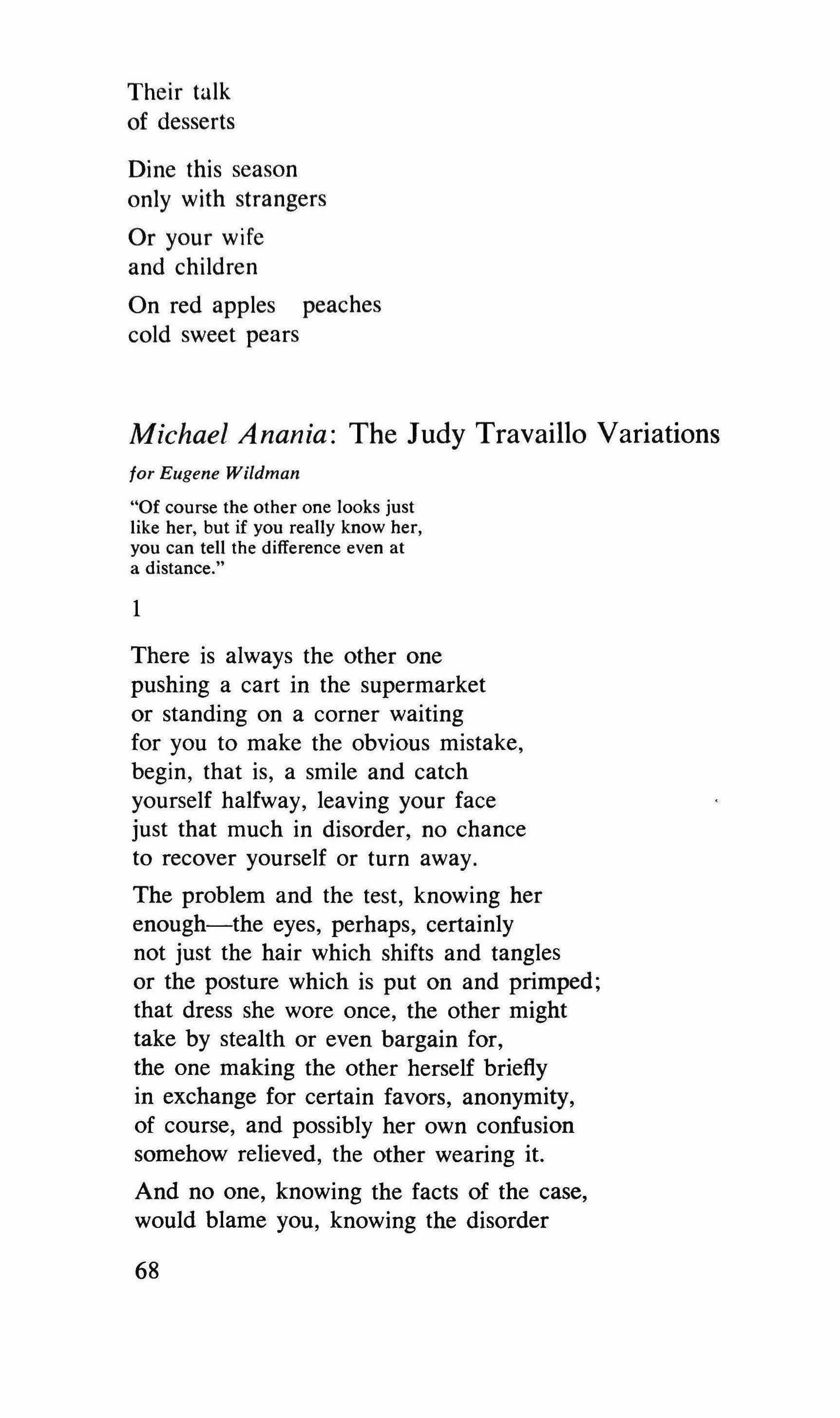
Dine this season only with strangers Or your wife and children
On red apples peaches cold sweet pears
Eugene Wildman
"Of course the other one looks just like her, but if you really know her, you can tell the difference even at a distance."
1
There is always the other one pushing a cart in the supermarket or standing on a corner waiting for you to make the obvious mistake, begin, that is, a smile and catch yourself halfway, leaving your face just that much in disorder, no chance to recover yourself or turn away.
The problem and the test, knowing her enough-the eyes, perhaps, certainly not just the hair which shifts and tangles or the posture which is put on and primped; that dress she wore once, the other might take by stealth or even bargain for, the one making the other herself briefly in exchange for certain favors, anonymity, of course, and possibly her own confusion somehow relieved, the other wearing it.
And no one, knowing the facts of the case, would blame you, knowing the disorder
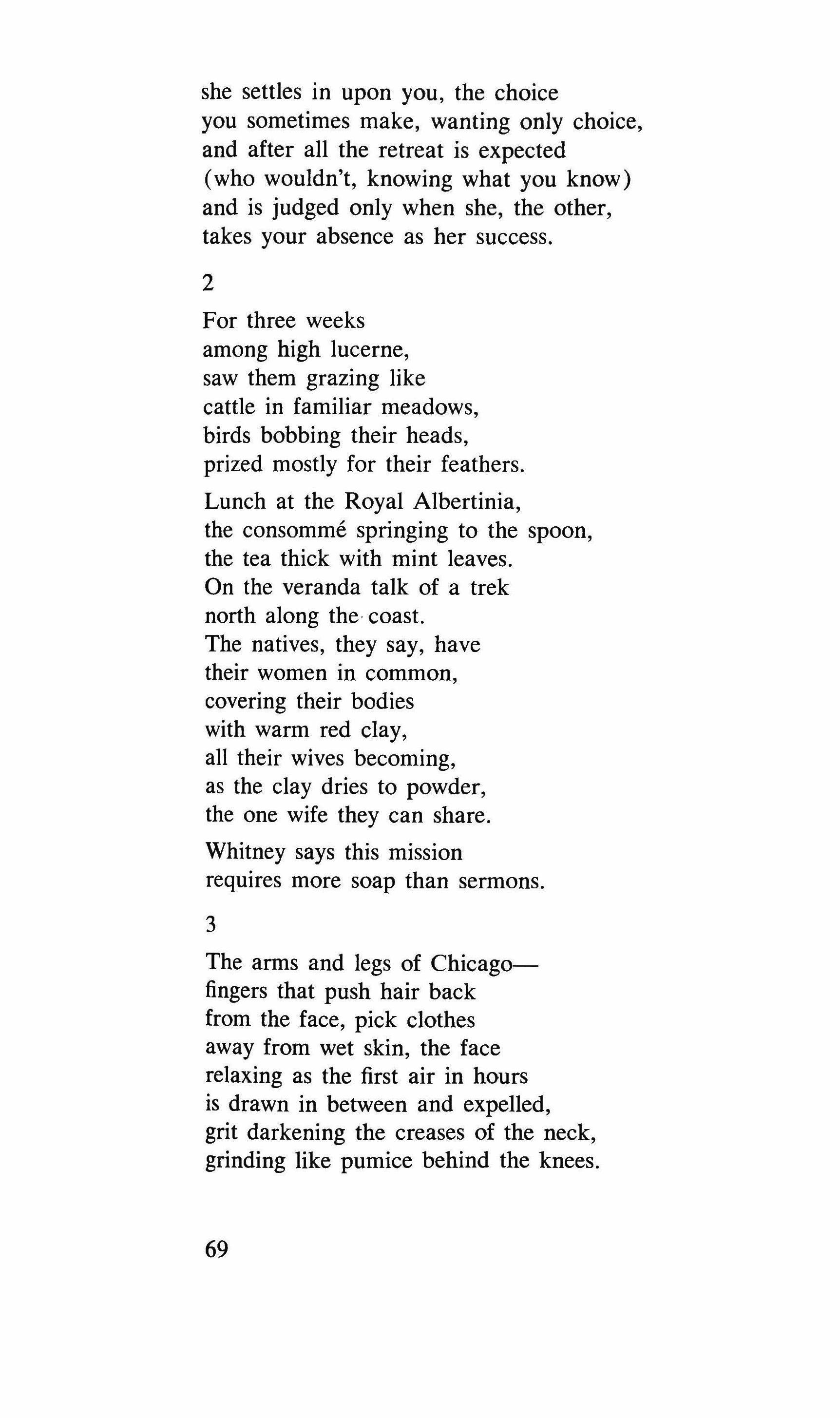
she settles in upon you, the choice you sometimes make, wanting only choice, and after all the retreat is expected (who wouldn't, knowing what you know) and is judged only when she, the other, takes your absence as her success.
2
For three weeks among high lucerne, saw them grazing like cattle in familiar meadows, birds bobbing their heads, prized mostly for their feathers. Lunch at the Royal Albertinia, the consomme springing to the spoon, the tea thick with mint leaves. On the veranda talk of a trek north along the, coast. The natives, they say, have their women in common, covering their bodies with warm red clay, all their wives becoming, as the clay dries to powder, the one wife they can share. Whitney says this mission requires more soap than sermons.
3
The arms and legs of Chicagofingers that push hair back from the face, pick clothes away from wet skin, the face relaxing as the first air in hours is drawn in between and expelled, grit darkening the creases of the neck, grinding like pumice behind the knees.
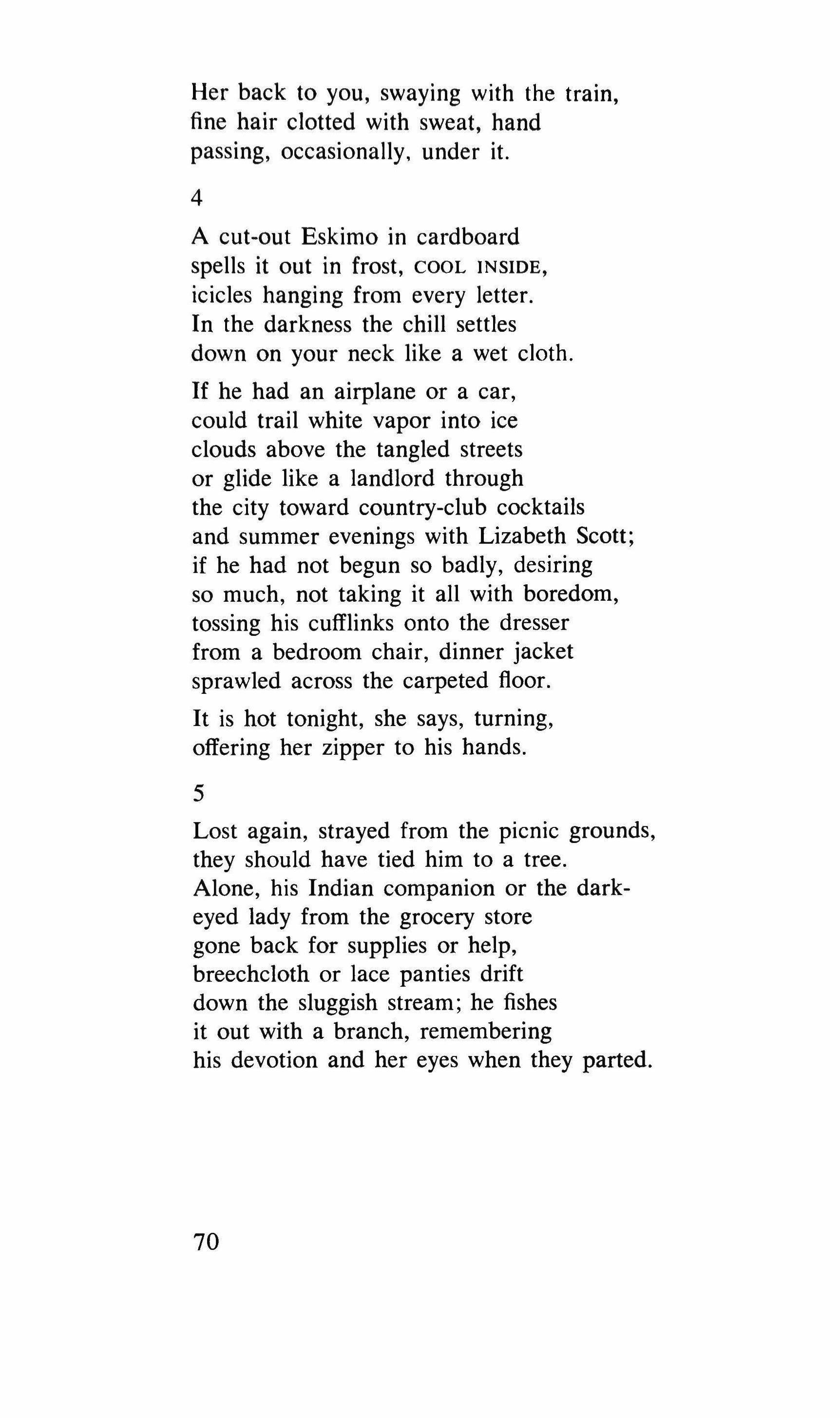
Her back to you, swaying with the train, fine hair clotted with sweat, hand passing, occasionally, under it.
4
A cut-out Eskimo in cardboard spells it out in frost, COOL INSIDE, icicles hanging from every letter. In the darkness the chill settles down on your neck like a wet cloth.
If he had an airplane or a car, could trail white vapor into ice clouds above the tangled streets or glide like a landlord through the city toward country-club cocktails and summer evenings with Lizabeth Scott; if he had not begun so badly, desiring so much, not taking it all with boredom, tossing his cufflinks onto the dresser from a bedroom chair, dinner jacket sprawled across the carpeted floor. It is hot tonight, she says, turning, offering her zipper to his hands.
5
Lost again, strayed from the picnic grounds, they should have tied him to a tree. Alone, his Indian companion or the darkeyed lady from the grocery store gone back for supplies or help, breechcloth or lace panties drift down the sluggish stream; he fishes it out with a branch, remembering his devotion and her eyes when they parted.
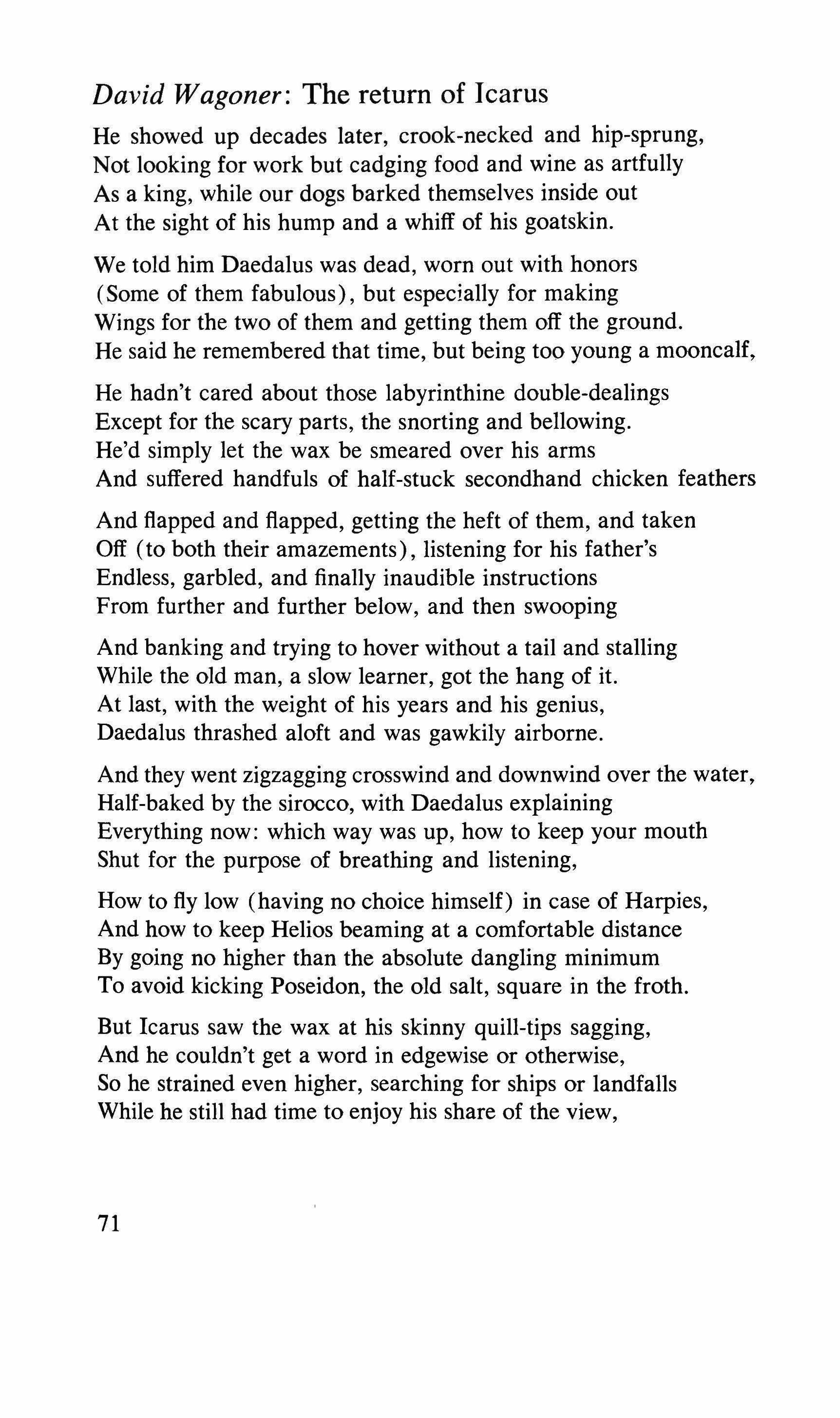
He showed up decades later, crook-necked and hip-sprung, Not looking for work but cadging food and wine as artfully As a king, while our dogs barked themselves inside out At the sight of his hump and a whiff of his goatskin.
We told him Daedalus was dead, worn out with honors (Some of them fabulous), but especially for making Wings for the two of them and getting them off the ground. He said he remembered that time, but being too young a mooncalf, He hadn't cared about those labyrinthine double-dealings
Except for the scary parts, the snorting and bellowing. He'd simply let the wax be smeared over his arms And suffered handfuls of half-stuck secondhand chicken feathers
And flapped and flapped, getting the heft of them, and taken Off (to both their amazements), listening for his father's Endless, garbled, and finally inaudible instructions From further and further below, and then swooping
And banking and trying to hover without a tail and stalling While the old man, a slow learner, got the hang of it. At last, with the weight of his years and his genius, Daedalus thrashed aloft and was gawkily airborne.
And they went zigzagging crosswind and downwind over the water, Half-baked by the sirocco, with Daedalus explaining
Everything now: which way was up, how to keep your mouth Shut for the purpose of breathing and listening,
How to fly low (having no choice himself) in case of Harpies, And how to keep Helios beaming at a comfortable distance By going no higher than the absolute dangling minimum To avoid kicking Poseidon, the old salt, square in the froth.
But Icarus saw the wax at his skinny quill-tips sagging, And he couldn't get a word in edgewise or otherwise, So he strained even higher, searching for ships or landfalls While he still had time to enjoy his share of the view,
And in the bright, high-spirited silence, he took comfort
From his father's lack of advice, and Helios turned Cool, not hot as Icarus rose, joining a wedge of geese
For an embarrassing, exhilarating moment northward,
And then grew cold till the wax turned brittle as marble, Stiffening his elbows and suddenly breaking Away, leaving him wingless, clawing at nothing, then falling Headfirst with a panoramic, panchromatic vista
Of the indifferent sun, the indifferent ocean, and a familiar Father passing sideways, still chugging and flailing away With rows of eagle feathers. When Icarus hit the water, He took its salt as deeply as his own.
He didn't tell us how he'd paddled ashore or where He'd been keeping himself or what in the world he'd been doing For a living, yet he didn't seem bitter. "Too bad You weren't around," we said, "there'd have been something in it
For you, probably-an apartment straddling an aqueduct, Orchards, invitations, hecatombs of women."
"No hard feelings," he said. "Wings weren't my idea."
And he told odd crooked stories to children for hours
About what lived under water, what lived under the earth, And what still lived in the air, and why. A few days later He slouched off on his game leg and didn't come back. He didn't steal any chickens or girls' hearts
Or ask after his father's grave or his father's money Or even kick the dogs. But he showed us calluses Thicker than hooves on his soles and palms, and told us
That's how he'd stay in touch, keeping his feet on the ground.
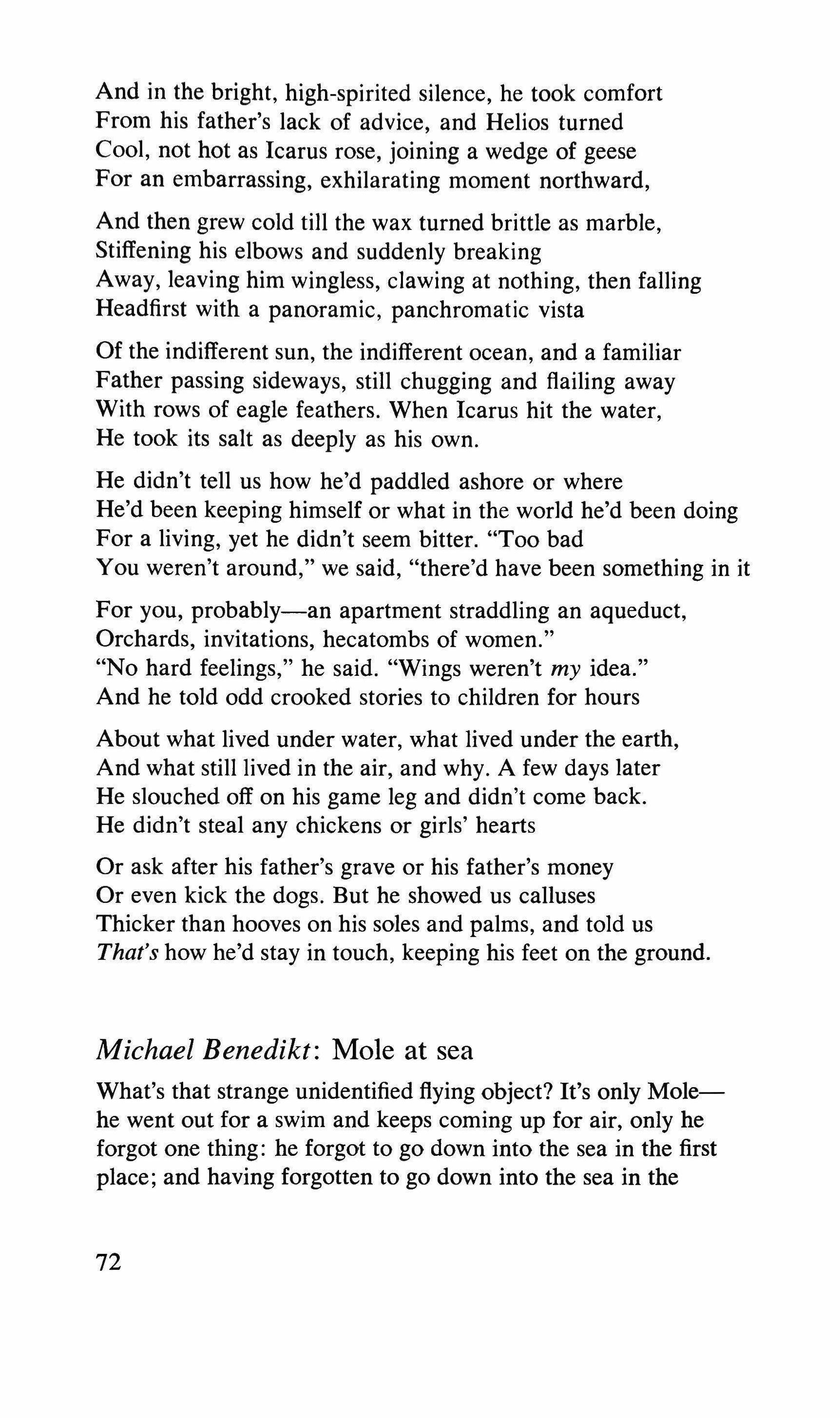
What's that strange unidentified flying object? It's only Molehe went out for a swim and keeps coming up for air, only he forgot one thing: he forgot to go down into the sea in the first place; and having forgotten to go down into the sea in the
Michael Benedikt: Mole at sea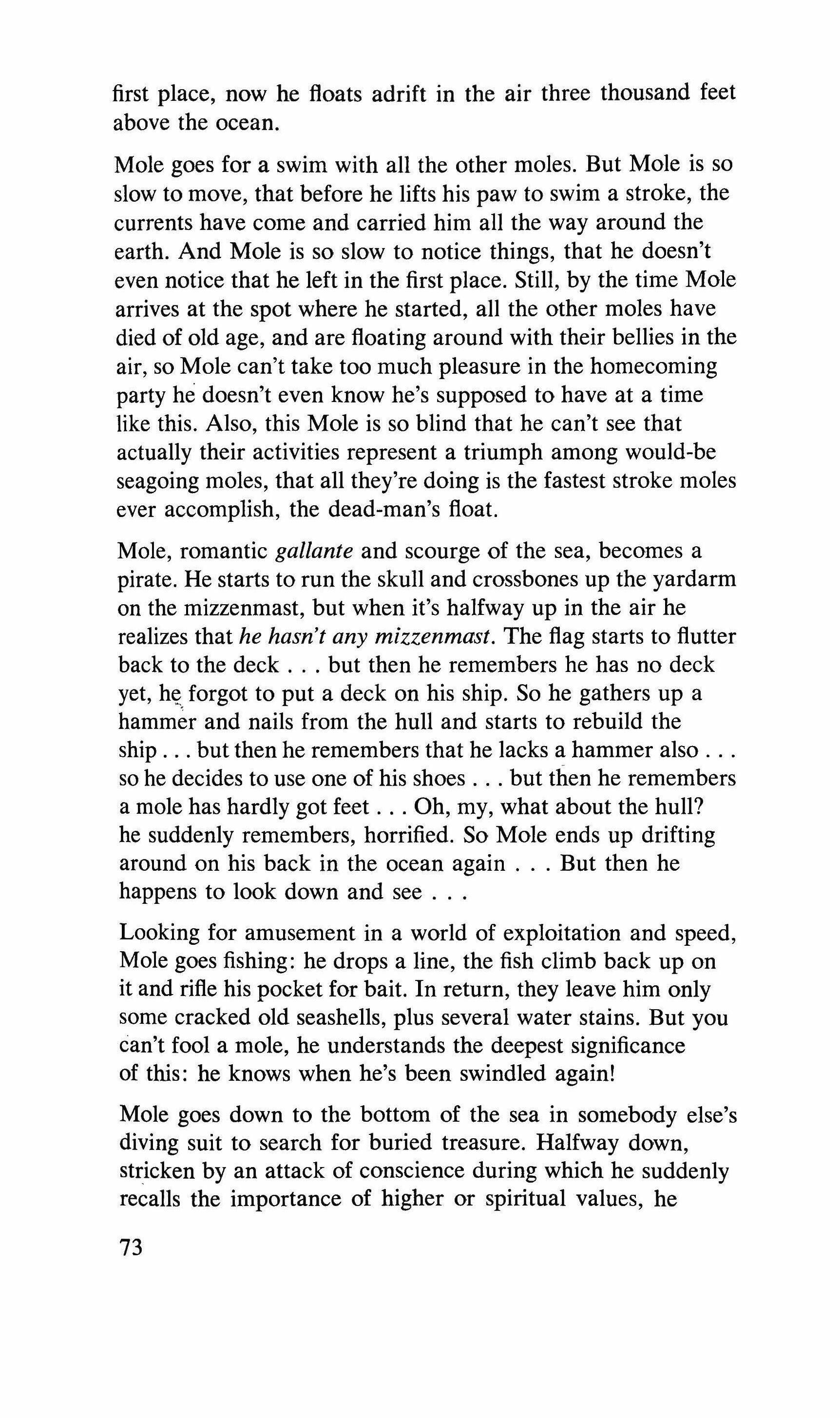
first place, now he floats adrift in the air three thousand feet above the ocean.
Mole goes for a swim with all the other moles. But Mole is so slow to move, that before he lifts his paw to swim a stroke, the currents have come and carried him all the way around the earth. And Mole is so slow to notice things, that he doesn't even notice that he left in the first place. Still, by the time Mole arrives at the spot where he started, all the other moles have died of old age, and are floating around with their bellies in the air, so Mole can't take too much pleasure in the homecoming party he doesn't even know he's supposed to have at a time like this. Also, this Mole is so blind that he can't see that actually their activities represent a triumph among would-be seagoing moles, that all they're doing is the fastest stroke moles ever accomplish, the dead-man's float.
Mole, romantic gallante and scourge of the sea, becomes a pirate. He starts to run the skull and crossbones up the yardarm on the mizzenmast, but when it's halfway up in the air he realizes that he hasn't any mizzenmast. The flag starts to flutter back to the deck but then he remembers he has no deck yet, he forgot to put a deck on his ship. So he gathers up a hammer and nails from the hull and starts to rebuild the ship but then he remembers that he lacks a hammer also so he decides to use one of his shoes but then he remembers a mole has hardly got feet Oh, my, what about the hull? he suddenly remembers, horrified. So Mole ends up drifting around on his back in the ocean again But then he happens to look down and see
Looking for amusement in a world of exploitation and speed, Mole goes fishing: he drops a line, the fish climb back up on it and rifle his pocket for bait. In return, they leave him only some cracked old seashells, plus several water stains. But you can't fool a mole, he understands the deepest significance of this: he knows when he's been swindled again!
Mole goes down to the bottom of the sea in somebody else's diving suit to search for buried treasure. Halfway down, stricken by an attack of conscience during which he suddenly recalls the importance of higher or spiritual values, he
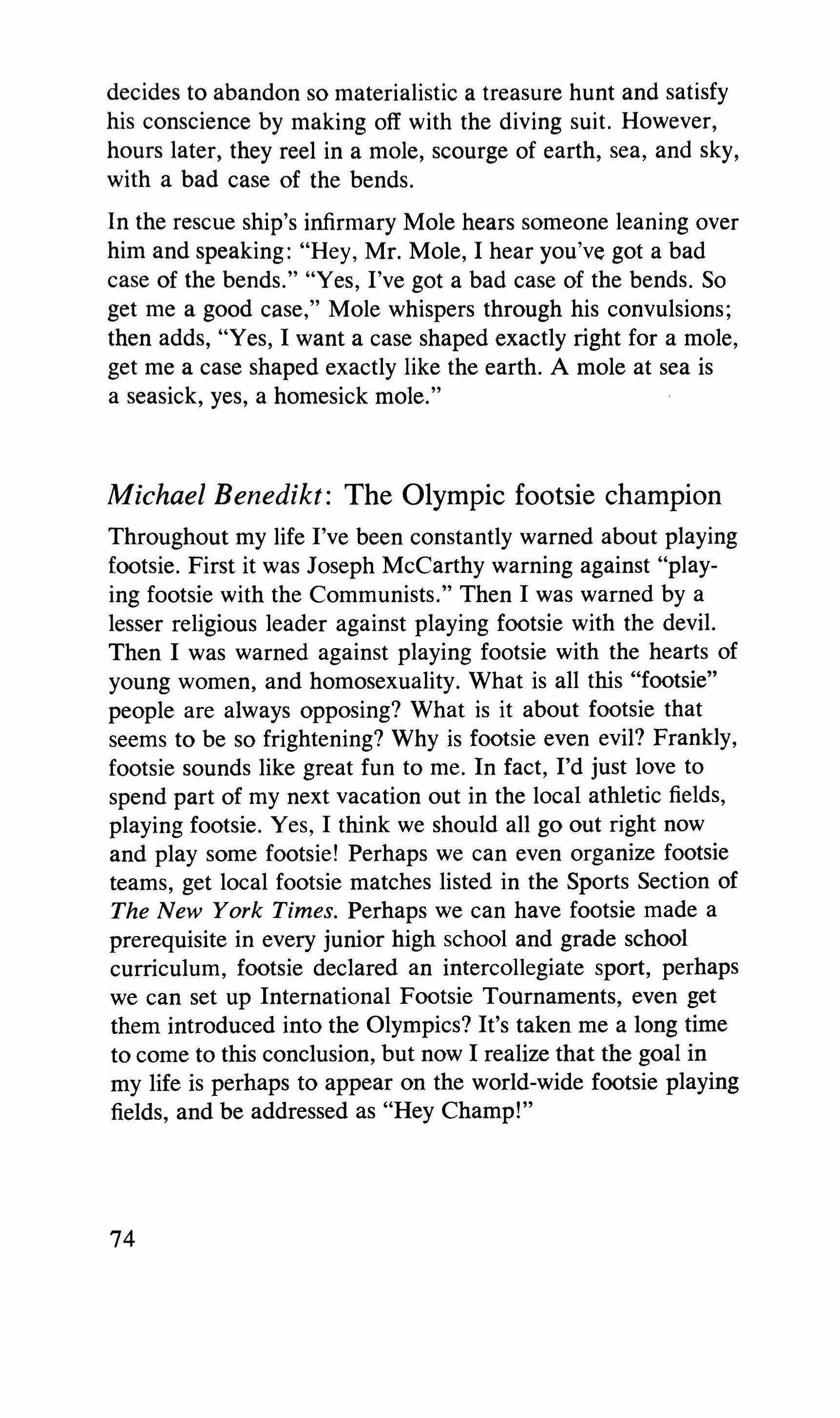
decides to abandon so materialistic a treasure hunt and satisfy his conscience by making off with the diving suit. However, hours later, they reel in a mole, scourge of earth, sea, and sky, with a bad case of the bends.
In the rescue ship's infirmary Mole hears someone leaning over him and speaking: "Hey, Mr. Mole, I hear you've got a bad case of the bends." "Yes, I've got a bad case of the bends. So get me a good case," Mole whispers through his convulsions; then adds, "Yes, I want a case shaped exactly right for a mole, get me a case shaped exactly like the earth. A mole at sea is a seasick, yes, a homesick mole."
Throughout my life I've been constantly warned about playing footsie. First it was Joseph McCarthy warning against "playing footsie with the Communists." Then I was warned by a lesser religious leader against playing footsie with the devil. Then I was warned against playing footsie with the hearts of young women, and homosexuality. What is all this "footsie" people are always opposing? What is it about footsie that seems to be so frightening? Why is footsie even evil? Frankly, footsie sounds like great fun to me. In fact, I'd just love to spend part of my next vacation out in the local athletic fields, playing footsie. Yes, I think we should all go out right now and play some footsie! Perhaps we can even organize footsie teams, get local footsie matches listed in the Sports Section of The New York Times. Perhaps we can have footsie made a prerequisite in every junior high school and grade school curriculum, footsie declared an intercollegiate sport, perhaps we can set up International Footsie Tournaments, even get them introduced into the Olympics? It's taken me a long time to come to this conclusion, but now I realize that the goal in my life is perhaps to appear on the world-wide footsie playing fields, and be addressed as "Hey Champ!"
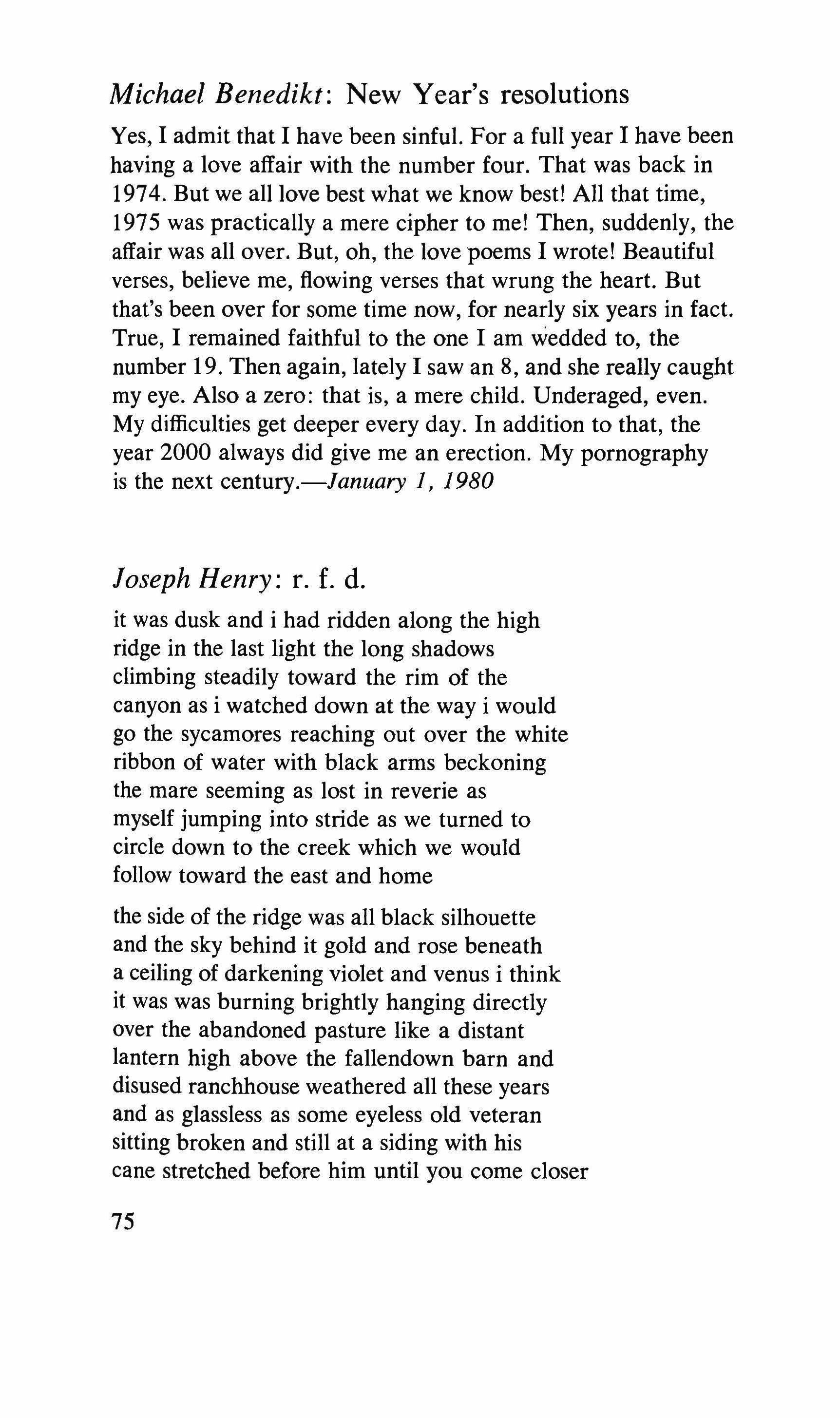
Yes, I admit that I have been sinful. For a full year I have been having a love affair with the number four. That was back in 1974. But we all love best what we know best! All that time, 1975 was practically a mere cipher to me! Then, suddenly, the affair was all over. But, oh, the love poems I wrote! Beautiful verses, believe me, flowing verses that wrung the heart. But that's been over for some time now, for nearly six years in fact. True, I remained faithful to the one I am wedded to, the number 19. Then again, lately I saw an 8, and she really caught my eye. Also a zero: that is, a mere child. Underaged, even. My difficulties get deeper every day. In addition to that, the year 2000 always did give me an erection. My pornography is the next century.-January 1, 1980
it was dusk and i had ridden along the high ridge in the last light the long shadows climbing steadily toward the rim of the canyon as i watched down at the way i would go the sycamores reaching out over the white ribbon of water with black arms beckoning the mare seeming as lost in reverie as myself jumping into stride as we turned to circle down to the creek which we would follow toward the east and home the side of the ridge was all black silhouette and the sky behind it gold and rose beneath a ceiling of darkening violet and venus i think it was was burning brightly hanging directly over the abandoned pasture like a distant lantern high above the fallendown barn and disused ranchhouse weathered all these years and as glassless as some eyeless old veteran sitting broken and still at a siding with his cane stretched before him until you come closer 75
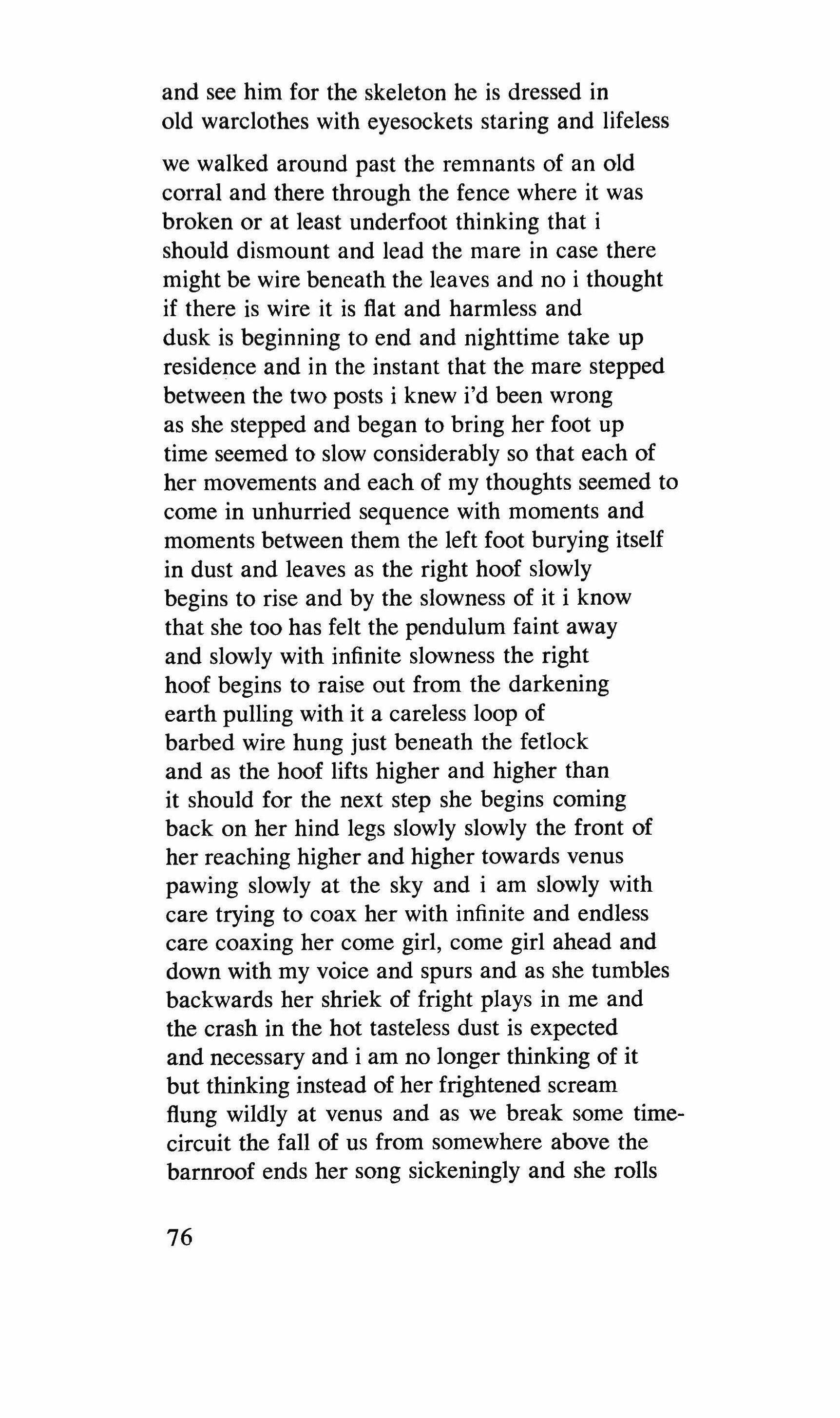
and see him for the skeleton he is dressed in old warclothes with eyesockets staring and lifeless we walked around past the remnants of an old corral and there through the fence where it was broken or at least underfoot thinking that i should dismount and lead the mare in case there might be wire beneath the leaves and no i thought if there is wire it is flat and harmless and dusk is beginning to end and nighttime take up residence and in the instant that the mare stepped between the two posts i knew i'd been wrong as she stepped and began to bring her foot up time seemed to slow considerably so that each of her movements and each of my thoughts seemed to come in unhurried sequence with moments and moments between them the left foot burying itself in dust and leaves as the right hoof slowly begins to rise and by the slowness of it i know that she too has felt the pendulum faint away and slowly with infinite slowness the right hoof begins to raise out from the darkening earth pulling with it a careless loop of barbed wire hung just beneath the fetlock and as the hoof lifts higher and higher than it should for the next step she begins coming back on her hind legs slowly slowly the front of her reaching higher and higher towards venus pawing slowly at the sky and i am slowly with care trying to coax her with infinite and endless care coaxing her come girl, come girl ahead and down with my voice and spurs and as she tumbles backwards her shriek of fright plays in me and the crash in the hot tasteless dust is expected and necessary and i am no longer thinking of it but thinking instead of her frightened scream flung wildly at venus and as we break some timecircuit the fall of us from somewhere above the barnroof ends her song sickeningly and she rolls

across me and the circuit jogs a second time and slowly as my body completes its slow revolution in the dark and endless dust slowly i feel her arching high over me shrieking again at night so tenuous and insistent and pulling at her leg with its dark barbed stubbornness and as my circle of being finishes for the time in anticipation waiting waiting endlessly she breaks herself free and falls back to earth and waiting waiting but where it comes the steel hoof as final as nightfall comes crashing on but beyond my hand my left hand and the force of it ending the slowness of time seems to throw me just half again in the dust the red but tasteless dust leaving only an echoing silence that dims to black
awareness comes haltingly in stages and unmoving i listen for the mare and hear her close by me cropping and grinding bits of grass and weed and softly touching with her hooves so ivory and silent the dust the redness of it and i hold that for moments the sound of her eating and stepping delicately on the ground i go further still unmoving and feel the dust red and coagulant across my forehead and clinging in bits of beard and one leg my left one slides in chaps dustswollen across the other jangles with muted conchas and lies still and it seems that the tastelessness of it should be different should taste red and airy but comes on my tongue with only a heavy grittiness and the rest of me of a sudden sways after my leg and comes to rest fiat on my stomach pillowed in dust and i cling there for the moment and then loosen myself and slowly travel past my shoulders and it is in my left arm near my hand the steel and ivory burning with a wide and open fire and i let it go and will come back to it i breathe again and wonder why i am breathing through my teeth and go for a fuller hungrier breath and am yanked at the top of my side
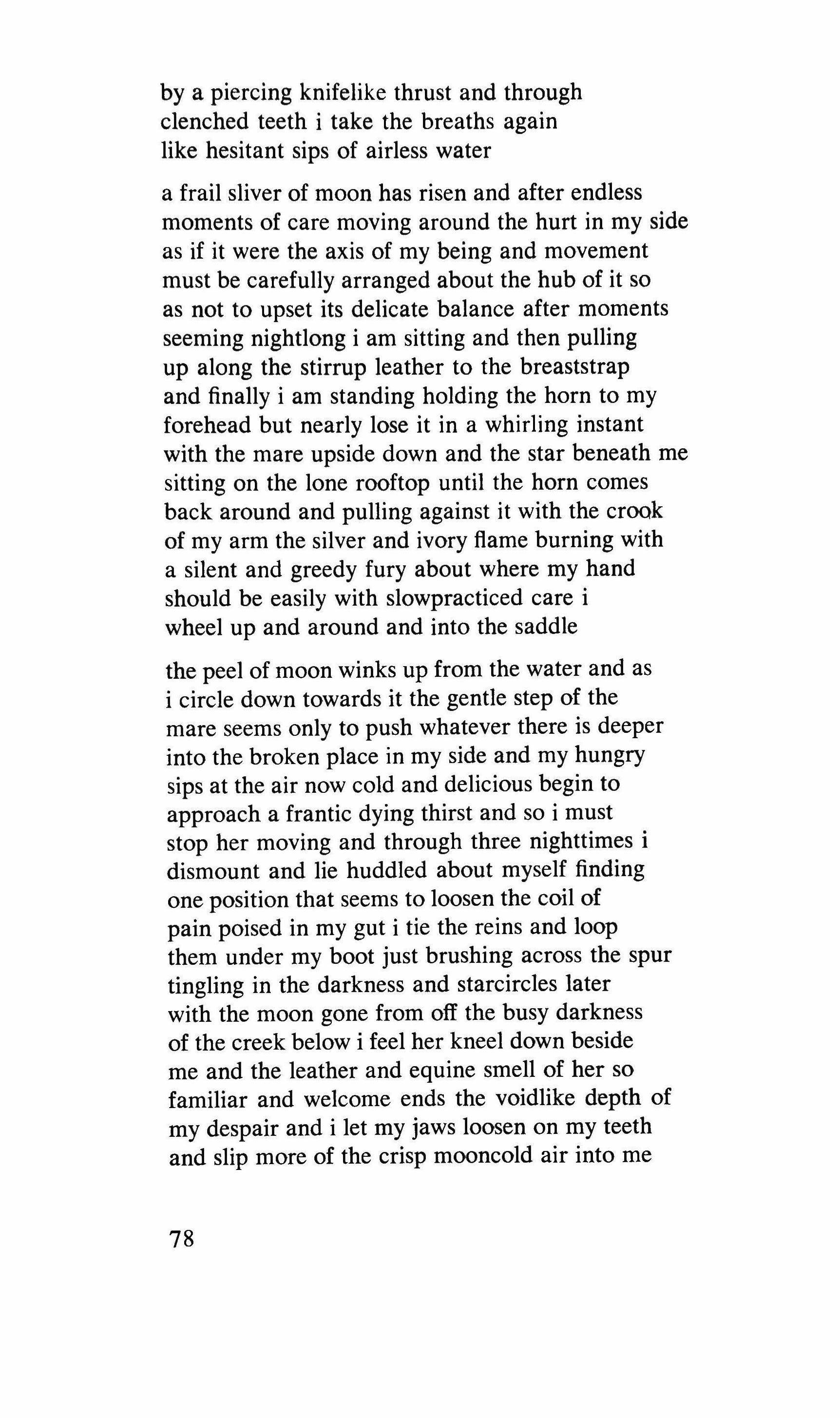
by a piercing knifelike thrust and through clenched teeth i take the breaths again like hesitant sips of airless water
a frail sliver of moon has risen and after endless moments of care moving around the hurt in my side as if it were the axis of my being and movement must be carefully arranged about the hub of it so as not to upset its delicate balance after moments seeming nightlong i am sitting and then pulling up along the stirrup leather to the breaststrap and finally i am standing holding the horn to my forehead but nearly lose it in a whirling instant with the mare upside down and the star beneath me sitting on the lone rooftop until the horn comes back around and pulling against it with the crook of my arm the silver and ivory flame burning with a silent and greedy fury about where my hand should be easily with slowpracticed care i wheel up and around and into the saddle
the peel of moon winks up from the water and as i circle down towards it the gentle step of the mare seems only to push whatever there is deeper into the broken place in my side and my hungry sips at the air now cold and delicious begin to approach a frantic dying thirst and so i must stop her moving and through three nighttimes i dismount and lie huddled about myself finding one position that seems to loosen the coil of pain poised in my gut i tie the reins and loop them under my boot just brushing across the spur tingling in the darkness and starcircles later with the moon gone from off the busy darkness of the creek below i feel her kneel down beside me and the leather and equine smell of her so familiar and welcome ends the voidlike depth of my despair and i let my jaws loosen on my teeth and slip more of the crisp mooncold air into me
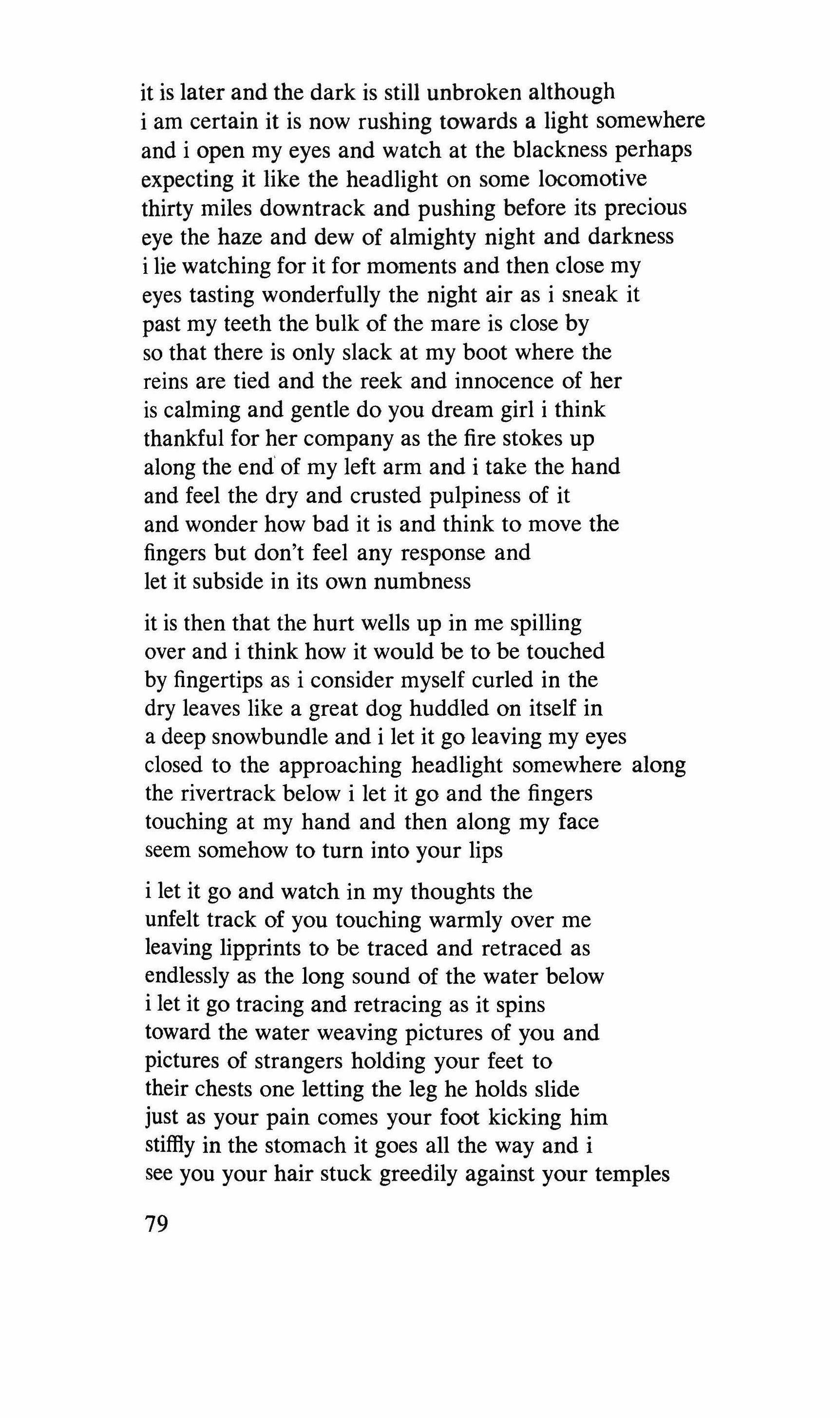
it is later and the dark is still unbroken although i am certain it is now rushing towards a light somewhere and i open my eyes and watch at the blackness perhaps expecting it like the headlight on some locomotive thirty miles downtrack and pushing before its precious eye the haze and dew of almighty night and darkness i lie watching for it for moments and then close my eyes tasting wonderfully the night air as i sneak it past my teeth the bulk of the mare is close by so that there is only slack at my boot where the reins are tied and the reek and innocence of her is calming and gentle do you dream girl i think thankful for her company as the fire stokes up along the end' of my left arm and i take the hand and feel the dry and crusted pulpiness of it and wonder how bad it is and think to move the fingers but don't feel any response and let it subside in its own numbness
it is then that the hurt wells up in me spilling over and i think how it would be to be touched by fingertips as i consider myself curled in the dry leaves like a great dog huddled on itself in a deep snowbundle and i let it go leaving my eyes closed to the approaching headlight somewhere along the rivertrack below i let it go and the fingers touching at my hand and then along my face seem somehow to turn into your lips
i let it go and watch in my thoughts the unfelt track of you touching warmly over me leaving lipprints to be traced and retraced as endlessly as the long sound of the water below i let it go tracing and retracing as it spins toward the water weaving pictures of you and pictures of strangers holding your feet to their chests one letting the leg he holds slide just as your pain comes your foot kicking him stiffly in the stomach it goes all the way and i see you your hair stuck greedily against your temples
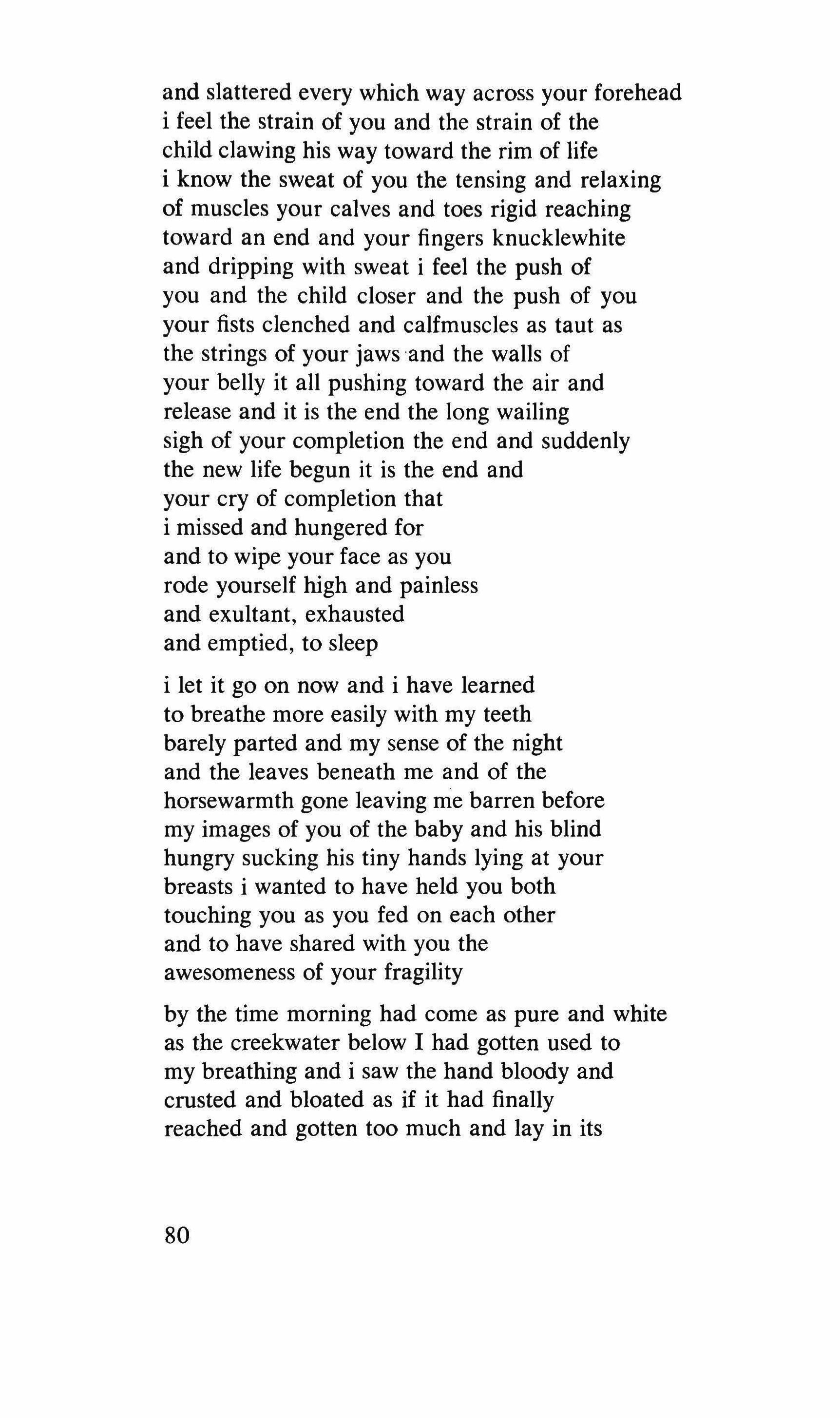
and slattered every which way across your forehead i feel the strain of you and the strain of the child clawing his way toward the rim of life i know the sweat of you the tensing and relaxing of muscles your calves and toes rigid reaching toward an end and your fingers knucklewhite and dripping with sweat i feel the push of you and the child closer and the push of you your fists clenched and calfmuscles as taut as the strings of your jaws and the walls of your belly it all pushing toward the air and release and it is the end the long wailing sigh of your completion the end and suddenly the new life begun it is the end and your cry of completion that i missed and hungered for and to wipe your face as you rode yourself high and painless and exultant, exhausted and emptied, to sleep
i let it go on now and i have learned to breathe more easily with my teeth barely parted and my sense of the night and the leaves beneath me and of the horsewarmth gone leaving me barren before my images of you of the baby and his blind hungry sucking his tiny hands lying at your breasts i wanted to have held you both touching you as you fed on each other and to have shared with you the awesomeness of your fragility by the time morning had come as pure and white as the creekwater below I had gotten used to my breathing and i saw the hand bloody and crusted and bloated as if it had finally reached and gotten too much and lay in its 80

stupor of reaching bloated and sated and ripped from its excess and paying with its own blood and a calm unfeeling nervelessness the fingers were useless with the reins and hardened as with a bloodred mud where the steel from the mare's shoe had torn but somehow i was satisfied it would turn and recall itself and in time be the lefthanded part of me reaching again in its lefthanded ways it was after we had gotten to the creekhead and i had slowly lowered myself into a pooling place letting myself slide sitting into the water so as not to surprise the solidified pain at my side and forgetting take too much air at once and the water played its nursemaid taking the dust from off the dried bloodied places the red riding the whiteblue ripples like drops of wine and pushing myself carefully out of the water i crouched and waited until the sun rose over the thickness of the shoretrees and dressed
it was between the creek and the open range that lies behind cathedral rock that i came on the small band of cattle free-ranging about a thicket of cottonwood and quietly passing saw a cow bent over a little pile of something with the long string of cord still hanging raw from her backside i turned the mare and came around behind the other side of the woods so i was opposite and facing her and she was still bent licking the fluid and matter from the justborn shivering calf its hair matted and soaken and lying there unmoving but for its ceaseless shivering sometimes throwing a whole tremor through its dogbig body and the long strong mothertongue scraping warm and cleansing all across it. perhaps an hour had passed perhaps more or less and i became aware of the mare chewing across her bit and every so often
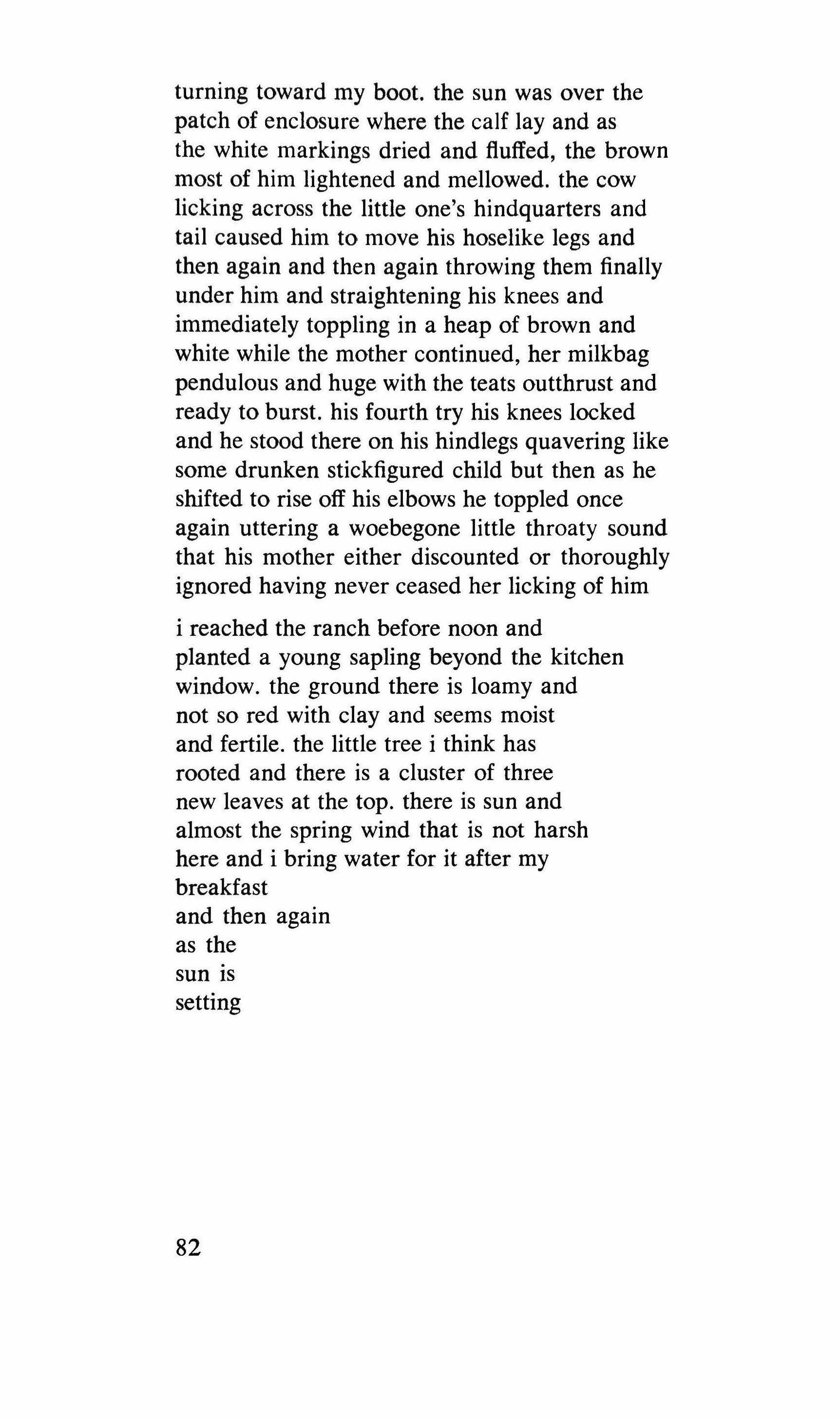
turning toward my boot. the sun was over the patch of enclosure where the calf lay and as the white markings dried and fluffed, the brown most of him lightened and mellowed. the cow licking across the little one's hindquarters and tail caused him to move his hoselike legs and then again and then again throwing them finally under him and straightening his knees and immediately toppling in a heap of brown and white while the mother continued, her milkbag pendulous and huge with the teats outthrust and ready to burst. his fourth try his knees locked and he stood there on his hindlegs quavering like some drunken stickfigured child but then as he shifted to rise off his elbows he toppled once again uttering a woebegone little throaty sound that his mother either discounted or thoroughly ignored having never ceased her licking of him i reached the ranch before noon and planted a young sapling beyond the kitchen window. the ground there is loamy and not so red with clay and seems moist and fertile. the little tree i think has rooted and there is a cluster of three new leaves at the top. there is sun and almost the spring wind that is not harsh here and i bring water for it after my breakfast and then again as the sun is setting
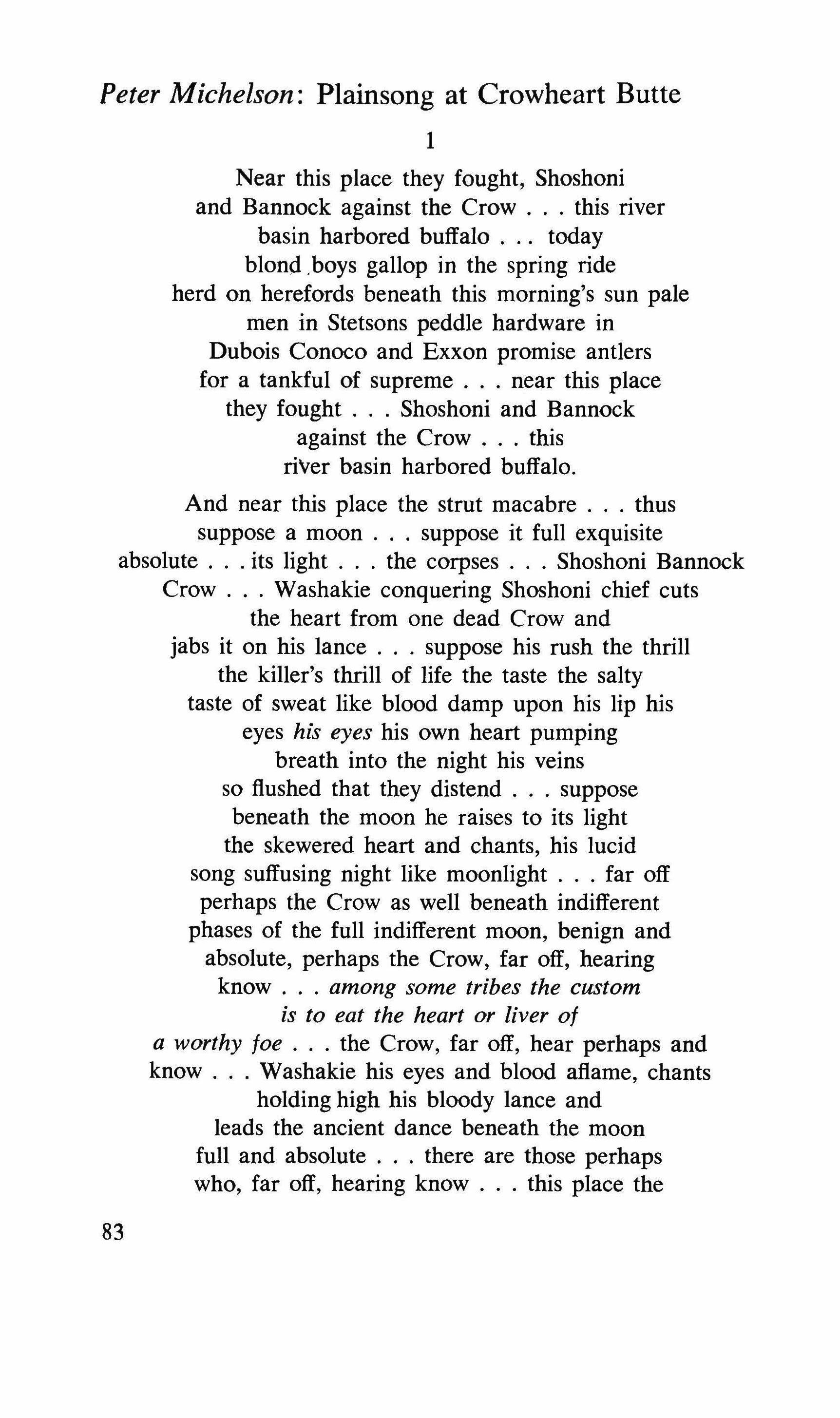
Near this place they fought, Shoshoni and Bannock against the Crow this river basin harbored buffalo today blond .boys gallop in the spring ride herd on herefords beneath this morning's sun pale men in Stetsons peddle hardware in Dubois Conoeo and Exxon promise antlers for a tankful of supreme near this place they fought Shoshoni and Bannock against the Crow this river basin harbored buffalo.
And near this place the strut macabre thus suppose a moon suppose it full exquisite absolute its light the corpses Shoshoni Bannock Crow Washakie conquering Shoshoni chief cuts the heart from one dead Crow and jabs it on his lance suppose his rush the thrill the killer's thrill of life the taste the salty taste of sweat like blood damp upon his lip his eyes his eyes his own heart pumping breath into the night his veins so flushed that they distend suppose beneath the moon he raises to its light the skewered heart and chants, his lucid song suffusing night like moonlight far off perhaps the Crow as well beneath indifferent phases of the full indifferent moon, benign and absolute, perhaps the Crow, far off, hearing know among some tribes the custom is to eat the heart or liver of a worthy foe the Crow, far off, hear perhaps and know Washakie his eyes and blood aflame, chants holding high his bloody lance and leads the ancient dance beneath the moon full and absolute there are those perhaps who, far off, hearing know this place the
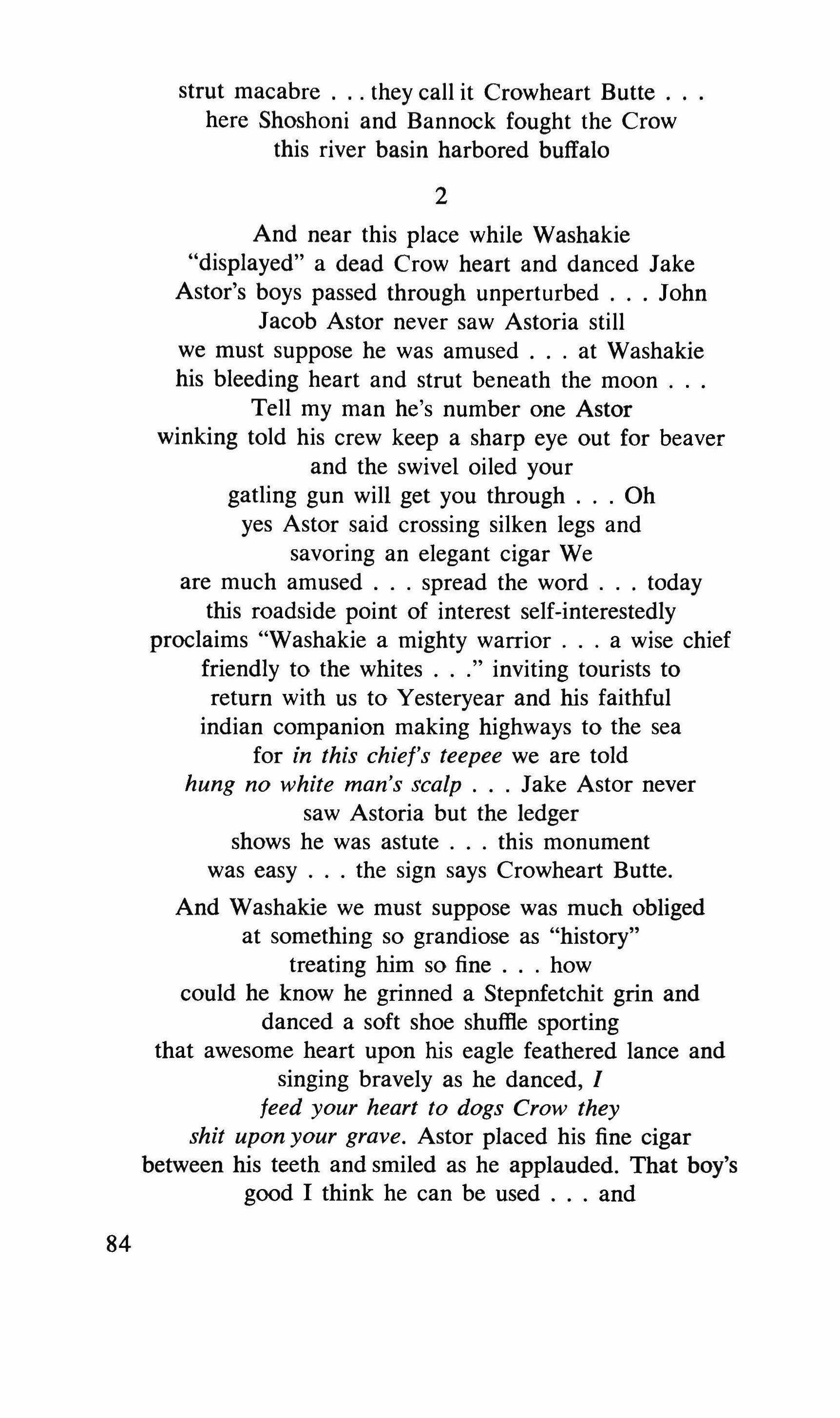
strut macabre they call it Crowheart Butte here Shoshoni and Bannock fought the Crow this river basin harbored buffalo
2
And near this place while Washakie "displayed" a dead Crow heart and danced Jake Astor's boys passed through unperturbed John Jacob Astor never saw Astoria still we must suppose he was amused at Washakie his bleeding heart and strut beneath the moon Tell my man he's number one Astor winking told his crew keep a sharp eye out for beaver and the swivel oiled your gatling gun will get you through Oh yes Astor said crossing silken legs and savoring an elegant cigar We are much amused spread the word today this roadside point of interest self-interestedly proclaims "Washakie a mighty warrior a wise chief friendly to the whites ." inviting tourists to return with us to Yesteryear and his faithful indian companion making highways to the sea for in this chief's teepee we are told hung no white man's scalp Jake Astor never saw Astoria but the ledger shows he was astute this monument was easy the sign says Crowheart Butte. And Washakie we must suppose was much obliged at something so grandiose as "history" treating him so fine how could he know he grinned a Stepnfetchit grin and danced a soft shoe shuffle sporting that awesome heart upon his eagle feathered lance and singing bravely as he danced, I feed your heart to dogs Crow they shit upon your grave. Astor placed his fine cigar between his teeth and smiled as he applauded. That boy's good I think he can be used and
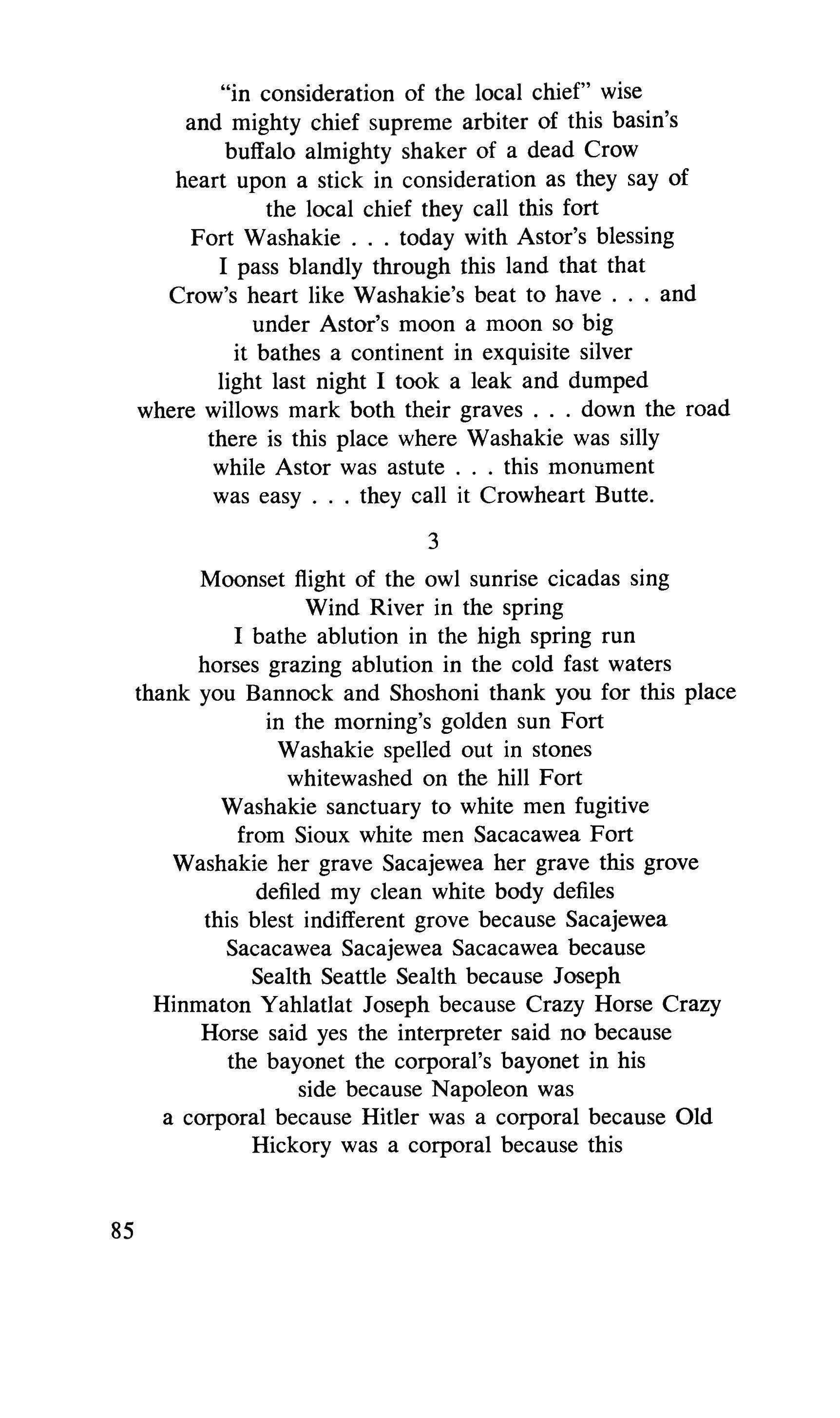
"in consideration of the local chief" wise and mighty chief supreme arbiter of this basin's buffalo almighty shaker of a dead Crow heart upon a stick in consideration as they say of the local chief they call this fort Fort Washakie today with Astor's blessing I pass blandly through this land that that Crow's heart like Washakie's beat to have and under Astor's moon a moon so big it bathes a continent in exquisite silver light last night I took a leak and dumped where willows mark both their graves down the road there is this place where Washakie was silly while Astor was astute this monument was easy they call it Crowheart Butte.
3
Moonset flight of the owl sunrise cicadas sing Wind River in the spring I bathe ablution in the high spring run horses grazing ablution in the cold fast waters thank you Bannock and Shoshoni thank you for this place in the morning's golden sun Fort Washakie spelled out in stones whitewashed on the hill Fort Washakie sanctuary to white men fugitive from Sioux white men Sacacawea Fort Washakie her grave Sacajewea her grave this grove defiled my clean white body defiles this blest indifferent grove because Sacajewea Sacacawea Sacajewea Sacacawea because Sealth Seattle Sealth because Joseph Hinmaton Yahlatlat Joseph because Crazy Horse Crazy Horse said yes the interpreter said no because the bayonet the corporal's bayonet in his side because Napoleon was a corporal because Hitler was a corporal because Old Hickory was a corporal because this
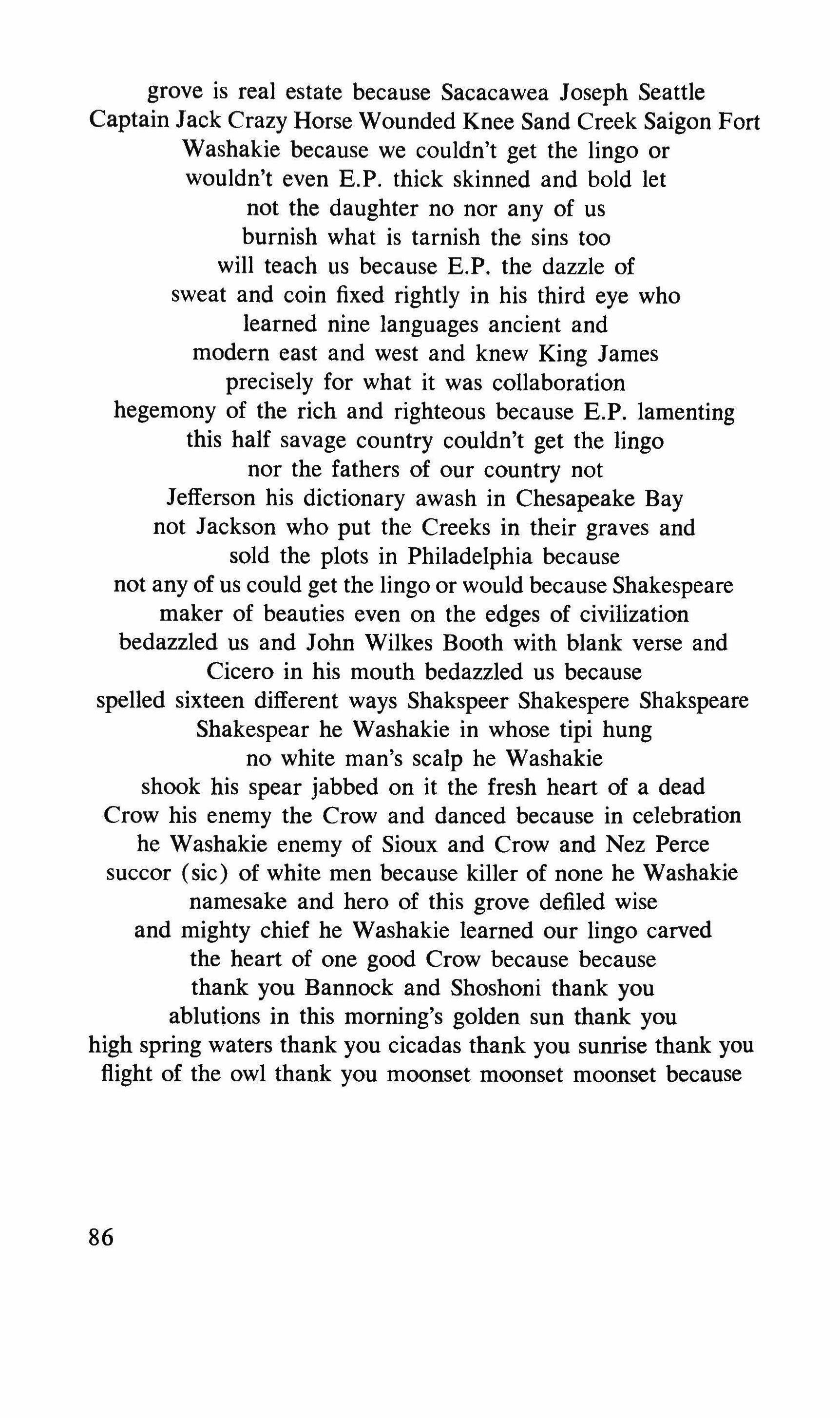
grove is real estate because Sacacawea Joseph Seattle Captain Jack Crazy Horse Wounded Knee Sand Creek Saigon Fort Washakie because we couldn't get the lingo or wouldn't even E.P. thick skinned and bold let not the daughter no nor any of us burnish what is tarnish the sins too will teach us because E.P. the dazzle of sweat and coin fixed rightly in his third eye who learned nine languages ancient and modern east and west and knew King James precisely for what it was collaboration hegemony of the rich and righteous because E.P. lamenting this half savage country couldn't get the lingo nor the fathers of our country not Jefferson his dictionary awash in Chesapeake Bay not Jackson who put the Creeks in their graves and sold the plots in Philadelphia because not any of us could get the lingo or would because Shakespeare maker of beauties even on the edges of civilization bedazzled us and John Wilkes Booth with blank verse and Cicero in his mouth bedazzled us because spelled sixteen different ways Shakspeer Shakespere Shakspeare Shakespear he Washakie in whose tipi hung no white man's scalp he Washakie shook his spear jabbed on it the fresh heart of a dead Crow his enemy the Crow and danced because in celebration he Washakie enemy of Sioux and Crow and Nez Perce succor (sic) of white men because killer of none he Washakie namesake and hero of this grove defiled wise and mighty chief he Washakie learned our lingo carved the heart of one good Crow because because thank you Bannock and Shoshoni thank you ablutions in this morning's golden sun thank you high spring waters thank you cicadas thank you sunrise thank you flight of the owl thank you moonset moonset moonset because
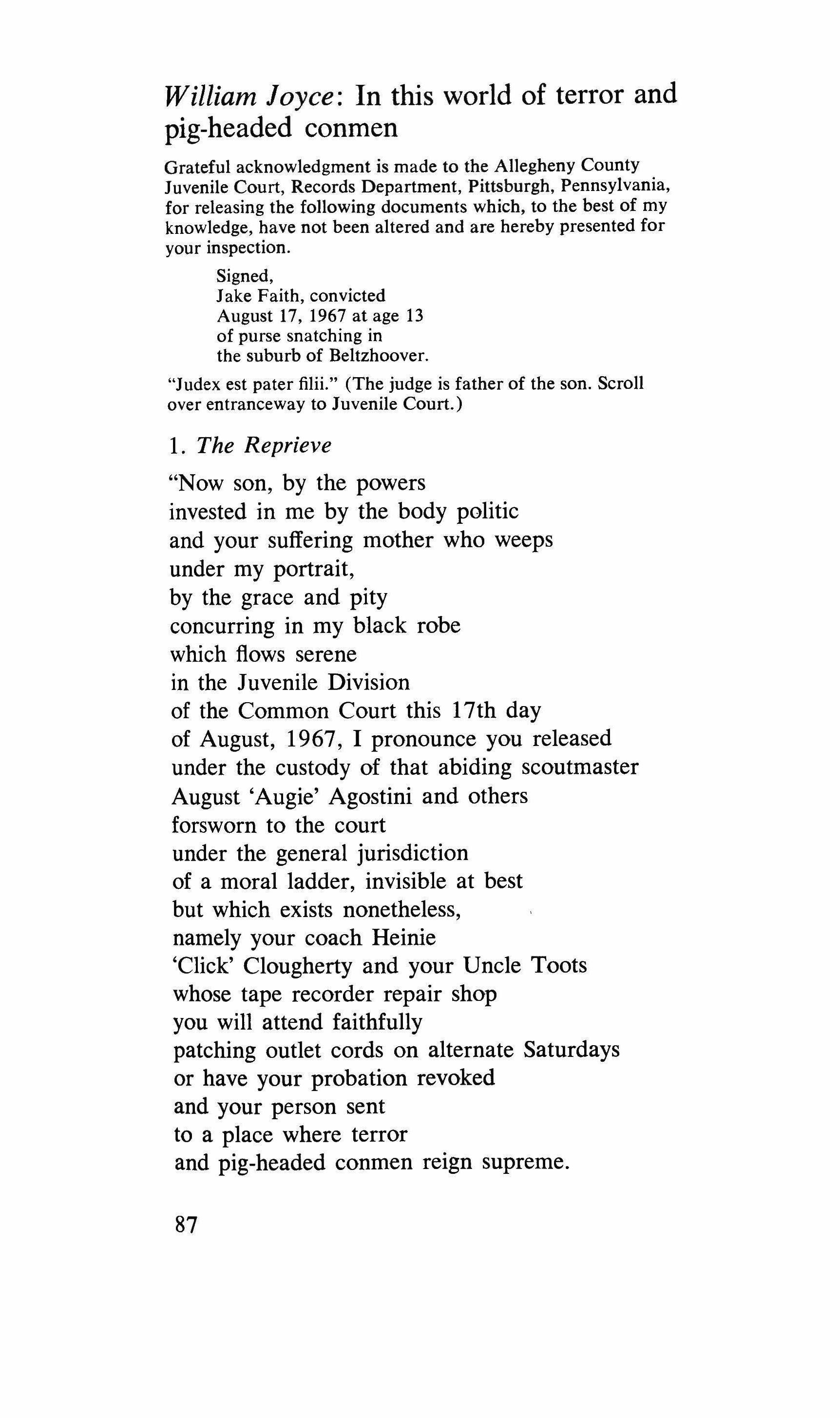
William Joyce: In this world of terror and pig-headed conmen
Grateful acknowledgment is made to the Allegheny County Juvenile Court, Records Department, Pittsburgh, Pennsylvania, for releasing the following documents which, to the best of my knowledge, have not been altered and are hereby presented for your inspection.
Signed, Jake Faith, convicted August 17, 1967 at age 13 of purse snatching in the suburb of Beltzhoover.
"Judex est pater filii." (The judge is father of the son. Scroll over entranceway to Juvenile Court.)
1. The Reprieve
"Now son, by the powers invested in me by the body politic and your suffering mother who weeps under my portrait, by the grace and pity concurring in my black robe which flows serene in the Juvenile Division of the Common Court this 17th day of August, 1967, I pronounce you released under the custody of that abiding scoutmaster August 'Augie' Agostini and others forsworn to the court under the general jurisdiction of a moral ladder, invisible at best but which exists nonetheless, namely your coach Heinie 'Click' Clougherty and your Uncle Toots whose tape recorder repair shop you will attend faithfully patching outlet cords on alternate Saturdays or have your probation revoked and your person sent to a place where terror and pig-headed conmen reign supreme.
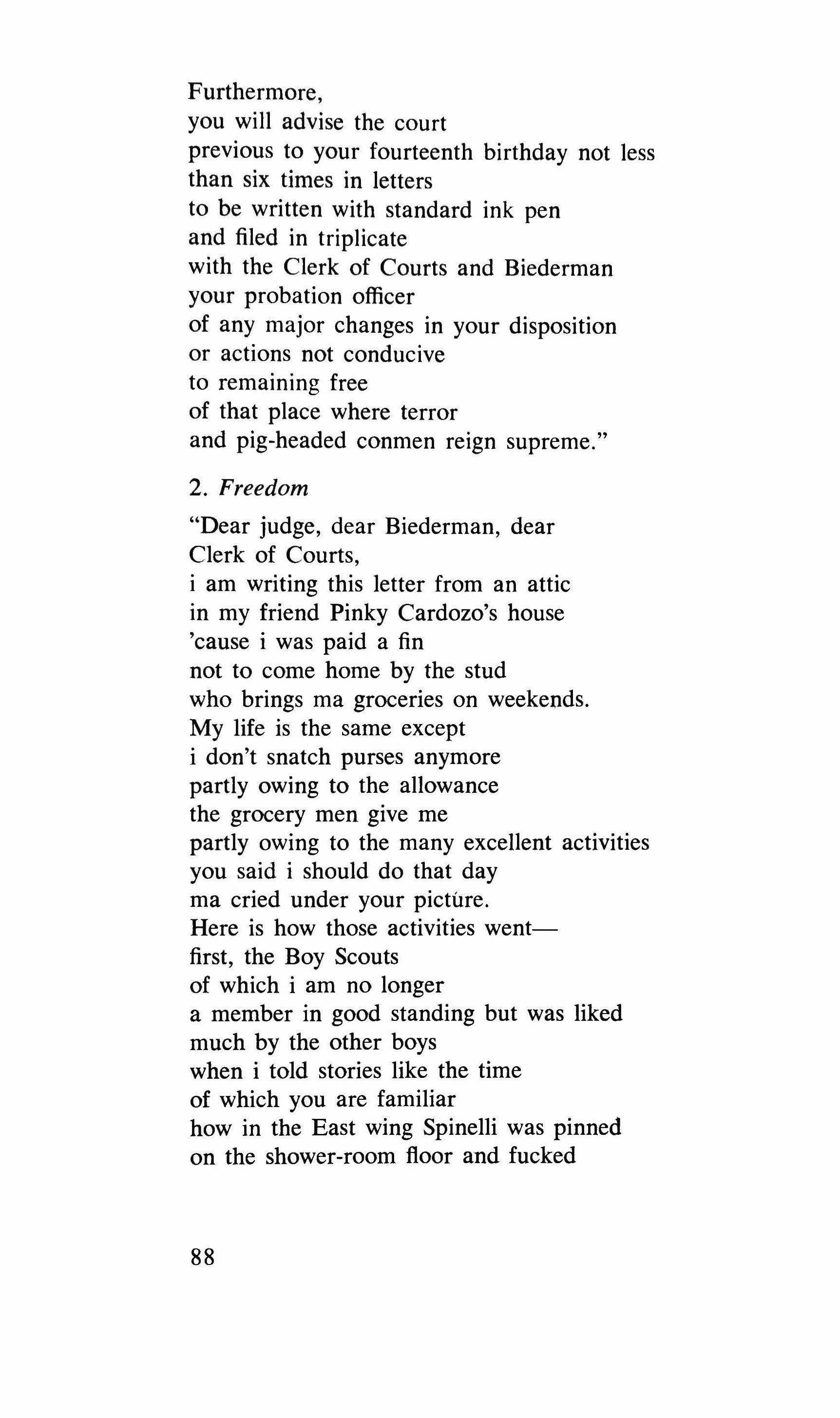
Furthermore, you will advise the court previous to your fourteenth birthday not less than six times in letters to be written with standard ink pen and filed in triplicate with the Clerk of Courts and Biederman your probation officer of any major changes in your disposition or actions not conducive to remaining free of that place where terror and pig-headed conmen reign supreme."
"Dear judge, dear Biederman, dear Clerk of Courts, i am writing this letter from an attic in my friend Pinky Cardozo's house 'cause i was paid a fin not to come home by the stud who brings rna groceries on weekends. My life is the same except i don't snatch purses anymore partly owing to the allowance the grocery men give me partly owing to the many excellent activities you said i should do that day rna cried under your picture. Here is how those activities wentfirst, the Boy Scouts of which i am no longer a member in good standing but was liked much by the other boys when i told stories like the time of which you are familiar how in the East wing Spinelli was pinned on the shower-room floor and fucked
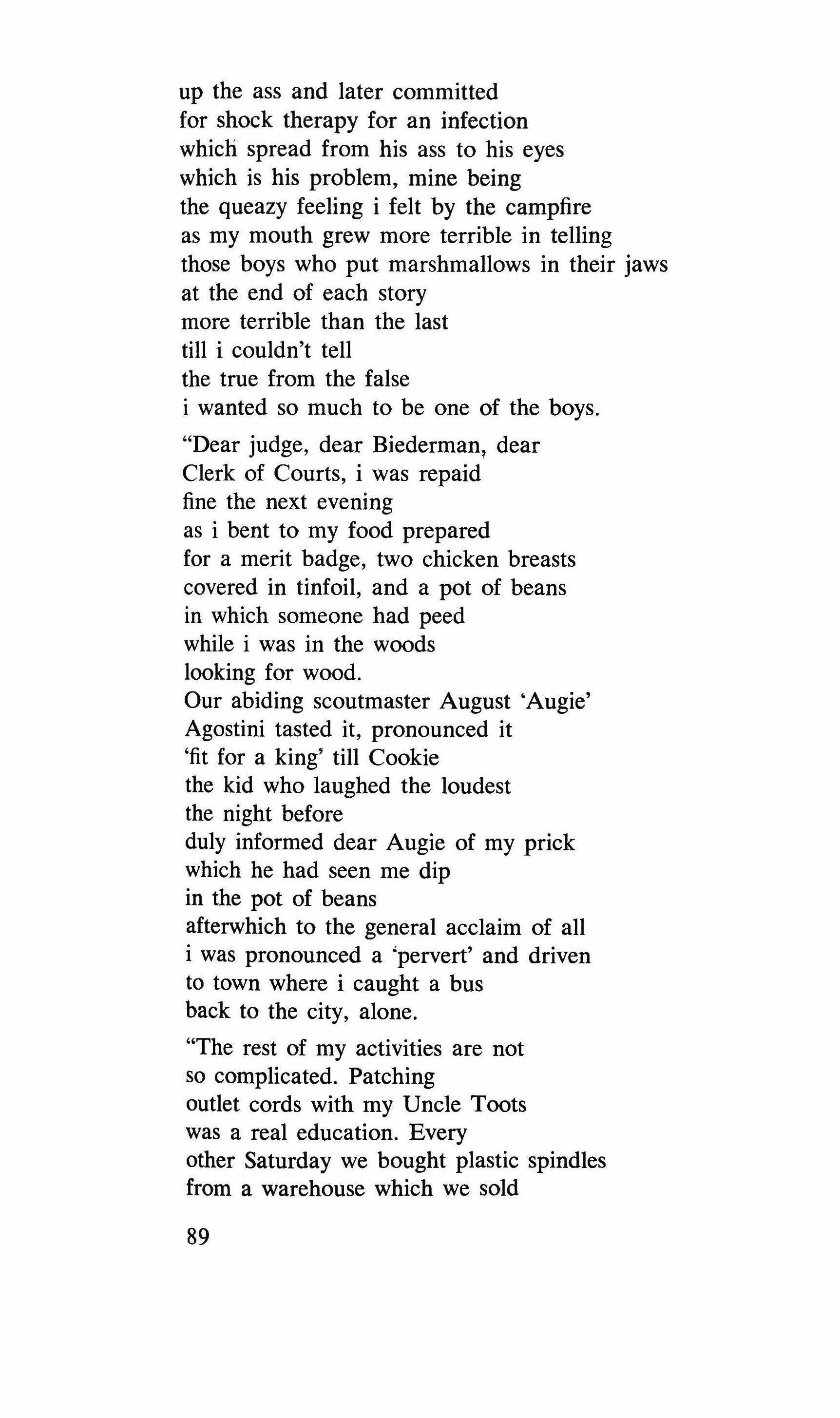
up the ass and later committed for shock therapy for an infection which spread from his ass to his eyes which is his problem, mine being the queazy feeling i felt by the campfire as my mouth grew more terrible in telling those boys who put marshmallows in their jaws at the end of each story more terrible than the last till i couldn't tell the true from the false i wanted so much to be one of the boys.
"Dear judge, dear Biederman, dear Clerk of Courts, i was repaid fine the next evening as i bent to my food prepared for a merit badge, two chicken breasts covered in tinfoil, and a pot of beans in which someone had peed while i was in the woods looking for wood.
Our abiding scoutmaster August 'Augie' Agostini tasted it, pronounced it 'fit for a king' till Cookie the kid who laughed the loudest the night before duly informed dear Augie of my prick which he had seen me dip in the pot of beans afterwhich to the general acclaim of all i was pronounced a 'pervert' and driven to town where i caught a bus back to the city, alone.
"The rest of my activities are not so complicated. Patching outlet cords with my Uncle Toots was a real education. Every other Saturday we bought plastic spindles from a warehouse which we sold
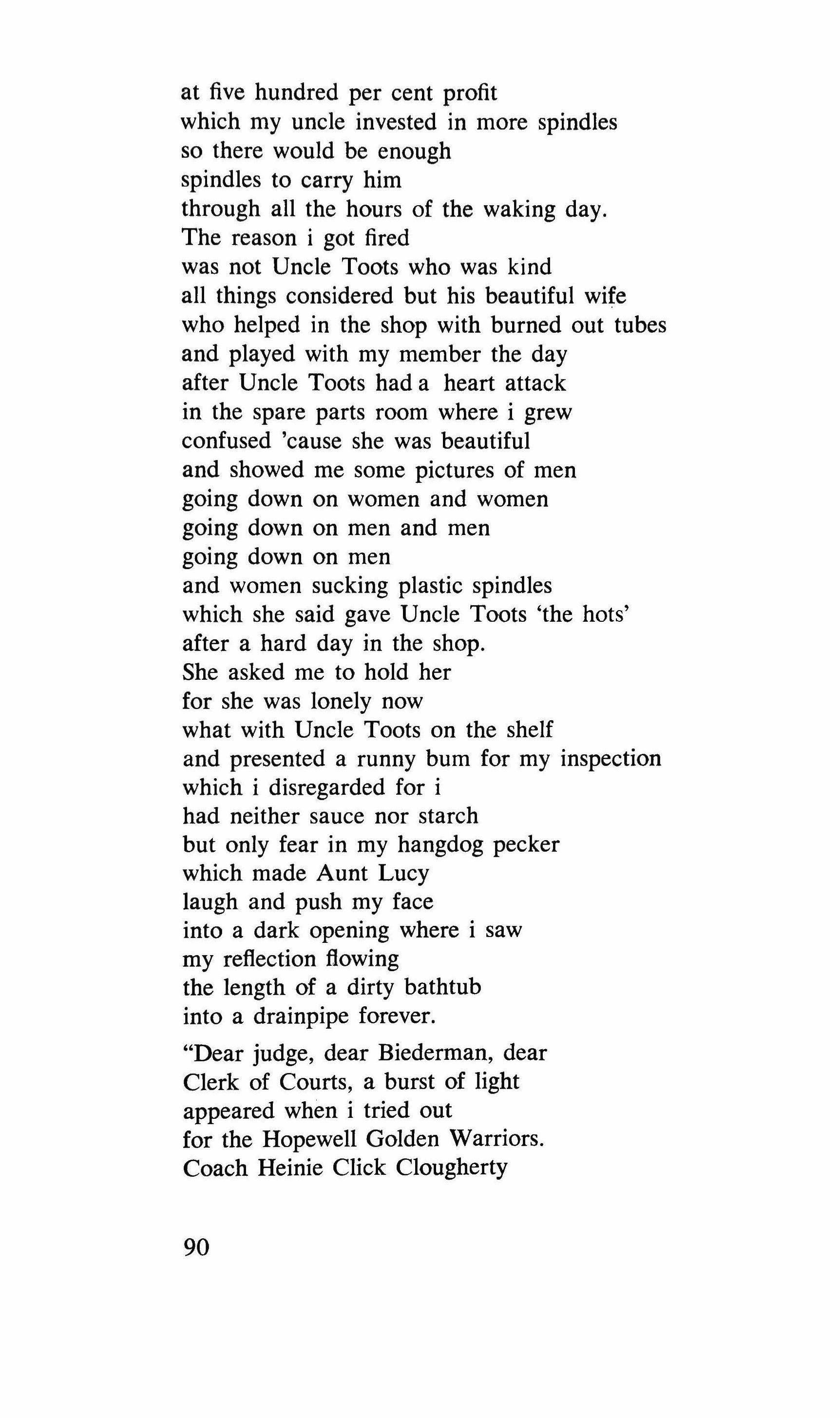
at five hundred per cent profit which my uncle invested in more spindles so there would be enough spindles to carry him through all the hours of the waking day. The reason i got fired was not Uncle Toots who was kind all things considered but his beautiful wife who helped in the shop with burned out tubes and played with my member the day after Uncle Toots had a heart attack in the spare parts room where i grew confused 'cause she was beautiful and showed me some pictures of men going down on women and women going down on men and men going down on men and women sucking plastic spindles which she said gave Uncle Toots 'the hots' after a hard day in the shop. She asked me to hold her for she was lonely now what with Uncle Toots on the shelf and presented a runny burn for my inspection which i disregarded for i had neither sauce nor starch but only fear in my hangdog peeker which made Aunt Lucy laugh and push my face into a dark opening where i saw my reflection flowing the length of a dirty bathtub into a drainpipe forever.
"Dear judge, dear Biederman, dear Clerk of Courts, a burst of light appeared when i tried out for the Hopewell Golden Warriors. Coach Heinie Click Clougherty
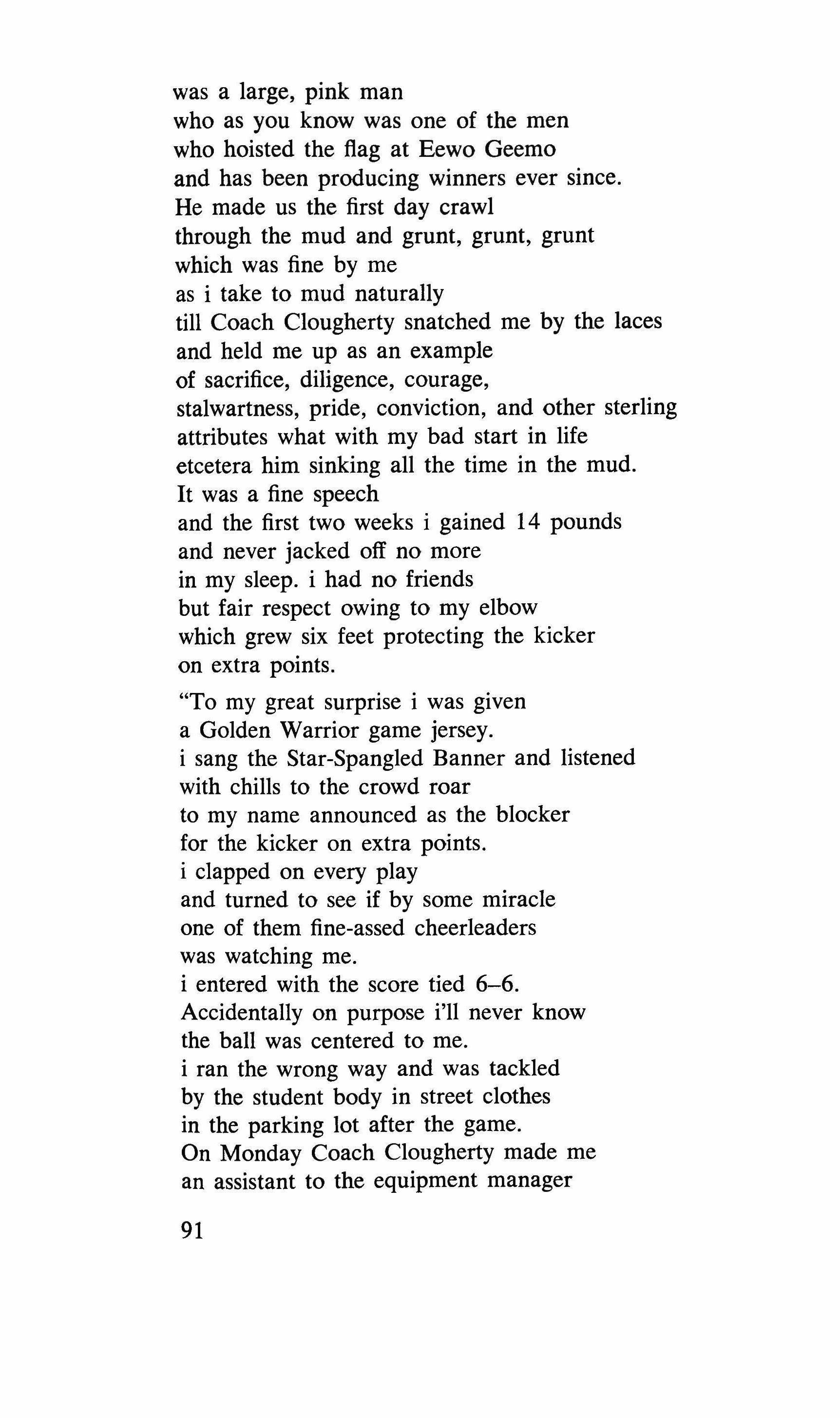
was a large, pink man who as you know was one of the men who hoisted the flag at Eewo Geemo and has been producing winners ever since. He made us the first day crawl through the mud and grunt, grunt, grunt which was fine by me as i take to mud naturally till Coach Clougherty snatched me by the laces and held me up as an example of sacrifice, diligence, courage, stalwartness, pride, conviction, and other sterling attributes what with my bad start in life etcetera him sinking all the time in the mud. It was a fine speech and the first two weeks i gained 14 pounds and never jacked off no more in my sleep. i had no friends but fair respect owing to my elbow which grew six feet protecting the kicker on extra points.
"To my great surprise i was given a Golden Warrior game jersey. i sang the Star-Spangled Banner and listened with chills to the crowd roar to my name announced as the blocker for the kicker on extra points. i clapped on every play and turned to see if by some miracle one of them fine-assed cheerleaders was watching me. i entered with the score tied 6-6. Accidentally on purpose i'll never know the ball was centered to me. i ran the wrong way and was tackled by the student body in street clothes in the parking lot after the game.
On Monday Coach Clougherty made me an assistant to the equipment manager
91
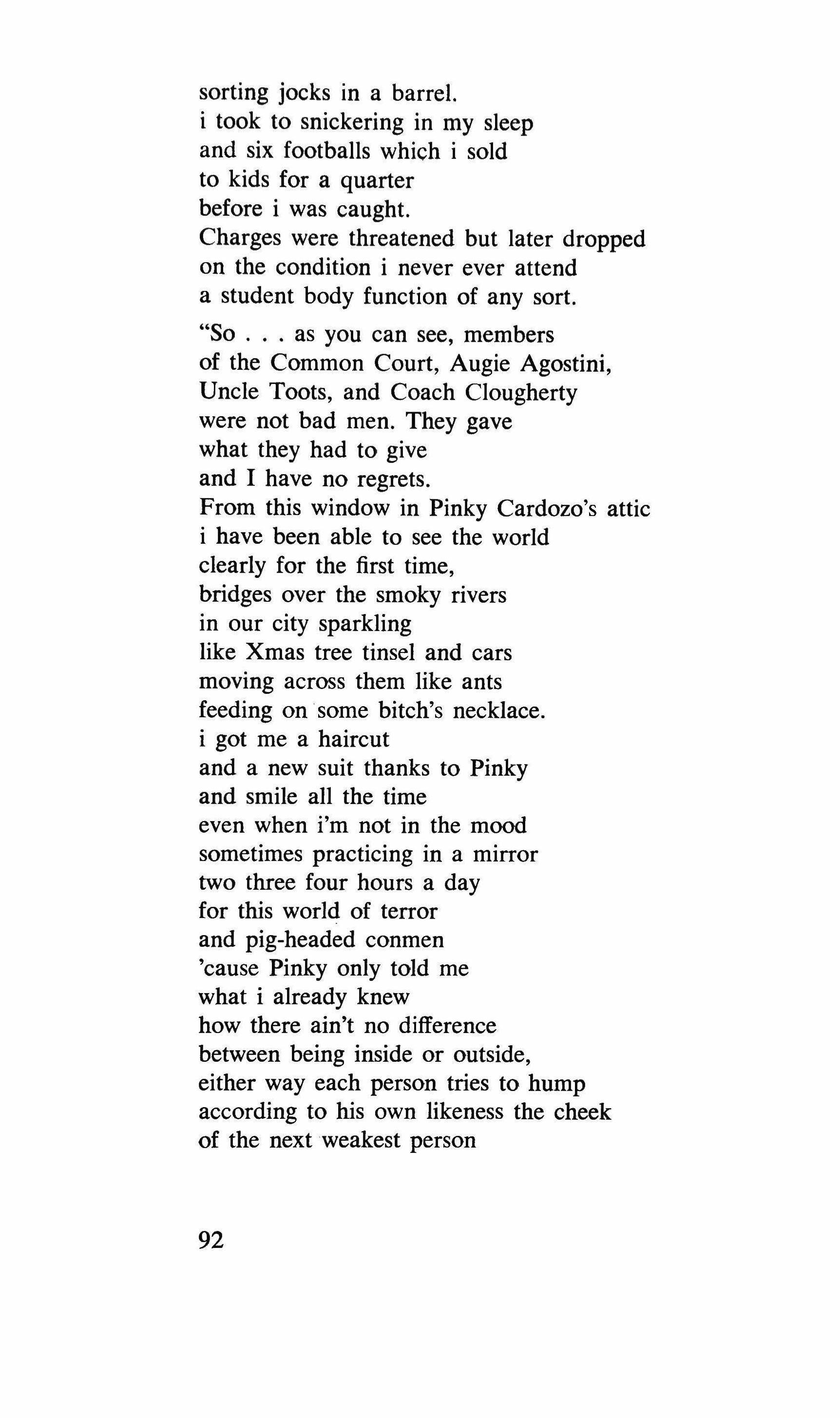
sorting jocks in a barrel. i took to snickering in my sleep and six footballs which i sold to kids for a quarter before i was caught.
Charges were threatened but later dropped on the condition i never ever attend a student body function of any sort.
"So as you can see, members of the Common Court, Augie Agostini, Uncle Toots, and Coach Clougherty were not bad men. They gave what they had to give and I have no regrets.
From this window in Pinky Cardozo's attic i have been able to see the world clearly for the first time, bridges over the smoky rivers in our city sparkling like Xmas tree tinsel and cars moving across them like ants feeding on some bitch's necklace. i got me a haircut and a new suit thanks to Pinky and smile all the time even when i'm not in the mood sometimes practicing in a mirror two three four hours a day for this world of terror and pig-headed conmen 'cause Pinky only told me what i already knew how there ain't no difference between being inside or outside, either way each person tries to hump according to his own likeness the cheek of the next weakest person
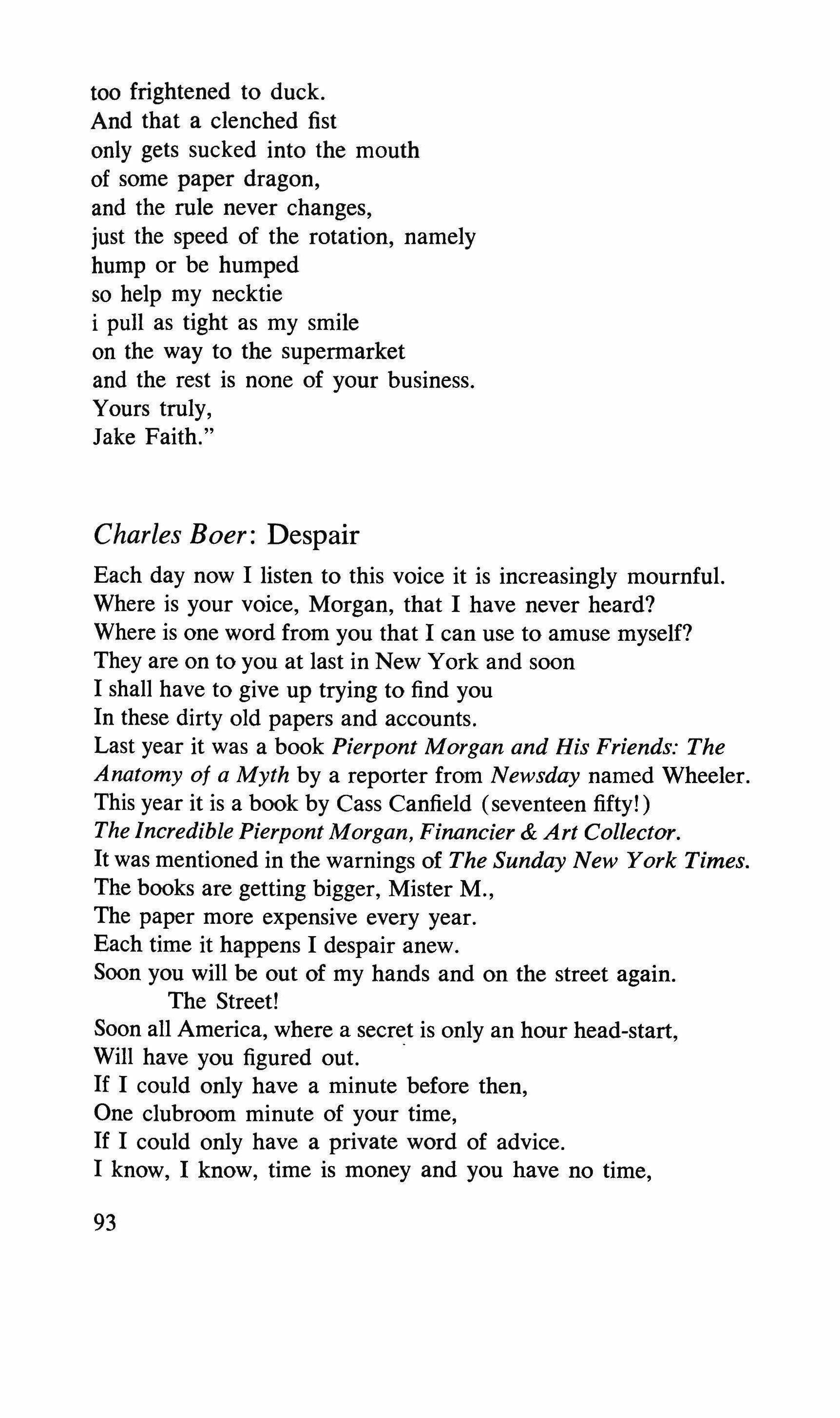
too frightened to duck. And that a clenched fist only gets sucked into the mouth of some paper dragon, and the rule never changes, just the speed of the rotation, namely hump or be humped so help my necktie i pull as tight as my smile on the way to the supermarket and the rest is none of your business. Yours truly, Jake Faith."
Each day now I listen to this voice it is increasingly mournful. Where is your voice, Morgan, that I have never heard? Where is one word from you that I can use to amuse myself? They are on to you at last in New York and soon I shall have to give up trying to find you In these dirty old papers and accounts. Last year it was a book Pierpont Morgan and His Friends: The Anatomy of a Myth by a reporter from Newsday named Wheeler. This year it is a book by Cass Canfield (seventeen fifty!) The Incredible Pierpont Morgan, Financier & Art Collector. It was mentioned in the warnings of The Sunday New York Times. The books are getting bigger, Mister M., The paper more expensive every year. Each time it happens I despair anew. Soon you will be out of my hands and on the street again. The Street!
Soon all America, where a secret is only an hour head-start, Will have you figured out. If I could only have a minute before then, One clubroom minute of your time, If I could only have a private word of advice. I know, I know, time is money and you have no time, 93
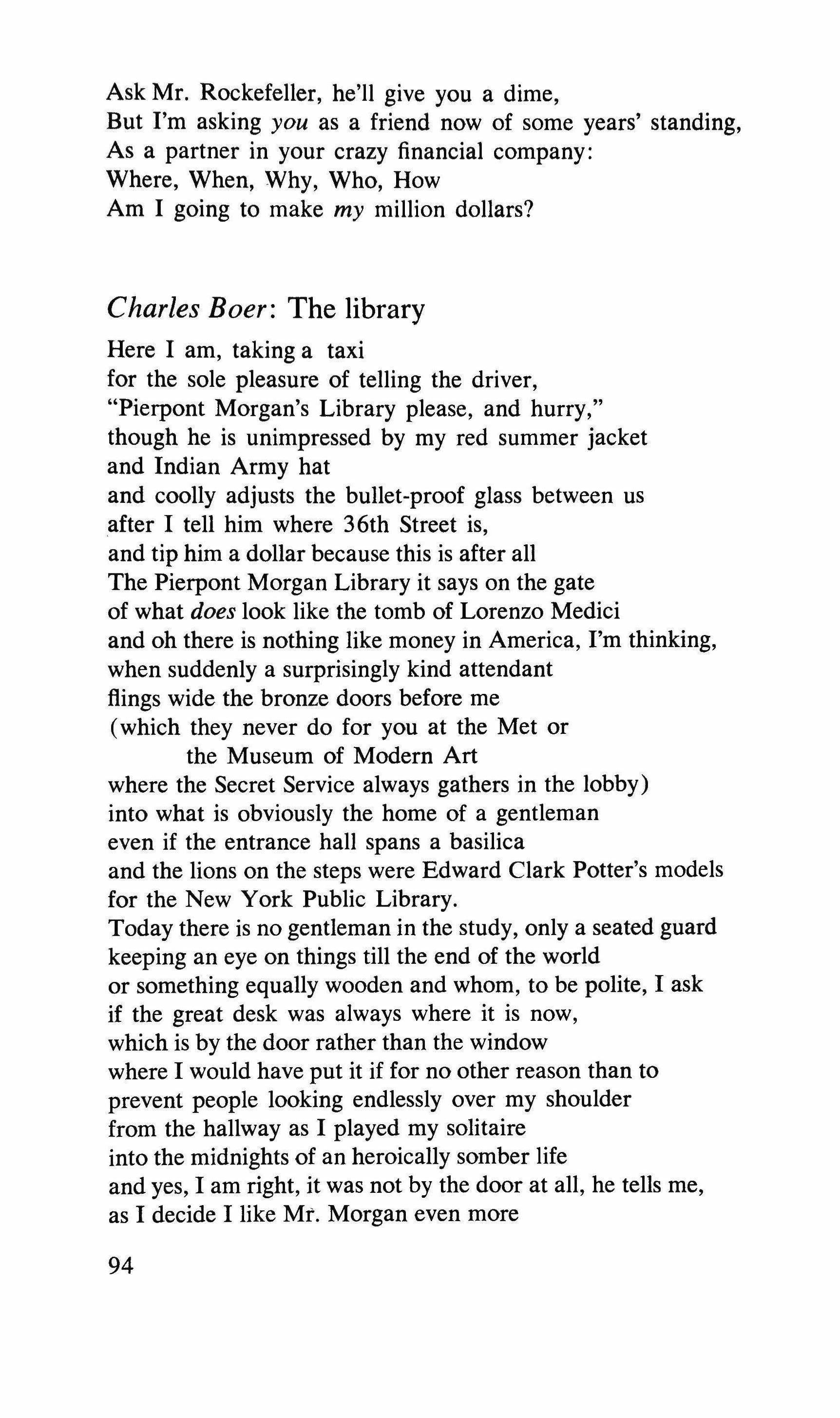
Ask Mr. Rockefeller, he'll give you a dime, But I'm asking you as a friend now of some years' standing, As a partner in your crazy financial company: Where, When, Why, Who, How Am I going to make my million dollars?
Here I am, taking a taxi for the sole pleasure of telling the driver, "Pierpont Morgan's Library please, and hurry," though he is unimpressed by my red summer jacket and Indian Army hat and coolly adjusts the bullet-proof glass between us after I tell him where 36th Street is, and tip him a dollar because this is after all The Pierpont Morgan Library it says on the gate of what does look like the tomb of Lorenzo Medici and oh there is nothing like money in America, I'm thinking, when suddenly a surprisingly kind attendant flings wide the bronze doors before me (which they never do for you at the Met or the Museum of Modern Art where the Secret Service always gathers in the lobby) into what is obviously the home of a gentleman even if the entrance hall spans a basilica and the lions on the steps were Edward Clark Potter's models for the New York Public Library. Today there is no gentleman in the study, only a seated guard keeping an eye on things till the end of the world or something equally wooden and whom, to be polite, I ask if the great desk was always where it is now, which is by the door rather than the window where I would have put it if for no other reason than to prevent people looking endlessly over my shoulder from the hallway as I played my solitaire into the midnights of an heroically somber life and yes, I am right, it was not by the door at all, he tells me, as I decide I like Mr. Morgan even more
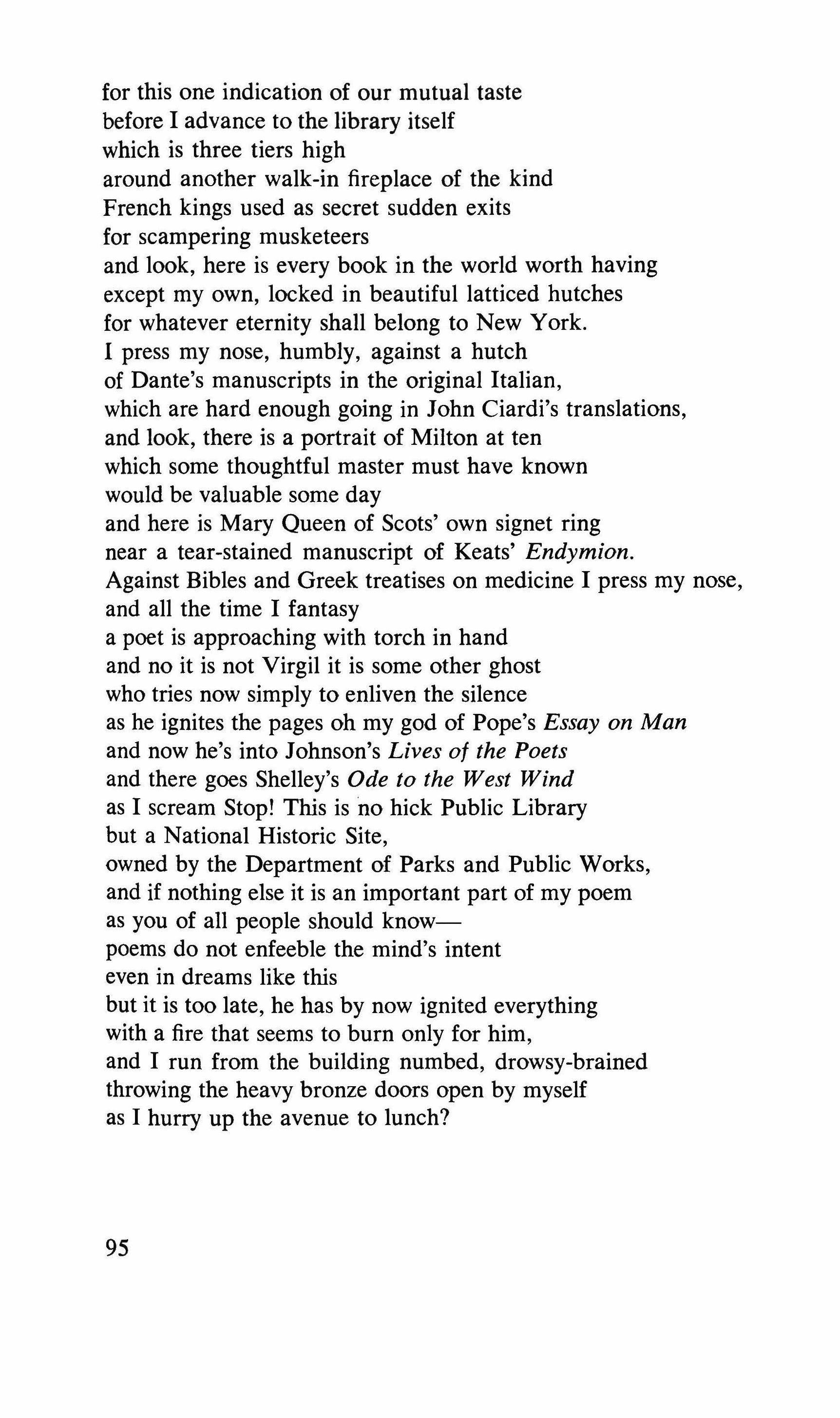
for this one indication of our mutual taste before I advance to the library itself which is three tiers high around another walk-in fireplace of the kind French kings used as secret sudden exits for scampering musketeers and look, here is every book in the world worth having except my own, locked in beautiful latticed hutches for whatever eternity shall belong to New York. I press my nose, humbly, against a hutch of Dante's manuscripts in the original Italian, which are hard enough going in John Ciardi's translations, and look, there is a portrait of Milton at ten which some thoughtful master must have known would be valuable some day and here is Mary Queen of Scots' own signet ring near a tear-stained manuscript of Keats' Endymion. Against Bibles and Greek treatises on medicine I press my nose, and all the time I fantasy a poet is approaching with torch in hand and no it is not Virgil it is some other ghost who tries now simply to enliven the silence as he ignites the pages oh my god of Pope's Essay on Man and now he's into Johnson's Lives of the Poets and there goes Shelley's Ode to the West Wind as I scream Stop! This is no hick Public Library but a National Historic Site, owned by the Department of Parks and Public Works, and if nothing else it is an important part of my poem as you of all people should knowpoems do not enfeeble the mind's intent even in dreams like this but it is too late, he has by now ignited everything with a fire that seems to burn only for him, and I run from the building numbed, drowsy-brained throwing the heavy bronze doors open by myself as I hurry up the avenue to lunch?
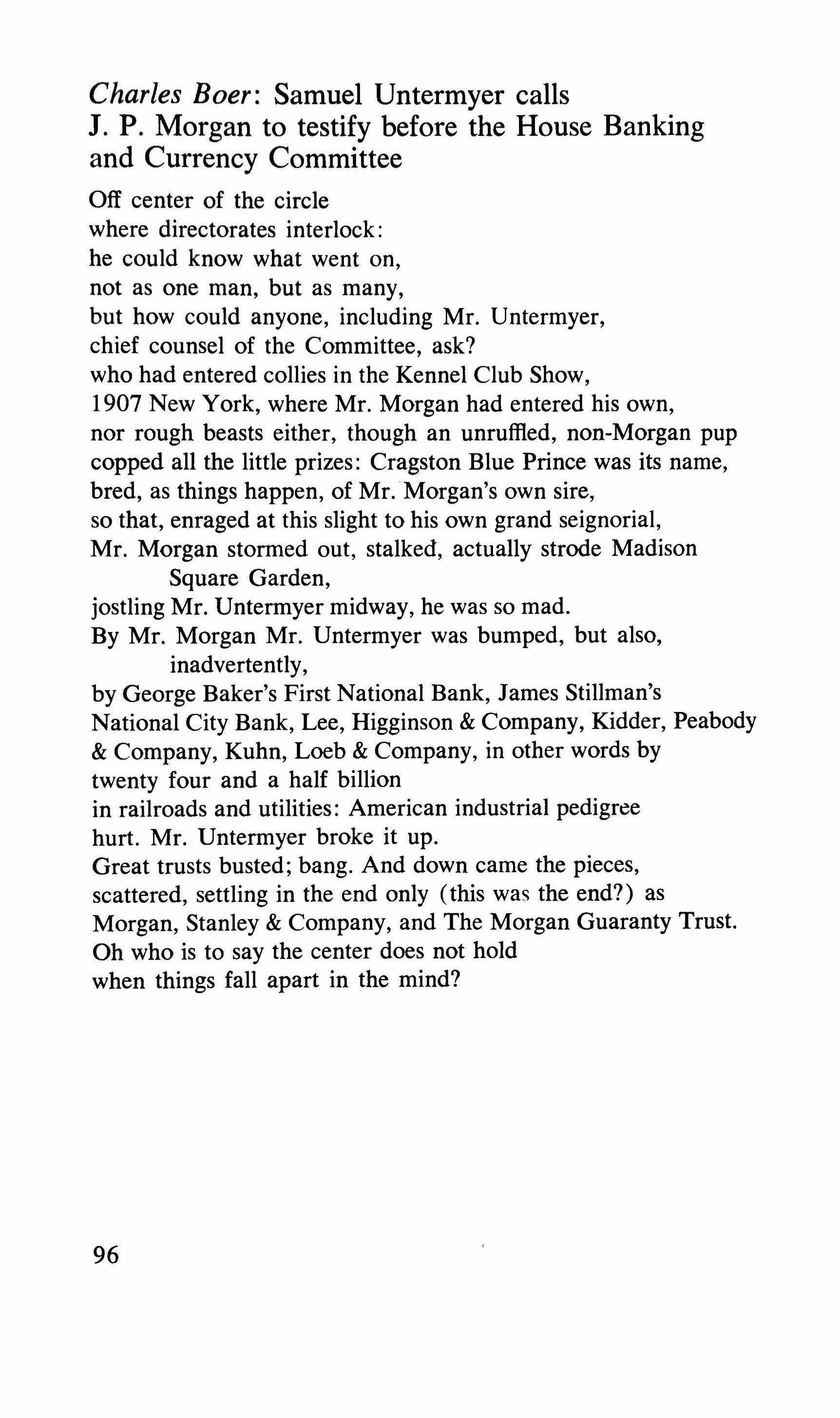
J. P. Morgan to testify before the
Off center of the circle where directorates interlock: he could know what went on, not as one man, but as many, but how could anyone, including Mr. Untermyer, chief counsel of the Committee, ask? who had entered collies in the Kennel Club Show, 1907 New York, where Mr. Morgan had entered his own, nor rough beasts either, though an unruffled, non-Morgan pup copped all the little prizes: Cragston Blue Prince was its name, bred, as things happen, of Mr. Morgan's own sire, so that, enraged at this slight to his own grand seignorial, Mr. Morgan stormed out, stalked, actually strode Madison Square Garden, jostling Mr. Untermyer midway, he was so mad. By Mr. Morgan Mr. Untermyer was bumped, but also, inadvertently, by George Baker's First National Bank, James Stillman's National City Bank, Lee, Higginson & Company, Kidder, Peabody & Company, Kuhn, Loeb & Company, in other words by twenty four and a half billion in railroads and utilities: American industrial pedigree hurt. Mr. Untermyer broke it up. Great trusts busted; bang. And down came the pieces, scattered, settling in the end only (this was the end?) as Morgan, Stanley & Company, and The Morgan Guaranty Trust. Oh who is to say the center does not hold when things fall apart in the mind?

It was an uncivilized world's worst road.
There were three horses, a hard wagon, and himself. Himself was Mr. J. Pierpont Morgan, Investment Banker. He stopped at the house of Dorcas for a look. Saint Peter too had stopped there (?).
The Plains of Sharon preached their flowers before him, Morgan. Mr. Morgan saw Zorah where Samson was born (?).
At Ramleh he had lunch. Sixteen miles from Jerusalem
They watered their horses at an inn on a bank
Of an otherwise ordinary brook
Where David who fought Goliath of Gath's wrath (?)
Picked a pebble big enough to kill.
It was dark at the Gates of the City.
The dragoman requested he dismount.
Lighted by lantern he crept to his hotel.
There were no lamps on this cheap street.
Next day first thing lordly he strode
To the Church of the Holy Sepulchre (?).
A rambling structure, was how he, Mr. Morgan, described it.
The whole was so faintly different
From what he had imagined
At home in the sadness of Madison Avenue
That he had not yet as of this writing realized Whereon he had himself just so splendidly stood. Which was, he said, of course, nonetheless The most sacred of all spots, this.
As you enter the door directly in front of you, He said, vividly, there is a slab over the stone Where the Savior was randomly spiced (?).
Turning to your left, he said, you ascend some stairs
To find yourself in a chapel
Built upon what is supposed to be The very summit of Calvary (?).
Breathless Mr. Morgan hears an organ in a corner of the Church. It is so good to be here, I who am so blessed in life, He writes to the gang back home.
How distant the cry of finance!
How small the corner of Broad Street and Wall!
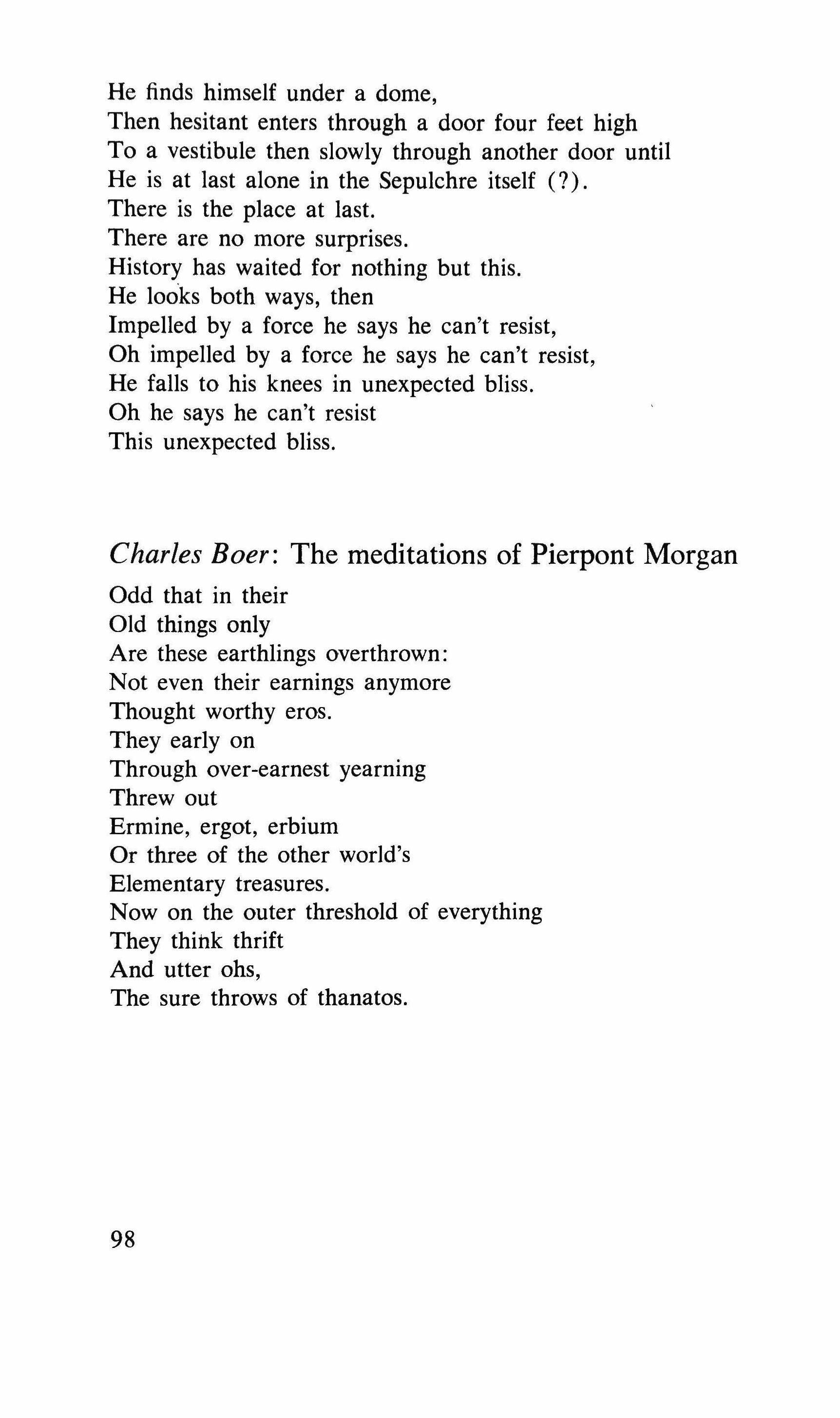
He finds himself under a dome, Then hesitant enters through a door four feet high To a vestibule then slowly through another door until He is at last alone in the Sepulchre itself (?). There is the place at last. There are no more surprises. History has waited for nothing but this. He looks both ways, then Impelled by a force he says he can't resist, Oh impelled by a force he says he can't resist, He falls to his knees in unexpected bliss. Oh he says he can't resist This unexpected bliss.
Odd that in their Old things only Are these earthlings overthrown: Not even their earnings anymore Thought worthy eros. They early on
Through over-earnest yearning Threw out
Ermine, ergot, erbium Or three of the other world's Elementary treasures. Now on the outer threshold of everything They think thrift And utter ohs, The sure throws of thanatos.
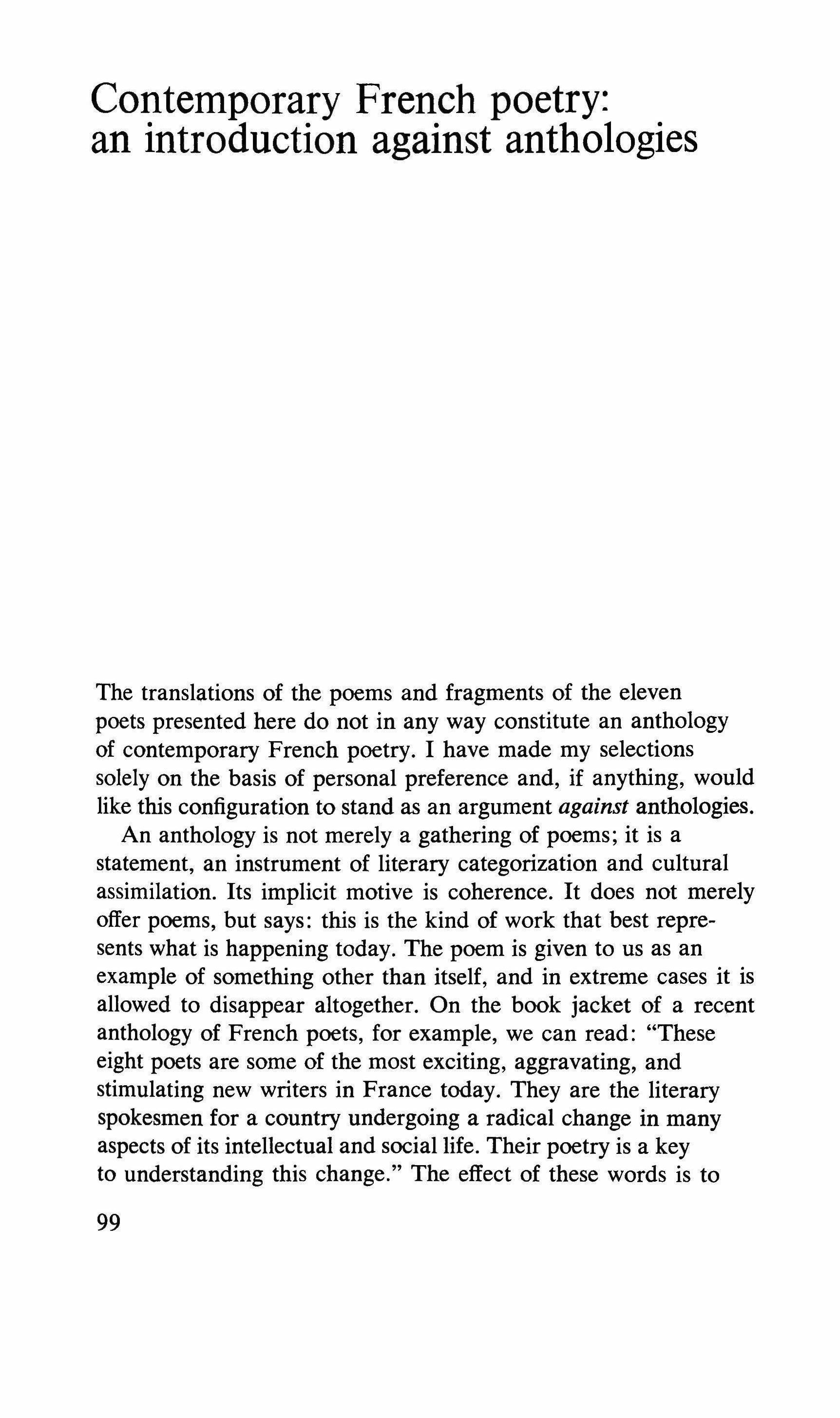
The translations of the poems and fragments of the eleven poets presented here do not in any way constitute an anthology of contemporary French poetry. I have made my selections solely on the basis of personal preference and, if anything, would like this configuration to stand as an argument against anthologies. An anthology is not merely a gathering of poems; it is a statement, an instrument of literary categorization and cultural assimilation. Its implicit motive is coherence. It does not merely offer poems, but says: this is the kind of work that best represents what is happening today. The poem is given to us as an example of something other than itself, and in extreme cases it is allowed to disappear altogether. On the book jacket of a recent anthology of French poets, for example, we can read: "These eight poets are some of the most exciting, aggravating, and stimulating new writers in France today. They are the literary spokesmen for a country undergoing a radical change in many aspects of its intellectual and social life. Their poetry is a key to understanding this change." The effect of these words is to
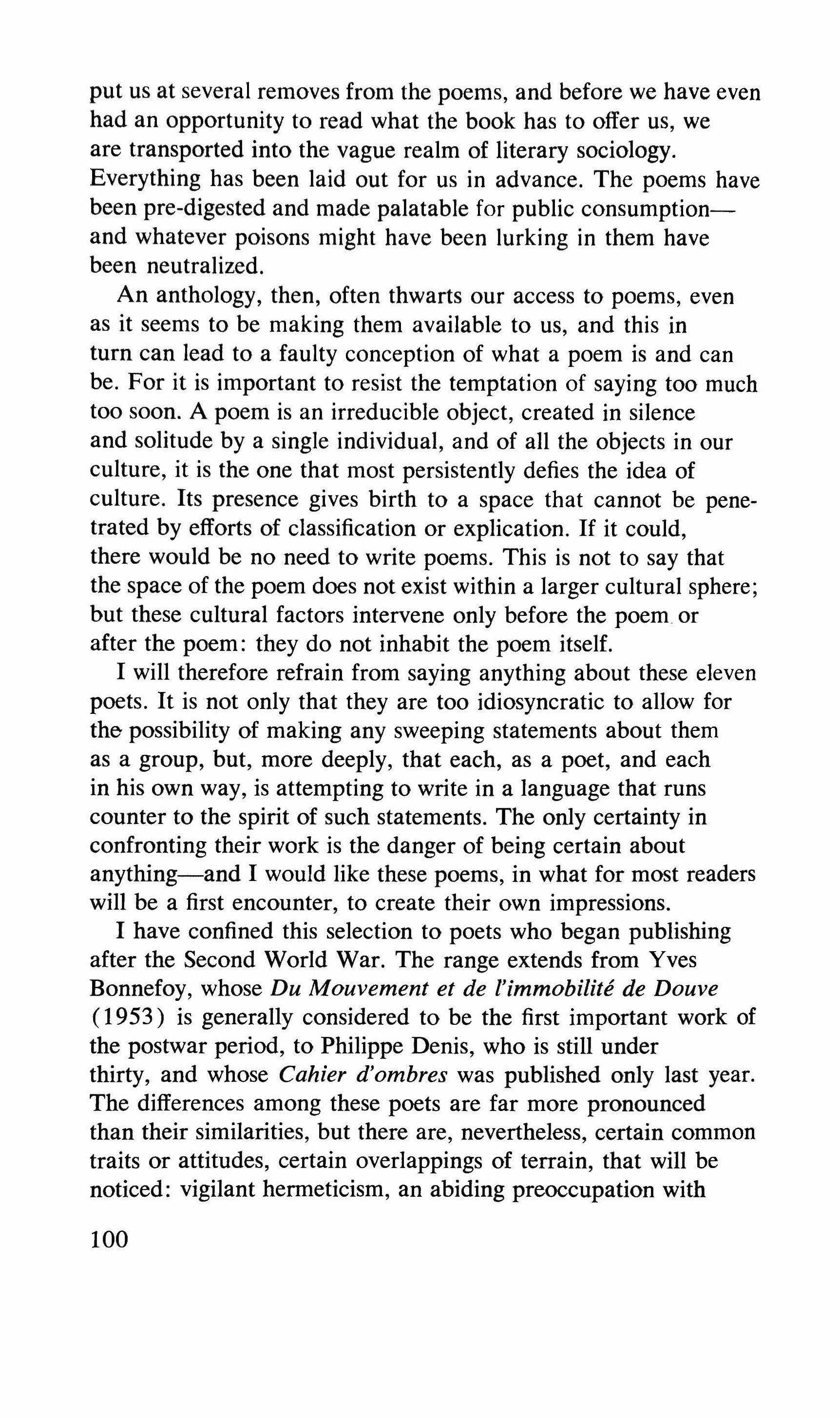
put us at several removes from the poems, and before we have even had an opportunity to read what the book has to offer us, we are transported into the vague realm of literary sociology. Everything has been laid out for us in advance. The poems have been pre-digested and made palatable for public consumptionand whatever poisons might have been lurking in them have been neutralized.
An anthology, then, often thwarts our access to poems, even as it seems to be making them available to us, and this in turn can lead to a faulty conception of what a poem is and can be. For it is important to resist the temptation of saying too much too soon. A poem is an irreducible object, created in silence and solitude by a single individual, and of all the objects in our culture, it is the one that most persistently defies the idea of culture. Its presence gives birth to a space that cannot be penetrated by efforts of classification or explication. If it could, there would be no need to write poems. This is not to say that the space of the poem does not exist within a larger cultural sphere; but these cultural factors intervene only before the poem or after the poem: they do not inhabit the poem itself.
I will therefore refrain from saying anything about these eleven poets. It is not only that they are too idiosyncratic to allow for the possibility of making any sweeping statements about them as a group, but, more deeply, that each, as a poet, and each in his own way, is attempting to write in a language that runs counter to the spirit of such statements. The only certainty in confronting their work is the danger of being certain about anything-and I would like these poems, in what for most readers will be a first encounter, to create their own impressions.
I have confined this selection to poets who began publishing after the Second World War. The range extends from Yves Bonnefoy, whose Du Mouvement et de l'immobilite de Douve (1953) is generally considered to be the first important work of the postwar period, to Philippe Denis, who is still under thirty, and whose Cahier d'ombres was published only last year. The differences among these poets are far more pronounced than their similarities, but there are, nevertheless, certain common traits or attitudes, certain overlappings of terrain, that will be noticed: vigilant hermeticism, an abiding preoccupation with 100
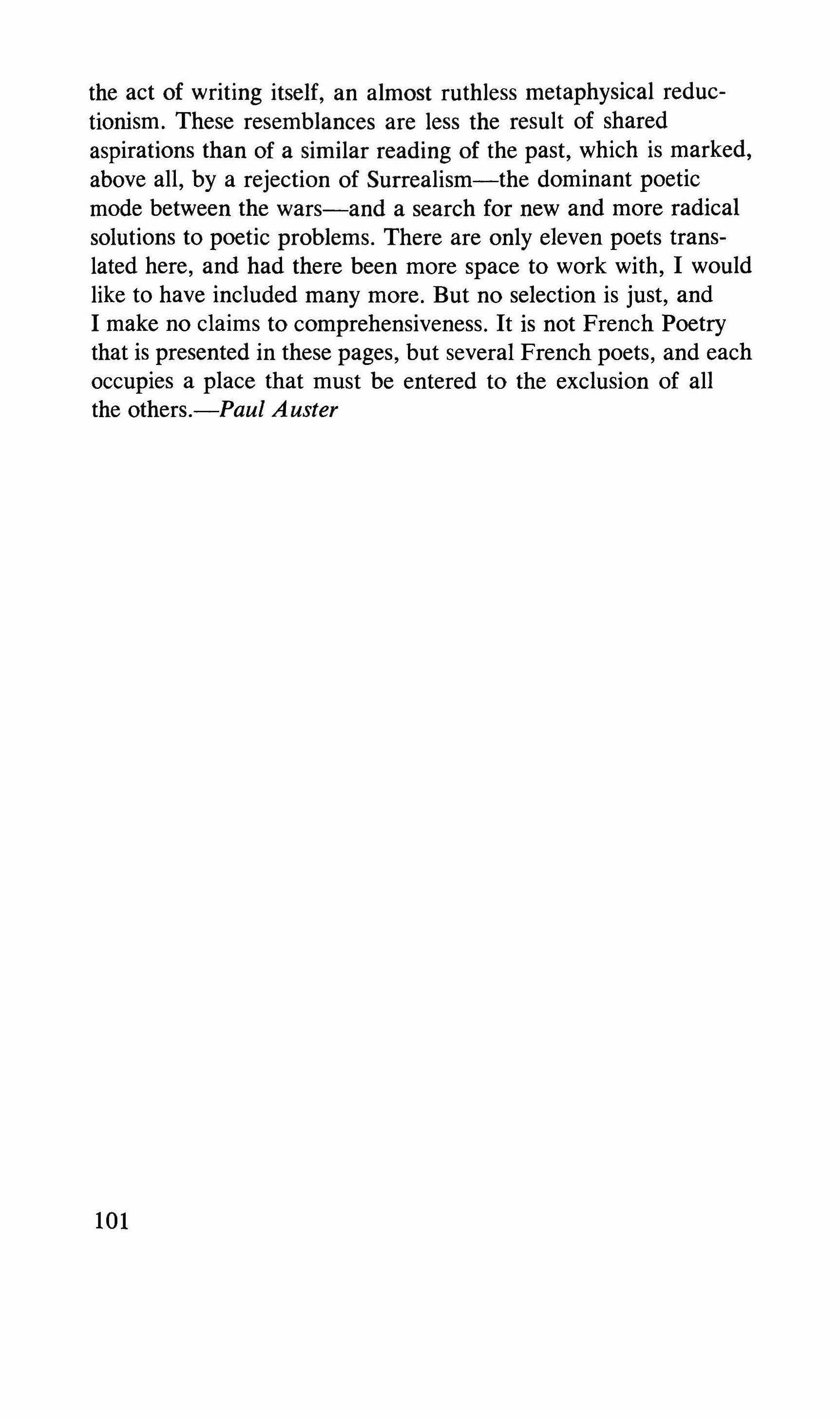
the act of writing itself, an almost ruthless metaphysical reductionism. These resemblances are less the result of shared aspirations than of a similar reading of the past, which is marked, above all, by a rejection of Surrealism-the dominant poetic mode between the wars-and a search for new and more radical solutions to poetic problems. There are only eleven poets translated here, and had there been more space to work with, I would like to have included many more. But no selection is just, and I make no claims to comprehensiveness. It is not French Poetry that is presented in these pages, but several French poets, and each occupies a place that must be entered to the exclusion of all the others.-Paul
AusterQuiet, for we too are 0 f the night, The most shapeless, gravitating stumps, Cleansed matter, returning to the old Ideas, resounding where the fire falters, The furrowed face of a blind presence With all hunted fire serving a home, And the word living, but infinitely dead When at last the light is made nocturnal wind.
For two years, or three, I felt sufficient. The stars, The rivers, the forests, groveled below me. The moon flaked on my gray gowns. My weary eyes
Lighted the seas beneath their shadowed arches, And my hair was more ample than this world Of vanquished eyes, of cries that did not reach me. Night beasts howl. This is my road. Dark doors shut.
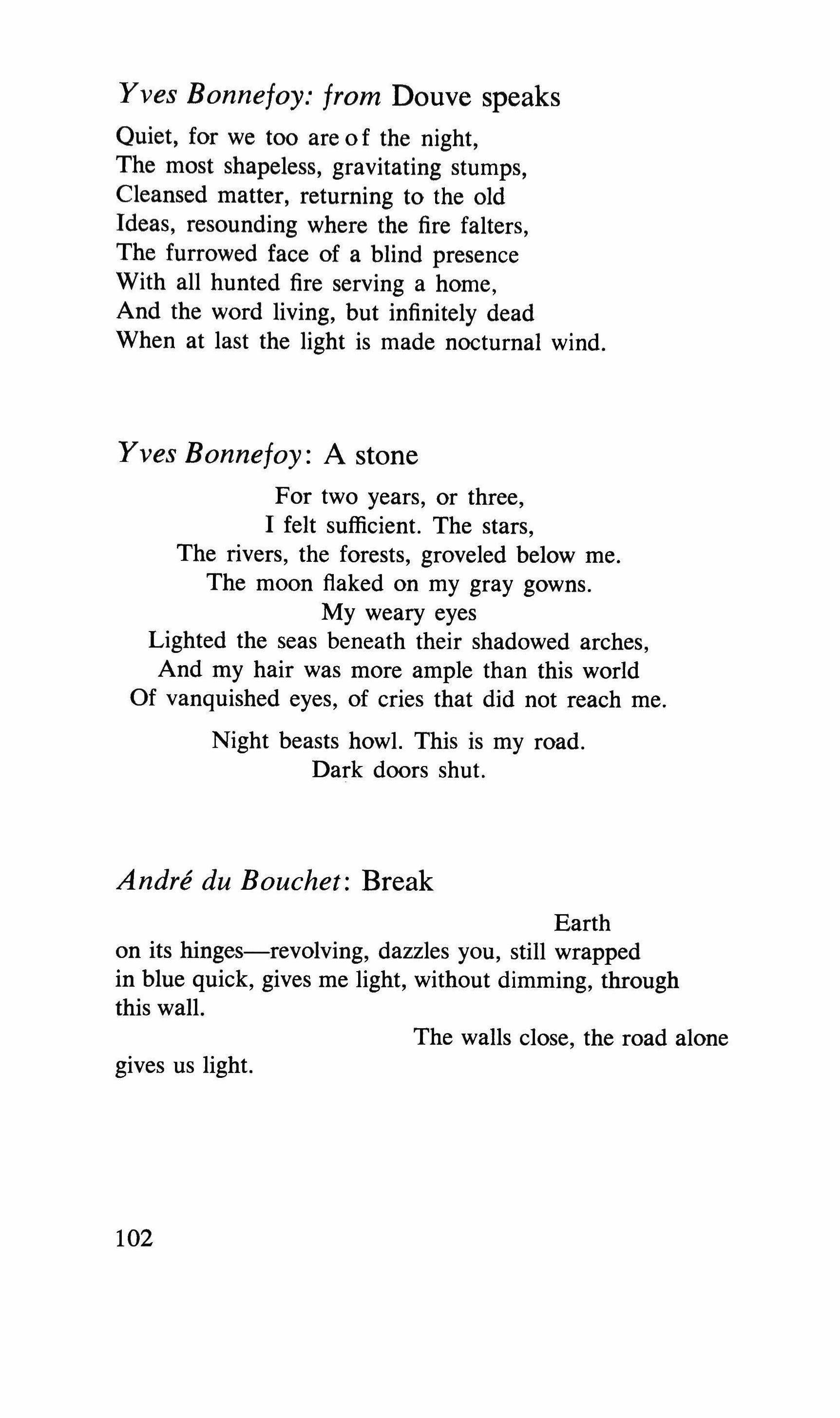
Andre du Bouchet: Break
Earth on its hinges-revolving, dazzles you, still wrapped in blue quick, gives me light, without dimming, through this wall.
The walls close, the road alone gives us light.
Andre du Bouchet: The night
Where the earth, today, under this load, overwhelms the sun, all, encircling it like stacked hay in the abrupt field, I saw it.
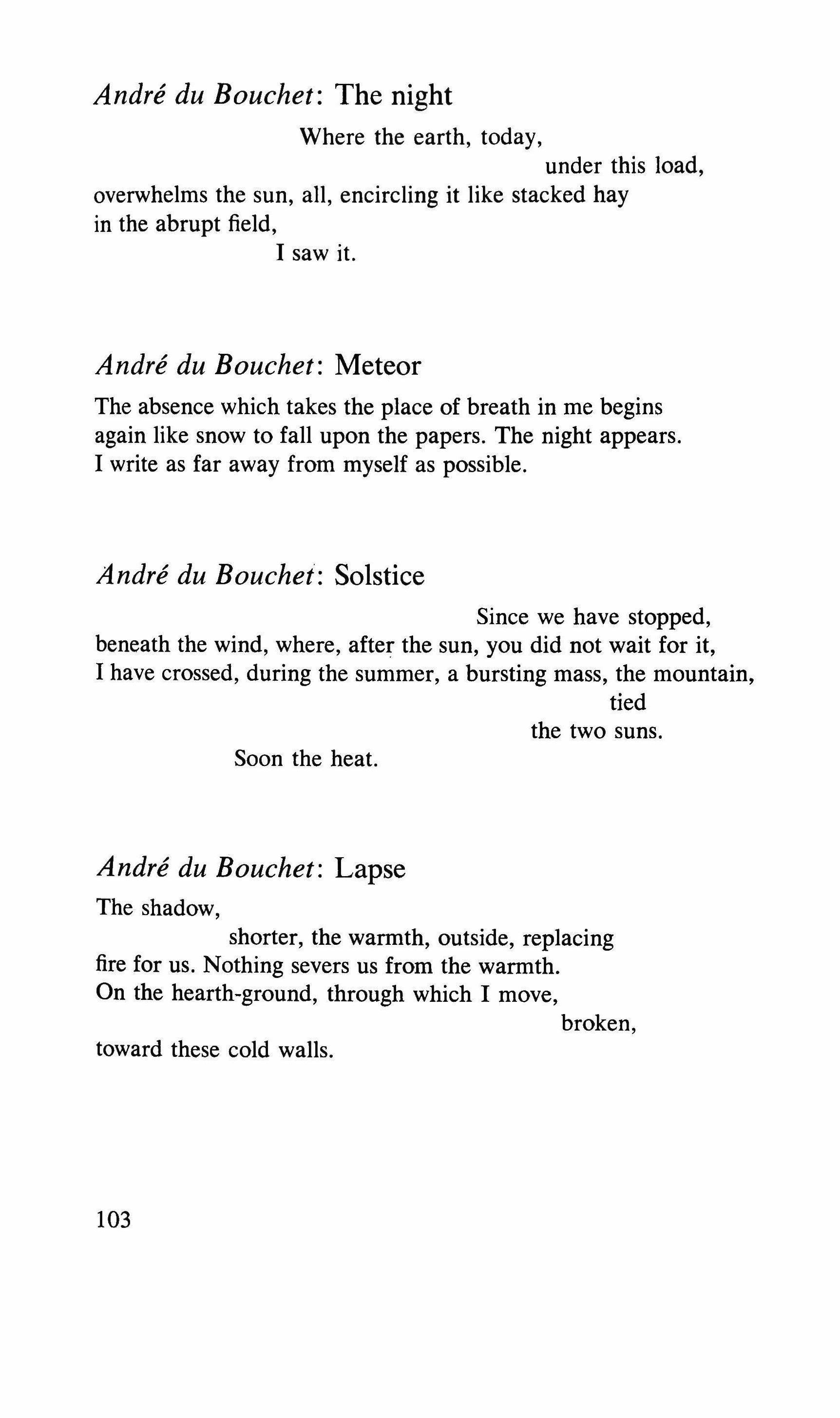
Andre du Bouchet: Meteor
The absence which takes the place of breath in me begins again like snow to fall upon the papers. The night appears. I write as far away from myself as possible.
Andre du Bouchet: Solstice
Since we have stopped, beneath the wind, where, after the sun, you did not wait for it, I have crossed, during the summer, a bursting mass, the mountain, tied the two suns.
Soon the heat.
Andre du Bouchet: Lapse
The shadow, shorter, the warmth, outside, replacing fire for us. Nothing severs us from the warmth. On the hearth-ground, through which I move, broken, toward these cold walls.
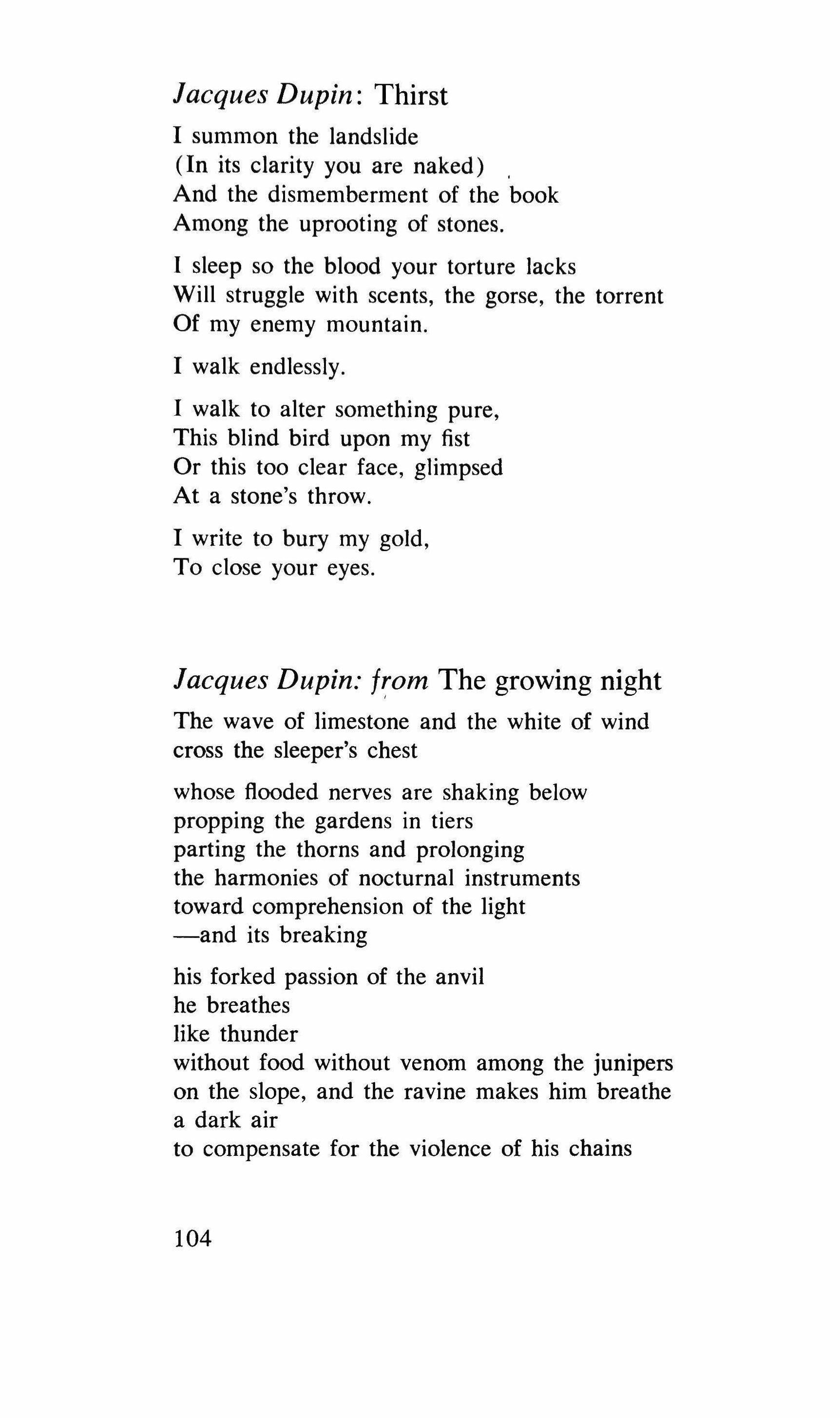
I summon the landslide (In its clarity you are naked) And the dismemberment of the book Among the uprooting of stones.
I sleep so the blood your torture lacks Will struggle with scents, the gorse, the torrent Of my enemy mountain.
I walk endlessly. I walk to alter something pure, This blind bird upon my fist Or this too clear face, glimpsed At a stone's throw.
I write to bury my gold, To close your eyes.
The wave of limestone and the white of wind cross the sleeper's chest
whose flooded nerves are shaking below propping the gardens in tiers parting the thorns and prolonging the harmonies of nocturnal instruments toward comprehension of the light -and its breaking his forked passion of the anvil he breathes like thunder without food without venom among the junipers on the slope, and the ravine makes him breathe a dark air to compensate for the violence of his chains

The only beating remains Of a small desirable agony
In the high gardens that have shut again.
The scansion of the hideous murmur degrades you: Shorten your day, bury your tools.
I am forbidden to stop to see. As if I were condemned to see while walking. While speaking. To see what I speak, and to speak precisely because I do not see. What language, unfolding, strikes and discovers. Blindness signifies the obligation to invert the terms, and to posit walking and word before the eyes. To walk in the night, to speak through din and confusion, so that the shaft of the rising day fuses and answers my step, designates the branch, and picks the fruit.
I walk in a garden of cool embers under the shelter of their leaves
A burning coal upon my lips
Weight of stones, weight of thoughts
Dreams and mountains do not have the same balance
We still inhabit another world
Perhaps the interval
Flowers colored blue mouths asleep slumber of depths you periwinkle a horde speaking of absence to the passerby
There will always be however in my eye an unseen rose of regret as when over a lake the shadow of a bird has passed
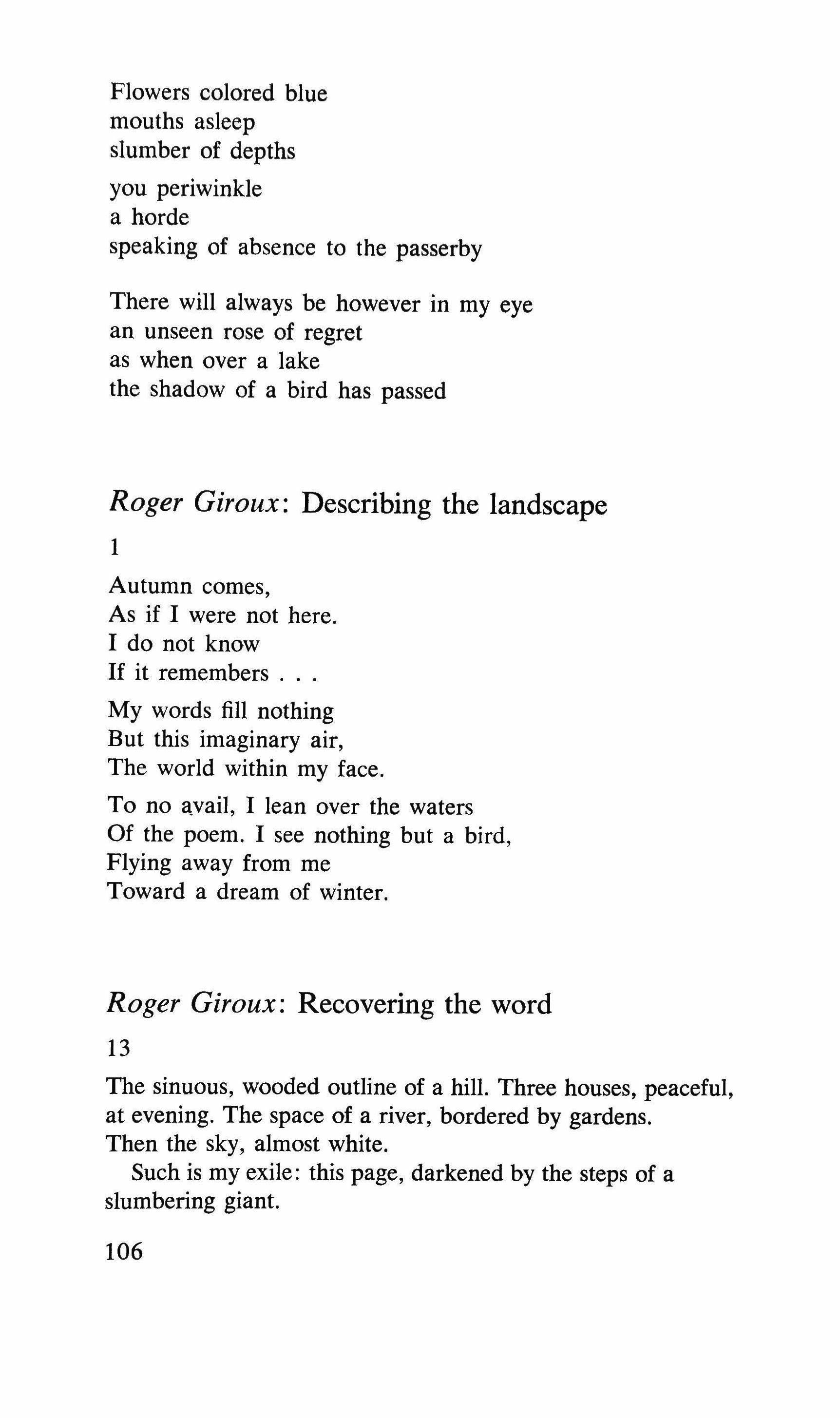
Roger Giroux: Describing the landscape 1 Autumn comes, As if I were not here. I do not know If it remembers My words fill nothing But this imaginary air, The world within my face.
To no avail, I lean over the waters Of the poem. I see nothing but a bird, Flying away from me Toward a dream of winter.
Roger Giroux: Recovering the word 13
The sinuous, wooded outline of a hill. Three houses, peaceful, at evening. The space of a river, bordered by gardens. Then the sky, almost white. Such is my exile: this page, darkened by the steps of a slumbering giant. 106
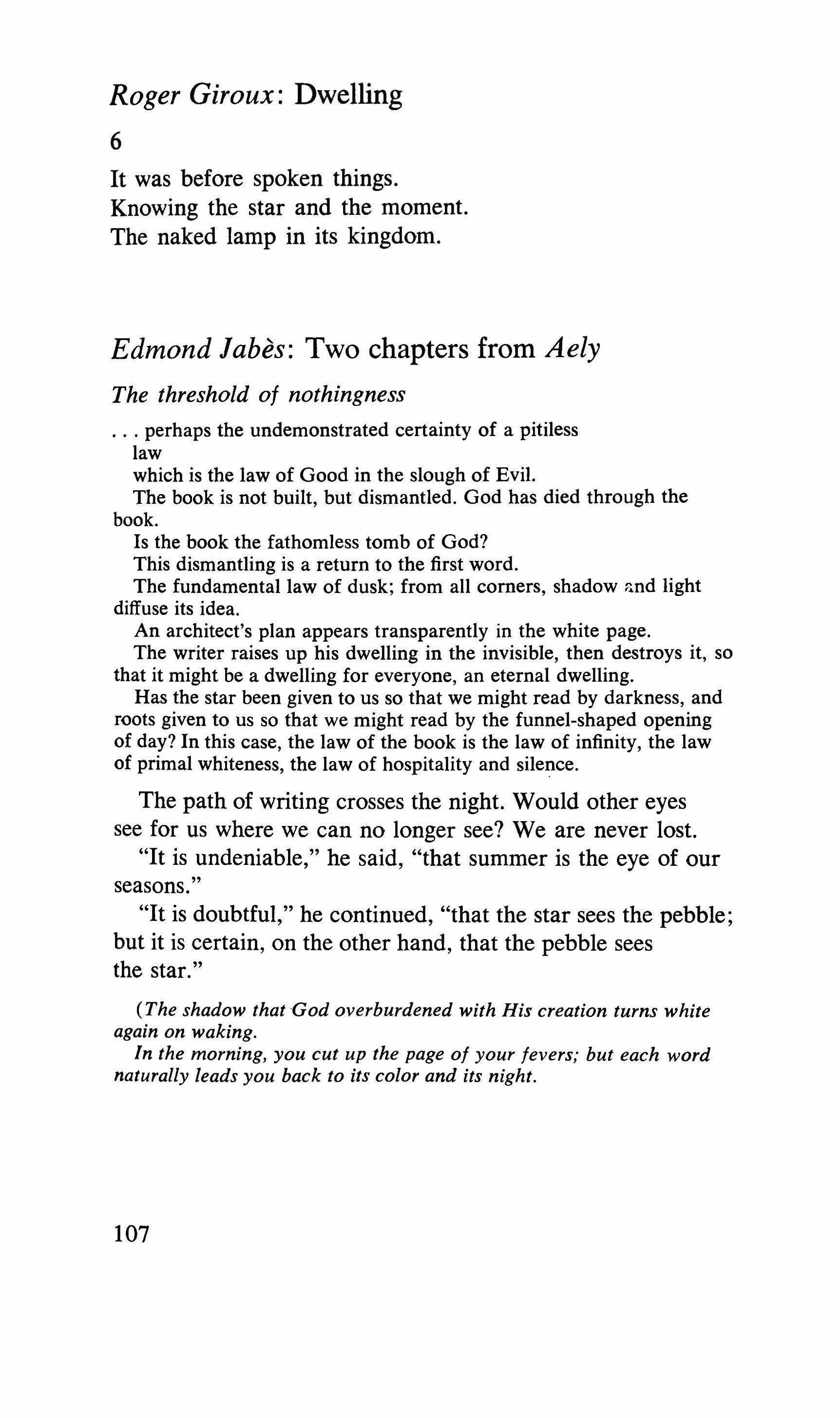
It was before spoken things. Knowing the star and the moment. The naked lamp in its kingdom.
perhaps the undemonstrated certainty of a pitiless law which is the law of Good in the slough of Evil.
The book is not built, but dismantled. God has died through the book.
Is the book the fathomless tomb of God?
This dismantling is a return to the first word.
The fundamental law of dusk; from all corners, shadow and light diffuse its idea.
An architect's plan appears transparently in the white page.
The writer raises up his dwelling in the invisible, then destroys it, so that it might be a dwelling for everyone, an eternal dwelling.
Has the star been given to us so that we might read by darkness, and roots given to us so that we might read by the funnel-shaped opening of day? In this case, the law of the book is the law of infinity, the law of primal whiteness, the law of hospitality and silence.
The path of writing crosses the night. Would other eyes see for us where we can no longer see? We are never lost.
"It is undeniable," he said, "that summer is the eye of our seasons."
"It is doubtful," he continued, "that the star sees the pebble; but it is certain, on the other hand, that the pebble sees the star."
(The shadow that God overburdened with His creation turns white again on waking.
In the morning, you cut up the page of your fevers; but each word naturally leads you back to its color and its night.
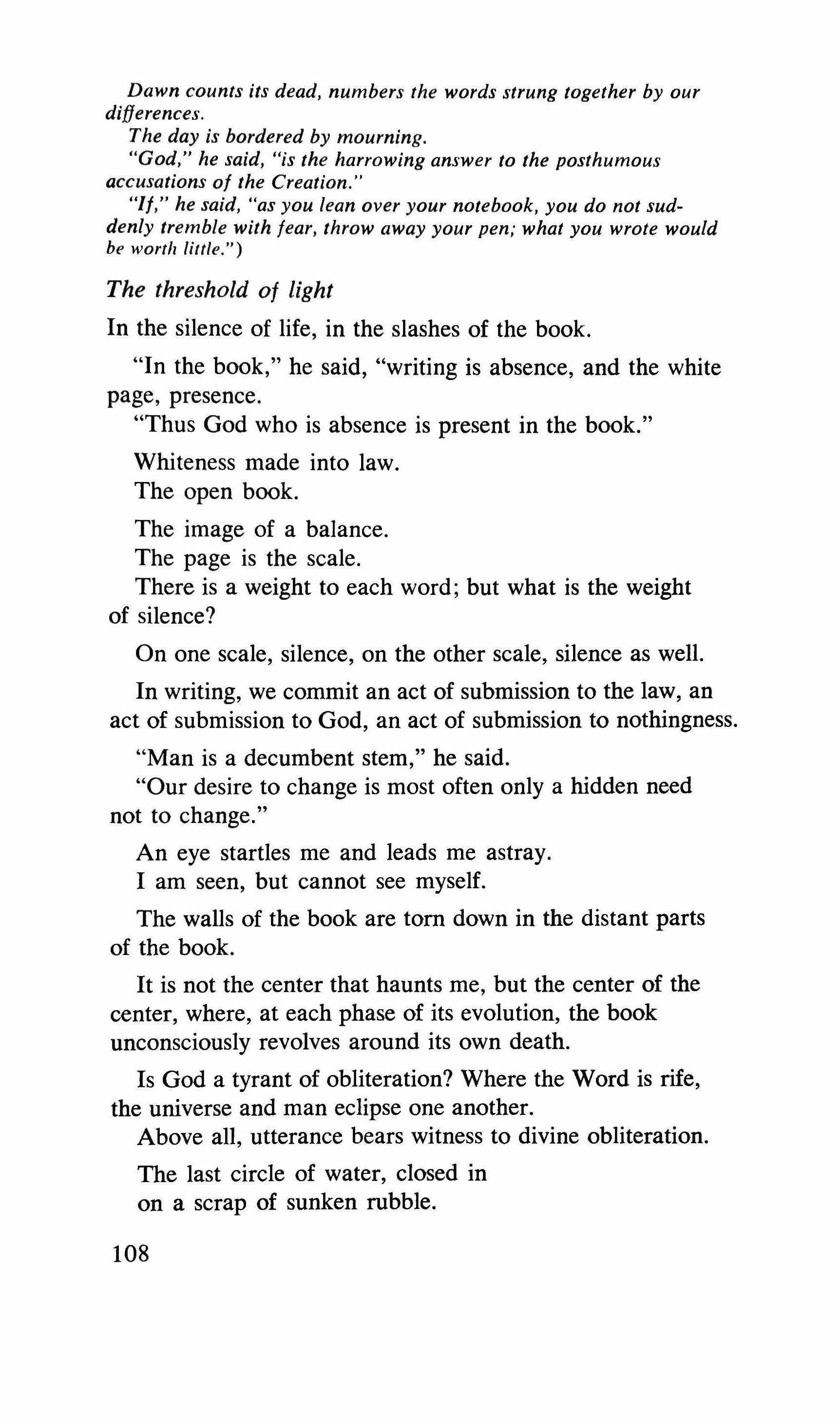
Dawn counts its dead, numbers the words strung together by our differences.
The day is bordered by mourning.
"God," he said, "is the harrowing answer to the posthumous accusations of the Creation."
"If," he said, "as you lean over your notebook, you do not suddenly tremble with fear, throwaway your pen; what you wrote would be worth little.")
The threshold of light
In the silence of life, in the slashes of the book.
"In the book," he said, "writing is absence, and the white page, presence.
"Thus God who is absence is present in the book."
Whiteness made into law.
The open book.
The image of a balance.
The page is the scale.
There is a weight to each word; but what is the weight of silence?
On one scale, silence, on the other scale, silence as well.
In writing, we commit an act of submission to the law, an act of submission to God, an act of submission to nothingness.
"Man is a decumbent stem," he said.
"Our desire to change is most often only a hidden need not to change."
An eye startles me and leads me astray.
I am seen, but cannot see myself.
The walls of the book are tom down in the distant parts of the book.
It is not the center that haunts me, but the center of the center, where, at each phase of its evolution, the book unconsciously revolves around its own death.
Is God a tyrant of obliteration? Where the Word is rife, the universe and man eclipse one another.
Above all, utterance bears witness to divine obliteration.
The last circle of water, closed in on a scrap of sunken rubble.
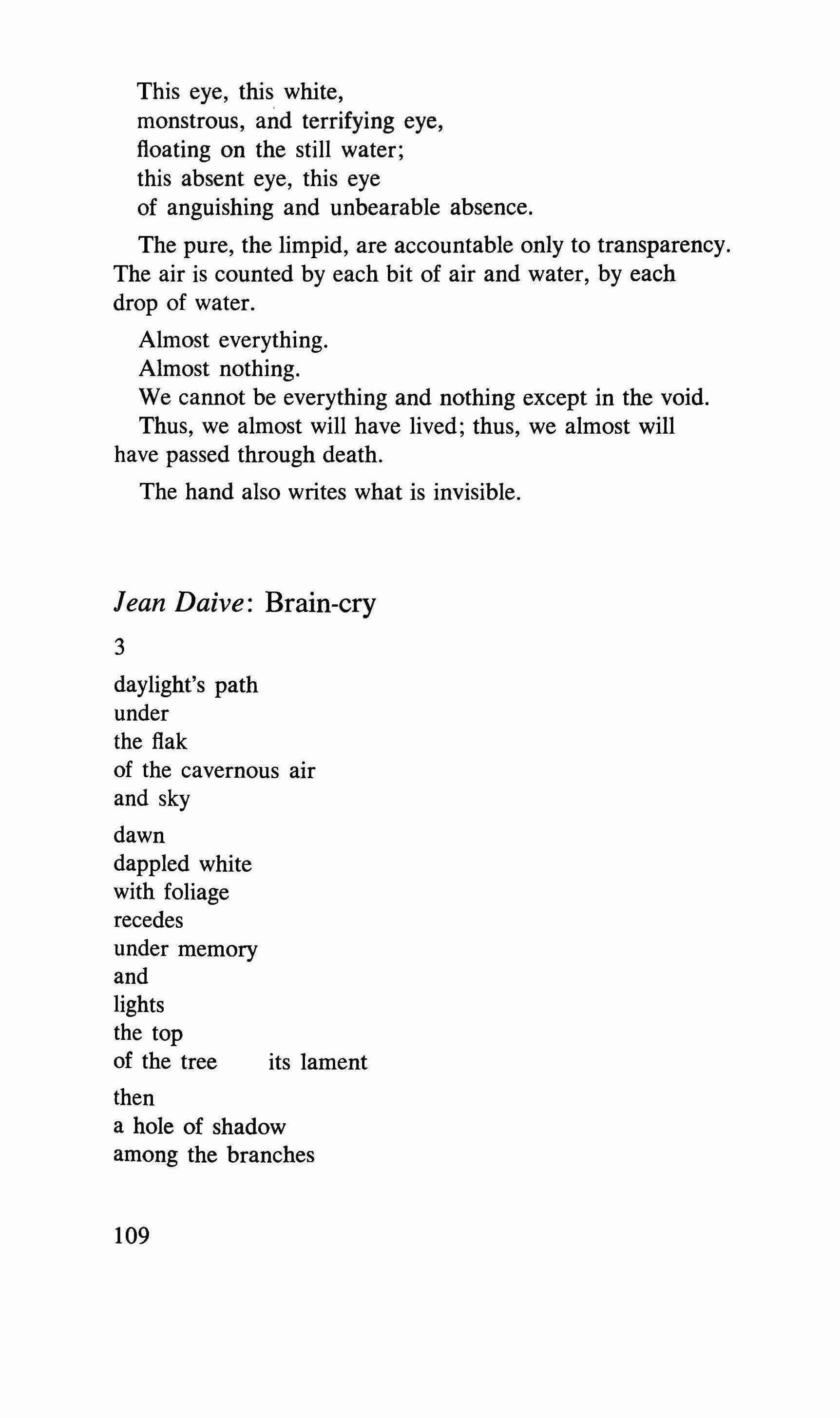
This eye, this white, monstrous, and terrifying eye, floating on the still water; this absent eye, this eye of anguishing and unbearable absence.
The pure, the limpid, are accountable only to transparency. The air is counted by each bit of air and water, by each drop of water.
Almost everything. Almost nothing.
We cannot be everything and nothing except in the void. Thus, we almost will have lived; thus, we almost will have passed through death.
The hand also writes what is invisible.
3 daylight's path under the flak of the cavernous air and sky dawn dappled white with foliage recedes under memory and lights the top of the tree its lament then a hole of shadow among the branches
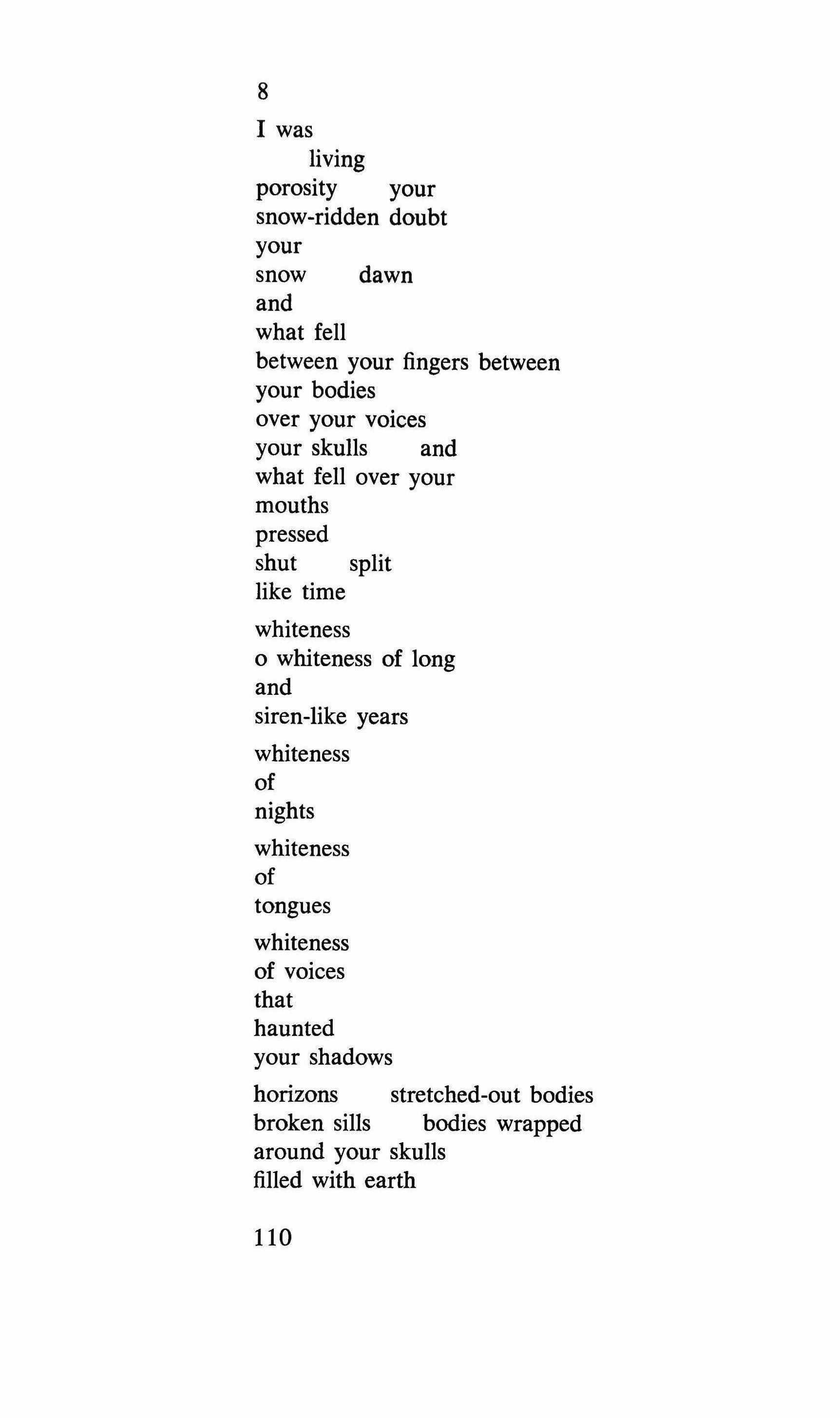
I was living porosity your snow-ridden doubt your snow dawn and what fell between your fingers between your bodies over your voices your skulls and what fell over your mouths pressed shut split like time whiteness o whiteness of long and siren-like years whiteness of nights whiteness of tongues whiteness of voices that haunted your shadows horizons stretched-out bodies broken sills bodies wrapped around your skulls filled with earth
with black and battered solar skies
crossing name crossing cry then
crossing beach loaded with bodies and hours lifting neither shadow nor silence
I dug in heel in nothingness tongue
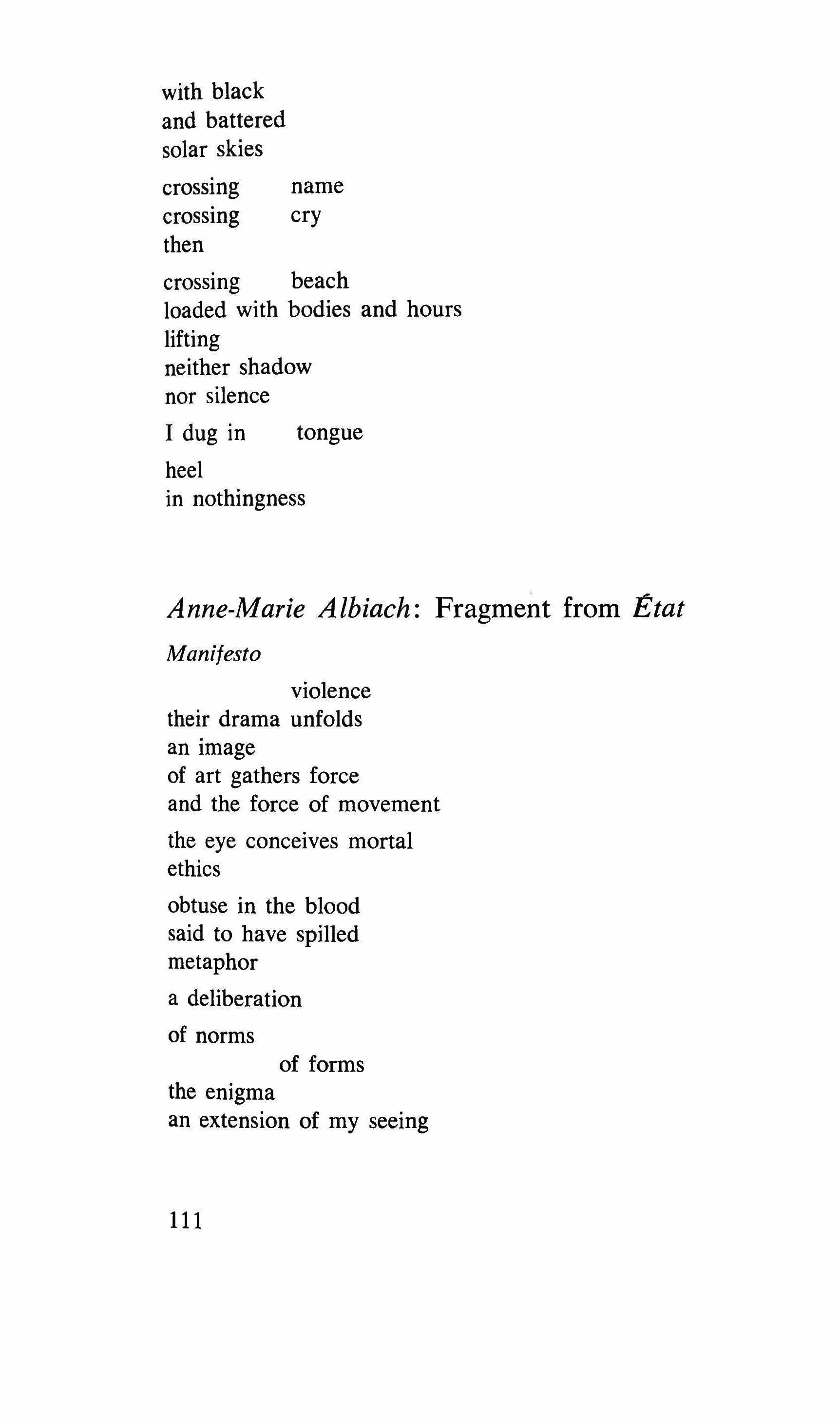
Anne-Marie
Manifesto
violence their drama unfolds an image of art gathers force and the force of movement the eye conceives mortal ethics
obtuse in the blood said to have spilled metaphor a deliberation of norms of forms the enigma an extension of my seeing
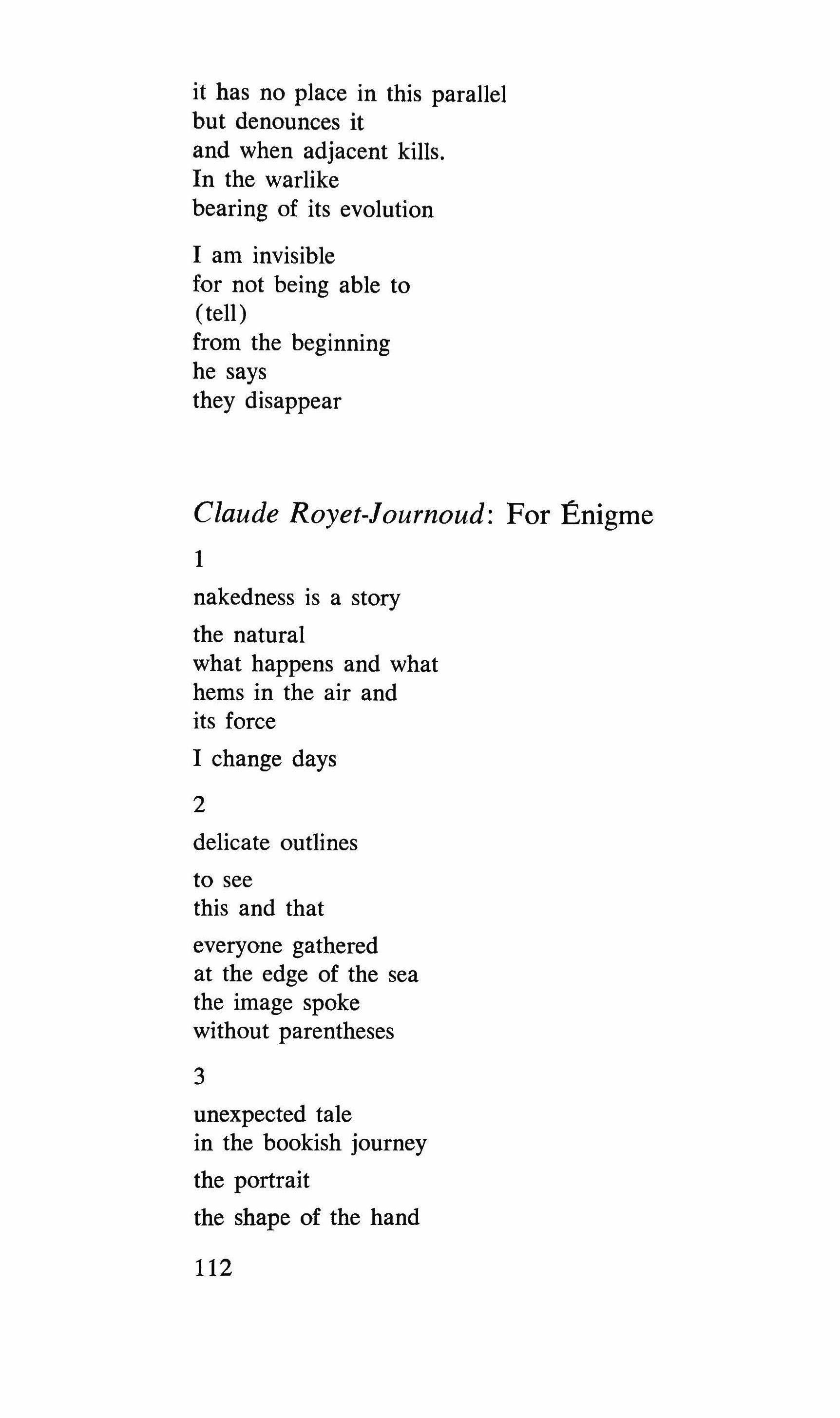
it has no place in this parallel but denounces it and when adjacent kills. In the warlike bearing of its evolution
I am invisible for not being able to (tell) from the beginning he says they disappear
1 nakedness is a story the natural what happens and what hems in the air and its force
I change days
2 delicate outlines to see this and that everyone gathered at the edge of the sea the image spoke without parentheses
3 unexpected tale in the bookish journey the portrait the shape of the hand 112
in this act
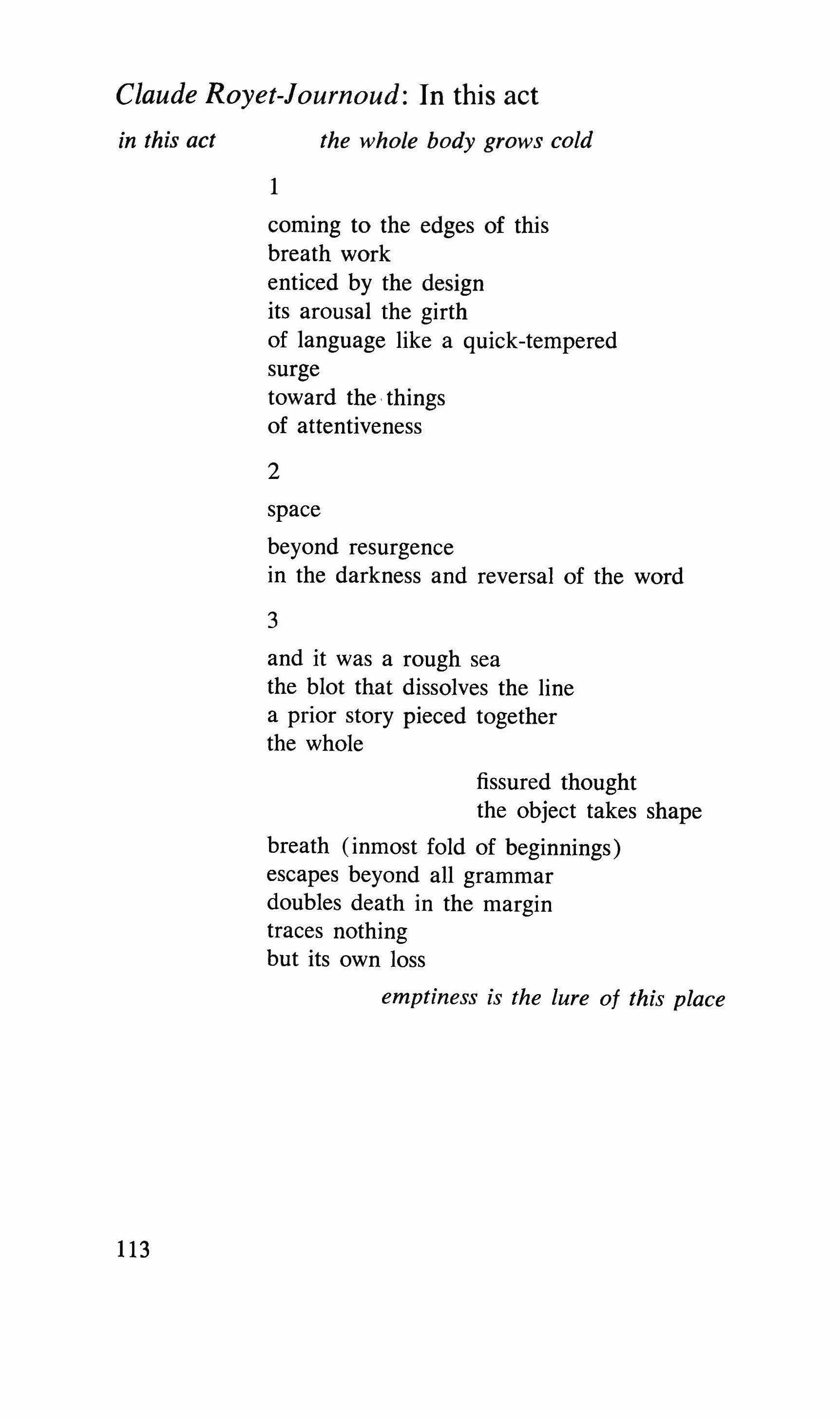
the whole body grows cold
1
coming to the edges of this breath work enticed by the design its arousal the girth of language like a quick-tempered surge toward the things of attentiveness
2 space beyond resurgence in the darkness and reversal of the word
3 and it was a rough sea the blot that dissolves the line a prior story pieced together the whole
fissured thought the object takes shape
breath (inmost fold of beginnings) escapes beyond all grammar doubles death in the margin traces nothing but its own loss
emptiness is the lure of this place
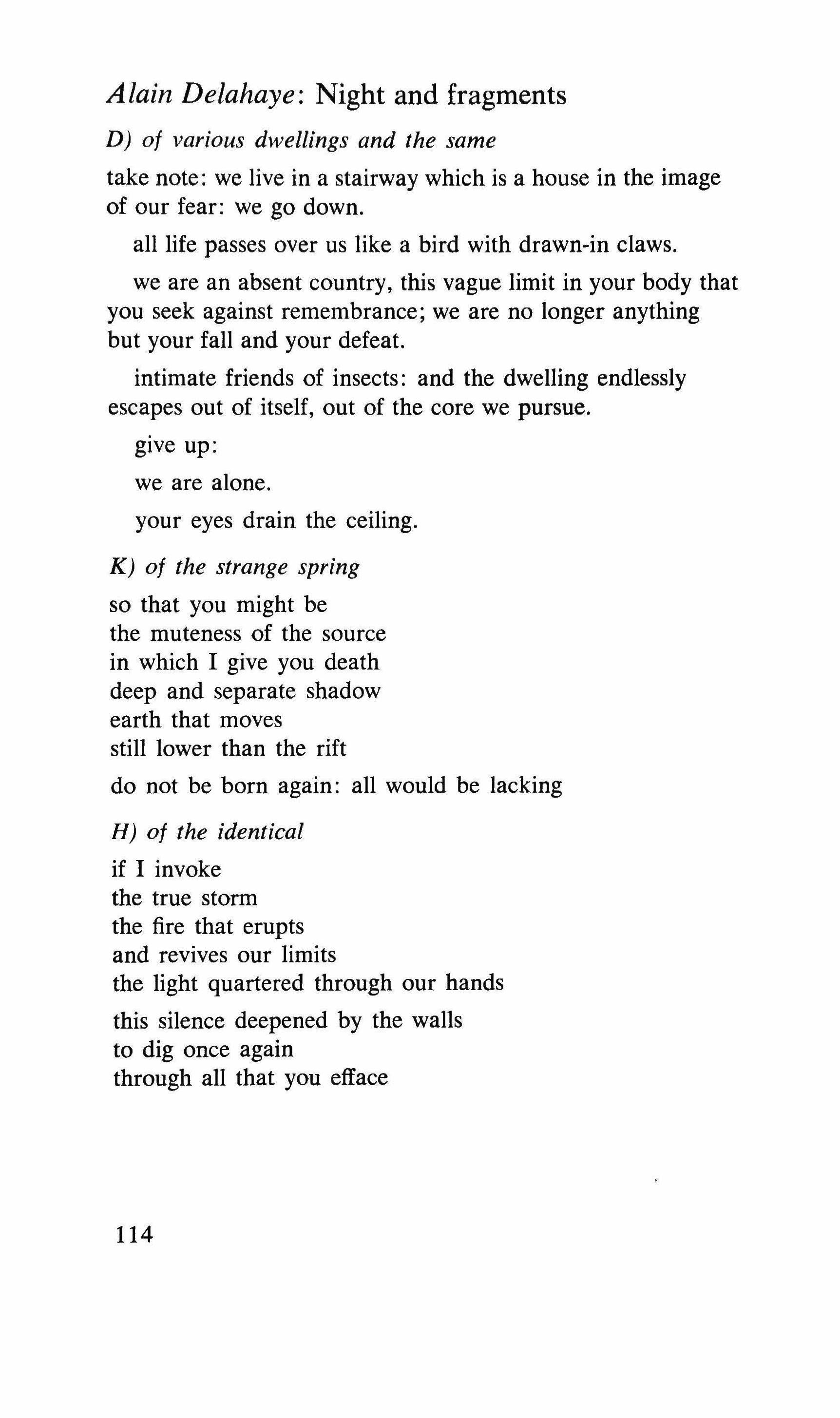
D) of various dwellings and the same take note: we live in a stairway which is a house in the image of our fear: we go down. all life passes over us like a bird with drawn-in claws. we are an absent country, this vague limit in your body that you seek against remembrance; we are no longer anything but your fall and your defeat.
intimate friends of insects: and the dwelling endlessly escapes out of itself, out of the core we pursue. give up: we are alone. your eyes drain the ceiling.
K) of the strange spring so that you might be the muteness of the source in which I give you death deep and separate shadow earth that moves still lower than the rift do not be born again: all would be lacking
B) of the identical if I invoke the true storm the fire that erupts and revives our limits the light quartered through our hands this silence deepened by the walls to dig once again through all that you efface
Philippe Denis: 4 poems from Cahier d'ombres
Earth-as though I had entered where no body can live
(daylight confession into the teeth of the wind
The lure of a drunken star will have been the sole enigma between sky and self
Empty place, where I merge with this body.

Philippe Denis: Untitled
Moored to your blood, the hollow left by your sleep, now breathes for you(the wind flows between the last stars rooster scraps sputter in the paddockbefore the roads begin to swell -like the veins of your wrists.
A star, therein the unlivable heart of each living thing driven from life. Pain seeps into whiteness, pumps blood into the quick of the journey (the vast road of water
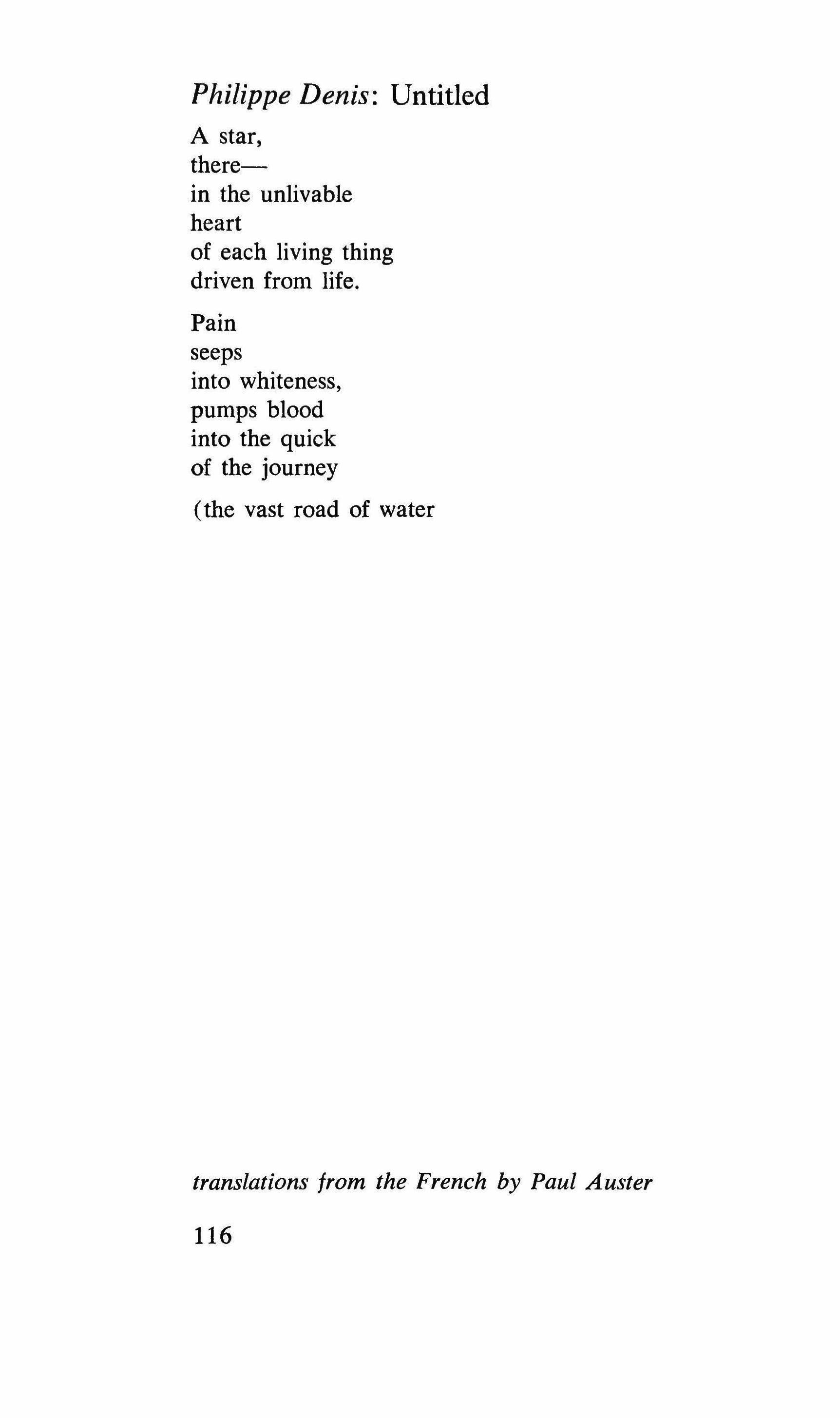
translations from the French by Paul Auster 116
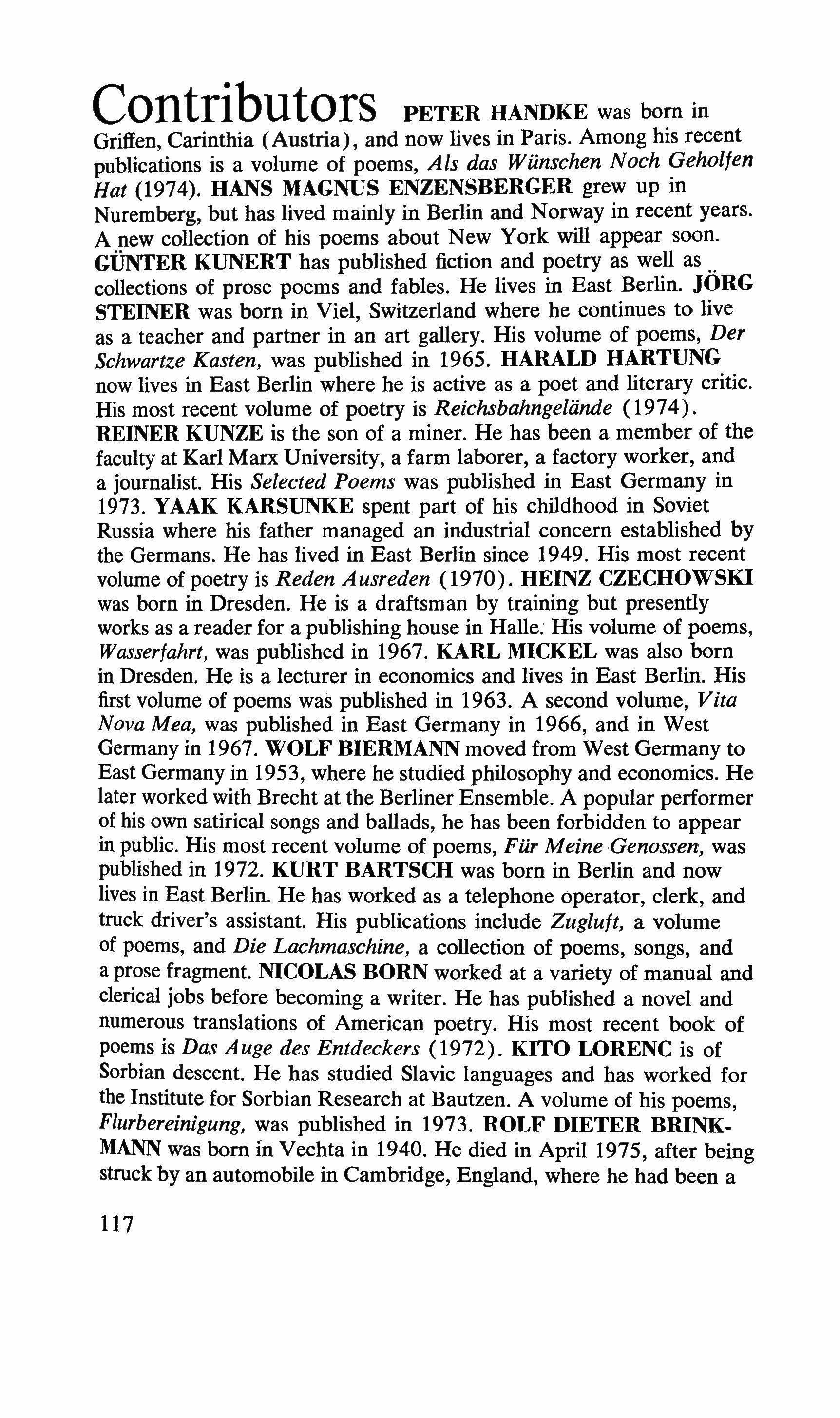
PETER HANDKE was born in Griffen, Carinthia (Austria), and now lives in Paris. Among his recent publications is a volume of poems, Als das Wlinschen Noch Geholien Hat (1974). HANS MAGNUS ENZENSBERGER grew up in Nuremberg, but has lived mainly in Berlin and Norway in recent years. A new collection of his poems about New York will appear soon. GUNrER KUNERT has published fiction and poetry as well as collections of prose poems and fables. He lives in East Berlin. JORG STEINER was born in Viel, Switzerland where he continues to live as a teacher and partner in an art gallery, His volume of poems, Der Schwartze Kasten, was published in 1965. HARALD HARTUNG now lives in East Berlin where he is active as a poet and literary critic. His most recent volume of poetry is Reichsbahngeliinde (1974).
REINER KUNZE is the son of a miner. He has been a member of the faculty at Karl Marx University, a farm laborer, a factory worker, and a journalist. His Selected Poems was published in East Germany in 1973. YAAK KARSUNKE spent part of his childhood in Soviet Russia where his father managed an industrial concern established by the Germans. He has lived in East Berlin since 1949. His most recent volume of poetry is Reden Ausreden (1970). HEINZ CZECHOWSKI was born in Dresden. He is a draftsman by training but presently works as a reader for a publishing house in Halle: His volume of poems, Wasserjahrt, was published in 1967. KARL MICKEL was also born in Dresden. He is a lecturer in economics and lives in East Berlin. His first volume of poems was published in 1963. A second volume, Vita Nova Mea, was published in East Germany in 1966, and in West Germany in 1967. WOLF BIERMANN moved from West Germany to East Germany in 1953, where he studied philosophy and economics. He later worked with Brecht at the Berliner Ensemble. A popular performer of his own satirical songs and ballads, he has been forbidden to appear in public. His most recent volume of poems, Fur Meine Genossen, was published in 1972. KURT BARTSCH was born in Berlin and now lives in East Berlin. He has worked as a telephone operator, clerk, and truck driver's assistant. His publications include Zugluit, a volume of poems, and Die Lachmaschine, a collection of poems, songs, and a prose fragment. NICOLAS BORN worked at a variety of manual and clerical jobs before becoming a writer. He has published a novel and numerous translations of American poetry. His most recent book of poems is Das Auge des Entdeckers (1972). KITO LORENC is of Sorbian descent. He has studied Slavic languages and has worked for the Institute for Sorbian Research at Bautzen. A volume of his poems, Flurbereinigung, was published in 1973. ROLF DIETER BRINKMANN was born in Vechta in 1940. He died in April 1975, after being struck by an automobile in Cambridge, England, where he had been a
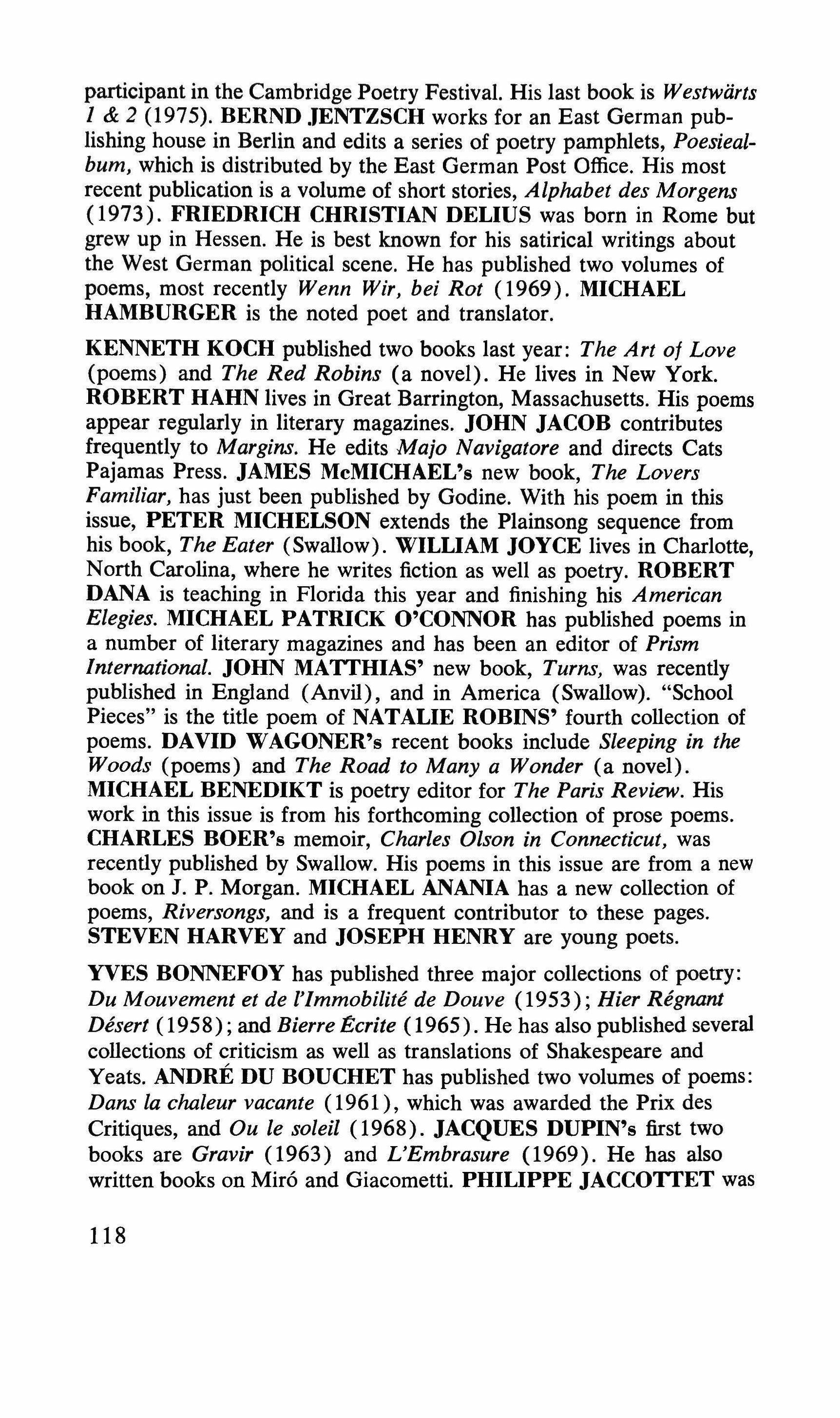
participant in the Cambridge Poetry Festival. His last book is Westwiirts 1 & 2 (1975). BERND JENTZSCH works for an East German publishing house in Berlin and edits a series of poetry pamphlets, Poesiealbum, which is distributed by the East German Post Office. His most recent publication is a volume of short stories, Alphabet des Morgens (1973). FRIEDRICH CHRISTIAN DELIUS was born in Rome but grew up in Hessen. He is best known for his satirical writings about the West German political scene. He has published two volumes of poems, most recently Wenn Wir, bei Rot (1969). MICHAEL HAMBURGER is the noted poet and translator.
KENNETH KOCH published two books last year: The Art of Love (poems) and The Red Robins (a novel). He lives in New York. ROBERT HAHN lives in Great Barrington, Massachusetts. His poems appear regularly in literary magazines. JOHN JACOB contributes frequently to Margins. He edits Majo Navigatore and directs Cats Pajamas Press. JAMES McMICHAEL's new book, The Lovers Familiar, has just been published by Godine. With his poem in this issue, PETER MICHELSON extends the Plainsong sequence from his book, The Eater (Swallow). WILLIAM JOYCE lives in Charlotte, North Carolina, where he writes fiction as well as poetry. ROBERT DANA is teaching in Florida this year and finishing his American Elegies. MICHAEL PATRICK O'CONNOR has published poems in a number of literary magazines and has been an editor of Prism International. JOHN MATTHIAS' new book, Turns, was recently published in England (Anvil), and in America (Swallow). "School Pieces" is the title poem of NATALIE ROBINS' fourth collection of poems. DAVID WAGONER's recent books include Sleeping in the Woods (poems) and The Road to Many a Wonder (a novel).
MICHAEL BENEDIKT is poetry editor for The Paris Review. His work in this issue is from his forthcoming collection of prose poems. CHARLES BOER's memoir, Charles Olson in Connecticut, was recently published by Swallow. His poems in this issue are from a new book on J. P. Morgan. MICHAEL ANANIA has a new collection of poems, Riversongs, and is a frequent contributor to these pages. STEVEN HARVEY and JOSEPH HENRY are young poets.
YVES BONNEFOY has published three major collections of poetry: Du Mouvement et de l'Immobllite de Douve (1953); Hier Regnant Desert (1958); and Bierre Ecrite (1965). He has also published several collections of criticism as well as translations of Shakespeare and Yeats. ANDRE DU BOUCHET has published two volumes of poems: Dans la chaleur vacante (1961), which was awarded the Prix des Critiques, and Ou Ie soleil (1968). JACQUES DUPIN's first two books are Gravir (1963) and L'Embrasure (1969). He has also written books on Miro and Giacometti. PHILIPPE JACCOTTET was

born in Switzerland. His books include Airs (1967) and Lecons (1968). He is also known for his translations of Holderlin, Rilke, Musil, Ungaretti, and others. ROGER GIROUX died in 1974. He published only one volume of poems during his lifetime, L'arbre le temps, which received the Prix Max Jacobs in 1964. A large posthumous collection of his work is being planned. EDMOND JABES was born in Cairo but has lived in France since 1957. His collected poems appeared in 1959 under the title Ie bdtis ma demeure. Since then he has published seven volumes under the general title Le livre des questions: Le livre des questions I, II, III (1963,1964,1965); Yael (1967); Elya (1969); Aely (1972); and EI, ou le dernier livre (1973). He was awarded the Prix des Critiques in 1970. JEAN DAIVE has published several volumes of poems, including Decimale blanche (1967) and Fut bali (1973). He has also published translations of Paul Celan and Robert Creeley. ANNE·MARIE ALBIACH has published three volumes of poetry: Flammigere (1967), Btat (1971), and "B II" lineaires (1974), as well as translations of Louis Zukofsky, Frank O'Hara, and other American poets. CLAUDE ROYET·JOURNOUD has published two volumes of poems: Le Renversement (1972) and Ate (1974), as well as translations of George Oppen. ALAIN DELAHAYE's collection of poems is L'Eveil des Traversees (1971). He has published translations of W. S. Merwin, John Hawkes, and others. PHILIPPE DENIS published his collection of poems, Cahier d'ombres, in 1974, and has published translations of Emily Dickinson. PAUL AUSTER is a poet and translator from New York, presently living in Canada.
TriQuarterly is pleased to announce the first in a series of limited edition posters signed and numbered by contemporary artists. Number 1 in the series is by William Biderbost whose collage/illustrations are featured in TriQuarterly 33. The Poster was silk screened under the supervision of the artist in five colors on Strathmore in an edition of 275.
To order send check or money order to TriQuarterly 101 University Hall Northwestern University Evanston, Illinois 60201 As this is a limited edition orders will be honored in order of receipt.
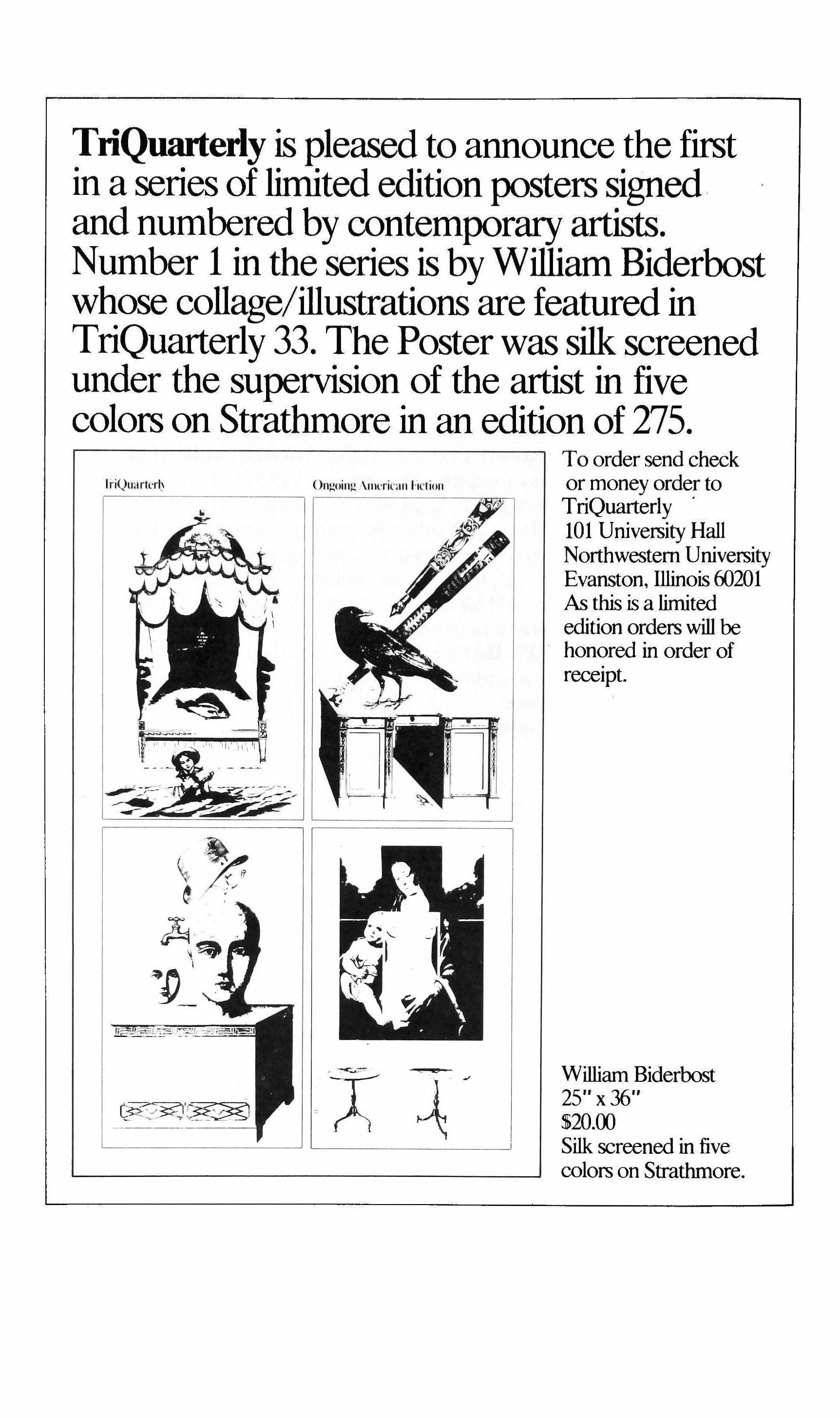
William Biderbost 25" x 36"
$20.00
Silk screened in five colors on Strathmore.

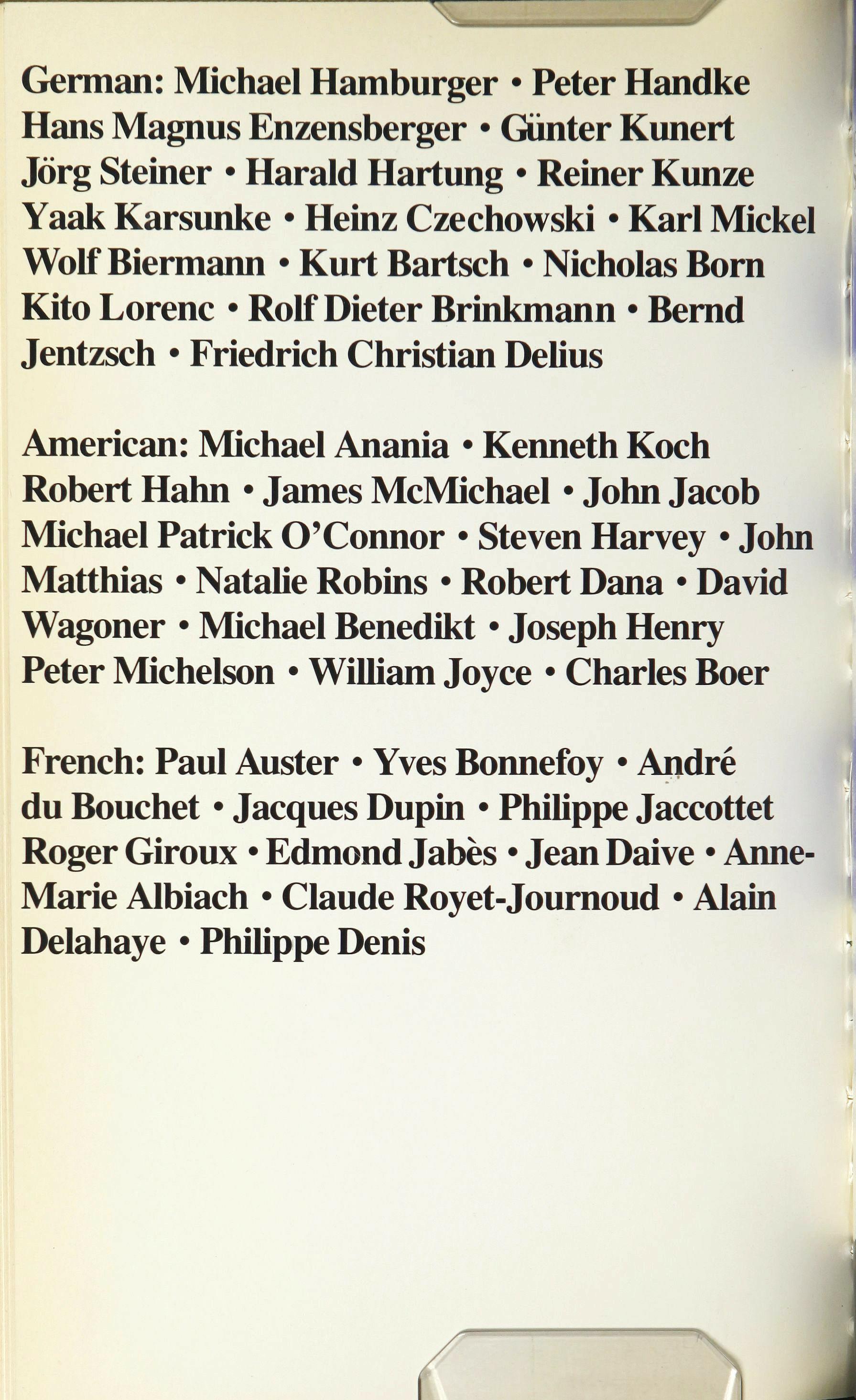
German: Michael Hamburger Peter Handke
Hans Magnus Enzensberger GUnter Kunert
Jorg Steiner Harald Hartung Reiner Kunze
Yaak Karsunke • Heinz Czechowski • Karl Mickel
Wolf Biermann • Kurt Bartsch • Nicholas Born
Kito Lorenc • RolfDieter Brinkmann • Bernd
Jentzsch • Friedrich Christian Delius
American: Michael Anania • Kenneth Koch
Robert Hahn • James McMichael John Jacob
Michael Patrick O'Connor • Steven Harvey John
Matthias Natalie Robins Robert Dana • David Wagoner • Michael Benedikt Joseph Henry
Peter Michelson • William Joyce • Charles Boer
French: Paul Auster • Yves Bonnefoy Andre du Bouchet • Jacques Dupin Philippe Jaccottet
Roger Giroux Edmond Jabes Jean Daive Anne
Marie Albiach • Claude Royet-Journoud • Alain
Delahaye Philippe Denis